




Even though the Elizabethan period was the greatest in English stage history, its documentary records of authorship are often fragmentary, contradictory, or erroneous. This study, an essay in literary history and method, attempts to deal with the problem. S. Schoenbaum is Pro. fessor of English at Northwestern University.
288 pp. 87.50
Lawrence's novels abound with characters that can be defined in terms of strong "male" and "female" principles. The author divides the novels into periods based on these principles, and in 1;>0 doing defines and explains Lawrence's artistic and psychological development. H. M. Daleski teaches Eng. lish at the Hebrew University in Jerusalem.
320 pp. 89.00
This volume of essays was prepared especially to commemorate the 25th anniversary of Finnegans Wake. The contributors, all prominent Joyceans, include Budgen, Colum, Hoffman, Mercier, Senn, Atherton, Morse, Halper, Kain, Litz, Hayman, and Dalton.
142 pp. 85.50
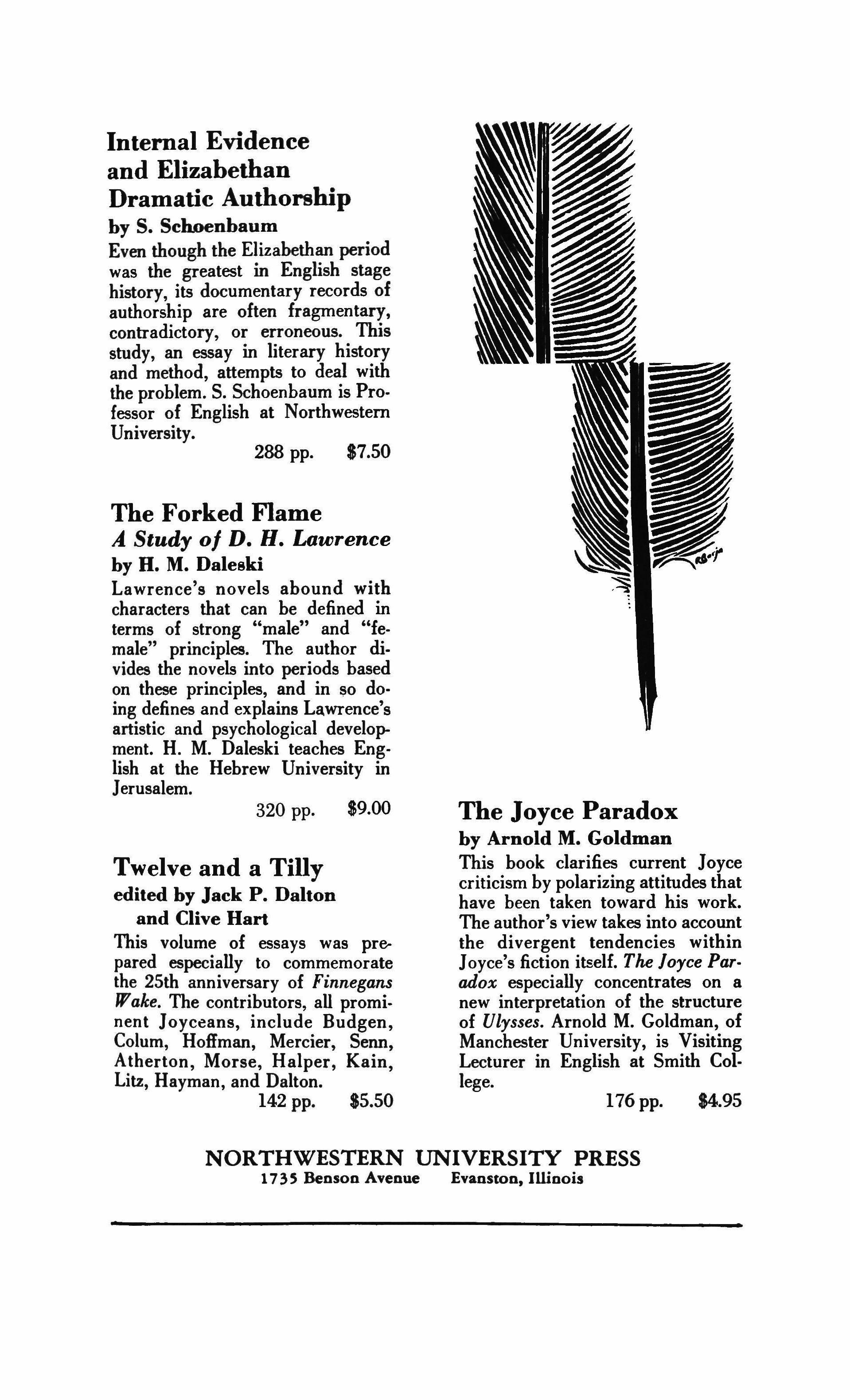
This book clarifies current Joyce criticism by polarizing attitudes that have been taken toward his work. The author's view takes into account the divergent tendencies within Joyce's fiction itself. The Joyce Paradox especially concentrates on a new interpretation of the structure of Ulysses. Arnold M. Goldman, of Manchester University, is Visiting Lecturer in English at Smith College.
176 pp. $4.95
NORTHWESTERN UNIVERSITY PRESS 1735 Benson Avenue Evanston, Illinois
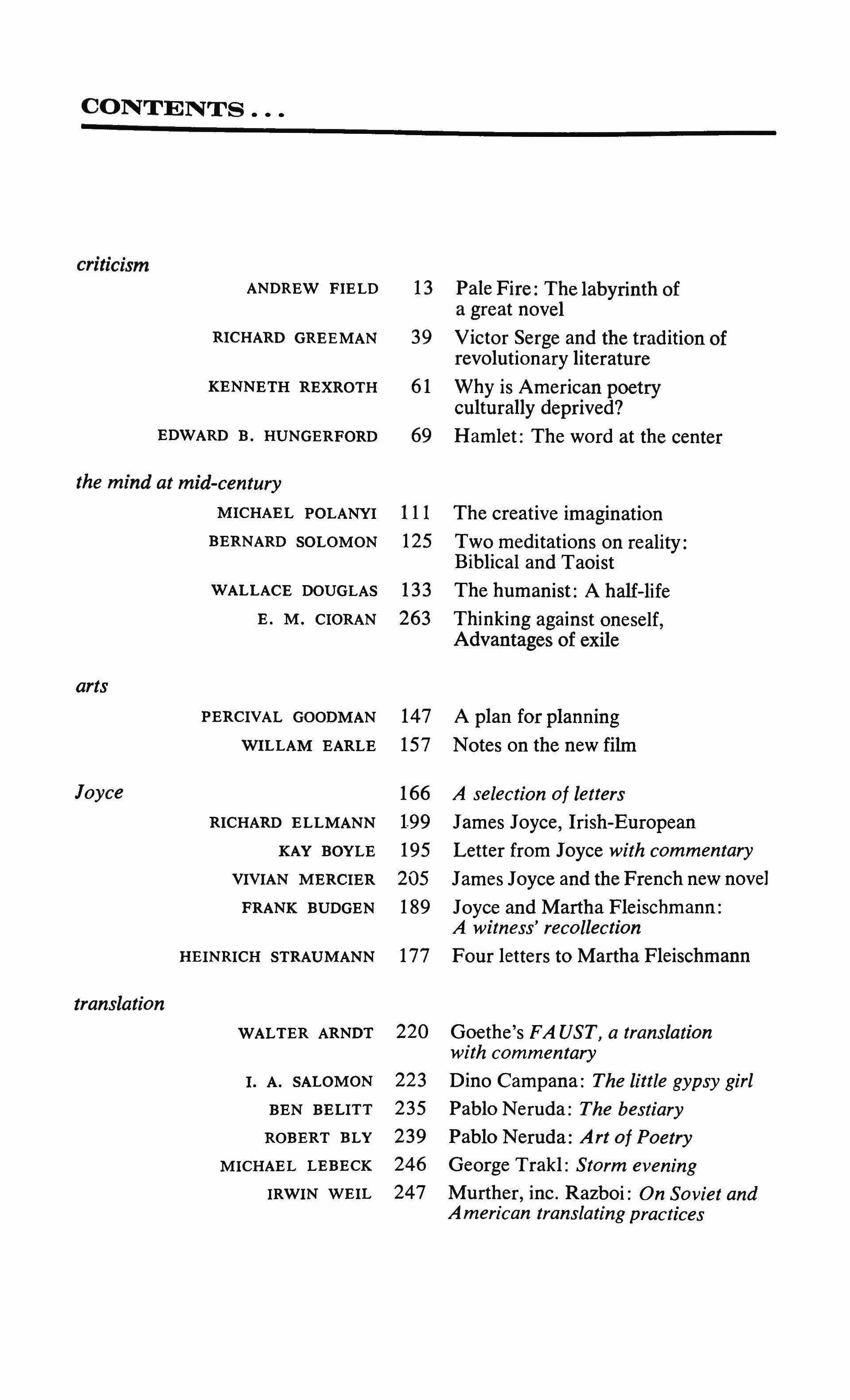
criticism
ANDREW FIELD 13
RICHARD GREEMAN 39
KENNETH REXROTH 61
EDWARD B. HUNGERFORD 69
the mind at mid-century
MICHAEL POLANYI 111
BERNARD SOLOMON 125
Pale Fire: The labyrinth of a great novel
Victor Serge and the tradition of revolutionary literature
Why is American poetry culturally deprived?
Hamlet: The word at the center
The creative imagination
Two meditations on reality: Biblical and Taoist
WALLACE DOUGLAS 133 The humanist: A half-life
E. M. CIORAN 263
arts
PERCIVAL GOODMAN 147
WILLAM EARLE 157
Thinking against oneself, Advantages of exile
A plan for planning
Notes on the new film
Joyce 166 A selection of letters
RICHARD ELLMANN 1.99
James Joyce, Irish-European
KAY BOYLE 195 Letter from Joyce with commentary
VIVIAN MERCIER 205
translation
James Joyce and the French new nove)
FRANK BUDGEN 189 Joyce and Martha Fleischmann: A witness' recollection
HEINRICH STRAUMANN 177
WALTER ARNDT 220
I. A. SALOMON 223
BEN BELITT 235
ROBERT BLY 239
MICHAEL LEBECK 246
IRWIN WElL 247
Four letters to Martha Fleischmann
Goethe's FAUST, a translation with commentary
Dino Campana: The little gypsy girl
Pablo Neruda: The bestiary
Pablo Neruda: Art of Poetry
George Trakl: Storm evening
Murther, inc. Razboi: On Soviet and American translating practices
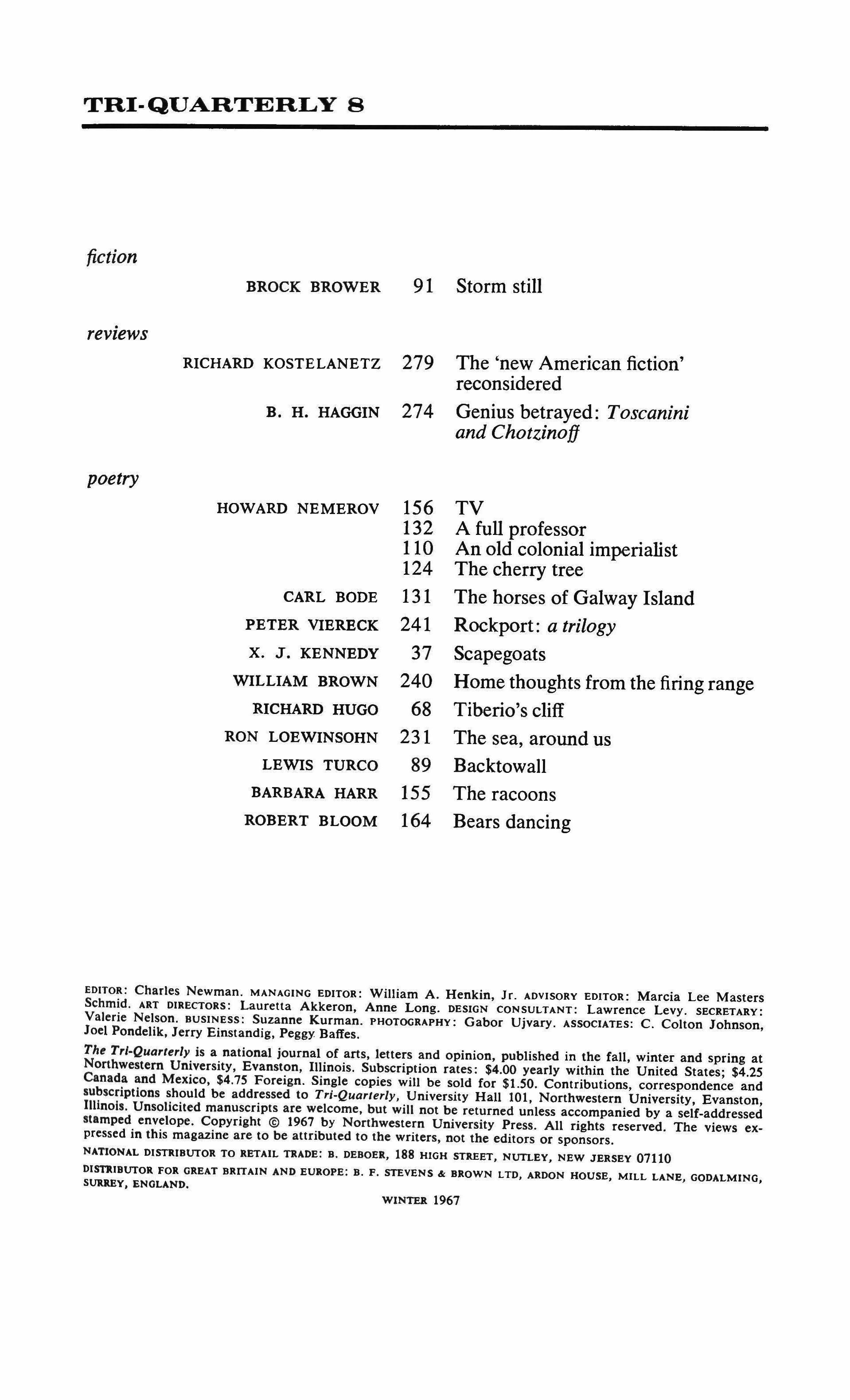
fiction
reviews
poetry
BROCK BROWER 91 Storm still
RICHARD KOSTELANETZ 279 The 'new American fiction' reconsidered
B. H. HAGGIN 274 Genius betrayed: Toscanini and Chotzinoff
HOWARD NEMEROV 156 TV 132 A full professor 110 An old colonial imperialist 124 The cherry tree
CARL BODE 131 The horses of Galway Island
PETER VIERECK 241 Rockport: a trilogy
x. J. KENNEDY 37 Scapegoats
WILLIAM BROWN 240 Home thoughts from the firing range
RICHARD HUGO 68 Tiberio's cliff
RON LOEWINSOHN 231 The sea, around us
LEWIS TURCO 89 Backtowall
BARBARA HARR 155 The racoons
ROBERT BLOOM 164 Bears dancing
EDITOR: Charles Newman. MANAGING EDITOR: William A. Henkin, Jr. ADVISORY EDITOR: Marcia Lee Masters
Schmid. ART DIRECTORS: Lauretta Akkeron, Anne Long. DESIGN CONSULTANT: Lawrence Levy. SECRETARY: Valerie Nelson. BUSINESS: Suzanne Kurman. PHOTOGRAPHY: Gabor Ujvary. ASSOCIATES: C. Colton Johnson, Joel Pondelik, Jerry Einstandig, Peggy Balles.
The Trl-Quarterly is a national journal of arts, letters and opinion, published in the fall, winter and spring at Northwestern University, Evanston, Illinois. Subscription rates: $4.00 yearly within the United States; $4.25 Canada and Mexico, $4.75 Foreign. Single copies will be sold for $1.50. Contributions, correspondence and subscriptions should be addressed to Tri-Quarterly University Hall 101, Northwestern University, Evanston, IIllnols. Unsolicited manuscripts are welcome, but will not be returned unless accompanied by a self-addressed stamped envelope. Copyright © 1967 by Northwestern University Press. All rights reserved. The views ex pressed in this magazine are to be attributed to the writers, not the editors or sponsors.
NATIONAL DISTRIBUTOR TO RETAIL TRADE: B. DEBOER, 188 HIGH STREET, NUTLEY, NEW JERSEY 07110
DISTRIBUTOR FOR GREAT BRITAIN AND EUROPE: B. F. STEVENS &< BROWN LTD, ARDON HOUSE, MILL LANE, GODALMING, SURREY, ENGLAND.
WINTER 1967
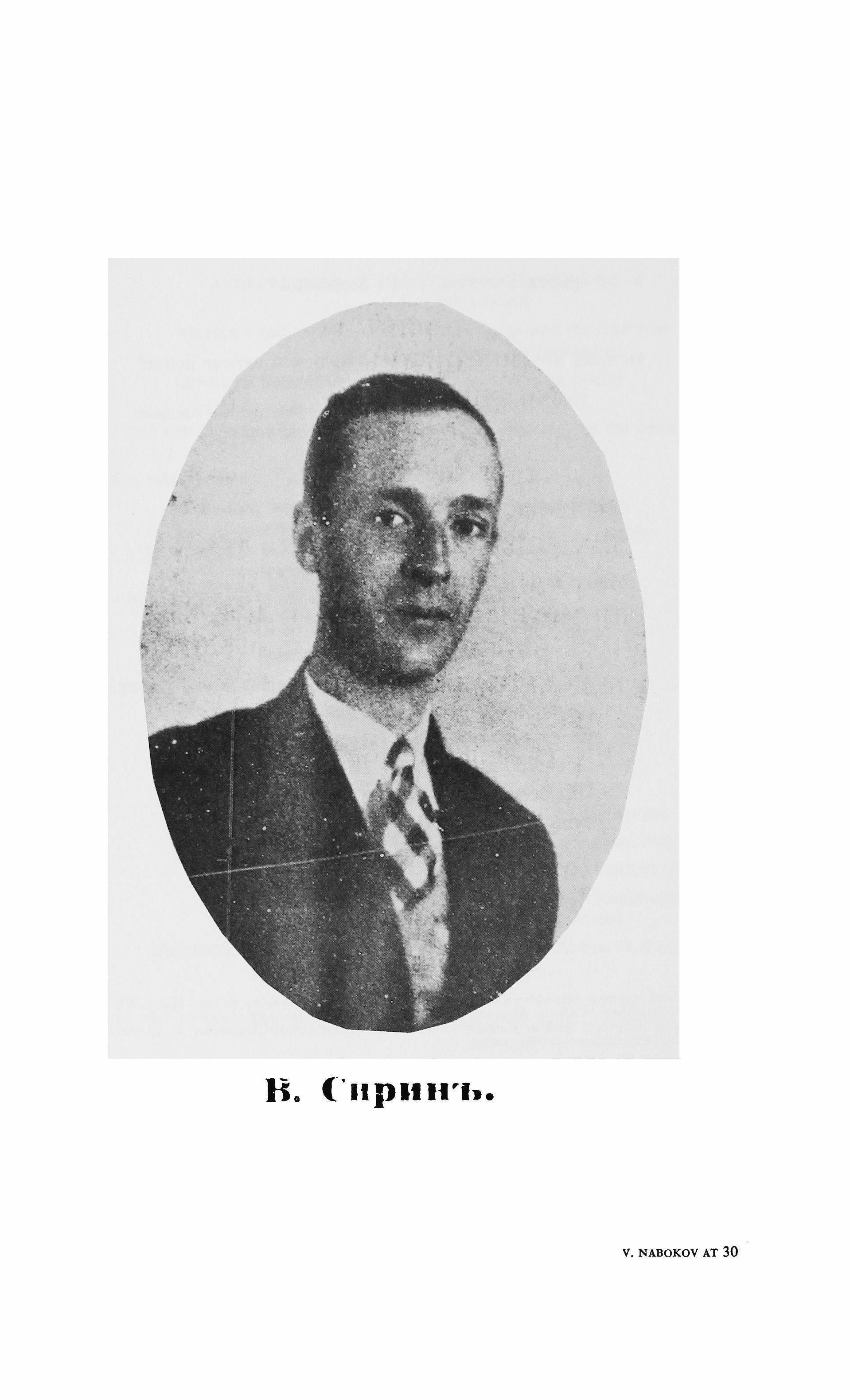
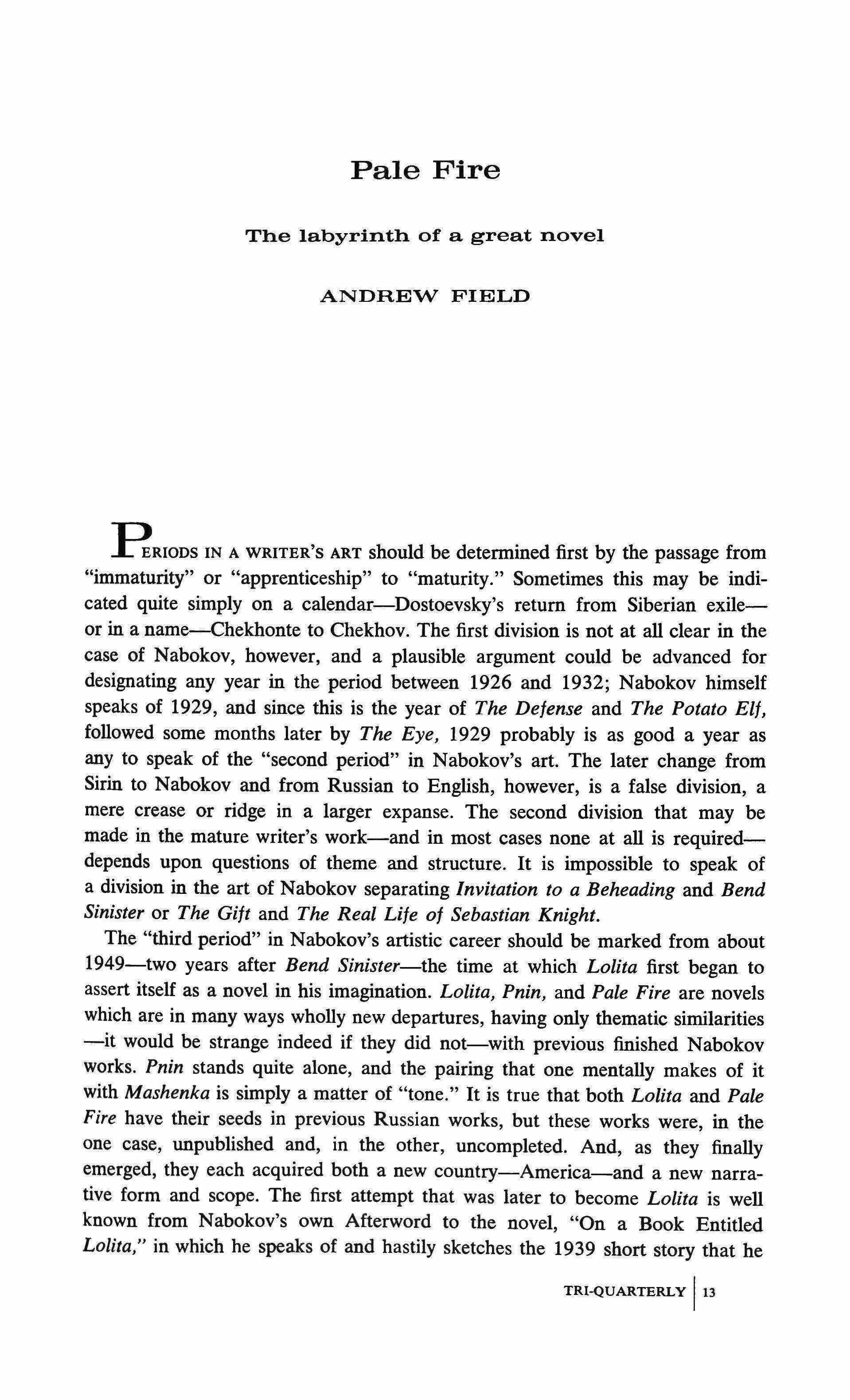
IN A WRITER'S ART should be determined first by the passage from "immaturity" or "apprenticeship" to "maturity." Sometimes this may be indicated quite simply on a calendar-Dostoevsky's return from Siberian exileor in a name-Chekhonte to Chekhov. The first division is not at all clear in the case of Nabokov, however, and a plausible argument could be advanced for designating any year in the period between 1926 and 1932; Nabokov himself speaks of 1929, and since this is the year of The Defense and The Potato Elf, followed some months later by The Eye, 1929 probably is as good a year as any to speak of the "second period" in Nabokov's art. The later change from Sirin to Nabokov and from Russian to English, however, is a false division, a mere crease or ridge in a larger expanse. The second division that may be made in the mature writer's work-and in most cases none at all is requireddepends upon questions of theme and structure. It is impossible to speak of a division in the art of Nabokov separating Invitation to a Beheading and Bend Sinister or The Gift and The Real Life of Sebastian Knight.
The "third period" in Nabokov's artistic career should be marked from about 1949-two years after Bend Sinister-the time at which Lolita first began to assert itself as a novel in his imagination. Lolita, Pnin, and Pale Fire are novels which are in many ways wholly new departures, having only thematic similarities -it would be strange indeed if they did not-with previous finished Nabokov works. Pnin stands quite alone, and the pairing that one mentally makes of it with Mashenka is simply a matter of "tone." It is true that both Lolita and Pale Fire have their seeds in previous Russian works, but these works were, in the one case, unpublished and, in the other, uncompleted. And, as they finally emerged, they each acquired both a new country-Arnerica-and a new narrative form and scope. The first attempt that was later to become Lolita is well known from Nabokov's own Afterword to the novel, "On a Book Entitled Lolita," in which he speaks of and hastily sketches the 1939 short story that he
Y 113
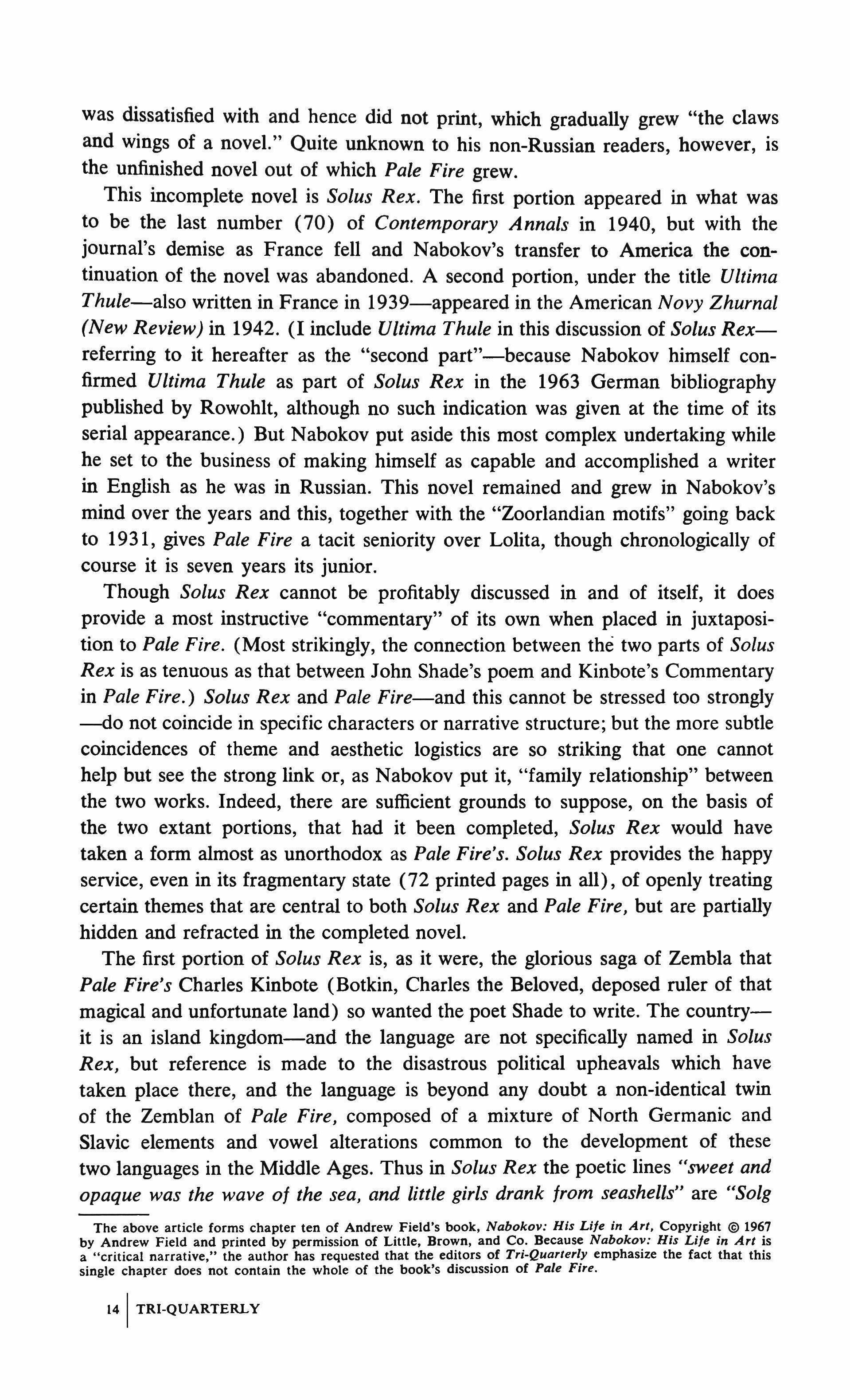
was dissatisfied with and hence did not print, which gradually grew "the claws and wings of a novel." Quite unknown to his non-Russian readers, however, is the unfinished novel out of which Pale Fire grew.
This incomplete novel is Solus Rex. The first portion appeared in what was to be the last number (70) of Contemporary Annals in 1940, but with the journal's demise as France fell and Nabokov's transfer to America the continuation of the novel was abandoned. A second portion, under the title Ultima Thule-also written in France in 1939-appeared in the American Novy Zhurnal (New Review) in 1942. (I include Ultima Thule in this discussion of Solus Rexreferring to it hereafter as the "second part"-because Nabokov himself confirmed Ultima Thule as part of Solus Rex in the 1963 German bibliography published by Rowohlt, although no such indication was given at the time of its serial appearance.) But Nabokov put aside this most complex undertaking while he set to the business of making himself as capable and accomplished a writer in English as he was in Russian. This novel remained and grew in Nabokov's mind over the years and this, together with the "Zoorlandian motifs" going back to 1931, gives Pale Fire a tacit seniority over Lolita, though chronologically of course it is seven years its junior.
Though Solus Rex cannot be profitably discussed in and of itself, it does provide a most instructive "commentary" of its own when placed in juxtaposition to Pale Fire. (Most strikingly, the connection between the two parts of Solus Rex is as tenuous as that between John Shade's poem and Kinbote's Commentary in Pale Fire.) Solus Rex and Pale Fire-and this cannot be stressed too strongly ---do not coincide in specific characters or narrative structure; but the more subtle coincidences of theme and aesthetic logistics are so striking that one cannot help but see the strong link or, as Nabokov put it, "family relationship" between the two works. Indeed, there are sufficient grounds to suppose, on the basis of the two extant portions, that had it been completed, Solus Rex would have taken a form almost as unorthodox as Pale Fire's. Solus Rex provides the happy service, even in its fragmentary state (72 printed pages in all), of openly treating certain themes that are central to both Solus Rex and Pale Fire, but are partially hidden and refracted in the completed novel.
The first portion of Solus Rex is, as it were, the glorious saga of Zembla that Pale Fire's Charles Kinbote (Botkin, Charles the Beloved, deposed ruler of that magical and unfortunate land) so wanted the poet Shade to write. The countryit is an island kingdom-and the language are not specifically named in Solus Rex, but reference is made to the disastrous political upheavals which have taken place there, and the language is beyond any doubt a non-identical twin of the Zemblan of Pale Fire, composed of a mixture of North Germanic and Slavic elements and vowel alterations common to the development of these two languages in the Middle Ages. Thus in Solus Rex the poetic lines "sweet and opaque was the wave of the sea, and little girls drank from seashells" are "Solg
The above article forms chapter ten of Andrew Field's book, Nabokov: His Lile in Art, Copyright @ 1967 by Andrew Field and printed by permission of Little, Brown, and Co. Because Nabokov: His Lite in Art is a "critical narrative," the author has requested that the editors of Tri-Quarterly emphasize the fact that this single chapter does not contain the whole of the book's discussion of Pale Fire.

ud digh vor je sage vel, ud jem gotelm quolm osje musikel"; and the Zemblan lines "Id wodo bin, war id lev lan, Indran tz lil ut roz nitran" are Charles Kinbote's rendering of "Had it lived long it would have been/Lilies without, roses within."
There are three kings in Solus Rex, and one, named Kr, rules as the result of a long court intrigue to do away with the depraved Prince Adolf, whose father, the previous ruler King Gafon, suffered from "quiet madness." There is no indication as to what happened to King Gafon, nor as to whether Adolf (or, in the first portion, Adulf) actually ascended the throne; we know only, from a reference to "poor Adolf" in the second portion, that the prince was not murdered, but escaped into exile instead. The king who is most fully described in Solus Rex is Kr, but it is obviously Prince (or King) Adulf who corresponds most closely to Charles the Beloved, "the self-banished king" of Zembla. And this similarity between Adulf and Charles leads to consideration of a most interesting and likely possibility about King Charles the Beloved's accounts of Zembla and Zemblan history.
Charles Kinbote is a madman. The general assumption that has been made about the kingdom is that it is but a figment of Kinbote's deranged imagination. But if one judges by the story of Prince Adulf and by the character of Kinbote, it becomes quite possible that Zembla both "actually exists" (which, in a work of fiction, it may so do-just as Ramsdale, New Wye, or any suchlike place exists) and, further, it exists in a consciously made-over version in the mad Kinbote's mind. There is therefore every likelihood that the reign and flight of Charles the Beloved did not occur precisely as he relates them: when Kinbote speaks, it is necessary for the reader to exercise care similar to that required with the narration of Hermann Karolvich in Despair. In this reader's judgment there are indeed two Zemblas-the thing itself and the tale as told-but they mirror each other's different insubstantialities, much as the "real" life of John Shade (which we cannot know) mirrors the artistic description of it in the poem Pale Fire.
When Kr, then a university student, first meets his cousin Adulf, the Princea frank and somewhat indolent lecher and pervert-good-naturedly justifies his behavior to Kr by saying:
Well, rumor is the poetry of truth. You're still a boy-and a rather handsome boy at that-and so there's much you don't understand now. I'll simply tell you one thing: all people really are depraved, but when the depravity occurs on the sly, when you hurriedly gobble up your jam in a dark comer till you are sick, or entrust your imagination with God knows what jobs--oh, that doesn't count, that isn't considered a crime; but when a man frankly and diligently satisfies the desires enforced by his demanding body-then people begin to trumpet about debauchery! And more than that: if in my case this legitimate satisfaction was reduced to one and the same monotonous device, public opinion would put up with this-I would at most have been rebuked for changing mistresses too often.
Kr's exposure to the Prince's unchecked perversion is part of a carefully preTRI-QUARTERLy 115
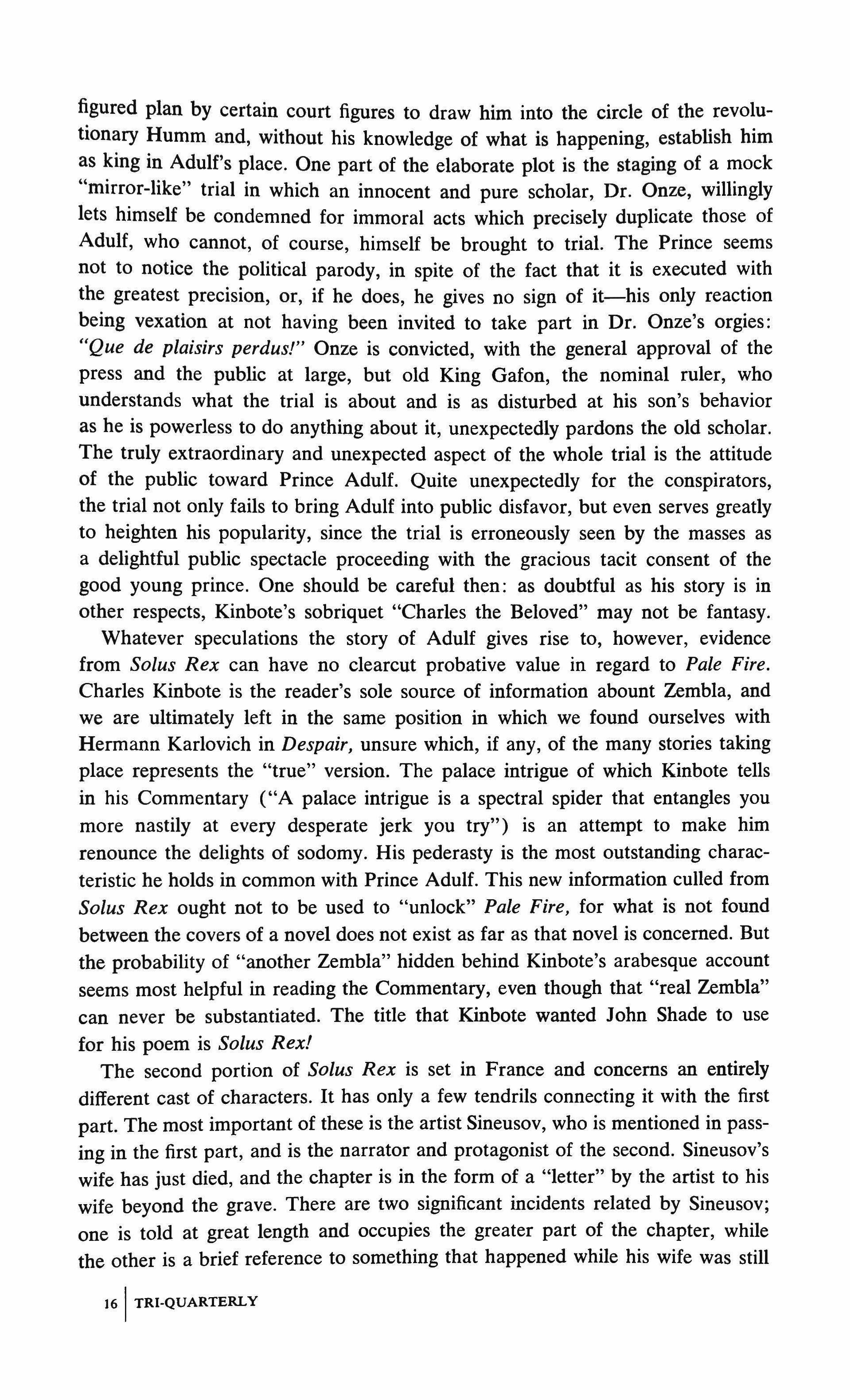
figured plan by certain court figures to draw him into the circle of the revolutionary Humm and, without his knowledge of what is happening, establish him as king in Adulf's place. One part of the elaborate plot is the staging of a mock "mirror-like" trial in which an innocent and pure scholar, Dr. Onze, willingly lets himself be condemned for immoral acts which precisely duplicate those of Adulf, who cannot, of course, himself be brought to trial. The Prince seems not to notice the political parody, in spite of the fact that it is executed with the greatest precision, or, if he does, he gives no sign of it-his only reaction being vexation at not having been invited to take part in Dr. Onze's orgies: "Que de plaisirs perdus!" Onze is convicted, with the general approval of the press and the public at large, but old King Gafon, the nominal ruler, who understands what the trial is about and is as disturbed at his son's behavior as he is powerless to do anything about it, unexpectedly pardons the old scholar. The truly extraordinary and unexpected aspect of the whole trial is the attitude of the public toward Prince Adulf. Quite unexpectedly for the conspirators, the trial not only fails to bring Adulf into public disfavor, but even serves greatly to heighten his popularity, since the trial is erroneously seen by the masses as a delightful public spectacle proceeding with the gracious tacit consent of the good young prince. One should be careful then: as doubtful as his story is in other respects, Kinbote's sobriquet "Charles the Beloved" may not be fantasy. Whatever speculations the story of Adulf gives rise to, however, evidence from Salus Rex can have no clearcut probative value in regard to Pale Fire. Charles Kinbote is the reader's sole source of information abount Zembla, and we are ultimately left in the same position in which we found ourselves with Hermann Karlovich in Despair, unsure which, if any, of the many stories taking place represents the "true" version. The palace intrigue of which Kinbote tells in his Commentary ("A palace intrigue is a spectral spider that entangles you more nastily at every desperate jerk you try") is an attempt to make him renounce the delights of sodomy. His pederasty is the most outstanding characteristic he holds in common with Prince Adulf. This new information culled from Salus Rex ought not to be used to "unlock" Pale Fire, for what is not found between the covers of a novel does not exist as far as that novel is concerned. But the probability of "another Zembla" hidden behind Kinbote's arabesque account seems most helpful in reading the Commentary, even though that "real Zembla" can never be substantiated. The title that Kinbote wanted John Shade to use for his poem is Salus Rex!
The second portion of Salus Rex is set in France and concerns an entirely different cast of characters. It has only a few tendrils connecting it with the first part. The most important of these is the artist Sineusov, who is mentioned in passing in the first part, and is the narrator and protagonist of the second. Sineusov's wife has just died, and the chapter is in the form of a "letter" by the artist to his wife beyond the grave. There are two significant incidents related by Sineusov; one is told at great length and occupies the greater part of the chapter, while the other is a brief reference to something that happened while his wife was still
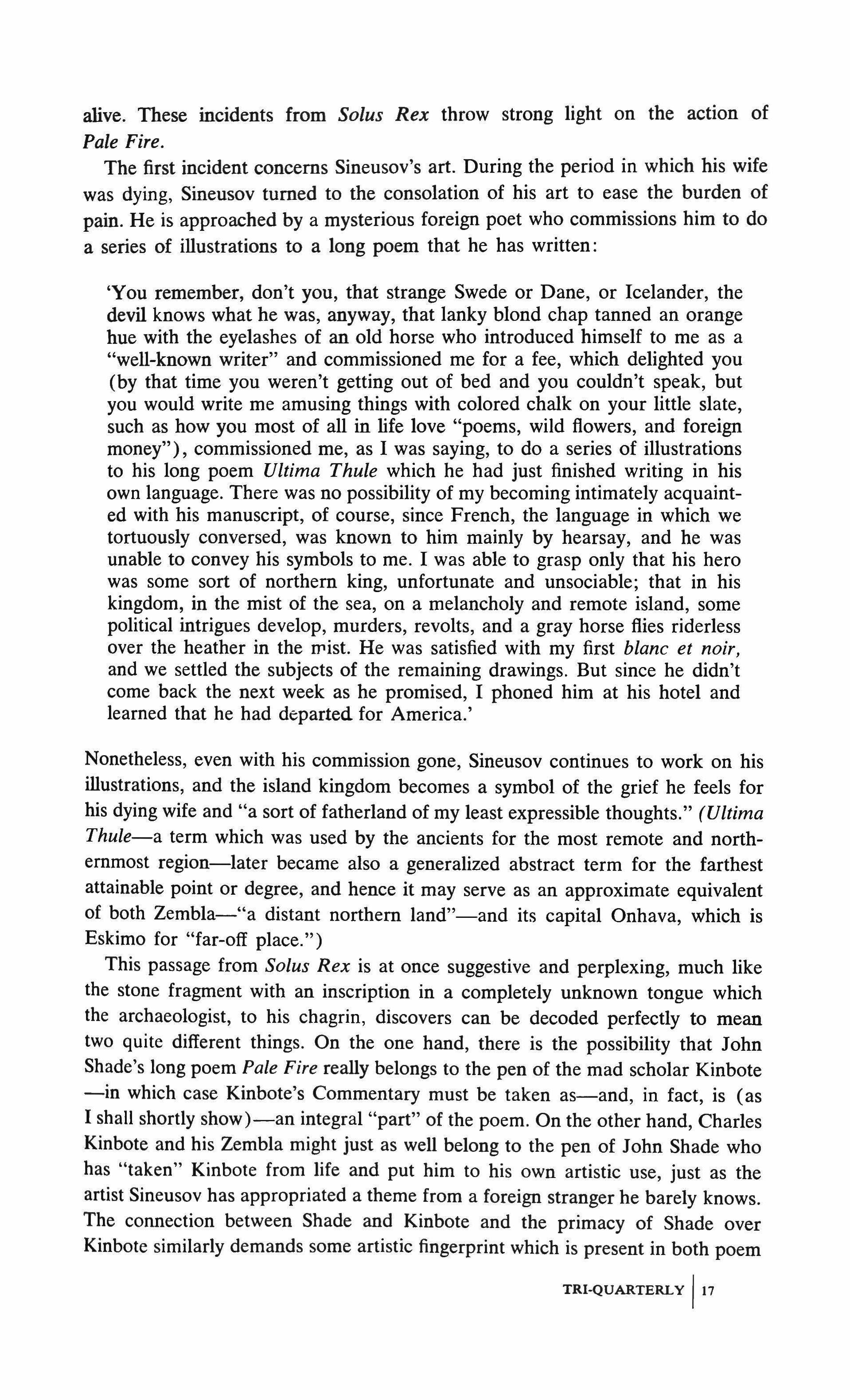
alive. These incidents from Solus Rex throw strong light on the action of Pale Fire.
The first incident concerns Sineusov's art. During the period in which his wife was dying, Sineusov turned to the consolation of his art to ease the burden of pain. He is approached by a mysterious foreign poet who commissions him to do a series of illustrations to a long poem that he has written:
'You remember, don't you, that strange Swede or Dane, or Icelander, the devil knows what he was, anyway, that lanky blond chap tanned an orange hue with the eyelashes of an old horse who introduced himself to me as a "well-known writer" and commissioned me for a fee, which delighted you (by that time you weren't getting out of bed and you couldn't speak, but you would write me amusing things with colored chalk on your little slate, such as how you most of all in life love "poems, wild flowers, and foreign money"), commissioned me, as I was saying, to do a series of illustrations to his long poem Ultima Thule which he had just finished writing in his own language. There was no possibility of my becoming intimately acquainted with his manuscript, of course, since French, the language in which we tortuously conversed, was known to him mainly by hearsay, and he was unable to convey his symbols to me. I was able to grasp only that his hero was some sort of northern king, unfortunate and unsociable; that in his kingdom, in the mist of the sea, on a melancholy and remote island, some political intrigues develop, murders, revolts, and a gray horse flies riderless over the heather in the mist. He was satisfied with my first blanc et noir, and we settled the subjects of the remaining drawings. But since he didn't come back the next week as he promised, I phoned him at his hotel and learned that he had departed for America.'
Nonetheless, even with his commission gone, Sineusov continues to work on his illustrations, and the island kingdom becomes a symbol of the grief he feels for his dying wife and "a sort of fatherland of my least expressible thoughts." (Ultima Thule-a term which was used by the ancients for the most remote and northernmost region-later became also a generalized abstract term for the farthest attainable point or degree, and hence it may serve as an approximate equivalent of both Zembla-"a distant northern land"-and its capital Onhava, which is Eskimo for "far-off place.")
This passage from Solus Rex is at once suggestive and perplexing, much like the stone fragment with an inscription in a completely unknown tongue which the archaeologist, to his chagrin, discovers can be decoded perfectly to mean two quite different things. On the one hand, there is the possibility that John Shade's long poem Pale Fire really belongs to the pen of the mad scholar Kinbote -in which case Kinbote's Commentary must be taken as-and, in fact, is (as I shall shortly show)-an integral "part" of the poem. On the other hand, Charles Kinbote and his Zembla might just as well belong to the pen of John Shade who has "taken" Kinbote from life and put him to his own artistic use, just as the artist Sineusov has appropriated a theme from a foreign stranger he barely knows. The connection between Shade and Kinbote and the primacy of Shade over Kinbote similarly demands some artistic fingerprint which is present in both poem
TRI-QUARTERLY
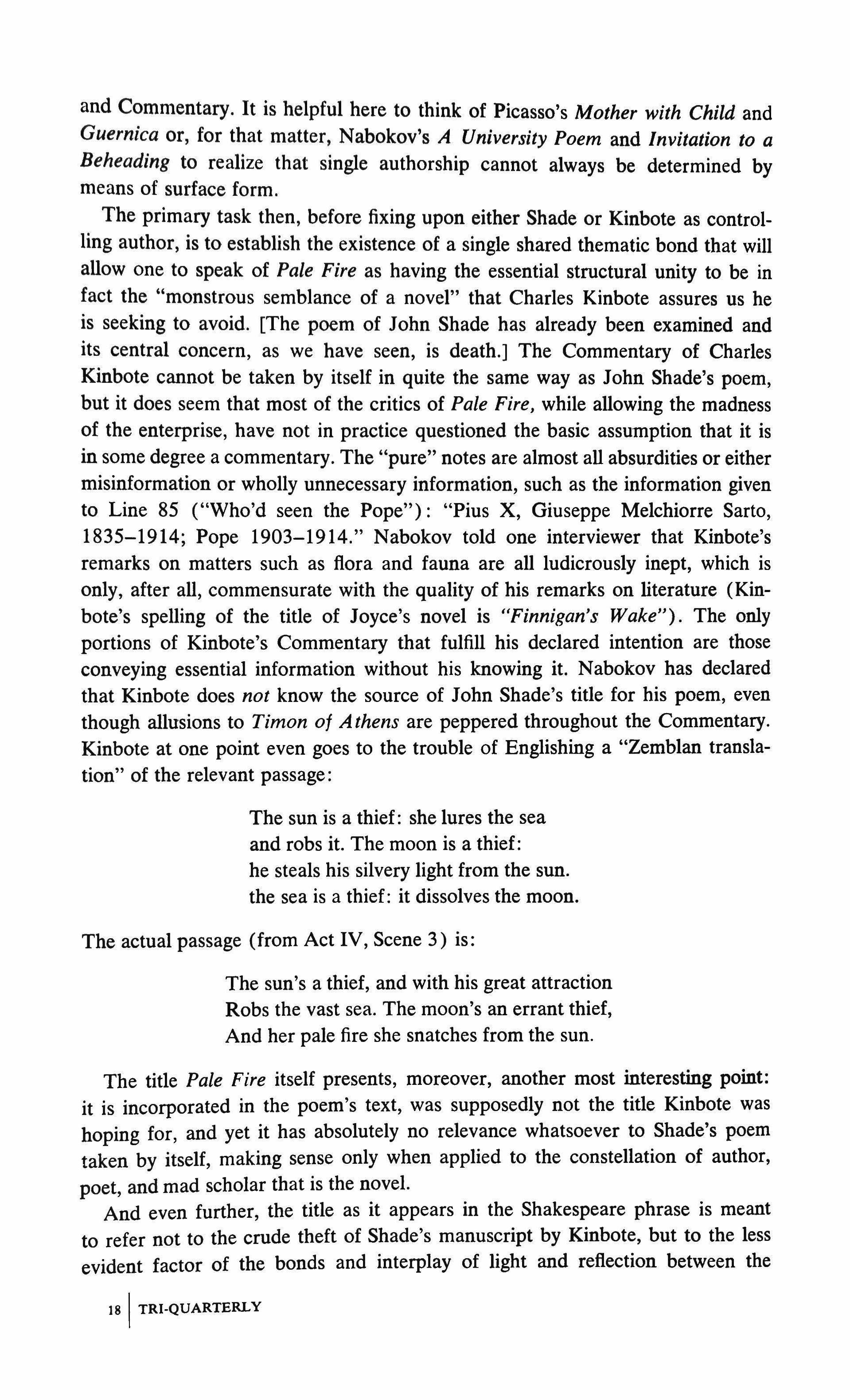
and Commentary. It is helpful here to think of Picasso's Mother with Child and Guernica or, for that matter, Nabokov's A University Poem and Invitation to a Beheading to realize that single authorship cannot always be determined by means of surface form.
The primary task then, before fixing upon either Shade or Kinbote as controlling author, is to establish the existence of a single shared thematic bond that will allow one to speak of Pale Fire as having the essential structural unity to be in fact the "monstrous semblance of a novel" that Charles Kinbote assures us he is seeking to avoid. [The poem of John Shade has already been examined and its central concern, as we have seen, is death.] The Commentary of Charles Kinbote cannot be taken by itself in quite the same way as John Shade's poem, but it does seem that most of the critics of Pale Fire, while allowing the madness of the enterprise, have not in practice questioned the basic assumption that it is in some degree a commentary. The "pure" notes are almost all absurdities or either misinformation or wholly unnecessary information, such as the information given to Line 85 ("Who'd seen the Pope"): "Pius X, Giuseppe Melchiorre Sarto, 1835-1914; Pope 1903-1914." Nabokov told one interviewer that Kinbote's remarks on matters such as flora and fauna are all ludicrously inept, which is only, after all, commensurate with the quality of his remarks on literature (Kinbote's spelling of the title of Joyce's novel is "Finnigan's Wake"). The only portions of Kinbote's Commentary that fulfill his declared intention are those conveying essential information without his knowing it. Nabokov has declared that Kinbote does not know the source of John Shade's title for his poem, even though allusions to Timon of Athens are peppered throughout the Commentary. Kinbote at one point even goes to the trouble of Englishing a "Zemblan translation" of the relevant passage:
The sun is a thief: she lures the sea and robs it. The moon is a thief: he steals his silvery light from the sun. the sea is a thief: it dissolves the moon.
The actual passage (from Act IV, Scene 3) is:
The sun's a thief, and with his great attraction Robs the vast sea. The moon's an errant thief, And her pale fire she snatches from the sun.
The title Pale Fire itself presents, moreover, another most interesting point: it is incorporated in the poem's text, was supposedly not the title Kinbote was hoping for, and yet it has absolutely no relevance whatsoever to Shade's poem taken by itself, making sense only when applied to the constellation of author, poet, and mad scholar that is the novel.
And even further, the title as it appears in the Shakespeare phrase is meant to refer not to the crude theft of Shade's manuscript by Kinbote, but to the less evident factor of the bonds and interplay of light and reflection between the
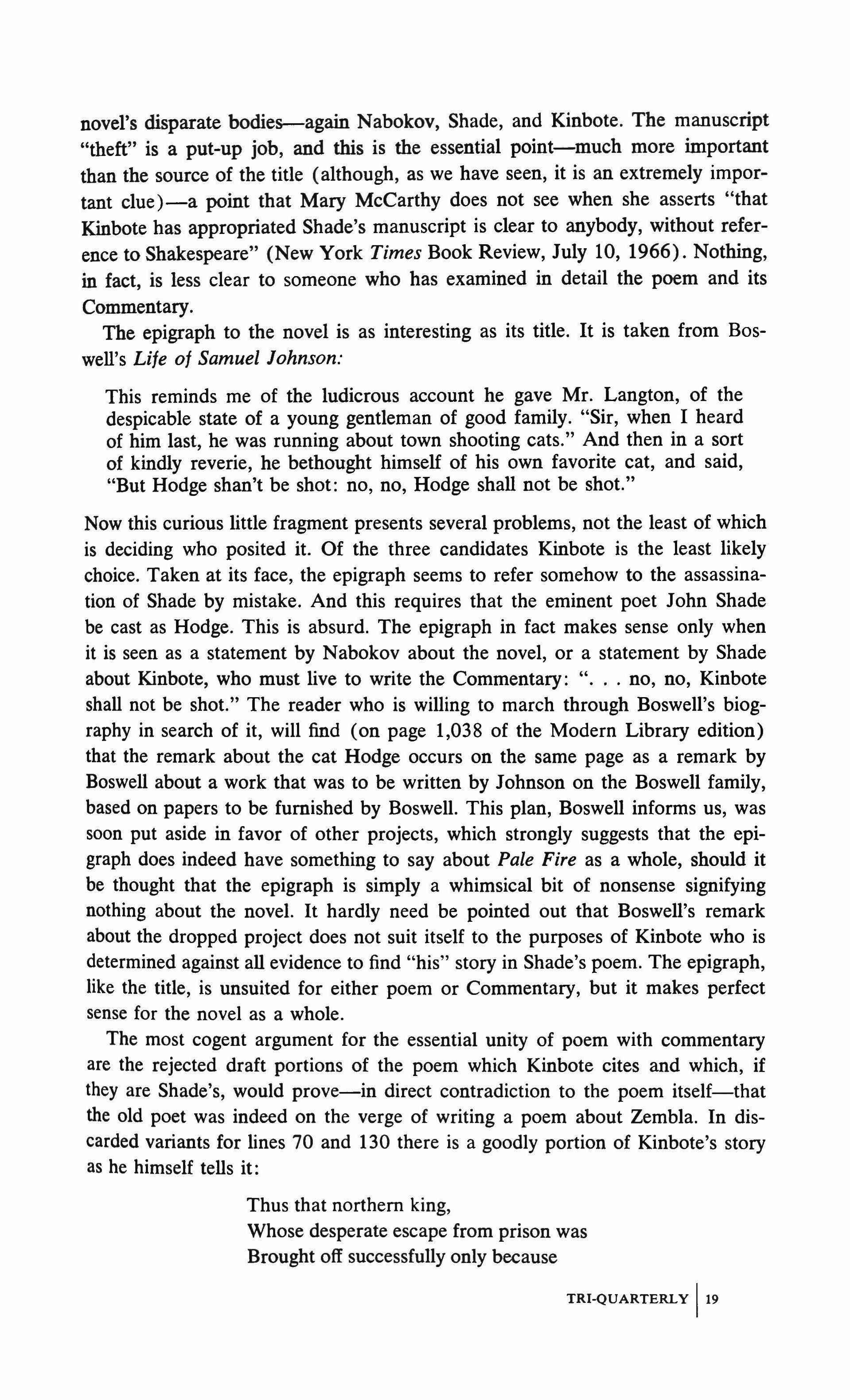
novel's disparate bodies--again Nabokov, Shade, and Kinbote. The manuscript "theft" is a put-up job, and this is the essential point-much more important than the source of the title (although, as we have seen, it is an extremely important clue)-a point that Mary McCarthy does not see when she asserts "that Kinbote has appropriated Shade's manuscript is clear to anybody, without reference to Shakespeare" (New York Times Book Review, July 10, 1966). Nothing, in fact, is less clear to someone who has examined in detail the poem and its Commentary.
The epigraph to the novel is as interesting as its title. It is taken from Boswell's Life of Samuel Johnson:
This reminds me of the ludicrous account he gave Mr. Langton, of the despicable state of a young gentleman of good family. "Sir, when I heard of him last, he was running about town shooting cats." And then in a sort of kindly reverie, he bethought himself of his own favorite cat, and said, "But Hodge shan't be shot: no, no, Hodge shall not be shot."
Now this curious little fragment presents several problems, not the least of which is deciding who posited it. Of the three candidates Kinbote is the least likely choice. Taken at its face, the epigraph seems to refer somehow to the assassination of Shade by mistake. And this requires that the eminent poet John Shade be cast as Hodge. This is absurd. The epigraph in fact makes sense only when it is seen as a statement by Nabokov about the novel, or a statement by Shade about Kinbote, who must live to write the Commentary: ". no, no, Kinbote shall not be shot." The reader who is willing to march through Boswell's biography in search of it, will find (on page 1,038 of the Modern Library edition) that the remark about the cat Hodge occurs on the same page as a remark by Boswell about a work that was to be written by Johnson on the Boswell family, based on papers to be furnished by Boswell. This plan, Boswell informs us, was soon put aside in favor of other projects, which strongly suggests that the epigraph does indeed have something to say about Pale Fire as a whole, should it be thought that the epigraph is simply a whimsical bit of nonsense signifying nothing about the novel. It hardly need be pointed out that Boswell's remark about the dropped project does not suit itself to the purposes of Kinbote who is determined against all evidence to find "his" story in Shade's poem. The epigraph, like the title, is unsuited for either poem or Commentary, but it makes perfect sense for the novel as a whole.
The most cogent argument for the essential unity of poem with commentary are the rejected draft portions of the poem which Kinbote cites and which, if they are Shade's, would prove-in direct contradiction to the poem itself-that the old poet was indeed on the verge of writing a poem about Zembla. In discarded variants for lines 70 and 130 there is a goodly portion of Kinbote's story as he himself tells it:
Thus that northern king, Whose desperate escape from prison was Brought off successfully only because

Some forty of his followers that night Impersonated him and sped his flight. It is conceivable that John Shade might have used the fantasies of his boring and intrusive neighbor in a poem, but there is no logical reason to suppose that such themes could have an integral place in this poem. There again we have a choice as to the author of the Commentary: Charles Kinbote speaking in the voice of "John Shade," or John Shade dropping back into his first voice (the craggy poet) within the context of the phantasmagoria of Charles Kinbote (the second voice). The primary author--even without Nabokov's acknowledgement that Kinbote really does not know what is going on in Shade's poem-must be John Shade.
In all, considerably less than a quarter of what Kinbote writes is even ostensibly concerned, much less actually connected, with the Shade poem. The rest falls into two categories: Kinbote's conversations with Shade, and Kinbote's account of his miraculous escape from Zembla and the subsequent hunt for him by the Extremist assassin Jacob Gradus. Both these themes are to a great extent concerned with death, and this is the unifying bond between the poem and the commentary-in a word, the subject of Pale Fire.
Kinbote is, by his own constant avowal, a deeply devout Christian. In a long religious conversation with Shade, Kinbote asserts: "I know also that the world could not have occurred fortuitously and that somehow Mind is involved as a main factor in the making of the universe. In trying to find the right name for that Universal Mind, or First Cause, or the Absolute, or Nature, I submit that the Name of God has priority." But, as Mary McCarthy correctly points out (The New Republic, June 4, 1962), the religious conversations are of no real significance, and given its primary concern, the novel is remarkably free of any religious symbolism. Kinbote's religious fervor seems in fact to be one of the madman's whimsical pretenses. He has another secret, greater even than Zembla, and at one point he tells Shade: "As soon as your poem is ready, as soon as the glory of Zembla merges with the glory of your verse, I intend to divulge to you an ultimate truth, an extraordinary secret, that will put your mind completely at rest." A very similar "ultimate truth" figures most prominently in Solus Rex.
As John Shade's death is the necessary conclusion to his poem-and, being planned from the very first line, that death must be either suicide or a literary device-the Commentary vacillates between Kinbote's fear of murder and his impulse to commit suicide. In a delightfully comic twist, Kinbote's "Christianity" is used to justify self-destruction:
When the soul adores Him Who guides it through mortal life, when it distinguishes His sign at every tum of the trial, painted on the boulder, and notched in the fir trunk, when every page in the book of one's personal fate bears His watermark, how can one doubt that He will also preserve us through all eternity? So what can stop one from effecting the transition? What can help us to resist the intolerable temptation? What can prevent us from yielding to the burning desire for merging in God? We who burrow in filth every day may be forgiven perhaps the one sin that ends all sins.
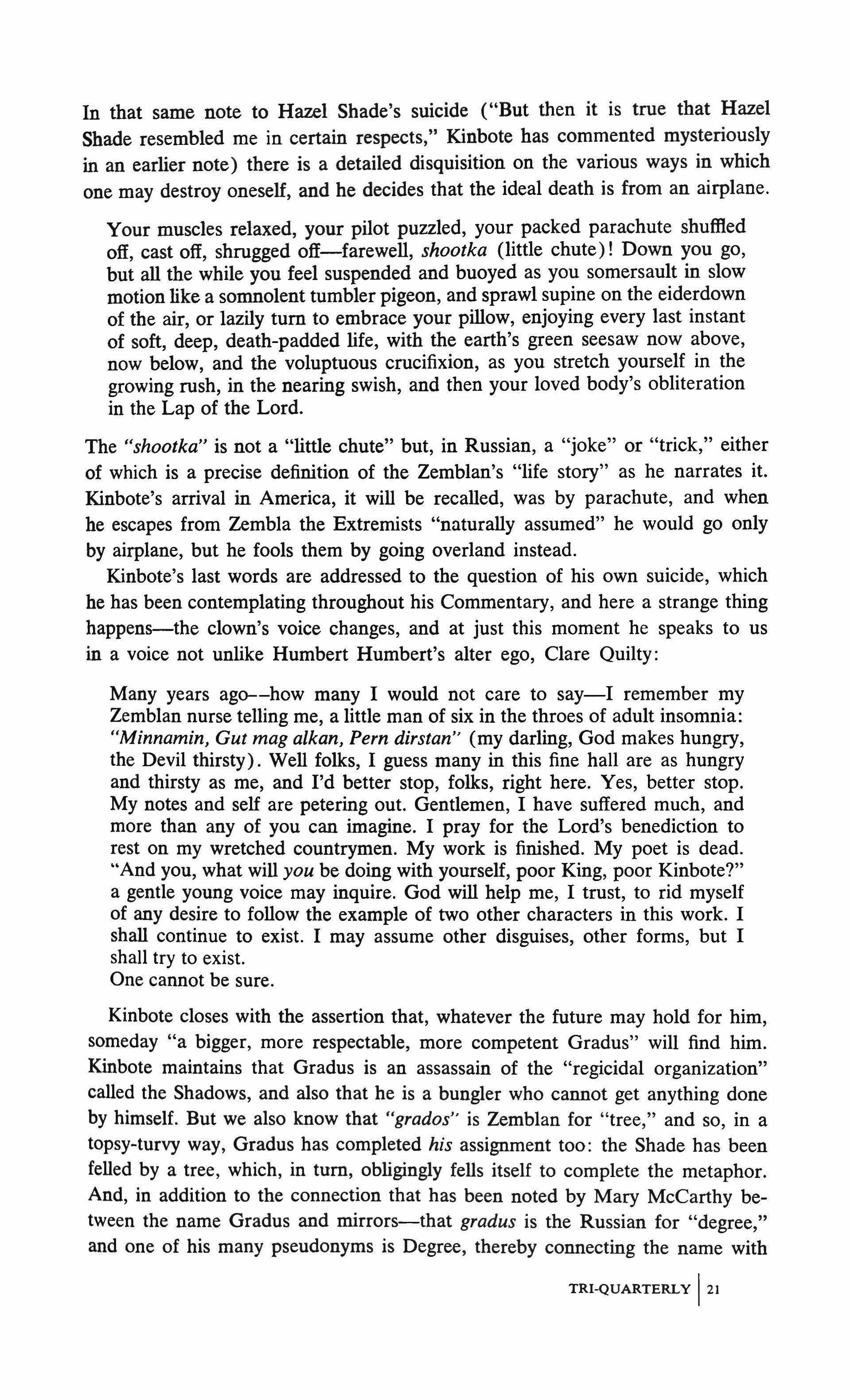
In that same note to Hazel Shade's suicide ("But then it is true that Hazel Shade resembled me in certain respects," Kinbote has commented mysteriously in an earlier note) there is a detailed disquisition on the various ways in which one may destroy oneself, and he decides that the ideal death is from an airplane. Your muscles relaxed, your pilot puzzled, your packed parachute shuffled off, cast off, shrugged off-farewell, shootka (little chute)! Down you go, but all the while you feel suspended and buoyed as you somersault in slow motion like a somnolent tumbler pigeon, and sprawl supine on the eiderdown of the air, or lazily tum to embrace your pillow, enjoying every last instant of soft, deep, death-padded life, with the earth's green seesaw now above, now below, and the voluptuous crucifixion, as you stretch yourself in the growing rush, in the nearing swish, and then your loved body's obliteration in the Lap of the Lord.
The "shootka" is not a "little chute" but, in Russian, a "joke" or "trick," either of which is a precise definition of the Zemblan's "life story" as he narrates it. Kinbote's arrival in America, it will be recalled, was by parachute, and when he escapes from Zembla the Extremists "naturally assumed" he would go only by airplane, but he fools them by going overland instead.
Kinbote's last words are addressed to the question of his own suicide, which he has been contemplating throughout his Commentary, and here a strange thing happens-the clown's voice changes, and at just this moment he speaks to us in a voice not unlike Humbert Humbert's alter ego, Clare Quilty:
Many years ago--how many I would not care to say-I remember my Zemblan nurse telling me, a little man of six in the throes of adult insomnia: "Minnamin, Gut mag alkan, Pern dirstan" (my darling, God makes hungry, the Devil thirsty). Well folks, I guess many in this fine hall are as hungry and thirsty as me, and I'd better stop, folks, right here. Yes, better stop. My notes and self are petering out. Gentlemen, I have suffered much, and more than any of you can imagine. I pray for the Lord's benediction to rest on my wretched countrymen. My work is finished. My poet is dead. "And you, what will you be doing with yourself, poor King, poor Kinbote?" a gentle young voice may inquire. God will help me, I trust, to rid myself of any desire to follow the example of two other characters in this work. I shall continue to exist. I may assume other disguises, other forms, but I shall try to exist.
One cannot be sure.
Kinbote closes with the assertion that, whatever the future may hold for him, someday "a bigger, more respectable, more competent Gradus" will find him. Kinbote maintains that Gradus is an assassain of the "regicidal organization" called the Shadows, and also that he is a bungler who cannot get anything done by himself. But we also know that "grados" is Zemblan for "tree," and so, in a topsy-turvy way, Gradus has completed his assignment too: the Shade has been felled by a tree, which, in tum, obligingly fells itself to complete the metaphor. And, in addition to the connection that has been noted by Mary McCarthy between the name Gradus and mirrors-that gradus is the Russian for "degree," and one of his many pseudonyms is Degree, thereby connecting the name with
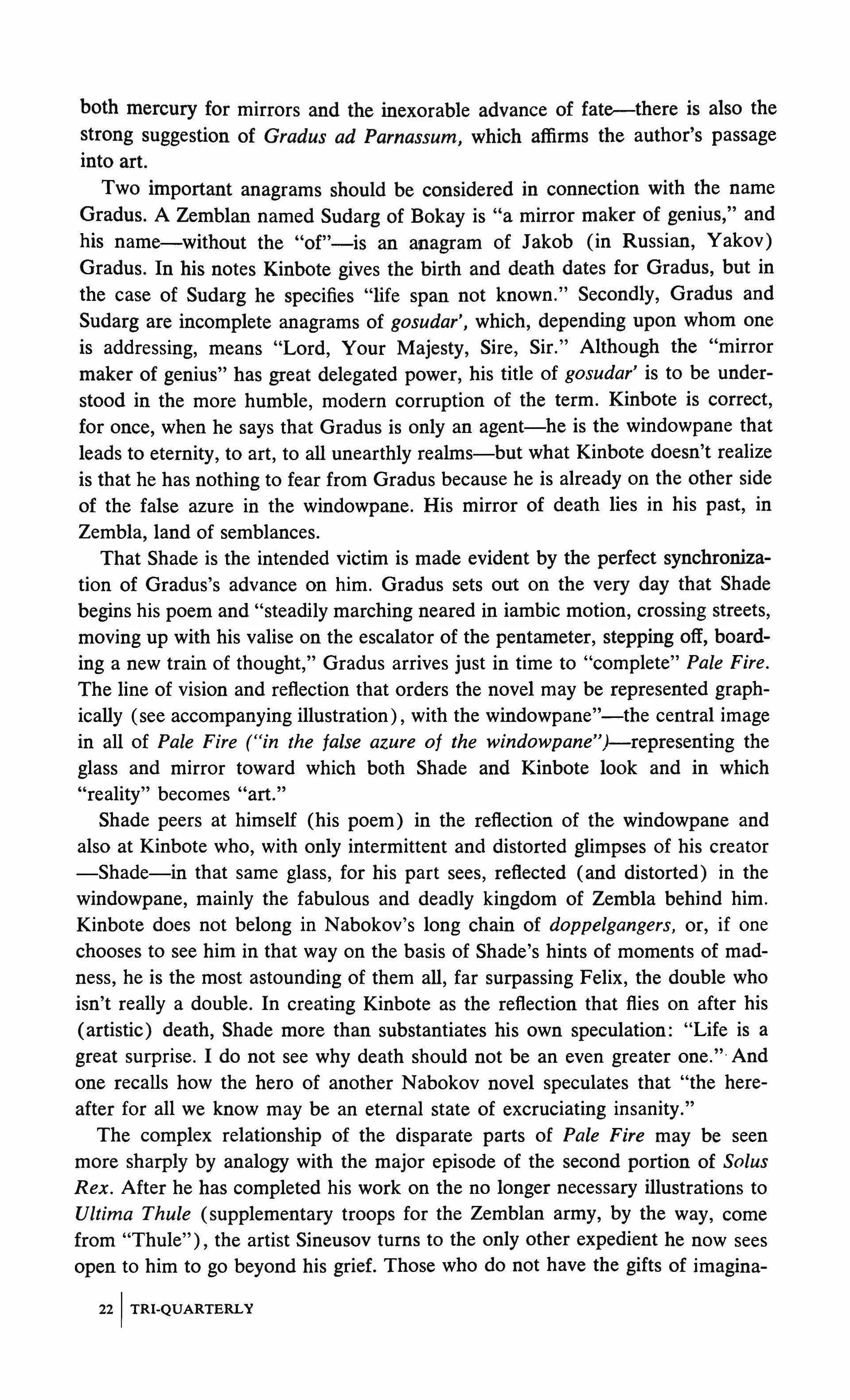
both mercury for mirrors and the inexorable advance of fate-s-there is also the strong suggestion of Gradus ad Parnassum, which affirms the author's passage into art.
Two important anagrams should be considered in connection with the name Gradus. A Zemblan named Sudarg of Bokay is "a mirror maker of genius," and his name-s-without the "of"-is an anagram of Jakob (in Russian, Yakov) Gradus. In his notes Kinbote gives the birth and death dates for Gradus, but in the case of Sudarg he specifies "life span not known." Secondly, Gradus and Sudarg are incomplete anagrams of gosudar', which, depending upon whom one is addressing, means "Lord, Your Majesty, Sire, Sir." Although the "mirror maker of genius" has great delegated power, his title of gosudar' is to be understood in the more humble, modern corruption of the term. Kinbote is correct, for once, when he says that Gradus is only an agent-he is the windowpane that leads to eternity, to art, to all unearthly realms-but what Kinbote doesn't realize is that he has nothing to fear from Gradus because he is already on the other side of the false azure in the windowpane. His mirror of death lies in his past, in Zembla, land of semblances.
That Shade is the intended victim is made evident by the perfect synchronization of Gradus's advance on him. Gradus sets out on the very day that Shade begins his poem and "steadily marching neared in iambic motion, crossing streets, moving up with his valise on the escalator of the pentameter, stepping off, boarding a new train of thought," Gradus arrives just in time to "complete" Pale Fire. The line of vision and reflection that orders the novel may be represented graphically (see accompanying illustration), with the windowpane"-the central image in all of Pale Fire (Hin the false azure of the windowpane")-representing the glass and mirror toward which both Shade and Kinbote look and in which "reality" becomes "art."
Shade peers at himself (his poem) in the reflection of the windowpane and also at Kinbote who, with only intermittent and distorted glimpses of his creator -Shade-in that same glass, for his part sees, reflected (and distorted) in the windowpane, mainly the fabulous and deadly kingdom of Zembla behind him. Kinbote does not belong in Nabokov's long chain of doppelgangers, or, if one chooses to see him in that way on the basis of Shade's hints of moments of madness, he is the most astounding of them all, far surpassing Felix, the double who isn't really a double. In creating Kinbote as the reflection that flies on after his (artistic) death, Shade more than substantiates his own speculation: "Life is a great surprise. I do not see why death should not be an even greater one."· And one recalls how the hero of another Nabokov novel speculates that "the hereafter for all we know may be an eternal state of excruciating insanity."
The complex relationship of the disparate parts of Pale Fire may be seen more sharply by analogy with the major episode of the second portion of Solus Rex. After he has completed his work on the no longer necessary illustrations to Ultima Thule (supplementary troops for the Zemblan army, by the way, come from "Thule"), the artist Sineusov turns to the only other expedient he now sees open to him to go beyond his grief. Those who do not have the gifts of imagina-
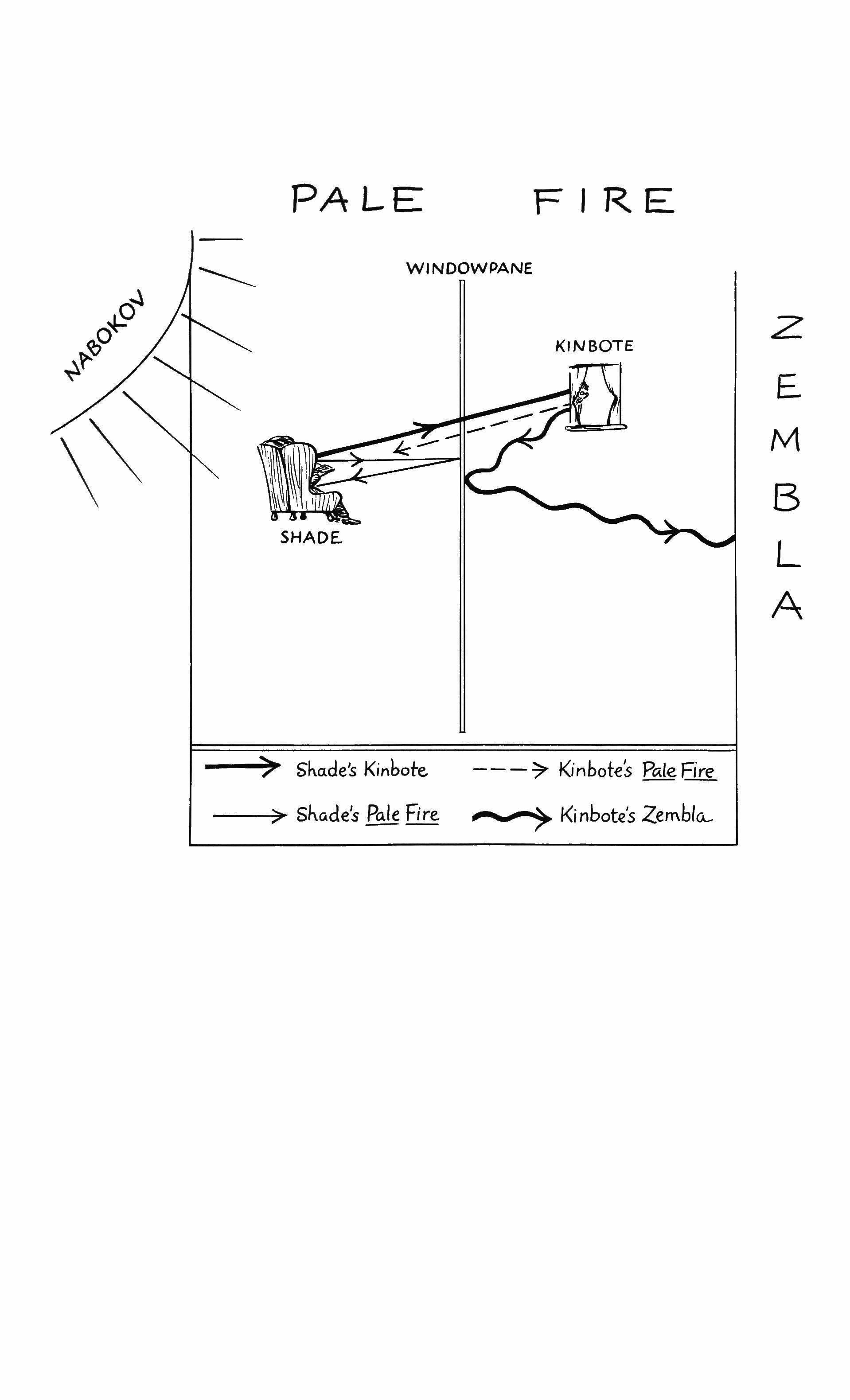
)� Sha.de� Kinbote ---� Kinbotes p(;ileFire
--).::. shade� Pale Fire � Kinbote's ZemblCl.-
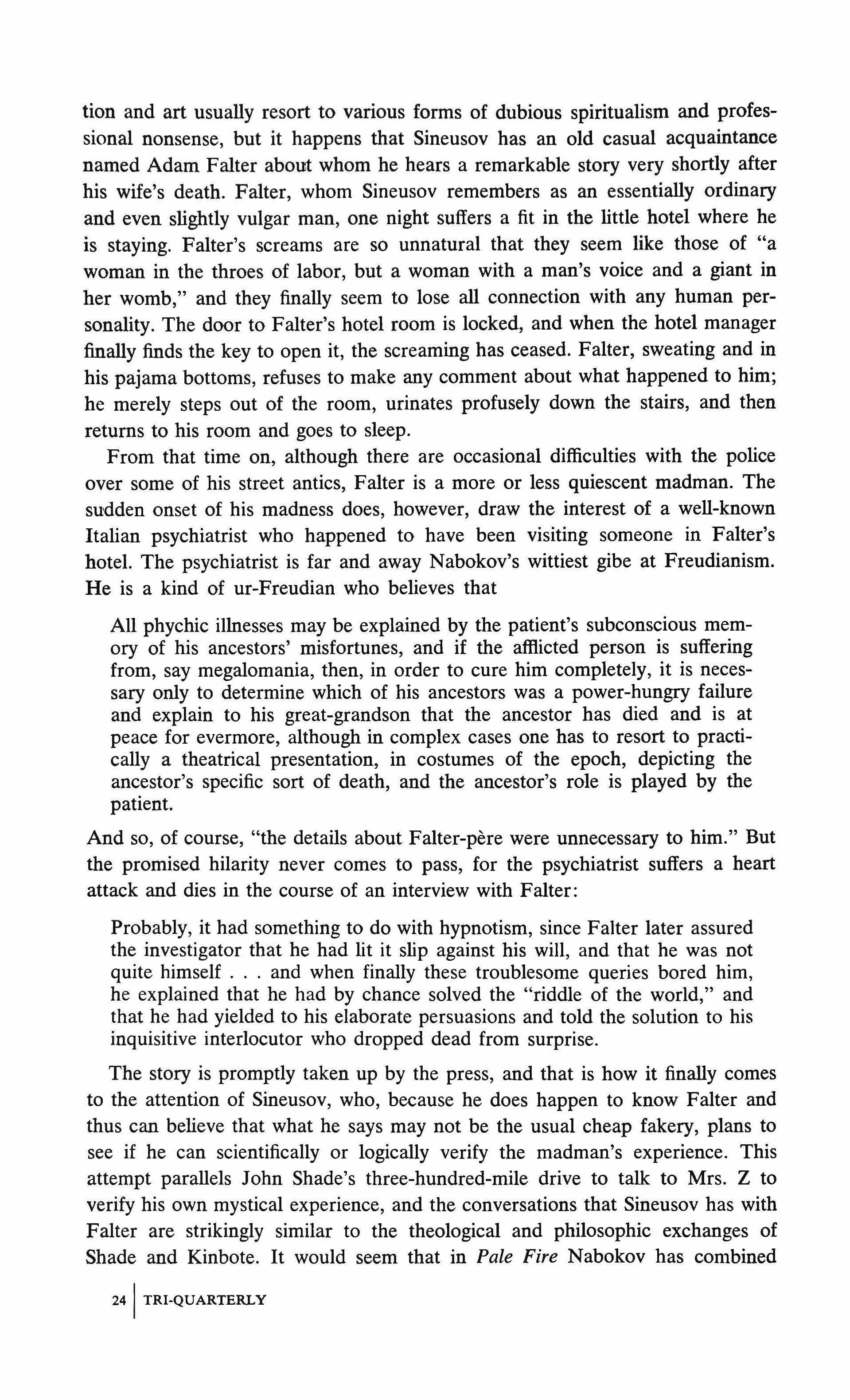
tion and art usually resort to various forms of dubious spiritualism and professional nonsense, but it happens that Sineusov has an old casual acquaintance named Adam Falter about whom he hears a remarkable story very shortly after his wife's death. Falter, whom Sineusov remembers as an essentially ordinary and even slightly vulgar man, one night suffers a fit in the little hotel where he is staying. Falter's screams are so unnatural that they seem like those of "a woman in the throes of labor, but a woman with a man's voice and a giant in her womb," and they finally seem to lose all connection with any human personality. The door to Falter's hotel room is locked, and when the hotel manager finally finds the key to open it, the screaming has ceased. Falter, sweating and in his pajama bottoms, refuses to make any comment about what happened to him; he merely steps out of the room, urinates profusely down the stairs, and then returns to his room and goes to sleep.
From that time on, although there are occasional difficulties with the police over some of his street antics, Falter is a more or less quiescent madman. The sudden onset of his madness does, however, draw the interest of a well-known Italian psychiatrist who happened to have been visiting someone in Falter's hotel. The psychiatrist is far and away Nabokov's wittiest gibe at Freudianism. He is a kind of ur-Freudian who believes that
All phychic illnesses may be explained by the patient's subconscious memory of his ancestors' misfortunes, and if the afflicted person is suffering from, say megalomania, then, in order to cure him completely, it is necessary only to determine which of his ancestors was a power-hungry failure and explain to his great-grandson that the ancestor has died and is at peace for evermore, although in complex cases one has to resort to practically a theatrical presentation, in costumes of the epoch, depicting the ancestor's specific sort of death, and the ancestor's role is played by the patient.
And so, of course, "the details about Falter-pere were unnecessary to him." But the promised hilarity never comes to pass, for the psychiatrist suffers a heart attack and dies in the course of an interview with Falter:
Probably, it had something to do with hypnotism, since Falter later assured the investigator that he had lit it slip against his will, and that he was not quite himself and when finally these troublesome queries bored him, he explained that he had by chance solved the "riddle of the world," and that he had yielded to his elaborate persuasions and told the solution to his inquisitive interlocutor who dropped dead from surprise.
The story is promptly taken up by the press, and that is how it finally comes to the attention of Sineusov, who, because he does happen to know Falter and thus can believe that what he says may not be the usual cheap fakery, plans to see if he can scientifically or logically verify the madman's experience. This attempt parallels John Shade's three-hundred-mile drive to talk to Mrs. Z to verify his own mystical experience, and the conversations that Sineusov has with Falter are strikingly similar to the theological and philosophic exchanges of Shade and Kinbote. It would seem that in Pale Fire Nabokov has combined
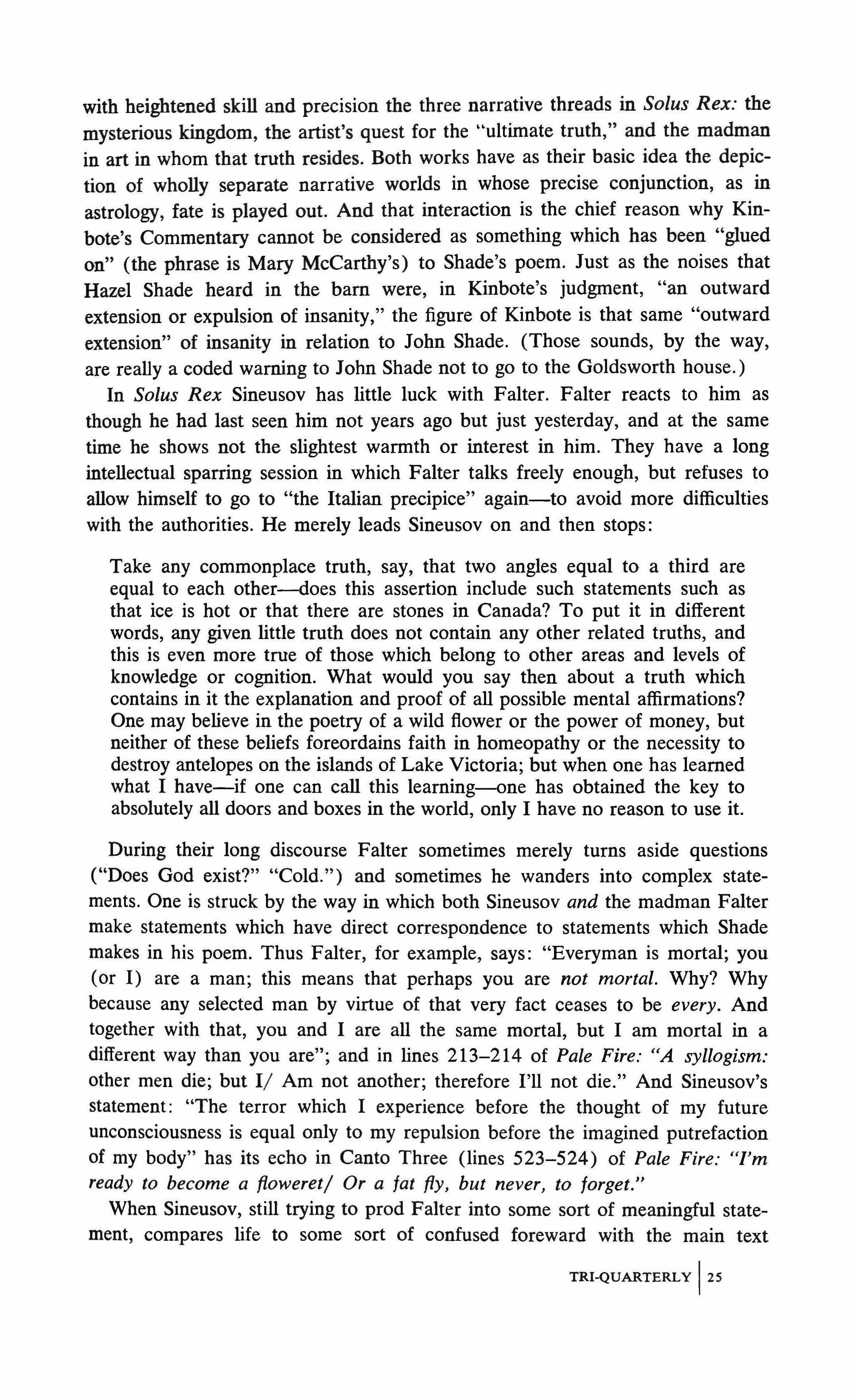
with heightened skill and precision the three narrative threads in Solus Rex: the mysterious kingdom, the artist's quest for the "ultimate truth," and the madman in art in whom that truth resides. Both works have as their basic idea the depiction of wholly separate narrative worlds in whose precise conjunction, as in astrology, fate is played out. And that interaction is the chief reason why Kinbote's Commentary cannot be considered as something which has been "glued on" (the phrase is Mary McCarthy's) to Shade's poem. Just as the noises that Hazel Shade heard in the bam were, in Kinbote's judgment, "an outward extension or expulsion of insanity," the figure of Kinbote is that same "outward extension" of insanity in relation to John Shade. (Those sounds, by the way, are really a coded warning to John Shade not to go to the Goldsworth house.)
In Solus Rex Sineusov has little luck with Falter. Falter reacts to him as though he had last seen him not years ago but just yesterday, and at the same time he shows not the slightest warmth or interest in him. They have a long intellectual sparring session in which Falter talks freely enough, but refuses to allow himself to go to "the Italian precipice" again-to avoid more difficulties with the authorities. He merely leads Sineusov on and then stops:
Take any commonplace truth, say, that two angles equal to a third are equal to each other--does this assertion include such statements such as that ice is hot or that there are stones in Canada? To put it in different words, any given little truth does not contain any other related truths, and this is even more true of those which belong to other areas and levels of knowledge or cognition. What would you say then about a truth which contains in it the explanation and proof of all possible mental affirmations? One may believe in the poetry of a wild flower or the power of money, but neither of these beliefs foreordains faith in homeopathy or the necessity to destroy antelopes on the islands of Lake Victoria; but when one has learned what I have-if one can call this learning-one has obtained the key to absolutely all doors and boxes in the world, only I have no reason to use it.
During their long discourse Falter sometimes merely turns aside questions ("Does God exist?" "Cold.") and sometimes he wanders into complex statements. One is struck by the way in which both Sineusov and the madman Falter make statements which have direct correspondence to statements which Shade makes in his poem. Thus Falter, for example, says: "Everyman is mortal; you (or I) are a man; this means that perhaps you are not mortal. Why? Why because any selected man by virtue of that very fact ceases to be every. And together with that, you and I are all the same mortal, but I am mortal in a different way than you are"; and in lines 213-214 of Pale Fire: "A syllogism: other men die; but 1/ Am not another; therefore I'll not die." And Sineusov's statement: "The terror which I experience before the thought of my future unconsciousness is equal only to my repulsion before the imagined putrefaction of my body" has its echo in Canto Three (lines 523-524) of Pale Fire: "I'm ready to become a floweret/ Or a fat fly, but never, to forget."
When Sineusov, still trying to prod Falter into some sort of meaningful statement, compares life to some sort of confused foreward with the main text
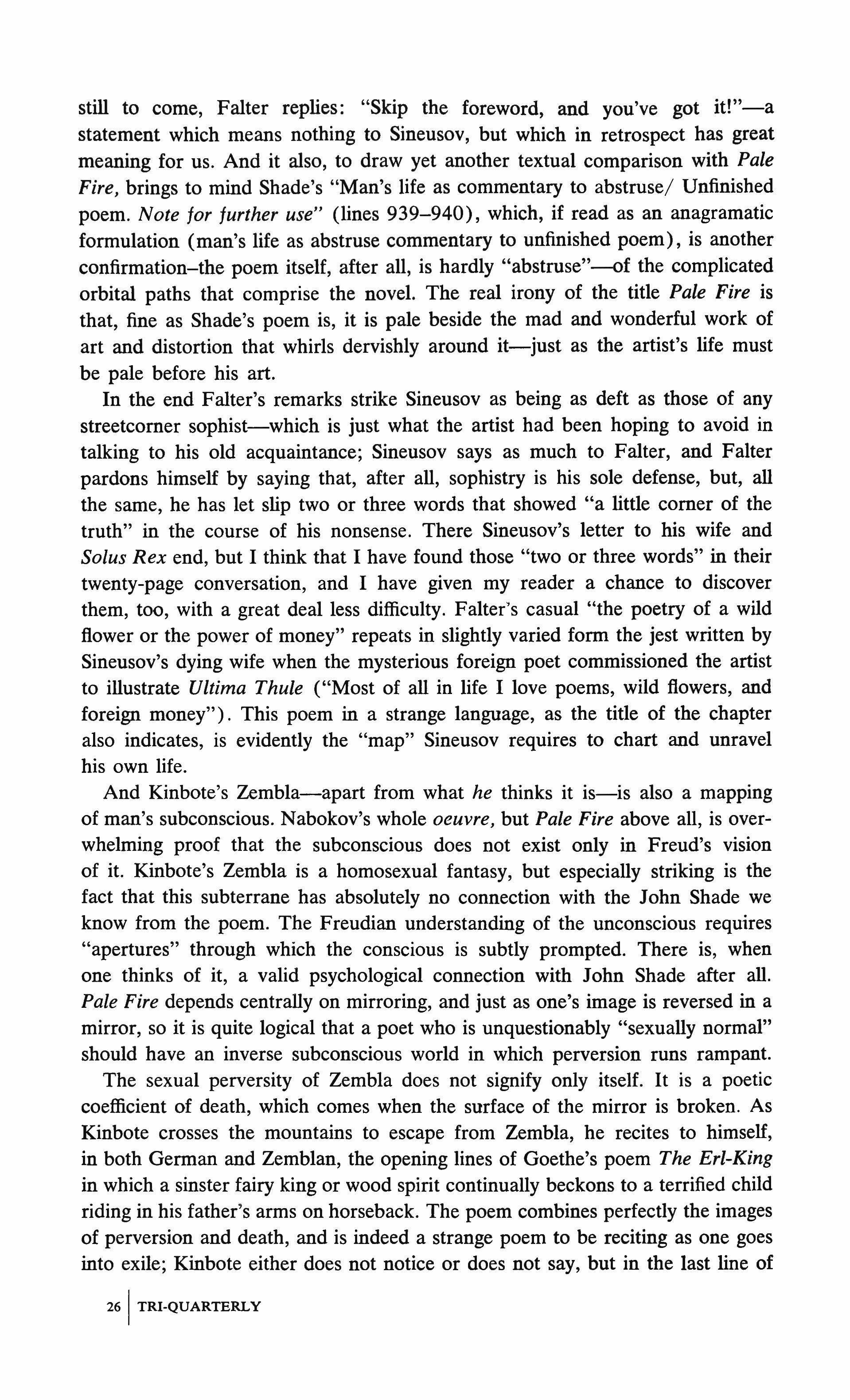
still to come, Falter replies: "Skip the foreword, and you've got it!"-a statement which means nothing to Sineusov, but which in retrospect has great meaning for us. And it also, to draw yet another textual comparison with Pale Fire, brings to mind Shade's "Man's life as commentary to abstruse/ Unfinished poem. Note for further use" (lines 939-940), which, if read as an anagramatic formulation (man's life as abstruse commentary to unfinished poem), is another confirmation-the poem itself, after all, is hardly "abstruse"---of the complicated orbital paths that comprise the novel. The real irony of the title Pale Fire is that, fine as Shade's poem is, it is pale beside the mad and wonderful work of art and distortion that whirls dervishly around it-just as the artist's life must be pale before his art.
In the end Falter's remarks strike Sineusov as being as deft as those of any streetcomer sophist-which is just what the artist had been hoping to avoid in talking to his old acquaintance; Sineusov says as much to Falter, and Falter pardons himself by saying that, after all, sophistry is his sole defense, but, all the same, he has let slip two or three words that showed "a little comer of the truth" in the course of his nonsense. There Sineusov's letter to his wife and Solus Rex end, but I think that I have found those "two or three words" in their twenty-page conversation, and I have given my reader a chance to discover them, too, with a great deal less difficulty. Falter's casual "the poetry of a wild flower or the power of money" repeats in slightly varied form the jest written by Sineusov's dying wife when the mysterious foreign poet commissioned the artist to illustrate Ultima Thule ("Most of all in life I love poems, wild flowers, and foreign money"). This poem in a strange language, as the title of the chapter also indicates, is evidently the "map" Sineusov requires to chart and unravel his own life.
And Kinbote's Zembla-apart from what he thinks it is-is also a mapping of man's subconscious. Nabokov's whole oeuvre, but Pale Fire above all, is overwhelming proof that the subconscious does not exist only in Freud's vision of it. Kinbote's Zembla is a homosexual fantasy, but especially striking is the fact that this subterrane has absolutely no connection with the John Shade we know from the poem. The Freudian understanding of the unconscious requires "apertures" through which the conscious is subtly prompted. There is, when one thinks of it, a valid psychological connection with John Shade after all. Pale Fire depends centrally on mirroring, and just as one's image is reversed in a mirror, so it is quite logical that a poet who is unquestionably "sexually normal" should have an inverse subconscious world in which perversion runs rampant.
The sexual perversity of Zembla does not signify only itself. It is a poetic coefficient of death, which comes when the surface of the mirror is broken. As Kinbote crosses the mountains to escape from Zembla, he recites to himself, in both German and Zemblan, the opening lines of Goethe's poem The Erl-King in which a sinster fairy king or wood spirit continually beckons to a terrified child riding in his father's arms on horseback. The poem combines perfectly the images of perversion and death, and is indeed a strange poem to be reciting as one goes into exile; Kinbote either does not notice or does not say, but in the last line of

The Erl-King the child lies dead in his father's arms. Another fairly obvious portent of death (it was a standard stage effect of both Russian and French Decadent writing) is the journey through the secret underground passage with his boyhood "pal" Oleg: "Oleg walked in front: his shapely buttocks encased in tight indigo cotton moved alertly, and his own erect radiance, rather than his flambeau, seemed to illume with leaps of light the low ceiling and crowding walls. Behind him the young Prince's electric torch played on the ground and gave a coating of flour to the back of Oleg's bare thighs." On this little excursion into the bowels of Zembla, the boys listen to the sounds of what they take to be a coarse heterosexual peasant couple (in reality it is two actors rehearsing in the theater through which Kinbote will escape many years later), and it is upon their return that the boys lock themselves up together "in a manly state and moaning like doves."
Kinbote's first, "real" bride is little Fleur-a liaison forced upon him by her scheming mother, who guards the door of their bedroom at night and "snores stentoriously in her lair." Kinbote tells us that "our Prince was fond of Fleur as of a sister, but with no soft shadow of incest or secondary homosexual complications," which is to say, she does not succeed in fulfilling her mother's instructions to get herself deflowered by Charles. Fleur's primary virtue in the Prince's eyes is that "she did not seem to mind when he abandoned her for manlier pleasures." Fleur is really something of a girl-boy, but, even so, Charles can only "dislike her less" than other women, and--one of the superb lines in the novel-"the sight of her four bare limbs and three mousepits (Zemblan anatomy) irritated him."
The extensive "historical background" supplied by Kinbote, particularly in his Index, is evidently the fulfillment of the remarkable ur-Freudian theory of the Italian psychiatrist of Solus Rex. Thus Kinbote's (at least partially) heterosexual father is described as "kind and gentle," but, except for some snapshots of his death which cause the Prince to have nightmares, he does not matter much, and his surname is The Vague. Uran the Last, who reigned in Zembla only one year, from 1798 to 1799 (and whose name means Queer the Last), is described as "an incredibly brilliant, luxurious, and cruel monarch whose whistling whip made Zembla spin like a rainbow top." Poor Uran was "dispatched one night by a group of his sister's united favorites." In contrast, heterosexual Thurgis the Third ("surnamed The Turgid") has a very long and dull reign, while his mistress, the celebrated actress Iris Acht, is "strangled in her dressing room by a fellow actor." Queen Yaruga meets Hazel Shade's fate, "drowned in an ice-hole with her Russian lover during traditional New Year's festivities.
The political spectrum of Zemblan life is divided into shades of sexuality, and a man is "a Zernblan patriot" in Kinbote's Index (which is not "glued on" either, but has a definite role in the novel and an independent life of its own) when he is both perverse and constant. There are some exceptions, most notably "the heterosexual man of fashion and Zemblen patriot," Count Otar, whose patriotism seems to consist of having taken little Fleur as his teen-age
y 127
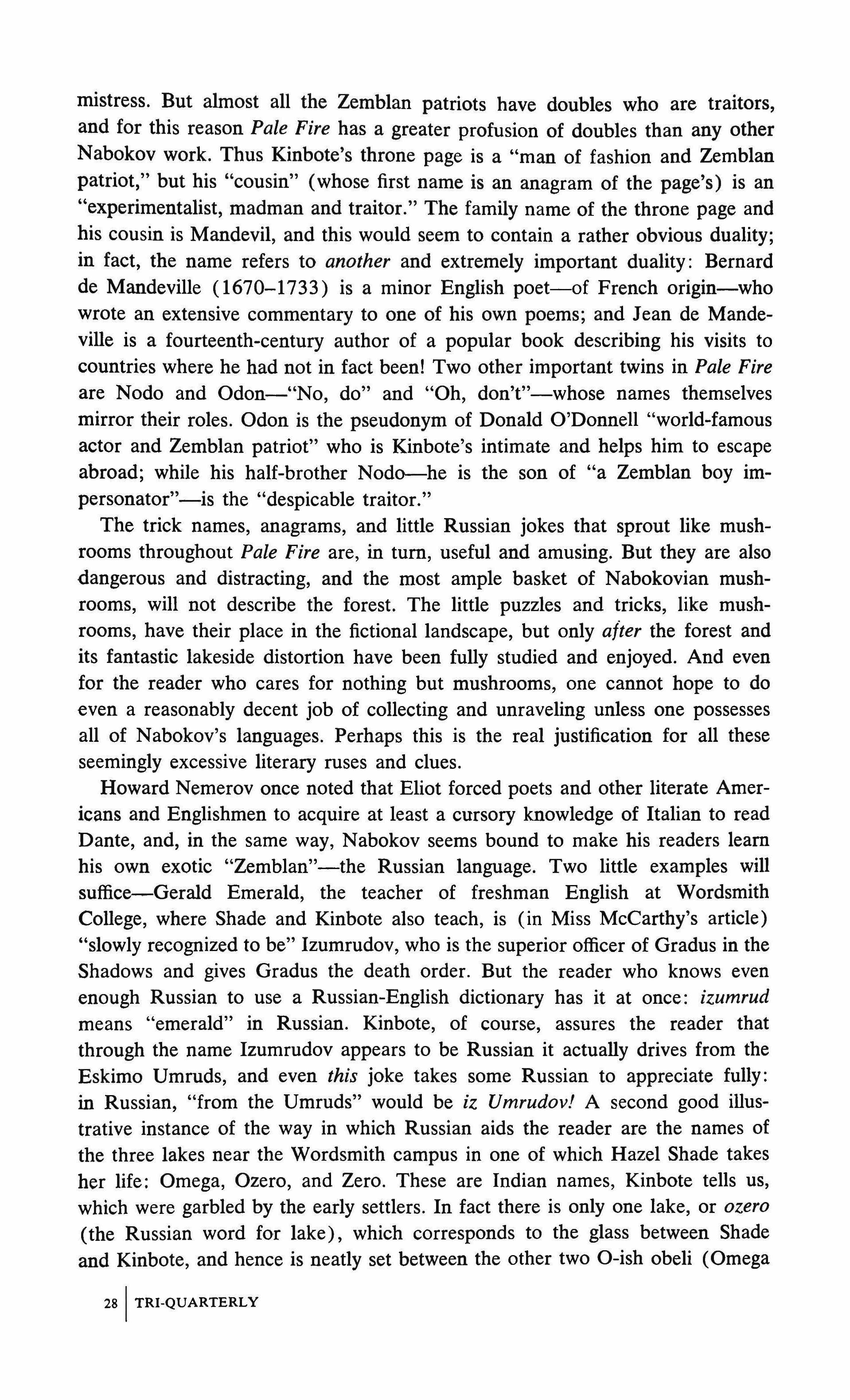
mistress. But almost all the Zemblan patriots have doubles who are traitors, and for this reason Pale Fire has a greater profusion of doubles than any other Nabokov work. Thus Kinbote's throne page is a "man of fashion and Zemblan patriot," but his "cousin" (whose first name is an anagram of the page's) is an "experimentalist, madman and traitor." The family name of the throne page and his cousin is MandeviI, and this would seem to contain a rather obvious duality; in fact, the name refers to another and extremely important duality: Bernard de Mandeville (1670-1733) is a minor English poet-of French origin-who wrote an extensive commentary to one of his own poems; and Jean de Mandeville is a fourteenth-century author of a popular book describing his visits to countries where he had not in fact been! Two other important twins in Pale Fire are Nodo and Odon-"No, do" and "Oh, don't"-whose names themselves mirror their roles. Odon is the pseudonym of Donald O'Donnell "world-famous actor and Zemblan patriot" who is Kinbote's intimate and helps him to escape abroad; while his half-brother Nodo-he is the son of "a Zemblan boy impersonator"-is the "despicable traitor."
The trick names, anagrams, and little Russian jokes that sprout like mushrooms throughout Pale Fire are, in tum, useful and amusing. But they are also dangerous and distracting, and the most ample basket of Nabokovian mushrooms, will not describe the forest. The little puzzles and tricks, like mushrooms, have their place in the fictional landscape, but only alter the forest and its fantastic lakeside distortion have been fully studied and enjoyed. And even for the reader who cares for nothing but mushrooms, one cannot hope to do even a reasonably decent job of collecting and unraveling unless one possesses all of Nabokov's languages. Perhaps this is the real justification for all these seemingly excessive literary ruses and clues.
Howard Nemerov once noted that Eliot forced poets and other literate Americans and Englishmen to acquire at least a cursory knowledge of Italian to read Dante, and, in the same way, Nabokov seems bound to make his readers learn his own exotic "Zemblan"-the Russian language. Two little examples will suffice-Gerald Emerald, the teacher of freshman English at Wordsmith College, where Shade and Kinbote also teach, is (in Miss McCarthy'S article) "slowly recognized to be" Izumrudov, who is the superior officer of Gradus in the Shadows and gives Gradus the death order. But the reader who knows even enough Russian to use a Russian-English dictionary has it at once: izumrud means "emerald" in Russian. Kinbote, of course, assures the reader that through the name Izumrudov appears to be Russian it actually drives from the Eskimo Umruds, and even this joke takes some Russian to appreciate fully: in Russian, "from the Umruds" would be iz Umrudov! A second good illustrative instance of the way in which Russian aids the reader are the names of the three lakes near the Wordsmith campus in one of which Hazel Shade takes her life: Omega, Ozero, and Zero. These are Indian names, Kinbote tells us, which were garbled by the early settlers. In fact there is only one lake, or ozero (the Russian word for lake), which corresponds to the glass between Shade and Kinbote, and hence is neatly set between the other two O-ish obeli (Omega

and Zero) signifying the possibilities after each: nothing and everything (omega, the final letter of the Greek alphabet, is, of course, a symbol of infinity).
But, granting the absolute necessity that those who accept Nabokov as a great writer learn some Russian and affirming the enormous pleasure of being able to read Nabokov in his full inguistic amplitude, I wish to assert firmly that Nabokov should not be given over to the pedants and the puzzle-solvers. The -to borrow a phrase-MAIN STRUCTURE can be perceived by the good reader, and I take as confirmation several articles and reviews in scattered American journals and newspapers-some only a few paragraphs long-in which the writer conveyed that he or she saw what was "going on" in Pale Fire.
The danger of the tricks and allusions in Pale Fire is that the clever reader is very likely not to be satisfied with the essential finds-Kinbote's name, Zembla, Pope's Essay on Man, Timon of Athens-and be misled by the still cleverer Nabokov into missing the point of the whole thing. This, I think, was what happened to Mary McCarthy in her excellent article on Pale Fire, which I do not mean to denigrate, for there are-together with a few suspicious-looking fungi enthusiastically thrown in-some superb mushrooms in her basket. She was the first to get the Pope allusion to Zembla (John Shade is the author of a book on Pope), and she wisely and carefully examined the text of Pope's Essay on Man and found that it contains not only the reference to Zembla, but also the source of the Zemblan "Extremist" party. Her most perceptive discovery -and I am deeply grateful to her for it-is the source of Hazel Shade's name which is taken from The Lady of the Lake ("in lone Glenartney's hazel shade"). The reader of this book who is by chance not acquainted with Miss McCarthy's essay (New Republic, June, 1962; and, in a revised form, Encounter, October, 1962) is strongly urged to read it.
One very important trick in Pale Fire is John Shade's "Word Golf," amiably taken up by Kinbote. Kinbote gives his best scores as: "hate-love in three, lass-male in four, and live-dead in five (with 'lend' in the middle)." Mary McCarthy plays the game with the following results: "hate-love in three (hatelate-lave-love), lass-male in four (lass-Iast-mast-malt-male), live-dead in five. If you play Word Golf with the title words, you can get pale-hate in three." And this prompts Miss McCarthy to choose love as the theme of the novel: "Love is the burden of Pale Fire, love and loss The sense of loss in love binds mortal men in a common pattern the elderly couple watching TV in a lighted room, and the 'queer' neighbor watching them from his window." "Live-dead in five (with 'lend' in the middle)" is possible: live-line-lene-lendlead-dead. Life and death are at the center of Pale Fire, with love and sex merely decoy or secondary motifs-poetic metaphors of the primary theme.
An excellent example of the pleasurable but essentially irrelevant sport of mushroom-picking in Pale Fire is the fine survey article on all the Nabokov novels available in English by R. H. W. Dillard, which appeared in The Hollins Critic (June, 1966) of Hollins College, Virginia. Although the article devotes less than two pages to Pale Fire, Dillard seems to me to be one of that handful of critics who may be said to be more or less "at home" in the novel. Dillard also
y 129
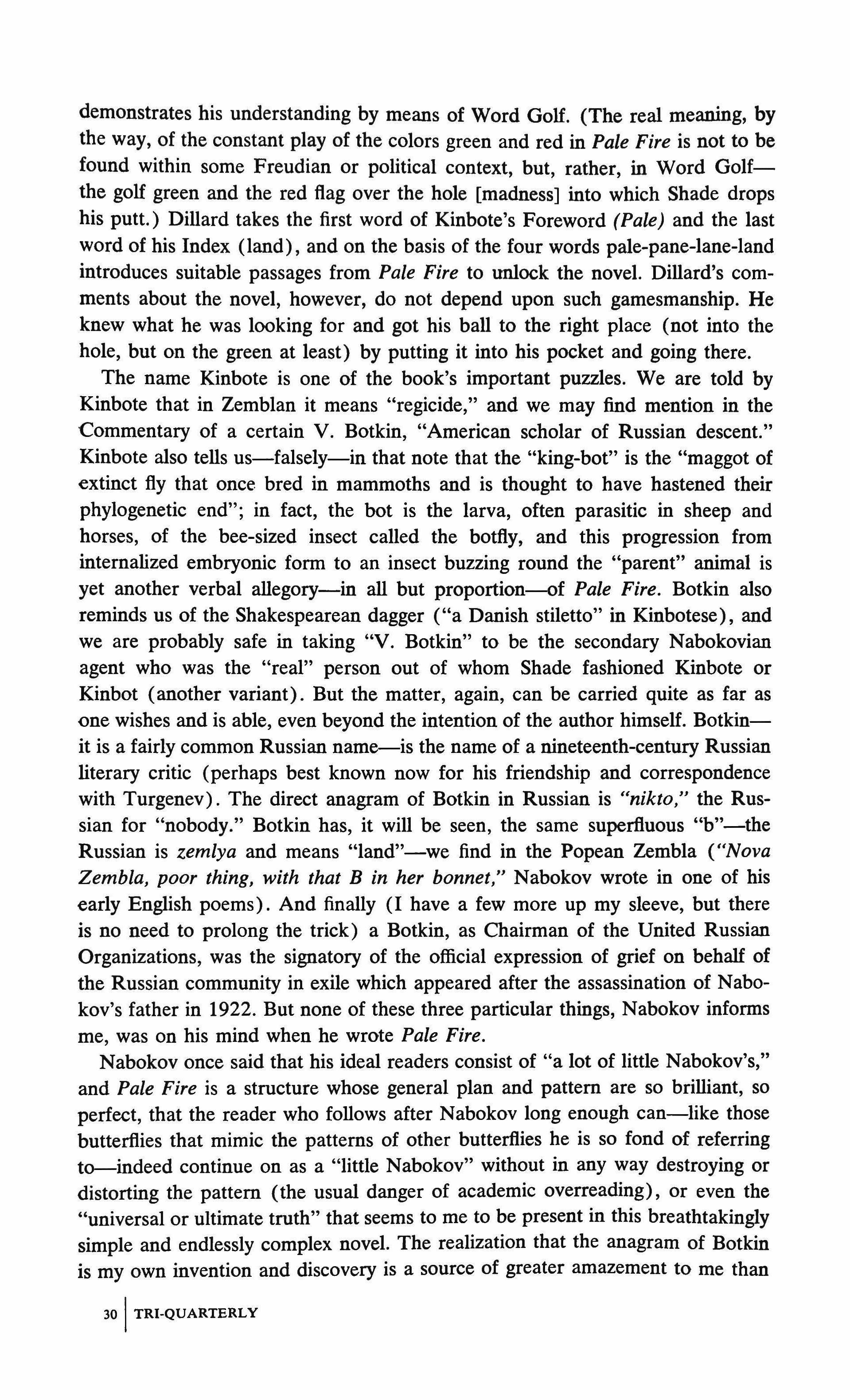
demonstrates his understanding by means of Word Golf. (The real meaning, by the way, of the constant play of the colors green and red in Pale Fire is not to be found within some Freudian or political context, but, rather, in Word Golfthe golf green and the red flag over the hole [madness] into which Shade drops his putt.) Dillard takes the first word of Kinbote's Foreword (Pale) and the last word of his Index (land), and on the basis of the four words pale-pane-lane-land introduces suitable passages from Pale Fire to unlock the novel. Dillard's comments about the novel, however, do not depend upon such gamesmanship. He knew what he was looking for and got his ball to the right place (not into the hole, but on the green at least) by putting it into his pocket and going there.
The name Kinbote is one of the book's important puzzles. We are told by Kinbote that in Zemblan it means "regicide," and we may find mention in the Commentary of a certain V. Botkin, "American scholar of Russian descent." Kinbote also tells us-falsely-in that note that the "king-bot" is the "maggot of extinct fly that once bred in mammoths and is thought to have hastened their phylogenetic end"; in fact, the bot is the larva, often parasitic in sheep and horses, of the bee-sized insect called the botfly, and this progression from internalized embryonic form to an insect buzzing round the "parent" animal is yet another verbal allegory-in all but proportion-of Pale Fire. Botkin also reminds us of the Shakespearean dagger ("a Danish stiletto" in Kinbotese), and we are probably safe in taking "V. Botkin" to be the secondary Nabokovian agent who was the "real" person out of whom Shade fashioned Kinbote or Kinbot (another variant). But the matter, again, can be carried quite as far as one wishes and is able, even beyond the intention of the author himself. Botkinit is a fairly common Russian name-is the name of a nineteenth-century Russian literary critic (perhaps best known now for his friendship and correspondence with Turgenev). The direct anagram of Botkin in Russian is "nikto;" the Russian for "nobody." Botkin has, it will be seen, the same superfluous "b"-the Russian is zemlya and means "land"-we find in the Popean Zembla ("Nova Zembla, poor thing, with that B in her bonnet," Nabokov wrote in one of his early English poems). And finally (I have a few more up my sleeve, but there is no need to prolong the trick) a Botkin, as Chairman of the United Russian Organizations, was the signatory of the official expression of grief on behalf of the Russian community in exile which appeared after the assassination of Nabokov's father in 1922. But none of these three particular things, Nabokov informs me, was on his mind when he wrote Pale Fire.
Nabokov once said that his ideal readers consist of "a lot of little Nabokov's," and Pale Fire is a structure whose general plan and pattern are so brilliant, so perfect, that the reader who follows after Nabokov long enough can-like those butterflies that mimic the patterns of other butterflies he is so fond of referring to-indeed continue on as a "little Nabokov" without in any way destroying or distorting the pattern (the usual danger of academic overreading), or even the "universal or ultimate truth" that seems to me to be present in this breathtakingly simple and endlessly complex novel. The realization that the anagram of Botkin is my own invention and discovery is a source of greater amazement to me than

solving the most difficult of the author's own puzzles. Pale Fire is like Nature herself, and though our knowledge about it may increase tenfold, the essential mystery will remain intact.
Above Shade and Kinbote, the poem and the Commentary is Nabokov himself, who is the most important of the three artists, and who imposes his own pattern upon Pale Fire without in any way impinging upon the separate designs of the poet Shade and the madman-artist he has created. This aspect of the novel is clearest and most serenely open and obvious when seen in the perspective of Nabokov's entire artistic career. To repeat, I think it safe to say that there might have been a good deal less bafflement over Pale Fire if such earlier Russian Nabokov novels as The Defense and The Gift had been translated into English prior to 1962; and there would beyond any doubt have been a great deal les sif some of the articles by Nabokov's best Russian critic, Vladislav Khodasevich, had appeared in English translation. It was Khodasevich who very early in Nabokov's writing career declared that his sole thematic concern is art, and that he writes only about artists-failed artists, aspiring artists, mad artists, every conceivable kind of artist-but that he does this in allegorical form, choosing as his protagonists chess players, homosexuals and murderers. I would have the reader of Nabokov always bear in mind this wise and simple observation-though it doesn't always apply. Khodasevich expressed the hope that Nabokov would some day write about a writer as such, and this, of course, is precisely what he did in The Gift, whose serial completion Khodasevich did not live to see. There are two entirely distinct "works-of-art-within-the-work-ofart" in The Gift: the poems of Fyodor Godunov-Cherdyntsev and the hilarious "biography" of Chernyshevsky, also written by him. It is most interesting in connection with an examination of Pale Fire to consider the example of the two voices of Godunov-Cherdyntsev, both so absolutely different, yet both coming from the same character.
The primary pattern-that is, the form as opposed to the theme-of Pale Fire is a complete and precise portrayal of the artist and his creation. We have the artist, Shade, and we have his creation, another artist who happens to be mad and whose work orbits about Shade in a complete circle, Foreword to Index. It seems as if the huge moon (with its glitter and size, it is a "moon" only in the sense that Greenland is an "island") must both control and bind the pale and staid planet, but this is merely the natural astronomy of literature: Flaubert is not nearly "as large" as Emma Bovary, who now has a separate existence of her own and whirls dazzlingly around her creator (in spite of his assertion that he was she!), and even the giant Tolstoy is small beside his Anna Karenina. This, in art, is an elemental truth: as the work comes closer and closer to true greatness, the protagonist and the novel as a whole must challenge and then finally eclipse, in varying degrees, the creator.
In the case of Nabokov it has become accepted practice to speak of Humbert Humbert, Hermann Karlovich, Smurov, Luzhin, and Kinbote as being "semiautobiographical portraits" of their author, but there is little consideration of the enormous diversity within the huge gallery of Nabokov's eccentrics, nor do
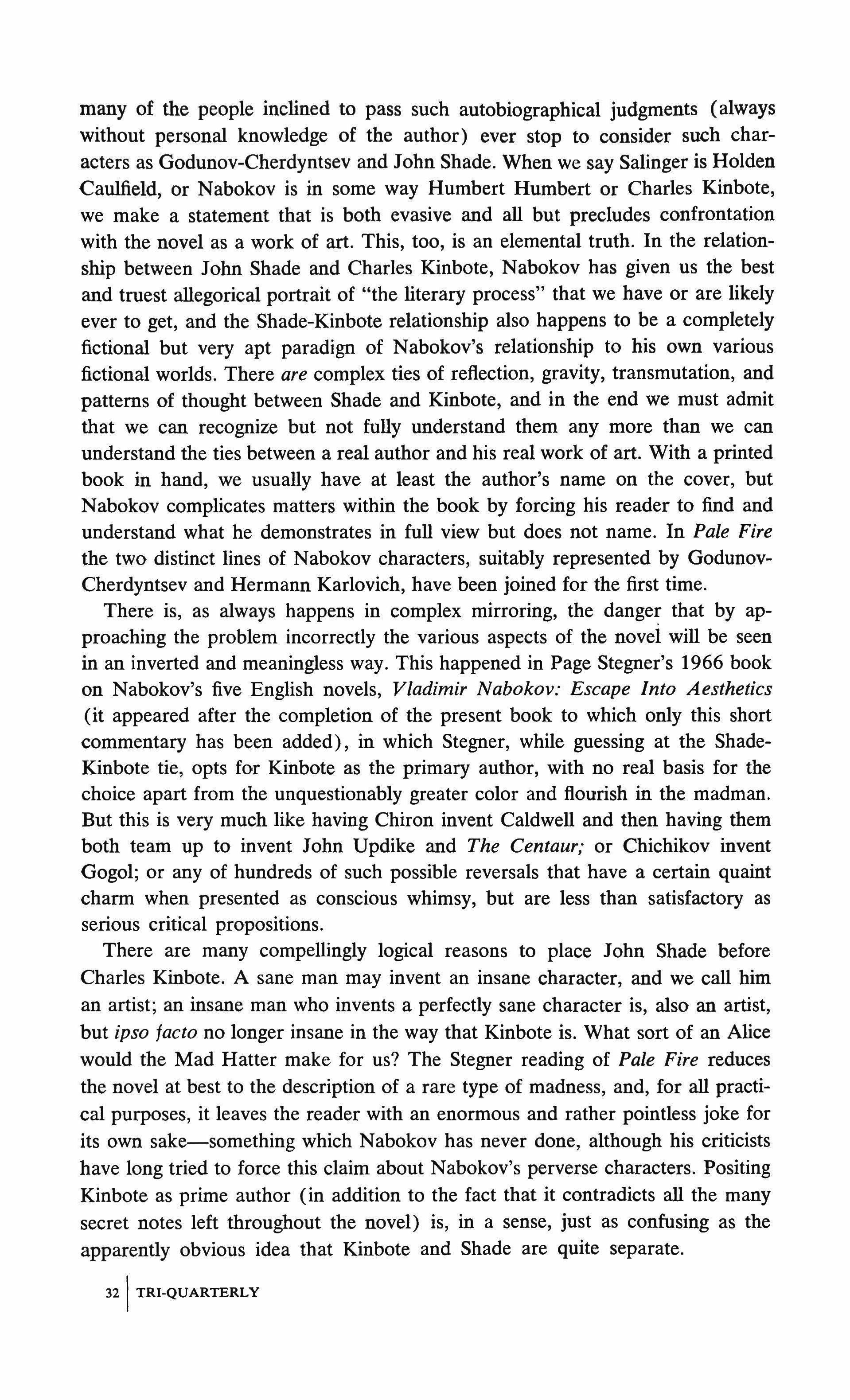
many of the people inclined to pass such autobiographical judgments (always without personal knowledge of the author) ever stop to consider such characters as Godunov-Cherdyntsev and John Shade. When we say Salinger is Holden Caulfield, or Nabokov is in some way Humbert Humbert or Charles Kinbote, we make a statement that is both evasive and all but precludes confrontation with the novel as a work of art. This, too, is an elemental truth. In the relationship between John Shade and Charles Kinbote, Nabokov has given us the best and truest allegorical portrait of "the literary process" that we have or are likely ever to get, and the Shade-Kinbote relationship also happens to be a completely fictional but very apt paradign of Nabokov's relationship to his own various fictional worlds. There are complex ties of reflection, gravity, transmutation, and patterns of thought between Shade and Kinbote, and in the end we must admit that we can recognize but not fully understand them any more than we can understand the ties between a real author and his real work of art. With a printed book in hand, we usually have at least the author's name on the cover, but Nabokov complicates matters within the book by forcing his reader to find and understand what he demonstrates in full view but does not name. In Pale Fire the two distinct lines of Nabokov characters, suitably represented by GodunovCherdyntsev and Hermann Karlovich, have been joined for the first time.
There is, as always happens in complex mirroring, the danger that by approaching the problem incorrectly the various aspects of the novel will be seen in an inverted and meaningless way. This happened in Page Stegner's 1966 book on Nabokov's five English novels, Vladimir Nabokov: Escape Into Aesthetics (it appeared after the completion of the present book to which only this short commentary has been added), in which Stegner, while guessing at the ShadeKinbote tie, opts for Kinbote as the primary author, with no real basis for the choice apart from the unquestionably greater color and flourish in the madman. But this is very much like having Chiron invent Caldwell and then having them both team up to invent John Updike and The Centaur; or Chichikov invent Gogol; or any of hundreds of such possible reversals that have a certain quaint charm when presented as conscious whimsy, but are less than satisfactory as serious critical propositions.
There are many compellingly logical reasons to place John Shade before Charles Kinbote. A sane man may invent an insane character, and we call him an artist; an insane man who invents a perfectly sane character is, also an artist, but ipso facto no longer insane in the way that Kinbote is. What sort of an Alice would the Mad Hatter make for us? The Stegner reading of Pale Fire reduces the novel at best to the description of a rare type of madness, and, for all practical purposes, it leaves the reader with an enormous and rather pointless joke for its own sake-something which Nabokov has never done, although his criticists have long tried to force this claim about Nabokov's perverse characters. Positing Kinbote as prime author (in addition to the fact that it contradicts all the many secret notes left throughout the novel) is, in a sense, just as confusing as the apparently obvious idea that Kinbote and Shade are quite separate.
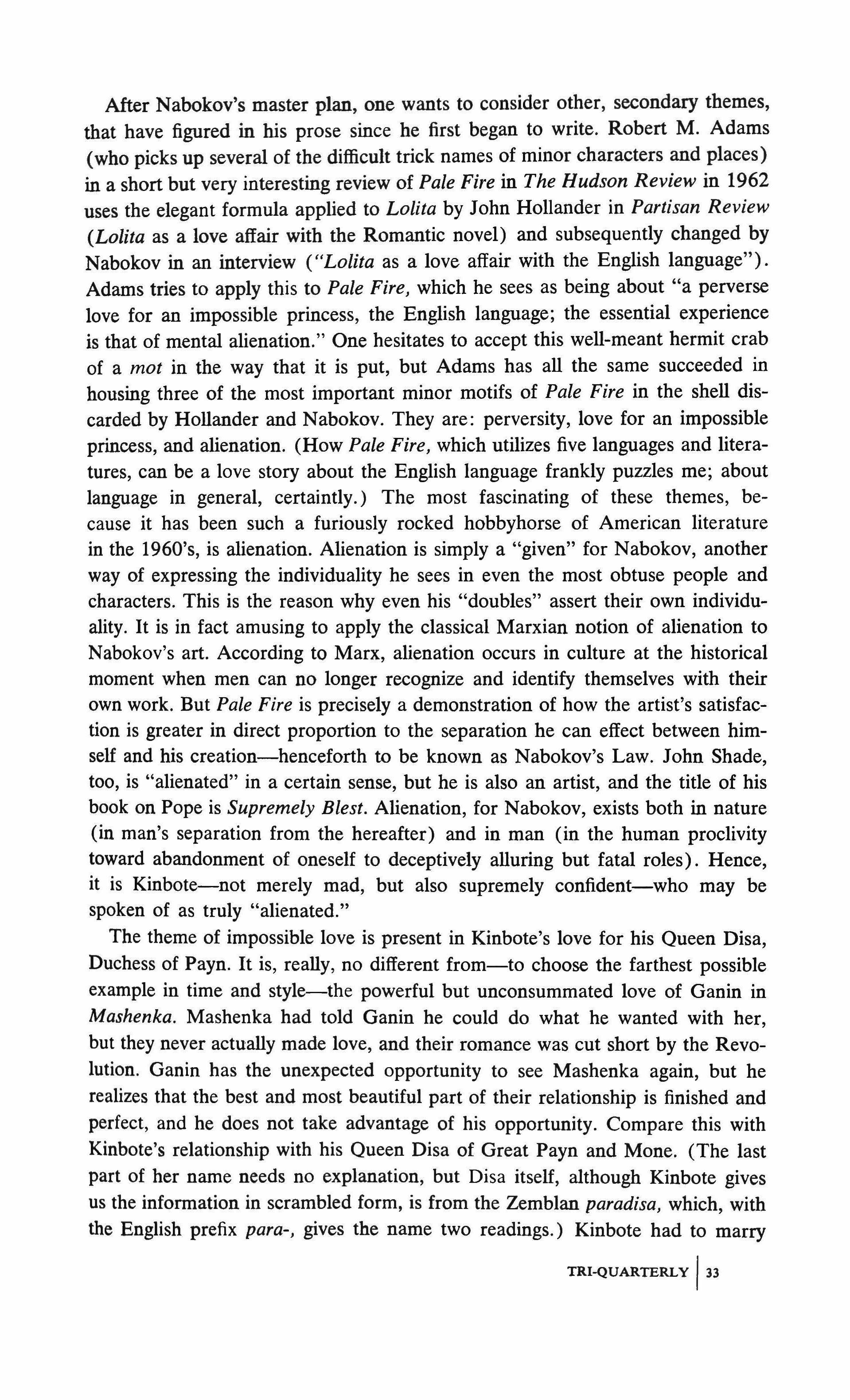
After Nabokov's master plan, one wants to consider other, secondary themes, that have figured in his prose since he first began to write. Robert M. Adams (who picks up several of the difficult trick names of minor characters and places) in a short but very interesting review of Pale Fire in The Hudson Review in 1962 uses the elegant formula applied to Lolita by John Hollander in Partisan Review (Lolita as a love affair with the Romantic novel) and subsequently changed by Nabokov in an interview ("Lolita as a love affair with the English language"). Adams tries to apply this to Pale Fire, which he sees as being about "a perverse love for an impossible princess, the English language; the essential experience is that of mental alienation." One hesitates to accept this well-meant hermit crab of a mot in the way that it is put, but Adams has all the same succeeded in housing three of the most important minor motifs of Pale Fire in the shell discarded by Hollander and Nabokov. They are: perversity, love for an impossible princess, and alienation. (How Pale Fire, which utilizes five languages and literatures, can be a love story about the English language frankly puzzles me; about language in general, certaintly.) The most fascinating of these themes, because it has been such a furiously rocked hobbyhorse of American literature in the 1960's, is alienation. Alienation is simply a "given" for Nabokov, another way of expressing the individuality he sees in even the most obtuse people and characters. This is the reason why even his "doubles" assert their own individuality. It is in fact amusing to apply the classical Marxian notion of alienation to Nabokov's art. According to Marx, alienation occurs in culture at the historical moment when men can no longer recognize and identify themselves with their own work. But Pale Fire is precisely a demonstration of how the artist's satisfaction is greater in direct proportion to the separation he can effect between himself and his creation-henceforth to be known as Nabokov's Law. John Shade, too, is "alienated" in a certain sense, but he is also an artist, and the title of his book on Pope is Supremely Blest. Alienation, for Nabokov, exists both in nature (in man's separation from the hereafter) and in man (in the human proclivity toward abandonment of oneself to deceptively alluring but fatal roles). Hence, it is Kinbote-not merely mad, but also supremely confident-who may be spoken of as truly "alienated."
The theme of impossible love is present in Kinbote's love for his Queen Disa, Duchess of Payn. It is, really, no different from-to choose the farthest possible example in time and style-the powerful but unconsummated love of Ganin in Mashenka. Mashenka had told Ganin he could do what he wanted with her, but they never actually made love, and their romance was cut short by the Revolution. Ganin has the unexpected opportunity to see Mashenka again, but he realizes that the best and most beautiful part of their relationship is finished and perfect, and he does not take advantage of his opportunity. Compare this with Kinbote's relationship with his Queen Disa of Great Payn and Mone. (The last part of her name needs no explanation, but Disa itself, although Kinbote gives us the information in scrambled form, is from the Zemblan paradisa, which, with the English prefix para-, gives the name two readings.) Kinbote had to marry

Disa to produce an heir, but their prerevolutionary (pre-Zemblan revolution, that is) marriage was never consummated:
In the beginning of their calamitous marriage he had strenuously tried to possess her but to no avail He farced himself with aphrodisiacs, but the anterior characters of her unfortunate sex kept fatally putting him off. One night when he tried tiger tea, and hopes rose high, he made the mistake of begging her to comply with an expedient which she made the mistake of denouncing as unnatural and disgusting.
As a result of such occurrences, Disa goes abroad to live ("for reasons of health" the Zemblan people are told), returns to Zembla, and then, after the King's lapses back into "manly Zemblan customs," abroad once more. After the revolution Disa remains faithful and wants Kinbote to live with her, but he is in danger from the Shadows and leaves her to live in America. As Ganin had two Mashenkas in his mind-one idealized and resplendent, the other an ordinary wife of a very vulgar emigre-so Kinbote has two Disas-Disa and para-Disa. It is the para-Disa of his mind that Kinbote adores, and she is, in a manner of speaking, a homosexual's homosexual fantasy. Kinbote's torment and longing is hopelessly fixed by a past admission to her that he does not love her:
Everything had changed, everybody was happy. And he absolutely had to find her at once to tell her that he adored her, but the large audience before him separated him from the door, and the notes reaching him through a succession of hands said that she was not available; that she was inaugurating a fire; that she had married an American businessman; that she had become a character in a novel; that she was dead.
Disa of Great Payn and Mone is one of the great gambols in Pale Fire; and yet, it is at the same time an exact analogue (reversed in a mirror, of course) to Ganin's love for Mashenka and fully as moving as Shade's love for his difficult daughter Hazel.
In the shadow of its more obvious and in many ways more complicated and deceptive twin Lolita, it has not been generally noticed that Pale Fire is the Nabokov book most centrally concerned with sex. The sexuality in Pale Fire happens to be pederasty, but again it merely takes the proper positioning of a mirror to translate this into the perversion of Humbert Humbert, or the potentialities inherent in all sexual practice or fantasy. Nabokov's artistic usage of perversion has been frequently commented on. There is no need to pause over the opinions that attribute the perversion to Nabokov himself, but many critics have seen in the theme an artistic expression of the natural scientist's human coldness and impersonality as he affixes the butterfly's thorax to his board with a pin. Or, the same thing expressed in a slightly more charitable form, it is seen as a kind of affection peculiar to the scientist. Mary McCarthy, for example, has written: "Nabokov's tenderness for human eccentricity, for the freak, the 'deviate,' is partly the naturalist's taste for the curious. But his fond, wry compassion for the lone black piece on the board goes deeper than classificatory science or the collector's choplicking."
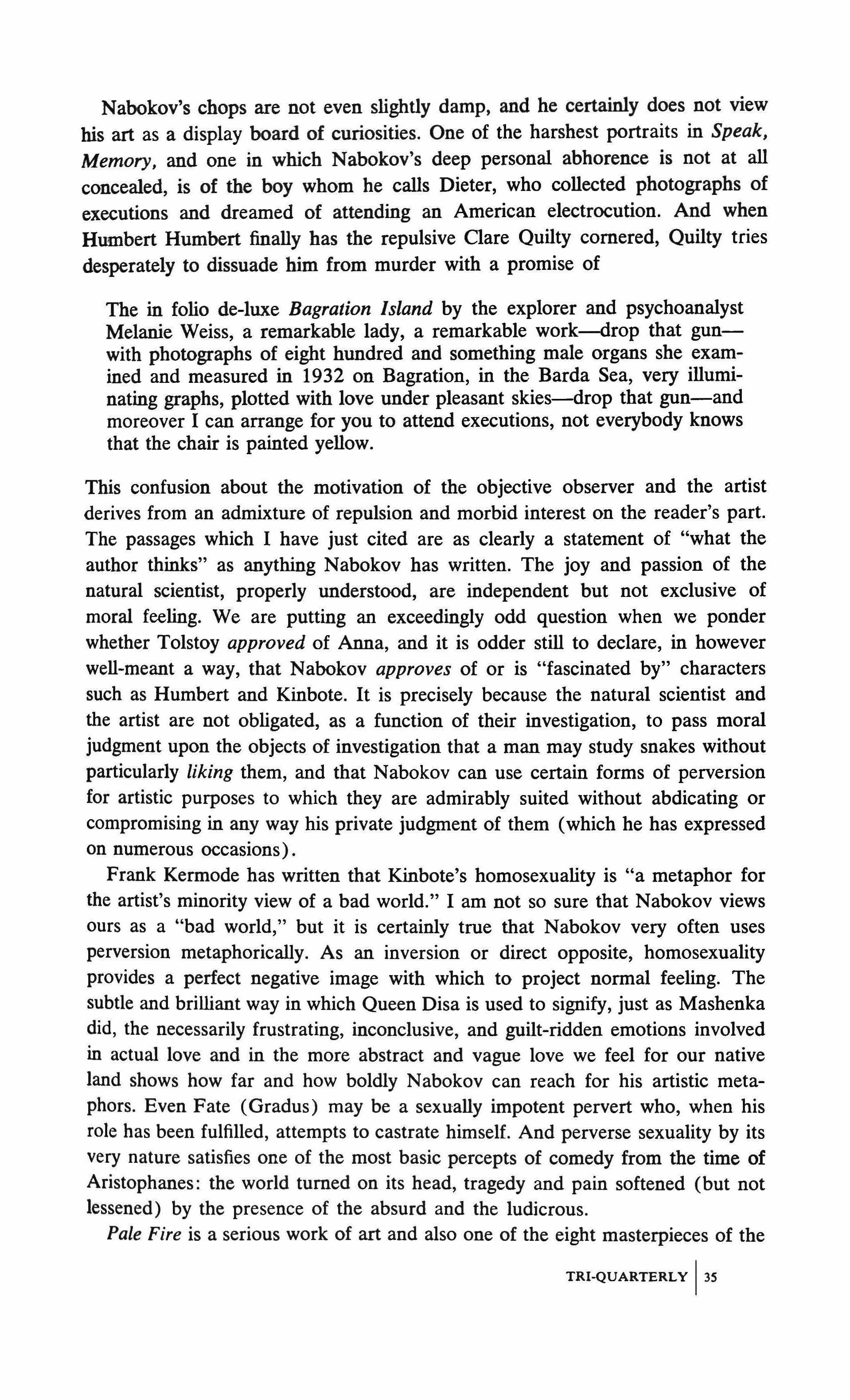
Nabokov's chops are not even slightly damp, and he certainly does not view his art as a display board of curiosities. One of the harshest portraits in Speak, Memory, and one in which Nabokov's deep personal abhorence is not at all concealed, is of the boy whom he calls Dieter, who collected photographs of executions and dreamed of attending an American electrocution. And when Humbert Humbert finally has the repulsive Clare Quilty cornered, Quilty tries desperately to dissuade him from murder with a promise of
The in folio de-luxe Bagration Island by the explorer and psychoanalyst
Melanie Weiss, a remarkable lady, a remarkable work-drop that gunwith photographs of eight hundred and something male organs she examined and measured in 1932 on Bagration, in the Barda Sea, very illuminating graphs, plotted with love under pleasant skies-drop that gun-and moreover I can arrange for you to attend executions, not everybody knows that the chair is painted yellow.
This confusion about the motivation of the objective observer and the artist derives from an admixture of repulsion and morbid interest on the reader's part. The passages which I have just cited are as clearly a statement of "what the author thinks" as anything Nabokov has written. The joy and passion of the natural scientist, properly understood, are independent but not exclusive of moral feeling. We are putting an exceedingly odd question when we ponder whether Tolstoy approved of Anna, and it is odder still to declare, in however well-meant a way, that Nabokov approves of or is "fascinated by" characters such as Humbert and Kinbote. It is precisely because the natural scientist and the artist are not obligated, as a function of their investigation, to pass moral judgment upon the objects of investigation that a man may study snakes without particularly liking them, and that Nabokov can use certain forms of perversion for artistic purposes to which they are admirably suited without abdicating or compromising in any way his private judgment of them (which he has expressed on numerous occasions).
Frank Kermode has written that Kinbote's homosexuality is "a metaphor for the artist's minority view of a bad world." I am not so sure that Nabokov views ours as a "bad world," but it is certainly true that Nabokov very often uses perversion metaphorically. As an inversion or direct opposite, homosexuality provides a perfect negative image with which to project normal feeling. The subtle and brilliant way in which Queen Disa is used to signify, just as Mashenka did, the necessarily frustrating, inconclusive, and guilt-ridden emotions involved in actual love and in the more abstract and vague love we feel for our native land shows how far and how boldly Nabokov can reach for his artistic metaphors. Even Fate (Gradus) may be a sexually impotent pervert who, when his role has been fulfilled, attempts to castrate himself. And perverse sexuality by its very nature satisfies one of the most basic percepts of comedy from the time of Aristophanes: the world turned on its head, tragedy and pain softened (but not lessened) by the presence of the absurd and the ludicrous.
Pale Fire is a serious work of art and also one of the eight masterpieces of the
y 135

novel in this century (Nabokov is the only author who has written two of them!), and the burden of my discussion has quite naturally been addressed to the novel in a tone which these convictions require. But, by way of final comment on Pale Fire, I should like to remind the reader who may have forgotten or been too confused in the first place that this serious and perfect novel radiates a humor on every page that is anything but pale, right down to the notes in the Index telling us of Kinbote's "contempt for Prof. H. (not in Index)" and "Marcel, the fussy, unpleasant, and not always plausible central character, pampered by everybody in Proust's A la Recherche du Temps Perdu." One may always saysomeone, at any rate, has-that "Nabokov is too funny, indeed even too brilliant for his own good," but if we are to tum our backs on an artist on democratic grounds such as these, then, to paraphrase something someone else said, there is no point in writing novels, poems, commentaries to them, or anything else at all.
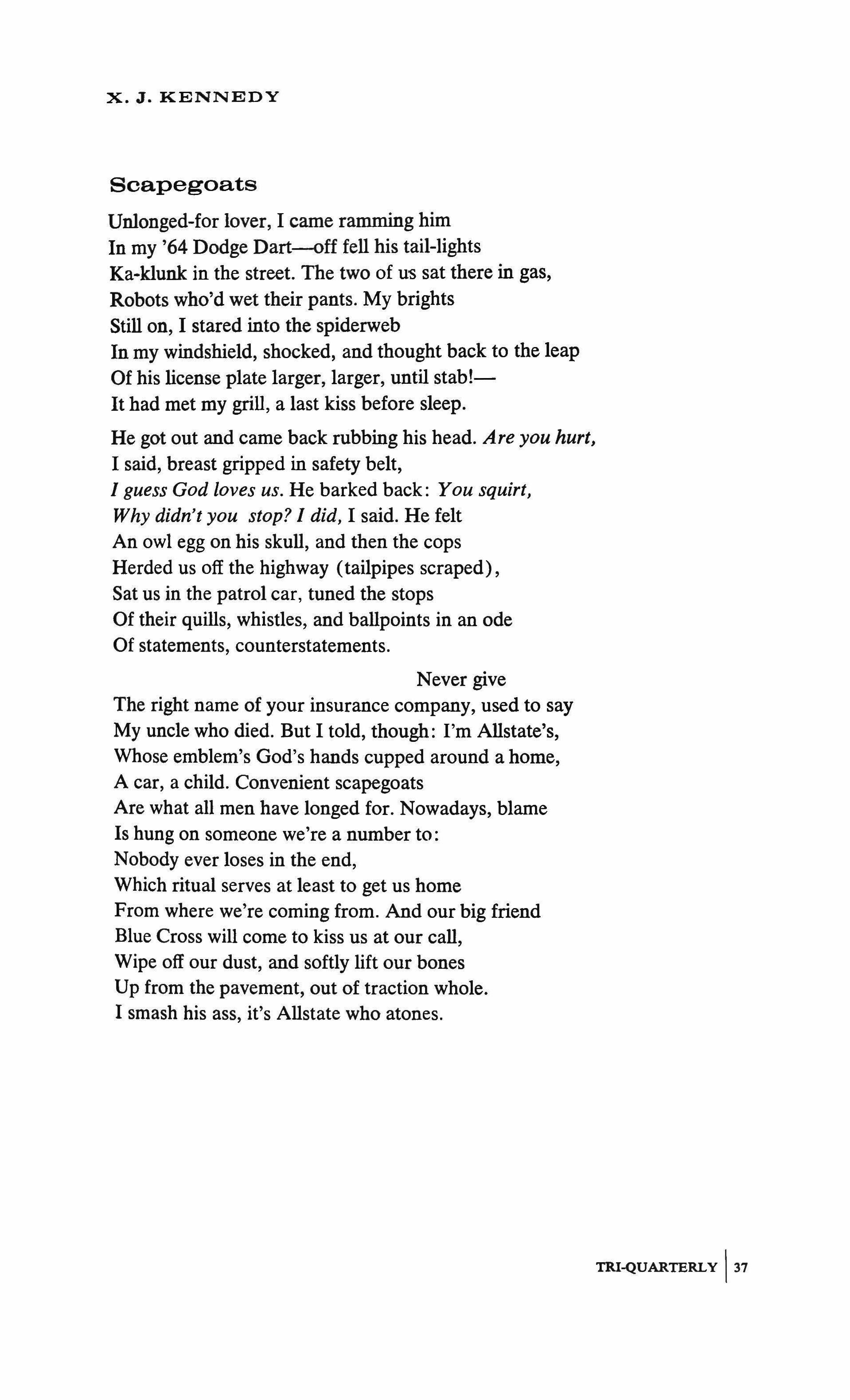
Unlonged-for lover, I came ramming him
In my '64 Dodge Dart-off fell his tail-lights Ka-klunk in the street. The two of us sat there in gas, Robots who'd wet their pants. My brights Still on, I stared into the spiderweb In my windshield, shocked, and thought back to the leap Of his license plate larger, larger, until stab!It had met my grill, a last kiss before sleep. He got out and came back rubbing his head. Are you hurt, I said, breast gripped in safety belt, I guess God loves us. He barked back: You squirt, Why didn't you stop? I did, I said. He felt An owl egg on his skull, and then the cops Herded us off the highway (tailpipes scraped), Sat us in the patrol car, tuned the stops Of their quills, whistles, and ballpoints in an ode Of statements, counterstatements.
Never give
The right name of your insurance company, used to say My uncle who died. But I told, though: I'm Allstate's, Whose emblem's God's hands cupped around a home, A car, a child. Convenient scapegoats Are what all men have longed for. Nowadays, blame Is hung on someone we're a number to: Nobody ever loses in the end, Which ritual serves at least to get us home From where we're coming from. And our big friend Blue Cross will come to kiss us at our call, Wipe off our dust, and softly lift our bones Up from the pavement, out of traction whole. I smash his ass, it's Allstate who atones.
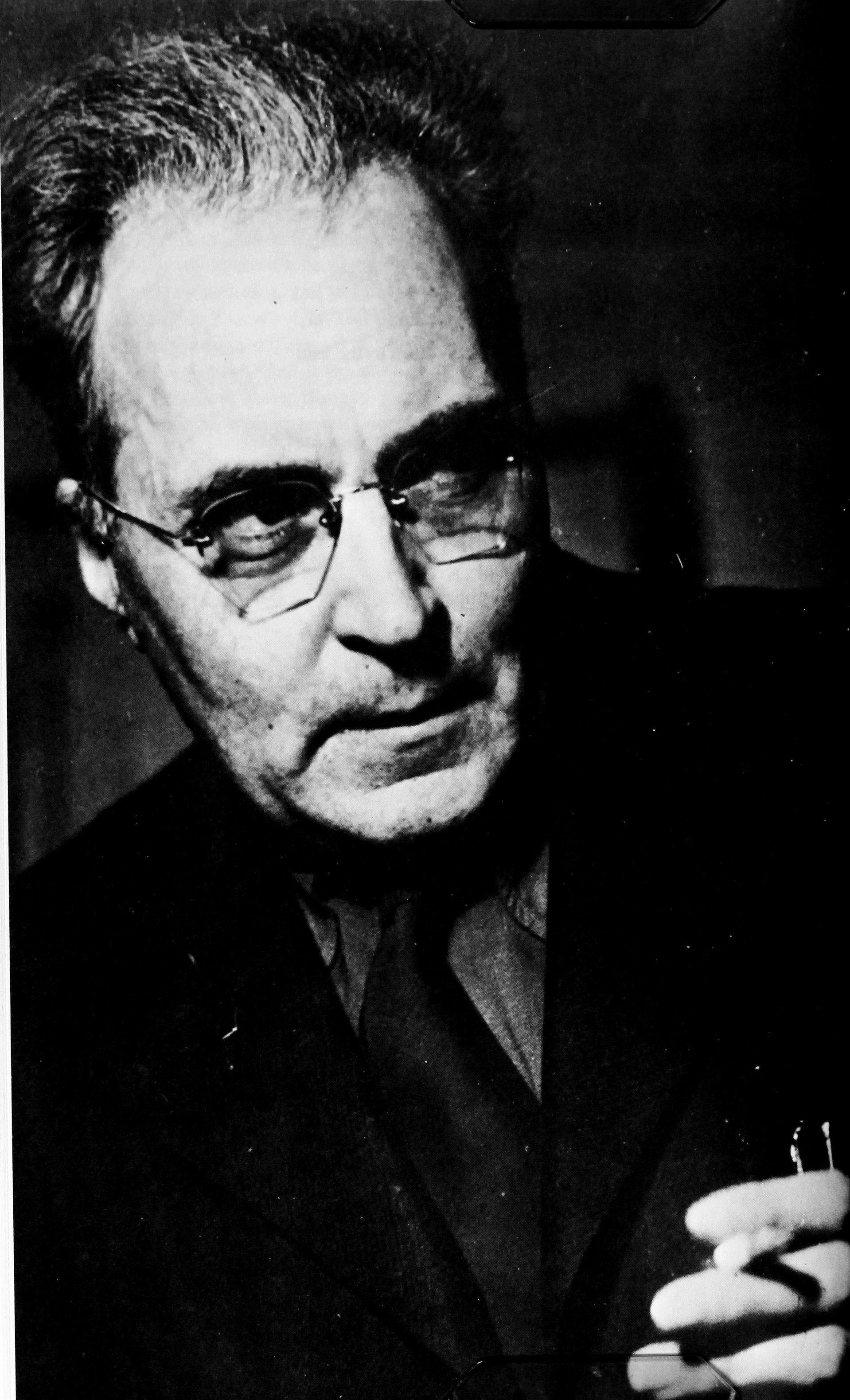
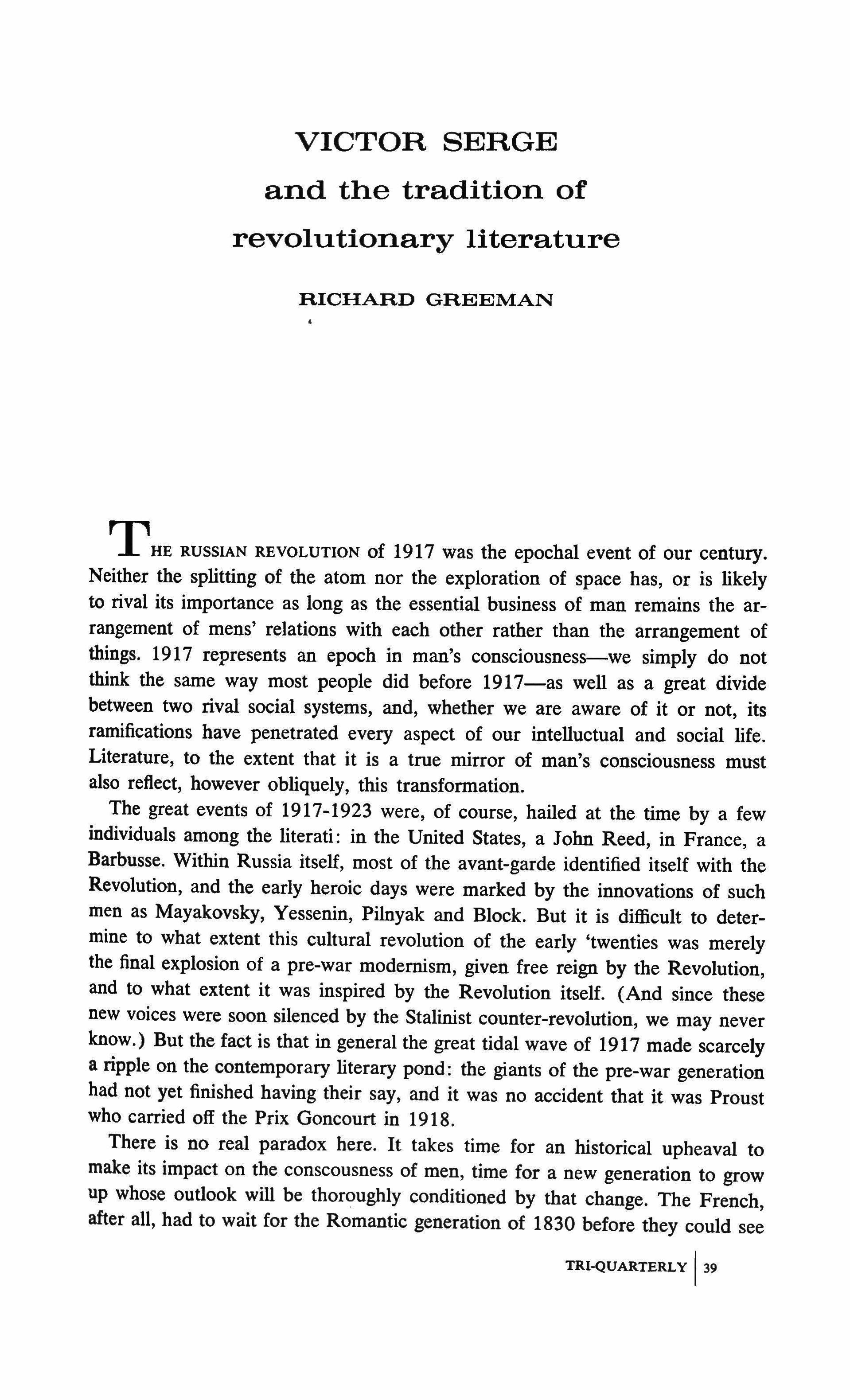
THE RUSSIAN REVOLUTION of 1917 was the epochal event of our century. Neither the splitting of the atom nor the exploration of space has, or is likely to rival its importance as long as the essential business of man remains the arrangement of mens' relations with each other rather than the arrangement of things. 1917 represents an epoch in man's consciousness-we simply do not think the same way most people did before 1917-as well as a great divide between two rival social systems, and, whether we are aware of it or not, its ramifications have penetrated every aspect of our intelluctual and social life. Literature, to the extent that it is a true mirror of man's consciousness must also reflect, however obliquely, this transformation.
The great events of 1917-1923 were, of course, hailed at the time by a few individuals among the literati: in the United States, a John Reed, in France, a Barbusse. Within Russia itself, most of the avant-garde identified itself with the Revolution, and the early heroic days were marked by the innovations of such men as Mayakovsky, Yessenin, Pilnyak and Block. But it is difficult to determine to what extent this cultural revolution of the early 'twenties was merely the final explosion of a pre-war modernism, given free reign by the Revolution, and to what extent it was inspired by the Revolution itself. (And since these new voices were soon silenced by the Stalinist counter-revolution, we may never know.) But the fact is that in general the great tidal wave of 1917 made scarcely a ripple on the contemporary literary pond: the giants of the pre-war generation had not yet finished having their say, and it was no accident that it was Proust who carried off the Prix Goncourt in 1918.
There is no real paradox here. It takes time for an historical upheaval to make its impact on the conscousness of men, time for a new generation to grow up whose outlook will be thoroughly conditioned by that change. The French, after all, had to wait for the Romantic generation of 1830 before they could see
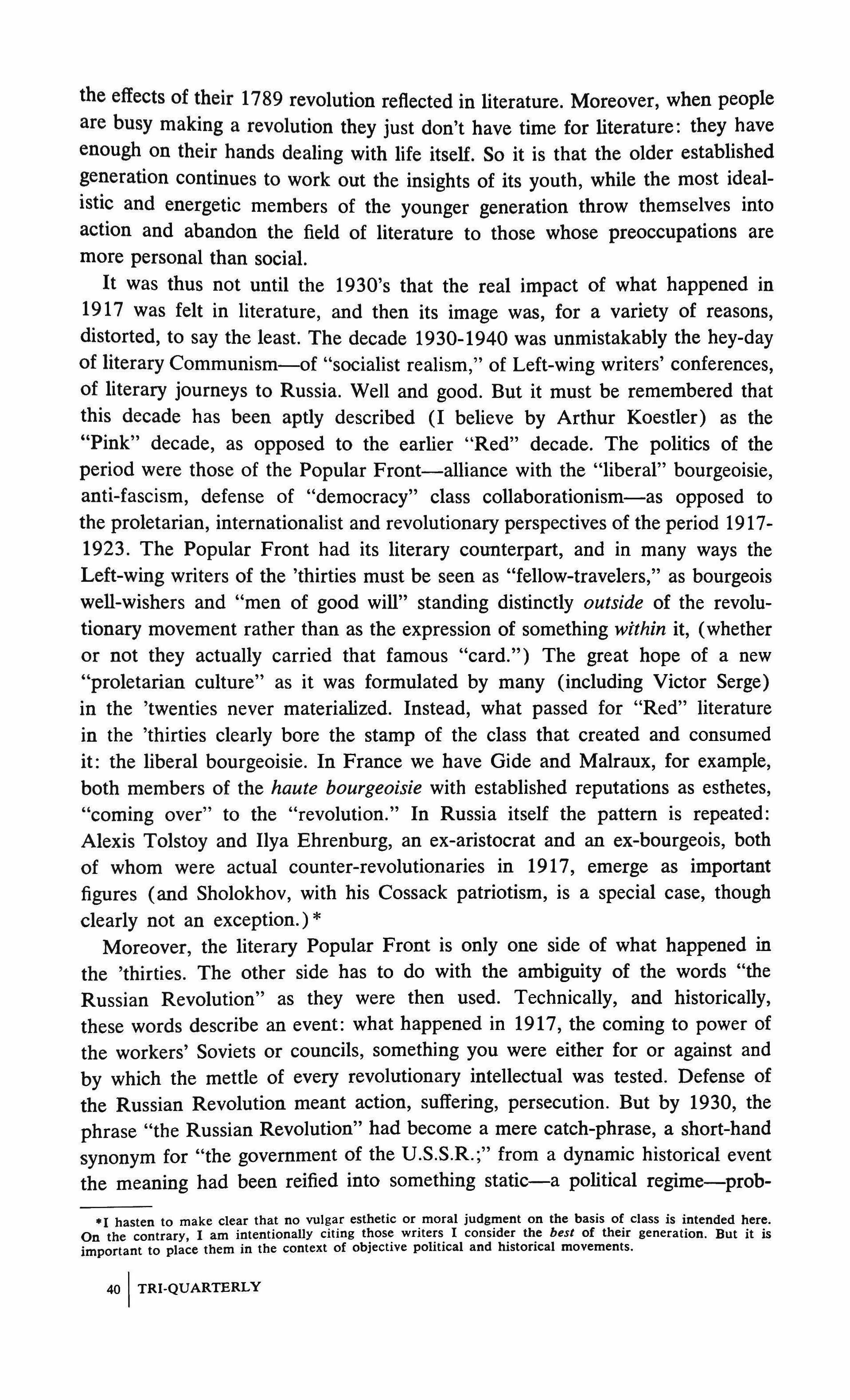
the effects of their 1789 revolution reflected in literature. Moreover, when people are busy making a revolution they just don't have time for literature: they have enough on their hands dealing with life itself. So it is that the older established generation continues to work out the insights of its youth, while the most idealistic and energetic members of the younger generation throw themselves into action and abandon the field of literature to those whose preoccupations are more personal than social.
It was thus not until the 1930's that the real impact of what happened in 1917 was felt in literature, and then its image was, for a variety of reasons, distorted, to say the least. The decade 1930-1940 was unmistakably the hey-day of literary Communism-of "socialist realism," of Left-wing writers' conferences, of literary journeys to Russia. Well and good. But it must be remembered that this decade has been aptly described (I believe by Arthur Koestler) as the "Pink" decade, as opposed to the earlier "Red" decade. The politics of the period were those of the Popular Front-alliance with the "liberal" bourgeoisie, anti-fascism, defense of "democracy" class collaborationism-as opposed to the proletarian, internationalist and revolutionary perspectives of the period 19171923. The Popular Front had its literary counterpart, and in many ways the Left-wing writers of the 'thirties must be seen as "fellow-travelers," as bourgeois well-wishers and "men of good will" standing distinctly outside of the revolutionary movement rather than as the expression of something within it, (whether or not they actually carried that famous "card.") The great hope of a new "proletarian culture" as it was formulated by many (including Victor Serge) in the 'twenties never materialized. Instead, what passed for "Red" literature in the 'thirties clearly bore the stamp of the class that created and consumed it: the liberal bourgeoisie. In France we have Gide and Malraux, for example, both members of the haute bourgeoisie with established reputations as esthetes, "coming over" to the "revolution." In Russia itself the pattern is repeated: Alexis Tolstoy and Ilya Ehrenburg, an ex-aristocrat and an ex-bourgeois, both of whom were actual counter-revolutionaries in 1917, emerge as important figures (and Sholokhov, with his Cossack patriotism, is a special case, though clearly not an exception.) *
Moreover, the literary Popular Front is only one side of what happened in the 'thirties. The other side has to do with the ambiguity of the words "the Russian Revolution" as they were then used. Technically, and historically, these words describe an event: what happened in 1917, the coming to power of the workers' Soviets or councils, something you were either for or against and by which the mettle of every revolutionary intellectual was tested. Defense of the Russian Revolution meant action, suffering, persecution. But by 1930, the phrase "the Russian Revolution" had become a mere catch-phrase, a short-hand synonym for "the government of the U.S.S.R.;" from a dynamic historical event the meaning had been reified into something static-a political regime-prob-
-I hasten to make clear that no vulgar esthetic or moral judgment on the basis of class is intended here. On the contrary, I am intentionaUy citing t�os� write�s. I consid�r th.e best of their generation. But it is important to place them in the context of objective political and historlcal movements.
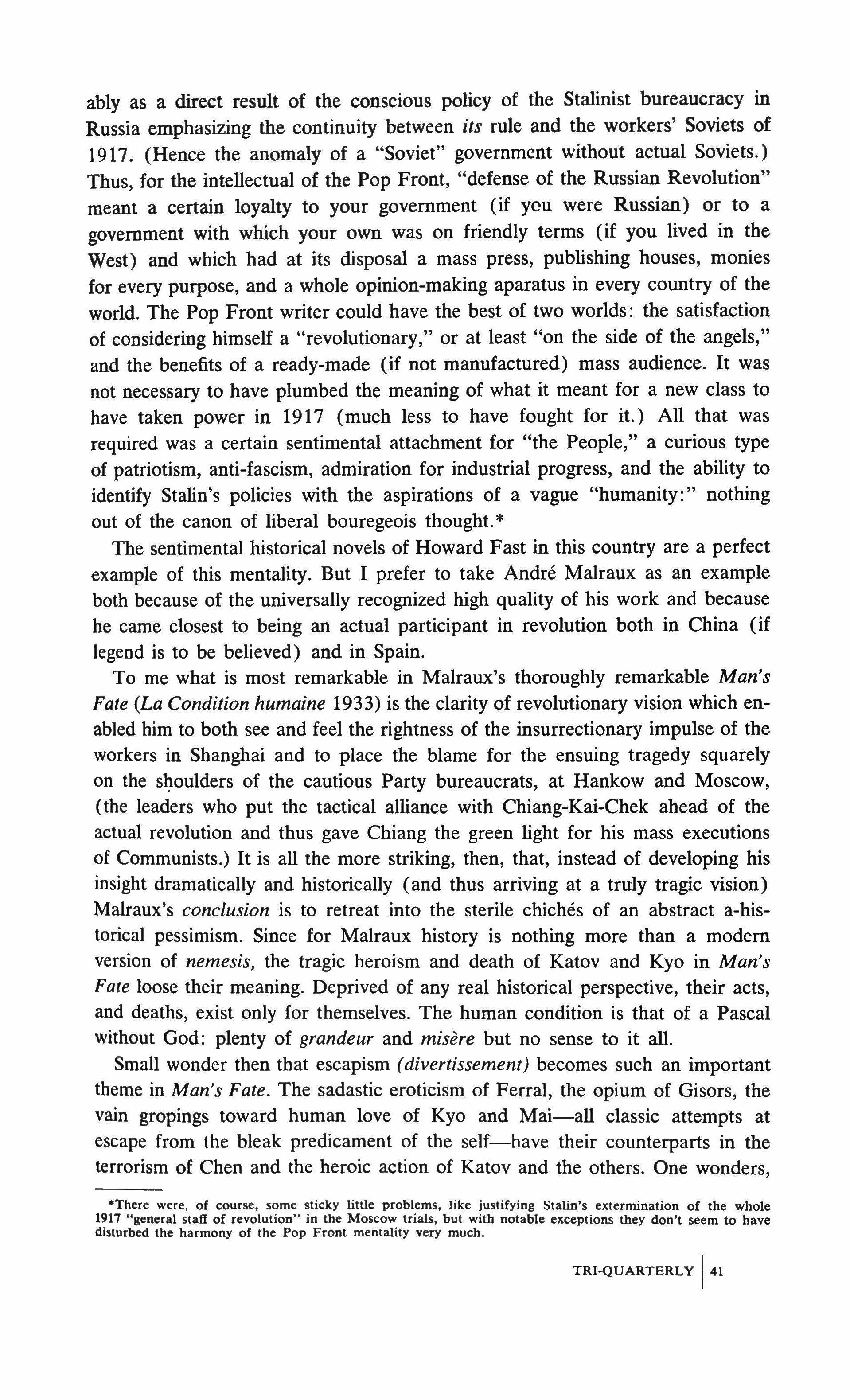
ably as a direct result of the conscious policy of the Stalinist bureaucracy in Russia emphasizing the continuity between its rule and the workers' Soviets of 1917. (Hence the anomaly of a "Soviet" government without actual Soviets.) Thus, for the intellectual of the Pop Front, "defense of the Russian Revolution" meant a certain loyalty to your government (if you were Russian) or to a government with which your own was on friendly terms (if you lived in the West) and which had at its disposal a mass press, publishing houses, monies for every purpose, and a whole opinion-making aparatus in every country of the world. The Pop Front writer could have the best of two worlds: the satisfaction of considering himself a "revolutionary," or at least "on the side of the angels," and the benefits of a ready-made (if not manufactured) mass audience. It was not necessary to have plumbed the meaning of what it meant for a new class to have taken power in 1917 (much less to have fought for it.) All that was required was a certain sentimental attachment for "the People," a curious type of patriotism, anti-fascism, admiration for industrial progress, and the ability to identify Stalin's policies with the aspirations of a vague "humanity:" nothing out of the canon of liberal bouregeois thought. *
The sentimental historical novels of Howard Fast in this country are a perfect example of this mentality. But I prefer to take Andre Malraux as an example both because of the universally recognized high quality of his work and because he came closest to being an actual participant in revolution both in China (if legend is to be believed) and in Spain.
To me what is most remarkable in Malraux's thoroughly remarkable Man's Fate (La Condition humaine 1933) is the clarity of revolutionary vision which enabled him to both see and feel the rightness of the insurrectionary impulse of the workers in Shanghai and to place the blame for the ensuing tragedy squarely on the shoulders of the cautious Party bureaucrats, at Hankow and Moscow, (the leaders who put the tactical alliance with Chiang-Kai-Chek ahead of the actual revolution and thus gave Chiang the green light for his mass executions of Communists.) It is all the more striking, then, that, instead of developing his insight dramatically and historically (and thus arriving at a truly tragic vision) Malraux's conclusion is to retreat into the sterile chiches of an abstract a-historical pessimism. Since for Malraux history is nothing more than a modem version of nemesis, the tragic heroism and death of Katov and Kyo in Man's Fate loose their meaning. Deprived of any real historical perspective, their acts, and deaths, exist only for themselves. The human condition is that of a Pascal without God: plenty of grandeur and misere but no sense to it all.
Small wonder then that escapism (divertissement) becomes such an important theme in Man's Fate. The sadastic eroticism of Ferral, the opium of Gisors, the vain gropings toward human love of Kyo and Mai-all classic attempts at escape from the bleak predicament of the self-have their counterparts in the terrorism of Chen and the heroic action of Katov and the others. One wonders,
°There were. of course, some sticky little problems, like justifying Stalin's extermination of the whole 1917 "general staff of revolution" in the Moscow trials, but with notable exceptions they don't seem to have disturbed the harmony of the Pop Front mentality very much.
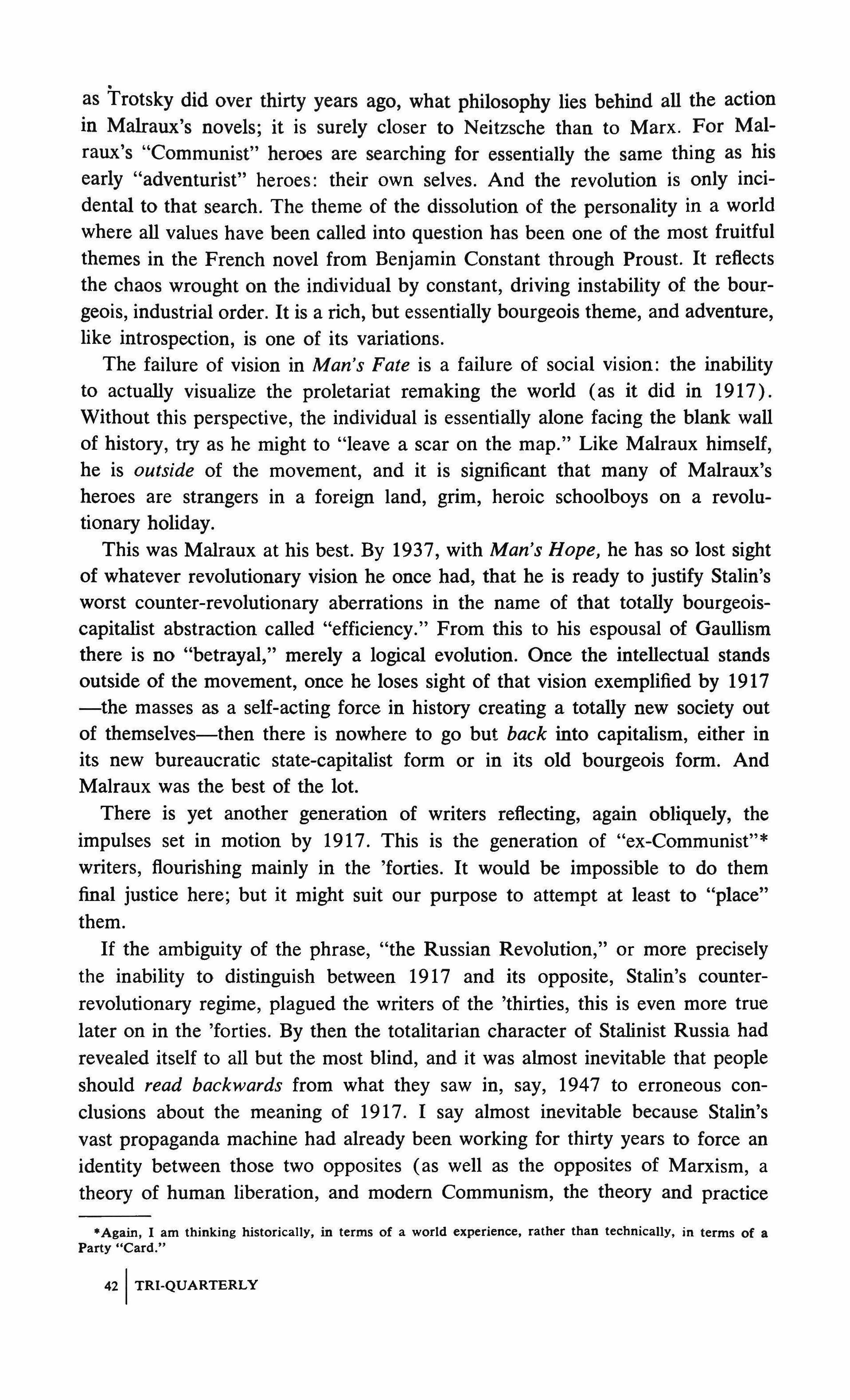
as Trotsky did over thirty years ago, what philosophy lies behind all the action in Malraux's novels; it is surely closer to Neitzsche than to Marx. For Malraux's "Communist" heroes are searching for essentially the same thing as his early "adventurist" heroes: their own selves. And the revolution is only incidental to that search. The theme of the dissolution of the personality in a world where all values have been called into question has been one of the most fruitful themes in the French novel from Benjamin Constant through Proust. It reflects the chaos wrought on the individual by constant, driving instability of the bourgeois, industrial order. It is a rich, but essentially bourgeois theme, and adventure, like introspection, is one of its variations.
The failure of vision in Man's Fate is a failure of social vision: the inability to actually visualize the proletariat remaking the world (as it did in 1917). Without this perspective, the individual is essentially alone facing the blank wall of history, try as he might to "leave a scar on the map." Like Malraux himself, he is outside of the movement, and it is significant that many of Malraux's heroes are strangers in a foreign land, grim, heroic schoolboys on a revolutionary holiday.
This was Malraux at his best. By 1937, with Man's Hope, he has so lost sight of whatever revolutionary vision he once had, that he is ready to justify Stalin's worst counter-revolutionary aberrations in the name of that totally bourgeoiscapitalist abstraction called "efficiency." From this to his espousal of Gaullism there is no "betrayal," merely a logical evolution. Once the intellectual stands outside of the movement, once he loses sight of that vision exemplified by 1917 -the masses as a self-acting force in history creating a totally new society out of themselves-then there is nowhere to go but back into capitalism, either in its new bureaucratic state-capitalist form or in its old bourgeois form. And Malraux was the best of the lot.
There is yet another generation of writers reflecting, again obliquely, the impulses set in motion by 1917. This is the generation of "ex-Communist"* writers, flourishing mainly in the 'forties. It would be impossible to do them final justice here; but it might suit our purpose to attempt at least to "place" them.
If the ambiguity of the phrase, "the Russian Revolution," or more precisely the inability to distinguish between 1917 and its opposite, Stalin's counterrevolutionary regime, plagued the writers of the 'thirties, this is even more true later on in the 'forties. By then the totalitarian character of Stalinist Russia had revealed itself to all but the most blind, and it was almost inevitable that people should read backwards from what they saw in, say, 1947 to erroneous conclusions about the meaning of 1917. I say almost inevitable because Stalin's vast propaganda machine had already been working for thirty years to force an identity between those two opposites (as well as the opposites of Marxism, a theory of human liberation, and modern Communism, the theory and practice
-Again, I am thinking historically, in terms of a world experience, rather than technically, in terms of a Party "Card."
TRl·QUARTERLY
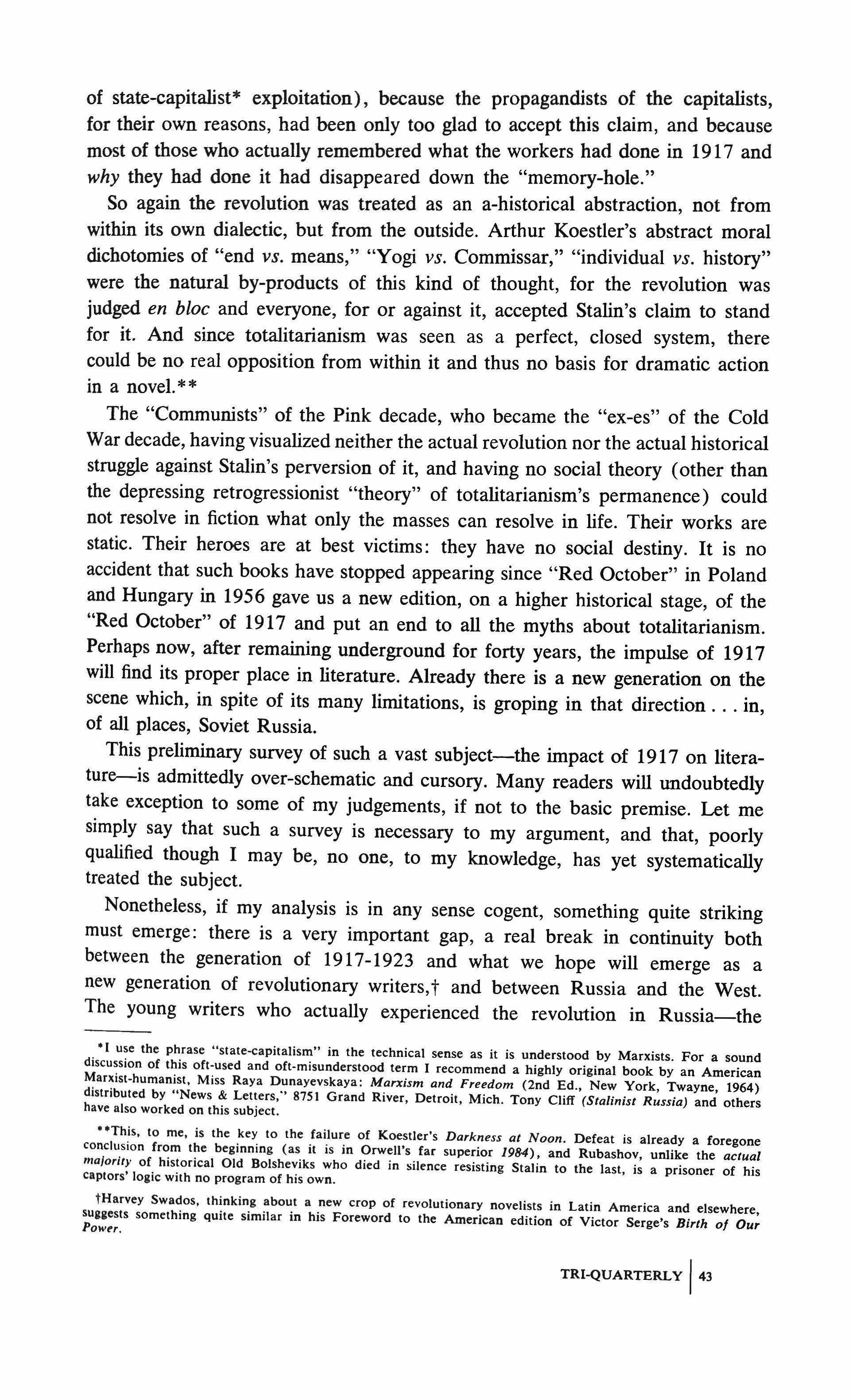
of state-capitalist* exploitation), because the propagandists of the capitalists, for their own reasons, had been only too glad to accept this claim, and because most of those who actually remembered what the workers had done in 1917 and why they had done it had disappeared down the "memory-hole."
So again the revolution was treated as an a-historical abstraction, not from within its own dialectic, but from the outside. Arthur Koestler's abstract moral dichotomies of "end vs. means," "Yogi vs. Commissar," "individual vs. history" were the natural by-products of this kind of thought, for the revolution was judged en bloc and everyone, for or against it, accepted Stalin's claim to stand for it. And since totalitarianism was seen as a perfect, closed system, there could be no real opposition from within it and thus no basis for dramatic action in a novel. * *
The "Communists" of the Pink decade, who became the "ex-es" of the Cold War decade, having visualized neither the actual revolution nor the actual historical struggle against Stalin's perversion of it, and having no social theory (other than the depressing retrogressionist "theory" of totalitarianism's permanence) could not resolve in fiction what only the masses can resolve in life. Their works are static. Their heroes are at best victims: they have no social destiny. It is no accident that such books have stopped appearing since "Red October" in Poland and Hungary in 1956 gave us a new edition, on a higher historical stage, of the "Red October" of 1917 and put an end to all the myths about totalitarianism. Perhaps now, after remaining underground for forty years, the impulse of 1917 will find its proper place in literature. Already there is a new generation on the scene which, in spite of its many limitations, is groping in that direction in, of all places, Soviet Russia.
This preliminary survey of such a vast SUbject-the impact of 1917 on literature--is admittedly over-schematic and cursory. Many readers will undoubtedly take exception to some of my judgements, if not to the basic premise. Let me simply say that such a survey is necessary to my argument, and that, poorly qualified though I may be, no one, to my knowledge, has yet systematically treated the subject.
Nonetheless, if my analysis is in any sense cogent, something quite striking must emerge: there is a very important gap, a real break in continuity both between the generation of 1917-1923 and what we hope will emerge as a new generation of revolutionary writers,t and between Russia and the West. The young writers who actually experienced the revolution in Russia-the
·1 use the phrase "state-capitalism" in the technical sense as it is understood by Marxists. For a sound discussion of this oft-used and oft-misunderstood term I recommend a highly original book by an American Marxist-humanist, Miss Raya Dunayevskaya : Marxism and Freedom (2nd Ed., New York, Twayne, 1964) distributed by "News & Letters;' 8751 Grand River, Detroit, Mich. Tony Cliff (Stalinist Russia) and others have also worked on this subject.
'This, to me, is the key to the failure of Koestler's Darkness at Noon. Defeat is already a foregone conclusion from the beginning (as it is in Orwell's far superior 1984), and Rubashov, unlike the actual majority of historical Old Bolsheviks who died in silence resisting Stalin to the last, is a prisoner of his captors' logic with no program of his own.
tHarvey Swados, thinking about a new crop of revolutionary novelists in Latin America and elsewhere, sUllllests something quite similar in his Foreword to the American edition of Victor Serge's Birth of Our POwtr.

Babels, Pilniaks, Mayakovskys and Yesenins-were cut down, through suicide or imposed silence, at the same time (and not just coincidentally) as the last vestiges of workers' democracy were being eradicated from Russia. While in the West, the writers who embraced (or rejected) the revolution after 1930 saw it only in its Stalinist transformation and from the outside. The actual content of the experience seems never to have gotten past Russia's borders or survived after 1927.
But it did. The man who expeirenced it, who preserved it, who was able to analyse it and transform it into a series of remarkable novels was Victor Serge. Serge, who not only participated in the early stages of the revolution in Russia but actually anticipated it in his own revolutionary activity in Spain, who fought to preserve workers' democracy and socialist "norms" in Russia before the Left Opposition itself was even organized, who suffered persecution as an "irreducible" opponant of Stalin, who escaped death in the great "Purges" through an historical accident that should never have happened and a miracle of solidarity, who lead the campaign in France against the Moscow Trials and the Stalinist "purification" of the Left in Spain, who retained his revolutionary's faith and vision to his death-Serge who left six extraordinary novels and scores of essays and historical works as a testimony to the struggles of three revolutionary generations, was the man. * Serge, then, fills the gap. He is the missing link which, according to objective historical forces, never should have survived: the spokesman for a lostbecause physically exterminated-generation. (In fact for three generations: the pre-WWI European Socialist movement, the Bolchevik movement, and the anti-Stalin opposition.) And as a Frenchified Rusisan, born in exile, he was able both to participate as an insider and to interpret his experience in terms of other movements, other cultures. Serge's place, then, is that of central figure in the tradition of European revolutionary writers, the one in whom the collective experience of 1917 and its aftermath was most sharply crystallized. The question, though, remains, as to whether he had the talent and vision to transform that experience into a lasting literary work, or, put another way, whether he was able to solve the problem of the individual's relationship to history within the framework of the novel. In my opinion he was successful, as I will attempt to show, but until Serge's works become more accessible to the public and a larger number of readers have had the opportunity, over a period of years, to
*To the reader who is, quite correctly suspicious about the extraordinary claims I am making for a man about whom he has probably never heard, I offer no apologies. Only this: Serge died in exile in 1947. Most of his friends, when they had escaped the GPU, were killed by the Nazis. His pre-war books were long out of print, and his name (where there were survivors to remember it) was besmirched b�l his Stalinist antagonists. Since he remained a revolutionary, his anti-Communist works could never be "used" for reactionary or Cold War purposes; to the communists themselves he was, of course, an "un-person." Always an awkward person to have around, like many who have insisted on the truth, he was too "hot" for American publishers and too anti-totalitarian for the Left-leaning (i.e. pro-Communist) publishers in Europe and in Latin America. Crushed between the upper and nether millstones of the Cold War, his works remained unavailable: in manuscript or out of print. It has only been since 1960, (in my opinion under the objective influence of the New Left, the new revolutionary movements in the third world, the de-Stalinization movement in Russia and the Negro revolution here) that interest in Serge has revived. New editions are at last becoming available in French, and translations are appearing in English (see bibliography). But even now I am in the embarrassing position of talking about books which are largely unavailable to my audience.
TRI-QUARTERLY
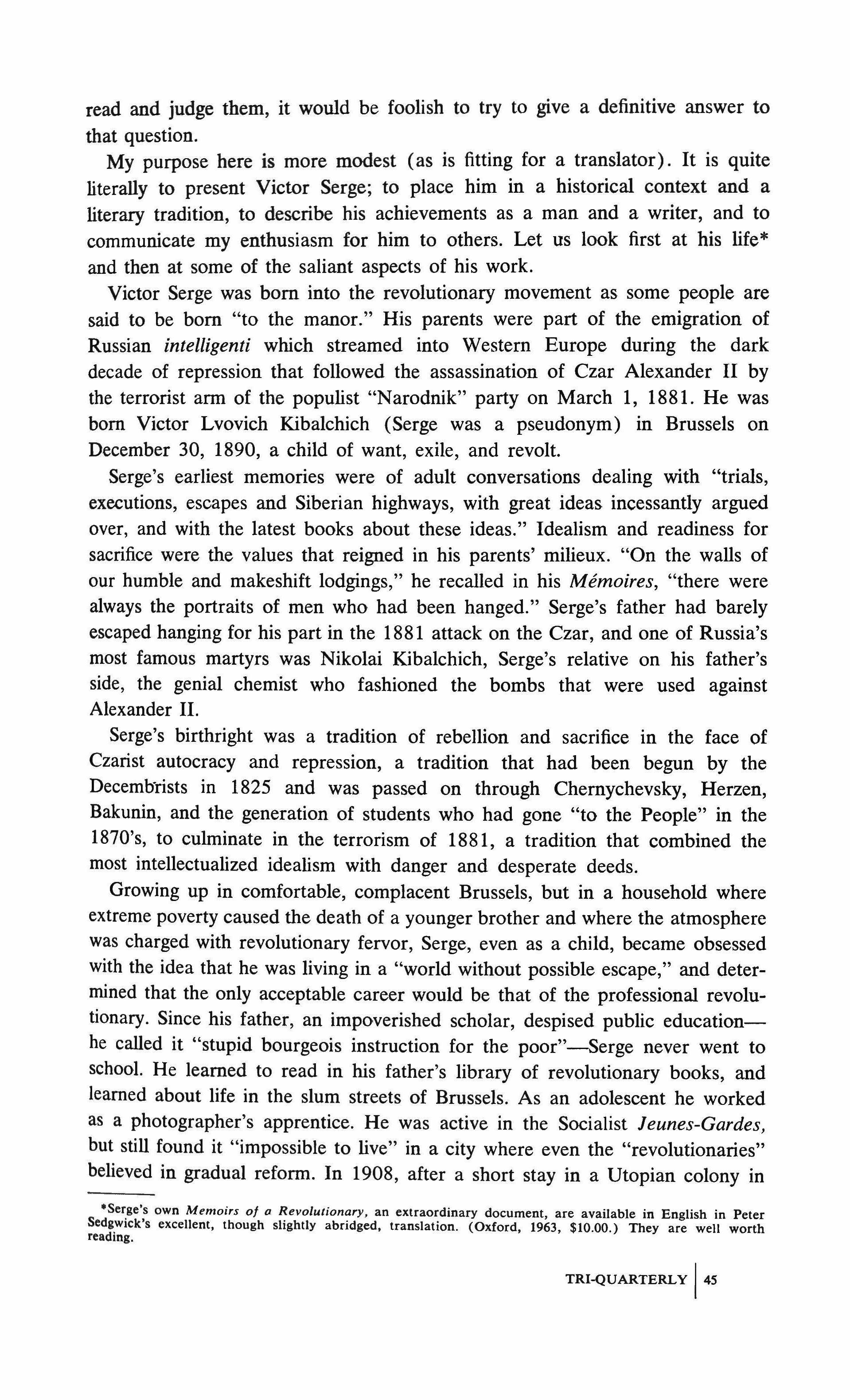
read and judge them, it would be foolish to try to give a definitive answer to that question.
My purpose here is more modest (as is fitting for a translator). It is quite literally to present Victor Serge; to place him in a historical context and a literary tradition, to describe his achievements as a man and a writer, and to communicate my enthusiasm for him to others. Let us look first at his life* and then at some of the saliant aspects of his work.
Victor Serge was born into the revolutionary movement as some people are said to be born "to the manor." His parents were part of the emigration of Russian intelligenti which streamed into Western Europe during the dark decade of repression that followed the assassination of Czar Alexander II by the terrorist arm of the populist "Narodnik" party on March 1, 1881. He was born Victor Lvovich Kibalchich (Serge was a pseudonym) in Brussels on December 30, 1890, a child of want, exile, and revolt.
Serge's earliest memories were of adult conversations dealing with "trials, executions, escapes and Siberian highways, with great ideas incessantly argued over, and with the latest books about these ideas." Idealism and readiness for sacrifice were the values that reigned in his parents' milieux. "On the walls of our humble and makeshift lodgings," he recalled in his Memoires, "there were always the portraits of men who had been hanged." Serge's father had barely escaped hanging for his part in the 1881 attack on the Czar, and one of Russia's most famous martyrs was Nikolai Kibalchich, Serge's relative on his father's side, the genial chemist who fashioned the bombs that were used against Alexander II.
Serge's birthright was a tradition of rebellion and sacrifice in the face of Czarist autocracy and repression, a tradition that had been begun by the Decembrists in 1825 and was passed on through Chernychevsky, Herzen, Bakunin, and the generation of students who had gone "to the People" in the 1870's, to culminate in the terrorism of 1881, a tradition that combined the most intellectualized idealism with danger and desperate deeds.
Growing up in comfortable, complacent Brussels, but in a household where extreme poverty caused the death of a younger brother and where the atmosphere was charged with revolutionary fervor, Serge, even as a child, became obsessed with the idea that he was living in a "world without possible escape," and determined that the only acceptable career would be that of the professional revolutionary. Since his father, an impoverished scholar, despised public educationhe called it "stupid bourgeois instruction for the poor"-Serge never went to school. He learned to read in his father's library of revolutionary books, and learned about life in the slum streets of Brussels. As an adolescent he worked as a photographer's apprentice. He was active in the Socialist Ieunes-Gardes, but still found it "impossible to live" in a city where even the "revolutionaries" believed in gradual reform. In 1908, after a short stay in a Utopian colony in 'Serge's own Memoirs 0/ 0 Revolutionary, an extraordinary document, are available in English in Peter Sedg.wic:k's excellent, though slightly abridged, translation. (Oxford, 1963, $10.00.) They are well worth readmg.
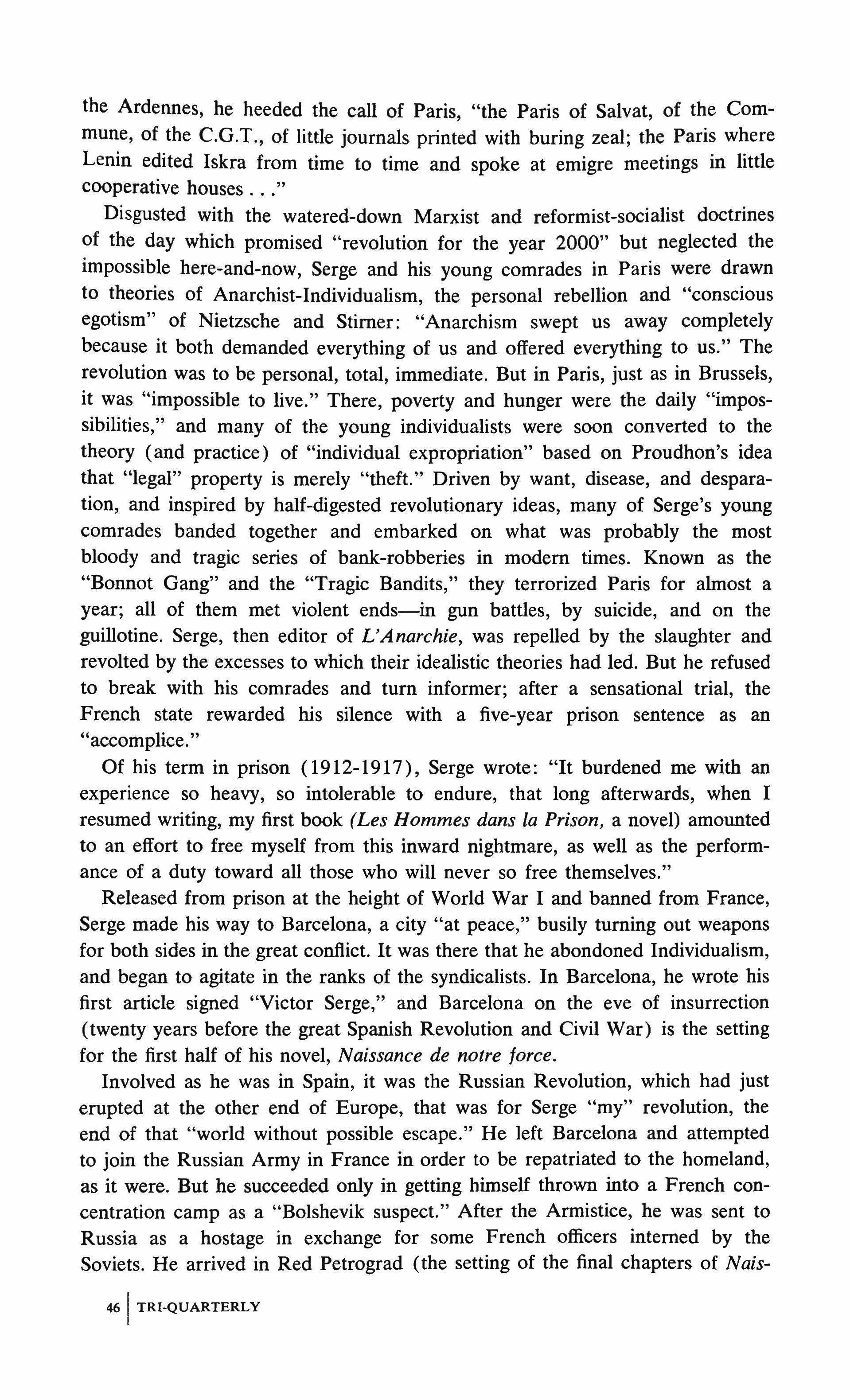
the Ardennes, he heeded the call of Paris, "the Paris of Salvat, of the Commune, of the C.G.T., of little journals printed with buring zeal; the Paris where Lenin edited Iskra from time to time and spoke at emigre meetings in little cooperative houses
Disgusted with the watered-down Marxist and reformist-socialist doctrines of the day which promised "revolution for the year 2000" but neglected the impossible here-and-now, Serge and his young comrades in Paris were drawn to theories of Anarchist-Individualism, the personal rebeIlion and "conscious egotism" of Nietzsche and Stirner: "Anarchism swept us away completely because it both demanded everything of us and offered everything to us." The revolution was to be personal, total, immediate. But in Paris, just as in Brussels, it was "impossible to live." There, poverty and hunger were the daily "impossibilities," and many of the young individualists were soon converted to the theory (and practice) of "individual expropriation" based on Proudhon's idea that "legal" property is merely "theft." Driven by want, disease, and desparation, and inspired by half-digested revolutionary ideas, many of Serge's young comrades banded together and embarked on what was probably the most bloody and tragic series of bank-robberies in modern times. Known as the "Bonnot Gang" and the "Tragic Bandits," they terrorized Paris for almost a year; all of them met violent ends-in gun battles, by suicide, and on the guillotine. Serge, then editor of L'Anarchie, was repelled by the slaughter and revolted by the excesses to which their idealistic theories had led. But he refused to break with his comrades and turn informer; after a sensational trial, the French state rewarded his silence with a five-year prison sentence as an "accomplice.
Of his term in prison (1912-1917), Serge wrote: "It burdened me with an experience so heavy, so intolerable to endure, that long afterwards, when I resumed writing, my first book (Les Hommes dans La Prison, a novel) amounted to an effort to free myself from this inward nightmare, as well as the performance of a duty toward all those who will never so free themselves."
Released from prison at the height of World War I and banned from France, Serge made his way to Barcelona, a city "at peace," busily turning out weapons for both sides in the great conflict. It was there that he abondoned Individualism, and began to agitate in the ranks of the syndicalists. In Barcelona, he wrote his first article signed "Victor Serge," and Barcelona on the eve of insurrection (twenty years before the great Spanish Revolution and Civil War) is the setting for the first half of his novel, Naissance de notre force.
Involved as he was in Spain, it was the Russian Revolution, which had just erupted at the other end of Europe, that was for Serge "my" revolution, the end of that "world without possible escape." He left Barcelona and attempted to join the Russian Army in France in order to be repatriated to the homeland, as it were. But he succeeded only in getting himself thrown into a French concentration camp as a "Bolshevik suspect." After the Armistice, he was sent to Russia as a hostage in exchange for some French officers interned by the Soviets. He arrived in Red Petrograd (the setting of the final chapters of Nais-
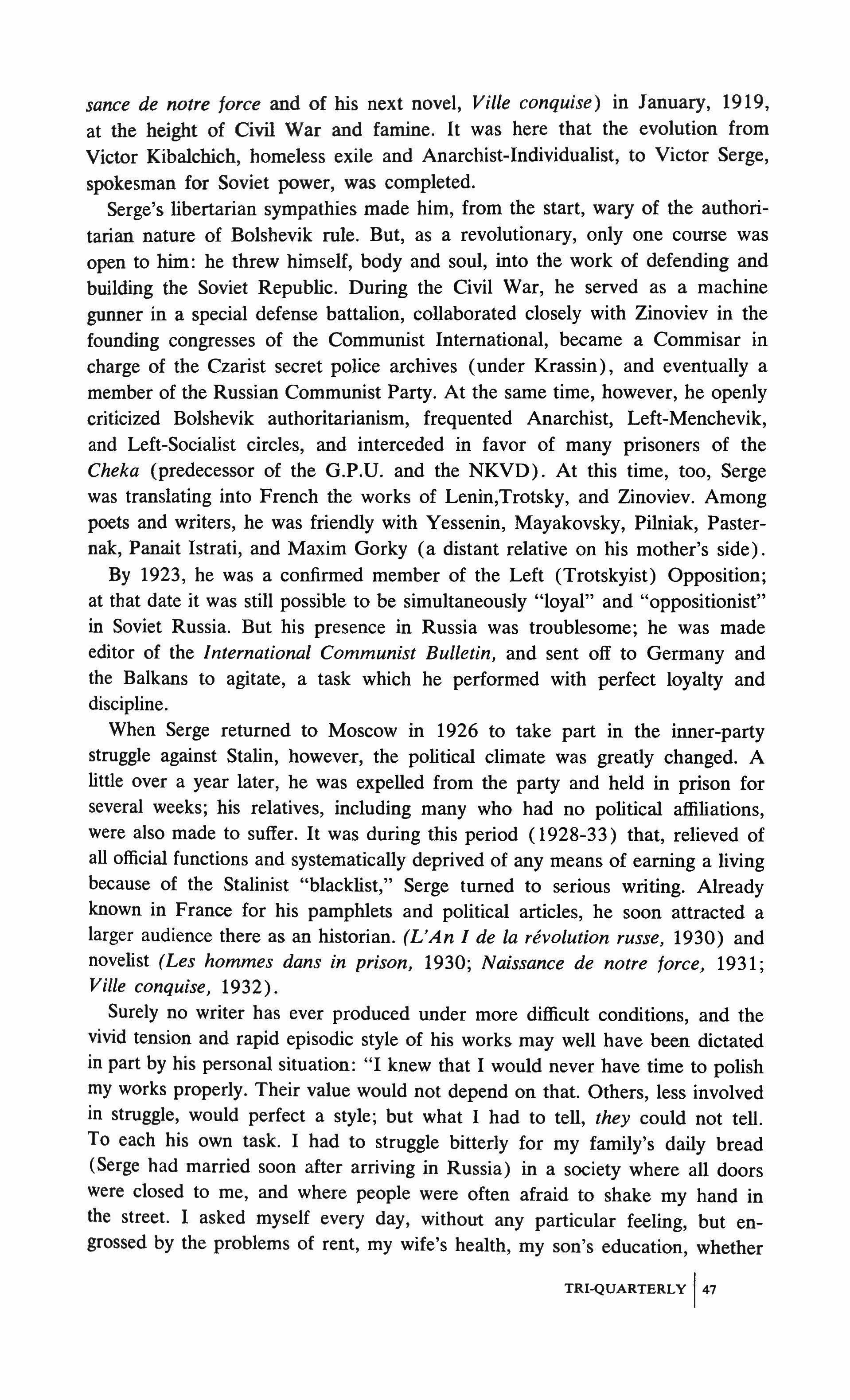
sance de notre force and of his next novel, Ville conquise) in January, 1919, at the height of Civil War and famine. It was here that the evolution from Victor Kibalchich, homeless exile and Anarchist-Individualist, to Victor Serge, spokesman for Soviet power, was completed.
Serge's libertarian sympathies made him, from the start, wary of the authoritarian nature of Bolshevik rule. But, as a revolutionary, only one course was open to him: he threw himself, body and soul, into the work of defending and building the Soviet Republic. During the Civil War, he served as a machine gunner in a special defense battalion, collaborated closely with Zinoviev in the founding congresses of the Communist International, became a Commisar in charge of the Czarist secret police archives (under Krassin), and eventually a member of the Russian Communist Party. At the same time, however, he openly criticized Bolshevik authoritarianism, frequented Anarchist, Left-Menchevik, and Left-Socialist circles, and interceded in favor of many prisoners of the Cheka (predecessor of the G.P.D. and the NKVD). At this time, too, Serge was translating into French the works of Lenin,Trotsky, and Zinoviev. Among poets and writers, he was friendly with Yessenin, Mayakovsky, Pilniak, Pasternak, Panait Istrati, and Maxim Gorky (a distant relative on his mother's side). By 1923, he was a confirmed member of the Left (Trotskyist) Opposition; at that date it was still possible to be simultaneously "loyal" and "oppositionist" in Soviet Russia. But his presence in Russia was troublesome; he was made editor of the International Communist Bulletin, and sent off to Germany and the Balkans to agitate, a task which he performed with perfect loyalty and discipline.
When Serge returned to Moscow in 1926 to take part in the inner-party struggle against Stalin, however, the political climate was greatly changed. A little over a year later, he was expelled from the party and held in prison for several weeks; his relatives, including many who had no political affiliations, were also made to suffer. It was during this period (1928-33) that, relieved of all official functions and systematically deprived of any means of earning a living because of the Stalinist "blacklist," Serge turned to serious writing. Already known in France for his pamphlets and political articles, he soon attracted a larger audience there as an historian. (VAn I de la revolution russe, 1930) and novelist (Les hommes dans in prison, 1930; Naissance de notre force, 1931; Ville conquise, 1932).
Surely no writer has ever produced under more difficult conditions, and the vivid tension and rapid episodic style of his works may well have been dictated in part by his personal situation: "I knew that 1 would never have time to polish my works properly. Their value would not depend on that. Others, less involved in struggle, would perfect a style; but what 1 had to tell, they could not tell. To each his own task. 1 had to struggle bitterly for my family's daily bread (Serge had married soon after arriving in Russia) in a society where all doors were closed to me, and where people were often afraid to shake my hand in the street. 1 asked myself every day, without any particular feeling, but engrossed by the problems of rent, my wife's health, my son's education, whether
TRI-QUARTERLy 147
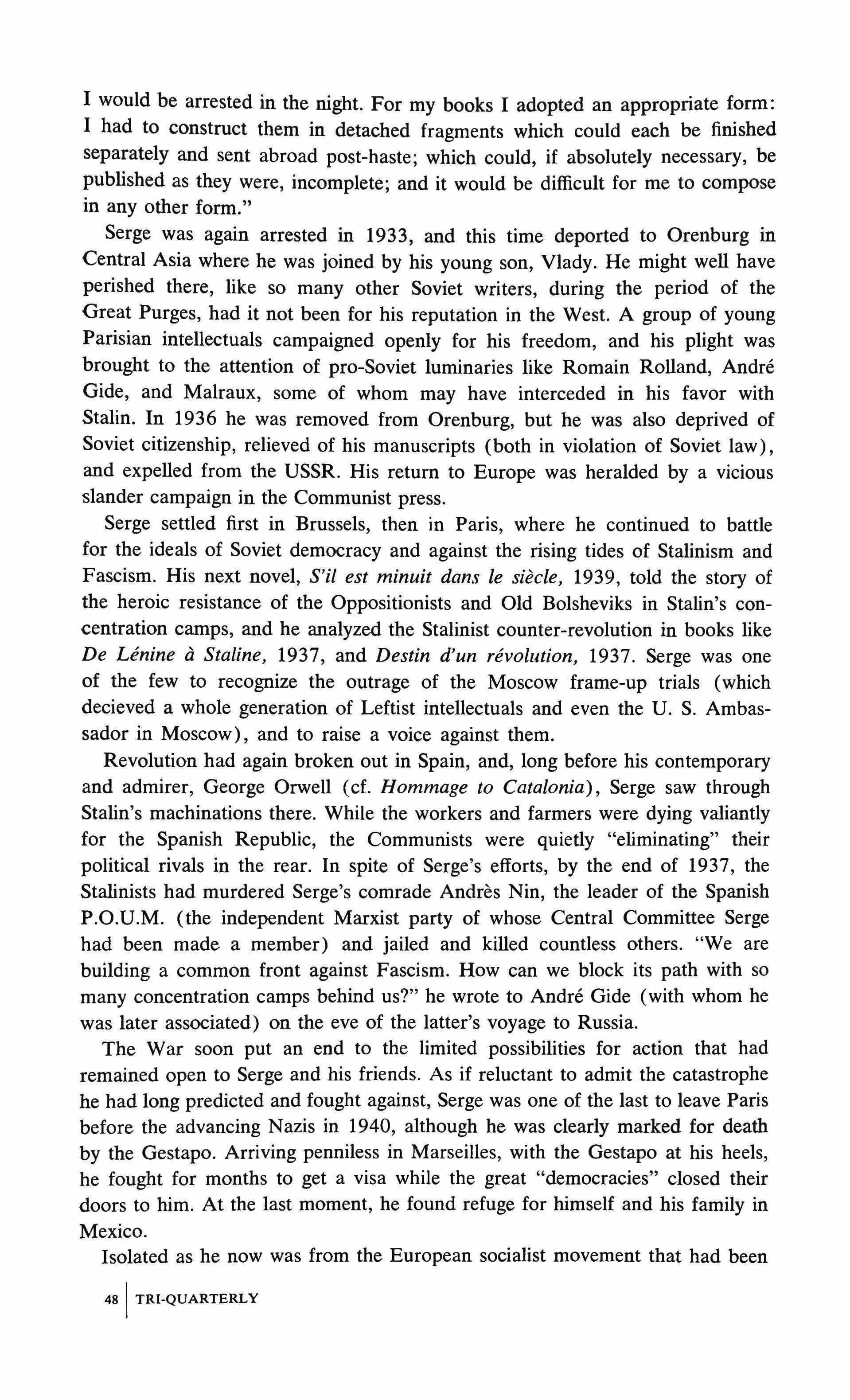
I would be arrested in the night. For my books I adopted an appropriate form: I had to construct them in detached fragments which could each be finished separately and sent abroad post-haste; which could, if absolutely necessary, be published as they were, incomplete; and it would be difficult for me to compose in any other form."
Serge was again arrested in 1933, and this time deported to Orenburg in Central Asia where he was joined by his young son, Vlady. He might well have perished there, like so many other Soviet writers, during the period of the Great Purges, had it not been for his reputation in the West. A group of young Parisian intellectuals campaigned openly for his freedom, and his plight was brought to the attention of pro-Soviet luminaries like Romain Rolland, Andre Gide, and Malraux, some of whom may have interceded in his favor with Stalin. In 1936 he was removed from Orenburg, but he was also deprived of Soviet citizenship, relieved of his manuscripts (both in violation of Soviet law), and expelled from the USSR. His return to Europe was heralded by a vicious slander campaign in the Communist press.
Serge settled first in Brussels, then in Paris, where he continued to battle for the ideals of Soviet democracy and against the rising tides of Stalinism and Fascism. His next novel, S'il est minuit dans Ie siecle, 1939, told the story of the heroic resistance of the Oppositionists and Old Bolsheviks in Stalin's concentration camps, and he analyzed the Stalinist counter-revolution in books like De Lenine a Staline, 1937, and Destin d'un revolution, 1937. Serge was one of the few to recognize the outrage of the Moscow frame-up trials (which decieved a whole generation of Leftist intellectuals and even the U. S. Ambassador in Moscow), and to raise a voice against them.
Revolution had again broken out in Spain, and, long before his contemporary and admirer, George Orwell (cf. Hommage to Catalonia), Serge saw through Stalin's machinations there. While the workers and farmers were dying valiantly for the Spanish Republic, the Communists were quietly "eliminating" their political rivals in the rear. In spite of Serge's efforts, by the end of 1937, the Stalinists had murdered Serge's comrade Andres Nin, the leader of the Spanish P.O.U.M. (the independent Marxist party of whose Central Committee Serge had been made a member) and jailed and killed countless others. "We are building a common front against Fascism. How can we block its path with so many concentration camps behind us?" he wrote to Andre Gide (with whom he was later associated) on the eve of the latter's voyage to Russia.
The War soon put an end to the limited possibilities for action that had remained open to Serge and his friends. As if reluctant to admit the catastrophe he had long predicted and fought against, Serge was one of the last to leave Paris before the advancing Nazis in 1940, although he was clearly marked for death by the Gestapo. Arriving penniless in Marseilles, with the Gestapo at his heels, he fought for months to get a visa while the great "democracies" closed their doors to him. At the last moment, he found refuge for himself and his family in Mexico.
Isolated as he now was from the European socialist movement that had been

his life, forced to be an impotent witness to the debacle of Europe under Hitler, manaced by NKVD assassins (who had recently murdered his friend Trotsky, also in Mexico), deprived of a journalistic platform by his Stalinist opponents, Serge might well have been thoroughly demoralized by his years in Mexico. But he continued to write, though without hope of publication, and produced some of his finest works (L'AfJaire Toulaev and Memoires d'un revolutionnaire) "for the desk drawer." At the end of the war, in spite of failing health and financial difficulties, he made plans to return to France. But his many projects for new books and new struggles were cut short by his death on November 17, 1947.
Even at the lowest ebb of his fortunes (in 1943), Serge had found the courage to write: "I have undergone a little over ten years of various forms of captivity, agitated in seven countries and written twenty books. I own nothing. On several occasions a press with a vast circulation has hurled filth at me because I spoke the truth. Behind us lies a victorious revolution gone astray, several abortive attempts at revolution, and massacres in so great number as to inspire a certain dizziness. And to think that it is not over yet. Let me be done with this digression; those were the only roads possible for us. I have more confidence in mankind and in the future than ever before."
Serge's dedication to absolute political honesty and clear-sightedness (probite and luciditei as the only basis for building a genuine revolutionary movement had its corollary in his devotion to artistic truth.
The noun "witness' is a rough English equivalent of the Green martus, from which our word "martyr" is also derived. The idea of being a witness to one's faith implies not only testifying to a creed, but also participation and active suffering, freely accepted, in the name of something larger than one's personal ego. It also implies a priviledged situation. Poets and other creative artists have long claimed this kind of status for themselves. Whether they chose to suffer in the name of the forward march of Humanity (Hugo and the social romantics) or for the purity of Art and the Ideal (Baudelaire and the symbolists), they have regularly assumed that the greater the risk and the deeper the plunge into the mysteries of existence, the richer will be the prize with which the artist returns and which he offers up to an often uncomprehending humanity.
Victor Serge was such a martyr-witness. He felt that "artistic detachment" was not a means for being objective about reality, but only a fashionable means of avoiding a confrontation with it. And he plunged headlong into a maelstrom of social destruction and revolutionary upheaval. His committment to revolution was made long before Communist state power made it easy and at times profitable for writers to become engage, and it continued long after many of them had returned to their ivory towers proclaiming that their new-found god had failed. As one of the only survivors of three revolutionary generations, he had occupied a unique position, a position form which he, perhaps better than any other writer, was able to render both the heroism and the tragedy of a whole age of revolution.
For Serge, "He who speaks, he who writes is above all one who speaks on behalf of all those who have no voice," and he wrote out of a bond of solidarity

with the men whose often tragic destinies fill the pages of his works-the heroes and the victims, the brave and the cowardly, the anarchists, Bolsheviks, bandits, madmen, poets, beggars, and the common workers. He defined the need to write as a need "first of all to capture, to fix, to understand, to interpret, to re-create life; to liberate, through exteriorization, the confused forces one feels fermenting within oneself and by means of which the individual plunges into the collective unconscious. In the work itself, this comes across as Testimony and Message He goes on to say, "Writing becomes a search for poly-personality, a means of living several destinies, of penetration into others, of communicating with them. The writer becomes conscious of the world he brings to life, he is its consciousness and he thus escapes from the ordinary limits of the self, something which is at once intoxicating and enriching with lucidity." (Camels, Paris, 1952)
This attitude made it possible for Serge fully to appreciate the experience of his turbulent life and to distill them into the contrete characterizations in his fiction. His life as an activist was unique in that he managed to be in virtually every revolutionary storm-center during the first part of this century. But his experiences were nonetheless typical for a man of his times; individually, they recapitulated the experiences of millions of men caught up in the struggles of European society.
In the solitude of his Mexican exile, after a chance meeting with Trotsky'S widow, Natalia Sedova, Serge wrote sadly in his diary: "(We are) the sole survivors of the Russian Revolution here and perhaps anywhere in the world There is nobody left who knows what the Russian Revolution was really like, what the Bolsheviks were really like-and men judge without knowing, with bitterness and a basic rigidity." That ineffable quality, "What things were really like"-the aspects, tone of voice, emotional context of a human event, personal or historical-that is what the novelist's ear and eye can catch and what makes of his social or historical fiction a truer record of living reality than the historian's data or the theoretician's rational frames.
Victor Serge's six published novels* fall into two groups or "cycles," the cycle of revolution and the cycle of resistance. The first comprises the novels he wrote in Russia between 1928 and 1931 during the period when, deprived of any opportunity of criticising the regime and faced with probable "elimination" in the near future, he reflected back over the heroic early years of revolution.
OAt least two of Serge's completed novels, Les Hommes perdus (about the pre-war French anarchist movement) and La Tourmente, the novel in which Serge felt he had best expressed the grandeur of the revolution, were illegally seized by the Russian secret police at the time of Serge's expulsion from the country. I use the term "illegally" advisedly, for these works had received an exit permit from the official literary censor (the Glavlit) and were simply swiped by some GPU officers. There is considerable evidence that they were not destroyed, for material that could only have been known by someone who had read them was later used in slanders against Serge in the Communist Press. There is no reason to assume that they are not still on file somewhere in Russia, and the fact that they were once legally authorized to be removed from the country may be a useful lever in asking that they be released. This would indeed be a valuable find!
Serge's final novel, Les Annees san pardon, appears to have been completed and still exists in manuscript form. It, like parts of Les derniers temps, deals with a theme that preoccupied Serge more and more at the end of his life: the plight of the exile or displaced person as the image of man under totalitarianism. The publication of this novel would close the second cycle, just as the recovery of the two "lost" novels would fill the gaps in the first one.
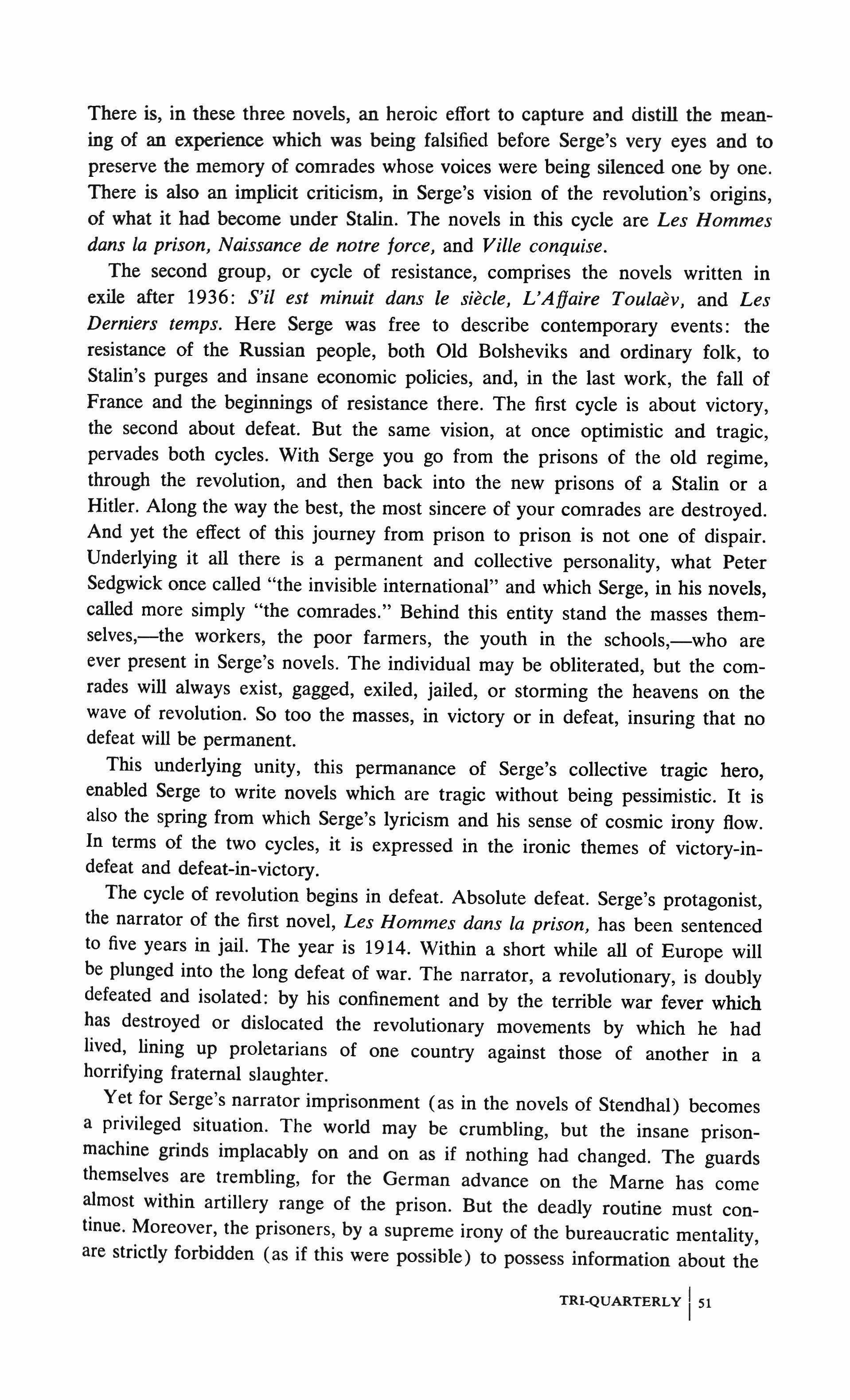
There is, in these three novels, an heroic effort to capture and distill the meaning of an experience which was being falsified before Serge's very eyes and to preserve the memory of comrades whose voices were being silenced one by one. There is also an implicit criticism, in Serge's vision of the revolution's origins, of what it had become under Stalin. The novels in this cycle are Les Hommes dans La prison, Naissance de notre force, and Ville conquise.
The second group, or cycle of resistance, comprises the novels written in exile after 1936: S'il est minuit dans le siecle, L'AfJaire Toulaev, and Les Derniers temps. Here Serge was free to describe contemporary events: the resistance of the Russian people, both Old Bolsheviks and ordinary folk, to Stalin's purges and insane economic policies, and, in the last work, the fall of France and the beginnings of resistance there. The first cycle is about victory, the second about defeat. But the same vision, at once optimistic and tragic, pervades both cycles. With Serge you go from the prisons of the old regime, through the revolution, and then back into the new prisons of a Stalin or a Hitler. Along the way the best, the most sincere of your comrades are destroyed. And yet the effect of this journey from prison to prison is not one of dispair. Underlying it all there is a permanent and collective personality, what Peter Sedgwick once called "the invisible international" and which Serge, in his novels, called more simply "the comrades." Behind this entity stand the masses themselves,-the workers, the poor farmers, the youth in the schools,-who are ever present in Serge's novels. The individual may be obliterated, but the comrades will always exist, gagged, exiled, jailed, or storming the heavens on the wave of revolution. So too the masses, in victory or in defeat, insuring that no defeat will be permanent.
This underlying unity, this permanance of Serge's collective tragic hero, enabled Serge to write novels which are tragic without being pessimistic. It is also the spring from which Serge's lyricism and his sense of cosmic irony flow. In terms of the two cycles, it is expressed in the ironic themes of victory-in defeat and defeat-in-victory.
The cycle of revolution begins in defeat. Absolute defeat. Serge's protagonist, the narrator of the first novel, Les Hommes dans La prison, has been sentenced to five years in jail. The year is 1914. Within a short while all of Europe will be plunged into the long defeat of war. The narrator, a revolutionary, is doubly defeated and isolated: by his confinement and by the terrible war fever which has destroyed or dislocated the revolutionary movements by which he had lived, lining up proletarians of one country against those of another in a horrifying fraternal slaughter.
Yet for Serge's narrator imprisonment (as in the novels of Stendhal) becomes a privileged situation. The world may be crumbling, but the insane prison machine grinds implacably on and on as if nothing had changed. The guards themselves are trembling, for the German advance on the Marne has come almost within artillery range of the prison. But the deadly routine must continue. Moreover, the prisoners, by a supreme irony of the bureaucratic mentality, are strictly forbidden (as if this were possible) to possess information about the TRI-QUARTERLy I Sl

catastrophe in the outside world. In this situation Serge's narrator derives a fierce satisfaction from the idea that his prison-that microcosm of a brutal society-may soon be destroyed by the cannon, the ultimate symbol of that society in its most inhuman, and therefore most natural, incarnation. Far from sharing his captors' terror, he experiences an apolalyptic sense of release, a savage joy:
Events presented themselves to us with incomprehensible simplicity. The war burst suddenly out of the void. We knew nothing of its antecedents. We were thus, through the cruelest of ironies, perhaps the only men in Europe in those mad days to look at it with the detachment of inhabitants of another planet. We were quite certainly among the few Europeans who were not sucked into the terrible war fever of those first days
At night, in our cells, we could hear strange rumblings coming from the nearby town: the Marseillaise clamored by delirious crowds in stations filled with departing soldiers, the sudden train-whistles, the muffled sound of bands playing. We would listen, straining, taking in that vague, contagious enthusiasm, then horribly saddened to fall back into the silence, the emptiness, the useless anguish of our nights
The steeple of our prison church seemed to us to be a perfect landmark for artillery. Poule, terrified, asked me: "Do you really think they'll shell us?" "Naturally," I replied. I was living alone. I could feel the fear spreading from one man to the next. I felt a sort of exaltation which gave birth to a great serenity. The old world was being smashed by the cannon. The Mill would be crushed by the cannon. The law of killing and being killed was reaffirmed for my generation
There was a profound joy in thinking about this ressurection of the world through the cannon, which at last had interrupted our round.
The cannon moved closer. We remained in our dormitory cells for three straight days; they were immensely serene days. No more rounds beating the pavement. The Mill had stopped grinding. The Mill, resigned, was waiting for that shell, that great mill-stone which would pulvurize it in tum. The terrified guards neglected us. I had received an encouraging letter. I was reading the life of Luther. I was alone with my serenity
We were the only men on earth who were forbidden to know war; but, reading nothing, barely glimpsing-through the double smoke-screen of war and administrative stupidity-the main lines of history, there were some of us-a few-who were privileged with exceptional lucidity. I knew enough about the inner decay of the Russian Empire to be able to see, at the very moment when the Cossacks still incarnated the hope of more than one of the old Western countries, that its fall was inevitable. Long before Europe ever dreamed of it, we were discussing, in whispers, the coming Russian revolution. We knew in what part of the globe the long-awaited flame would be born. And we found a new reason for living in this.
Nothing changed. The cannon reigned over all of old Europe. A million corpses piled up in the Verdun bone-yard. France, bleeding through many gaping wounds, avidly absorbed the new strength of Canadians, New Zealanders, Hindus, Senegalese and Portugese. In the Mill, six hundred men continued their senseless round, attesting to the permanance of order
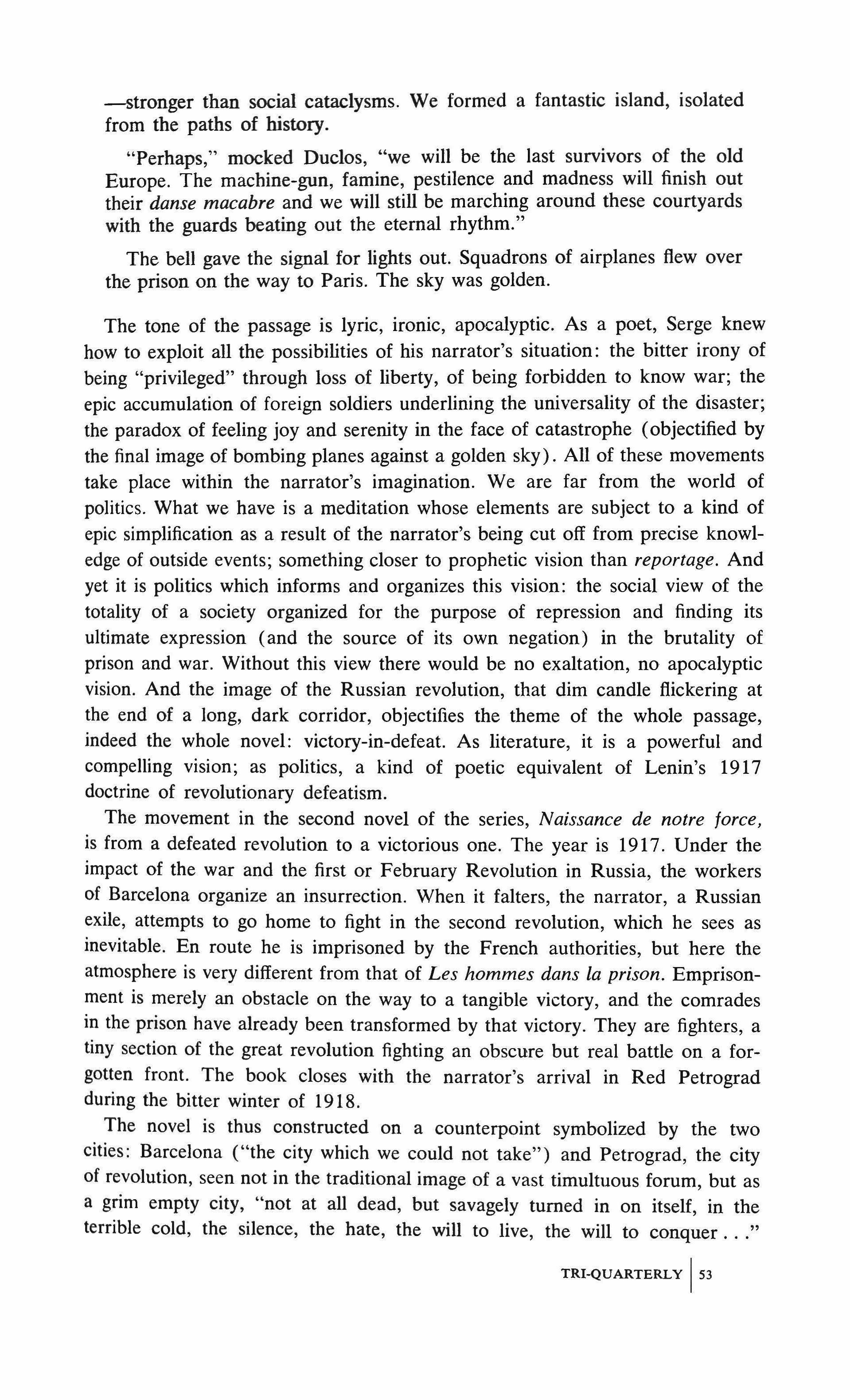
-stronger than social cataclysms. We formed a fantastic island, isolated from the paths of history.
"Perhaps," mocked Duclos, "we will be the last survivors of the old Europe. The machine-gun, famine, pestilence and madness will finish out their danse macabre and we will still be marching around these courtyards with the guards beating out the eternal rhythm."
The bell gave the signal for lights out. Squadrons of airplanes flew over the prison on the way to Paris. The sky was golden.
The tone of the passage is lyric, ironic, apocalyptic. As a poet, Serge knew how to exploit all the possibilities of his narrator's situation: the bitter irony of being "privileged" through loss of liberty, of being forbidden to know war; the epic accumulation of foreign soldiers underlining the universality of the disaster; the paradox of feeling joy and serenity in the face of catastrophe (objectified by the final image of bombing planes against a golden sky). All of these movements take place within the narrator's imagination. We are far from the world of politics. What we have is a meditation whose elements are subject to a kind of epic simplification as a result of the narrator's being cut off from precise knowledge of outside events; something closer to prophetic vision than reportage. And yet it is politics which informs and organizes this vision: the social view of the totality of a society organized for the purpose of repression and finding its ultimate expression (and the source of its own negation) in the brutality of prison and war. Without this view there would be no exaltation, no apocalyptic vision. And the image of the Russian revolution, that dim candle flickering at the end of a long, dark corridor, objectifies the theme of the whole passage, indeed the whole novel: victory-in-defeat. As literature, it is a powerful and compelling vision; as politics, a kind of poetic equivalent of Lenin's 1917 doctrine of revolutionary defeatism.
The movement in the second novel of the series, Naissance de notre force, is from a defeated revolution to a victorious one. The year is 1917. Under the impact of the war and the first or February Revolution in Russia, the workers of Barcelona organize an insurrection. When it falters, the narrator, a Russian exile, attempts to go home to fight in the second revolution, which he sees as inevitable. En route he is imprisoned by the French authorities, but here the atmosphere is very different from that of Les hommes dans La prison. Emprisonment is merely an obstacle on the way to a tangible victory, and the comrades in the prison have already been transformed by that victory. They are fighters, a tiny section of the great revolution fighting an obscure but real battle on a forgotten front. The book closes with the narrator's arrival in Red Petrograd during the bitter winter of 1918.
The novel is thus constructed on a counterpoint symbolized by the two cities: Barcelona ("the city which we could not take") and Petrograd, the city of revolution, seen not in the traditional image of a vast timultuous forum, but as a grim empty city, "not at all dead, but savagely turned in on itself, in the terrible cold, the silence, the hate, the will to live, the will to conquer
TRI-QUARTERLy S3
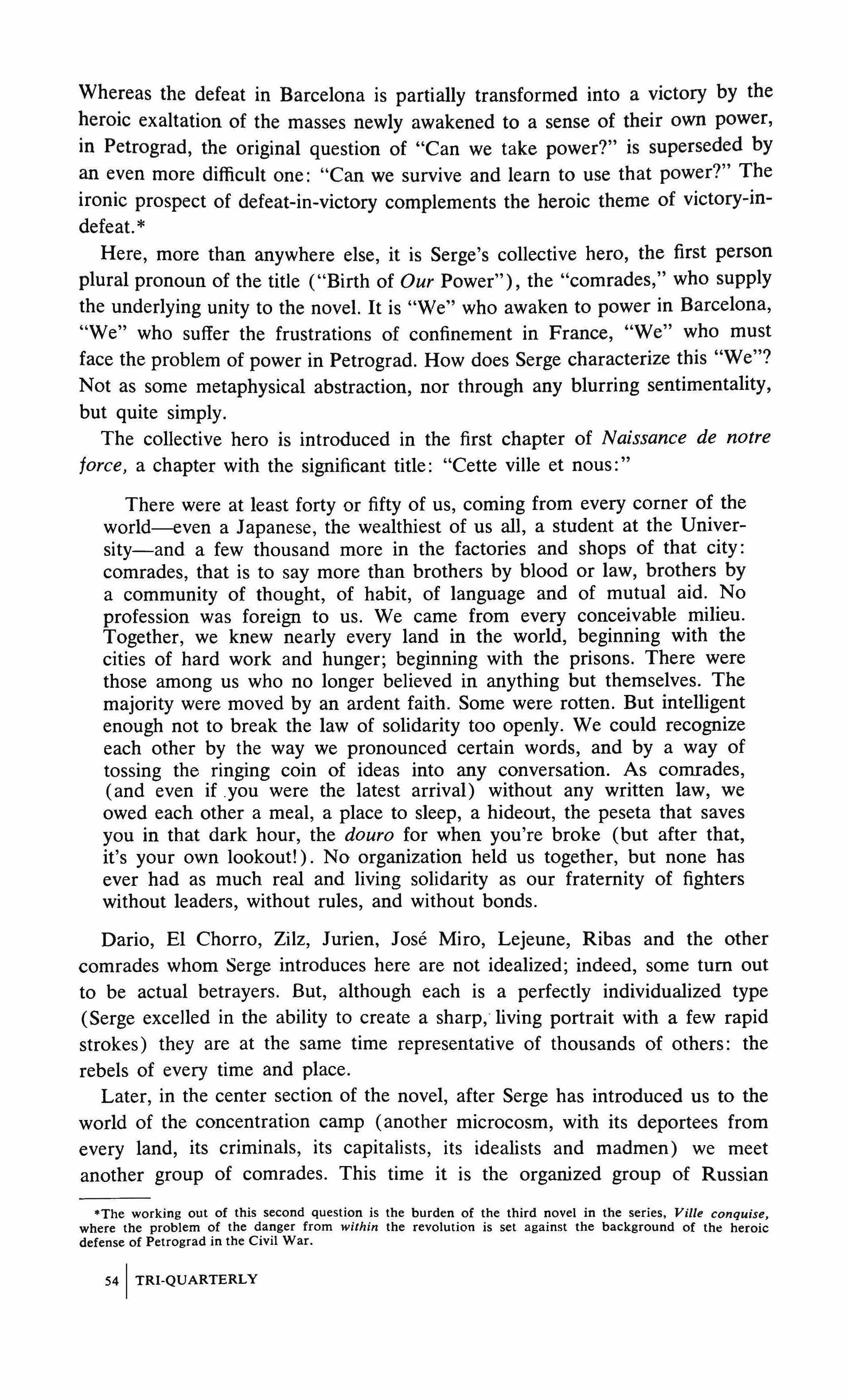
Whereas the defeat in Barcelona is partially transformed into a victory by the heroic exaltation of the masses newly awakened to a sense of their own power, in Petrograd, the original question of "Can we take power?" is superseded by an even more difficult one: "Can we survive and learn to use that power?" The ironic prospect of defeat-in-victory complements the heroic theme of victory-indefeat.
Here, more than anywhere else, it is Serge's collective hero, the first person plural pronoun of the title ("Birth of Our Power"), the "comrades," who supply the underlying unity to the novel. It is "We" who awaken to power in Barcelona, "We" who suffer the frustrations of confinement in France, "We" who must face the problem of power in Petrograd. How does Serge characterize this "We"? Not as some metaphysical abstraction, nor through any blurring sentimentality, but quite simply.
The collective hero is introduced in the first chapter of Naissance de notre force, a chapter with the significant title: "Cette ville et nous:"
There were at least forty or fifty of us, coming from every corner of the world--even a Japanese, the wealthiest of us all, a student at the University-and a few thousand more in the factories and shops of that city: comrades, that is to say more than brothers by blood or law, brothers by a community of thought, of habit, of language and of mutual aid. No profession was foreign to us. We came from every conceivable milieu. Together, we knew nearly every land in the world, beginning with the cities of hard work and hunger; beginning with the prisons. There were those among us who no longer believed in anything but themselves. The majority were moved by an ardent faith. Some were rotten. But intelligent enough not to break the law of solidarity too openly. We could recognize each other by the way we pronounced certain words, and by a way of tossing the ringing coin of ideas into any conversation. As comrades, (and even if .you were the latest arrival) without any written law, we owed each other a meal, a place to sleep, a hideout, the peseta that saves you in that dark hour, the douro for when you're broke (but after that, it's your own lookout!). No organization held us together, but none has ever had as much real and living solidarity as our fraternity of fighters without leaders, without rules, and without bonds.
Dario, EI Chorro, Zilz, Jurien, Jose Miro, Lejeune, Ribas and the other comrades whom Serge introduces here are not idealized; indeed, some tum out to be actual betrayers. But, although each is a perfectly individualized type (Serge excelled in the ability to create a sharp, living portrait with a few rapid strokes) they are at the same time representative of thousands of others: the rebels of every time and place.
Later, in the center section of the novel, after Serge has introduced us to the world of the concentration camp (another microcosm, with its deportees from every land, its criminals, its capitalists, its idealists and madmen) we meet another group of comrades. This time it is the organized group of Russian
'The working out of this second question is the burden of the third novel in the series. Ville conquise, where the problem of the danger from within the revolution is set against the background of the heroic defense of Petrograd in the Civil War.
TRI-QUARTERLY
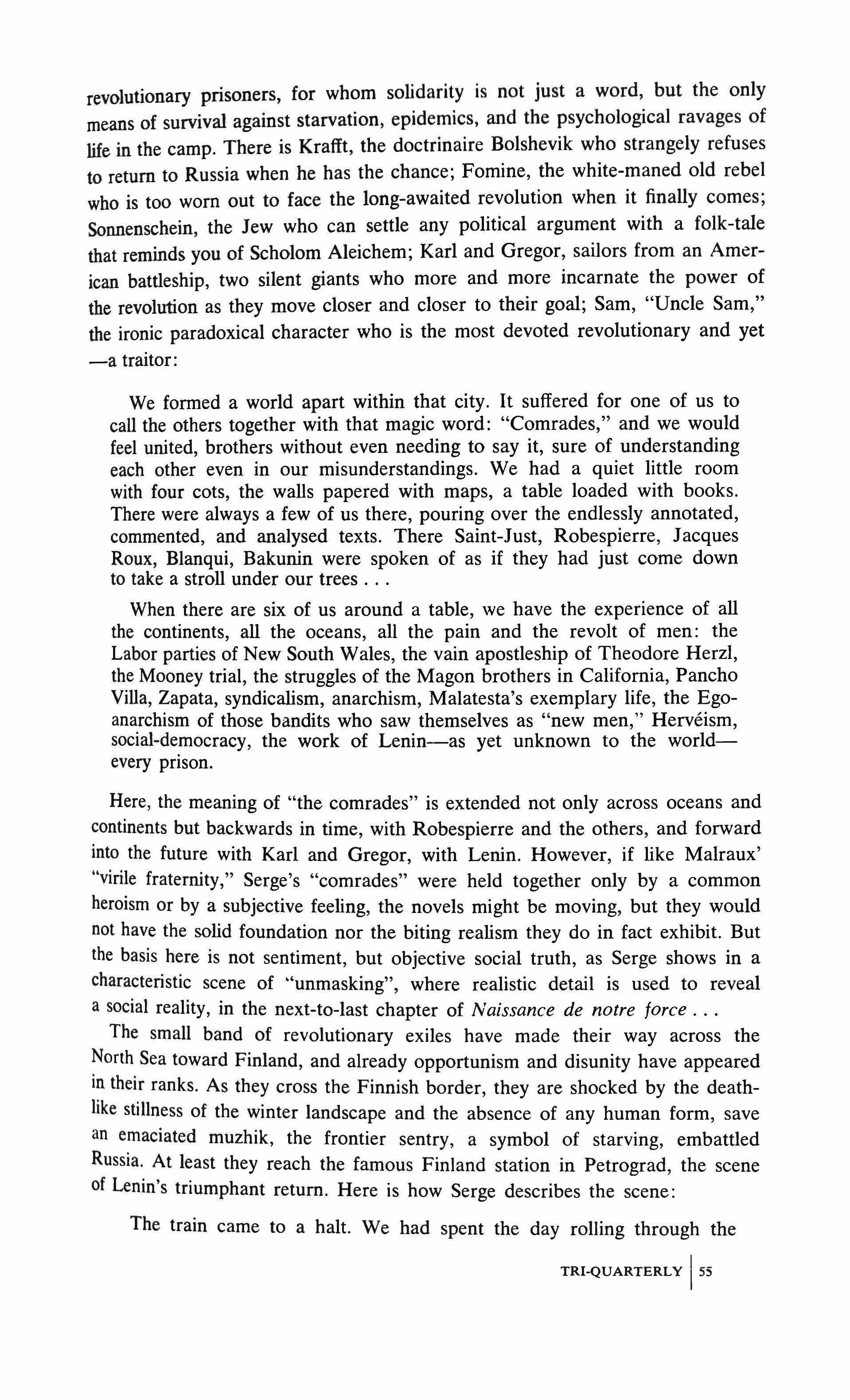
revolutionary prisoners, for whom solidarity is not just a word, but the only means of survival against starvation, epidemics, and the psychological ravages of life in the camp. There is Krafft, the doctrinaire Bolshevik who strangely refuses to return to Russia when he has the chance; Fomine, the white-maned old rebel who is too worn out to face the long-awaited revolution when it finally comes; Sonnenschein, the Jew who can settle any political argument with a folk-tale that reminds you of Scholom Aleichem; Karl and Gregor, sailors from an American battleship, two silent giants who more and more incarnate the power of the revolution as they move closer and closer to their goal; Sam, "Uncle Sam," the ironic paradoxical character who is the most devoted revolutionary and yet -a traitor:
We formed a world apart within that city. It suffered for one of us to call the others together with that magic word: "Comrades," and we would feel united, brothers without even needing to say it, sure of understanding each other even in our misunderstandings. We had a quiet little room with four cots, the walls papered with maps, a table loaded with books. There were always a few of us there, pouring over the endlessly annotated, commented, and analysed texts. There Saint-Just, Robespierre, Jacques Roux, Blanqui, Bakunin were spoken of as if they had just come down to take a stroll under our trees
When there are six of us around a table, we have the experience of all the continents, all the oceans, all the pain and the revolt of men: the Labor parties of New South Wales, the vain apostleship of Theodore Herzl, the Mooney trial, the struggles of the Magon brothers in California, Pancho Villa, Zapata, syndicalism, anarchism, Malatesta's exemplary life, the Egoanarchism of those bandits who saw themselves as "new men," Herveism, social-democracy, the work of Lenin-as yet unknown to the worldevery prison.
Here, the meaning of "the comrades" is extended not only across oceans and continents but backwards in time, with Robespierre and the others, and forward into the future with Karl and Gregor, with Lenin. However, if like Malraux' "virile fraternity," Serge's "comrades" were held together only by a common heroism or by a subjective feeling, the novels might be moving, but they would not have the solid foundation nor the biting realism they do in fact exhibit. But the basis here is not sentiment, but objective social truth, as Serge shows in a characteristic scene of "unmasking", where realistic detail is used to reveal a social reality, in the next-to-Iast chapter of Naissance de notre force
The small band of revolutionary exiles have made their way across the North Sea toward Finland, and already opportunism and disunity have appeared in their ranks. As they cross the Finnish border, they are shocked by the deathlike stillness of the winter landscape and the absence of any human form, save an emaciated muzhik, the frontier sentry, a symbol of starving, embattled Russia. At least they reach the famous Finland station in Petrograd, the scene of Lenin's triumphant return. Here is how Serge describes the scene:
The train came to a halt. We had spent the day rolling through the TRI-QUARTERLY 155
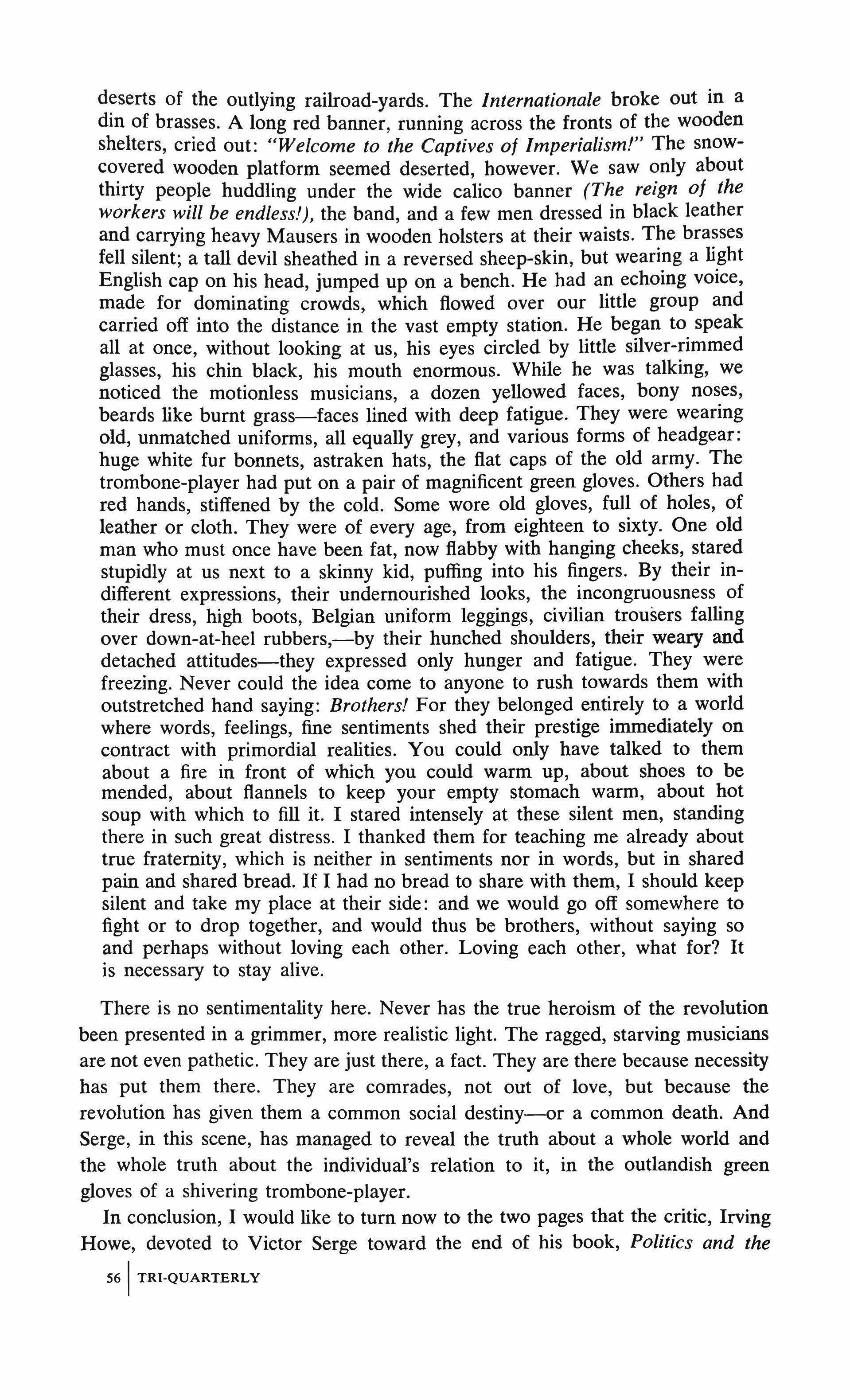
deserts of the outlying railroad-yards. The Internationale broke out in a din of brasses. A long red banner, running across the fronts of the wooden shelters, cried out: "Welcome to the Captives of Imperialism!" The snowcovered wooden platform seemed deserted, however. We saw only about thirty people huddling under the wide calico banner (The reign of the workers will be endless'], the band, and a few men dressed in black leather and carrying heavy Mausers in wooden holsters at their waists. The brasses fell silent; a tall devil sheathed in a reversed sheep-skin, but wearing a light English cap on his head, jumped up on a bench. He had an echoing voice, made for dominating crowds, which flowed over our little group and carried off into the distance in the vast empty station. He began to speak all at once, without looking at us, his eyes circled by little silver-rimmed glasses, his chin black, his mouth enormous. While he was talking, we noticed the motionless musicians, a dozen yellowed faces, bony noses, beards like burnt grass-faces lined with deep fatigue. They were wearing old, unmatched uniforms, all equally grey, and various forms of headgear: huge white fur bonnets, astraken hats, the flat caps of the old army. The trombone-player had put on a pair of magnificent green gloves. Others had red hands, stiffened by the cold. Some wore old gloves, full of holes, of leather or cloth. They were of every age, from eighteen to sixty. One old man who must once have been fat, now flabby with hanging cheeks, stared stupidly at us next to a skinny kid, puffing into his fingers. By their indifferent expressions, their undernourished looks, the incongruousness of their dress, high boots, Belgian uniform leggings, civilian trousers falling over down-at-heel rubbers,-by their hunched shoulders, their weary and detached attitudes-they expressed only hunger and fatigue. They were freezing. Never could the idea come to anyone to rush towards them with outstretched hand saying: Brothers! For they belonged entirely to a world where words, feelings, fine sentiments shed their prestige immediately on contract with primordial realities. You could only have talked to them about a fire in front of which you could warm up, about shoes to be mended, about flannels to keep your empty stomach warm, about hot soup with which to fill it. I stared intensely at these silent men, standing there in such great distress. I thanked them for teaching me already about true fraternity, which is neither in sentiments nor in words, but in shared pain and shared bread. If I had no bread to share with them, I should keep silent and take my place at their side: and we would go off somewhere to fight or to drop together, and would thus be brothers, without saying so and perhaps without loving each other. Loving each other, what for? It is necessary to stay alive.
There is no sentimentality here. Never has the true heroism of the revolution been presented in a grimmer, more realistic light. The ragged, starving musicians are not even pathetic. They are just there, a fact. They are there because necessity has put them there. They are comrades, not out of love, but because the revolution has given them a common social destiny-or a common death. And Serge, in this scene, has managed to reveal the truth about a whole world and the whole truth about the individual's relation to it, in the outlandish green gloves of a shivering trombone-player. In conclusion, I would like to tum now to the two pages that the critic, Irving Howe, devoted to Victor Serge toward the end of his book, Politics and the 561 TRI-QUARTERLY
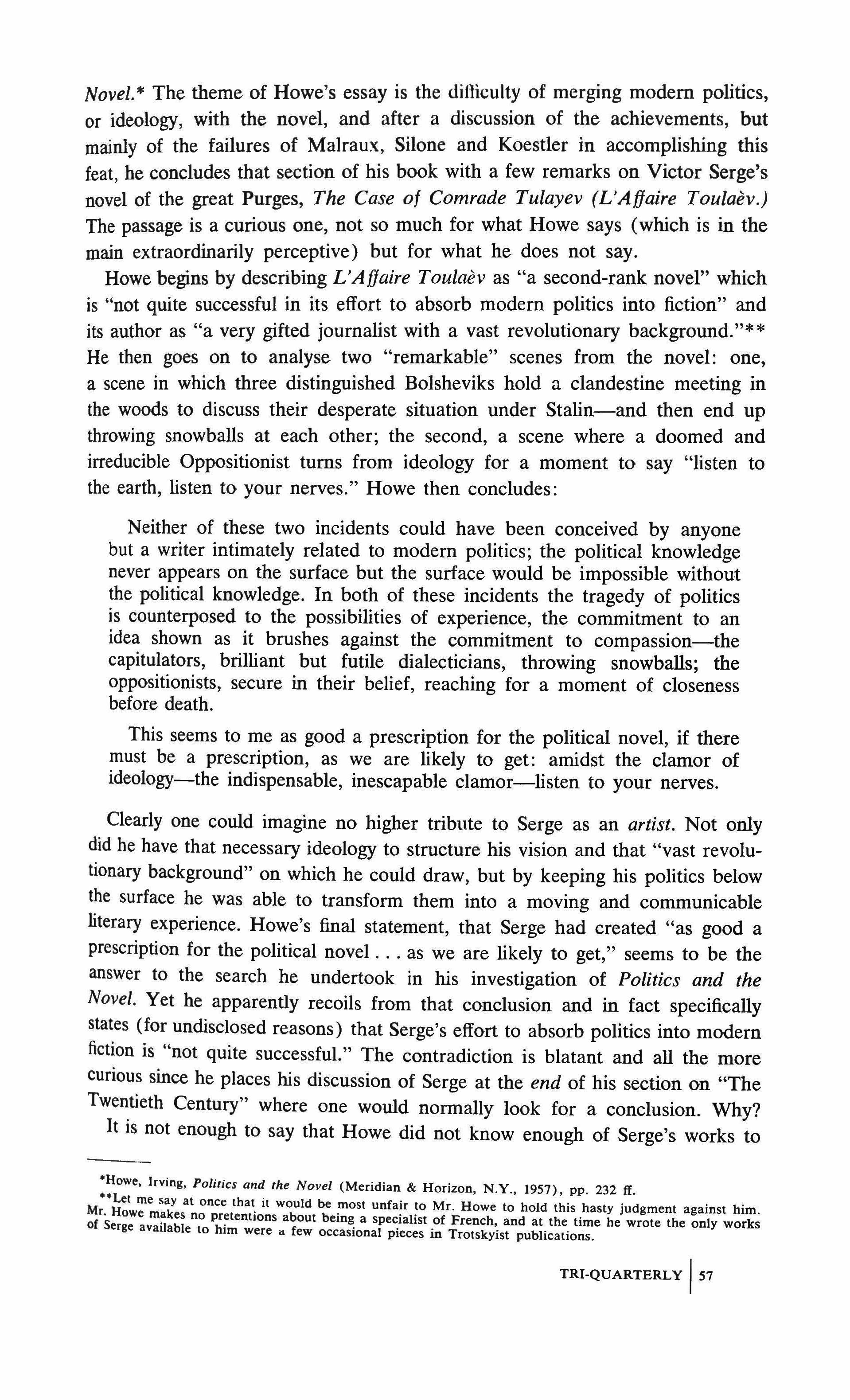
Novel. * The theme of Howe's essay is the difficulty of merging modem politics, or ideology, with the novel, and after a discussion of the achievements, but mainly of the failures of Malraux, Silone and Koestler in accomplishing this feat, he concludes that section of his book with a few remarks on Victor Serge's novel of the great Purges, The Case of Comrade Tulayev (L'AfJaire Toulaev.) The passage is a curious one, not so much for what Howe says (which is in the main extraordinarily perceptive) but for what he does not say.
Howe begins by describing L'Affaire Toulaev as "a second-rank novel" which is "not quite successful in its effort to absorb modern politics into fiction" and its author as "a very gifted journalist with a vast revolutionary background."** He then goes on to analyse two "remarkable" scenes from the novel: one, a scene in which three distinguished Bolsheviks hold a clandestine meeting in the woods to discuss their desperate situation under Stalin-and then end up throwing snowballs at each other; the second, a scene where a doomed and irreducible Oppositionist turns from ideology for a moment to say "listen to the earth, listen to your nerves." Howe then concludes:
Neither of these two incidents could have been conceived by anyone but a writer intimately related to modern politics; the political knowledge never appears on the surface but the surface would be impossible without the political knowledge. In both of these incidents the tragedy of politics is counterposed to the possibilities of experience, the commitment to an idea shown as it brushes against the commitment to compassion-the capitulators, brilliant but futile dialecticians, throwing snowballs; the oppositionists, secure in their belief, reaching for a moment of closeness before death.
This seems to me as good a prescription for the political novel, if there must be a prescription, as we are likely to get: amidst the clamor of ideology-the indispensable, inescapable clamor-listen to your nerves.
Clearly one could imagine no higher tribute to Serge as an artist. Not only did he have that necessary ideology to structure his vision and that "vast revolutionary background" on which he could draw, but by keeping his politics below the surface he was able to transform them into a moving and communicable literary experience. Howe's final statement, that Serge had created "as good a prescription for the political novel as we are likely to get," seems to be the answer to the search he undertook in his investigation of Politics and the Novel. Yet he apparently recoils from that conclusion and in fact specifically states (for undisclosed reasons) that Serge's effort to absorb politics into modern fiction is "not quite successful." The contradiction is blatant and all the more curious since he places his discussion of Serge at the end of his section on "The Twentieth Century" where one would normally look for a conclusion. Why? It is not enough to say that Howe did not know enough of Serge's works to
'Howe, Irving, Politics and the Novel (Meridian & Horizon, N.Y., 1957), pp. 232 II.
M "Let me say at once that it would be most unfair to Mr. Howe to hold this hasty judgment against him.
0/S Howe m�kes no pr�tentlons about being a specialist of French, and at the time he wrote the only works erge avaIlable 10 him were" few occasional pieces in Trotskyist publications. TRI-QUARTERLY

form a balanced judgment, or that he quite naturally recoiled from giving the place of honor to an entirely unknown figure, or even (as might be argued) that Toulaev is not Serge's most successful work and that the translation was uninspired. The textual evidence and the contradiction would still remain.
The fact is that modern politics-the politics of the world created by the initial impact of the Russian revolution-has given rise to a new literary genre, and a new way of looking at the world. This should come as no surprise to us. It is become almost a cliche of the classroom to point out that modern mechanized warfare, with its anonymity and sudden death has had an enormous influence on our sensibilities and created a new literary style with Stephen Crane, Hemingway, Ford Maddox Ford and others. Or that industrialization, urbanization, mass communications (the movies) have had similar effects on the novel. So too politics, revolutionary politics, are at the source of a new genre, half novel and half documentary, in which the present is treated as history. *
George Orwell must have been aware of this phenomenon when he referred, in 1946, to Victor Serge as one of the leading proponants of a new school of Continental political writing, a "special class of literature that has arisen out of the European political struggle since the rise of fascism and continued, "under this heading novels, autobiographies, books of 'reportage,' sociological treatises and plain pamphlets can all be lumped together, all of them having a common origin and to a great extent the same emotional atmosphere."** Serge, of course, wrote in all of these forms, and in others as well (biographical "portraits" of Lenin, Trotsky, and Stalin; documented historical works), but it seems clear that it was above all in the novel that he felt able to embody the kind of "truth" he had to tell.
Politics, of course, had long been part of the novel when Serge began to write, but it existed there, in Hugo, Stendhal, or Tolstoy, as history. It is the mark of the new genre, the one generated by specifically revolutionary politics and the social upheavals of the past half-century, that history itself appears as the present with all its immediacy (and sometimes even as the future, as in Orwell's own 1984). This is the genre Serge helped to create and of which he may be the most significant exponant. There is not need to defend its "legitimacy" here. What remains to be said is this: like works in any other genre, the modem political novel can have its "epiphanies," moments of real insight where, in a simple, matter-of-fact word or gesture, a whole world, a whole human experience, the truth about an individual and his relation to society may be revealed. It can be found in the spectacle of three old Marxist dialecticians throwing snowballs at each other, in the paradoxial joy of a prisoner, in the sight of a bomber against a golden sky, or even in the absurd green gloves of a frozen trombone-player. Wherever it is found, it is the artist's-the martyr'sfree gift to us, if only we will have the insight and the courage to draw conclusions.
·1 am indebted to my good friend, Richard M. Koffler, for the germ of these ideas.
·Quoted by Peter Sedgwick in "Victor Serge and Socialism," International Socialism, XIV, (Autumn 1963), p. 18.
581 TRI-QUARTERLY
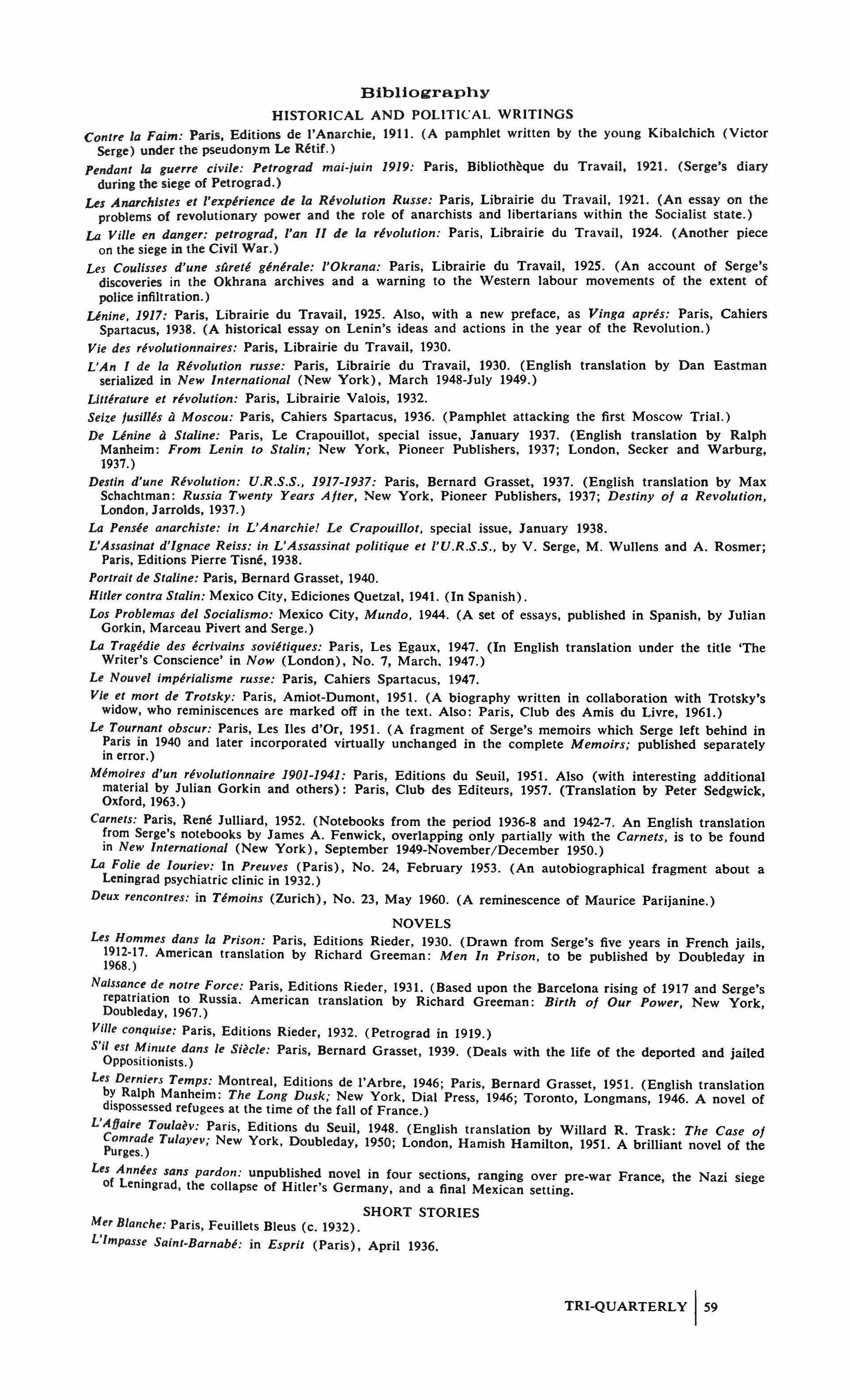
Contre la Faim: Paris, Editions de I'Anarchie, 1911. (A pamphlet written by the young Kibalchich (Victor Serge) under the pseudonym Le Retif.)
Pendant /Q guerre civile: Petrograd mai-juin 1919: Paris, Bibliotheque du Travail, 1921. (Serge's diary during the siege of Petrograd.)
us Anarchistes et l'experience de la Revoiution Russe: Pa.ris, Libra.irie du Trav�i1,. 1921. (A� e.ssay on the problems of revolutionary power and the role of anarchists and hbertanans within the Sociallst state.)
La Ville en danger: petrograd, l'an 11 de la revolutton: Paris, Librairie du Travail, 1924. (Another piece on the siege in the Civil War.)
Les Coulisses d'une suret« glnerale: l'Okrana: Paris, Librairie du Travail, 1925. (An account of Serge's discoveries in the Okhrana archives and a warning to the Western labour movements of the extent of police infiltration.)
Unine, 1917: Paris, Librairie du Travail, 1925. Also, with a new preface, as Vinga apres: Paris, Cahiers Spartacus, 1938. (A historical essay on Lenin's ideas and actions in the year of the Revolution.)
Vie des revolutionnaires: Paris, Librairie du Travail, 1930.
L'An I de la Revolution russe: Paris, Librairie du Travail, 1930. (English translation by Dan Eastman serialized in New International (New York), March 1948-July 1949.)
Lllttrature et revolution: Paris, Librairie Valois, 1932.
Seize /usillis d Moscou: Paris, Cahiers Spartacus, 1936. (Pamphlet attacking the first Moscow Trial.)
De Lenine d Staline: Paris, Le Crapouillot, special issue, January 1937. (English translation by Ralph Manheim: From Lenin to Stalin; New York, Pioneer Publishers, 1937; London, Seeker and Warburg, 1937.)
Destin d'une Revolution: U.R.S.S., 1917-1937: Paris, Bernard Grasset, 1937. (English translation by Max Schachtman: Russia Twenty Years After, New York, Pioneer Publishers, 1937; Destiny 0/ a Revolution, London, Jarrolds, 1937.)
La Pensee anarchiste: in L'Anarchiel Le Crapouillot, special issue, January 1938.
L'Assaslnat d'Ignace Reiss: in L'Assassinat politique et I'U.R.S.S., by V. Serge, M. Wullens and A. Rosmer; Paris, Editions Pierre Tisne, 1938.
Portrait de Staline: Paris, Bernard Grasset, 1940.
Hiller contra Stalin: Mexico City, Ediciones Quetzal, 1941. (In Spanish).
Las Problemas del Socialismo: Mexico City, Mundo, 1944. (A set of essays, published in Spanish, by Julian Gerkin, Marceau Pivert and Serge.)
La Tragedie des ecrivalns sovietiques: Paris, Les Egaux, 1947. (In English translation under the title 'The Writer's Conscience' in Now (London), No.7, March. 1947.)
Le Nouvel impertalisme russe: Paris, Cahiers Spartacus, 1947.
Vie et mort de Trotsky: Paris, Amiot-Dumont, 1951. (A biography written in collaboration with Trotsky's widow, who reminiscences are marked off in the text. Also: Paris, Club des Amis du Livre, 1961.)
Le Tournant obscur: Paris, Les Iles d'Or, 1951. (A fragment of Serge's memoirs which Serge left behind in Paris in 1940 and later incorporated virtually unchanged in the complete Memoirs; published separately in error.)
Mlmolres d'un revoluttonnaire 1901-1941: Paris, Editions du Seuil, 1951. Also (with interesting additional material by Julian Gorkin and others): Paris, Club des Editeurs, 1957. (Translation by Peter Sedgwick, Oxford, 1963.)
Carnets: Paris, Rene Julliard, 1952. (Notebooks from the period 1936-8 and 1942-7. An English translation from Serge's notebooks by James A. Fenwick, overlapping only partially with the Carnets, is to be found in New International (New York), September 1949-November/December 1950.)
La Folie de Iouriev: In Preuves (Paris), No. 24, February 1953. (An autobiographical fragment about a Leningrad psychiatric clinic in 1932.)
Deux rencontres: in Temoins (Zurich), No. 23, May 1960. (A reminescence of Maurice Parijanine.)
Les Hommes dans la Prison: Paris, Editions Rieder, 1930. (Drawn from Serge's five years in French jails, 1912-17. American translation by Richard Greeman: Men In Prison, to be published by Doubleday in 1968.)
Naissance de notre Force: Paris, Editions Rieder, 1931. (Based upon the Barcelona rising of 1917 and Serge's repatriation to Russia. American translation by Richard Greeman: Birth 0/ Our Power, New York, Doubleday, 1967.)
Ville conquise: Paris, Editions Rieder, 1932. (Petrograd in 1919.)
S'il est Minute dans le Steele: Paris, Bernard Grasset, 1939. (Deals with the life of the deported and jailed Oppositionlsrs. )
Les Demiers Temps: Montreal, Editions de l'Arbre, 1946; Paris, Bernard Grasset, 1951. (English translation b� Ralph Manheim: The Long Dusk; New York, Dial Press, 1946; Toronto, Longmans, 1946. A novel of dispossessed refugees at the time of the fall of France.)
L'A-Dalre Toulaev: Paris, Editions du Seuil, 1948. (English translation by Willard R. Trask: The Case 0/ Comrade Tulayev; New York, Doubleday, 1950; London, Hamish Hamilton, 1951. A brilliant novel of the Purges.)
Lt. Ann�es sans pardon: unpublished novel in four sections, ranging over pre-war France, the Nazi siege of leningrad, the collapse of Hitler's Germany, and a final Mexican setting.
Mtr Blanche: Paris, Feuillets Bleus (c. 1932).
L'lmpasse Saint-Barnabe: in Esprit (Paris), April 1936.
POETRY
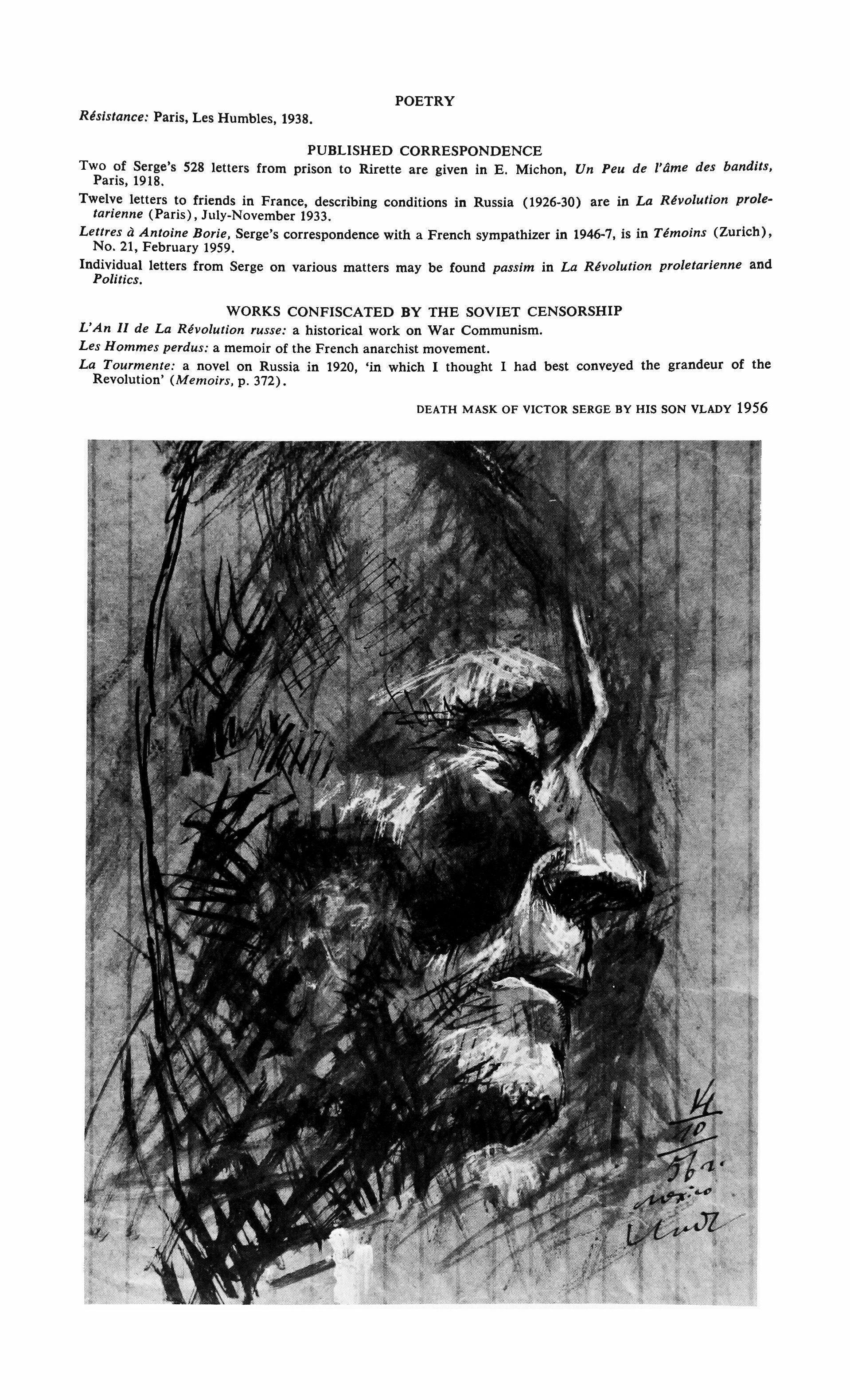
Resistance: Paris, Les Humbles, 1938.
Two of Serge's 528 letters from prison to Rirette are given in E. Michon, Un Peu de t'ame des bandits, Paris, 1918.
Twelve letters to friends in France, describing conditions in Russia (1926-30) are in La Revolution proletarienne (Paris), July-November 1933.
Lettres il Antoine Borie, Serge's correspondence with a French sympathizer in 1946-7, is in Temoins (Zurich), No. 21, February 1959.
Individual letters from Serge on various matters may be found passim in La Revolution proletarienne and Politics.
WORKS CONFISCATED BY THE SOVIET CENSORSHIP
L'An II de La Revolution russe: a historical work on War Communism.
Les Hommes perdus: a memoir of the French anarchist movement.
La Tourmente: a novel on Russia in 1920, 'in which I thought I had best conveyed the grandeur of the Revolution' (Memoirs. p. 372).
DEATH MASK OF VICTOR SERGE BY HIS SON VLADY 1956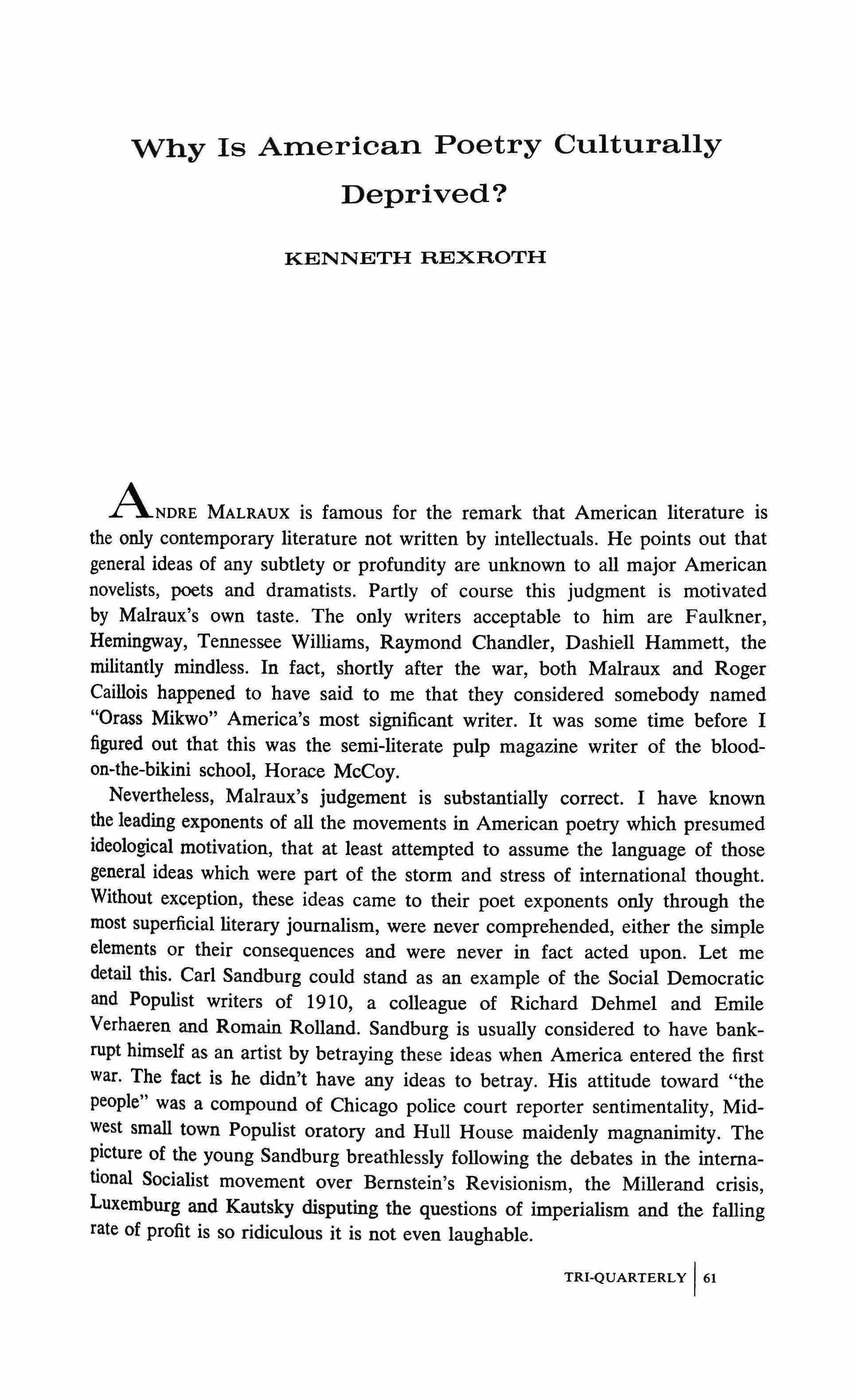
MALRAUX is famous for the remark that American literature is the only contemporary literature not written by intellectuals. He points out that general ideas of any subtlety or profundity are unknown to all major American novelists, poets and dramatists. Partly of course this judgment is motivated by Malraux's own taste. The only writers acceptable to him are Faulkner, Hemingway, Tennessee Williams, Raymond Chandler, Dashiell Hammett, the militantly mindless. In fact, shortly after the war, both Malraux and Roger Caillois happened to have said to me that they considered somebody named "Grass Mikwo" America's most significant writer. It was some time before I figured out that this was the semi-literate pulp magazine writer of the bloodon-the-bikini school, Horace McCoy.
Nevertheless, Malraux's judgement is substantially correct. I have known the leading exponents of all the movements in American poetry which presumed ideological motivation, that at least attempted to assume the language of those general ideas which were part of the storm and stress of international thought. Without exception, these ideas came to their poet exponents only through the most superficial literary journalism, were never comprehended, either the simple elements or their consequences and were never in fact acted upon. Let me detail this. Carl Sandburg could stand as an example of the Social Democratic and Populist writers of 1910, a colleague of Richard Dehmel and Emile Verhaeren and Romain Rolland. Sandburg is usually considered to have bankrupt himself as an artist by betraying these ideas when America entered the first war. The fact is he didn't have any ideas to betray. His attitude toward "the people" was a compound of Chicago police court reporter sentimentality, Midwest small town Populist oratory and Hull House maidenly magnanimity. The picture of the young Sandburg breathlessly following the debates in the international Socialist movement over Bernstein's Revisionism, the Millerand crisis, Luxemburg and Kautsky disputing the questions of imperialism and the falling rate of profit is so ridiculous it is not even laughable.

The Modernist movement in verse, from the Imagists to the old masters of modem verse, first extensively published in Alfred Kreymborg's Others, the period of Broom and The Little Review-was a movement of technical reform of syntax and a cleaning up of the vocabulary of poetry. It has often been compared to the Symbolist movement in France. None of these poets, with the exception of Amy Lowell, John Gould Fletcher, Walter Conrad Arensberg, and T. S. Eliot, read French poetry or knew anything about it. In their French classes in college the last poet in the course had been Jules Laforgue. Therefore, in so far as they paid attention to their lessons, he represented for them the last word in French modernism. He died in 1887. He still represents the last word in French modernism for American academic versifiers. The profound revolutions of the sensibility, the climactic changes in the soul of modem man, so-called, which began with Baudelaire, Kierkegaard, Newman, Dostoievsky and Nietzsche and which represent in fact a systematic destructive criticism of the foundations of humanism and humanitarianism, and which have thrown up in the course of their ever-accelerating liquidation all the anti-humane art movements and philosophies of our time were, to judge from the evidence, totally incomprehensible to the American imitators of their stylistic innovations---even at the remove of fifty years. It should never be forgotten that H. D. was a contemporary of the Dadaists. French and German literature was falling to pieces with hearbreak. The veriest schoolboy, as Lord Macaulay used to say, in Europe knew that civilization had betrayed itself. H. D. was dedicating herself to cleaning and brightening the idiom of the Sapphic poets, Michael Field and Renee Vivien. Over against such much abused esthetes there was only Midwest Populism, whose intellectual foundations never rose higher than an editorial in a Des Moines newspaper. Out of the ranks of what were to become the classic modernists, two young men from the remote hinterland rose in revolt, T. S. Eliot and Ezra Pound. Pound most emphatically was not a member of the international community of letters, any more than any other emigre cafe sitter, then or now. Drinking pernod on the sidewalk of the Dome then, or the Flore now, never made Pound a cubist nor has it, if you will forgive the French word, made any foundation bum an existentialist. Pound was under the impression that his cafe companions, Max Elskamp and Georges Fourrest, were the leaders of French poetry. This, at the height of the careers of Reverdy, Eluard, Aragon, with Apollinaire only dead a year. Eliot, on the other hand, did attach himself to an international community-the movement of virulent obscurantism and clerical fascism led by Henri Massis and Maurras and given voice in 'TAction Francoise:" It should not be forgotten that the real reason for the international failure of this movement was that it was so reactionary that practical politicians like Hitler and Mussolini found it unusable. When l'Action Francoise said "We are not interested in the opinions of an obscure Jewish carpenter who met a disgraceful death two thousand years ago, but in restoring to France the order and glory (gloire-a bit of French slang recently restored to currency) of Richelieu and Mazarin", the Holy Office excommunicated them by telegram. This is not an idle, an unsubstantiated accusation against Mr. Eliot. He is not only on record
TRI-QUARTERLY

as being an anti-Semite, but on record as being in favor of eliminating the Jews, and a surprising number of the French contributors to The Criterion ended up in the dock as war criminals.
Now, it so happens that if any international community recruited English and American poets in the interbellum period, it was Fascism-Pound, Yeats, Eliot are on record. This is not because American poets are exceptionally vicious men, although some of them are and have been. It is simply because Fascism is so much more easily assimilated by simple and emotionally unstable minds-you don't have to read so many books. As the economic depression deepened and their betters began talking about economics, most of this generation of American poets became money cranks, followers of the Social Credit theories of Major Douglas. This is an ancient American foolishness. I don't doubt for a moment but that, as the fur market moved inexorably westward to Michillimakinac, the Grand Sachems of the Iroquois believed they could call it back by fooling with the wampum. Funny-moneyism is precisely a symptom of the incorrigible provinciality of small town debtors in the American Outback. When the actual levers of power are so remote as to be unimaginable, their victims always result to sympathetic magic. Although Mr. Eliot is reputed to have worked in a bank, it didn't help. No one used to handling general ideas, no one familiar with the elementary facts of, to use a sound but old fashioned term, political economy, as those facts and general ideas work themselves out in the real affairs of men, would ever fall for such flimsy nonsense as Major Douglas.
Like a faint chorus of young birds in the nest, echoes of Mr. Eliot's principled reaction suddenly were heard amongst the moonshine of the Southern Hills. Mr. Ransom, Mr. Tate and their friends at Vanderbilt, meeting in the parlor of a Greek letter fraternity, launched the frail vessel of American reaction. Alas, the cargo was too slight for even so puny a ship. If Mr. Eliot's The Criterion carried on its manifest bales of Massis, Maurras and Maritain, as re-interpreted by Fernandez, Suarez and Bernard Fay, and Pareto and Major Douglas reinterpreted by Ezra Pound and Wyndham Lewis, and the Almighty as reinterpreted by the followers of Gurdjieff, Mr. Tate and Mr. Ransom could manage no more than the ideological residues of "Red Rock" and "The Clansman". True, there was a vague echo of the Physiocrats but an echo bounced off the surface of the thinker of the Fugitives' new agrarian group, a professor who seems to have been a ghost writer for a number of leading Southern personalities from Governor Long and Senator Bilbo to Governor Wallace. This is as near as serious thought amongst American poets ever came to the international discussions which raged throughout the interbellum period about the role of the elite, the threats of mass culture, the relations of town and country.
Many of these people were connected with the absurd Humanist movement of the pre-Crisis Twenties. Today it is obvious that this was just a power drive on the part of a number of young academicians to re-capture book reviewing jobs from the Populist disciples of H. L. Mencken, who threatened to monopolize them. It was successful, but unimportant in the arena of world thought. Throughout the period of proletarian literature, I never knew a Communist TRI-QUARTERLY 163

poet who was able to read through the first, much less the third volume of Capital. It was looked upon as a dry, dull, excessively technical book. Of course, what's wrong with it is its highly emotional rhetoric and its elementary sleight-ofhand mathematics. God knows, it's absorbing enough reading, as absorbing as the Isaiah to which it has often been compared, but the Marxists of the Thirties judged Marx as the contributors to Commentary of the Fifties judged Isaiahdry, dull, excessively technical. American poets just don't read non-fiction. Since the Second War the literary quarterlies which started out under an alliance of Southern reactionaries and ex-Trotskyites, have, it is true, tried to give their readers some inkling of some of the intellectual currents in the maelstrom of post-war European thought. This has meant, pretty much Existentialism, but with the exception of Lionel Abel, no poet has contributed to this discussion. What is more significant, not a single, original autochthonous idea has come up in the literary quarterlies of the post War period. We live in a time of continuous revaluation. It is a time when it seems less and less possible to do anything overtly and therefore a time given over to relentless SUbjective subversion. There is no sign of this revaluation in America-our think pieces in our leading intellectual quarterlies never rise above the ABC of Zen Buddhism, What is Existentialism, How to Appreciate the Theatre of the Absurd in Easy Lessons for Small Town Clergymen, Over-read Clubwomen and Candidates for Ph.D's. Modem thought is haunted by a sense of crisis. We live in an eschatological age. Had we not invented the atom bomb, the Deity would have been forced to create it. This sense of crisis is not new. It began in the 1840's. But for the past two generations, there has solidified a tradition of crisis-thinking which is now almost universal, a true universe of discourse from which no one seems to be able to escape. Niccolo Hartmann, Scheler, Berdyaev, Buber, Tillich, Marcel, Mounier-these men are in fact anti-existentialist, but even they are swept up in the general mass movement of anguish and anxiety. I have never met an American poet who was familiar with Jean Paul Sartre's attempts at philosophy, much less with the gnarled discourse of Scheler or Heidegger.
This is not quite true. Lionel Abel is an exception. He even went to Paris and met Jean-Paul Sartre personally, and for a year could be seen on the Boulevard St. Germain eavesdropping on his conversations with Simone de Beauvoir and Jean Wahl. There's only one trouble. Although he is a pretty good playwright, Lionel Abel is not a major poet. The same is true of Paul Goodman, who not only is part of the discourse of modem international thought, but who has certainly tried hard all his life to be an honestly original thinker. Again, he's not one of our most important poets. Similarly, in the Marxist epoch, John Brooks Wheelwright, not only knew more about Marx than Earl Browder, he knew very much more about St. Thomas Aquinas than T. S. Eliot and Mortimer Adler rolled together. All three of these people-Goodman, Abel, Wheelwright and the forgotten poet disciple of Wittgenstein, Lou Grudin-would be immensely important figures if they had written in French or even German or Italian. For over a generation, they have been the think tanks from which the editors of The Partisan Review drew their sustenance. They are, or were

(Wheelwright is long dead) very dear friends of mine, but I would never claim them as America's leading poets.
The immense popularity of the Beats in Europe on both sides of the Iron Curtain is due to the fact that, although they may not reflect the eschatological emphasis of modem philosophy, they do reflect an emotional consciousness of the fact of apocalypse. Youngsters in blue jeans read each other the poems of Ferlinghetti, Gary Snyder and LeRoi Jones to records by Thelonius Monk or Ornette Coleman in the coffee shops of Prague, Beirut and Barcelona as well as in Warsaw, London, Paris, Berlin, Rome. It is apparent why. It is also apparent why their fathers never, in a Prague Cafe called Swanee River, sat about dressed in string ties and calico shirts drinking mint juleps and listening to the poetry of Allen Tate recited to the music of Stephen Foster. This is not true of his master, T. S. Eliot. I can imagine "The Waste Land" so read although what the musical accompaniment would be I'm not sure-possibly Richard Strauss or Scriabin. What is the reason for this state of affairs? The answer is self-evident. From the death of Longfellow to the day Allen Ginsberg took off his clothes, the American poet was not an important factor in American life. He was not a factor at all. For this reason, the kind of young man who wishes to participate in the decisions of his community went into business, engineering or the professions. The boy who knew he could not or was afraid to participate wrote verse.
A generation or so ago the poet considered himself an outcast because he partook only minimally of the life of his society. Today he is very much an incast. Society has overtaken and surpassed him. Everybody gets very little out of life nowadays. The engineer who once went off in kepi, breeches and puttees to build roads through the haunts of the headhunters now lives in a garden suburb, finds his sexual outlet in Saturday night dirty movie parties and for maximized living reads On the Road and subscribes to the Evergreen Review. His indistinguishable neighbor teaches creative poetry at the local college and writes slide rule poems more indistinguishable still. What is wrong with the vast bulk of American society is that it is smug. The neurosis of the affluent society is not anxiety but taedium vitae-accidie-moral boredom.
Over the years since the First War there have been a number of poets who have given expression to certain general ideas of more or less social importance for our time. A list of them makes curious reading-Vachel Lindsay put into one time immensely popular doggerel the mystic Midwest Populism that had come down from the communitarian experiments of the 1840's-Robert Owen and so on, and which found final expression in the sentimental manifestos of Louis Sullivan and Frank Lloyd Wright. Eliot's "The Waste Land" is the only major work of "anxiety" in American poetry. Conrad Aiken was one of the very few writers anywhere before the surrealists to attempt to use psychoanalysis as a basic philosophy of life. The surrealists themselves were passionate evangelists of a dogmatic world view, which presumed to use art, in the words of Andre Breton, "to revolutionize the human sensibility as such." Eugene Jolas, the editor of transition, was a more learned man and a more ambitious thinker than TRI-QUARTERLY
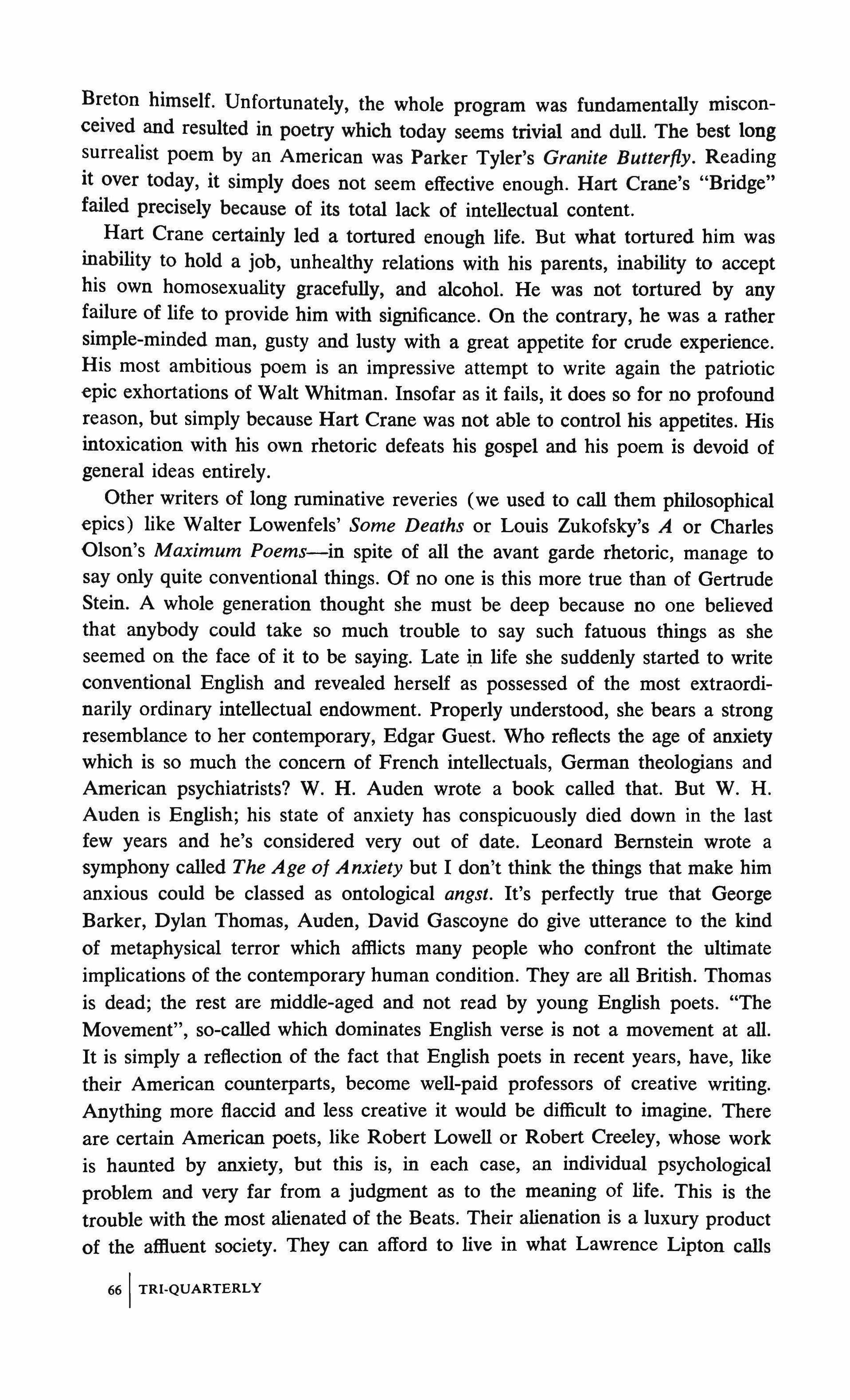
Breton himself. Unfortunately, the whole program was fundamentally misconceived and resulted in poetry which today seems trivial and dull. The best long surrealist poem by an American was Parker Tyler's Granite Butterfly. Reading it over today, it simply does not seem effective enough. Hart Crane's "Bridge" failed precisely because of its total lack of intellectual content.
Hart Crane certainly led a tortured enough life. But what tortured him was inability to hold a job, unhealthy relations with his parents, inability to accept his own homosexuality gracefully, and alcohol. He was not tortured by any failure of life to provide him with significance. On the contrary, he was a rather simple-minded man, gusty and lusty with a great appetite for crude experience. His most ambitious poem is an impressive attempt to write again the patriotic epic exhortations of Walt Whitman. Insofar as it fails, it does so for no profound reason, but simply because Hart Crane was not able to control his appetites. His intoxication with his own rhetoric defeats his gospel and his poem is devoid of general ideas entirely.
Other writers of long ruminative reveries (we used to call them philosophical epics) like Walter Lowenfels' Some Deaths or Louis Zukofsky's A or Charles Olson's Maximum Poems-in spite of all the avant garde rhetoric, manage to say only quite conventional things. Of no one is this more true than of Gertrude Stein. A whole generation thought she must be deep because no one believed that anybody could take so much trouble to say such fatuous things as she seemed on the face of it to be saying. Late in life she suddenly started to write conventional English and revealed herself as possessed of the most extraordinarily ordinary intellectual endowment. Properly understood, she bears a strong resemblance to her contemporary, Edgar Guest. Who reflects the age of anxiety which is so much the concern of French intellectuals, German theologians and American psychiatrists? W. H. Auden wrote a book called that. But W. H. Auden is English; his state of anxiety has conspicuously died down in the last few years and he's considered very out of date. Leonard Bernstein wrote a symphony called The Age of Anxiety but I don't think the things that make him anxious could be classed as ontological angst. It's perfectly true that George Barker, Dylan Thomas, Auden, David Gascoyne do give utterance to the kind of metaphysical terror which afflicts many people who confront the ultimate implications of the contemporary human condition. They are all British. Thomas is dead; the rest are middle-aged and not read by young English poets. "The Movement", so-called which dominates English verse is not a movement at all. It is simply a reflection of the fact that English poets in recent years, have, like their American counterparts, become well-paid professors of creative writing. Anything more flaccid and less creative it would be difficult to imagine. There are certain American poets, like Robert Lowell or Robert Creeley, whose work is haunted by anxiety, but this is, in each case, an individual psychological problem and very far from a judgment as to the meaning of life. This is the trouble with the most alienated of the Beats. Their alienation is a luxury product of the affluent society. They can afford to live in what Lawrence Lipton calls
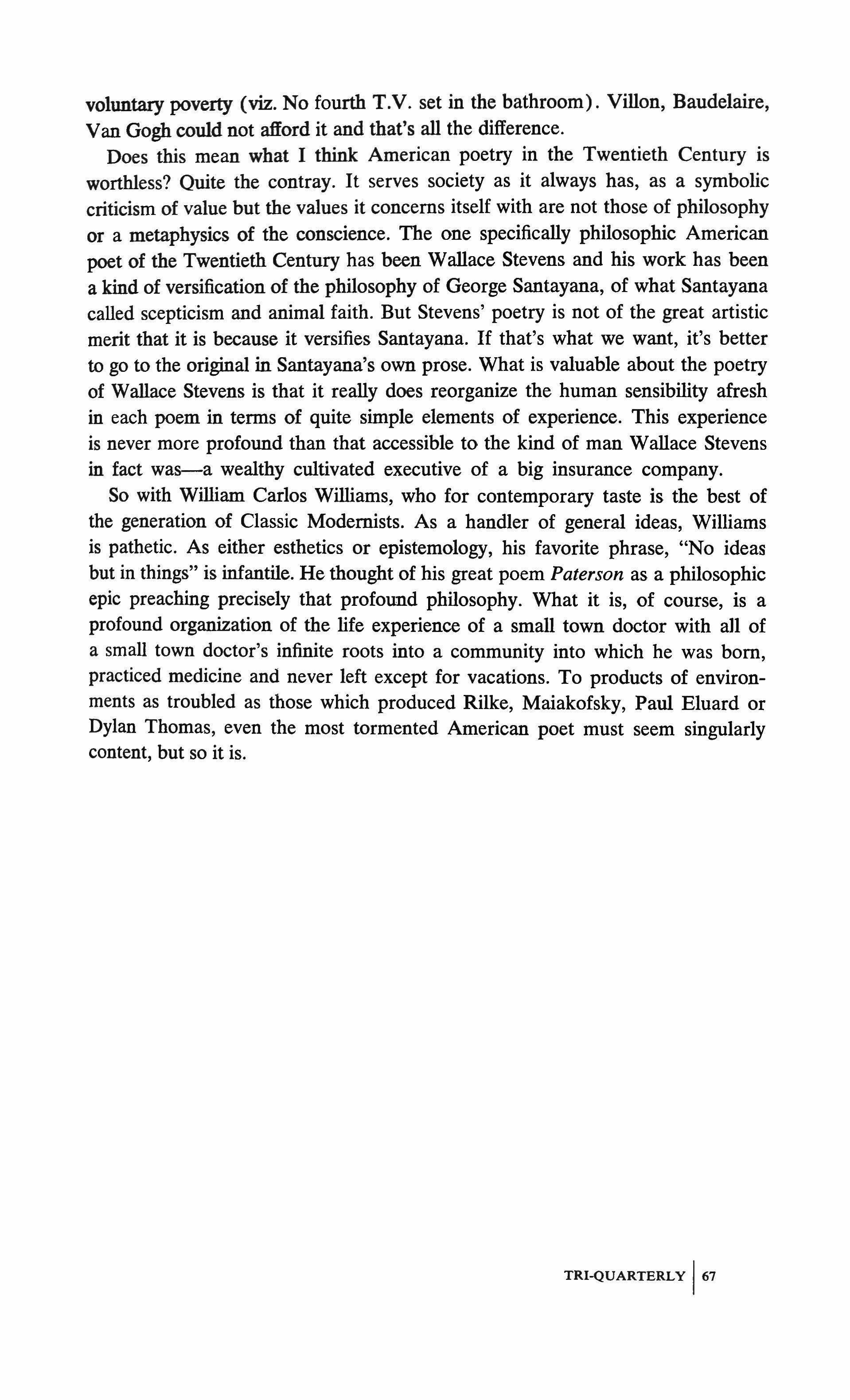
voluntary poverty (viz. No fourth T.V. set in the bathroom). Villon, Baudelaire, Van Gogh could not afford it and that's all the difference. Does this mean what I think American poetry in the Twentieth Century is worthless? Quite the contray. It serves society as it always has, as a symbolic criticism of value but the values it concerns itself with are not those of philosophy or a metaphysics of the conscience. The one specifically philosophic American poet of the Twentieth Century has been Wallace Stevens and his work has been a kind of versification of the philosophy of George Santayana, of what Santayana called scepticism and animal faith. But Stevens' poetry is not of the great artistic merit that it is because it versifies Santayana. If that's what we want, it's better to go to the original in Santayana's own prose. What is valuable about the poetry of Wallace Stevens is that it really does reorganize the human sensibility afresh in each poem in terms of quite simple elements of experience. This experience is never more profound than that accessible to the kind of man Wallace Stevens in fact was-a wealthy cultivated executive of a big insurance company.
So with William Carlos Williams, who for contemporary taste is the best of the generation of Classic Modernists. As a handler of general ideas, Williams is pathetic. As either esthetics or epistemology, his favorite phrase, "No ideas but in things" is infantile. He thought of his great poem Paterson as a philosophic epic preaching precisely that profound philosophy. What it is, of course, is a profound organization of the life experience of a small town doctor with an of a small town doctor's infinite roots into a community into which he was born, practiced medicine and never left except for vacations. To products of environments as troubled as those which produced Rilke, Maiakofsky, Paul Eluard or Dylan Thomas, even the most tormented American poet must seem singularly content, but so it is.
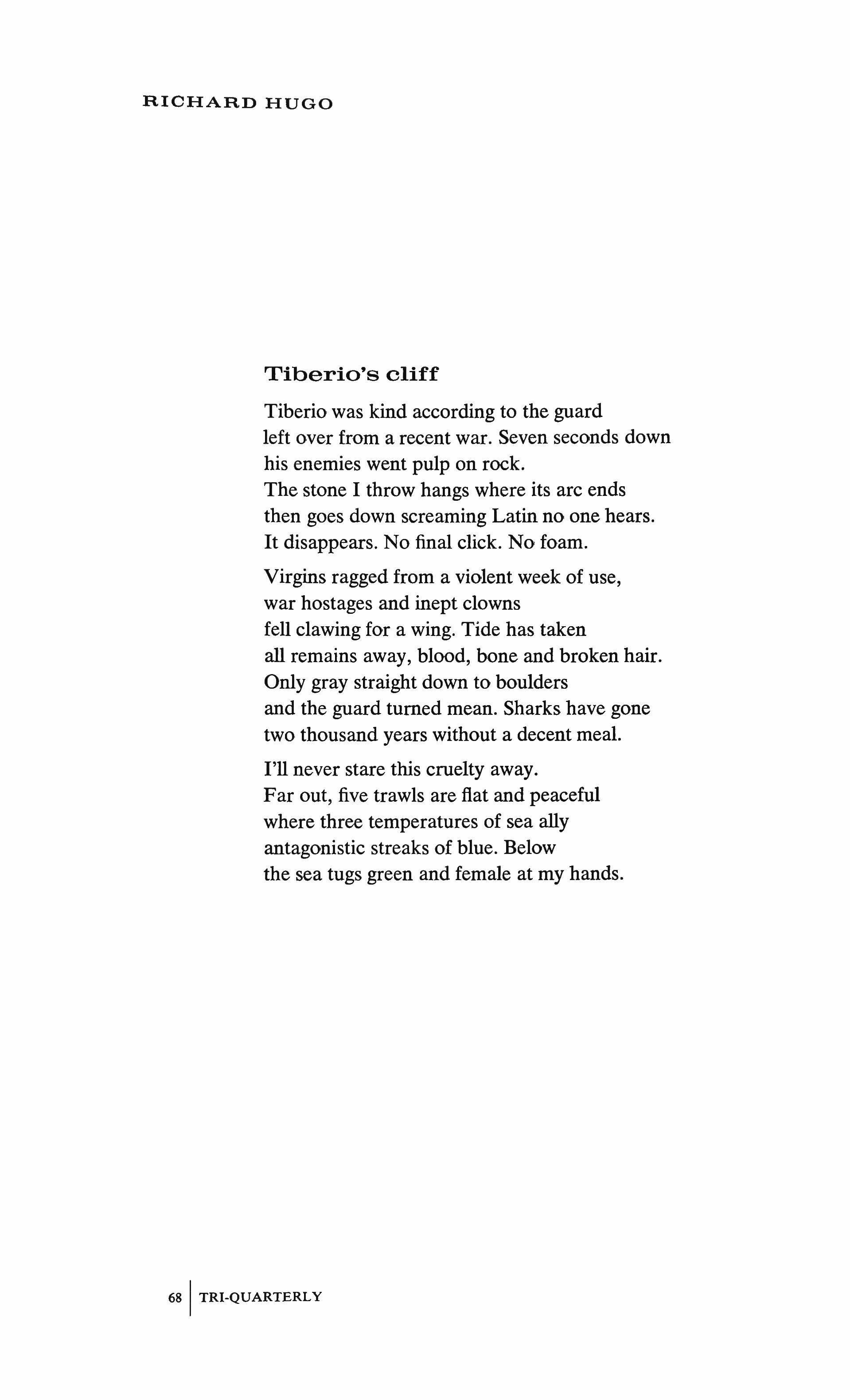
Tiberio was kind according to the guard left over from a recent war. Seven seconds down his enemies went pulp on rock.
The stone I throw hangs where its arc ends then goes down screaming Latin no one hears. It disappears. No final click. No foam.
Virgins ragged from a violent week of use, war hostages and inept clowns fell clawing for a wing. Tide has taken all remains away, blood, bone and broken hair. Only gray straight down to boulders and the guard turned mean. Sharks have gone two thousand years without a decent meal.
I'll never stare this cruelty away. Far out, five trawls are flat and peaceful where three temperatures of sea ally antagonistic streaks of blue. Below the sea tugs green and female at my hands.
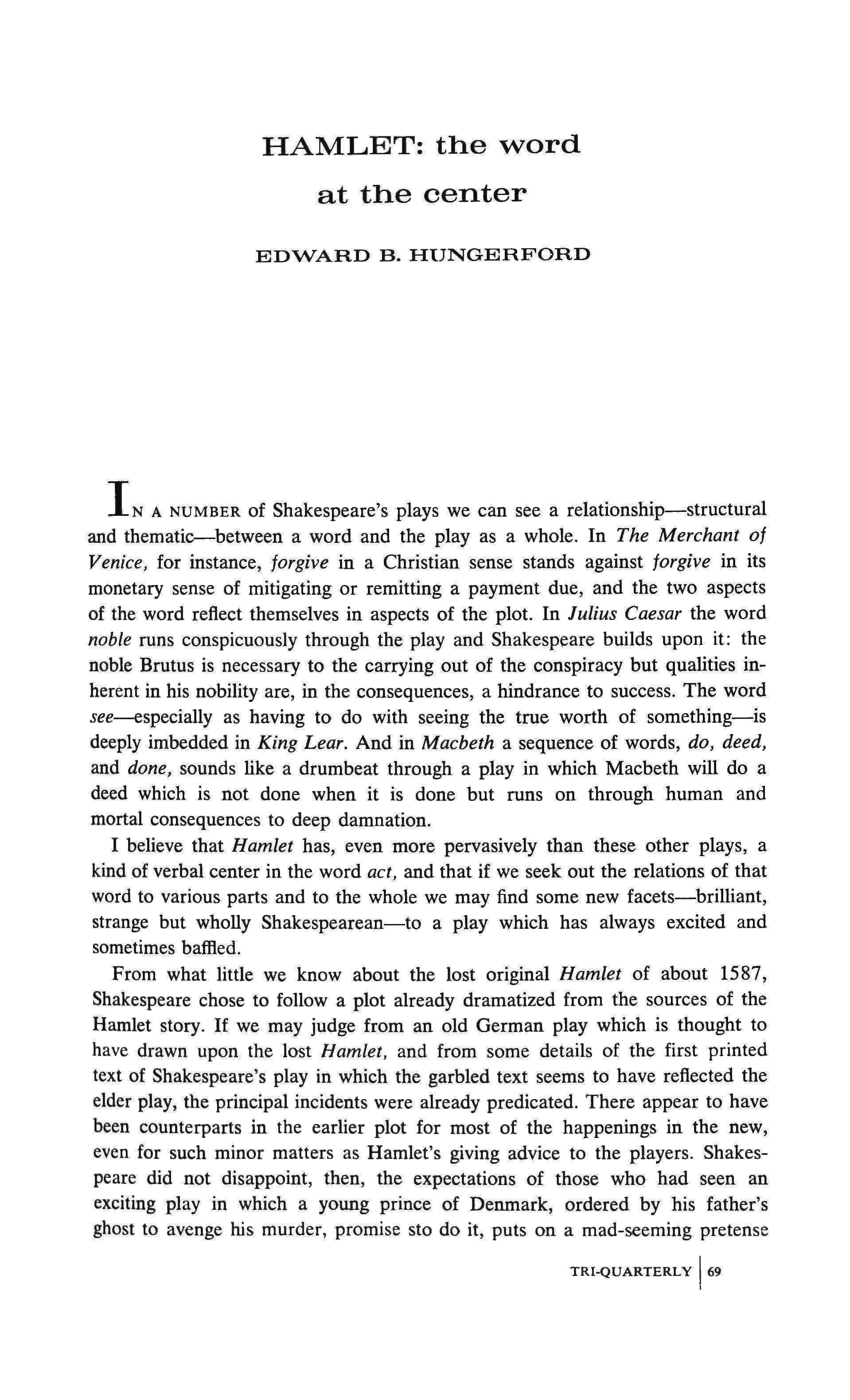
INA NUMBER of Shakespeare's plays we can see a relationship-structural and thematic--between a word and the playas a whole. In The Merchant of Venice, for instance, forgive in a Christian sense stands against forgive in its monetary sense of mitigating or remitting a payment due, and the two aspects of the word reflect themselves in aspects of the plot. In Julius Caesar the word noble runs conspicuously through the play and Shakespeare builds upon it: the noble Brutus is necessary to the carrying out of the conspiracy but qualities inherent in his nobility are, in the consequences, a hindrance to success. The word see--especially as having to do with seeing the true worth of something-is deeply imbedded in King Lear. And in Macbeth a sequence of words, do, deed, and done, sounds like a drumbeat through a play in which Macbeth will do a deed which is not done when it is done but runs on through human and mortal consequences to deep damnation.
I believe that Hamlet has, even more pervasively than these other plays, a kind of verbal center in the word act, and that if we seek out the relations of that word to various parts and to the whole we may find some new facets-brilliant, strange but wholly Shakespearean-to a play which has always excited and sometimes baffled.
From what little we know about the lost original Hamlet of about 1587, Shakespeare chose to follow a plot already dramatized from the sources of the Hamlet story. If we may judge from an old German play which is thought to have drawn upon the lost Hamlet, and from some details of the first printed text of Shakespeare's play in which the garbled text seems to have reflected the elder play, the principal incidents were already predicated. There appear to have been counterparts in the earlier plot for most of the happenings in the new, even for such minor matters as Hamlet's giving advice to the players. Shakespeare did not disappoint, then, the expectations of those who had seen an exciting play in which a young prince of Denmark, ordered by his father's ghost to avenge his murder, promise sto do it, puts on a mad-seeming pretense
TRI-QUARTERLy 169
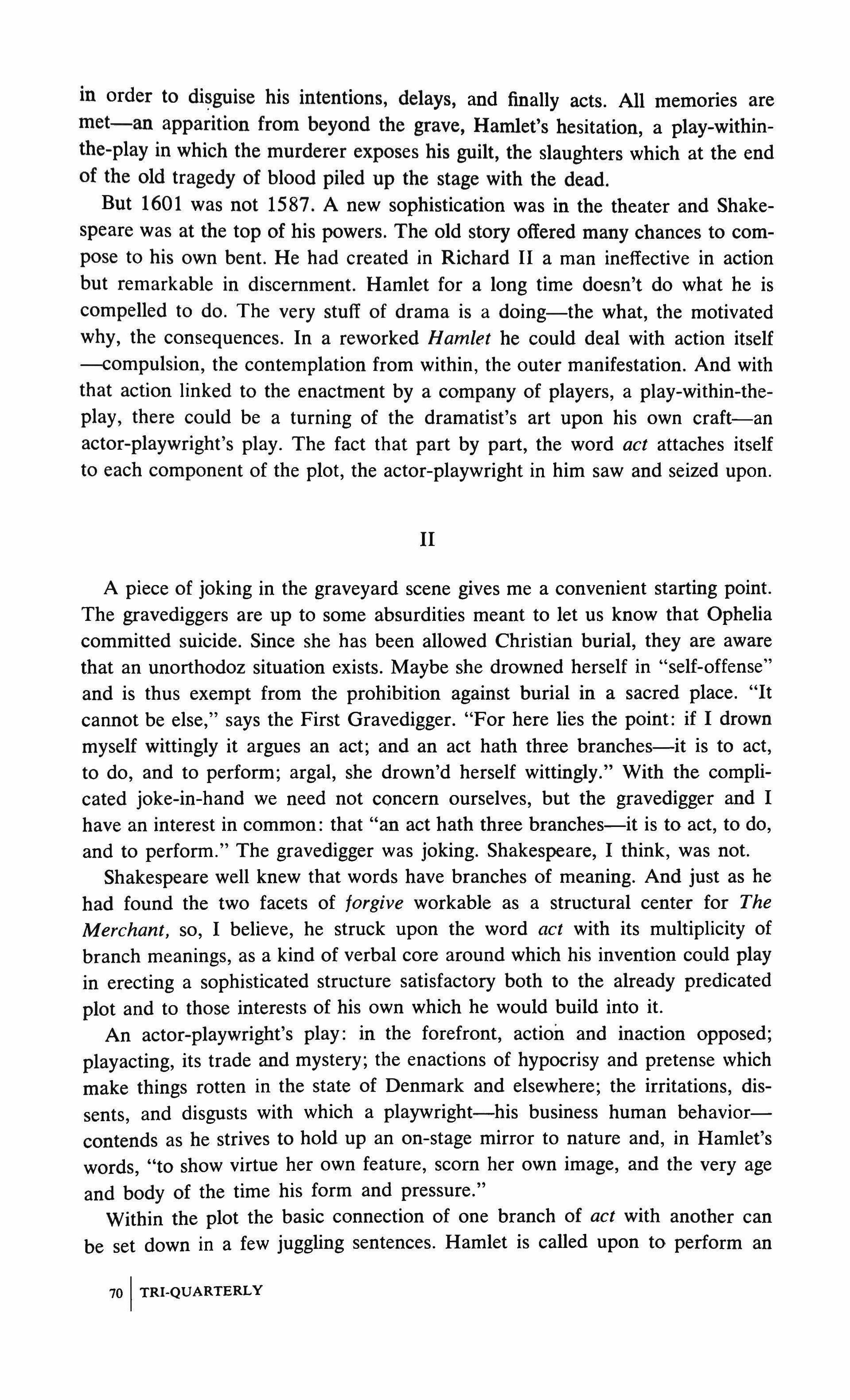
in order to disguise his intentions, delays, and finally acts. All memories are met-an apparition from beyond the grave, Hamlet's hesitation, a play-withinthe-play in which the murderer exposes his guilt, the slaughters which at the end of the old tragedy of blood piled up the stage with the dead.
But 1601 was not 1587. A new sophistication was in the theater and Shakespeare was at the top of his powers. The old story offered many chances to compose to his own bent. He had created in Richard II a man ineffective in action but remarkable in discernment. Hamlet for a long time doesn't do what he is compelled to do. The very stuff of drama is a doing-the what, the motivated why, the consequences. In a reworked Hamlet he could deal with action itself --compulsion, the contemplation from within, the outer manifestation. And with that action linked to the enactment by a company of players, a play-within-theplay, there could be a turning of the dramatist's art upon his own craft-an actor-playwright's play. The fact that part by part, the word act attaches itself to each component of the plot, the actor-playwright in him saw and seized upon.
A piece of joking in the graveyard scene gives me a convenient starting point. The gravediggers are up to some absurdities meant to let us know that Ophelia committed suicide. Since she has been allowed Christian burial, they are aware that an unorthodoz situation exists. Maybe she drowned herself in "self-offense" and is thus exempt from the prohibition against burial in a sacred place. "It cannot be else," says the First Gravedigger. "For here lies the point: if I drown myself wittingly it argues an act; and an act hath three branches-it is to act, to do, and to perform; argal, she drown'd herself wittingly." With the complicated joke-in-hand we need not concern ourselves, but the gravedigger and I have an interest in common: that "an act hath three branches-it is to act, to do, and to perform." The gravedigger was joking. Shakespeare, I think, was not.
Shakespeare well knew that words have branches of meaning. And just as he had found the two facets of forgive workable as a structural center for The Merchant, so, I believe, he struck upon the word act with its multiplicity of branch meanings, as a kind of verbal core around which his invention could play in erecting a sophisticated structure satisfactory both to the already predicated plot and to those interests of his own which he would build into it.
An actor-playwright's play: in the forefront, action and inaction opposed; playacting, its trade and mystery; the enactions of hypocrisy and pretense which make things rotten in the state of Denmark and elsewhere; the irritations, dissents, and disgusts with which a playwright-his business human behaviorcontends as he strives to hold up an on-stage mirror to nature and, in Hamlet's words, "to show virtue her own feature, scorn her own image, and the very age and body of the time his form and pressure."
Within the plot the basic connection of one branch of act with another can be set down in a few juggling sentences. Hamlet is called upon to perform an
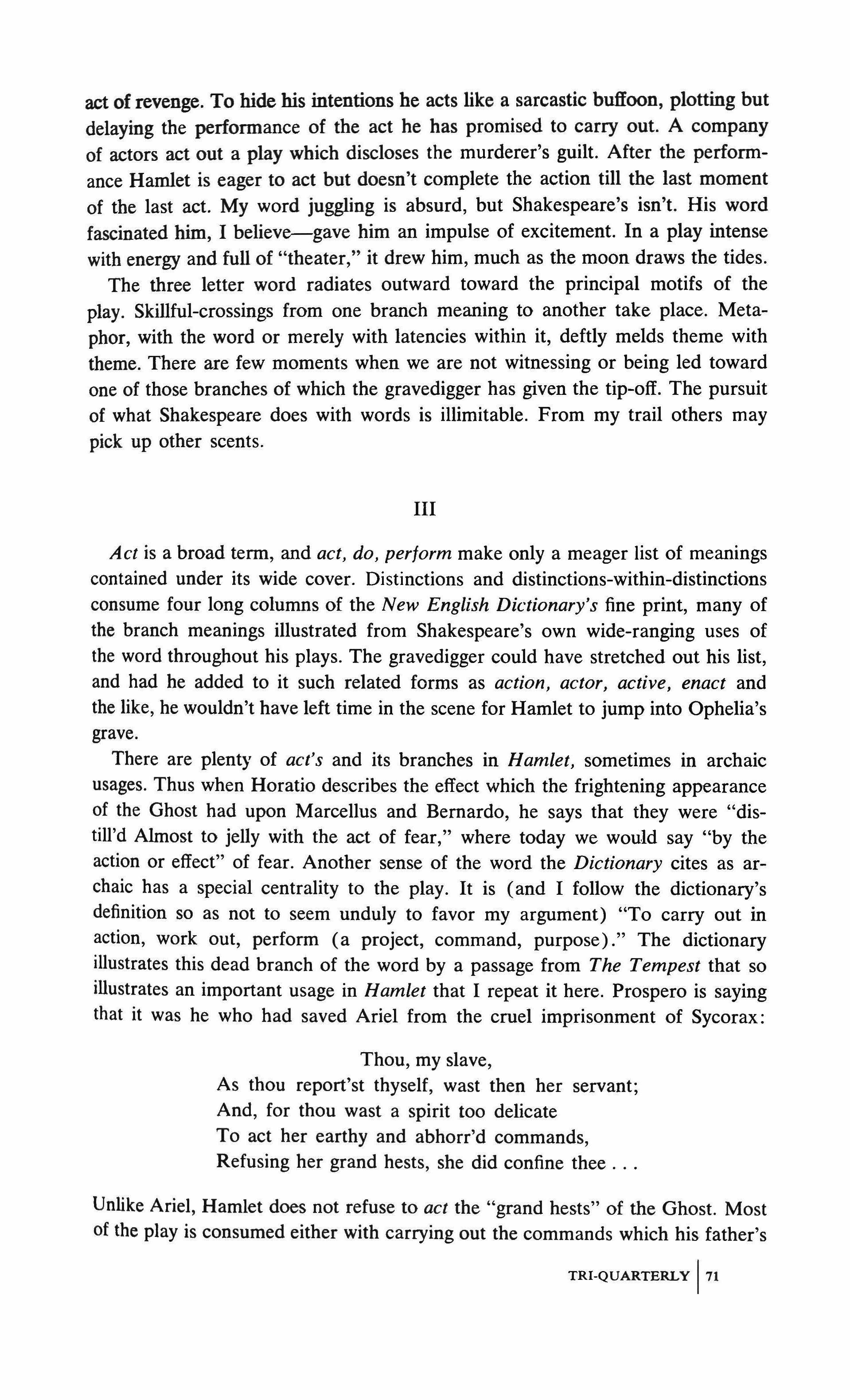
act of revenge. To hide his intentions he acts like a sarcastic buffoon, plotting but delaying the performance of the act he has promised to carry out. A company of actors act out a play which discloses the murderer's guilt. After the performance Hamlet is eager to act but doesn't complete the action till the last moment of the last act. My word juggling is absurd, but Shakespeare's isn't. His word fascinated him, I believe-gave him an impulse of excitement. In a play intense with energy and full of "theater," it drew him, much as the moon draws the tides.
The three letter word radiates outward toward the principal motifs of the play. Skillful-crossings from one branch meaning to another take place. Metaphor, with the word or merely with latencies within it, deftly melds theme with theme. There are few moments when we are not witnessing or being led toward one of those branches of which the gravedigger has given the tip-off. The pursuit of what Shakespeare does with words is illimitable. From my trail others may pick up other scents.
Act is a broad term, and act, do, perform make only a meager list of meanings contained under its wide cover. Distinctions and distinctions-within-distinctions consume four long columns of the New English Dictionary's fine print, many of the branch meanings illustrated from Shakespeare's own wide-ranging uses of the word throughout his plays. The gravedigger could have stretched out his list, and had he added to it such related forms as action, actor, active, enact and the like, he wouldn't have left time in the scene for Hamlet to jump into Ophelia's grave.
There are plenty of act's and its branches in Hamlet, sometimes in archaic usages. Thus when Horatio describes the effect which the frightening appearance of the Ghost had upon Marcellus and Bernardo, he says that they were "distill'd Almost to jelly with the act of fear," where today we would say "by the action or effect" of fear. Another sense of the word the Dictionary cites as archaic has a special centrality to the play. It is (and I follow the dictionary's definition so as not to seem unduly to favor my argument) "To carry out in action, work out, perform (a project, command, purpose)." The dictionary illustrates this dead branch of the word by a passage from The Tempest that so illustrates an important usage in Hamlet that I repeat it here. Prospero is saying that it was he who had saved Ariel from the cruel imprisonment of Sycorax:
Thou, my slave,
As thou report'st thyself, wast then her servant; And, for thou wast a spirit too delicate To act her earthy and abhorr'd commands, Refusing her grand hests, she did confine thee
Unlike Ariel, Hamlet does not refuse to act the "grand hests" of the Ghost. Most of the play is consumed either with carrying out the commands which his father's

spirit has enjoined upon him, or with his questioning why he has not yet acted them. Two grand hests are commanded by the Ghost: the first, unrestricted by conditions, to avenge his father's "foul and most unnatural murder"; the second, made far more difficult because of the limitations imposed:
Let not the royal bed of Denmark be A couch for luxury and damned incest.
We should notice that the Ghost calls this second command an "act" ("But howsoever thou pursuest this act "), though he so qualifies the performance of it that the eventual carrying out will not be a physical act but an adroit enactment of a different sort. Though we shall encounter various forms and facets of action and inaction, basic to all is-in the archaic sense I have cited-the acting of the Ghost's behests-"th'important acting of your dread command," as Hamlet himself phrases it.
In a more usual sense, we may speak of an act as a thing done, a deed, and in this sense the word relates itself to a plot in which "carnal, bloody, and unnatural acts" are the very stuff of the plot. In the closet scene when Hamlet is dealing so menacingly with Gertrude that he frightens her, the word defines itself as so used. "What have I done," she asks, "that thou dar'st wag thy tongue / In noise so rude against me?" "Such an act," replies Hamlet, "That blurs the grace and blush of modesty. ." All the principal persons of the play commit actsGertrude the act of adultery, Claudius the act of murder and of treason, Ophelia the act of suicide, Laertes an act of treachery, and Hamlet such acts as the slaying of Polonius-"O, what a rash and bloody deed is this!"-and at the end the killing of Claudius. Hamlet is using the word in this sense when he determines to hold off his killing of Claudius until he can take him
When he is drunk asleep; or in his rage; Or in th'incestuous pleasure 0 fhis bed; At gaming, swearing, or about some act That has no relish of salvation in't.
Much of the play is a waiting for the moment when Claudius is in fact caught not in one but in a multiplicity of treacherous, murderous acts.
There is a shade of difference in act as an enacture, a carrying out or performing, as the word enactures is used by the Player King in a passage which bears closely upon the inaction of the play-Hamlet's inaction:
What to ourselves in passion we propose, The passion ending, doth the purpose lose. The violence of either grief or joy
Their own enactures with themselves destroy.
Hamlet's self reproaches throughout the play are at this losing of purpose in his promised enactures. Shakespeare is using the word in this sense of put into action when Hamlet is frightening Ophelia with his extraordinary "I am very
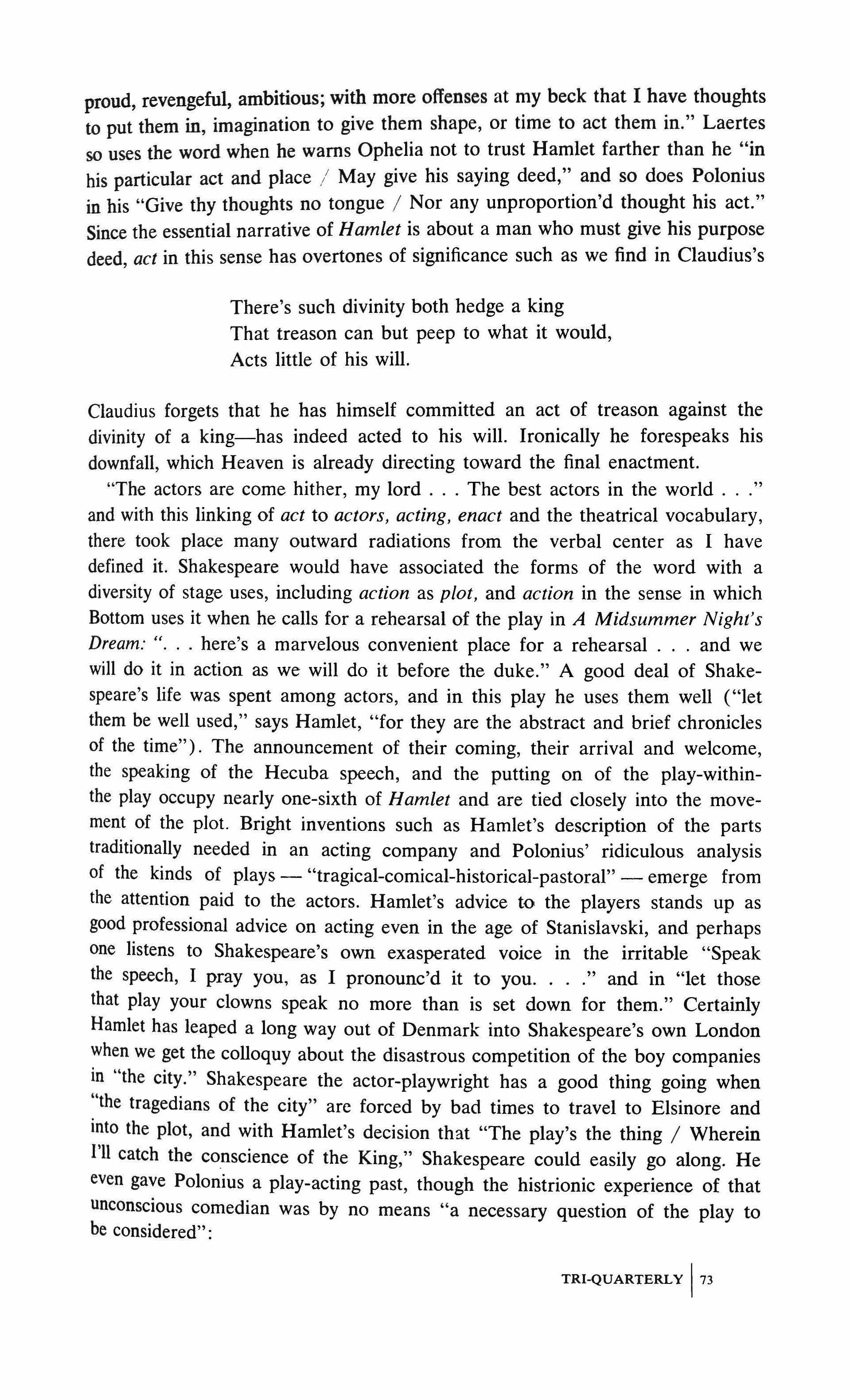
proud, revengeful, ambitious; with more offenses at my beck that I have thoughts to put them in, imagination to give them shape, or time to act them in." Laertes so uses the word when he warns Ophelia not to trust Hamlet farther than he "in his particular act and place / May give his saying deed," and so does Polonius in his "Give thy thoughts no tongue / Nor any unproportion'd thought his act." Since the essential narrative of Hamlet is about a man who must give his purpose deed, act in this sense has overtones of significance such as we find in Claudius's
There's such divinity both hedge a king That treason can but peep to what it would, Acts little of his will.
Claudius forgets that he has himself committed an act of treason against the divinity of a king-has indeed acted to his will. Ironically he forespeaks his downfall, which Heaven is already directing toward the final enactment.
"The actors are come hither, my lord The best actors in the world and with this linking of act to actors, acting, enact and the theatrical vocabulary, there took place many outward radiations from the verbal center as I have defined it. Shakespeare would have associated the forms of the word with a diversity of stage uses, including action as plot, and action in the sense in which Bottom uses it when he calls for a rehearsal of the play in A Midsummer Night's Dream: H here's a marvelous convenient place for a rehearsal and we will do it in action as we will do it before the duke." A good deal of Shakespeare's life was spent among actors, and in this play he uses them well ("let them be well used," says Hamlet, "for they are the abstract and brief chronicles of the time"). The announcement of their coming, their arrival and welcome, the speaking of the Hecuba speech, and the putting on of the play-withinthe play occupy nearly one-sixth of Hamlet and are tied closely into the movement of the plot. Bright inventions such as Hamlet's description of the parts traditionally needed in an acting company and Polonius' ridiculous analysis of the kinds of plays - "tragical-comical-historical-pastoral"emerge from the attention paid to the actors. Hamlet's advice to the players stands up as good professional advice on acting even in the age of Stanislavski, and perhaps one listens to Shakespeare's own exasperated voice in the irritable "Speak the speech, I pray you, as I pronounc'd it to you and in "let those that play your clowns speak no more than is set down for them." Certainly Hamlet has leaped a long way out of Denmark into Shakespeare's own London when we get the colloquy about the disastrous competition of the boy companies in "the city." Shakespeare the actor-playwright has a good thing going when "the tragedians of the city" are forced by bad times to travel to Elsinore and into the plot, and with Hamlet's decision that "The play's the thing / Wherein I'll catch the conscience of the King," Shakespeare could easily go along. He even gave Polonius a play-acting past, though the histrionic experience of that unconscious comedian was by no means "a necessary question of the play to be considered":
Hamlet:
Polonius:
Hamlet:
Polonius:
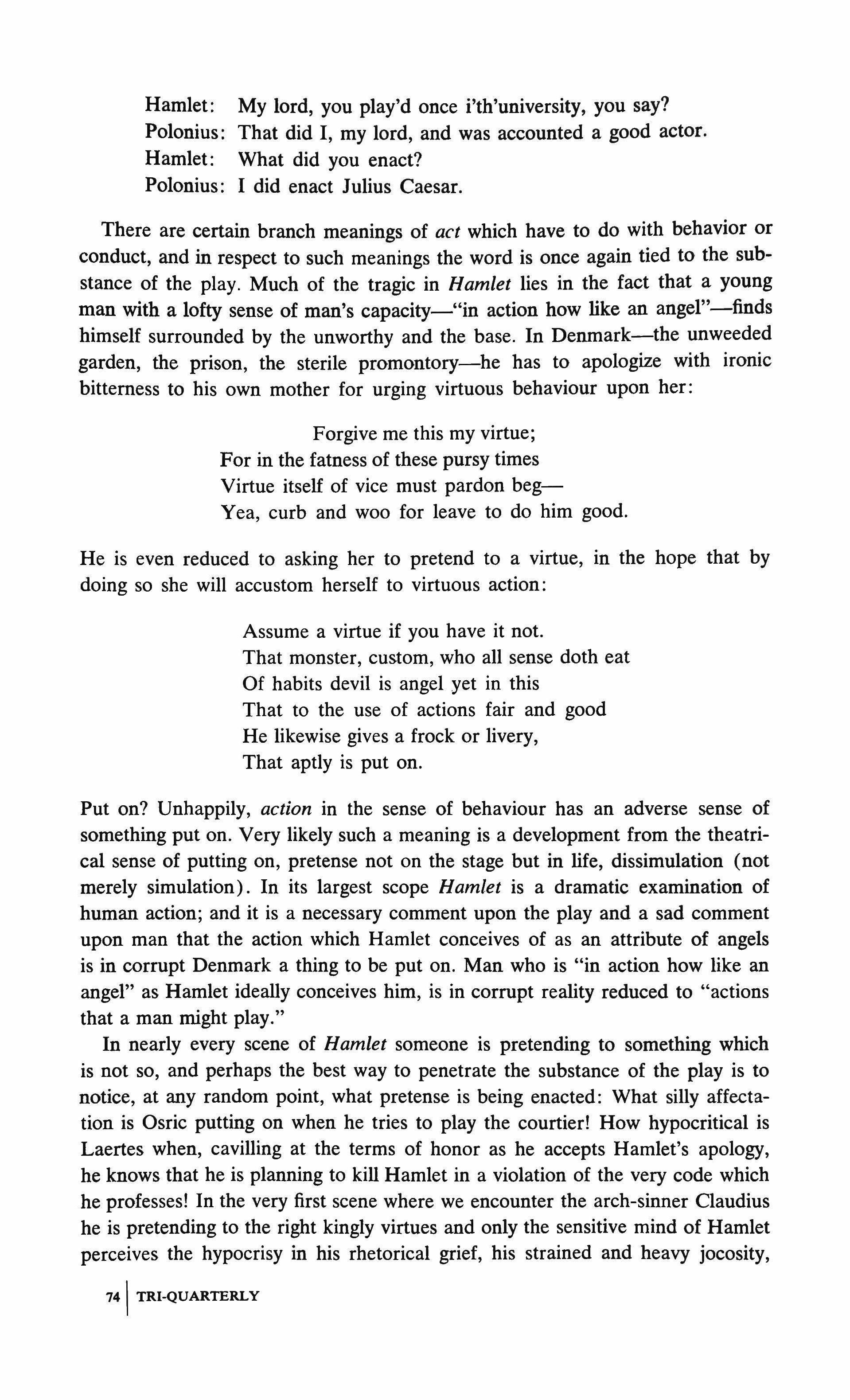
My lord, you play'd once i'th'university, you say? That did I, my lord, and was accounted a good actor. What did you enact?
I did enact Julius Caesar.
There are certain branch meanings of act which have to do with behavior or conduct, and in respect to such meanings the word is once again tied to the substance of the play. Much of the tragic in Hamlet lies in the fact that a young man with a lofty sense of man's capacity-"in action how like an angel"-finds himself surrounded by the unworthy and the base. In Denmark-the unweeded garden, the prison, the sterile promontory-he has to apologize with ironic bitterness to his own mother for urging virtuous behaviour upon her:
Forgive me this my virtue; For in the fatness of these pursy times Virtue itself of vice must pardon begYea, curb and woo for leave to do him good.
He is even reduced to asking her to pretend to a virtue, in the hope that by doing so she will accustom herself to virtuous action:
Assume a virtue if you have it not. That monster, custom, who all sense doth eat Of habits devil is angel yet in this That to the use of actions fair and good He likewise gives a frock or livery, That aptly is put on.
Put on? Unhappily, action in the sense of behaviour has an adverse sense of something put on. Very likely such a meaning is a development from the theatrical sense of putting on, pretense not on the stage but in life, dissimulation (not merely simulation). In its largest scope Hamlet is a dramatic examination of human action; and it is a necessary comment upon the play and a sad comment upon man that the action which Hamlet conceives of as an attribute of angels is in corrupt Denmark a thing to be put on. Man who is "in action how like an angel" as Hamlet ideally conceives him, is in corrupt reality reduced to "actions that a man might play."
In nearly every scene of Hamlet someone is pretending to something which is not so, and perhaps the best way to penetrate the substance of the play is to notice, at any random point, what pretense is being enacted: What silly affectation is Osric putting on when he tries to play the courtier! How hypocritical is Laertes when, cavilling at the terms of honor as he accepts Hamlet's apology, he knows that he is planning to kill Hamlet in a violation of the very code which he professes! In the very first scene where we encounter the arch-sinner Claudius he is pretending to the right kingly virtues and only the sensitive mind of Hamlet perceives the hypocrisy in his rhetorical grief, his strained and heavy jocosity,
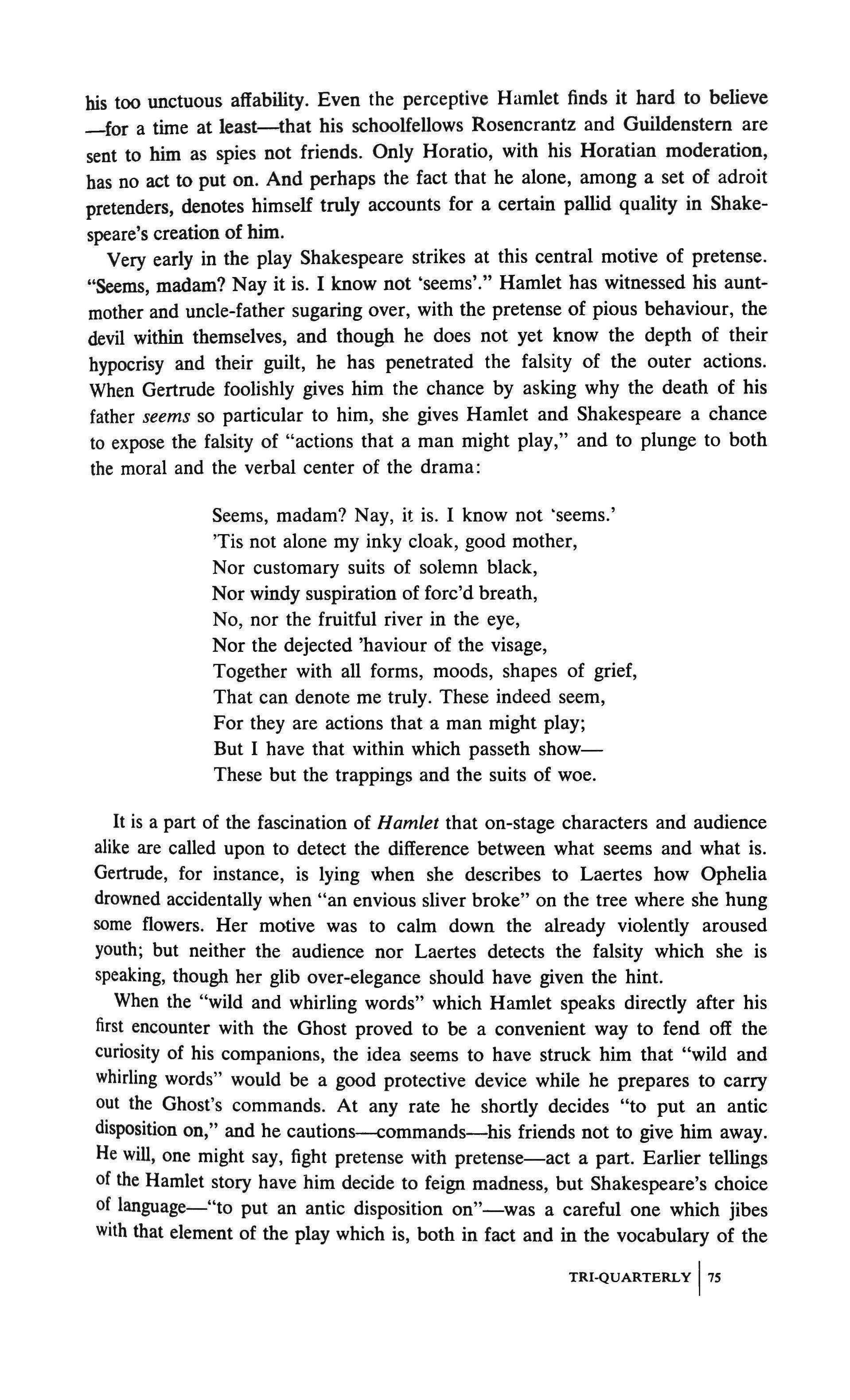
his too unctuous affability. Even the perceptive Hamlet finds it hard to believe -for a time at least-that his schoolfellows Rosencrantz and Guildenstem are sent to him as spies not friends. Only Horatio, with his Horatian moderation, has no act to put on. And perhaps the fact that he alone, among a set of adroit pretenders, denotes himself truly accounts for a certain pallid quality in Shakespeare's creation of him.
Very early in the play Shakespeare strikes at this central motive of pretense. "Seems, madam? Nay it is. I know not 'seems'." Hamlet has witnessed his auntmother and uncle-father sugaring over, with the pretense of pious behaviour, the devil within themselves, and though he does not yet know the depth of their hypocrisy and their guilt, he has penetrated the falsity of the outer actions. When Gertrude foolishly gives him the chance by asking why the death of his father seems so particular to him, she gives Hamlet and Shakespeare a chance to expose the falsity of "actions that a man might play," and to plunge to both the moral and the verbal center of the drama:
Seems, madam? Nay, it is. I know not 'seems.' 'Tis not alone my inky cloak, good mother, Nor customary suits of solemn black, Nor windy suspiration of forc'd breath, No, nor the fruitful river in the eye, Nor the dejected 'haviour of the visage, Together with all forms, moods, shapes of grief, That can denote me truly. These indeed seem, For they are actions that a man might play; But I have that within which passeth showThese but the trappings and the suits of woe.
It is a part of the fascination of Hamlet that on-stage characters and audience alike are called upon to detect the difference between what seems and what is. Gertrude, for instance, is lying when she describes to Laertes how Ophelia drowned accidentally when "an envious sliver broke" on the tree where she hung some flowers. Her motive was to calm down the already violently aroused youth; but neither the audience nor Laertes detects the falsity which she is speaking, though her glib over-elegance should have given the hint.
When the "wild and whirling words" which Hamlet speaks directly after his first encounter with the Ghost proved to be a convenient way to fend off the curiosity of his companions, the idea seems to have struck him that "wild and whirling words" would be a good protective device while he prepares to carry out the Ghost's commands. At any rate he shortly decides "to put an antic disposition on," and he cautions--commands-his friends not to give him away. He will, one might say, fight pretense with pretense-act a part. Earlier tellings of the Hamlet story have him decide to feign madness, but Shakespeare's choice of language-"to put an antic disposition on"-was a careful one which jibes with that element of the play which is, both in fact and in the vocabulary of the TRI-QUARTERLy 175
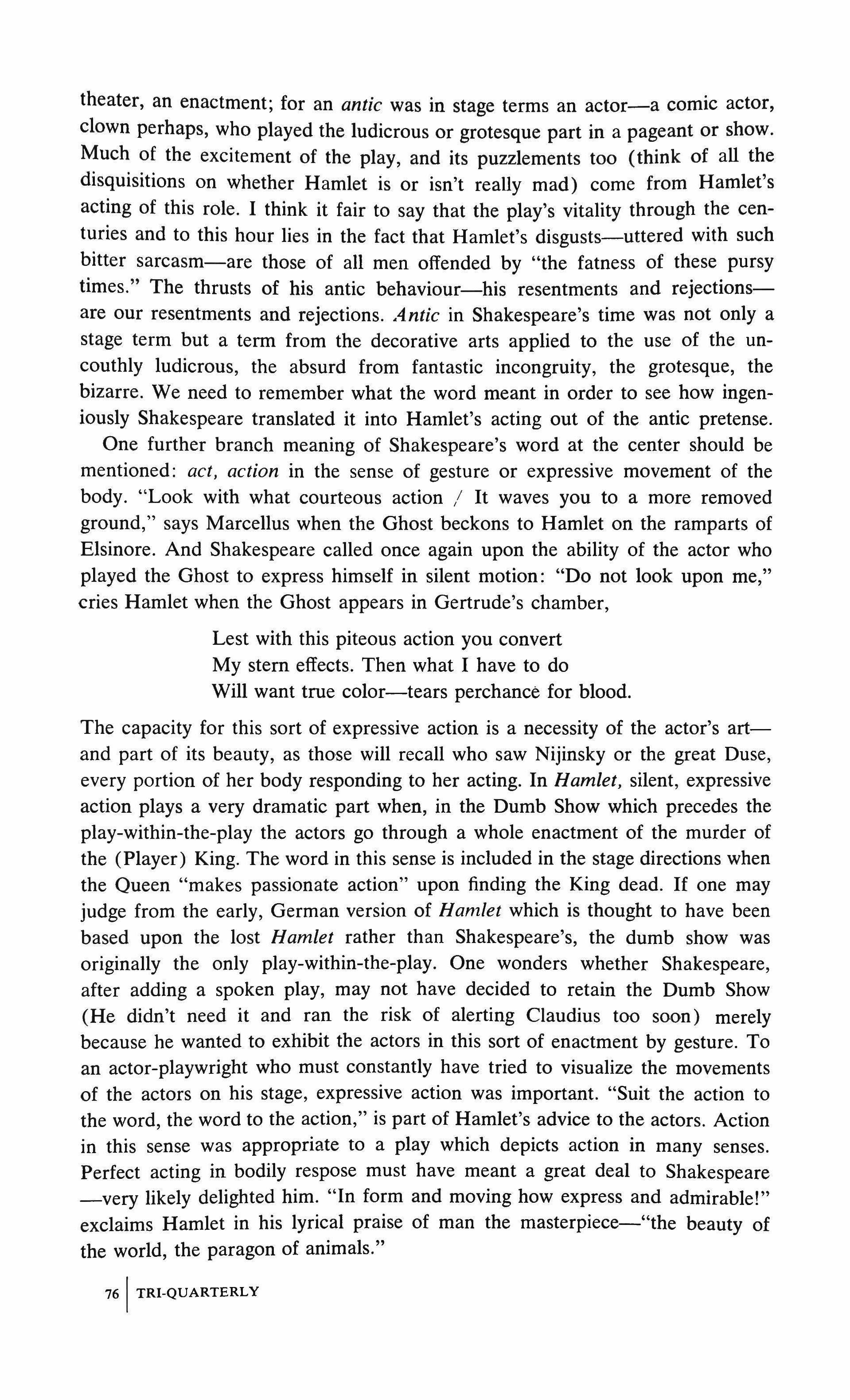
theater, an enactment; for an antic was in stage terms an actor-a comic actor, clown perhaps, who played the ludicrous or grotesque part in a pageant or show. Much of the excitement of the play, and its puzzlements too (think of all the disquisitions on whether Hamlet is or isn't really mad) come from Hamlet's acting of this role. I think it fair to say that the play's vitality through the centuries and to this hour lies in the fact that Hamlet's disgusts-uttered with such bitter sarcasm-are those of all men offended by "the fatness of these pursy times." The thrusts of his antic behaviour-his resentments and rejectionsare our resentments and rejections. Antic in Shakespeare's time was not only a stage term but a term from the decorative arts applied to the use of the uncouthly ludicrous, the absurd from fantastic incongruity, the grotesque, the bizarre. We need to remember what the word meant in order to see how ingeniously Shakespeare translated it into Hamlet's acting out of the antic pretense.
One further branch meaning of Shakespeare's word at the center should be mentioned: act, action in the sense of gesture or expressive movement of the body. "Look with what courteous action / It waves you to a more removed ground," says Marcellus when the Ghost beckons to Hamlet on the ramparts of Elsinore. And Shakespeare called once again upon the ability of the actor who played the Ghost to express himself in silent motion: "Do not look upon me," cries Hamlet when the Ghost appears in Gertrude's chamber, Lest with this piteous action you convert My stern effects. Then what I have to do Will want true color-tears perchance for blood.
The capacity for this sort of expressive action is a necessity of the actor's artand part of its beauty, as those will recall who saw Nijinsky or the great Duse, every portion of her body responding to her acting. In Hamlet, silent, expressive action plays a very dramatic part when, in the Dumb Show which precedes the play-within-the-play the actors go through a whole enactment of the murder of the (Player) King. The word in this sense is included in the stage directions when the Queen "makes passionate action" upon finding the King dead. If one may judge from the early, German version of Hamlet which is thought to have been based upon the lost Hamlet rather than Shakespeare's, the dumb show was originally the only play-within-the-play. One wonders whether Shakespeare, after adding a spoken play, may not have decided to retain the Dumb Show (He didn't need it and ran the risk of alerting Claudius too soon) merely because he wanted to exhibit the actors in this sort of enactment by gesture. To an actor-playwright who must constantly have tried to visualize the movements of the actors on his stage, expressive action was important. "Suit the action to the word, the word to the action," is part of Hamlet's advice to the actors. Action in this sense was appropriate to a play which depicts action in many senses. Perfect acting in bodily respose must have meant a great deal to Shakespeare -very likely delighted him. "In form and moving how express and admirable!" exclaims Hamlet in his lyrical praise of man the masterpiece-"the beauty of the world, the paragon of animals."
TRI-QUARTERLY
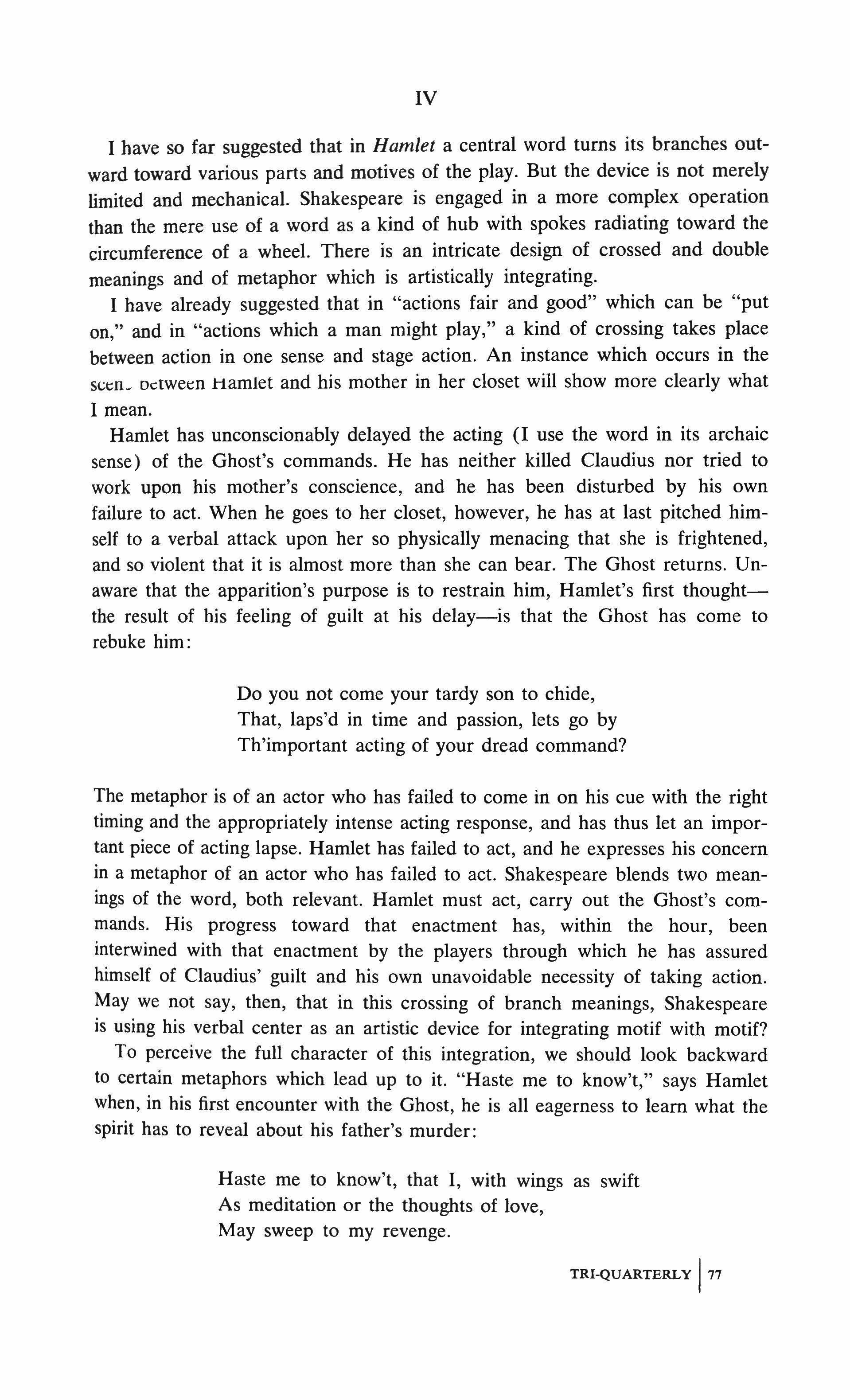
I have so far suggested that in Hamlet a central word turns its branches outward toward various parts and motives of the play. But the device is not merely limited and mechanical. Shakespeare is engaged in a more complex operation than the mere use of a word as a kind of hub with spokes radiating toward the circumference of a wheel. There is an intricate design of crossed and double meanings and of metaphor which is artistically integrating.
I have already suggested that in "actions fair and good" which can be "put on," and in "actions which a man might play," a kind of crossing takes place between action in one sense and stage action. An instance which occurs in the seen, oetween Hamlet and his mother in her closet will show more clearly what I mean.
Hamlet has unconscionably delayed the acting (I use the word in its archaic sense) of the Ghost's commands. He has neither killed Claudius nor tried to work upon his mother's conscience, and he has been disturbed by his own failure to act. When he goes to her closet, however, he has at last pitched himself to a verbal attack upon her so physically menacing that she is frightened, and so violent that it is almost more than she can bear. The Ghost returns. Unaware that the apparition's purpose is to restrain him, Hamlet's first thoughtthe result of his feeling of guilt at his delay-is that the Ghost has come to rebuke him:
Do you not come your tardy son to chide, That, laps'd in time and passion, lets go by Th'important acting of your dread command?
The metaphor is of an actor who has failed to come in on his cue with the right timing and the appropriately intense acting response, and has thus let an important piece of acting lapse. Hamlet has failed to act, and he expresses his concern in a metaphor of an actor who has failed to act. Shakespeare blends two meanings of the word, both relevant. Hamlet must act, carry out the Ghost's commands. His progress toward that enactment has, within the hour, been interwined with that enactment by the players through which he has assured himself of Claudius' guilt and his own unavoidable necessity of taking action.
May we not say, then, that in this crossing of branch meanings, Shakespeare is using his verbal center as an artistic device for integrating motif with motif?
To perceive the full character of this integration, we should look backward to certain metaphors which lead up to it. "Haste me to know't," says Hamlet when, in his first encounter with the Ghost, he is all eagerness to learn what the spirit has to reveal about his father's murder:
Haste me to know't, that I, with wings as swift As meditation or the thoughts of love, May sweep to my revenge.
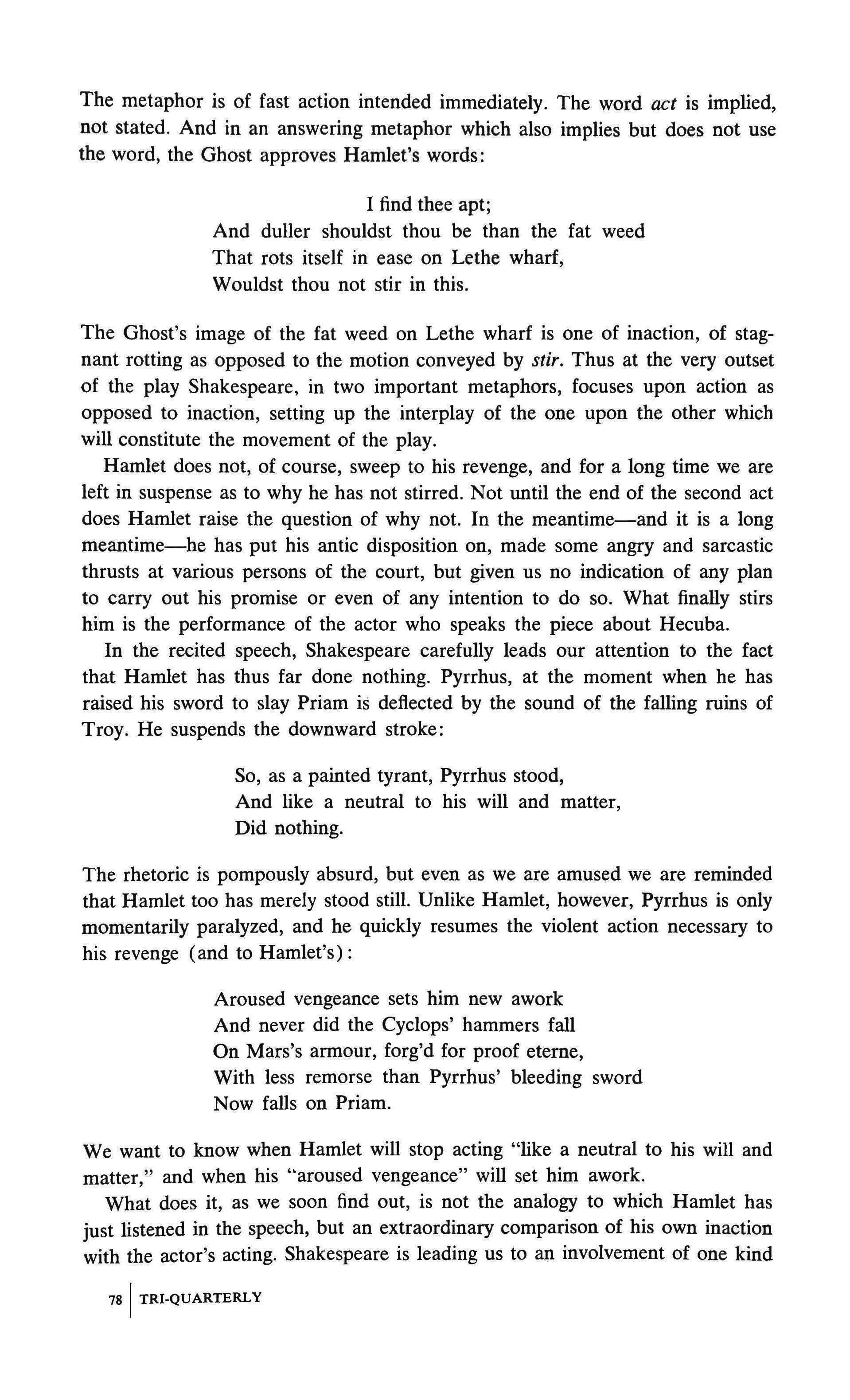
The metaphor is of fast action intended immediately. The word act is implied, not stated. And in an answering metaphor which also implies but does not use the word, the Ghost approves Hamlet's words:
I find thee apt; And duller shouldst thou be than the fat weed That rots itself in ease on Lethe wharf, Wouldst thou not stir in this.
The Ghost's image of the fat weed on Lethe wharf is one of inaction, of stagnant rotting as opposed to the motion conveyed by stir. Thus at the very outset of the play Shakespeare, in two important metaphors, focuses upon action as opposed to inaction, setting up the interplay of the one upon the other which will constitute the movement of the play.
Hamlet does not, of course, sweep to his revenge, and for a long time we are left in suspense as to why he has not stirred. Not until the end of the second act does Hamlet raise the question of why not. In the meantime-and it is a long meantime-he has put his antic disposition on, made some angry and sarcastic thrusts at various persons of the court, but given us no indication of any plan to carry out his promise or even of any intention to do so. What finally stirs him is the performance of the actor who speaks the piece about Hecuba. In the recited speech, Shakespeare carefully leads our attention to the fact that Hamlet has thus far done nothing. Pyrrhus, at the moment when he has raised his sword to slay Priam is deflected by the sound of the falling ruins of Troy. He suspends the downward stroke:
So, as a painted tyrant, Pyrrhus stood, And like a neutral to his will and matter, Did nothing.
The rhetoric is pompously absurd, but even as we are amused we are reminded that Hamlet too has merely stood still. Unlike Hamlet, however, Pyrrhus is only momentarily paralyzed, and he quickly resumes the violent action necessary to his revenge (and to Hamlet's) :
Aroused vengeance sets him new awork And never did the Cyclops' hammers fall On Mars's armour, forg'd for proof eteme, With less remorse than Pyrrhus' bleeding sword Now falls on Priam.
We want to know when Hamlet will stop acting "like a neutral to his will and matter," and when his "aroused vengeance" will set him awork. What does it, as we soon find out, is not the analogy to which Hamlet has just listened in the speech, but an extraordinary comparison of his own inaction with the actor's acting. Shakespeare is leading us to an involvement of one kind

of acting with another-one of those deftly artistic crossings which form part of the understructure of the play.
The soliloquy which follows the recitation of the Hecuba speech-beginning, "0 what a rogue and peasant slave am I"-differs from those other meditations in which he asks himself why he has not yet acted. Hamlet has already decided what he is going to do--has already proposed the playing of The Murder of Gonzago, and has already determined to add to it a speech which he will write himself. The soliloquy is, then, Shakespeare's device to let us watch the internal workings of Hamlet's mind as he arrives at a plan already stated.
Hamlet reproaches himself for his inaction, asks himself if he is a coward, decides that he must be
or ere this I should have fatted all the region kites With this slave's offal.
At the end he reveals his fear that the Ghost may have been the Devil who "abuses me to damn me," and explains his expectaton that "The play's the thing/ Wherein I'll catch the conscience of the King."
But what especially interests me in connection with my topic in hand is that what has aroused Hamlet is the extraordinary spectacle of the actor's response to a mere fiction. The actor has turned pale, tears have come to his eyes, his whole body has reacted emotionally to a mere nothing: "For Hecuba! / What's Hecuba to him, or he to Hecuba, / That he should weep for her?"
Then, in the language of the stage, Hamlet asks
What would he do
Had he the motive and the cue for passion That I have?
A few lines farther on he continues the stage metaphor in his "Prompted to my revenge by heaven and hell." Hamlet has the motive, the cue, and the prompting, but he has not acted. What would the actor do, Hamlet has asked, if he had my cue and motive? The answer contains itself within the circumference of acting. The actor would not do something-he would not run out and kill someoneClaudius or anyone else. He would merely give a still more intense acting response:
He would drown the stage with tears And cleave the general air with horrid speech; Make mad the guilty and appal the free, Confound the ignorant, and amaze indeed The very faculties of eyes and ears.
But as he compares himself to the actor, Hamlet complains, not that he can do nothing but that he can say nothing. He is still within his own stage metaphor:
TRI-QUARTERLy 179
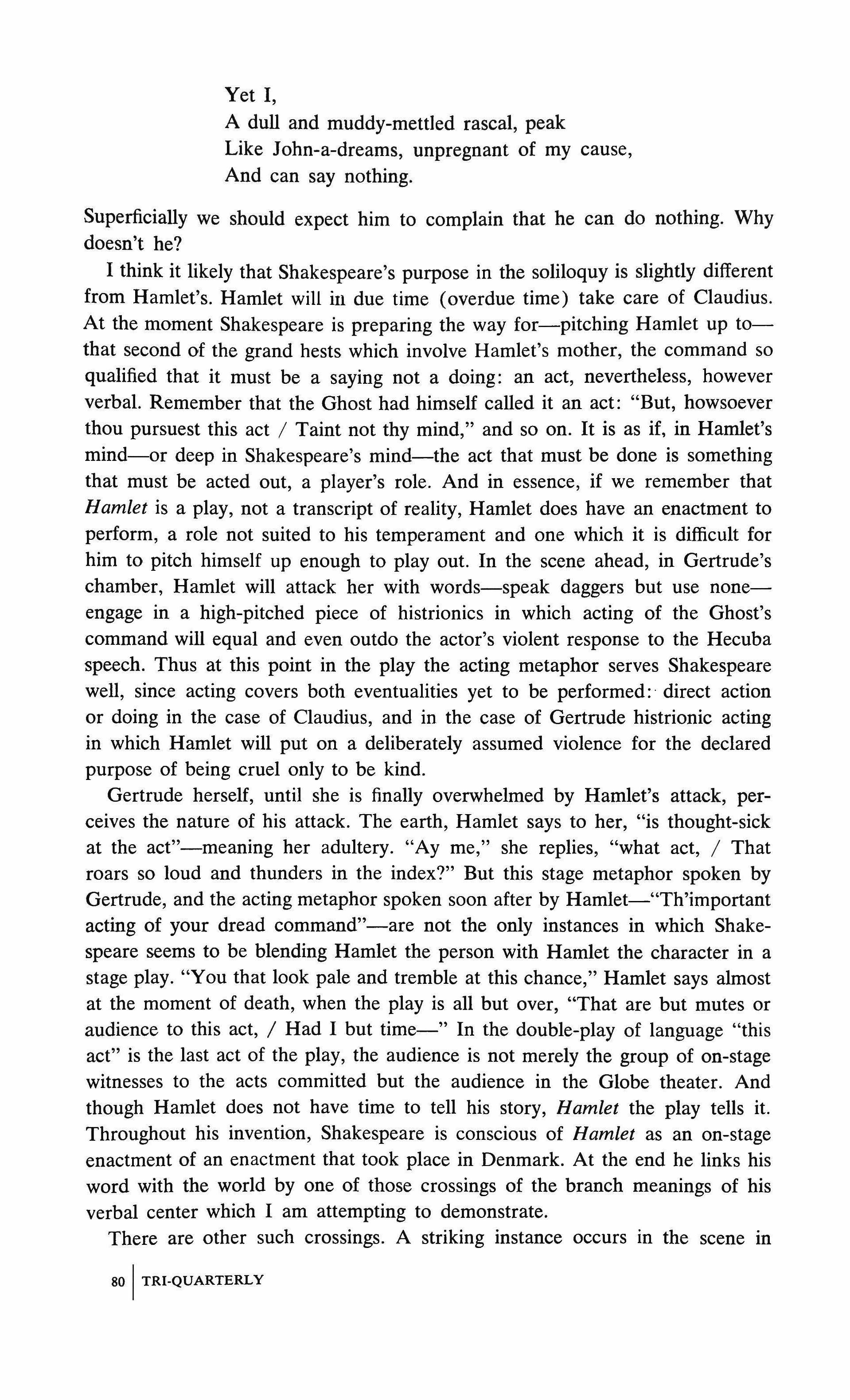
Yet I,
A dull and muddy-mettled rascal, peak Like John-a-dreams, unpregnant of my cause, And can say nothing.
Superficially we should expect him to complain that he can do nothing. Why doesn't he?
I think it likely that Shakespeare's purpose in the soliloquy is slightly different from Hamlet's. Hamlet will ill due time (overdue time) take care of Claudius. At the moment Shakespeare is preparing the way for-pitching Hamlet up tothat second of the grand hests which involve Hamlet's mother, the command so qualified that it must be a saying not a doing: an act, nevertheless, however verbaL Remember that the Ghost had himself called it an act: "But, howsoever thou pursuest this act / Taint not thy mind," and so on. It is as if, in Hamlet's mind-or deep in Shakespeare's mind-the act that must be done is something that must be acted out, a player's role. And in essence, if we remember that Hamlet is a play, not a transcript of reality, Hamlet does have an enactment to perform, a role not suited to his temperament and one which it is difficult for him to pitch himself up enough to play out. In the scene ahead, in Gertrude's chamber, Hamlet will attack her with words-speak daggers but use noneengage in a high-pitched piece of histrionics in which acting of the Ghost's command will equal and even outdo the actor's violent response to the Hecuba speech. Thus at this point in the play the acting metaphor serves Shakespeare well, since acting covers both eventualities yet to be performed.' direct action or doing in the case of Claudius, and in the case of Gertrude histrionic acting in which Hamlet will put on a deliberately assumed violence for the declared purpose of being cruel only to be kind.
Gertrude herself, until she is finally overwhelmed by Hamlet's attack, perceives the nature of his attack. The earth, Hamlet says to her, "is thought-sick at the act"-meaning her adultery. "Ay me," she replies, "what act, / That roars so loud and thunders in the index?" But this stage metaphor spoken by Gertrude, and the acting metaphor spoken soon after by Hamlet-"Th'important acting of your dread command"-are not the only instances in which Shakespeare seems to be blending Hamlet the person with Hamlet the character in a stage play. "You that look pale and tremble at this chance," Hamlet says almost at the moment of death, when the play is all but over, "That are but mutes or audience to this act, / Had I but time-" In the double-play of language "this act" is the last act of the play, the audience is not merely the group of on-stage witnesses to the acts committed but the audience in the Globe theater. And though Hamlet does not have time to tell his story, Hamlet the play tells it. Throughout his invention, Shakespeare is conscious of Hamlet as an on-stage enactment of an enactment that took place in Denmark. At the end he links his word with the world by one of those crossings of the branch meanings of his verbal center which I am attempting to demonstrate.
There are other such crossings. A striking instance occurs in the scene in
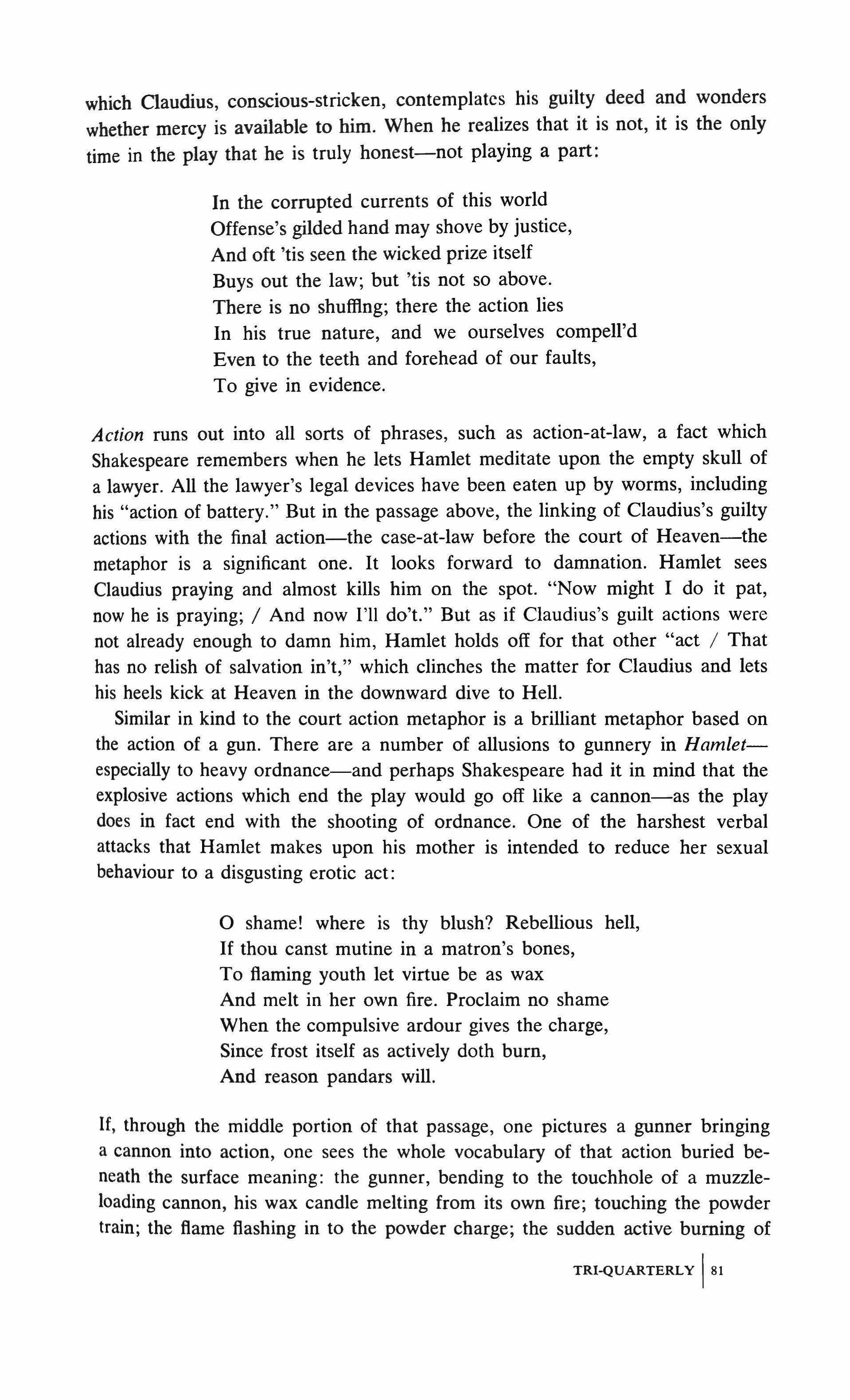
which Claudius, conscious-stricken, contemplates his guilty deed and wonders whether mercy is available to him. When he realizes that it is not, it is the only time in the play that he is truly honest-not playing a part:
In the corrupted currents of this world Offense's gilded hand may shove by justice, And oft 'tis seen the wicked prize itself Buys out the law; but 'tis not so above. There is no shuffing; there the action lies In his true nature, and we ourselves compell'd Even to the teeth and forehead of our faults, To give in evidence.
Action runs out into all sorts of phrases, such as action-at-law, a fact which Shakespeare remembers when he lets Hamlet meditate upon the empty skull of a lawyer. All the lawyer's legal devices have been eaten up by worms, including his "action of battery." But in the passage above, the linking of Claudius's guilty actions with the final action-the case-at-law before the court of Heaven-the metaphor is a significant one. It looks forward to damnation. Hamlet sees Claudius praying and almost kills him on the spot. "Now might I do it pat, now he is praying; / And now I'll do't." But as if Claudius's guilt actions were not already enough to damn him, Hamlet holds off for that other "act / That has no relish of salvation in't," which clinches the matter for Claudius and lets his heels kick at Heaven in the downward dive to Hell.
Similar in kind to the court action metaphor is a brilliant metaphor based on the action of a gun. There are a number of allusions to gunnery in Hamlet-sespecially to heavy ordnance-and perhaps Shakespeare had it in mind that the explosive actions which end the play would go off like a cannon-as the play does in fact end with the shooting of ordnance. One of the harshest verbal attacks that Hamlet makes upon his mother is intended to reduce her sexual behaviour to a disgusting erotic act:
o shame! where is thy blush? Rebellious hell, If thou canst mutine in a matron's bones, To flaming youth let virtue be as wax And melt in her own fire. Proclaim no shame When the compulsive ardour gives the charge, Since frost itself as actively doth burn, And reason pandars will.
If, through the middle portion of that passage, one pictures a gunner bringing a cannon into action, one sees the whole vocabulary of that action buried beneath the surface meaning: the gunner, bending to the touchhole of a muzzleloading cannon, his wax candle melting from its own fire; touching the powder train; the flame flashing in to the powder charge; the sudden active burning of
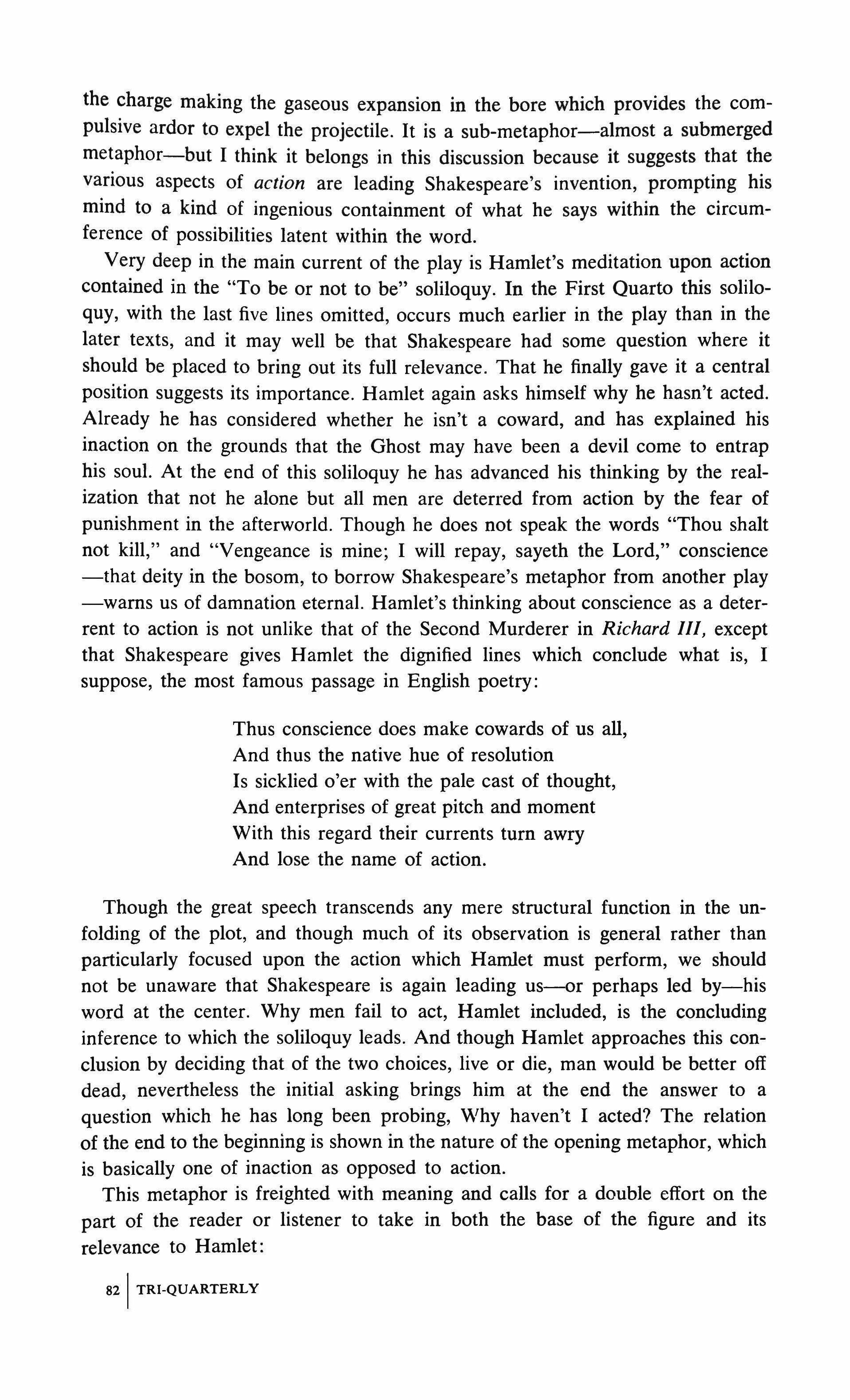
the charge making the gaseous expansion in the bore which provides the compulsive ardor to expel the projectile. It is a sub-metaphor-almost a submerged metaphor-but I think it belongs in this discussion because it suggests that the various aspects of action are leading Shakespeare's invention, prompting his mind to a kind of ingenious containment of what he says within the circumference of possibilities latent within the word.
Very deep in the main current of the play is Hamlet's meditation upon action contained in the "To be or not to be" soliloquy. In the First Quarto this soliloquy, with the last five lines omitted, occurs much earlier in the play than in the later texts, and it may well be that Shakespeare had some question where it should be placed to bring out its full relevance. That he finally gave it a central position suggests its importance. Hamlet again asks himself why he hasn't acted. Already he has considered whether he isn't a coward, and has explained his inaction on the grounds that the Ghost may have been a devil come to entrap his soul. At the end of this soliloquy he has advanced his thinking by the realization that not he alone but all men are deterred from action by the fear of punishment in the afterworld. Though he does not speak the words "Thou shalt not kill," and "Vengeance is mine; I will repay, sayeth the Lord," conscience -that deity in the bosom, to borrow Shakespeare's metaphor from another play -warns us of damnation eternal. Hamlet's thinking about conscience as a deterrent to action is not unlike that of the Second Murderer in Richard III, except that Shakespeare gives Hamlet the dignified lines which conclude what is, I suppose, the most famous passage in English poetry:
Thus conscience does make cowards of us all, And thus the native hue of resolution
Is sicklied o'er with the pale cast of thought,
And enterprises of great pitch and moment With this regard their currents turn awry And lose the name of action.
Though the great speech transcends any mere structural function in the unfolding of the plot, and though much of its observation is general rather than particularly focused upon the action which Hamlet must perform, we should not be unaware that Shakespeare is again leading us--or perhaps led by-his word at the center. Why men fail to act, Hamlet included, is the concluding inference to which the soliloquy leads. And though Hamlet approaches this conclusion by deciding that of the two choices, live or die, man would be better off dead, nevertheless the initial asking brings him at the end the answer to a question which he has long been probing, Why haven't I acted? The relation of the end to the beginning is shown in the nature of the opening metaphor, which is basically one of inaction as opposed to action. This metaphor is freighted with meaning and calls for a double effort on the part of the reader or listener to take in both the base of the figure and its relevance to Hamlet:
TRI-QUARTERLY

To be or not to be. That is the question: Whether 'tis nobler in the mind to suffer
The slings and arrows of outrageous fortune
Or to take arms against a sea of troubles, And by opposing end them.
We are asked to conceive of a castle under siege. The enemy without will attack with those great flights of arrows at defenders on the ramparts or aimed to carry over the walls, and with rocks hurled from huge slings or catapults to breach the walls by dislodging foundation stones. Two strategies are possible to the defenders within: inaction or action. They may sit the siege out or they may sally forth against the opposing force. In castle warfare either strategy might end in defeat but the more dangerous-usually an act of desperation-was to sally out. If the castle was well-provisioned-and castles could be provisioned for from six months to two years-it was safer, though a wretched experience, to sit out the siege waiting for the encamped army to be dissipated by failure of supplies, bad weather, dysentery and other diseases. Shakespeare understood this situation as we see in Macbeth. "Our castle's strength / Will laugh a siege to scorn," declares Macbeth at Dunsinane. "Here let them lie / Till famine and the ague eat them up." But in his valiant fury, despairing because Birnam Wood has come to Dunsinane, he chooses the reckless alternative, "Arm, arm, and out!" It is a gesture of futility, but he prefers to make it: "At least we'll die with harness on our back."
Hamlet too contemplates such wretched alternatives: not necessarily the true alternatives which experience dictates, nor those of happier and more confident men; but inactive frustration or destructive action which he conceives in his state of profound melancholy. He seems to accept without question the implication contained in his metaphor, that action-taking arms-will end his troubles only by destroying him. Such an implication is sustained, if I follow the speech correctly, not only by the parallel constructions of the passage, its transitions, and its sequence of thought, but by the metaphor within the metaphor, "to take arms against a sea of troubles," where taking arms against the sea is a mere gesture of futility. Hamlet does not ask which of the two bad strategies may be more successful-he has already accepted both as hopeless-but which is nobler in the mind (more in accord with the princely character). Action resulting in prompt death would clearly be his preference-unending sleep, a final escape from all the ills of life. That is his "consummation devoutly to be wish'd." But Shakespeare leads him on to contemplate the ultimate eventuality: that death may not terminate but continue his being-and so, the possibility of damnation and perpetual torment.
The deterrent to action is, then, fear of damnation, and with that reflection Hamlet is back to his central problem, that he is called upon by his father's spirit-if the Ghost was his father's spirit-to perform an act which might lead to his own damnation.
Not until after the play scene will he know for certain whether-as he had
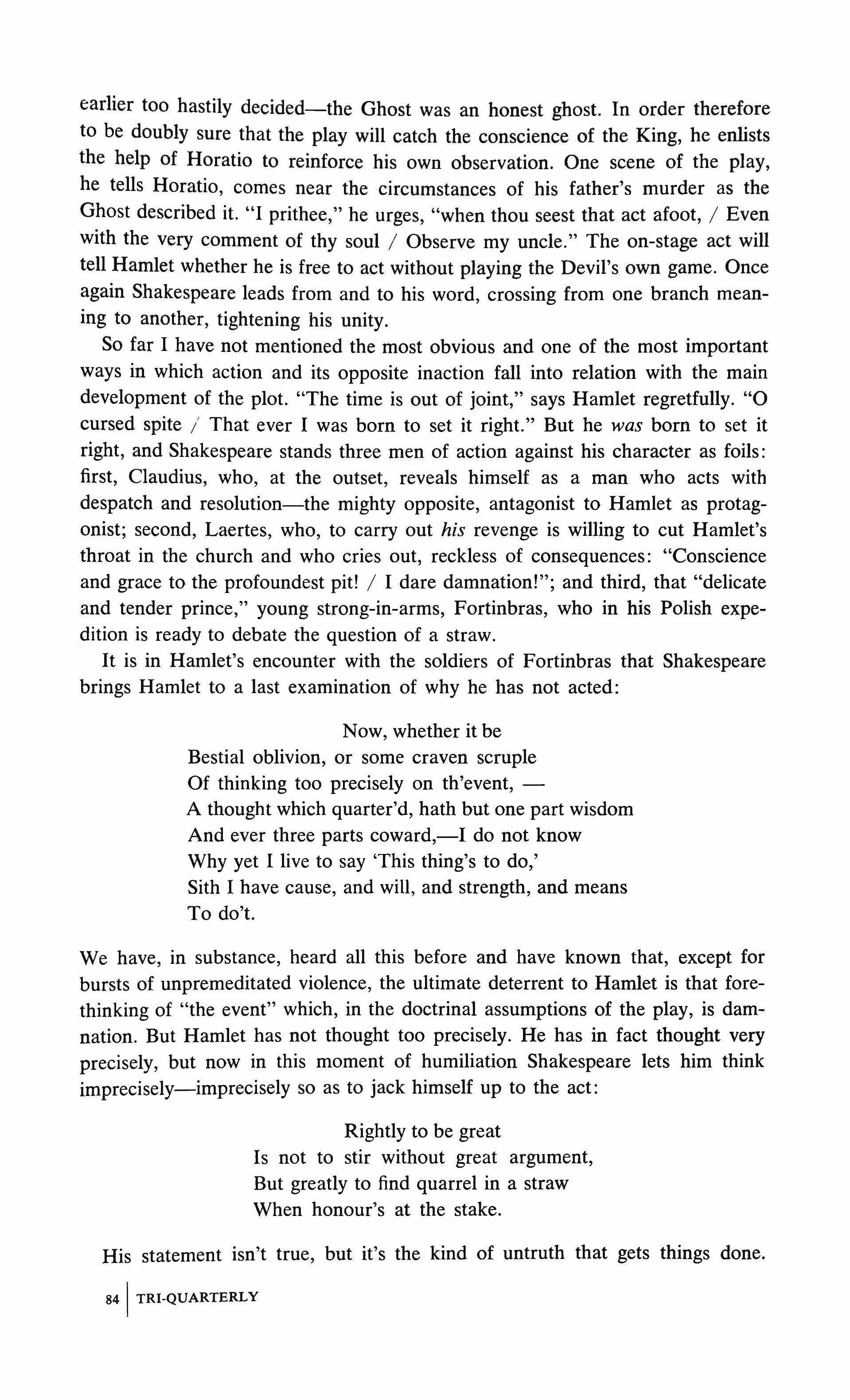
earlier too hastily decided-the Ghost was an honest ghost. In order therefore to be doubly sure that the play will catch the conscience of the King, he enlists the help of Horatio to reinforce his own observation. One scene of the play, he tells Horatio, comes near the circumstances of his father's murder as the Ghost described it. "I prithee," he urges, "when thou seest that act afoot, / Even with the very comment of thy soul/Observe my uncle." The on-stage act will tell Hamlet whether he is free to act without playing the Devil's own game. Once again Shakespeare leads from and to his word, crossing from one branch meaning to another, tightening his unity.
So far I have not mentioned the most obvious and one of the most important ways in which action and its opposite inaction fall into relation with the main development of the plot. "The time is out of joint," says Hamlet regretfully. "0 cursed spite / That ever I was born to set it right." But he was born to set it right, and Shakespeare stands three men of action against his character as foils: first, Claudius, who, at the outset, reveals himself as a man who acts with despatch and resolution-the mighty opposite, antagonist to Hamlet as protagonist; second, Laertes, who, to carry out his revenge is willing to cut Hamlet's throat in the church and who cries out, reckless of consequences: "Conscience and grace to the profoundest pit! / I dare damnation!"; and third, that "delicate and tender prince," young strong-in-arms, Fortinbras, who in his Polish expedition is ready to debate the question of a straw.
It is in Hamlet's encounter with the soldiers of Fortinbras that Shakespeare brings Hamlet to a last examination of why he has not acted:
Now, whether it be
Bestial oblivion, or some craven scruple
Of thinking too precisely on th'event, -
A thought which quarter'd, hath but one part wisdom And ever three parts coward,-I do not know Why yet I live to say 'This thing's to do,' Sith I have cause, and will, and strength, and means To do't.
We have, in substance, heard all this before and have known that, except for bursts of unpremeditated violence, the ultimate deterrent to Hamlet is that forethinking of "the event" which, in the doctrinal assumptions of the play, is damnation. But Hamlet has not thought too precisely. He has in fact thought very precisely, but now in this moment of humiliation Shakespeare lets him think imprecisely-imprecisely so as to jack himself up to the act:
Rightly to be great
Is not to stir without great argument, But greatly to find quarrel in a straw When honour's at the stake.
His statement isn't true, but it's the kind of untruth that gets things done.
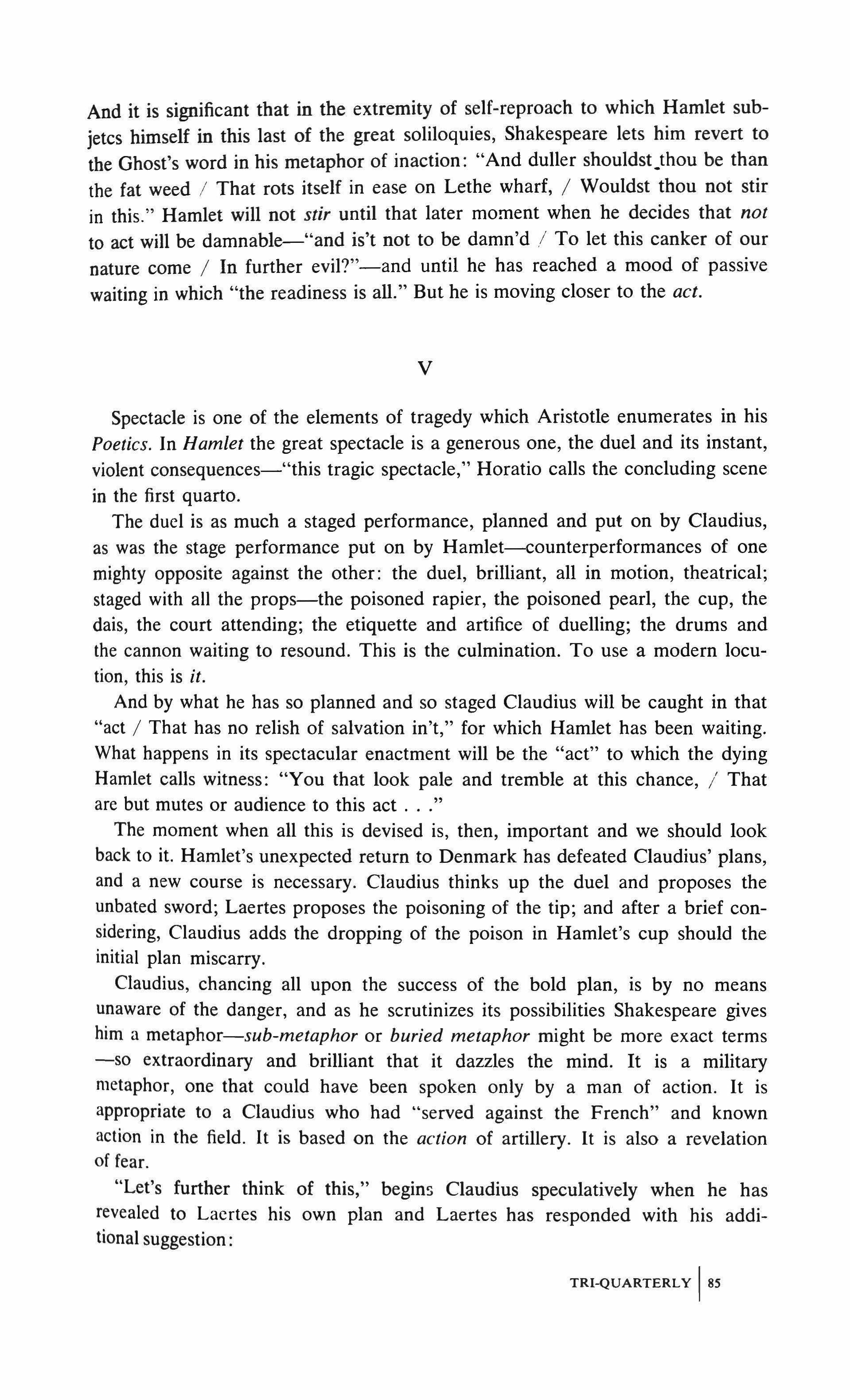
And it is significant that in the extremity of self-reproach to which Hamlet subjetcs himself in this last of the great soliloquies, Shakespeare lets him revert to the Ghost's word in his metaphor of inaction: "And duller shouldstjhou be than the fat weed / That rots itself in ease on Lethe wharf, / Wouldst thou not stir in this." Hamlet will not stir until that later moment when he decides that not to act will be damnable-"and is't not to be damn'd / To let this canker of our nature come / In further evi1?"-and until he has reached a mood of passive waiting in which "the readiness is all." But he is moving closer to the act.
vSpectacle is one of the elements of tragedy which Aristotle enumerates in his Poetics. In Hamlet the great spectacle is a generous one, the duel and its instant, violent consequences-"this tragic spectacle," Horatio calls the concluding scene in the first quarto.
The duel is as much a staged performance, planned and put on by Claudius, as was the stage performance put on by Hamlet=-counterperformances of one mighty opposite against the other: the duel, brilliant, all in motion, theatrical; staged with all the props-the poisoned rapier, the poisoned pearl, the cup, the dais, the court attending; the etiquette and artifice of duelling; the drums and the cannon waiting to resound. This is the culmination. To use a modern locution, this is it.
And by what he has so planned and so staged Claudius will be caught in that "act / That has no relish of salvation in't," for which Hamlet has been waiting. What happens in its spectacular enactment will be the "act" to which the dying Hamlet calls witness: "You that look pale and tremble at this chance, / That are but mutes or audience to this act
The moment when all this is devised is, then, important and we should look back to it. Hamlet's unexpected return to Denmark has defeated Claudius' plans, and a new course is necessary. Claudius thinks up the duel and proposes the unbated sword; Laertes proposes the poisoning of the tip; and after a brief considering, Claudius adds the dropping of the poison in Hamlet's cup should the initial plan miscarry.
Claudius, chancing all upon the success of the bold plan, is by no means unaware of the danger, and as he scrutinizes its possibilities Shakespeare gives him a metaphor-sub-metaphor or buried metaphor might be more exact terms -so extraordinary and brilliant that it dazzles the mind. It is a military metaphor, one that could have been spoken only by a man of action. It is appropriate to a Claudius who had "served against the French" and known action in the field. It is based on the action of artillery. It is also a revelation of fear.
"Let's further think of this," begins Claudius speculatively when he has revealed to Lacrtes his own plan and Laertes has responded with his additional suggestion:
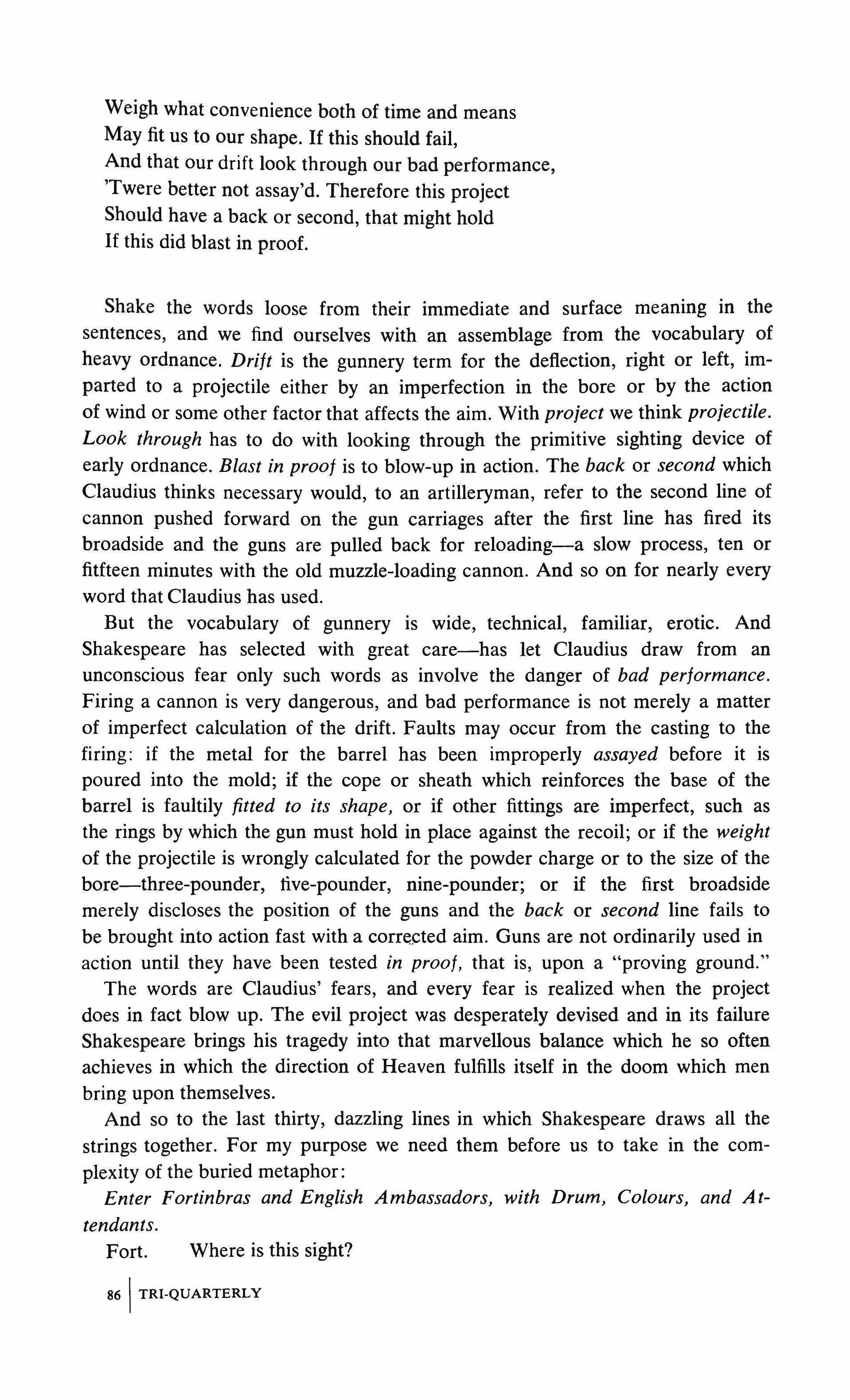
Weigh what convenience both of time and means
May fit us to our shape. If this should fail, And that our drift look through our bad performance, 'Twere better not assay'd. Therefore this project Should have a back or second, that might hold If this did blast in proof.
Shake the words loose from their immediate and surface meaning in the sentences, and we find ourselves with an assemblage from the vocabulary of heavy ordnance. Drift is the gunnery term for the deflection, right or left, imparted to a projectile either by an imperfection in the bore or by the action of wind or some other factor that affects the aim. With project we think projectile. Look through has to do with looking through the primitive sighting device of early ordnance. Blast in proof is to blow-up in action. The back or second which Claudius thinks necessary would, to an artilleryman, refer to the second line of cannon pushed forward on the gun carriages after the first line has fired its broadside and the guns are pulled back for reloading-a slow process, ten or fitfteen minutes with the old muzzle-loading cannon. And so on for nearly every word that Claudius has used.
But the vocabulary of gunnery is wide, technical, familiar, erotic. And Shakespeare has selected with great care-has let Claudius draw from an unconscious fear only such words as involve the danger of bad performance. Firing a cannon is very dangerous, and bad performance is not merely a matter of imperfect calculation of the drift. Faults may occur from the casting to the firing: if the metal for the barrel has been improperly assayed before it is poured into the mold; if the cope or sheath which reinforces the base of the barrel is faultily fitted to its shape, or if other fittings are imperfect, such as the rings by which the gun must hold in place against the recoil; or if the weight of the projectile is wrongly calculated for the powder charge or to the size of the bore-three-pounder, five-pounder, nine-pounder; or if the first broadside merely discloses the position of the guns and the back or second line fails to be brought into action fast with a corrected aim. Guns are not ordinarily used in action until they have been tested in proof, that is, upon a "proving ground."
The words are Claudius' fears, and every fear is realized when the project does in fact blow up. The evil project was desperately devised and in its failure Shakespeare brings his tragedy into that marvellous balance which he so often achieves in which the direction of Heaven fulfills itself in the doom which men bring upon themselves.
And so to the last thirty, dazzling lines in which Shakespeare draws all the strings together. For my purpose we need them before us to take in the complexity of the buried metaphor:
Enter Fortinbras and English Ambassadors, with Drum, Colours, and Attendants.
Fort. Where is this sight?
Hor.
Fort.
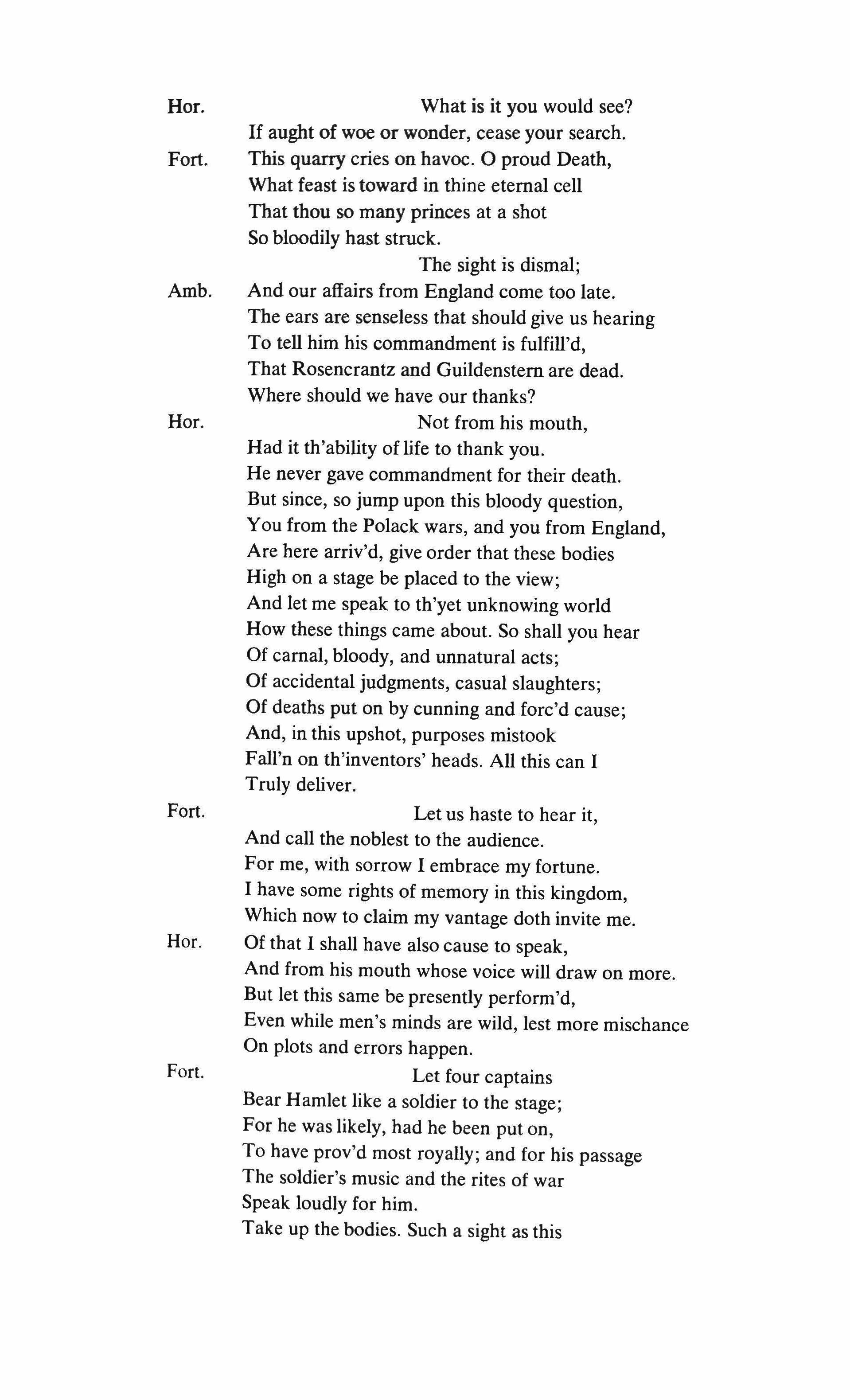
Amb.
What is it you would see?
If aught of woe or wonder, cease your search. This quarry cries on havoc. 0 proud Death, What feast is toward in thine eternal cell
That thou so many princes at a shot So bloodily hast struck.
The sight is dismal; And our affairs from England come too late. The ears are senseless that should give us hearing To tell him his commandment is fulfill'd, That Rosencrantz and Guildenstern are dead.
Where should we have our thanks?
Hor. Not from his mouth, Had it th'ability of life to thank you. He never gave commandment for their death.
But since, so jump upon this bloody question, You from the Polack wars, and you from England, Are here arriv'd, give order that these bodies
High on a stage be placed to the view; And let me speak to th'yet unknowing world How these things came about. So shall you hear Of carnal, bloody, and unnatural acts; Of accidental judgments, casual slaughters; Of deaths put on by cunning and forc'd cause; And, in this upshot, purposes mistook Fall'n on th'inventors' heads. All this can I
Truly deliver.
Fort. Let us haste to hear it, And call the noblest to the audience.
For me, with sorrow I embrace my fortune. I have some rights of memory in this kingdom, Which now to claim my vantage doth invite me.
Hor. Of that I shall have also cause to speak, And from his mouth whose voice will draw on more. But let this same be presently perform'd, Even while men's minds are wild, lest more mischance On plots and errors happen.
Fort. Let four captains
Bear Hamlet like a soldier to the stage; For he was likely, had he been put on, To have prov'd most royally; and for his passage
The soldier's music and the rites of war
Speak loudly for him.
Take up the bodies. Such a sight as this
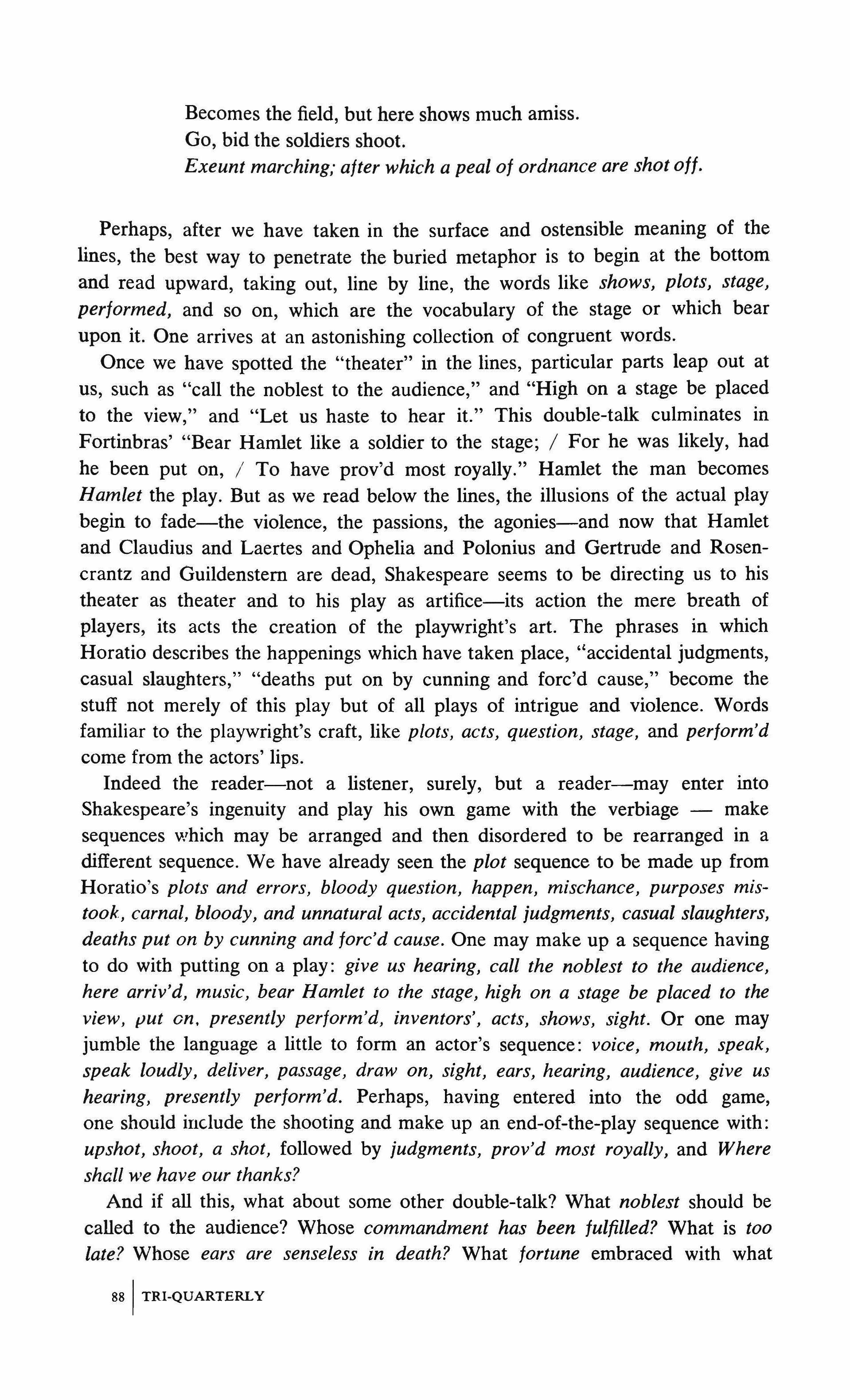
Becomes the field, but here shows much amiss. Go, bid the soldiers shoot.
Exeunt marching; after which a peal of ordnance are shot off.
Perhaps, after we have taken in the surface and ostensible meaning of the lines, the best way to penetrate the buried metaphor is to begin at the bottom and read upward, taking out, line by line, the words like shows, plots, stage, performed, and so on, which are the vocabulary of the stage or which bear upon it. One arrives at an astonishing collection of congruent words.
Once we have spotted the "theater" in the lines, particular parts leap out at us, such as "call the noblest to the audience," and "High on a stage be placed to the view," and "Let us haste to hear it." This double-talk culminates in Fortinbras' "Bear Hamlet like a soldier to the stage; I For he was likely, had he been put on, I To have prov'd most royally." Hamlet the man becomes Hamlet the play. But as we read below the lines, the illusions of the actual play begin to fade-the violence, the passions, the agonies-and now that Hamlet and Claudius and Laertes and Ophelia and Polonius and Gertrude and Rosencrantz and Guildenstem are dead, Shakespeare seems to be directing us to his theater as theater and to his playas artifice-its action the mere breath of players, its acts the creation of the playwright's art. The phrases in which Horatio describes the happenings which have taken place, "accidental judgments, casual slaughters," "deaths put on by cunning and forc'd cause," become the stuff not merely of this play but of all plays of intrigue and violence. Words familiar to the playwright's craft, like plots, acts, question, stage, and perjorm'd come from the actors' lips.
Indeed the reader-not a listener, surely, but a reader-may enter into Shakespeare's ingenuity and play his own game with the verbiage - make sequences which may be arranged and then disordered to be rearranged in a different sequence. We have already seen the plot sequence to be made up from Horatio's plots and errors, bloody question, happen, mischance, purposes mistook, carnal, bloody, and unnatural acts, accidental judgments, casual slaughters, deaths put on by cunning and [orc'd cause. One may make up a sequence having to do with putting on a play: give us hearing, call the noblest to the audience, here arriv'd, music, bear Hamlet to the stage, high on a stage be placed to the view, put on. presently perjorm'd, inventors', acts, shows, sight. Or one may jumble the language a little to form an actor's sequence: voice, mouth, speak, speak loudly, deliver, passage, draw on, sight, ears, hearing, audience, give us hearing, presently perjorm'd. Perhaps, having entered into the odd game, one should include the shooting and make up an end-of-the-play sequence with: upshot, shoot, a shot, followed by judgments, prov'd most royally, and Where shall we have our thanks?
And if all this, what about some other double-talk? What noblest should be called to the audience? Whose commandment has been fulfilled? What is too late? Whose ears are senseless in death? What fortune embraced with what
sorrow? What rights of memory in what kingdom? Inferences of court and person and patron are beguiling. And at the least, this one: that we can surely think Shakespeare's own kingdom, the stage, into Fortinbras' "I have some rights of memory in this kingdom / Which now to claim my vantage doth invite me."
The long play has ended. The act of creation is complete. Shakespeare knows that it is good. On the stage, Hamlet will indeed prove most royally; and to a yet unknowing world Shakespeare--amused, delighted, unburdened, free-says so in a piece of virtuosity unparallelled.
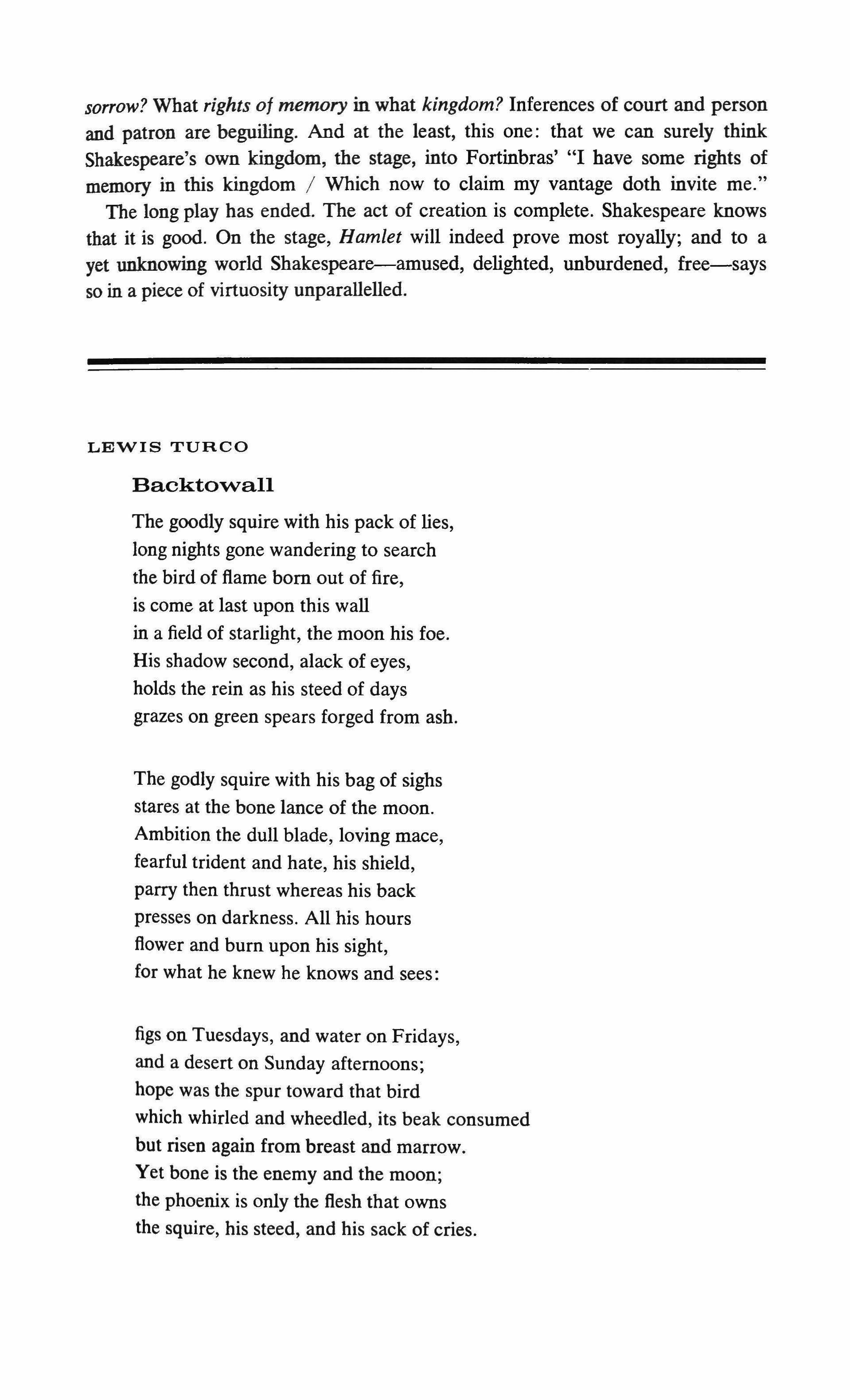 LEWIS TURCO
LEWIS TURCO
Backtowall
The goodly squire with his pack of lies, long nights gone wandering to search the bird of flame born out of fire, is come at last upon this wall in a field of starlight, the moon his foe. His shadow second, alack of eyes, holds the rein as his steed of days grazes on green spears forged from ash.
The godly squire with his bag of sighs stares at the bone lance of the moon. Ambition the dull blade, loving mace, fearful trident and hate, his shield, parry then thrust whereas his back presses on darkness. All his hours flower and burn upon his sight, for what he knew he knows and sees:
figs on Tuesdays, and water on Fridays, and a desert on Sunday afternoons; hope was the spur toward that bird which whirled and wheedled, its beak consumed but risen again from breast and marrow. Yet bone is the enemy and the moon; the phoenix is only the flesh that owns the squire, his steed, and his sack of cries.
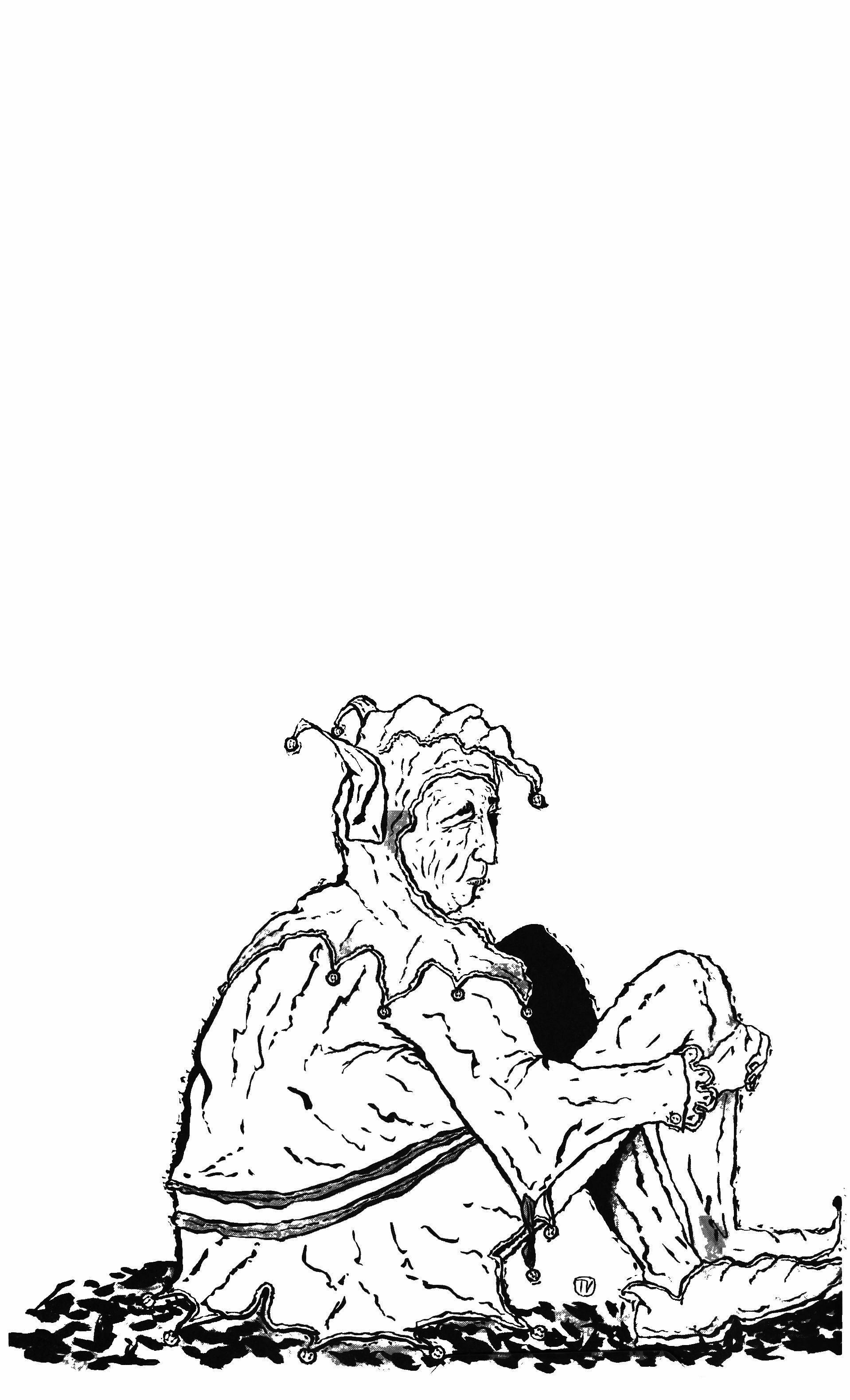
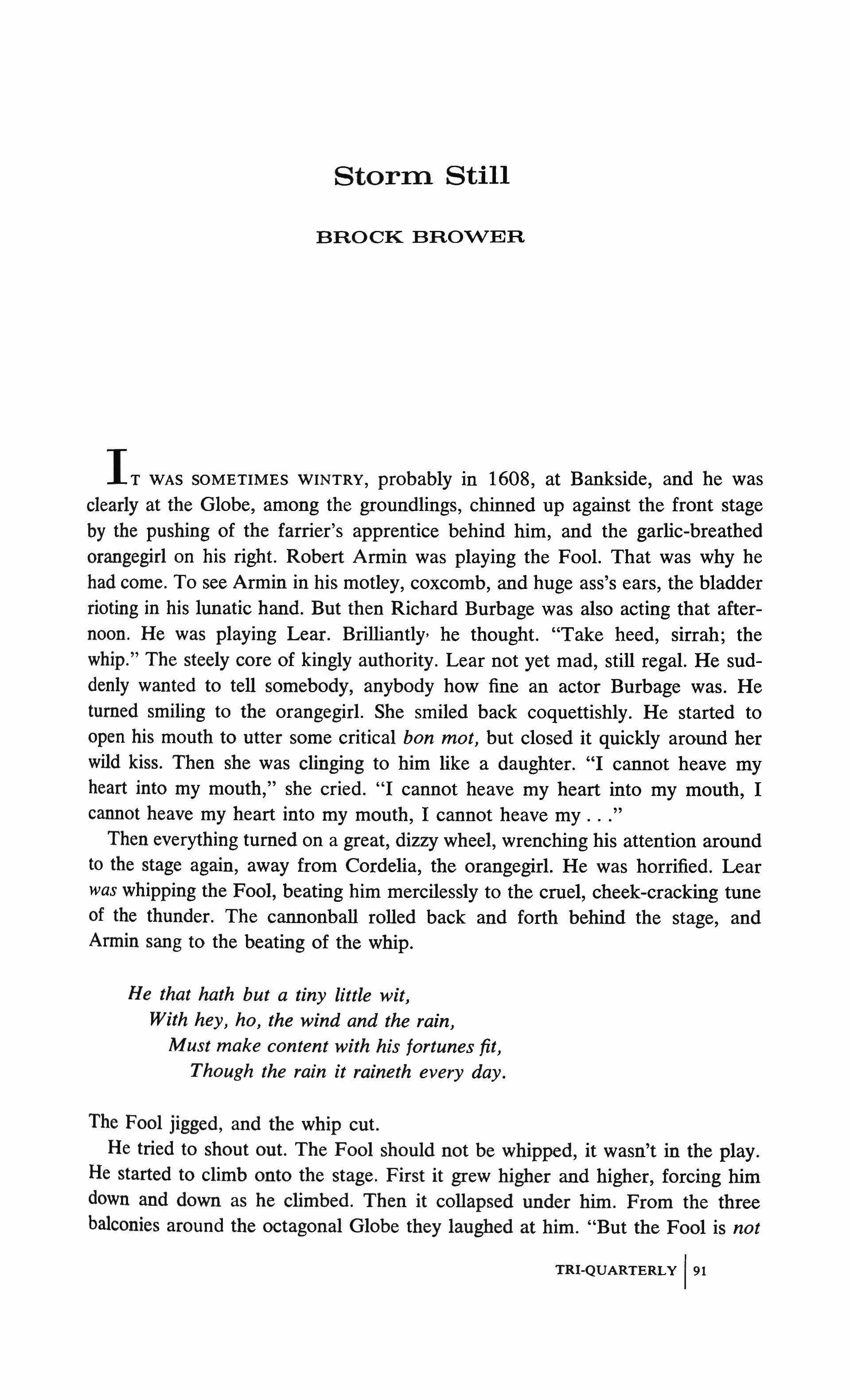
IT WAS SOMETIMES WINTRY, probably in 1608, at Bankside, and he was clearly at the Globe, among the groundlings, chinned up against the front stage by the pushing of the farrier's apprentice behind him, and the garlic-breathed orangegirl on his right. Robert Armin was playing the Fool. That was why he had come. To see Armin in his motley, coxcomb, and huge ass's ears, the bladder rioting in his lunatic hand. But then Richard Burbage was also acting that afternoon. He was playing Lear. Brilliantly. he thought. "Take heed, sirrah; the whip." The steely core of kingly authority. Lear not yet mad, still regal. He suddenly wanted to tell somebody, anybody how fine an actor Burbage was. He turned smiling to the orangegirl. She smiled back coquettishly. He started to open his mouth to utter some critical bon mot, but closed it quickly around her wild kiss. Then she was clinging to him like a daughter. "I cannot heave my heart into my mouth," she cried. "I cannot heave my heart into my mouth, I cannot heave my heart into my mouth, I cannot heave my
Then everything turned on a great, dizzy wheel, wrenching his attention around to the stage again, away from Cordelia, the orangegirl. He was horrified. Lear was whipping the Fool, beating him mercilessly to the cruel, cheek-cracking tune of the thunder. The cannonball rolled back and forth behind the stage, and Armin sang to the beating of the whip.
He that hath but a tiny little wit, With hey, ho, the wind and the rain, Must make content with his fortunes fit, Though the rain it rainetb every day.
The Fool jigged, and the whip cut.
He tried to shout out. The Fool should not be whipped, it wasn't in the play. He started to climb onto the stage. First it grew higher and higher, forcing him down and down as he climbed. Then it collapsed under him. From the three balconies around the octagonal Globe they laughed at him. "But the Fool is not TRI-QUARTERLY 191

whipped," he shouted at them, almost defensively. "Lear must never do such a thing. Never, never, never, never, never." Then they began to disappear, laughing, behind the rising flames. He saw why the stage had collapsed. It was on fire. The great Globe itself was on fire, burning like a wooden bucket. But that was wrong too. The Globe fire was in 1613. "Stop, stop!" he cried at the flames. "You're too early. Don't burn. Don't whip the Fool. Don't burn. Don't whip the Fool." Then he woke up.
Immediately he felt his old fumbling sense of panic. He'd slipped again in some matter of the play. There was a reference he carelessly hadn't checked all the way back-some date or alternate reading he must look up this very instant, or they were going to catch him out. He knew it was something terribly minor. Some question about the colophon on the Pide Bull Quarto, or a line he'd wrongly attributed to the source play Leir or to Holinshed, or even some stupid quibble over the spelling of Cordelia's name. Really that picayune. It didn't affect his main argument in the slightest. But they would crucify him for it, put his whole scholarship in doubt at next spring's meeting, if he didn't find it now and burn it out like a tiny plague spot in his critical acumen.
He knew all this was nonsense, yet he still began shuffling furtively through the papers on his desk to see if he hadn't possibly made a note somewhere, perhaps in the margins of his Spenser. It was one of those involuntary things that had finally become quite voluntary. He needed something to clear his mind when he napped off, and this seemed to do the trick. One of these days, he suspected, he was going to nap off altogether. His mind would simply fail to clear. Last scene of all that ends this strange, eventful history. Second childishness and mere oblivion. But somehow that would be all right too, because, look, he was only here picking over his papers after an insignificant reference. There was nothing really important to get back to
But he was awake enough now to hear the knock. It was hard to tell whether he was hearing it now, actually at the door, or whether memory was echoing it for him. Such distinctions were becoming difficult for him to make at times. Or just not worth making.
"Yes?" he asked peevishly. He wondered if he wheezed at all. Manly voice, turning to childish treble.
His study door opened part way, and a bearded face cocked around at him, its smile still back in the door's shadow. "Busy?"
This was young Nelson's way of asking permission to come in out of the shadows. For a moment he mused on just leaving him there in the shadows. Forever. Perhaps he would eventually fade into the umbra, pulling his bearded smile in after him, and become a complete shadow, instead of the furtive, diffident half shadow he already was. But oh what silliness, he warned himself, and said pleasantly, "No, no, no. Come in, Nelson. Please."
The young instructor bowed out of the doorway, bringing in a towering pile of corrected blue books. On top of them was the marking book, stretched open to the proper page with a rubber band. Nelson seemed to come bearing them almost like a hecatomb, yet at the same time he managed somehow to be putting
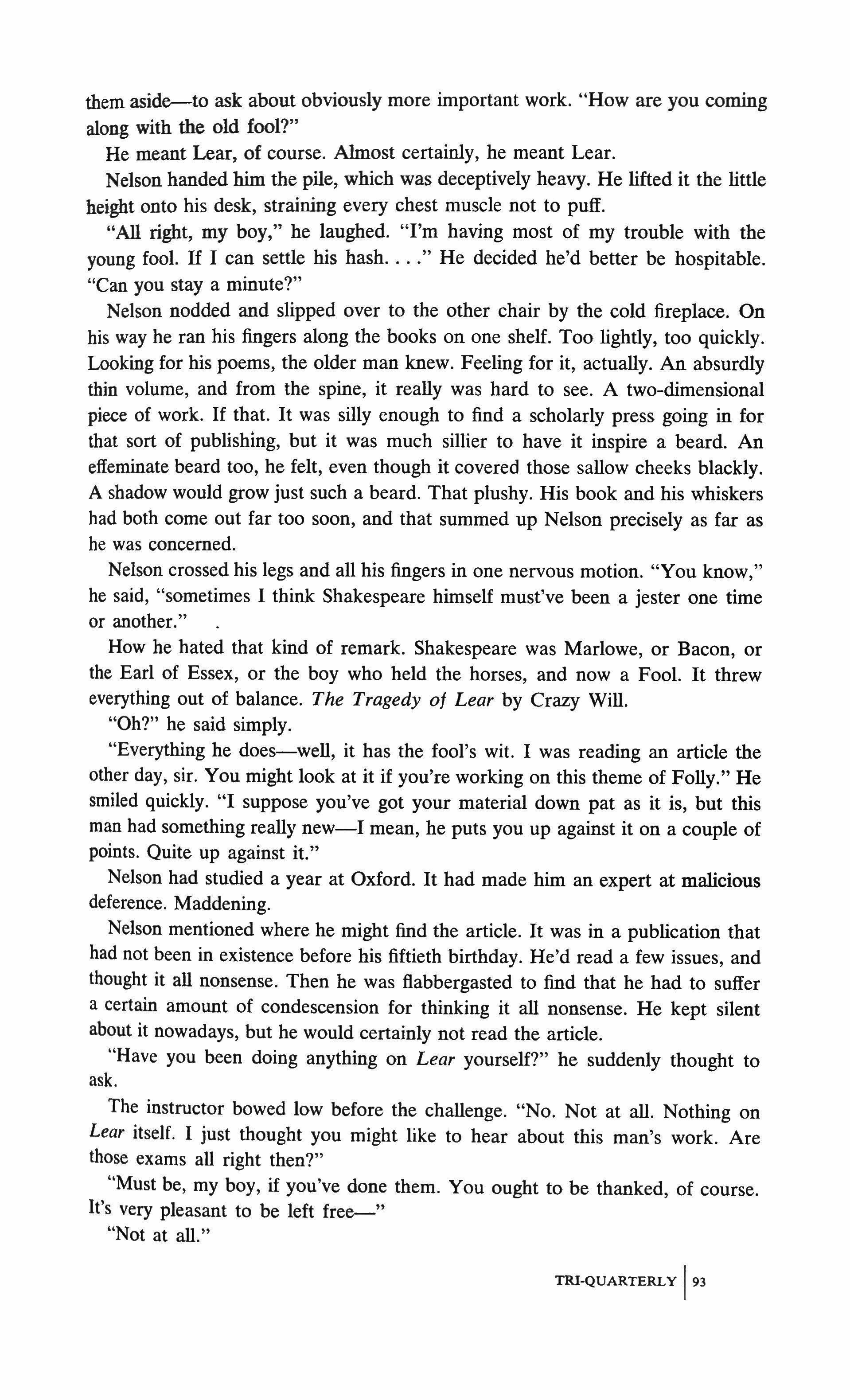
them aside--to ask about obviously more important work. "How are you coming along with the old fool?"
He meant Lear, of course. Almost certainly, he meant Lear.
Nelson handed him the pile, which was deceptively heavy. He lifted it the little height onto his desk, straining every chest muscle not to puff.
"All right, my boy," he laughed. "I'm having most of my trouble with the young fool. If I can settle his hash He decided he'd better be hospitable. "Can you stay a minute?"
Nelson nodded and slipped over to the other chair by the cold fireplace. On his way he ran his fingers along the books on one shelf. Too lightly, too quickly. Looking for his poems, the older man knew. Feeling for it, actually. An absurdly thin volume, and from the spine, it really was hard to see. A two-dimensional piece of work. If that. It was silly enough to find a scholarly press going in for that sort of publishing, but it was much sillier to have it inspire a beard. An effeminate beard too, he felt, even though it covered those sallow cheeks blackly. A shadow would grow just such a beard. That plushy. His book and his whiskers had both come out far too soon, and that summed up Nelson precisely as far as he was concerned.
Nelson crossed his legs and all his fingers in one nervous motion. "You know," he said, "sometimes I think Shakespeare himself must've been a jester one time or another."
How he hated that kind of remark. Shakespeare was Marlowe, or Bacon, or the Earl of Essex, or the boy who held the horses, and now a Fool. It threw everything out of balance. The Tragedy of Lear by Crazy Will.
"Oh?" he said simply.
"Everything he does-well, it has the fool's wit. I was reading an article the other day, sir. You might look at it if you're working on this theme of Folly." He smiled quickly. "I suppose you've got your material down pat as it is, but this man had something really new-I mean, he puts you up against it on a couple of points. Quite up against it."
Nelson had studied a year at Oxford. It had made him an expert at malicious deference. Maddening.
Nelson mentioned where he might find the article. It was in a publication that had not been in existence before his fiftieth birthday. He'd read a few issues, and thought it all nonsense. Then he was flabbergasted to find that he had to suffer a certain amount of condescension for thinking it all nonsense. He kept silent about it nowadays, but he would certainly not read the article.
"Have you been doing anything on Lear yourself?" he suddenly thought to ask.
The instructor bowed low before the challenge. "No. Not at all. Nothing on Lear itself. I just thought you might like to hear about this man's work. Are those exams all right then?"
"Must be, my boy, if you've done them. You ought to be thanked, of course. It's very pleasant to be left free--"
"Not at all."
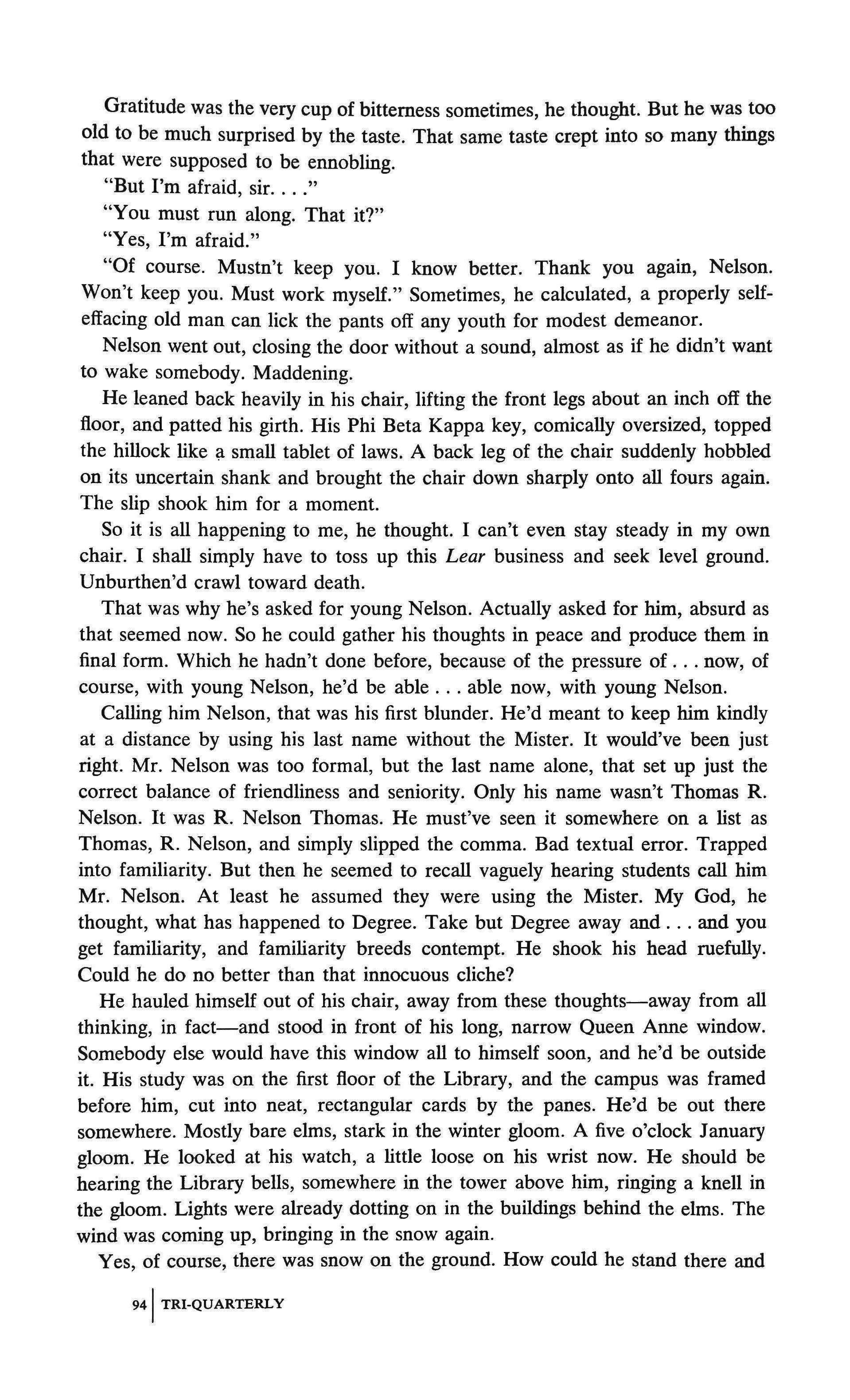
Gratitude was the very cup of bitterness sometimes, he thought. But he was too old to be much surprised by the taste. That same taste crept into so many things that were supposed to be ennobling.
"But I'm afraid, sir
"You must run along. That it?"
"Yes, I'm afraid."
"Of course. Mustn't keep you. I know better. Thank you again, Nelson. Won't keep you. Must work myself." Sometimes, he calculated, a properly selfeffacing old man can lick the pants off any youth for modest demeanor.
Nelson went out, closing the door without a sound, almost as if he didn't want to wake somebody. Maddening.
He leaned back heavily in his chair, lifting the front legs about an inch off the floor, and patted his girth. His Phi Beta Kappa key, comically oversized, topped the hillock like a small tablet of laws. A back leg of the chair suddenly hobbled on its uncertain shank and brought the chair down sharply onto all fours again. The slip shook him for a moment.
So it is all happening to me, he thought. I can't even stay steady in my own chair. I shall simply have to toss up this Lear business and seek level ground. Unburthen'd crawl toward death.
That was why he's asked for young Nelson. Actually asked for him, absurd as that seemed now. So he could gather his thoughts in peace and produce them in final form. Which he hadn't done before, because of the pressure of now, of course, with young Nelson, he'd be able able now, with young Nelson.
Calling him Nelson, that was his first blunder. He'd meant to keep him kindly at a distance by using his last name without the Mister. It would've been just right. Mr. Nelson was too formal, but the last name alone, that set up just the correct balance of friendliness and seniority. Only his name wasn't Thomas R. Nelson. It was R. Nelson Thomas. He must've seen it somewhere on a list as Thomas, R. Nelson, and simply slipped the comma. Bad textual error. Trapped into familiarity. But then he seemed to recall vaguely hearing students call him Mr. Nelson. At least he assumed they were using the Mister. My God, he thought, what has happened to Degree. Take but Degree away and and you get familiarity, and familiarity breeds contempt. He shook his head ruefully. Could he do no better than that innocuous cliche?
He hauled himself out of his chair, away from these thoughts-away from all thinking, in fact-and stood in front of his long, narrow Queen Anne window. Somebody else would have this window all to himself soon, and he'd be outside it. His study was on the first floor of the Library, and the campus was framed before him, cut into neat, rectangular cards by the panes. He'd be out there somewhere. Mostly bare elms, stark in the winter gloom. A five o'clock January gloom. He looked at his watch, a little loose on his wrist now. He should be hearing the Library bells, somewhere in the tower above him, ringing a knell in the gloom. Lights were already dotting on in the buildings behind the elms. The wind was coming up, bringing in the snow again.
Yes, of course, there was snow on the ground. How could he stand there and 941 TRI-QUARTERLY

not think of the snow first thing? The white, even stretch of winter over the earth. Fresh and flocculent yesterday. Old and icy today. The hoary, arthritic, fallen snow. A crust.
Tom's a-cold, he mused. Prithee, Nuncle, be contented; 'tis a naughty night to swim in.
Then he noticed somebody running across the campus towards him, struggling hopelessly with the deep, crusted snow that broke under him at every step. Tom's a-cold, he mused again, looking out at the battling figure. Tom's adrift.
Quite suddenly, he felt himself adrift. His eyes watered and wanted to blink, only ever so slowly. He fought to keep his attention on the figure struggling in the snow, and a sensation of steepness, all about him, grew until he felt he was once again climbing onto the stage in the burning Globe to rescue the Fool. Don't whip the Fool. The whip cut, and the Fool jigged, raising the powdery underdown of snow about him like a rich mist.
He had come nearer the window now. He leaped and pirouetted and somersaulted, playing with the snow as if it were a partner. Bells jingled. He ran to an elm tree, even nearer the window, and passionately kicked it. Immediately he was remorseful and threw his arms around the tree. A long kiss on the icy bark. Then he kicked it and laughed. The bells on his cap trembled. He looked about him inquisitively and discovered the window.
He rushed towards it and pressed his nose moistly against a pane of glass, bordered in frost. His face cocked and bobbed on his nose like the ticking moon in an ancient clock. He grinned and brayed through the glass. He shook his bells, and banged the head of the marotte that he carried against the window. And then his own head. The bells rang. The five o'clock knell rolled through the gloom.
Soberly the old man shook himself, and a certain richness of sensation deserted him. He did blink finally and reassured himself that there was no nose mark on the window pane. Outside, only the gloom. It was the first time in his life he had dozed off still on his feet. Mortifying. He forced himself back to his desk. Work.
I suppose that's really what old age is, he thought. Getting fuzzy about whether you're awake or asleep. When is Lear mad, and when is he sane? He wants to sing like a bird in a cage when he and Cordelia go off to prison. That's mad as much as it is sane. On the heath he wants the storm to strike flat the thick rotundity of the world. That's sane as much as it is mad. What's the difference?
He took the trouble to jot these ideas down in a creaky scrawl, and stuffed the paper in the corner of his blotter. After supper, he'd come back and reread them. He hadn't yet kept his promise to himself to work after supper, but tonight he would.
But already he knew what he really thought of his jottings. If he'd found them in a freshman paper, he'd have put an encouraging remark in the margin, something like, "An interesting approach, but don't rest on it. Sh. certainly intended L.'s madness and sanity to have a distinction. Same with Ham. What is it?" And in a senior thesis, he'd expect a carefully argued answer.
TRI-QUARTERLy 195
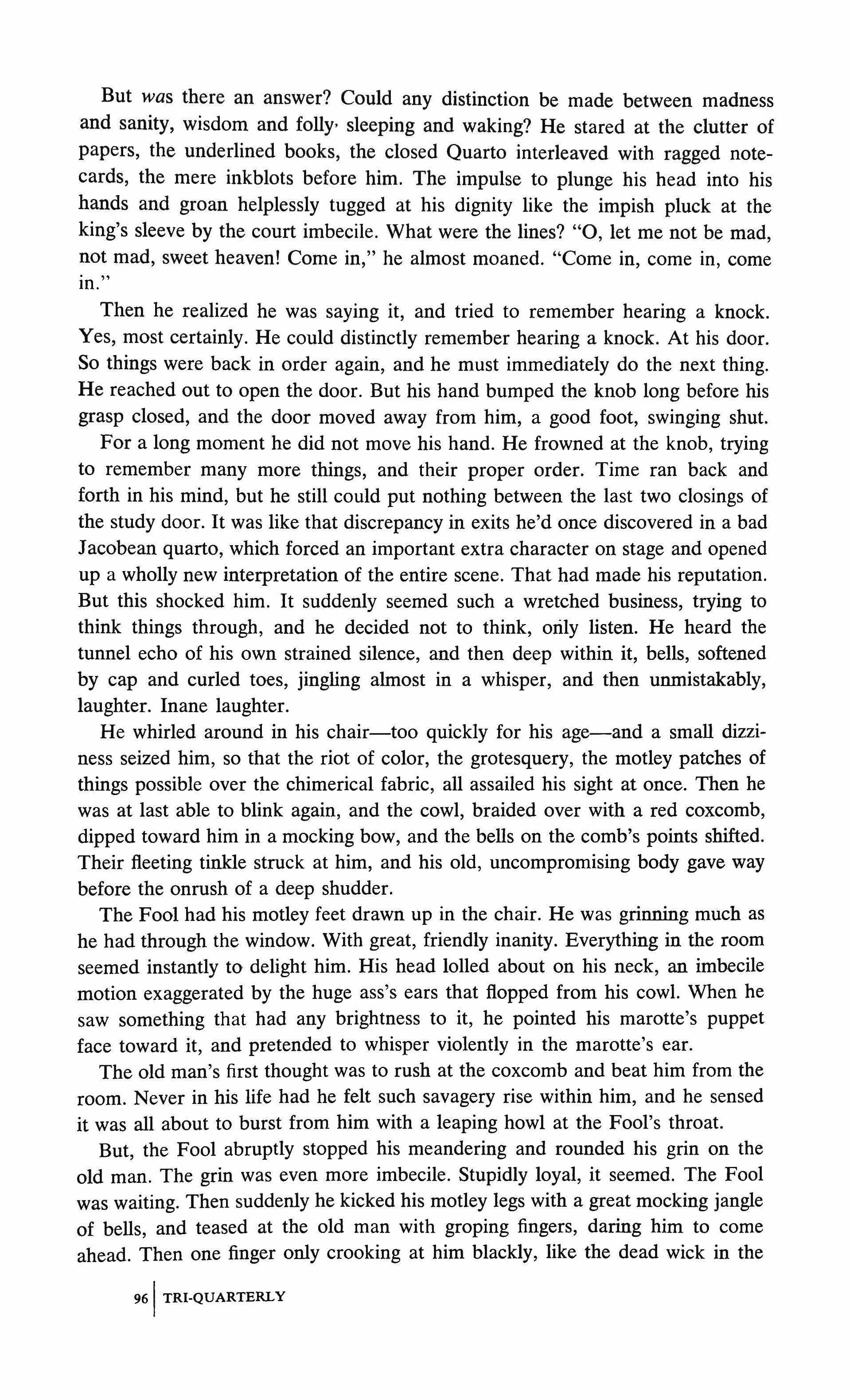
But was there an answer? Could any distinction be made between madness and sanity, wisdom and folly' sleeping and waking? He stared at the clutter of papers, the underlined books, the closed Quarto interleaved with ragged notecards, the mere inkblots before him. The impulse to plunge his head into his hands and groan helplessly tugged at his dignity like the impish pluck at the king's sleeve by the court imbecile. What were the lines? "0, let me not be mad, not mad, sweet heaven! Come in," he almost moaned. "Come in, come in, come in."
Then he realized he was saying it, and tried to remember hearing a knock. Yes, most certainly. He could distinctly remember hearing a knock. At his door. So things were back in order again, and he must immediately do the next thing. He reached out to open the door. But his hand bumped the knob long before his grasp closed, and the door moved away from him, a good foot, swinging shut.
For a long moment he did not move his hand. He frowned at the knob, trying to remember many more things, and their proper order. Time ran back and forth in his mind, but he still could put nothing between the last two closings of the study door. It was like that discrepancy in exits he'd once discovered in a bad Jacobean quarto, which forced an important extra character on stage and opened up a wholly new interpretation of the entire scene. That had made his reputation. But this shocked him. It suddenly seemed such a wretched business, trying to think things through, and he decided not to think, orily listen. He heard the tunnel echo of his own strained silence, and then deep within it, bells, softened by cap and curled toes, jingling almost in a whisper, and then unmistakably, laughter. Inane laughter.
He whirled around in his chair-too quickly for his age-and a small dizziness seized him, so that the riot of color, the grotesquery, the motley patches of things possible over the chimerical fabric, all assailed his sight at once. Then he was at last able to blink again, and the cowl, braided over with a red coxcomb, dipped toward him in a mocking bow, and the bells on the comb's points shifted. Their fleeting tinkle struck at him, and his old, uncompromising body gave way before the onrush of a deep shudder.
The Fool had his motley feet drawn up in the chair. He was grinning much as he had through the window. With great, friendly inanity. Everything in the room seemed instantly to delight him. His head lolled about on his neck, an imbecile motion exaggerated by the huge ass's ears that flopped from his cowl. When he saw something that had any brightness to it, he pointed his marotte's puppet face toward it, and pretended to whisper violently in the marotte's ear.
The old man's first thought was to rush at the coxcomb and beat him from the room. Never in his life had he felt such savagery rise within him, and he sensed it was all about to burst from him with a leaping howl at the Fool's throat.
But, the Fool abruptly stopped his meandering and rounded his grin on the old man. The grin was even more imbecile. Stupidly loyal, it seemed. The Fool was waiting. Then suddenly he kicked his motley legs with a great mocking jangle of bells, and teased at the old man with groping fingers, daring him to come ahead. Then one finger only crooking at him blackly, like the dead wick in the
TRI-QUARTERLY

lamp of reason.
It would kill me. He saw that one fact, and then began to catch hold altogether. Oblivion was smirking at him through a Fool's grin, but he was not going to let loose from the holds of logic and age and certainty. Not yet.
His first thought-his first self-possessed thought-was whether anybody had heard or seen anything. Whether anybody anywhere in the world had heard or seen anything. That he had very nearly attacked the Fool-admitted him-filled him with terror. Thoughts carried. Even the silence of the mind was suspicious.
Deliberately he turned back to his desk. He picked up the Pide Bull Quarto and set painfully to work on the storm scene. He courted his powers of concentration, and counted upon them to shut out any other presence that might be -that was how he must think of it, might be-near him. Gradually they did. The rollings of the bells and the little chuckles merged with the rising storm outside, and together, close to either side of his window, they passed away, out of his ken.
He ate his supper in the upper hall of the undergraduate Commons. He frequently did this for the sake of a change from his quiet widower's meal, served up uneventfully by the bad-tempered housekeeper who had outlived his wife's patience with her. But tonight he wanted something else from the dining hall. Something almost tribal.
He listened gratefully to the tumult of undergraduate cutlery. The meal was eaten out of various triangular, oblong, and serpentine depressions in uniform aluminum trays, collected from a cafeteria line, and the din reminded him of nothing so much as the Roman legionaries going into battle, beating their shields. On top of this, there was the babble of a least two hundred youths, all talking at once, none of them yet sure how his voice should really sound. Bedlam, Jericho. Or a thousand twangling instruments.
It all had a strangely reassuring effect upon him. The noise and liveliness argued against the Fool. When he got back to work, there would only be frost at his window. In a few days he might be able to talk confidently about hallucination, or tricks of the dozing eye, the dream-fondled ear. He tidied his wrinkled mouth with a napkin, took advantage of his age to leave the tray on the table rather than face the confusing actions of the dishwasher's chute, and left the Commons, mantled in an overcoat.
The walk back to his study followed shoveled canyons through the old snow. Within the last hour, they had begun to fill up again with a new undergrowth of flakes. A good way to put it, he thought. It stings your face like nettles, it clings to your clothes like burrs, so why shouldn't it be considered some kind of uncontrollable, prickly weed? The false logic of it pleased him. It kept him warm during the rest of the cold, devious walk, barriered him against the increasing
TlU-QUARTERLy 197

storm that whipped at him devilishly. No matter which way he bent his head, it seemed to strike him on his unprotected side.
He reached the Library. Inside, he stamped his boots in the dark corridormanaged to kick one off, but had to stoop over for the other. He walked briskly down the corridor, congratulating himself on his desire to work after supper. Even if it might be false desire. He unlocked his study door and pushed it open, but it moved too lightly ahead of him, and he caught enough glimpse of haste in the Fool to know he'd just skipped back to the fireplace chair in time.
Disappointed, he told himself. Not surprised. Not afraid. Just disappointed. He sat down at his desk with his back again to the other chair. He would have to do a little work, make a little progress before he could safely tum around. He did not know where the feeling came from, but he was certain that to work well was his only hope against the Fool's inane grin, his seductive, will-o-the-wisp bells. The stir of the outside world-the noisy community of the dining hallhe realized now were useless.
He decided to give up the Pide Bull Quarto for the evening, in fact, to turn away from Lear itself altogether and read The Tragecall historie of Kinge Leir and his Three Daughters. Over the years he'd read the source play in patches, little snippets for his lectures, but he'd never sat down to read the whole play through for itself. He suspected it would be dull, wretchedly jangling, and stupid. In only a few pages he was convinced he was right. But he refused to give in to boredom, to let his mind slip out of its set task. The Fool was seated too near him for that.
The verse trotted along like an old dray. He had to stop reading line by line, and rushed ahead for the sense alone. The play dragged on preposterously. Leir was arrogant, lachrymose, and stupid. Truly stupid.
His patience began to wear. He tried to stifle his irritation, but it grew into a repressed anger. Finally, he yielded to a loss of temper he could hardly understand himself, and flung the book down on his desk. The old fool, he snapped to himself. Yes, precisely. The old fool, because there is no fool worse than Lear without his Fool. And that was Leir.
Suddenly he had the feeling of tottering on the verge of some immeasurably deep but opulent unknown. It was like that quibble that always touched the unsettled edge of his waking, only he felt he was much nearer the instance this time, that it was important after all. Terribly important. They were right to catch him up on it. It was a reference he needed to make. Properly. He had to refer back and just as he seemed to have it, something frightened him away from the very thought, and his tottering was all nonsense again.
Behind him, the Fool tittered, and in a rage the old man turned on him. Through the waves of his vision, so tired now, he saw the Fool had taken up a new attitude.
He was sitting straight up in the chair, studiously attending upon a large book in his lap. He was turning the pages as fast as he could with the dexterity of one finger, and keeping time to the flipping of the pages by bobbing his cowled head up and down like a mechanical sage. Yes. Certainly. Quite. True.
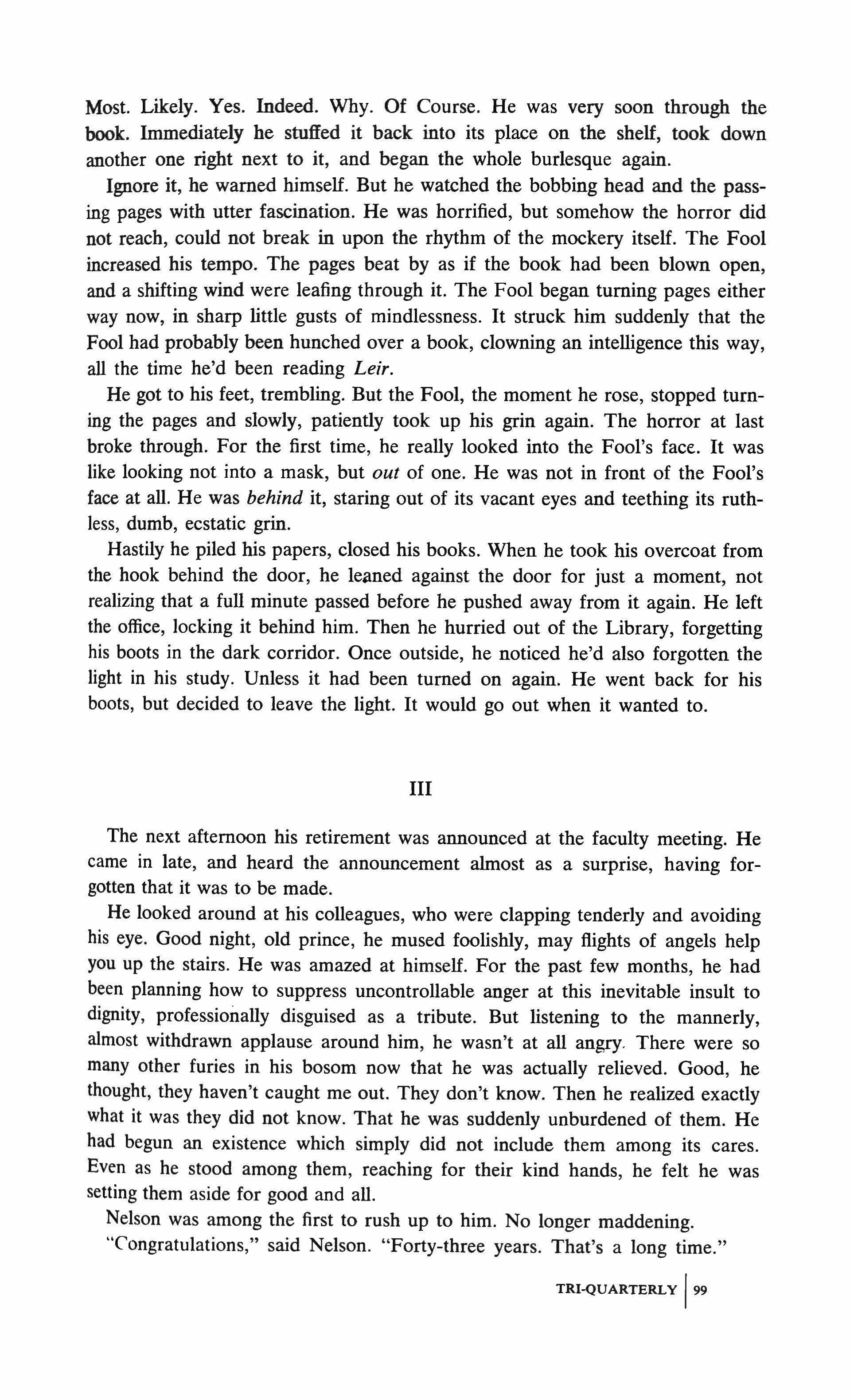
Most. Likely. Yes. Indeed. Why. Of Course. He was very soon through the book. Immediately he stuffed it back into its place on the shelf, took down another one right next to it, and began the whole burlesque again.
Ignore it, he warned himself. But he watched the bobbing head and the passing pages with utter fascination. He was horrified, but somehow the horror did not reach, could not break in upon the rhythm of the mockery itself. The Fool increased his tempo. The pages beat by as if the book had been blown open, and a shifting wind were leafing through it. The Fool began turning pages either way now, in sharp little gusts of mindlessness. It struck him suddenly that the Fool had probably been hunched over a book, clowning an intelligence this way, all the time he'd been reading Leir.
He got to his feet, trembling. But the Fool, the moment he rose, stopped turning the pages and slowly, patiently took up his grin again. The horror at last broke through. For the first time, he really looked into the Fool's face.. It was like looking not into a mask, but out of one. He was not in front of the Fool's face at all. He was behind it, staring out of its vacant eyes and teething its ruthless, dumb, ecstatic grin.
Hastily he piled his papers, closed his books. When he took his overcoat from the hook behind the door, he leaned against the door for just a moment, not realizing that a full minute passed before he pushed away from it again. He left the office, locking it behind him. Then he hurried out of the Library, forgetting his boots in the dark corridor. Once outside, he noticed he'd also forgotten the light in his study. Unless it had been turned on again. He went back for his boots, but decided to leave the light. It would go out when it wanted to.
The next afternoon his retirement was announced at the faculty meeting. He came in late, and heard the announcement almost as a surprise, having forgotten that it was to be made.
He looked around at his colleagues, who were clapping tenderly and avoiding his eye. Good night, old prince, he mused foolishly, may flights of angels help you up the stairs. He was amazed at himself. For the past few months, he had been planning how to suppress uncontrollable anger at this inevitable insult to dignity, professionally disguised as a tribute. But listening to the mannerly, almost withdrawn applause around him, he wasn't at all angry. There were so many other furies in his bosom now that he was actually relieved. Good, he thought, they haven't caught me out. They don't know. Then he realized exactly what it was they did not know. That he was suddenly unburdened of them. He had begun an existence which simply did not include them among its cares. Even as he stood among them, reaching for their kind hands, he felt he was setting them aside for good and all.
Nelson was among the first to rush up to him. No longer maddening. "Congratulations," said Nelson. "Forty-three years. That's a long time."
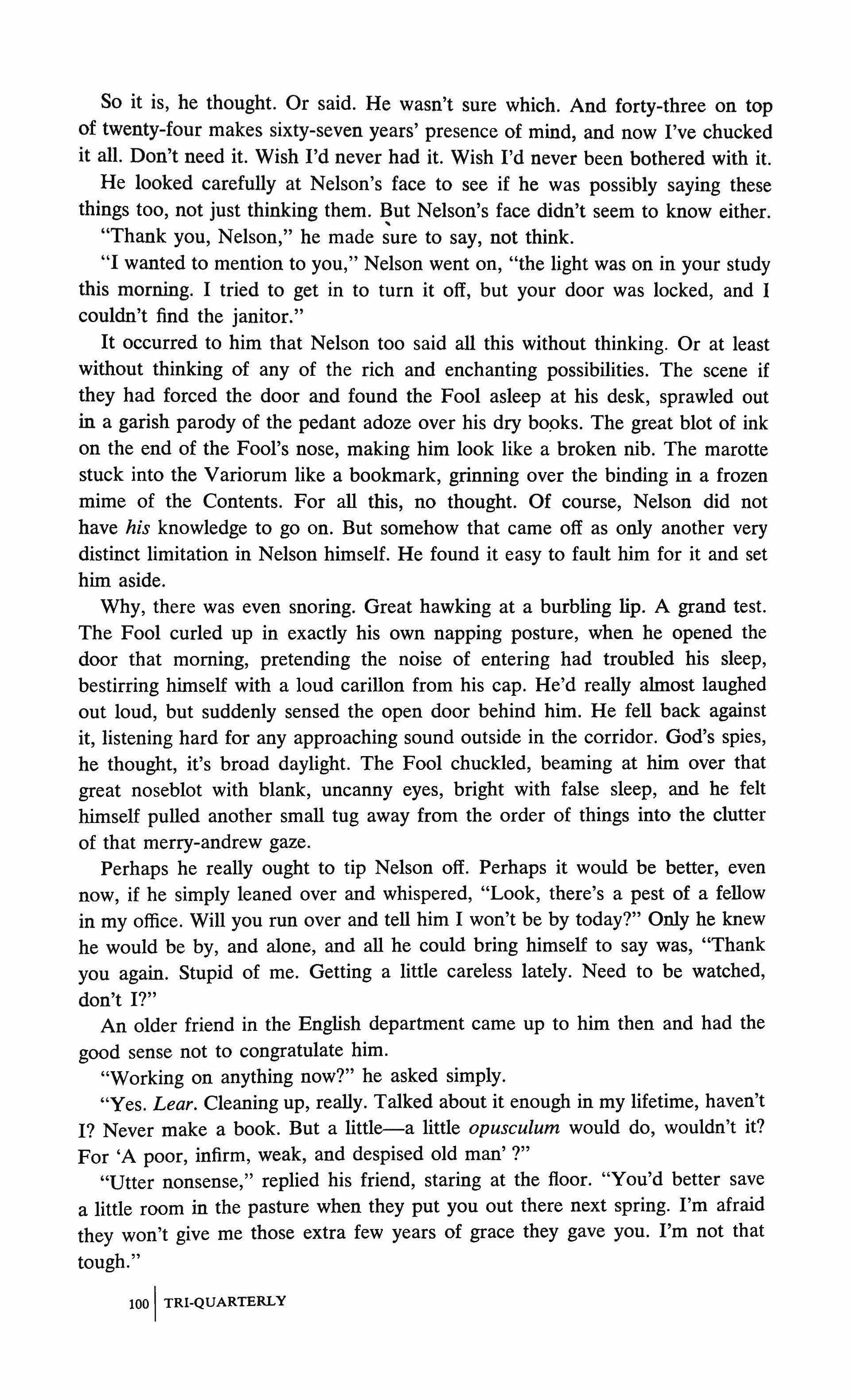
So it is, he thought. Or said. He wasn't sure which. And forty-three on top of twenty-four makes sixty-seven years' presence of mind, and now I've chucked it all. Don't need it. Wish I'd never had it. Wish I'd never been bothered with it. He looked carefully at Nelson's face to see if he was possibly saying these things too, not just thinking them. But Nelson's face didn't seem to know either.
"Thank you, Nelson," he made sure to say, not think.
"I wanted to mention to you," Nelson went on, "the light was on in your study this morning. I tried to get in to turn it off, but your door was locked, and I couldn't find the janitor."
It occurred to him that Nelson too said all this without thinking. Or at least without thinking of any of the rich and enchanting possibilities. The scene if they had forced the door and found the Fool asleep at his desk, sprawled out in a garish parody of the pedant adoze over his dry books, The great blot of ink on the end of the Fool's nose, making him look like a broken nib. The marotte stuck into the Variorum like a bookmark, grinning over the binding in a frozen mime of the Contents. For all this, no thought. Of course, Nelson did not have his knowledge to go on. But somehow that came off as only another very distinct limitation in Nelson himself. He found it easy to fault him for it and set him aside.
Why, there was even snoring. Great hawking at a burbling lip. A grand test. The Fool curled up in exactly his own napping posture, when he opened the door that morning, pretending the noise of entering had troubled his sleep, bestirring himself with a loud carillon from his cap. He'd really almost laughed out loud, but suddenly sensed the open door behind him. He fell back against it, listening hard for any approaching sound outside in the corridor. God's spies, he thought, it's broad daylight. The Fool chuckled, beaming at him over that great noseblot with blank, uncanny eyes, bright with false sleep, and he felt himself pulled another small tug away from the order of things into the clutter of that merry-andrew gaze.
Perhaps he really ought to tip Nelson off. Perhaps it would be better, even now, if he simply leaned over and whispered, "Look, there's a pest of a fellow in my office. Will you run over and tell him I won't be by today?" Only he knew he would be by, and alone, and all he could bring himself to say was, "Thank you again. Stupid of me. Getting a little careless lately. Need to be watched, don't I?"
An older friend in the English department came up to him then and had the good sense not to congratulate him.
"Working on anything now?" he asked simply.
"Yes. Lear. Cleaning up, really. Talked about it enough in my lifetime, haven't I? Never make a book. But a little-a little opusculum would do, wouldn't it? For 'A poor, infirm, weak, and despised old man' ?"
"Utter nonsense," replied his friend, staring at the floor. "You'd better save a little room in the pasture when they put you out there next spring. I'm afraid they won't give me those extra few years of grace they gave you. I'm not that tough."
100 I TRI-QUARTERLY
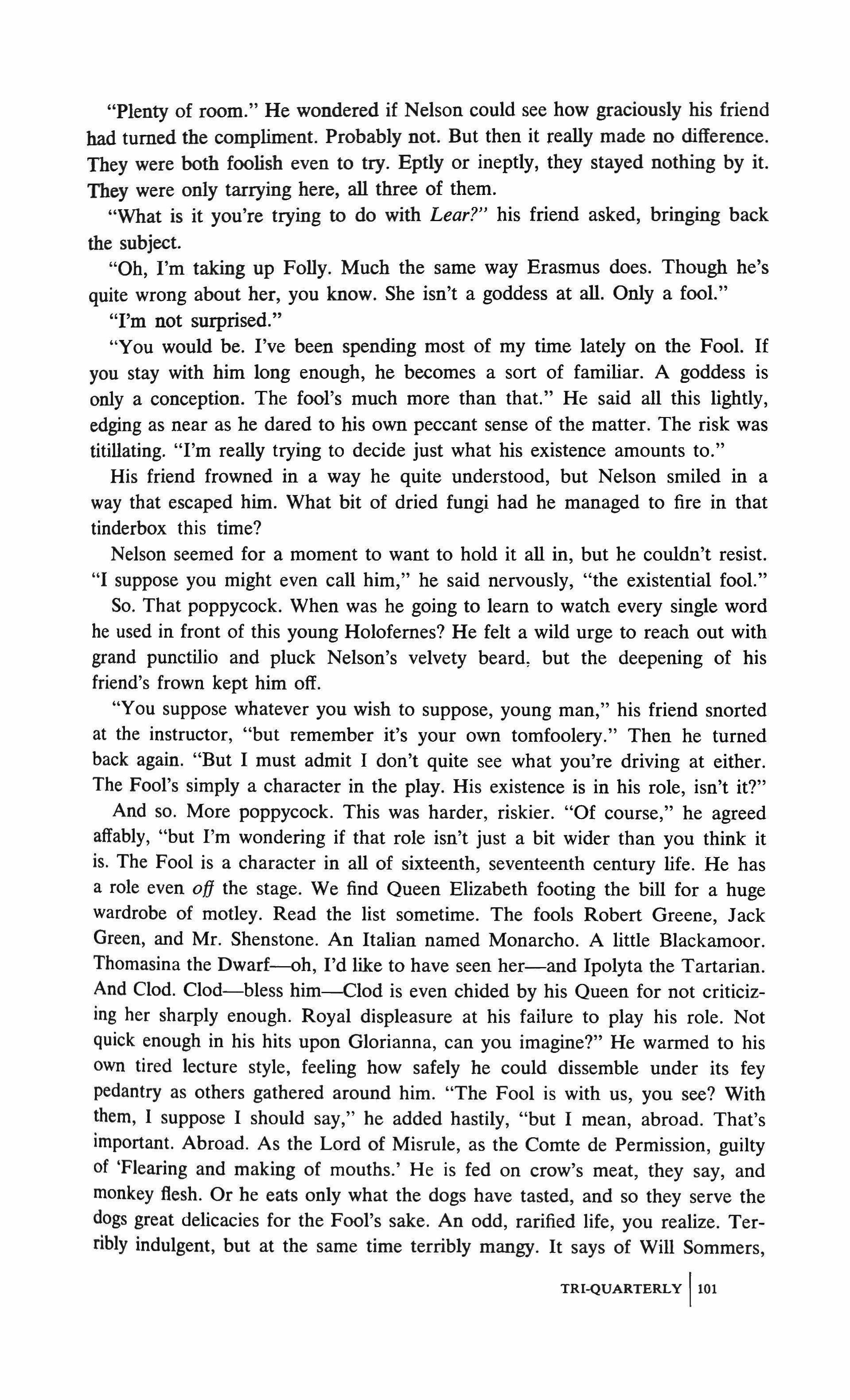
"Plenty of room." He wondered if Nelson could see how graciously his friend bad turned the compliment. Probably not. But then it really made no difference. They were both foolish even to try. Eptly or ineptly, they stayed nothing by it. They were only tarrying here, all three of them.
"What is it you're trying to do with Lear?" his friend asked, bringing back the subject.
"Oh, I'm taking up Folly. Much the same way Erasmus does. Though he's quite wrong about her, you know. She isn't a goddess at all. Only a fool."
"I'm not surprised."
"You would be. I've been spending most of my time lately on the Fool. If you stay with him long enough, he becomes a sort of familiar. A goddess is only a conception. The fool's much more than that." He said all this lightly, edging as near as he dared to his own peccant sense of the matter. The risk was titillating. "I'm really trying to decide just what his existence amounts to."
His friend frowned in a way he quite understood, but Nelson smiled in a way that escaped him. What bit of dried fungi had he managed to fire in that tinderbox this time?
Nelson seemed for a moment to want to hold it all in, but he couldn't resist. "I suppose you might even call him," he said nervously, "the existential fool."
So. That poppycock. When was he going to learn to watch every single word he used in front of this young Holofernes? He felt a wild urge to reach out with grand punctilio and pluck Nelson's velvety beard, but the deepening of his friend's frown kept him off.
"You suppose whatever you wish to suppose, young man," his friend snorted at the instructor, "but remember it's your own tomfoolery." Then he turned back again. "But I must admit I don't quite see what you're driving at either. The Fool's simply a character in the play. His existence is in his role, isn't it?"
And so. More poppycock. This was harder, riskier. "Of course," he agreed affably, "but I'm wondering if that role isn't just a bit wider than you think it is. The Fool is a character in all of sixteenth, seventeenth century life. He has a role even off the stage. We find Queen Elizabeth footing the bill for a huge wardrobe of motley. Read the list sometime. The fools Robert Greene, Jack Green, and Mr. Shenstone. An Italian named Monarcho. A little Blackamoor. Thomasina the Dwarf--oh, I'd like to have seen her-and Ipolyta the Tartarian. And Clod. Clod-bless him---Clod is even chided by his Queen for not criticizing her sharply enough. Royal displeasure at his failure to play his role. Not quick enough in his hits upon Glorianna, can you imagine?" He warmed to his own tired lecture style, feeling how safely he could dissemble under its fey pedantry as others gathered around him. "The Fool is with us, you see? With them, I suppose I should say," he added hastily, "but I mean, abroad. That's important. Abroad. As the Lord of Misrule, as the Comte de Permission, guilty of 'Flearing and making of mouths.' He is fed on crow's meat, they say, and monkey flesh. Or he eats only what the dogs have tasted, and so they serve the dogs great delicacies for the Fool's sake. An odd, rarified life, you realize. Terribly indulgent, but at the same time terribly mangy. It says of Will Sommers, TRI-QUARTERLy 1101
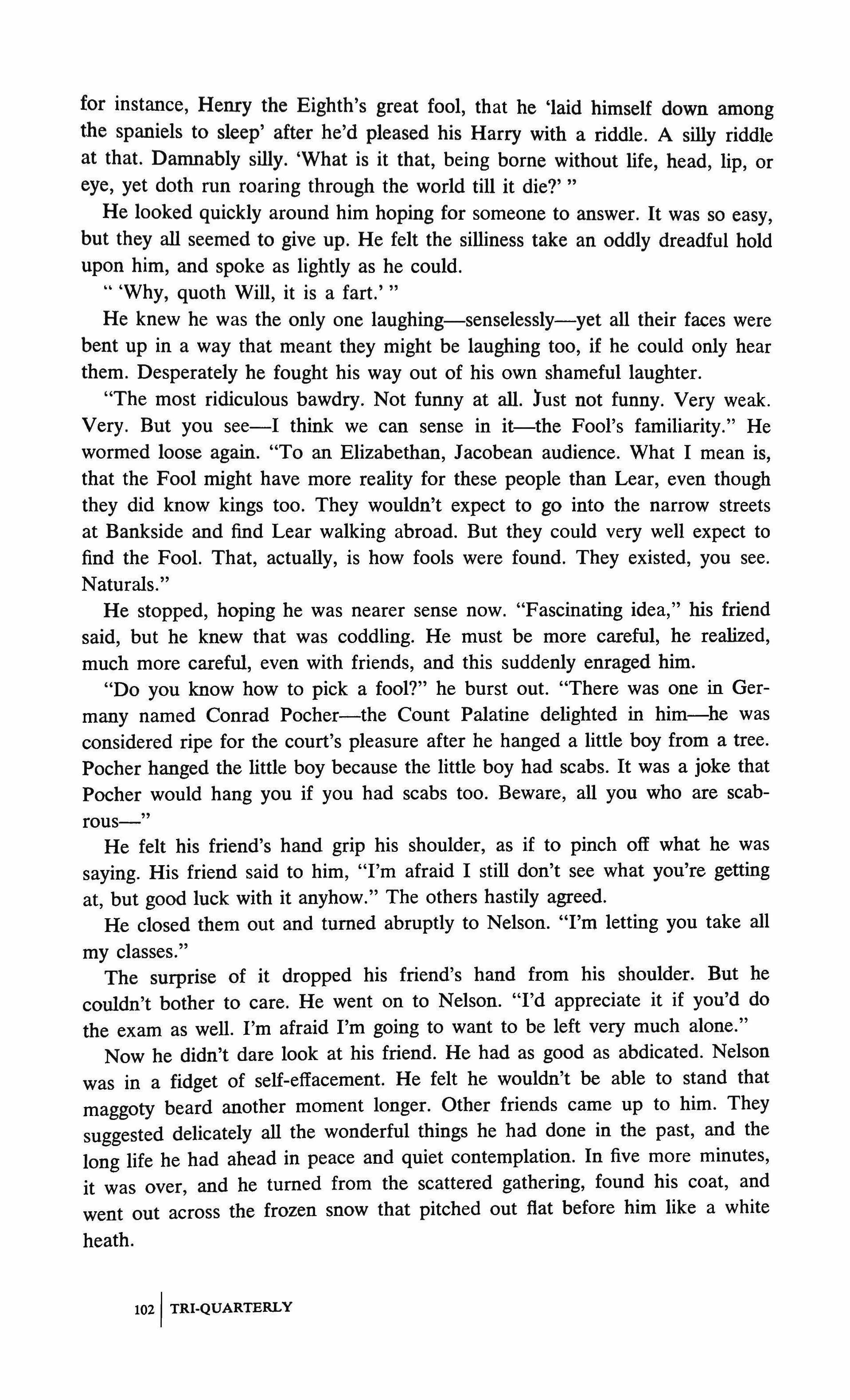
for instance, Henry the Eighth's great fool, that he 'laid himself down among the spaniels to sleep' after he'd pleased his Harry with a riddle. A silly riddle at that. Damnably silly. 'What is it that, being borne without life, head, lip, or eye, yet doth run roaring through the world till it die?'
He looked quickly around him hoping for someone to answer. It was so easy, but they all seemed to give up. He felt the silliness take an oddly dreadful hold upon him, and spoke as lightly as he could 'Why, quoth Will, it is a fart.'
He knew he was the only one laughing-senselessly-yet all their faces were bent up in a way that meant they might be laughing too, if he could only hear them. Desperately he fought his way out of his own shameful laughter.
"The most ridiculous bawdry. Not funny at all. Just not funny. Very weak. Very. But you see-I think we can sense in it-the Fool's familiarity." He wormed loose again. "To an Elizabethan, Jacobean audience. What I mean is, that the Fool might have more reality for these people than Lear, even though they did know kings too. They wouldn't expect to go into the narrow streets at Bankside and find Lear walking abroad. But they could very well expect to find the Fool. That, actually, is how fools were found. They existed, you see. Naturals.
He stopped, hoping he was nearer sense now. "Fascinating idea," his friend said, but he knew that was coddling. He must be more careful, he realized, much more careful, even with friends, and this suddenly enraged him.
"Do you know how to pick a fool?" he burst out. "There was one in Germany named Conrad Pocher-the Count Palatine delighted in him-he was considered ripe for the court's pleasure after he hanged a little boy from a tree. Pocher hanged the little boy because the little boy had scabs. It was a joke that Pocher would hang you if you had scabs too. Beware, all you who are scabrous-"
He felt his friend's hand grip his shoulder, as if to pinch off what he was saying. His friend said to him, "I'm afraid I still don't see what you're getting at, but good luck with it anyhow." The others hastily agreed.
He closed them out and turned abruptly to Nelson. "I'm letting you take all my classes."
The surprise of it dropped his friend's hand from his shoulder. But he couldn't bother to care. He went on to Nelson. "I'd appreciate it if you'd do the exam as well. I'm afraid I'm going to want to be left very much alone."
Now he didn't dare look at his friend. He had as good as abdicated. Nelson was in a fidget of self-effacement. He felt he wouldn't be able to stand that maggoty beard another moment longer. Other friends came up to him. They suggested delicately all the wonderful things he had done in the past, and the long life he had ahead in peace and quiet contemplation. In five more minutes, it was over, and he turned from the scattered gathering, found his coat, and went out across the frozen snow that pitched out flat before him like a white heath.
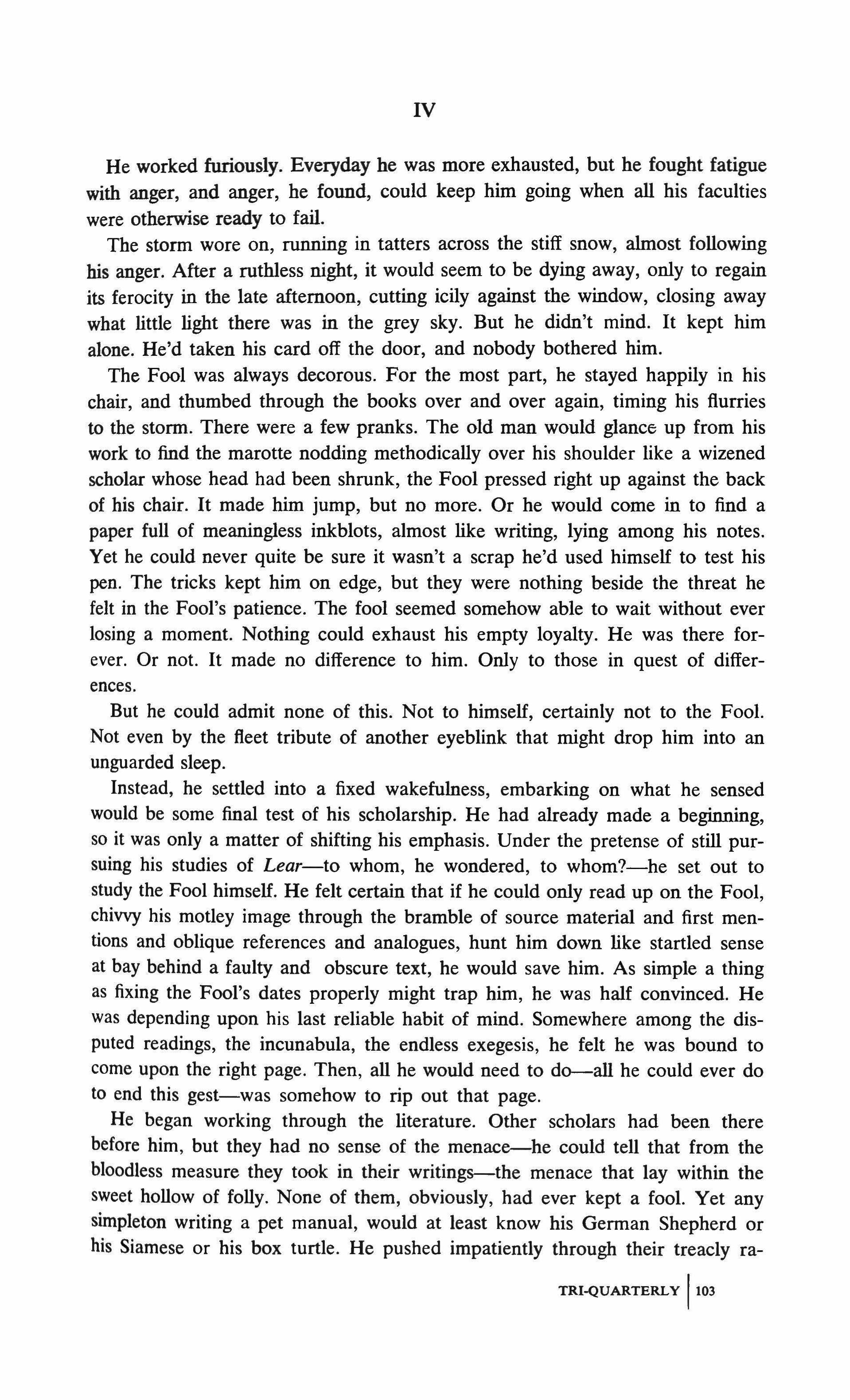
He worked furiously. Everyday he was more exhausted, but he fought fatigue with anger, and anger, he found, could keep him going when all his faculties were otherwise ready to fail.
The storm wore on, running in tatters across the stiff snow, almost following his anger. After a ruthless night, it would seem to be dying away, only to regain its ferocity in the late afternoon, cutting icily against the window, closing away what little light there was in the grey sky. But he didn't mind. It kept him alone. He'd taken his card off the door, and nobody bothered him.
The Fool was always decorous. For the most part, he stayed happily in his chair, and thumbed through the books over and over again, timing his flurries to the storm. There were a few pranks. The old man would glance up from his work to find the marotte nodding methodically over his shoulder like a wizened scholar whose head had been shrunk, the Fool pressed right up against the back of his chair. It made him jump, but no more. Or he would come in to find a paper full of meaningless inkblots, almost like writing, lying among his notes. Yet he could never quite be sure it wasn't a scrap he'd used himself to test his pen. The tricks kept him on edge, but they were nothing beside the threat he felt in the Fool's patience. The fool seemed somehow able to wait without ever losing a moment. Nothing could exhaust his empty loyalty. He was there forever. Or not. It made no difference to him. Only to those in quest of differences.
But he could admit none of this. Not to himself, certainly not to the Fool. Not even by the fleet tribute of another eyeblink that might drop him into an unguarded sleep.
Instead, he settled into a fixed wakefulness, embarking on what he sensed would be some final test of his scholarship. He had already made a beginning, so it was only a matter of shifting his emphasis. Under the pretense of still pursuing his studies of Lear-to whom, he wondered, to whom?-he set out to study the Fool himself. He felt certain that if he could only read up on the Fool, chivvy his motley image through the bramble of source material and first mentions and oblique references and analogues, hunt him down like startled sense at bay behind a faulty and obscure text, he would save him. As simple a thing as fixing the Fool's dates properly might trap him, he was half convinced. He was depending upon his last reliable habit of mind. Somewhere among the disputed readings, the incunabula, the endless exegesis, he felt he was bound to come upon the right page. Then, all he would need to do--all he could ever do to end this gest-was somehow to rip out that page. He began working through the literature. Other scholars had been there before him, but they had no sense of the menace-he could tell that from the bloodless measure they took in their writings-the menace that lay within the sweet hollow of folly. None of them, obviously, had ever kept a fool. Yet any simpleton writing a pet manual, would at least know his German Shepherd or his Siamese or his box turtle. He pushed impatiently through their treacly ra-
TRI-QUARTERLy 1103
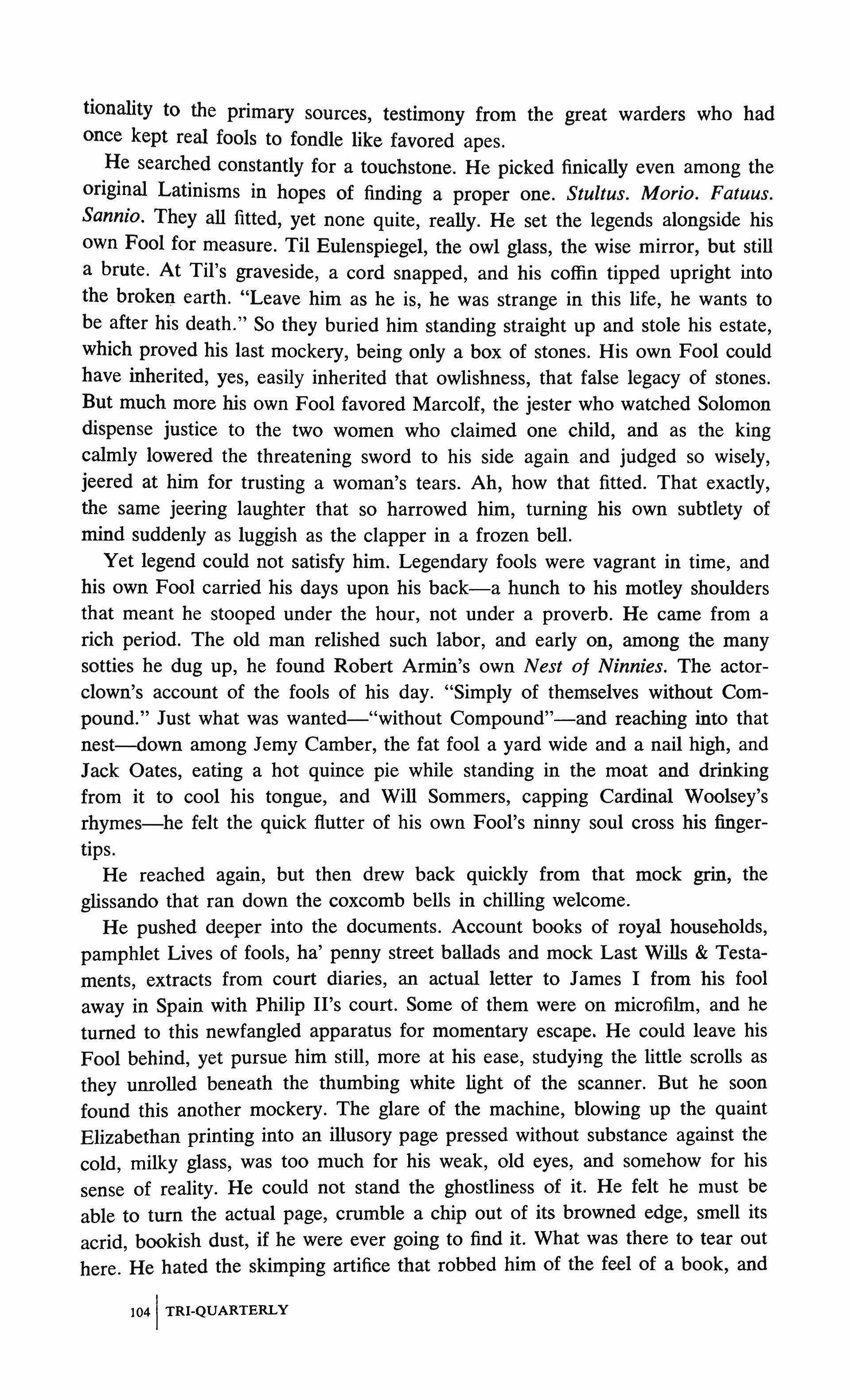
tionality to the primary sources, testimony from the great warders who had once kept real fools to fondle like favored apes.
He searched constantly for a touchstone. He picked finically even among the original Latinisms in hopes of finding a proper one. Stultus. Morio. Fatuus. Sannio. They all fitted, yet none quite, really. He set the legends alongside his own Fool for measure. Til Eulenspiegel, the owl glass, the wise mirror, but still a brute. At Til's graveside, a cord snapped, and his coffin tipped upright into the broken earth. "Leave him as he is, he was strange in this life, he wants to be after his death." So they buried him standing straight up and stole his estate, which proved his last mockery, being only a box of stones. His own Fool could have inherited, yes, easily inherited that owlishness, that false legacy of stones. But much more his own Fool favored Marcolf, the jester who watched Solomon dispense justice to the two women who claimed one child, and as the king calmly lowered the threatening sword to his side again and judged so wisely, jeered at him for trusting a woman's tears. Ah, how that fitted. That exactly, the same jeering laughter that so harrowed him, turning his own subtlety of mind suddenly as luggish as the clapper in a frozen bell.
Yet legend could not satisfy him. Legendary fools were vagrant in time, and his own Fool carried his days upon his back-a hunch to his motley shoulders that meant he stooped under the hour, not under a proverb. He came from a rich period. The old man relished such labor, and early on, among the many sotties he dug up, he found Robert Armin's own Nest of Ninnies. The actorclown's account of the fools of his day. "Simply of themselves without Compound." Just what was wanted-"without Compound"-and reaching into that nest--down among Jemy Camber, the fat fool a yard wide and a nail high, and Jack Oates, eating a hot quince pie while standing in the moat and drinking from it to cool his tongue, and Will Sommers, capping Cardinal Woolsey's rhymes-he felt the quick flutter of his own Fool's ninny soul cross his fingertips.
He reached again, but then drew back quickly from that mock grin, the glissando that ran down the coxcomb bells in chilling welcome.
He pushed deeper into the documents. Account books of royal households, pamphlet Lives of fools, ha' penny street ballads and mock Last Wills & Testaments, extracts from court diaries, an actual letter to James I from his fool away in Spain with Philip II's court. Some of them were on microfilm, and he turned to this newfangled apparatus for momentary escape. He could leave his Fool behind, yet pursue him still, more at his ease, studying the little scrolls as they unrolled beneath the thumbing white light of the scanner. But he soon found this another mockery. The glare of the machine, blowing up the quaint Elizabethan printing into an illusory page pressed without substance against the cold, milky glass, was too much for his weak, old eyes, and somehow for his sense of reality. He could not stand the ghostliness of it. He felt he must be able to tum the actual page, crumble a chip out of its browned edge, smell its acrid, bookish dust, if he were ever going to find it. What was there to tear out here. He hated the skimping artifice that robbed him of the feel of a book, and

imagined the scanner as some great Worm that had invested the castle of his learning. Like Spenser's Error, only too uncreatured a thing to spew forth black ink, or disgorge the books it had swallowed. Its only malice, a pale flush of cold light producing an incubus of a page. He knew how ridiculous he was being, possible senile, and he drove himself to take meticulous notes, as usual. But he only breathed freely again in the staleness of his closed-up study, back within the pied ambiance of his Fool.
By then, he had all his facts. He was now thoroughly familiar with, something of an authority on, a good man in the field of. Oh, he understood his own qualifications all too well. It only remained for him to think things through to the entrapment, to perform the sacred rites of abstraction, and in a curious way, he sought to cleanse himself for them. He stripped away his last ragged pretenses to any venerability, all the shoddy of his professorial airs, and bared himself, in all but intellect, for a naked, failing old man.
It ended so many qualms. He could talk to himself freely. He mumbled and muttered as he pleased, and if his mouth grew wet, he wiped it on his sleeve without shame. When he caught the Fool imitating him in some palsied fumble, he hardly cared. Once he watched the Fool's great, dirty tongue loll almost to the floor before he sensed the coldness at his own cheek and brushed away a long, loose string of saliva. Unimportant. All that mattered was the careful tightening of his logic as it closed around the Fool.
"Decide whether natural or artificial," he thought or said or wrote down somewhere. "Could be a mute. Idiot boy sold by a rustic to some great house in exchange for a few acres grazing land free of enclosure. Such happens. But looks brighter than that. Silence too sly. Vacancy too coy. Hidden wits. I see him offering the egg. Like Will Sommers again, asking the King to let him give an egg to every cuckold in England, and permission granted, hands the first egg to Harry himself. What is he here to hand me? What's in his hand? What's in my hand? A page? A page?"
He glanced down at his hand, but there was only the back of it, covered with liver spots, and he realized that the ambuscado, so carefully laid up in his notes, had missed its elusive quarry yet again.
But he started once more, reciting a tale. "Will Sommers loudly broke wind, and glared at the lady by his side. Then he smiled at her and said for all to hear, 'Don't worry. I'll say it was me.' Clever fool. Rich fool. But this is a poor fool. Violent? Often they are insane. No attack yet. But if it comes Bawdry? A scurrilous fool? Behind that dumbshow, what cess of mind, waiting to pour over me like a chamber pot? Gardyloo!" And then an old man's decrepit giggle, like beans rattling in a bladder, caught him off guard, sucked up from some grossness he'd suddenly remembered from his long study of folly. Again and again, he broke away from that giggle, forcing his way back to the needed date or reference that would repair the break where flatulence and scurrility had escaped from his thinking.
He even allowed himself little threats now. Never quite to the Fool's face, but, "Take heed," he would mumble, "the whip. The whip."
TRI-QUARTERLy 1105
Then suddenly he felt the grip of it in his hand.
Carefully he let go, and gathered up his notecards to give his hands something else to do. He tried to reshuffle them for the hundredth time, but found that they were at last, by some fluke, in a correct order. Irrefutably that order imposed itself upon him. Sequential, exact, conclusive. This time, all his learning told him, there was no escape. Tapping each card nervously on his blotter, searching for error, he tried to think how many days it had been, how many stormy hours had hawked at his chill window to tumble this sudden. random knowledge upon him. He counted slowly--days, hours, cards--and imagined the Fool at his back, counting too, with great pulls at his gross fingers, unable, like himself, to arrive at any sensible number.
But he did not tum around. He saw that he could comer the Fool now with a mere glance, that he could positively identify him beyond any quibble to his colleagues, much more, that he could whip him, rip him out, do with him as he pleased. He had all that certainty, but once again it seemed to be forcing him to the verge of that same opulent unknown over which he had tottered so often, so perilously
Only now, at the Fool's warning titter, he deliberately stared down into its black gulf. He referred back and back, as far as his mind would take him, and knowledge did not come to him so much as it physically seized him. The brush of the long ass's ears around his own cheeks. The plucking up of his whole spine into a rich, red comb, topped with bells. The whirligig of his coat plaids turning to lozenges. His grip on the whip thinning, loosening to a fragile, foolish hold upon the stick of a marotte. One foot jingled beneath him, and quite suddenly he could feel just where the whip was going to cut.
He did the one thing possible in the moment left before the black gulf itself turned over and sat upon his head for a cap. He jumped into it at last.
"Stay!" he shouted to the Fool. "Stay right here! Right by my side! Right here with me!"
Then he whirled around and doubled over in laughter, jeering widely at the suddenly defeated jangling thing in the chair.
"Right?" he whispered. "Right, right?"
The Fool's vaacnt stare was afire like a bone pit, but his marotte nodded its eternal grin.

He was still laughing when the knock came at his door. Very cautiously he judged his surprise at it. No, it was no longer an interruption of his solitude. It was an intrusion upon their intimacy. The Fool shook both fists as if beating back at the door, letting loose a rage of bells.
"Who is it?" he asked, smiling at the angry Fool.
"Nelson, sir. Are you all right?"
He and the Fool shrugged at each other, both repressing laughter this time. He was still a little bit in awe of his own triumph, the confidence they had so
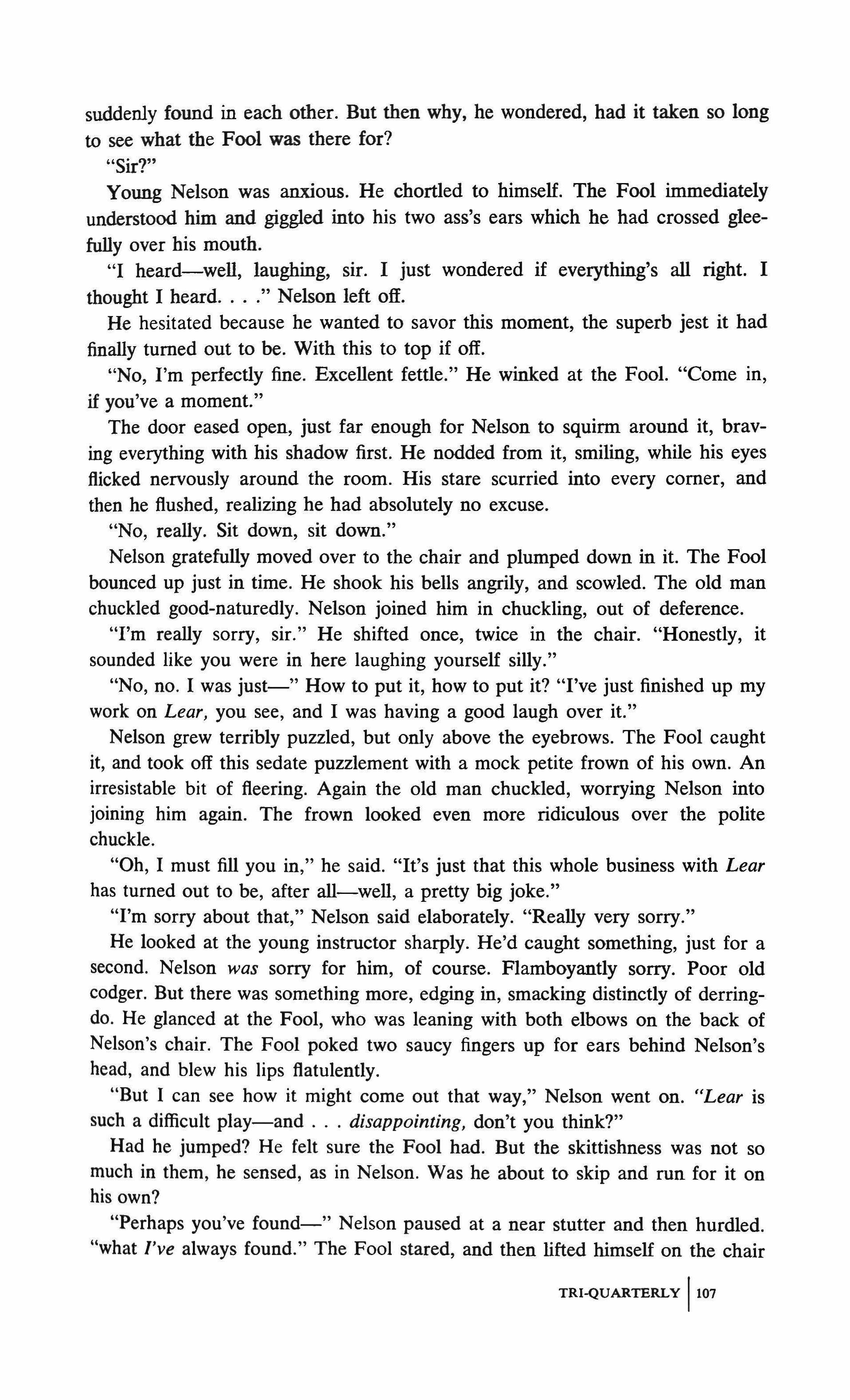
suddenly found in each other. But then why, he wondered, had it taken so long to see what the Fool was there for?
"Sir?"
Young Nelson was anxious. He chortled to himself. The Fool immediately understood him and giggled into his two ass's ears which he had crossed gleefully over his mouth.
"I heard-well, laughing, sir. I just wondered if everything's all right. I thought I heard. ." Nelson left off.
He hesitated because he wanted to savor this moment, the superb jest it had finally turned out to be. With this to top if off.
"No, I'm perfectly fine. Excellent fettle." He winked at the Fool. "Come in, if you've a moment."
The door eased open, just far enough for Nelson to squirm around it, braving everything with his shadow first. He nodded from it, smiling, while his eyes flicked nervously around the room. His stare scurried into every comer, and then he flushed, realizing he had absolutely no excuse.
"No, really. Sit down, sit down."
Nelson gratefully moved over to the chair and plumped down in it. The Fool bounced up just in time. He shook his bells angrily, and scowled. The old man chuckled good-naturedly. Nelson joined him in chuckling, out of deference.
"I'm really sorry, sir." He shifted once, twice in the chair. "Honestly, it sounded like you were in here laughing yourself silly."
"No, no. I was just-" How to put it, how to put it? "I've just finished up my work on Lear, you see, and I was having a good laugh over it."
Nelson grew terribly puzzled, but only above the eyebrows. The Fool caught it, and took off this sedate puzzlement with a mock petite frown of his own. An irresistable bit of fleering. Again the old man chuckled, worrying Nelson into joining him again. The frown looked even more ridiculous over the polite chuckle.
"Oh, I must fill you in," he said. "It's just that this whole business with Lear has turned out to be, after all-well, a pretty big joke."
"I'm sorry about that," Nelson said elaborately. "Really very sorry."
He looked at the young instructor sharply. He'd caught something, just for a second. Nelson was sorry for him, of course. Flamboyantly sorry. Poor old codger. But there was something more, edging in, smacking distinctly of derringdo. He glanced at the Fool, who was leaning with both elbows on the back of Nelson's chair. The Fool poked two saucy fingers up for ears behind Nelson's head, and blew his lips flatulently.
"But I can see how it might come out that way," Nelson went on. "Lear is such a difficult play-and disappointing, don't you think?"
Had he jumped? He felt sure the Fool had. But the skittishness was not so much in them, he sensed, as in Nelson. Was he about to skip and run for it on his own?
"Perhaps you've found-" Nelson paused at a near stutter and then hurdled. "what I've always found." The Fool stared, and then lifted himself on the chair TRI-QUARTERLy 1107
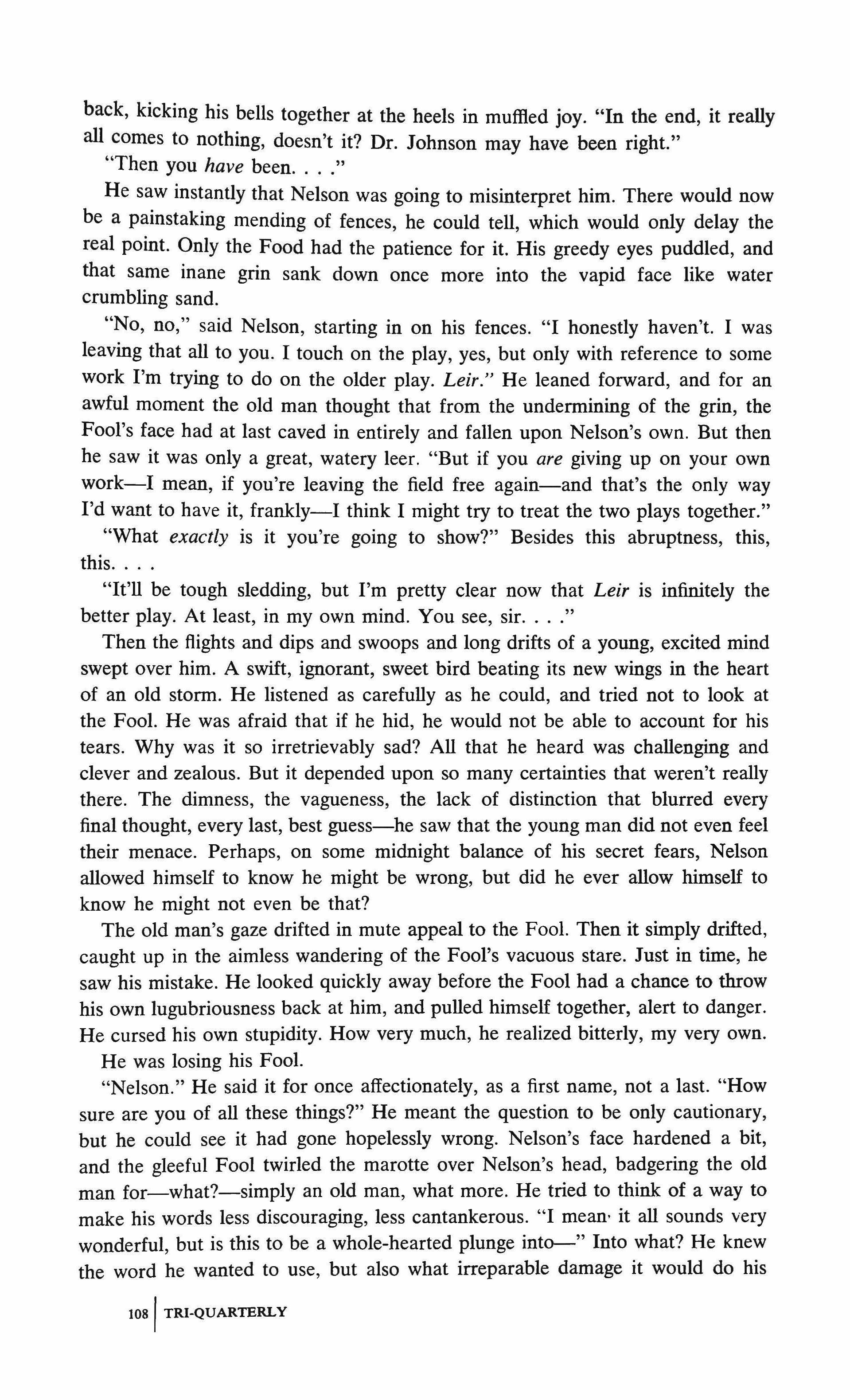
back, kicking his bells together at the heels in muffied joy. "In the end, it really all comes to nothing, doesn't it? Dr. Johnson may have been right."
"Then you have been. ."
He saw instantly that Nelson was going to misinterpret him. There would now be a painstaking mending of fences, he could tell, which would only delay the real point. Only the Food had the patience for it. His greedy eyes puddled, and that same inane grin sank down once more into the vapid face like water crumbling sand.
"No, no," said Nelson, starting in on his fences. "I honestly haven't. I was leaving that all to you. I touch on the play, yes, but only with reference to some work I'm trying to do on the older play. Leir." He leaned forward, and for an awful moment the old man thought that from the undermining of the grin, the Fool's face had at last caved in entirely and fallen upon Nelson's own. But then he saw it was only a great, watery leer. "But if you are giving up on your own work-I mean, if you're leaving the field free again-and that's the only way I'd want to have it, frankly-I think I might try to treat the two plays together."
"What exactly is it you're going to show?" Besides this abruptness, this, this
"It'll be tough sledding, but I'm pretty clear now that Leir is infinitely the better play. At least, in my own mind. You see, sir.
Then the flights and dips and swoops and long drifts of a young, excited mind swept over him. A swift, ignorant, sweet bird beating its new wings in the heart of an old storm. He listened as carefully as he could, and tried not to look at the Fool. He was afraid that if he hid, he would not be able to account for his tears. Why was it so irretrievably sad? All that he heard was challenging and clever and zealous. But it depended upon so many certainties that weren't really there. The dimness, the vagueness, the lack of distinction that blurred every final thought, every last, best guess-he saw that the young man did not even feel their menace. Perhaps, on some midnight balance of his secret fears, Nelson allowed himself to know he might be wrong, but did he ever allow himself to know he might not even be that?
The old man's gaze drifted in mute appeal to the Fool. Then it simply drifted, caught up in the aimless wandering of the Fool's vacuous stare. Just in time, he saw his mistake. He looked quickly away before the Fool had a chance to throw his own lugubriousness back at him, and pulled himself together, alert to danger. He cursed his own stupidity. How very much, he realized bitterly, my very own.
He was losing his Fool.
"Nelson." He said it for once affectionately, as a first name, not a last. "How sure are you of all these things?" He meant the question to be only cautionary, but he could see it had gone hopelessly wrong. Nelson's face hardened a bit, and the gleeful Fool twirled the marotte over Nelson's head, badgering the old man for-what?-simply an old man, what more. He tried to think of a way to make his words less discouraging, less cantankerous. "I mean- it all sounds very wonderful, but is this to be a whole-hearted plunge into--" Into what? He knew the word he wanted to use, but also what irreparable damage it would do his
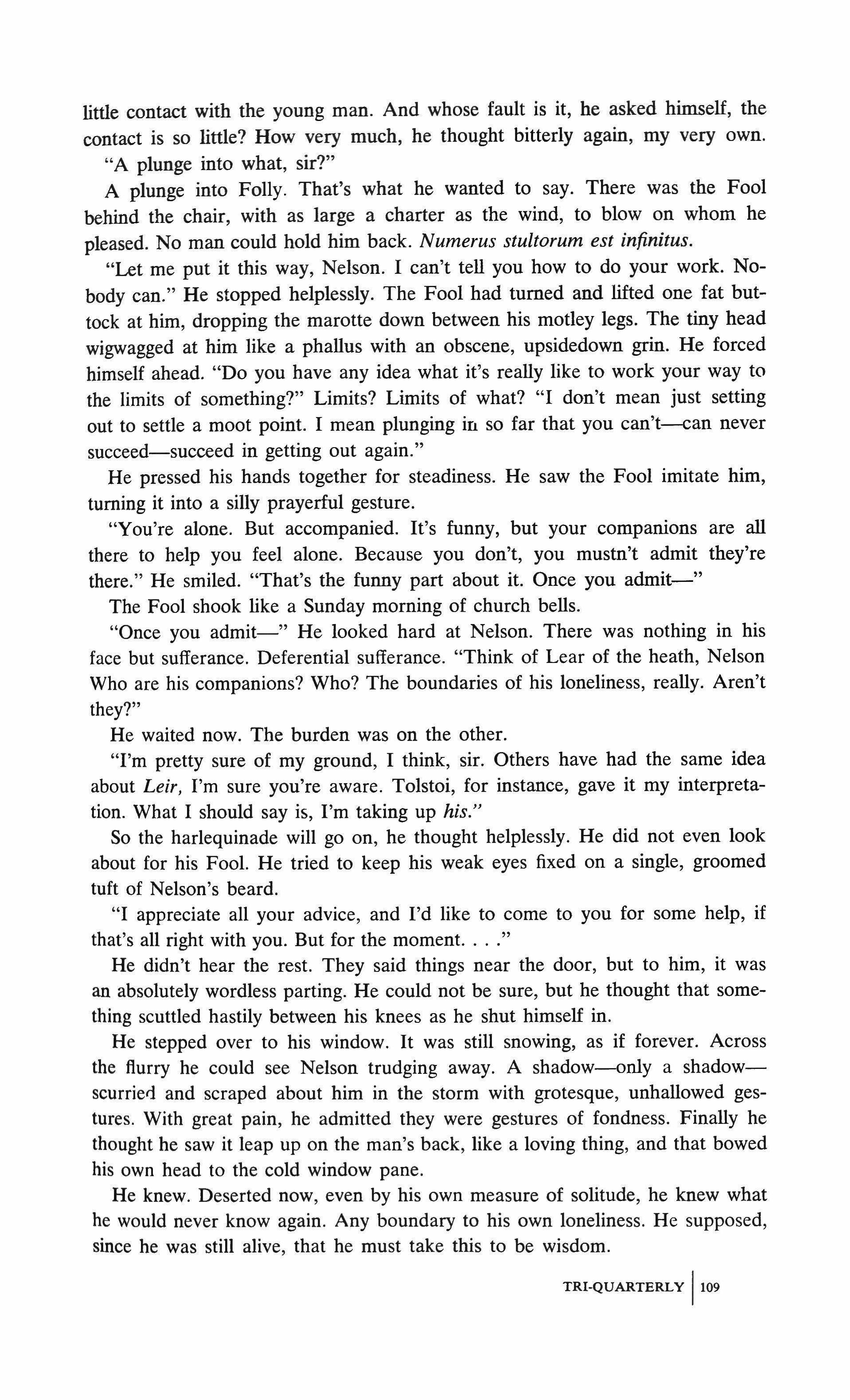
little contact with the young man. And whose fault is it, he asked himself, the contact is so little? How very much, he thought bitterly again, my very own.
"A plunge into what, sir?"
A plunge into Folly. That's what he wanted to say. There was the Fool behind the chair, with as large a charter as the wind, to blow on whom he pleased. No man could hold him back. Numerus stultorum est infinitus.
"Let me put it this way, Nelson. I can't tell you how to do your work. Nobody can." He stopped helplessly. The Fool had turned and lifted one fat buttock at him, dropping the marotte down between his motley legs. The tiny head wigwagged at him like a phallus with an obscene, upsidedown grin. He forced himself ahead. "Do you have any idea what it's really like to work your way to the limits of something?" Limits? Limits of what? "I don't mean just setting out to settle a moot point. I mean plunging in so far that you can't--can never succeed-succeed in getting out again."
He pressed his hands together for steadiness. He saw the Fool imitate him, turning it into a silly prayerful gesture.
"You're alone. But accompanied. It's funny, but your companions are all there to help you feel alone. Because you don't, you mustn't admit they're there." He smiled. "That's the funny part about it. Once you admit-"
The Fool shook like a Sunday morning of church bells.
"Once you admit-" He looked hard at Nelson. There was nothing in his face but sufferance. Deferential sufferance. "Think of Lear of the heath, Nelson Who are his companions? Who? The boundaries of his loneliness, really. Aren't they?"
He waited now. The burden was on the other.
"I'm pretty sure of my ground, I think, sir. Others have had the same idea about Leir, I'm sure you're aware. Tolstoi, for instance, gave it my interpretation. What I should say is, I'm taking up his."
So the harlequinade will go on, he thought helplessly. He did not even look about for his Fool. He tried to keep his weak eyes fixed on a single, groomed tuft of Nelson's beard.
"I appreciate all your advice, and I'd like to come to you for some help, if that's all right with you. But for the moment
He didn't hear the rest. They said things near the door, but to him, it was an absolutely wordless parting. He could not be sure, but he thought that something scuttled hastily between his knees as he shut himself in.
He stepped over to his window. It was still snowing, as if forever. Across the flurry he could see Nelson trudging away. A shadow--only a shadowscurried and scraped about him in the storm with grotesque, unhallowed gestures. With great pain, he admitted they were gestures of fondness. Finally he thought he saw it leap up on the man's back, like a loving thing, and that bowed his own head to the cold window pane.
He knew. Deserted now, even by his own measure of solitude, he knew what he would never know again. Any boundary to his own loneliness. He supposed, since he was still alive, that he must take this to be wisdom.

To grip through the ground with your feet; To feel your toes curled around rocks, Sucking up water; to stand up straight And tall for a certain time, and after Go off in any direction, so long as it's up; That's what I call living: standing there.
Tons of water creeping up my stomach, Immense strain in my many shoulders Holding their limbs in proclamation; When a starling lands in my hair I know it; when the hairy woodpecker Hits me for lice, I know where the lice are.
My patches of lichen itch for centuries, I do not stoop to scratch; you pay For dignity in this world.
Grown old,
[ suffer the surgeon's pruning bill, Cement in my cavities, healing tar Over my incidental stumps. I go on, Bending a little in the bigger winds, Waving light airs away, and every Fall I drop the year's familiarity Of used leaves with a certain contempt.
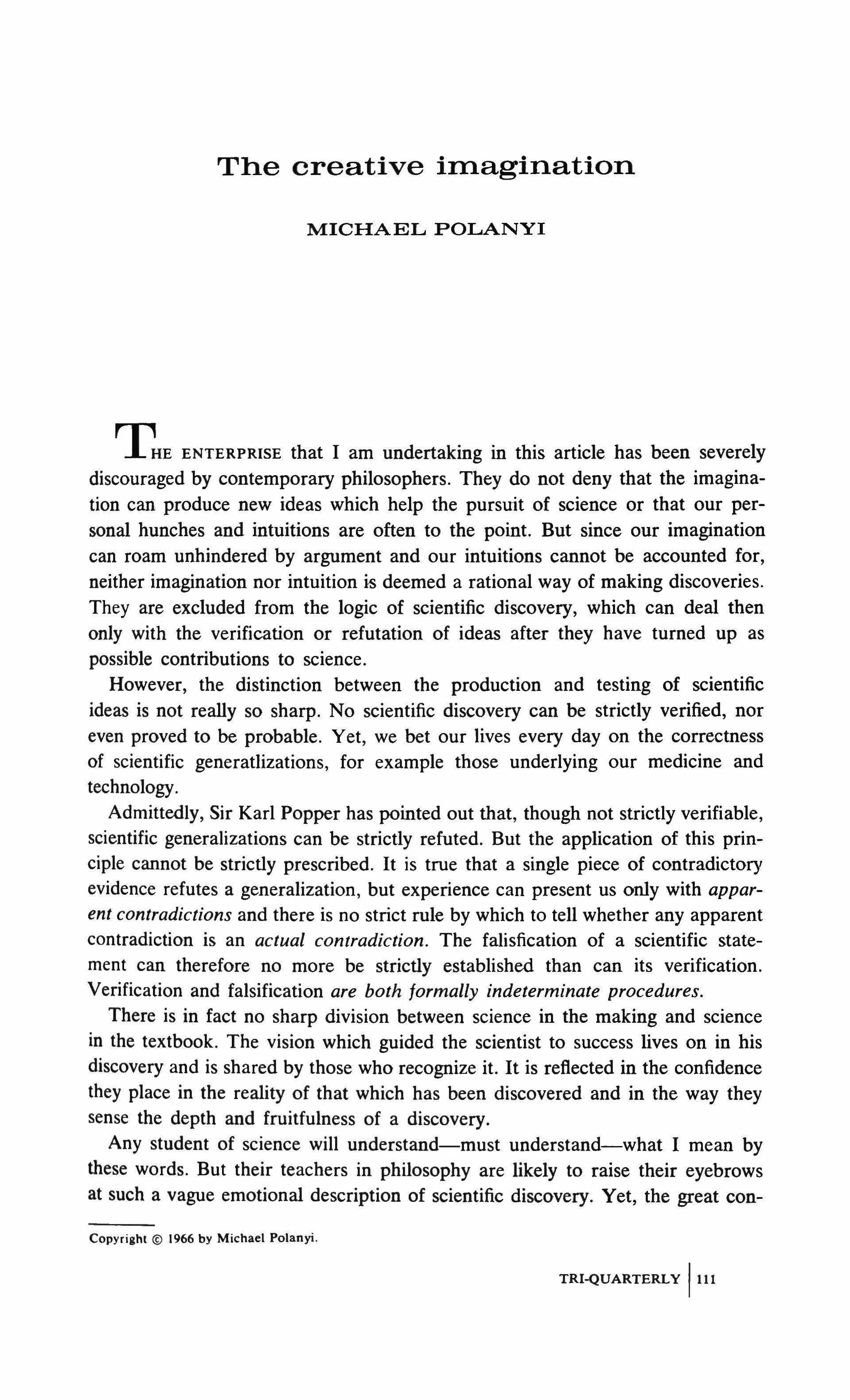
THEENTERPRISE that I am undertaking in this article has been severely discouraged by contemporary philosophers. They do not deny that the imagination can produce new ideas which help the pursuit of science or that our personal hunches and intuitions are often to the point. But since our imagination can roam unhindered by argument and our intuitions cannot be accounted for, neither imagination nor intuition is deemed a rational way of making discoveries. They are excluded from the logic of scientific discovery, which can deal then only with the verification or refutation of ideas after they have turned up as possible contributions to science.
However, the distinction between the production and testing of scientific ideas is not really so sharp. No scientific discovery can be strictly verified, nor even proved to be probable. Yet, we bet our lives every day on the correctness of scientific generatlizations, for example those underlying our medicine and technology.
Admittedly, Sir Karl Popper has pointed out that, though not strictly verifiable, scientific generalizations can be strictly refuted. But the application of this principle cannot be strictly prescribed. It is true that a single piece of contradictory evidence refutes a generalization, but experience can present us only with apparent contradictions and there is no strict rule by which to tell whether any apparent contradiction is an actual contradiction. The falisfication of a scientific statement can therefore no more be strictly established than can its verification. Verification and falsification are both formally indeterminate procedures.
There is in fact no sharp division between science in the making and science in the textbook. The vision which guided the scientist to success lives on in his discovery and is shared by those who recognize it. It is reflected in the confidence they place in the reality of that which has been discovered and in the way they sense the depth and fruitfulness of a discovery.
Any student of science will understand-must understand-what I mean by these words. But their teachers in philosophy are likely to raise their eyebrows at such a vague emotional description of scientific discovery. Yet, the great con-
Copyriahl © 1966 by Michael Polanyi.
troversy over the Copernican system, which first established modern science, turned on just such vague emotional qualities attributed to the system by Copernicus and his followers, which proved in their view that the system was real.
Moreover, after Newton's confirmation of the Copernican system, Copernicus and his followers-Kepler and Galileo-were universally recognized to have been right. For two centuries their steadfastness in defending science against its adversaries was unquestioningly honored.
I myself was still brought up on these sentiments. But at that time some eminent writers were already throwing cold water on them. Poincare wrote that Galileo's insistence that the earth was really circling round the sun was pointless, since all that he could legitimately claim was that this view was the more convenient. The distinguished physicist, historian, and philosopher, Pierre Duhem, went further and concluded it was the adversaries of Copernicus and his followers who had recognized the true meaning of science, which the Copernicans had misunderstood. Although this extreme form of modern positivism is no longer widely held today, I see no essential alternative to it emerging so far.
Let us look at the facts. Copernicus discovered the solar system by signs which convinced him, but these signs convinced few others. For the Copernican system was far more complicated than that of Ptolemy: It was a veritable jungle of ad hoc assumptions. Moreover, the attribution of physical reality to the system met with serious mechanical objections and involved also staggering assumptions about the distance of fixed stars. Yet Copernicus ("De Revolutionibus," Preface and Book 1, Chapter 10) claimed that his system had unique harmonies which proved it to be real even though he could describe these harmonies only in a few vague emotional passages." He did not stop to consider how many assumptions he had to make in formulating his system, nor how many difficulties he ignored in doing so. Since his vision showed him an outline of reality, he ignored all its complications and unanswered questions.
Nor did Copernicus remain without followers in his own century. In spite of its extravagances, his vision was shared by other great scientists like Kepler and Galileo. Admittedly, their discoveries bore out the reality of the Copernican system, but they could make these discoveries only because they already believed in the reality of the system before.
We can see here what is meant by attributing reality to scientific discovery: It is to believe that it refers to no chance configuration of things, but to a persistent connection of certain features, a connection which, being real, will yet manifest itself in numberless ways, inexhaustibly.
It is to believe that it is there, existing independently of us, and that hence its consequences can never be fully predicted.
Our knowledge of reality has then an essentially indeterminate content: It deserves to be called a vision. The vast indeterminacy of Copernican vision showed itself in the fact that discoveries made later in the light of this vision would have horrified its author. Copernicus would have rejected the elliptic planetary paths of Kepler and, likewise, the extension of terrestrial mechanics
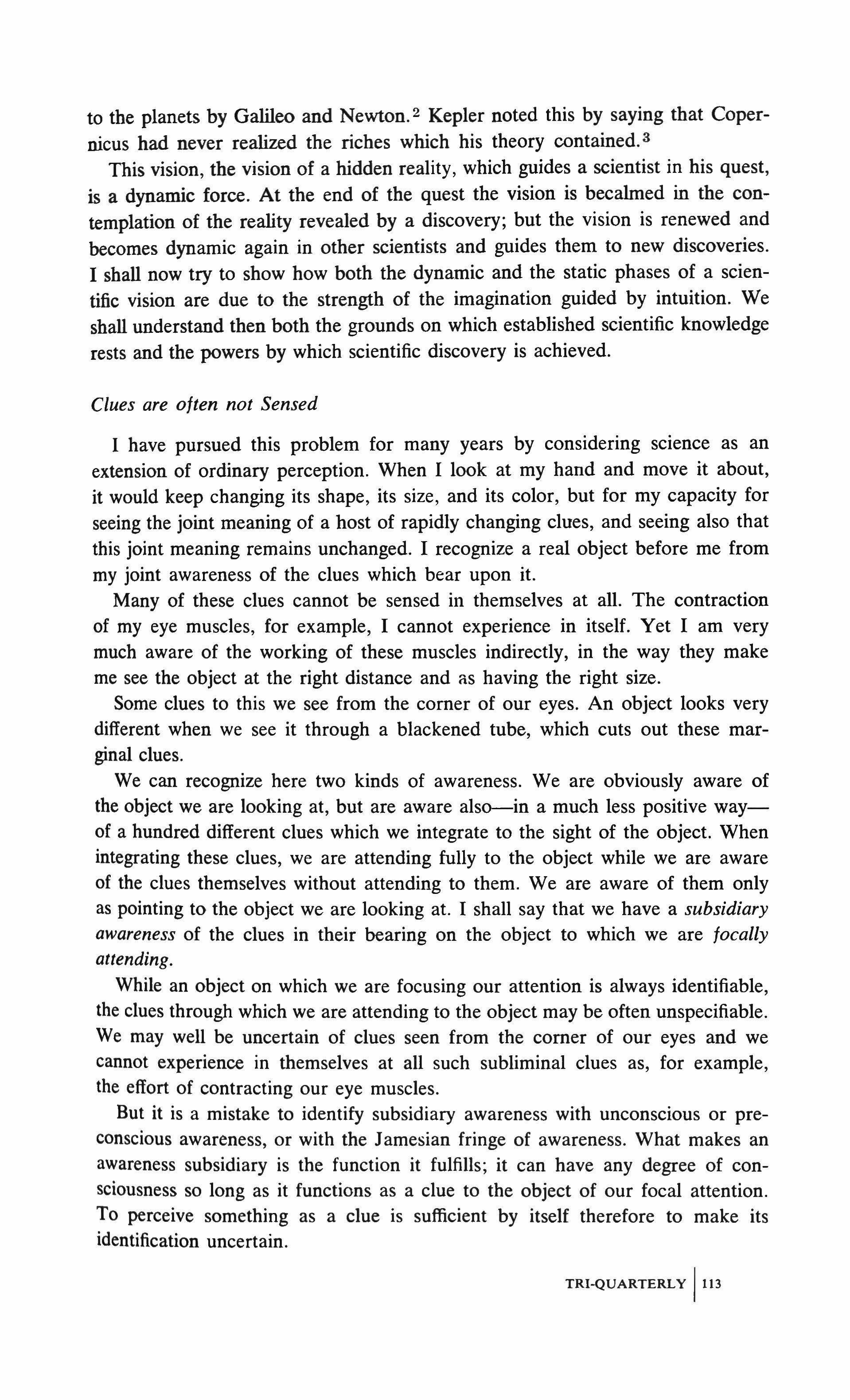
to the planets by Galileo and Newton.> Kepler noted this by saying that Copernicus had never realized the riches which his theory contained. 3
This vision, the vision of a hidden reality, which guides a scientist in his quest, is a dynamic force. At the end of the quest the vision is becalmed in the contemplation of the reality revealed by a discovery; but the vision is renewed and becomes dynamic again in other scientists and guides them to new discoveries. I shall now try to show how both the dynamic and the static phases of a scientific vision are due to the strength of the imagination guided by intuition. We shall understand then both the grounds on which established scientific knowledge rests and the powers by which scientific discovery is achieved.
I have pursued this problem for many years by considering science as an extension of ordinary perception. When I look at my hand and move it about, it would keep changing its shape, its size, and its color, but for my capacity for seeing the joint meaning of a host of rapidly changing clues, and seeing also that this joint meaning remains unchanged. I recognize a real object before me from my joint awareness of the clues which bear upon it.
Many of these clues cannot be sensed in themselves at all. The contraction of my eye muscles, for example, I cannot experience in itself. Yet I am very much aware of the working of these muscles indirectly, in the way they make me see the object at the right distance and as having the right size.
Some clues to this we see from the comer of our eyes. An object looks very different when we see it through a blackened tube, which cuts out these marginal clues.
We can recognize here two kinds of awareness. We are obviously aware of the object we are looking at, but are aware also-in a much less positive wayof a hundred different clues which we integrate to the sight of the object. When integrating these clues, we are attending fully to the object while we are aware of the clues themselves without attending to them. We are aware of them only as pointing to the object we are looking at. I shall say that we have a subsidiary awareness of the clues in their bearing on the object to which we are focally attending.
While an object on which we are focusing our attention is always identifiable, the clues through which we are attending to the object may be often unspecifiable. We may well be uncertain of clues seen from the comer of our eyes and we cannot experience in themselves at all such subliminal clues as, for example, the effort of contracting our eye muscles.
But it is a mistake to identify subsidiary awareness with unconscious or preconscious awareness, or with the Jamesian fringe of awareness. What makes an awareness subsidiary is the function it fulfills; it can have any degree of consciousness so long as it functions as a clue to the object of our focal attention. To perceive something as a clue is sufficient by itself therefore to make its identification uncertain.

Let me return now to science. If science is a manner of perceiving things in nature, we might find the prototype of scientific discovery in the way we solve a difficult perceptual problem. Take for example the way we learn to find our way about while wearing inverting spectacles. When you put on spectacles that show things upside down, you feel completely lost and remain helpless for days on end. But if you persist in groping around for a week or more, you find your way again and eventually can even drive a car or climb rocks with the spectacles on. This fact, well known today, was in essence discovered by Stratton seventy years ago. This experience is usually said to show that after a time the visual image switches round to the way we normally see it. But some more recent observations have shown that this interpretation is false.
It happened, for example, that a person perfectly trained to get around with upside down spectacles was shown a row of houses from a distance. He was then asked whether he saw the houses right way up or upside down. The question puzzled the subject and he replied, after a moment, that he had not thought about the matter before, but now that he is asked about it he finds that he sees the houses upside down. 4
Such a reply shows that the visual image of the houses has not turned back to normal; it has remained inverted, but the inverted image no longer means to the subject that the houses themselves are upside down. The inverted image has been reconnected to other sensory clues-to touch and sound and weight. These all hang together with the image once more and hence, though the image remains inverted, we can again find our way by it safely.
A new way of seeing things rightly has been established. And since the meaning of the upside down image has changed, the term "upside down" has lost its previous meaning. It is confusing now to enquire whether something is seen upside down or right way up. The new kind of right seeing can be talked about only in terms of a new vocabulary.
We see how the wearer of inverting spectacles reorganizes scrambled clues into a new coherence. He again sees objects then, instead of meaningless impressions. He again sees real things, which he can pick up and handle, which have weights pulling in the right direction and make sounds that come from the place at which he sees them. He has made sense out of chaos.
In science, I find the closest parallel to this perceptual achievement in the discovery of relativity. Einstein has told the story how from the age of 16 he was obsessed by the following kind of speculations. Experiments with falling bodies were known to give the same result on board a ship in motion as on solid ground. But what would happen to the light which a lamp would emit on board a moving ship? Supposing the ship moved fast enough, would it overtake the beams of its own light as a bullet overtakes the sound of the exploding cartridge by crossing the sonic barrier?
Einstein thought that this overtaking was inconceivable. Persisting in this assumption, he eventually succeeded in renewing the conception of space and
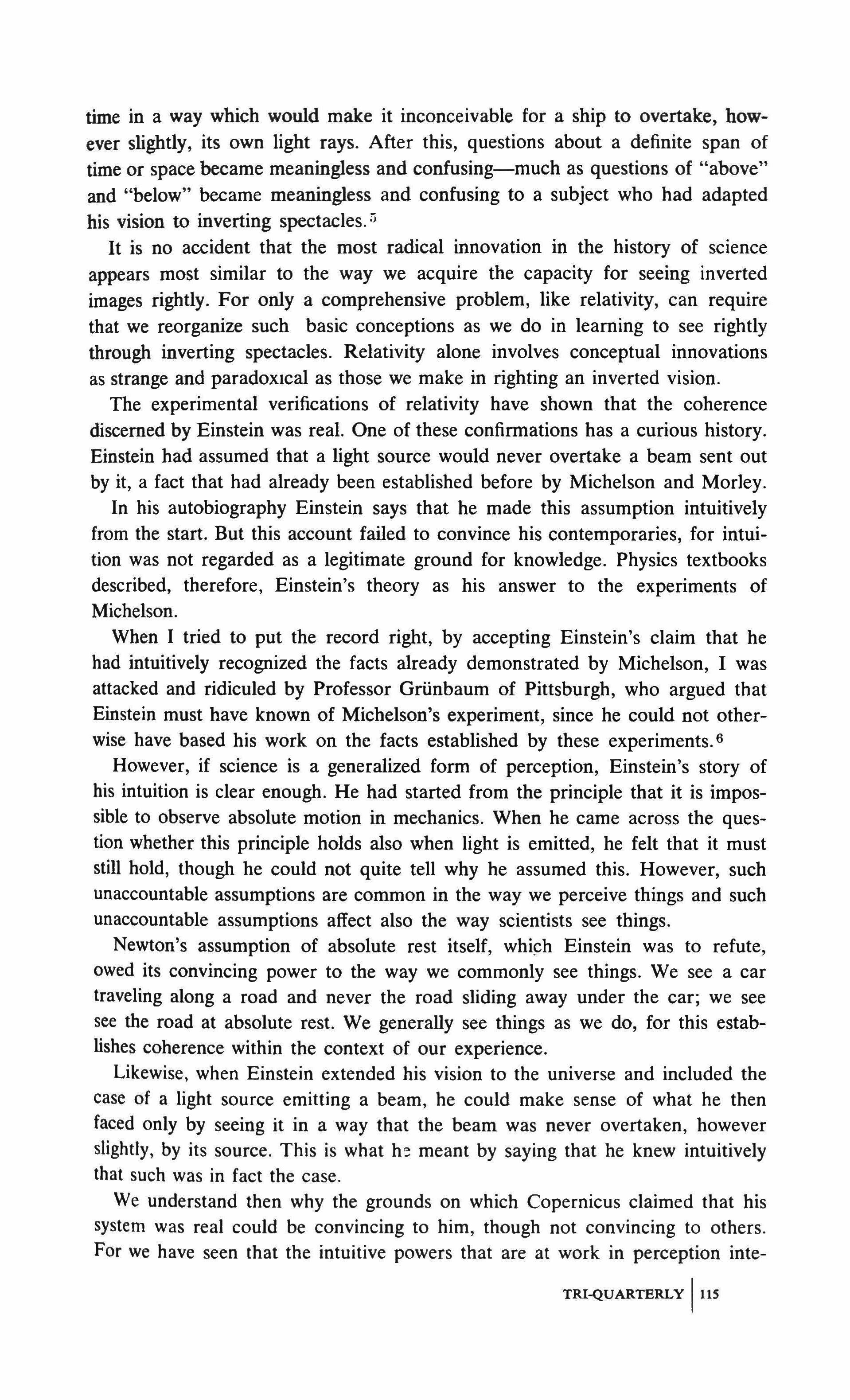
time in a way which would make it inconceivable for a ship to overtake, however slightly, its own light rays. After this, questions about a definite span of time or space became meaningless and confusing-much as questions of "above" and "below" became meaningless and confusing to a subject who had adapted his vision to inverting spectacles."
It is no accident that the most radical innovation in the history of science appears most similar to the way we acquire the capacity for seeing inverted images rightly. For only a comprehensive problem, like relativity, can require that we reorganize such basic conceptions as we do in learning to see rightly through inverting spectacles. Relativity alone involves conceptual innovations as strange and paradoxical as those we make in righting an inverted vision.
The experimental verifications of relativity have shown that the coherence discerned by Einstein was real. One of these confirmations has a curious history. Einstein had assumed that a light source would never overtake a beam sent out by it, a fact that had already been established before by Michelson and Morley.
In his autobiography Einstein says that he made this assumption intuitively from the start. But this account failed to convince his contemporaries, for intuition was not regarded as a legitimate ground for knowledge. Physics textbooks described, therefore, Einstein's theory as his answer to the experiments of Michelson.
When I tried to put the record right, by accepting Einstein's claim that he had intuitively recognized the facts already demonstrated by Michelson, I was attacked and ridiculed by Professor Griinbaum of Pittsburgh, who argued that Einstein must have known of Michelson's experiment, since he could not otherwise have based his work on the facts established by these experiments. 6
However, if science is a generalized form of perception, Einstein's story of his intuition is clear enough. He had started from the principle that it is impossible to observe absolute motion in mechanics. When he came across the question whether this principle holds also when light is emitted, he felt that it must still hold, though he could not quite tell why he assumed this. However, such unaccountable assumptions are common in the way we perceive things and such unaccountable assumptions affect also the way scientists see things.
Newton's assumption of absolute rest itself, which Einstein was to refute, owed its convincing power to the way we commonly see things. We see a car traveling along a road and never the road sliding away under the car; we see see the road at absolute rest. We generally see things as we do, for this establishes coherence within the context of our experience.
Likewise, when Einstein extended his vision to the universe and included the case of a light source emitting a beam, he could make sense of what he then faced only by seeing it in a way that the beam was never overtaken, however slightly, by its source. This is what he meant by saying that he knew intuitively that such was in fact the case.
We understand then why the grounds on which Copernicus claimed that his system was real could be convincing to him, though not convincing to others. For we have seen that the intuitive powers that are at work in perception inte-
TRI-QUARTERLY IllS
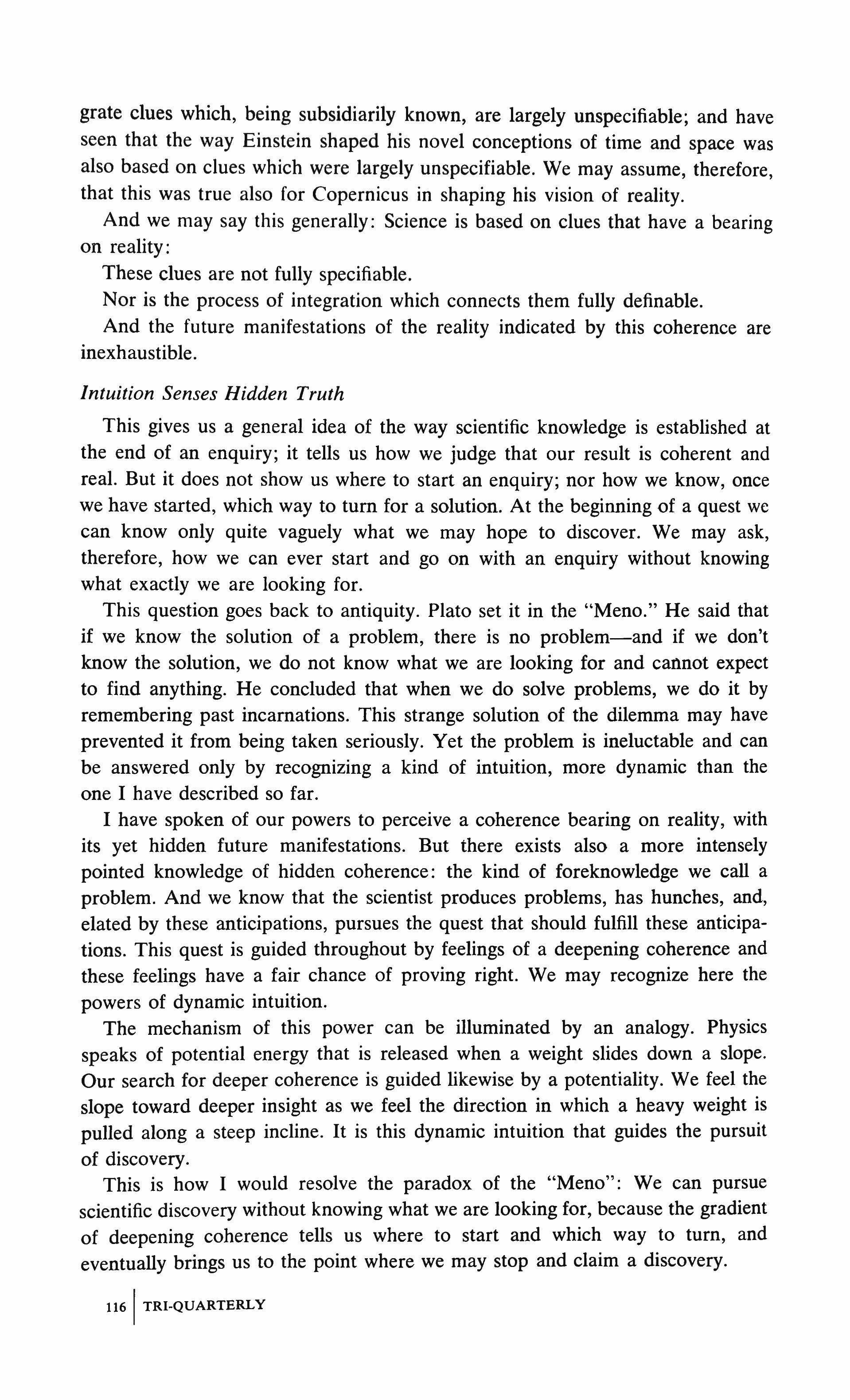
grate clues which, being subsidiarily known, are largely unspecifiable; and have seen that the way Einstein shaped his novel conceptions of time and space was also based on clues which were largely unspecifiable. We may assume, therefore, that this was true also for Copernicus in shaping his vision of reality.
And we may say this generally: Science is based on clues that have a bearing on reality:
These clues are not fully specifiable.
Nor is the process of integration which connects them fully definable.
And the future manifestations of the reality indicated by this coherence are inexhaustible.
This gives us a general idea of the way scientific knowledge is established at the end of an enquiry; it tells us how we judge that our result is coherent and real. But it does not show us where to start an enquiry; nor how we know, once we have started, which way to turn for a solution. At the beginning of a quest we can know only quite vaguely what we may hope to discover. We may ask, therefore, how we can ever start and go on with an enquiry without knowing what exactly we are looking for.
This question goes back to antiquity. Plato set it in the "Meno." He said that if we know the solution of a problem, there is no problem-and if we don't know the solution, we do not know what we are looking for and cannot expect to find anything. He concluded that when we do solve problems, we do it by remembering past incarnations. This strange solution of the dilemma may have prevented it from being taken seriously Yet the problem is ineluctable and can be answered only by recognizing a kind of intuition, more dynamic than the one I have described so far.
I have spoken of our powers to perceive a coherence bearing on reality, with its yet hidden future manifestations. But there exists also a more intensely pointed knowledge of hidden coherence: the kind of foreknowledge we call a problem. And we know that the scientist produces problems, has hunches, and, elated by these anticipations, pursues the quest that should fulfill these anticipations. This quest is guided throughout by feelings of a deepening coherence and these feelings have a fair chance of proving right. We may recognize here the powers of dynamic intuition.
The mechanism of this power can be illuminated by an analogy. Physics speaks of potential energy that is released when a weight slides down a slope. Our search for deeper coherence is guided likewise by a potentiality. We feel the slope toward deeper insight as we feel the direction in which a heavy weight is pulled along a steep incline. It is this dynamic intuition that guides the pursuit of discovery.
This is how I would resolve the paradox of the "Meno": We can pursue scientific discovery without knowing what we are looking for, because the gradient of deepening coherence tells us where to start and which way to turn, and eventually brings us to the point where we may stop and claim a discovery.
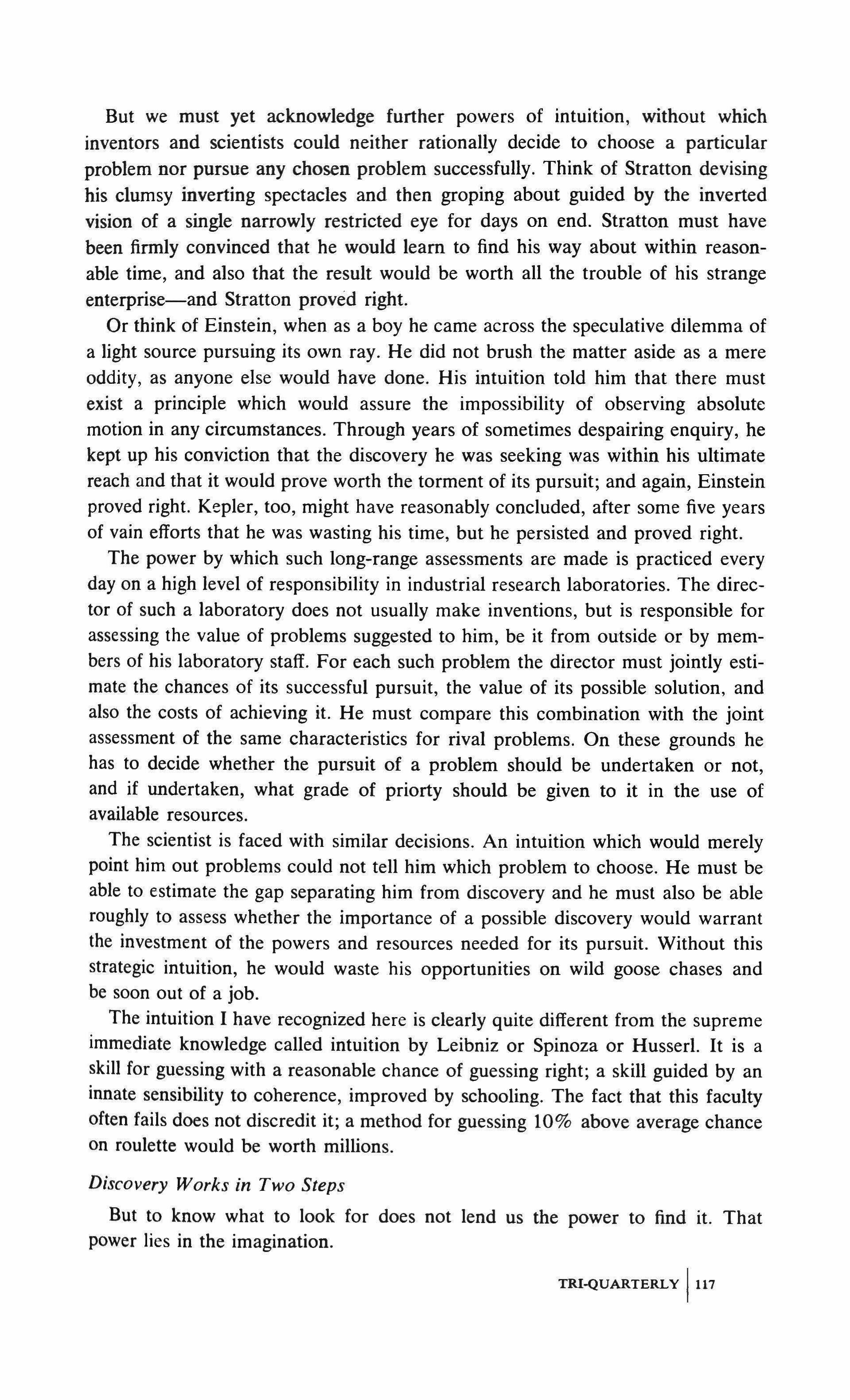
But we must yet acknowledge further powers of intuition, without which inventors and scientists could neither rationally decide to choose a particular problem nor pursue any chosen problem successfully. Think of Stratton devising his clumsy inverting spectacles and then groping about guided by the inverted vision of a single narrowly restricted eye for days on end. Stratton must have been firmly convinced that he would learn to find his way about within reasonable time, and also that the result would be worth all the trouble of his strange enterprise-and Stratton proved right.
Or think of Einstein, when as a boy he came across the speculative dilemma of a light source pursuing its own ray. He did not brush the matter aside as a mere oddity, as anyone else would have done. His intuition told him that there must exist a principle which would assure the impossibility of observing absolute motion in any circumstances. Through years of sometimes despairing enquiry, he kept up his conviction that the discovery he was seeking was within his ultimate reach and that it would prove worth the torment of its pursuit; and again, Einstein proved right. Kepler, too, might have reasonably concluded, after some five years of vain efforts that he was wasting his time, but he persisted and proved right.
The power by which such long-range assessments are made is practiced every day on a high level of responsibility in industrial research laboratories. The director of such a laboratory does not usually make inventions, but is responsible for assessing the value of problems suggested to him, be it from outside or by members of his laboratory staff. For each such problem the director must jointly estimate the chances of its successful pursuit, the value of its possible solution, and also the costs of achieving it. He must compare this combination with the joint assessment of the same characteristics for rival problems. On these grounds he has to decide whether the pursuit of a problem should be undertaken or not, and if undertaken, what grade of priorty should be given to it in the use of available resources.
The scientist is faced with similar decisions. An intuition which would merely point him out problems could not tell him which problem to choose. He must be able to estimate the gap separating him from discovery and he must also be able roughly to assess whether the importance of a possible discovery would warrant the investment of the powers and resources needed for its pursuit. Without this strategic intuition, he would waste his opportunities on wild goose chases and be soon out of a job.
The intuition I have recognized here is clearly quite different from the supreme immediate knowledge called intuition by Leibniz or Spinoza or Husserl. It is a skill for guessing with a reasonable chance of guessing right; a skill guided by an innate sensibility to coherence, improved by schooling. The fact that this faculty often fails does not discredit it; a method for guessing 10% above average chance on roulette would be worth millions.
But to know what to look for does not lend us the power to find it. That power lies in the imagination.
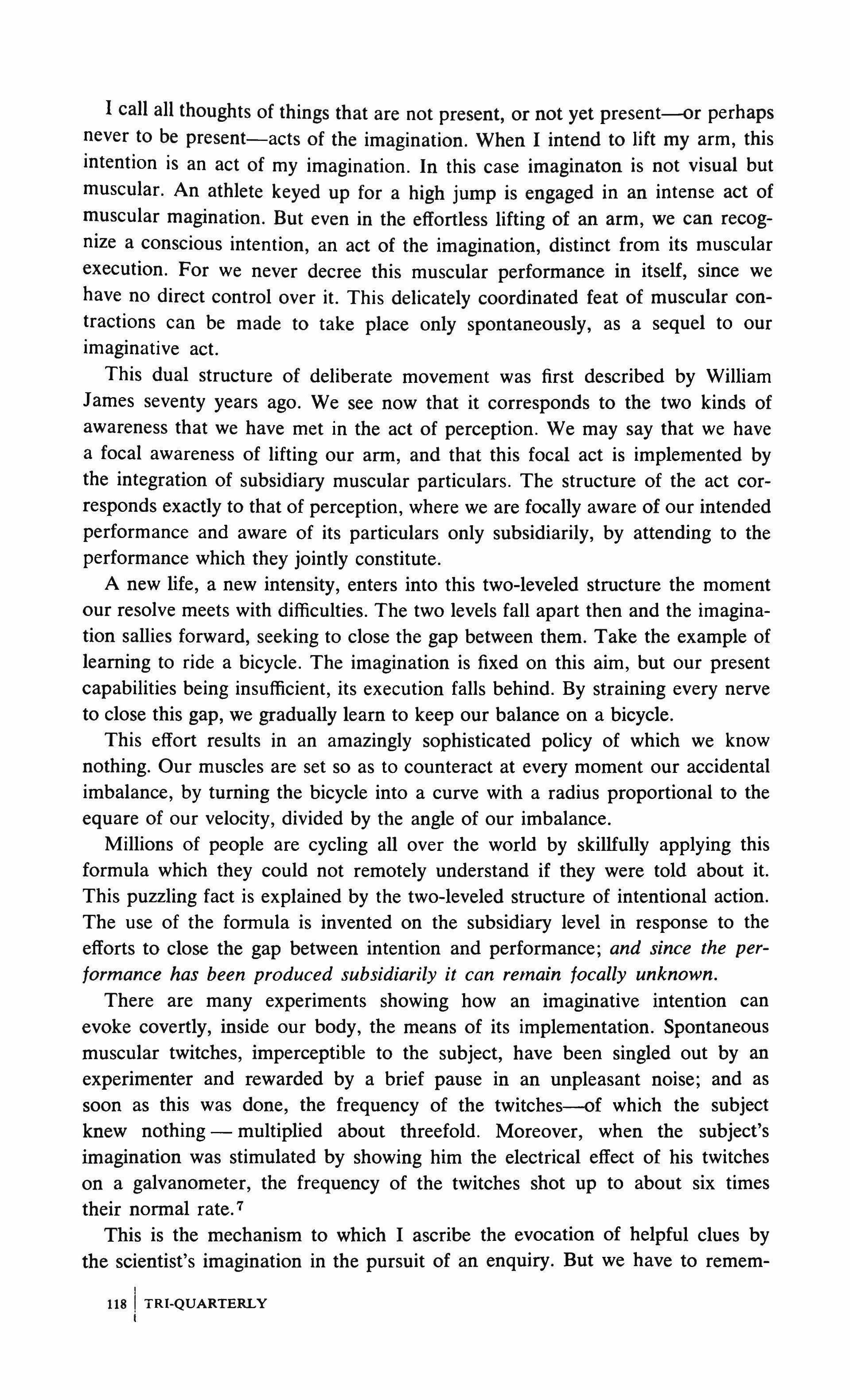
I call all thoughts of things that are not present, or not yet present--or perhaps never to be present-acts of the imagination. When I intend to lift my arm, this intention is an act of my imagination. In this case imaginaton is not visual but muscular. An athlete keyed up for a high jump is engaged in an intense act of muscular magination. But even in the effortless lifting of an arm, we can recognize a conscious intention, an act of the imagination, distinct from its muscular execution. For we never decree this muscular performance in itself, since we have no direct control over it. This delicately coordinated feat of muscular contractions can be made to take place only spontaneously, as a sequel to our imaginative act.
This dual structure of deliberate movement was first described by William James seventy years ago. We see now that it corresponds to the two kinds of awareness that we have met in the act of perception. We may say that we have a focal awareness of lifting our arm, and that this focal act is implemented by the integration of subsidiary muscular particulars. The structure of the act corresponds exactly to that of perception, where we are focally aware of our intended performance and aware of its particulars only subsidiarily, by attending to the performance which they jointly constitute.
A new life, a new intensity, enters into this two-leveled structure the moment our resolve meets with difficulties. The two levels fall apart then and the imagination sallies forward, seeking to close the gap between them. Take the example of learning to ride a bicycle. The imagination is fixed on this aim, but our present capabilities being insufficient, its execution falls behind. By straining every nerve to close this gap, we gradually learn to keep our balance on a bicycle.
This effort results in an amazingly sophisticated policy of which we know nothing. Our muscles are set so as to counteract at every moment our accidental imbalance, by turning the bicycle into a curve with a radius proportional to the equare of our velocity, divided by the angle of our imbalance.
Millions of people are cycling all over the world by skillfully applying this formula which they could not remotely understand if they were told about it. This puzzling fact is explained by the two-leveled structure of intentional action. The use of the formula is invented on the subsidiary level in response to the efforts to close the gap between intention and performance; and since the performance has been produced subsidiarily it can remain focally unknown.
There are many experiments showing how an imaginative intention can evoke covertly, inside our body, the means of its implementation. Spontaneous muscular twitches, imperceptible to the subject, have been singled out by an experimenter and rewarded by a brief pause in an unpleasant noise; and as soon as this was done, the frequency of the twitches--of which the subject knew nothing - multiplied about threefold. Moreover, when the subject's imagination was stimulated by showing him the electrical effect of his twitches on a galvanometer, the frequency of the twitches shot up to about six times their normal rate. 7
This is the mechanism to which I ascribe the evocation of helpful clues by the scientist's imagination in the pursuit of an enquiry. But we have to remem-

ber here that scientific problems are no definite tasks. The scientist knows his aim only in broad terms and must rely on his intuition of deepening coherence to guide him to discovery. He must keep his imagination fixed on these growing points and force his way to what lies hidden beyond them. We must see how this is done.
Take once more the example of the way we discover how to see right through inverting spectacles. We cannot aim specifically at reconnecting sight, touch, and hearing. Any attempt to overcome spacial inversion by telling ourself that what we see above is really below may actually hinder our progress, since the meaning of the words we would use is inappropriate. We must go on groping our way by sight and touch, and learn to get about in this way. Only by keeping our imagination fixed on the global result we are seeking, can we induce the requisite sensory reintegration and the accompanying conceptual innovation.
No quest could have been more indeterminate in its aim than Einstein's enquiry that led to the discovery of relativity. Yet he has told that during all the years of his enquiry, "there was a feeling of direction, of going straight toward something definite. Of course," he said, "it is very hard to express that feeling in words; but it was definitely so, and clearly to be distinguished from later thoughts about the rational form of the solution." We meet here the integration of still largely unspecifiable elements into a gradually narrowing context, the coherence of which has not yet become explicit.
The surmises made by Kepler during six years of toil before hitting on the elliptic path of Mars were often explicit. But Arthur Koestler has shown that Kepler's distinctive guiding idea, to which he owed his success, was the firm conviction that the path of the planet Mars was somehow determined by a kind of mechanical interaction with the sun. This vague vision-foreshadowing Newton's theory-had enough truth in it to make him exclude all epicycles and send his imagination in search of a single formula, covering the whole planetary path both in its speed and in its shape. This is how Kepler hit upon his two laws of elliptic revolution.
We begin to see now how the scientist's vision is found. Guided by our intuition, our imagination sallies forward and our intuition integrates then what the imagination has hit upon. But a fundamental complication comes into sight here. I have acknowledged that the final sanction of discovery lies in the sight of a coherence which our intuition detects and accepts as real; but history suggests that there are no universal standards for assessing such coherence.
Copernicus criticized the Ptolemaic system for its incoherence in assuming other than steady circular planetary paths and fought for the recognition of the heliocentric system as real, because of its superior consistency. But his follower, Kepler, abandoned the postulate of circular paths, as causing meaningless complications in the Copernican system, and boasted that by doing so he had cleansed an Augean stable.f Kepler based his first two laws on his vision that geometrical coherence is the product of some mechanical interaction.v But this conception of reality underwent another radical transformation when Galileo,
TRI-QUARTERLy 1119

Descartes, and Newton found ultimate reality in the smallest particles of matter obeying the mathematical laws of mechanics.
I have described at some length elsewhere some of the irreconcilable scientific controversies which have arisen when two sides base their arguments on different conceptions of reality. When this happens, neither side can accept the evidence brought up by the other and the schism leads to a violent mutual rejection of the opponent's whole position. The great controversies about hypnosis, about fermentation, about the bacterial origin of diseases, and about spontaneous generation are cases in point. 1 0
It becomes necessary to ask, therefore, by what standards we can change the very standards of coherence on which our convictions rest. On what grounds can we change our grounds? We are faced with the existentialist dilemma of how values of our own choice can have authority over us who decreed them.
We must look once more than at the mechanism by which imagination and intuit.on carry our their joint task. Le lift our arm and find that our imagination has issued a command which has evoked its implementation. But the moment feasibility is obstructed, a gap opens up between our faculties and the end at which we are aiming, and our imagination fixes on this gap and evokes attempts to reduce it. Such a quest can go on for years; it will be persistent, deliberate, and transitive; yet its whole purpose is directed on ourselves: it attempts to make us produce ideas. We say then that we are racking our brain or ransacking our brain; that we are cudgeling or cracking it, or beating our brain trying to get it to work.
And the action induced in us by this ransacking is felt as something that is happening to us. We say that we tumble to an idea; or that an idea crosses our mind; or that it comes into our head; or that it strikes us, or dawns on us, or just presents itself to us. We are actually surprised and exclaim "Aha" when we suddenly produce an idea. Ideas may come to us unbidden, hours or even days after we have ceased to rack our brain.
Discovery is made, therefore, in two moves: one deliberate, the other spontaneous-the spontaneous move being evoked in ourselves by the action of our deliberate effort. The deliberate thrust is a focal act of the imagination, while the spontaneous response to it, which brings discovery, belongs to the same class as the spontaneous coordination of muscles responding to our intention to lift our arm, or the spontaneous coordination of visual clues in response to our looking at something. This spontaneous act of discovery deserves to be recognized pre-eminently as the creative intuition.
But where does this leave the creative imagination? It is there, it is not displaced by the intuition, but it is imbued with it. When recognizing a problem and engaging in its pursuit, our imaginaton is guided by our intuition. And the imaginative effort can evoke its own implementation only because it follows intuitive intimations of its own feasibility.
Remember, as an analogy, that a lost memory can be brought back only if we have clues to it; we cannot even start racking our brain for a memory that is wholly forgotten. The imagination must attach itself to clues of feasibility
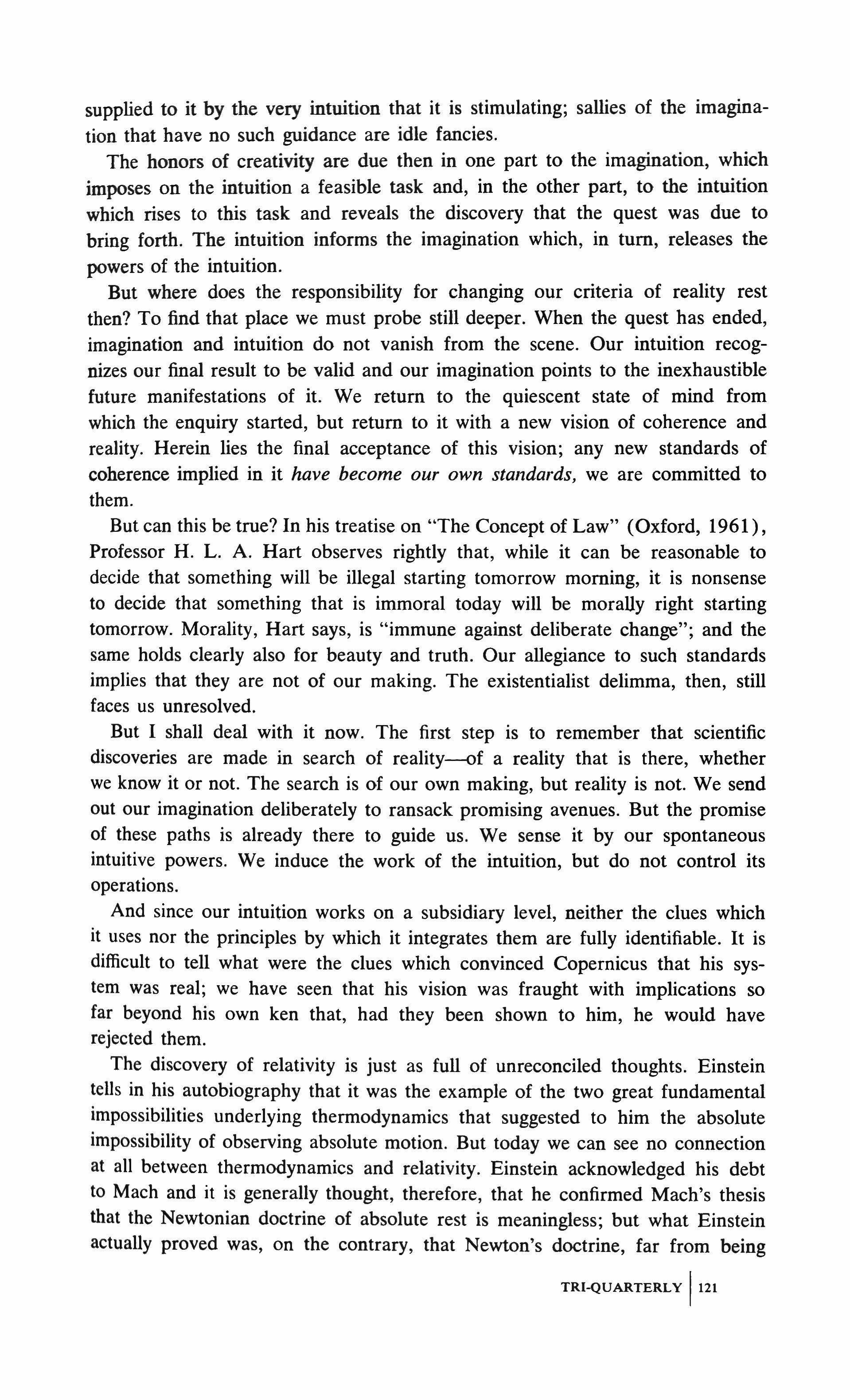
supplied to it by the very intuition that it is stimulating; sallies of the imagination that have no such guidance are idle fancies.
The honors of creativity are due then in one part to the imagination, which imposes on the intuition a feasible task and, in the other part, to the intuition which rises to this task and reveals the discovery that the quest was due to bring forth. The intuition informs the imagination which, in tum, releases the powers of the intuition.
But where does the responsibility for changing our criteria of reality rest then? To find that place we must probe still deeper. When the quest has ended, imagination and intuition do not vanish from the scene. Our intuition recognizes our final result to be valid and our imagination points to the inexhaustible future manifestations of it. We return to the quiescent state of mind from which the enquiry started, but return to it with a new vision of coherence and reality. Herein lies the final acceptance of this vision; any new standards of coherence implied in it have become our own standards, we are committed to them.
But can this be true? In his treatise on "The Concept of Law" (Oxford, 1961), Professor H. L. A. Hart observes rightly that, while it can be reasonable to decide that something will be illegal starting tomorrow morning, it is nonsense to decide that something that is immoral today will be morally right starting tomorrow. Morality, Hart says, is "immune against deliberate change"; and the same holds clearly also for beauty and truth. Our allegiance to such standards implies that they are not of our making. The existentialist delimma, then, still faces us unresolved.
But I shall deal with it now. The first step is to remember that scientific discoveries are made in search of reality--of a reality that is there, whether we know it or not. The search is of our own making, but reality is not. We send out our imagination deliberately to ransack promising avenues. But the promise of these paths is already there to guide us. We sense it by our spontaneous intuitive powers. We induce the work of the intuition, but do not control its operations.
And since our intuition works on a subsidiary level, neither the clues which it uses nor the principles by which it integrates them are fully identifiable. It is difficult to tell what were the clues which convinced Copernicus that his system was real; we have seen that his vision was fraught with implications so far beyond his own ken that, had they been shown to him, he would have rejected them.
The discovery of relativity is just as full of unreconciled thoughts. Einstein tells in his autobiography that it was the example of the two great fundamental impossibilities underlying thermodynamics that suggested to him the absolute impossibility of observing absolute motion. But today we can see no connection at all between thermodynamics and relativity. Einstein acknowledged his debt to Mach and it is generally thought, therefore, that he confirmed Mach's thesis that the Newtonian doctrine of absolute rest is meaningless; but what Einstein actually proved was, on the contrary, that Newton's doctrine, far from being
y 1121
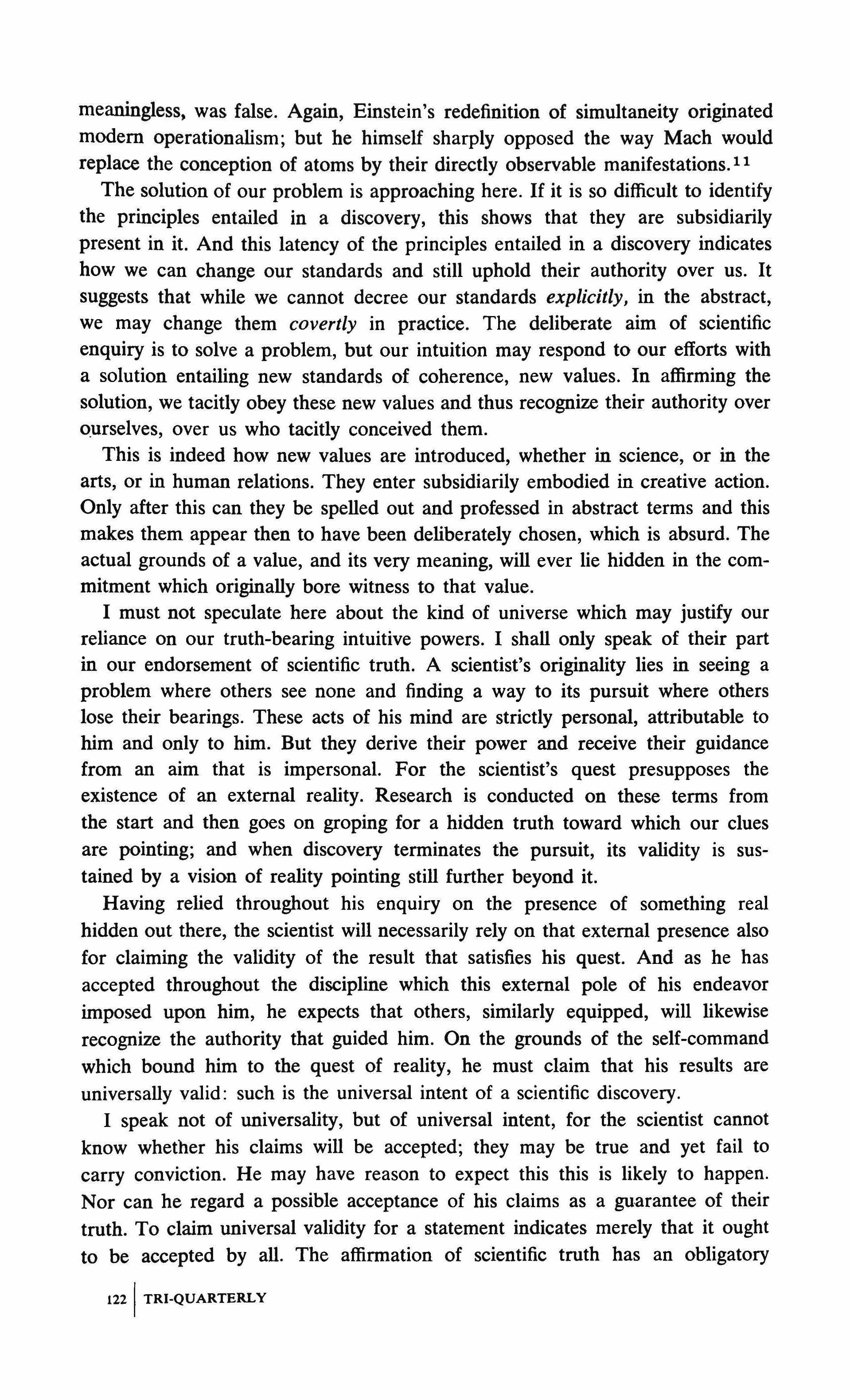
meaningless, was false. Again, Einstein's redefinition of simultaneity originated modem operationalism; but he himself sharply opposed the way Mach would replace the conception of atoms by their directly observable manifestations. 11
The solution of our problem is approaching here. If it is so difficult to identify the principles entailed in a discovery, this shows that they are subsidiarily present in it. And this latency of the principles entailed in a discovery indicates how we can change our standards and still uphold their authority over us. It suggests that while we cannot decree our standards explicitly, in the abstract, we may change them covertly in practice. The deliberate aim of scientific enquiry is to solve a problem, but our intuition may respond to our efforts with a solution entailing new standards of coherence, new values. In affirming the solution, we tacitly obey these new values and thus recognize their authority over ourselves, over us who tacitly conceived them.
This is indeed how new values are introduced, whether in science, or in the arts, or in human relations. They enter subsidiarily embodied in creative action. Only after this can they be spelled out and professed in abstract terms and this makes them appear then to have been deliberately chosen, which is absurd. The actual grounds of a value, and its very meaning, will ever lie hidden in the commitment which originally bore witness to that value.
I must not speculate here about the kind of universe which may justify our reliance on our truth-bearing intuitive powers. I shall only speak of their part in our endorsement of scientific truth. A scientist's originality lies in seeing a problem where others see none and finding a way to its pursuit where others lose their bearings. These acts of his mind are strictly personal, attributable to him and only to him. But they derive their power and receive their guidance from an aim that is impersonal. For the scientist's quest presupposes the existence of an external reality. Research is conducted on these terms from the start and then goes on groping for a hidden truth toward which our clues are pointing; and when discovery terminates the pursuit, its validity is sustained by a vision of reality pointing still further beyond it.
Having relied throughout his enquiry on the presence of something real hidden out there, the scientist will necessarily rely on that external presence also for claiming the validity of the result that satisfies his quest. And as he has accepted throughout the discipline which this external pole of his endeavor imposed upon him, he expects that others, similarly equipped, will likewise recognize the authority that guided him. On the grounds of the self-command which bound him to the quest of reality, he must claim that his results are universally valid: such is the universal intent of a scientific discovery.
I speak not of universality, but of universal intent, for the scientist cannot know whether his claims will be accepted; they may be true and yet fail to carry conviction. He may have reason to expect this this is likely to happen. Nor can he regard a possible acceptance of his claims as a guarantee of their truth. To claim universal validity for a statement indicates merely that it ought to be accepted by all. The affirmation of scientific truth has an obligatory

character which it shares with other valuations, declared universal by our own respect for them.
Both the anticipation of discovery and discovery itself may be a delusion. But it is futile to seek for explicit impersonal criteria of their valdity. The content of any empirical statement is three times indeterminate. It relies on clues which are largely unspecificable, integrates them by principles which are undefinable, and speaks of a reality which is inexhaustible. Attempts to eliminate these indeterminacies of science merely replace scientice by a meaningless fiction.
To accept science, in spite of its essential indeterminacies, is an act of our personal judgment. It is to share the kind of commitment on which scientists enter by undertaking an enquiry. You cannot formalize commitment, for you cannot express your commitment noncommitally; to attempt to do so is to perform the kind of analysis which destroys its subject matter.
We should be glad to recognize that science has come into existence by mental endowments akin to those in which all hopes of excellence are rooted, and that science rests ultimately on such intangible powers of our mind. This recognition will help to restore legitimacy to our convictions, which the specious ideals of strict exactitude and detachment have discredited.
These false ideals do no harm to physicists who only pay lip service to them, but they play havoc with other parts of science and with our whole culture, which try to live by them. They will be well lost for truer ideals of science, which will allow us once more to place first things first: the living above the inanimate, man above the animal, and man's duties above man.
1. See Copernicus, De Revolutionibus, Preface and Book I, Ch. 10.
2. Compo Copernicus, 1. C. Book I, Ch. 4.
3. Herbert Dingle, The Scientific Adventure, London (1952) p. 46.
4. See F. W. Snyder and N. H. Pronko, Vision with Spatial Inversion, Wichita, Kansas (1952). For fuller evidence and its interpretation in the sense given here, see Heinrich Kottenhoff, Was ist richllges Sehen mit Umkehrbrillen und In welchem Sinne stellt slch das Sehen um? Psychologia Universalis, Vol. 5 (1961).
5. Reference to Einstein's autobiography are based on Albert Einstein, "Biographical Notes" in Albert Einstein, Philosopher-Scientist, ed., P. A. Schilpp, New York, (1949) p. 53.
6. Adolpf GrUnbaum, Philosophical Problems of Space and Time, New York (1963), pp. 378-85.
7. See R. F. Hefferline et al, Science (1959) Vol. 130, pp. 1338-9. See also Science (1963) Vol. 139, pp. 834-5 and R. F. Hefferline "Learning Theory and Clinical Psychology" in Experimental Foundation of Clinical Psychology, ed. A. 1. Bachrach, New York (1962).
8. Arthur Koestler, The Sleepwalkers (1959), p. 334.
9. Ibid p. 316.
10. See my study "Passion and Controversy in Science," The Lancet, June 16th, 1956, or Personal Knowledge, 1958, pp. 150·160.
II. Albert Einstein, "Biographical Notes" in Albert Einstein, Philosopher-Scientist, ed. P. A. Schilpp, New York (1949), p. 49.
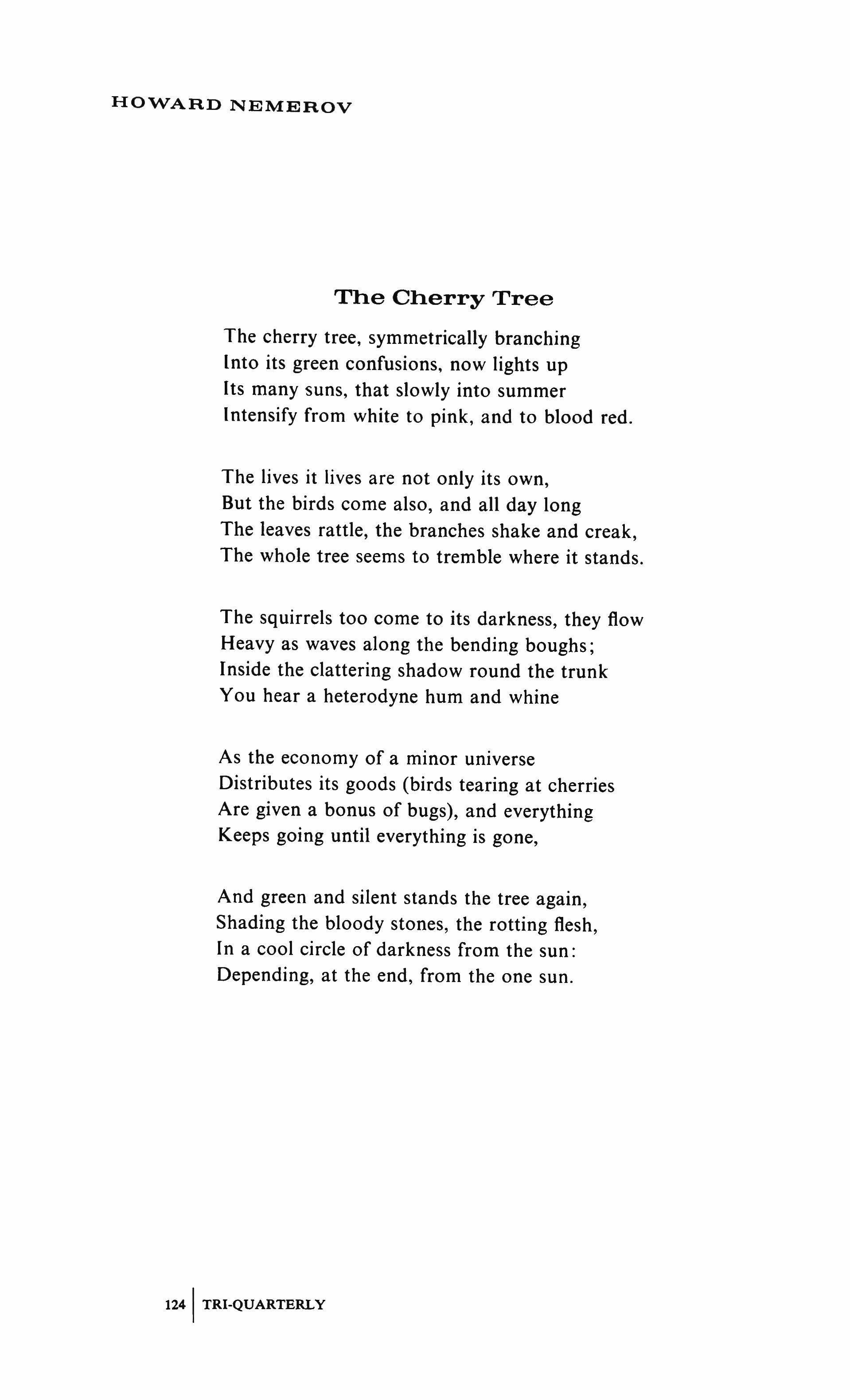
The cherry tree, symmetrically branching Into its green confusions, now lights up Its many suns, that slowly into summer Intensify from white to pink, and to blood red.
The lives it lives are not only its own, But the birds come also, and all day long The leaves rattle, the branches shake and creak, The whole tree seems to tremble where it stands.
The squirrels too come to its darkness, they flow Heavy as waves along the bending boughs; Inside the clattering shadow round the trunk You hear a heterodyne hum and whine
As the economy of a minor universe Distributes its goods (birds tearing at cherries Are given a bonus of bugs), and everything Keeps going until everything is gone,
And green and silent stands the tree again, Shading the bloody stones, the rotting flesh, In a cool circle of darkness from the sun: Depending, at the end, from the one sun.
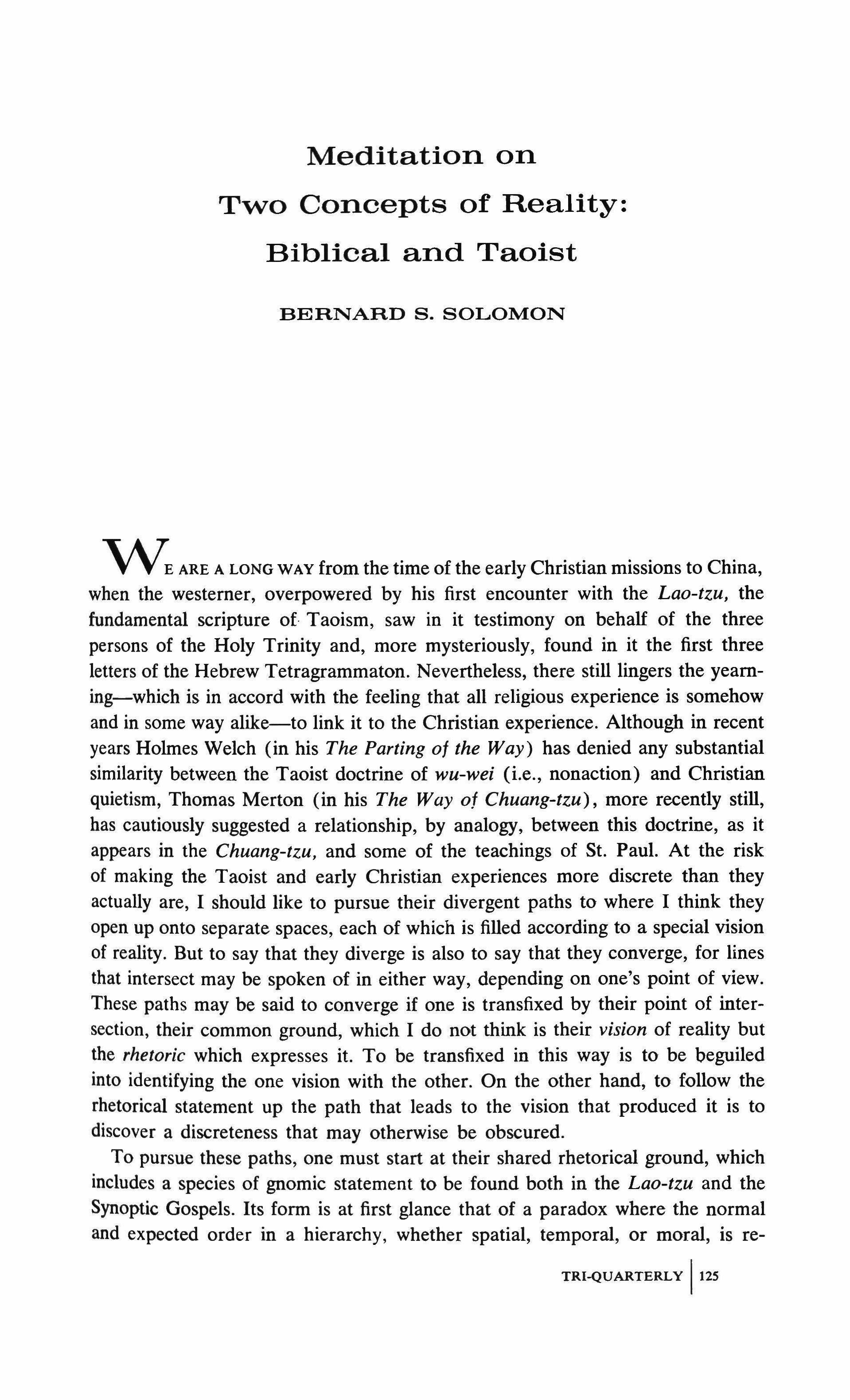
W.ARE A LONG WAY from the time of the early Christian missions to China, when the westerner, overpowered by his first encounter with the Lao-tzu, the fundamental scripture of. Taoism, saw in it testimony on behalf of the three persons of the Holy Trinity and, more mysteriously, found in it the first three letters of the Hebrew Tetragrammaton. Nevertheless, there still lingers the yearning-which is in accord with the feeling that all religious experience is somehow and in some way alike-to link it to the Christian experience. Although in recent years Holmes Welch (in his The Parting of the Way) has denied any substantial similarity between the Taoist doctrine of wu-wei (i.e., nonaction) and Christian quietism, Thomas Merton (in his The Way of Chuang-tzu}, more recently still, has cautiously suggested a relationship, by analogy, between this doctrine, as it appears in the Chuang-tzu, and some of the teachings of St. Paul. At the risk of making the Taoist and early Christian experiences more discrete than they actually are, I should like to pursue their divergent paths to where I think they open up onto separate spaces, each of which is filled according to a special vision of reality. But to say that they diverge is also to say that they converge, for lines that intersect may be spoken of in either way, depending on one's point of view. These paths may be said to converge if one is transfixed by their point of intersection, their common ground, which I do not think is their vision of reality but the rhetoric which expresses it. To be transfixed in this way is to be beguiled into identifying the one vision with the other. On the other hand, to follow the rhetorical statement up the path that leads to the vision that produced it is to discover a discreteness that may otherwise be obscured.
To pursue these paths, one must start at their shared rhetorical ground, which includes a species of gnomic statement to be found both in the Lao-tzu and the Synoptic Gospels. Its form is at first glance that of a paradox where the normal and expected order in a hierarchy, whether spatial, temporal, or moral, is re-
TRI-QUARTERLy 112s

versed. The effect of such a statement is to attract the attention of the reader by startling him, and to leave him finally with the feeling of having been initiated. I shall not, therefore, discuss such parallel statements in these works as "For my yoke is easy, and my burden is light," (Matthew 11 :30) and "My words are easy to understand; and easy to practise too." (Lao-tzu 70), for these do not reverse any normal order or system of priorities, although they may beguile the reader equally well into seeing similarity where there actually may be none. Rather, I shall discuss such statements as "If any man desire to be first, the same shall be last of all," (Mark 9:35) which can be paired with "The wise man places himself last. And so becomes the first of all." (Lao-tzu 7). Or, "Blessed are the meek: for they shall inherit the earth," (Matthew 5:5) which can be paired with "The weak can overcome the strong and the soft the hard." (Lao-tzu 78). I should like to argue that these statements originate, respectively, in two different experiences of the world and are, in fact, invitations to pursue different ways of life; for the theme, for example, that the first shall be last and the last first engages the Christian who utters it in a natural order to which he is committed, where there are firsts and lasts, and confronts him at that very moment with their reversal, which is by a Will which stands at the convergence of infinite good and infinite power; it engages the Taoist who utters it in an order to which he is only tenuously committed, so that he may easily slip past it to a higher order in which the dualities in the utterance are overcome, where there are no firsts or lasts.
I should like to argue also that many of these Christian aphorisms, while superficially paradoxes of the type discussed, are actually generalizations of Old Testament themes and stand in the same relation to them as the Greek generalization of the area of a circle stands to all the empirical directions for finding it. And if they are actually generalizations of Old Testament themes as I shall attempt to show they point to a fundamental view of life and the world which scarcely resembles the view to which their counterpart statements in the Lao-tzu point, nor are their ideas difficult to understand, for they are formulated by, and directed toward, the already initiated. And if the form of these statements is what in part attracts the comparison with the Lao-tzu paradox, it should be noted that the form is merely the natural results of the statements' rendering, in generalized form, of themes which deal with peripety or the reversal of the fortunes of man, or the laws of nature or of society. Thus, the statement that "many that are first shall be last; and the last first" (Mark 10:31) is the attenuated and generalized form of a theme of reversal and hence resembles a paradox. These statements, therefore, are no more nor less startling than the theme of the barren woman in the Old Testament represented in the stories of Sarah, Rebecca, and Rachel (Gen. 18: 11, 25: 21, 29: 31) or the theme of the younger son represented in the story of Esau and Jacob, or the theme of the encounter between strength and weakness represented in the story of David and Goliath. These themes of reversal point past the historical objectivity of the persons whose names are used to carry out the themes to an experience of man and the world which is their common ground. This experience, or feeling if you wish, was that

the order which we perceive in the world together with its laws, of whatever sort, whether biological, or social, or physical are not ultimate nor are they self-existent, for God can reverse them if he chooses. Therefore the barren woman (Sarah, Rebecca, Rachel), doomed by the formula that barren women cannot conceive, conceives; the younger son (Jacob), disinherited by the law of primogeniture, inherits; the weak (David), at the mercy of the strong, prevail. Thus, God's general is chosen from among "the least in (his) father's house" (Gideon, Judges 6:15), his spokesman from among the tongue-tied or the stutterers (Moses, Exodus 4: 10), those he appoints as deliverers (Joseph, Moses) from among those sold into slavery or set adrift in a basket to await deliverance, those he appoints as rebukers of kings from among the common people (Nathan, II Samuel 12). These themes of reversal streaming through the Old Testament converge in a great flood in the New where they emerge in the Beatitudes as "Blessed are the meek for they shall inherit the earth," and in the doctrine of the Virgin Birth (a reversal of the biological law), which is an extension of, and a variation on, the theme of the barren woman in the Old Testament. The doctrine of the Incarnation itself may be seen as the reversal of the Jewish doctrine that God is not a man, or any other creature, a view the Jews came to perhaps slowly from first viewing him as a landlord in the Garden of Eden to sensing him finally as a "still, small voice" (I Kings 19: 12) in the heart of man.
In short, these Christian statements of reversal were born in an older experience which dramatically denied that the ultimate ground of existence was a law and nothing more, that it was mechanical and merely operated, inexorably grinding out its creatures and injuring those who could not find its loopholes or interstices.
When we tum to the Chinese experience and its Taoist variation, two early themes of reversal, now associated with Confucianism, suggest themselves. The first is that of the Mandate of Heaven; the second is that of yielding the throne. At the point at which the doctrine of the Mandate of Heaven operates the outs become ins and the ins outs. In short, it reverses the fortunes of rulers. One may argue here that it does not merely "operate", but is a response on the part of Heaven to the ruler's lack of virtue, and thus it is Heaven that is reversing men's fortunes through the exercise of its will in much the same way that God reverses the laws of natural and human activity in the Old Testament through the exercise of His will. However, I have used the word "operate" because it seems that the doctrine of the Mandate of Heaven is ultimately thought of as subject to a law, namely the law that it will inevitably assert itself whenever the conditions demand it. If this is so, whatever intimations of God there are in the concept of Heaven yield finally to intimations of activity unvarying in its response to certain conditions. If there is any truth in this statement, Heaven and God in this case, at least, are not synonymous, for both in scripture and in tradition, after everything that can be said about God has been said about Him, He is left with His will, which can undermine all statements about His use of it. Understood in this way, the theme inherent in the doctrine, when generalized as the statement "the first shall be last and the last shall be first" engages the person TRI-QUARTERLy 1127
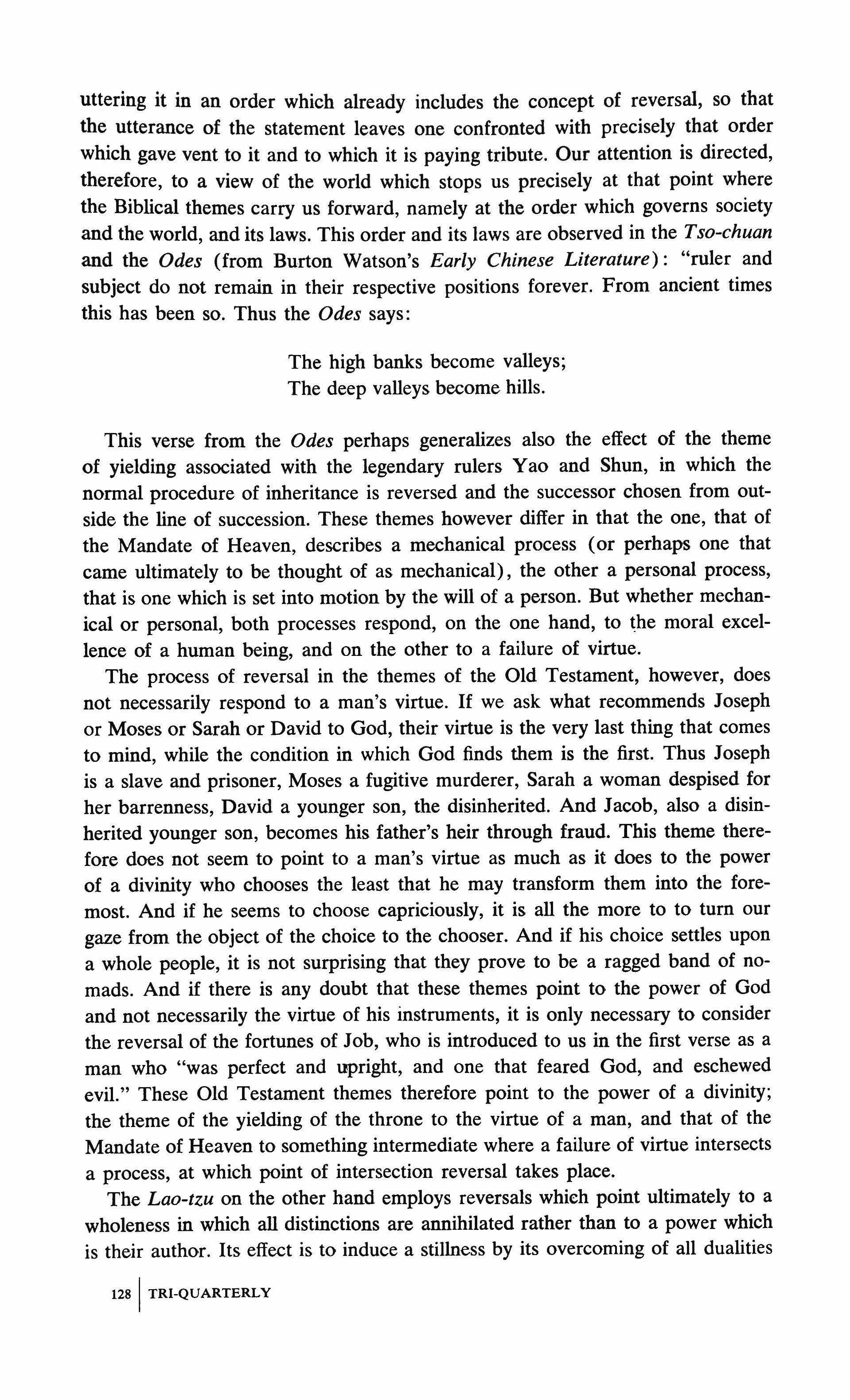
uttering it in an order which already includes the concept of reversal, so that the utterance of the statement leaves one confronted with precisely that order which gave vent to it and to which it is paying tribute. Our attention is directed, therefore, to a view of the world which stops us precisely at that point where the Biblical themes carry us forward, namely at the order which governs society and the world, and its laws. This order and its laws are observed in the Tso-chuan and the Odes (from Burton Watson's Early Chinese Literature): "ruler and subject do not remain in their respective positions forever. From ancient times this has been so. Thus the Odes says:
The high banks become valleys; The deep valleys become hills.
This verse from the Odes perhaps generalizes also the effect of the theme of yielding associated with the legendary rulers Yao and Shun, in which the normal procedure of inheritance is reversed and the successor chosen from outside the line of succession. These themes however differ in that the one, that of the Mandate of Heaven, describes a mechanical process (or perhaps one that came ultimately to be thought of as mechanical), the other a personal process, that is one which is set into motion by the will of a person. But whether mechanical or personal, both processes respond, on the one hand, to the moral excellence of a human being, and on the other to a failure of virtue.
The process of reversal in the themes of the Old Testament, however, does not necessarily respond to a man's virtue. If we ask what recommends Joseph or Moses or Sarah or David to God, their virtue is the very last thing that comes to mind, while the condition in which God finds them is the first. Thus Joseph is a slave and prisoner, Moses a fugitive murderer, Sarah a woman despised for her barrenness, David a younger son, the disinherited. And Jacob, also a disinherited younger son, becomes his father's heir through fraud. This theme therefore does not seem to point to a man's virtue as much as it does to the power of a divinity who chooses the least that he may transform them into the foremost. And if he seems to choose capriciously, it is all the more to to turn our gaze from the object of the choice to the chooser. And if his choice settles upon a whole people, it is not surprising that they prove to be a ragged band of nomads. And if there is any doubt that these themes point to the power of God and not necessarily the virtue of his instruments, it is only necessary to consider the reversal of the fortunes of Job, who is introduced to us in the first verse as a man who "was perfect and upright, and one that feared God, and eschewed evil." These Old Testament themes therefore point to the power of a divinity; the theme of the yielding of the throne to the virtue of a man, and that of the Mandate of Heaven to something intermediate where a failure of virtue intersects a process, at which point of intersection reversal takes place.
The Lao-tzu on the other hand employs reversals which point ultimately to a wholeness in which all distinctions are annihilated rather than to a power which is their author. Its effect is to induce a stillness by its overcoming of all dualities
TRI-QVARTERLY
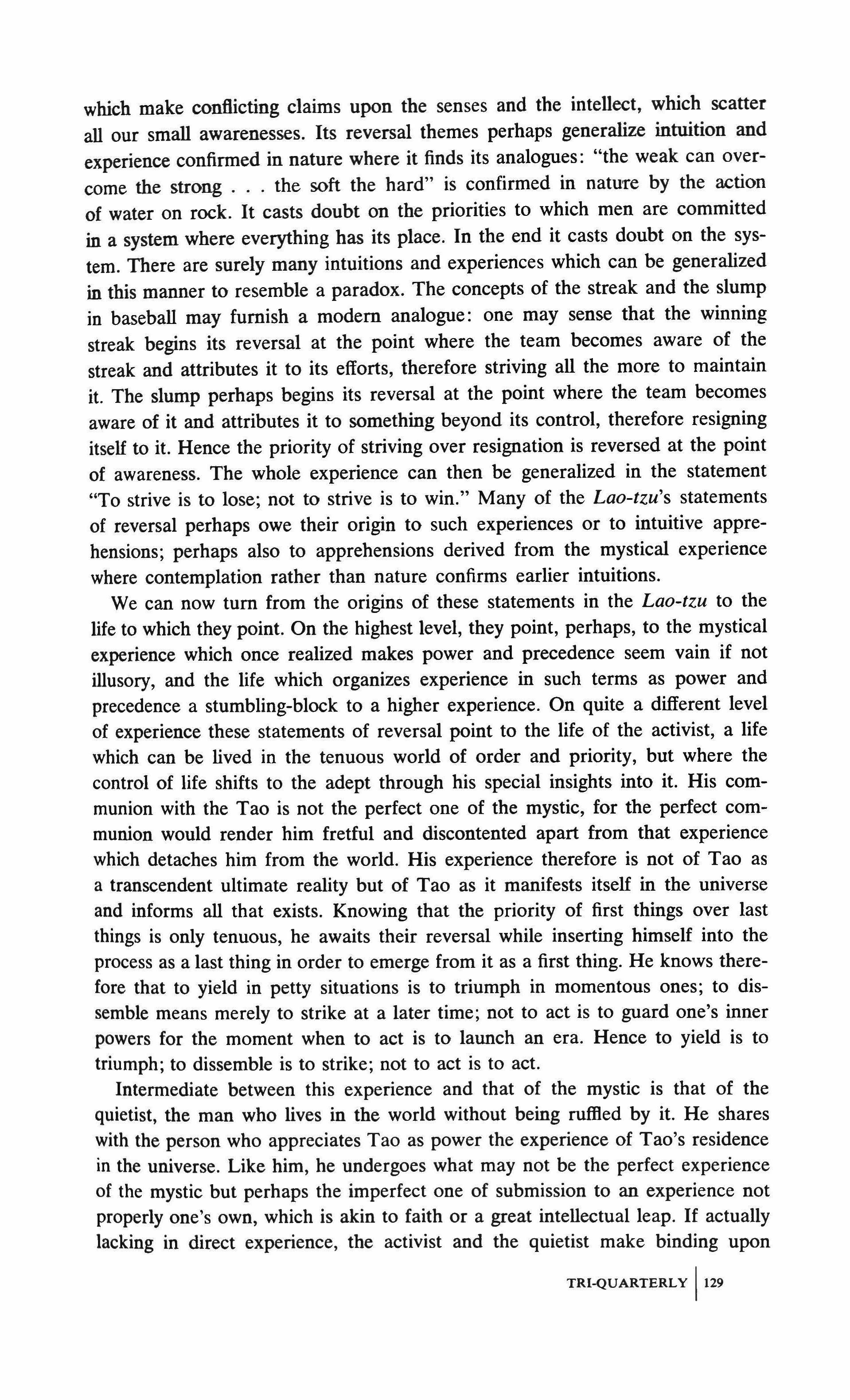
which make conflicting claims upon the senses and the intellect, which scatter all our small awarenesses. Its reversal themes perhaps generalize intuition and experience confirmed in nature where it finds its analogues: "the weak can overcome the strong the soft the hard" is confirmed in nature by the action of water on rock. It casts doubt on the priorities to which men are committed in a system where everything has its place. In the end it casts doubt on the system. There are surely many intuitions and experiences which can be generalized in this manner to resemble a paradox. The concepts of the streak and the slump in baseball may furnish a modem analogue: one may sense that the winning streak begins its reversal at the point where the team becomes aware of the streak and attributes it to its efforts, therefore striving all the more to maintain it. The slump perhaps begins its reversal at the point where the team becomes aware of it and attributes it to something beyond its control, therefore resigning itself to it. Hence the priority of striving over resignation is reversed at the point of awareness. The whole experience can then be generalized in the statement "To strive is to lose; not to strive is to win." Many of the Lao-tzu's statements of reversal perhaps owe their origin to such experiences or to intuitive apprehensions; perhaps also to apprehensions derived from the mystical experience where contemplation rather than nature confirms earlier intuitions. We can now tum from the origins of these statements in the Lao-tzu to the life to which they point. On the highest level, they point, perhaps, to the mystical experience which once realized makes power and precedence seem vain if not illusory, and the life which organizes experience in such terms as power and precedence a stumbling-block to a higher experience. On quite a different level of experience these statements of reversal point to the life of the activist, a life which can be lived in the tenuous world of order and priority, but where the control of life shifts to the adept through his special insights into it. His communion with the Tao is not the perfect one of the mystic, for the perfect communion would render him fretful and discontented apart from that experience which detaches him from the world. His experience therefore is not of Tao as a transcendent ultimate reality but of Tao as it manifests itself in the universe and informs all that exists. Knowing that the priority of first things over last things is only tenuous, he awaits their reversal while inserting himself into the process as a last thing in order to emerge from it as a first thing. He knows therefore that to yield in petty situations is to triumph in momentous ones; to dissemble means merely to strike at a later time; not to act is to guard one's inner powers for the moment when to act is to launch an era. Hence to yield is to triumph; to dissemble is to strike; not to act is to act.
Intermediate between this experience and that of the mystic is that of the quietist, the man who lives in the world without being ruffled by it. He shares with the person who appreciates Tao as power the experience of Tao's residence in the universe. Like him, he undergoes what may not be the perfect experience of the mystic but perhaps the imperfect one of submission to an experience not properly one's own, which is akin to faith or a great intellectual leap. If actually lacking in direct experience, the activist and the quietist make binding upon TRI-QUARTERLy 1129
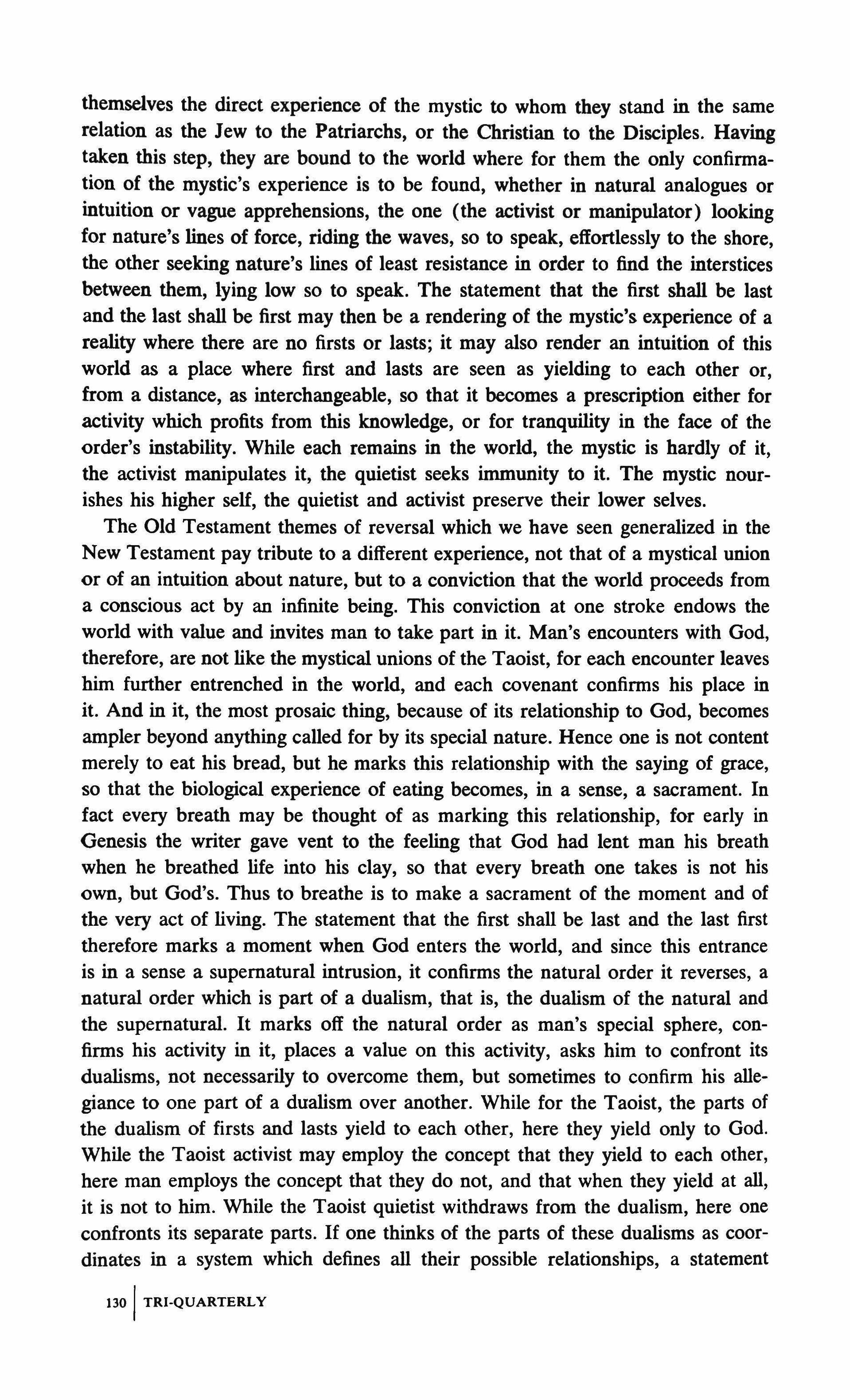
themselves the direct experience of the mystic to whom they stand in the same relation as the Jew to the Patriarchs, or the Christian to the Disciples. Having taken this step, they are bound to the world where for them the only confirmation of the mystic's experience is to be found, whether in natural analogues or intuition or vague apprehensions, the one (the activist or manipulator) looking for nature's lines of force, riding the waves, so to speak, effortlessly to the shore, the other seeking nature's lines of least resistance in order to find the interstices between them, lying low so to speak. The statement that the first shall be last and the last shall be first may then be a rendering of the mystic's experience of a reality where there are no firsts or lasts; it may also render an intuition of this world as a place where first and lasts are seen as yielding to each other or, from a distance, as interchangeable, so that it becomes a prescription either for activity which profits from this knowledge, or for tranquility in the face of the order's instability. While each remains in the world, the mystic is hardly of it, the activist manipulates it, the quietist seeks immunity to it. The mystic nourishes his higher self, the quietist and activist preserve their lower selves.
The Old Testament themes of reversal which we have seen generalized in the New Testament pay tribute to a different experience, not that of a mystical union or of an intuition about nature, but to a conviction that the world proceeds from a conscious act by an infinite being. This conviction at one stroke endows the world with value and invites man to take part in it. Man's encounters with God, therefore, are not like the mystical unions of the Taoist, for each encounter leaves him further entrenched in the world, and each covenant confirms his place in it. And in it, the most prosaic thing, because of its relationship to God, becomes ampler beyond anything called for by its special nature. Hence one is not content merely to eat his bread, but he marks this relationship with the saying of grace, so that the biological experience of eating becomes, in a sense, a sacrament. In fact every breath may be thought of as marking this relationship, for early in Genesis the writer gave vent to the feeling that God had lent man his breath when he breathed life into his clay, so that every breath one takes is not his own, but God's. Thus to breathe is to make a sacrament of the moment and of the very act of living. The statement that the first shall be last and the last first therefore marks a moment when God enters the world, and since this entrance is in a sense a supernatural intrusion, it confirms the natural order it reverses, a natural order which is part of a dualism, that is, the dualism of the natural and the supernatural. It marks off the natural order as man's special sphere, confirms his activity in it, places a value on this activity, asks him to confront its dualisms, not necessarily to overcome them, but sometimes to confirm his allegiance to one part of a dualism over another. While for the Taoist, the parts of the dualism of firsts and lasts yield to each other, here they yield only to God. While the Taoist activist may employ the concept that they yield to each other, here man employs the concept that they do not, and that when they yield at all, it is not to him. While the Taoist quietist withdraws from the dualism, here one confronts its separate parts. If one thinks of the parts of these dualisms as coordinates in a system which defines all their possible relationships, a statement
about their reversal when uttered by a Taoist refers us to a system altogether different from that to which the statement refers when uttered by a Hebrew or an early Christian. These statements therefore are only formally similar, not substantially similar. And if we juxtapose such formally similar statements when they appear in these different experiences, we probably bring out no more than a similarity in the rhetorical techniques which employed them, rather than in the visions of reality which produced them.
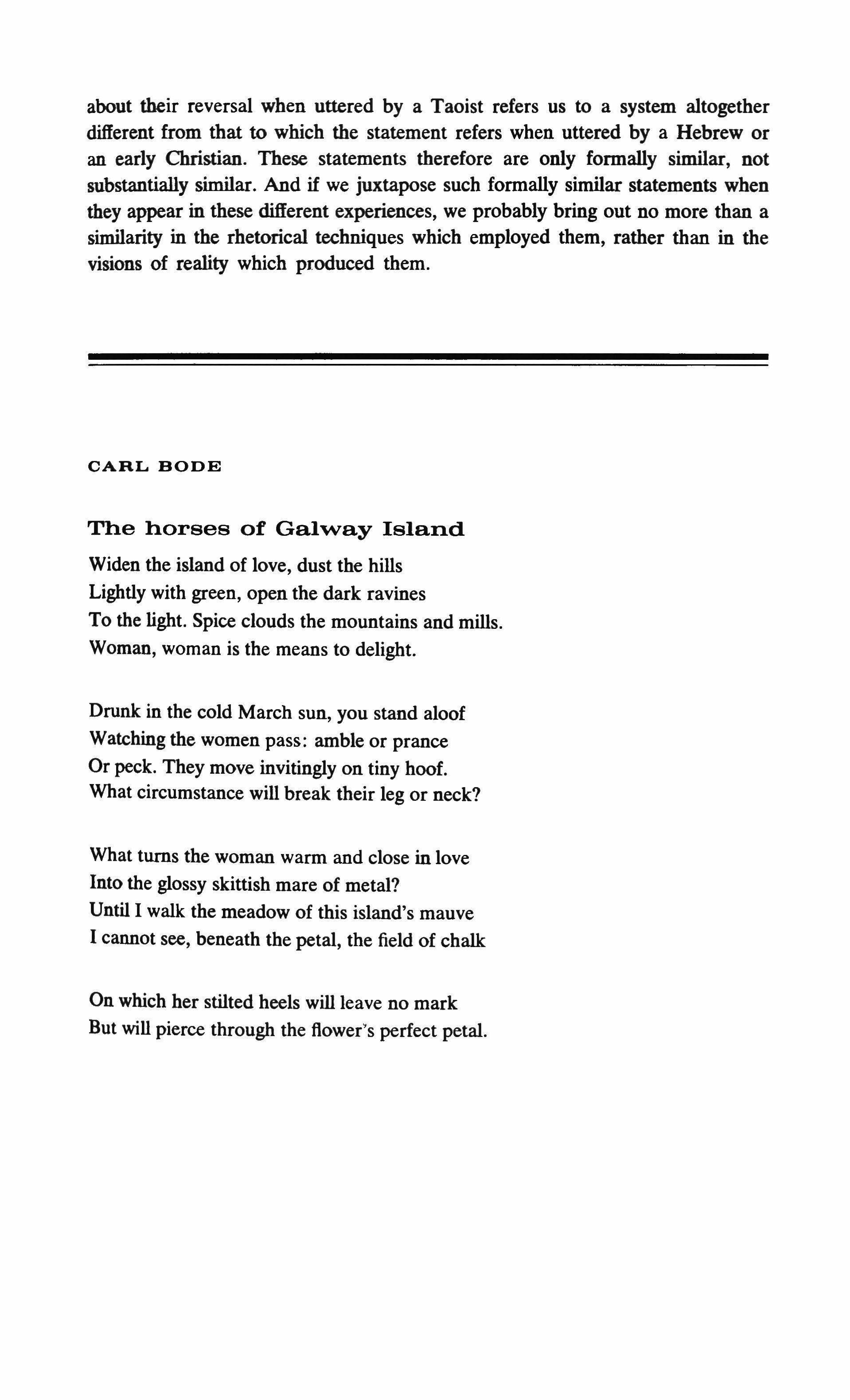
Widen the island of love, dust the hills
Lightly with green, open the dark ravines
To the light. Spice clouds the mountains and mills. Woman, woman is the means to delight.
Drunk in the cold March sun, you stand aloof
Watching the women pass: amble or prance Or peck. They move invitingly on tiny hoof. What circumstance will break their leg or neck?
What turns the woman warm and close in love
Into the glossy skittish mare of metal?
Until I walk the meadow of this island's mauve
I cannot see, beneath the petal, the field of chalk
On which her stilted heels will leave no mark But will pierce through the flower's perfect petal.
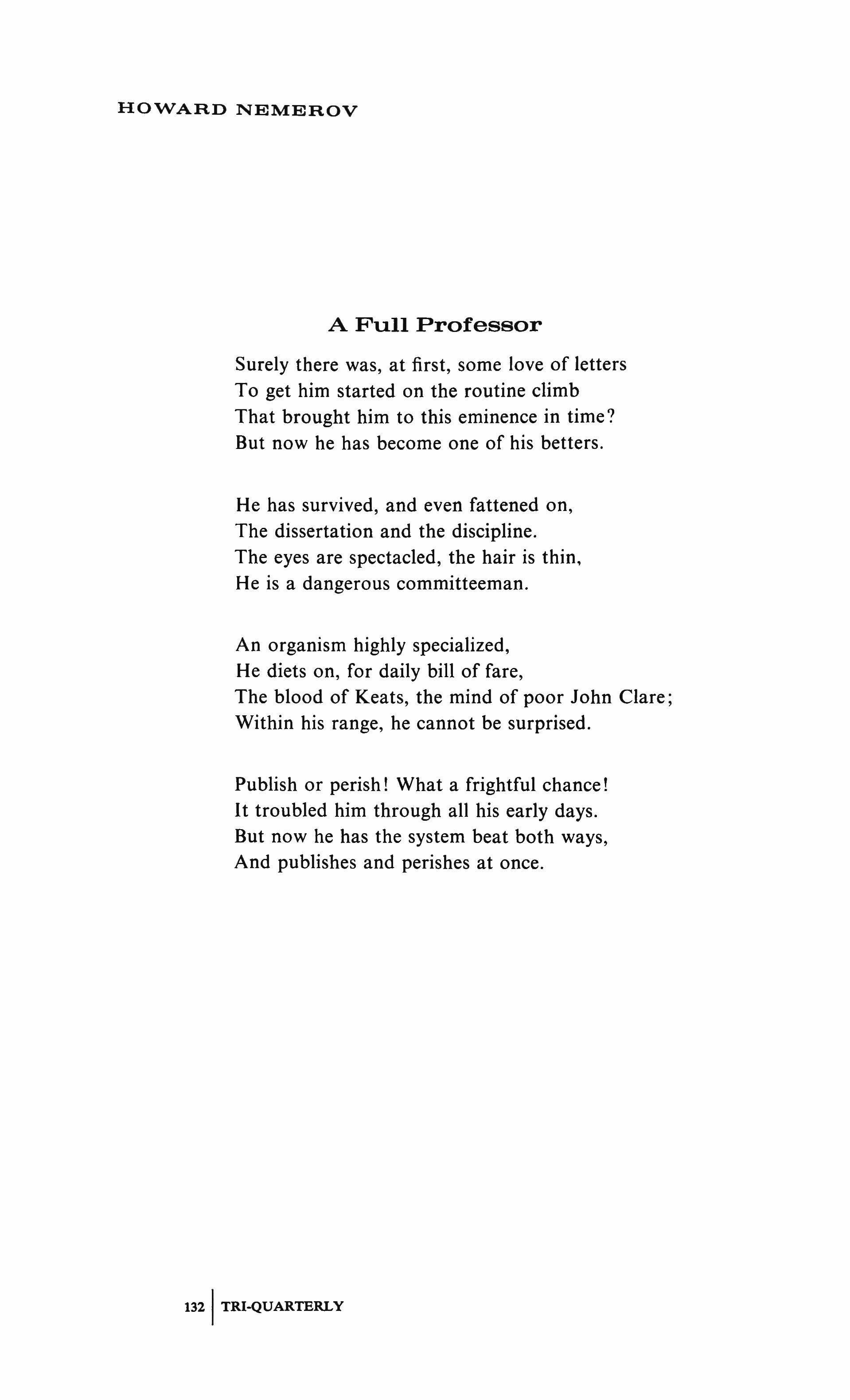
Surely there was, at first, some love of letters
To get him started on the routine climb That brought him to this eminence in time? But now he has become one of his betters.
He has survived, and even fattened on, The dissertation and the discipline. The eyes are spectacled, the hair is thin. He is a dangerous committeeman.
An organism highly specialized, He diets on, for daily bill of fare, The blood of Keats, the mind of poor John Clare; Within his range, he cannot be surprised.
Publish or perish! What a frightful chance! It troubled him through all his early days. But now he has the system beat both ways, And publishes and perishes at once.

"It is all so magnificent, so universal, so absolutely Greek."
IDON'T SUPPOSE I shall ever write a college novel, or even begin an academic one. I do have a hero, though, and a man can always dream.
It was on a summer day, quite a few years ago, that I first ran into this character; well, maybe ran isn't quite the word, for at the time I was idly making my way through some back issues of the Bulletin of the American Association of University Professors, a journal whose running-index must be slightly less interesting than, even, that of The Excursion, though perhaps for different reasons.
Indeed faithful readers of the Bulletin must often be reminded of the occasion, some years ago, when Professor Pottle remarked that The Excursion was as absorbing as a novel. This judgment so startled the late Professor Tucker Brooke, it is said, that he cried out (inadvertently, one supposes, considering the decorum that has defined Yale since, roughly, the passing of the late, great John Humperdink "Dink" Stover ): "What novel?"
If you should ask, then, what the Bulletin has to engage a man's attention, I guess I would have to say that out around Paoli (which is where I was) one summer day is pretty much like another, except, perhaps, when a Morris or a Cadwalader can be found to have done something public; e.g., to have died. And though in Philadelphia nearly everybody reads their Bulletin, still not even in Philadelphia does one spend all day in a newspaper. There are events of importance, of significance that simply aren't covered by newspapers; or at least haven't been covered in Philadelphia since the North American and the Public Ledger (the morning one, that is) suspended publication in, respectively, 1925 and 1934.
So it happens, on the day in question I was trying to find out whatever had been done about the deplorable situation at East Tennessee State, at Murfreesboro (the birthplace of Professor Andrew Nelson Lytle), which had so shocked the profession when it had been reported in the Bulletin in 1942. Suddenly, as I went by this article and that, I came on one about the recruitment of qualiTRI-QUARTERLy 1133
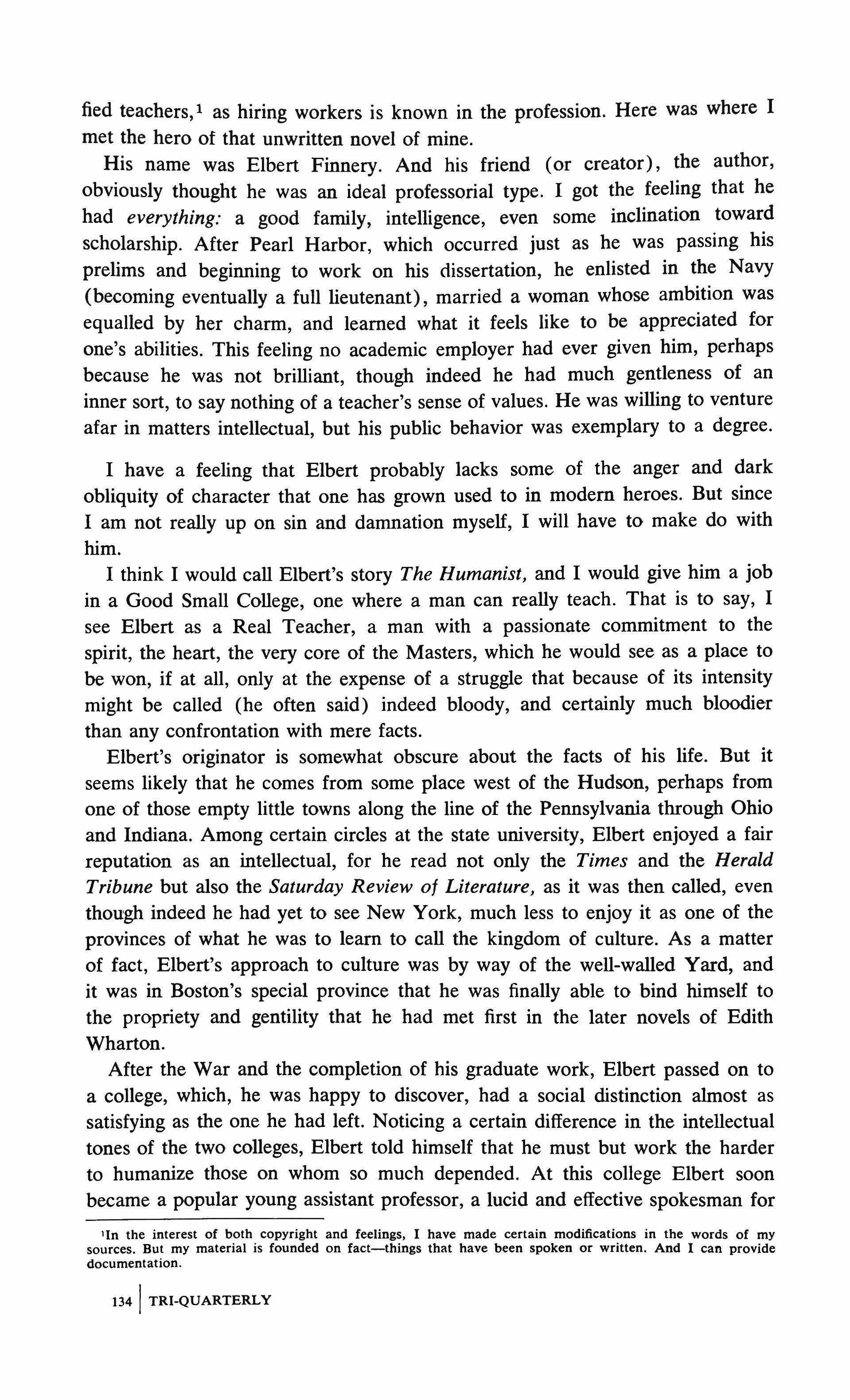
fied teachers.! as hiring workers is known in the profession. Here was where I met the hero of that unwritten novel of mine.
His name was Elbert Finnery. And his friend (or creator), the author, obviously thought he was an ideal professorial type. I got the feeling that he had everything: a good family, intelligence, even some inclination toward scholarship. After Pearl Harbor, which occurred just as he was passing his prelims and beginning to work on his dissertation, he enlisted in the Navy (becoming eventually a full lieutenant), married a woman whose ambition was equalled by her charm, and learned what it feels like to be appreciated for one's abilities. This feeling no academic employer had ever given him, perhaps because he was not brilliant, though indeed he had much gentleness of an inner sort, to say nothing of a teacher's sense of values. He was willing to venture afar in matters intellectual, but his public behavior was exemplary to a degree.
I have a feeling that Elbert probably lacks some of the anger and dark obliquity of character that one has grown used to in modem heroes. But since I am not really up on sin and damnation myself, I will have to make do with him.
I think I would call Elbert's story The Humanist, and I would give him a job in a Good Small College, one where a man can really teach. That is to say, I see Elbert as a Real Teacher, a man with a passionate commitment to the spirit, the heart, the very core of the Masters, which he would see as a place to be won, if at all, only at the expense of a struggle that because of its intensity might be called (he often said) indeed bloody, and certainly much bloodier than any confrontation with mere facts.
Elbert's originator is somewhat obscure about the facts of his life. But it seems likely that he comes from some place west of the Hudson, perhaps from one of those empty little towns along the line of the Pennsylvania through Ohio and Indiana. Among certain circles at the state university, Elbert enjoyed a fair reputation as an intellectual, for he read not only the Times and the Herald Tribune but also the Saturday Review of Literature, as it was then called, even though indeed he had yet to see New York, much less to enjoy it as one of the provinces of what he was to learn to call the kingdom of culture. As a matter of fact, Elbert's approach to culture was by way of the well-walled Yard, and it was in Boston's special province that he was finally able to bind himself to the propriety and gentility that he had met first in the later novels of Edith Wharton.
After the War and the completion of his graduate work, Elbert passed on to a college, which, he was happy to discover, had a social distinction almost as satisfying as the one he had left. Noticing a certain difference in the intellectual tones of the two colleges, Elbert told himself that he must but work the harder to humanize those on whom so much depended. At this college Elbert soon became a popular young assistant professor, a lucid and effective spokesman for
'In the interest of both copyright and feelings, I have made certain modifications in the words of my sources. But my material is founded on fact-things that have been spoken or written. And I can provide documentation.
TRI-QUARTERLY
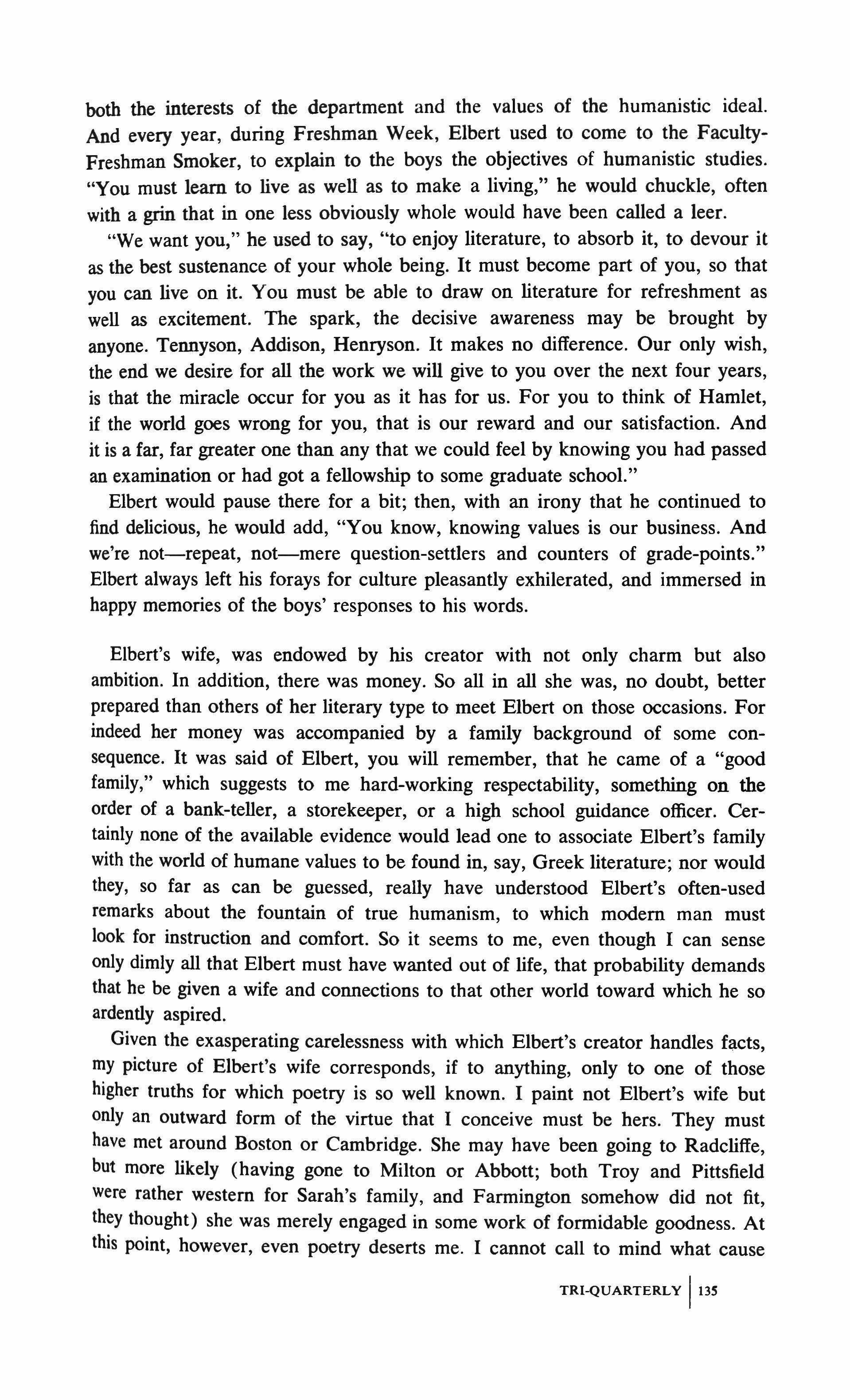
both the interests of the department and the values of the humanistic ideal. And every year, during Freshman Week, Elbert used to come to the FacultyFreshman Smoker, to explain to the boys the objectives of humanistic studies. "You must learn to live as well as to make a living," he would chuckle, often with a grin that in one less obviously whole would have been called a leer. "We want you," he used to say, "to enjoy literature, to absorb it, to devour it as the best sustenance of your whole being. It must become part of you, so that you can live on it. You must be able to draw on literature for refreshment as well as excitement. The spark, the decisive awareness may be brought by anyone. Tennyson, Addison, Henryson. It makes no difference. Our only wish, the end we desire for all the work we will give to you over the next four years, is that the miracle occur for you as it has for us. For you to think of Hamlet, if the world goes wrong for you, that is our reward and our satisfaction. And it is a far, far greater one than any that we could feel by knowing you had passed an examination or had got a fellowship to some graduate school."
Elbert would pause there for a bit; then, with an irony that he continued to find delicious, he would add, "You know, knowing values is our business. And we're not-repeat, not-mere question-settlers and counters of grade-points." Elbert always left his forays for culture pleasantly exhilerated, and immersed in happy memories of the boys' responses to his words.
Elbert's wife, was endowed by his creator with not only charm but also ambition. In addition, there was money. So all in all she was, no doubt, better prepared than others of her literary type to meet Elbert on those occasions. For indeed her money was accompanied by a family background of some consequence. It was said of Elbert, you will remember, that he came of a "good family," which suggests to me hard-working respectability, something on the order of a bank-teller, a storekeeper, or a high school guidance officer. Certainly none of the available evidence would lead one to associate Elbert's family with the world of humane values to be found in, say, Greek literature; nor would they, so far as can be guessed, really have understood Elbert's often-used remarks about the fountain of true humanism, to which modem man must look for instruction and comfort. So it seems to me, even though I can sense only dimly all that Elbert must have wanted out of life, that probability demands that he be given a wife and connections to that other world toward which he so ardently aspired.
Given the exasperating carelessness with which Elbert's creator handles facts, my picture of Elbert's wife corresponds, if to anything, only to one of those higher truths for which poetry is so well known. I paint not Elbert's wife but only an outward form of the virtue that I conceive must be hers. They must have met around Boston or Cambridge. She may have been going to Radcliffe, but more likely (having gone to Milton or Abbott; both Troy and Pittsfield were rather western for Sarah's family, and Farmington somehow did not fit, they thought) she was merely engaged in some work of formidable goodness. At this point, however, even poetry deserts me. I cannot call to mind what cause
TRI-QUARTERLY 1135
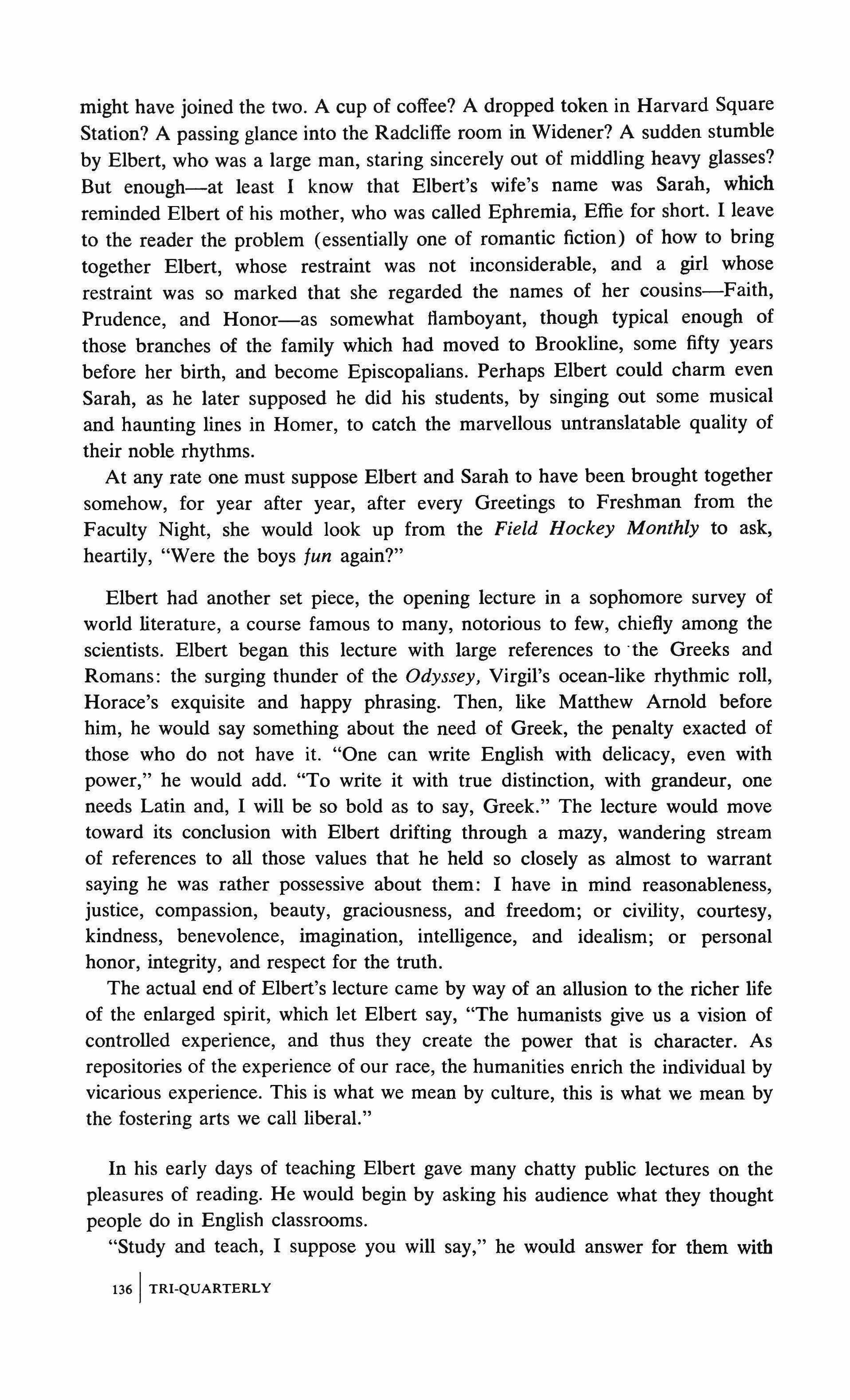
might have joined the two. A cup of coffee? A dropped token in Harvard Square Station? A passing glance into the Radcliffe room in Widener? A sudden stumble by Elbert, who was a large man, staring sincerely out of middling heavy glasses? But enough-at least I know that Elbert's wife's name was Sarah, which reminded Elbert of his mother, who was called Ephremia, Effie for short. I leave to the reader the problem (essentially one of romantic fiction) of how to bring together Elbert, whose restraint was not inconsiderable, and a girl whose restraint was so marked that she regarded the names of her cousins-Faith, Prudence, and Honor-as somewhat flamboyant, though typical enough of those branches of the family which had moved to Brookline, some fifty years before her birth, and become Episcopalians. Perhaps Elbert could charm even Sarah, as he later supposed he did his students, by singing out some musical and haunting lines in Homer, to catch the marvellous untranslatable quality of their noble rhythms.
At any rate one must suppose Elbert and Sarah to have been brought together somehow, for year after year, after every Greetings to Freshman from the Faculty Night, she would look up from the Field Hockey Monthly to ask, heartily, "Were the boys fun again?"
Elbert had another set piece, the opening lecture in a sophomore survey of world literature, a course famous to many, notorious to few, chiefly among the scientists. Elbert began this lecture with large references to' the Greeks and Romans: the surging thunder of the Odyssey, Virgil's ocean-like rhythmic roll, Horace's exquisite and happy phrasing. Then, like Matthew Arnold before him, he would say something about the need of Greek, the penalty exacted of those who do not have it. "One can write English with delicacy, even with power," he would add. "To write it with true distinction, with grandeur, one needs Latin and, I will be so bold as to say, Greek." The lecture would move toward its conclusion with Elbert drifting through a mazy, wandering stream of references to all those values that he held so closely as almost to warrant saying he was rather possessive about them: I have in mind reasonableness, justice, compassion, beauty, graciousness, and freedom; or civility, courtesy, kindness, benevolence, imagination, intelligence, and idealism; or personal honor, integrity, and respect for the truth.
The actual end of Elbert's lecture came by way of an allusion to the richer life of the enlarged spirit, which let Elbert say, "The humanists give us a vision of controlled experience, and thus they create the power that is character. As repositories of the experience of our race, the humanities enrich the individual by vicarious experience. This is what we mean by culture, this is what we mean by the fostering arts we call liberal."
In his early days of teaching Elbert gave many chatty public lectures on the pleasures of reading. He would begin by asking his audience what they thought people do in English classrooms.
"Study and teach, I suppose you will say," he would answer for them with
TRI-QUARTERLY
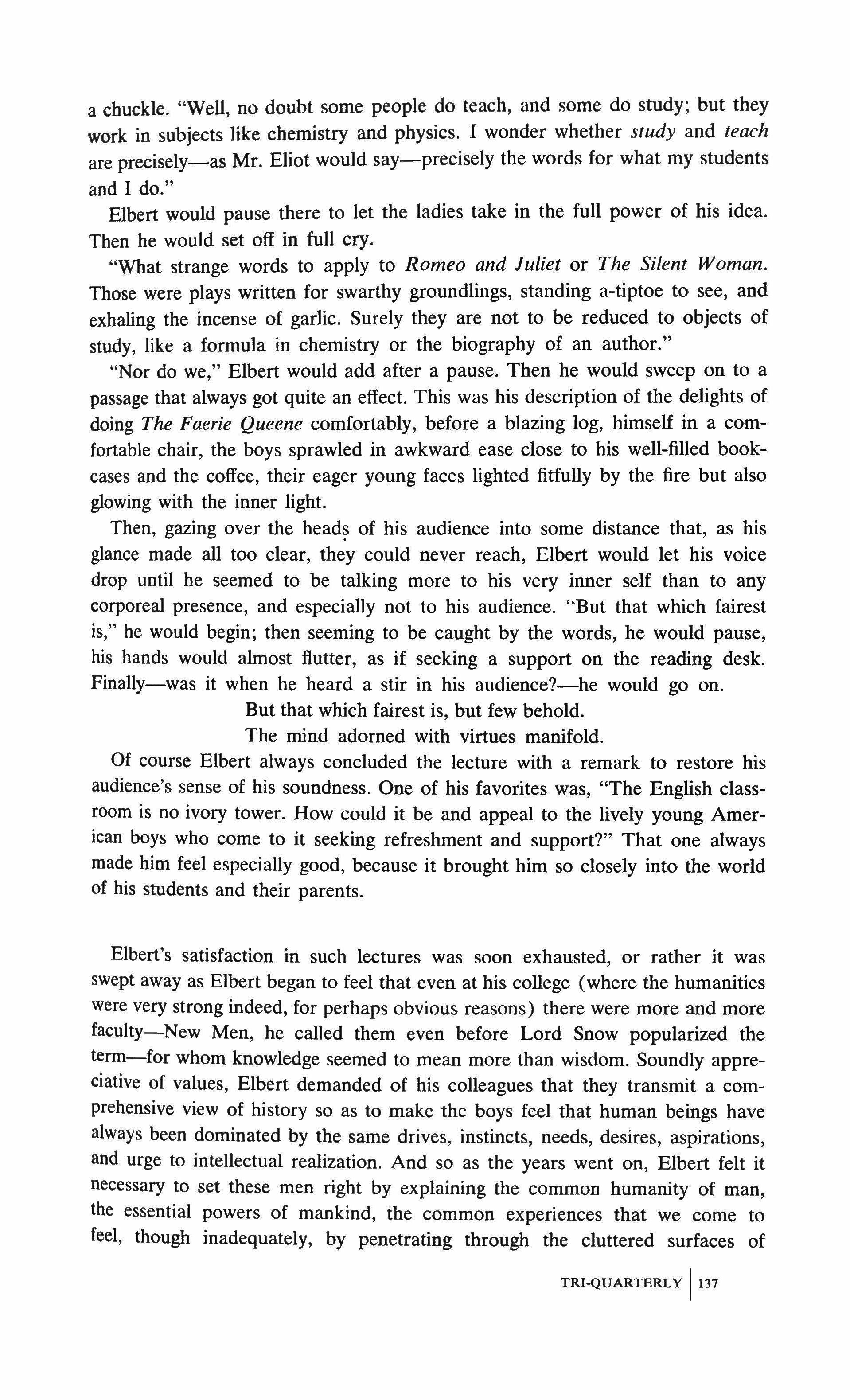
a chuckle. "Well, no doubt some people do teach, and some do study; but they work in subjects like chemistry and physics. I wonder whether study and teach are precisely-as Mr. Eliot would say-precisely the words for what my students and I do."
Elbert would pause there to let the ladies take in the full power of his idea. Then he would set off in full cry.
"What strange words to apply to Romeo and Juliet or The Silent Woman. Those were plays written for swarthy groundlings, standing a-tiptoe to see, and exhaling the incense of garlic. Surely they are not to be reduced to objects of study, like a formula in chemistry or the biography of an author."
"Nor do we," Elbert would add after a pause. Then he would sweep on to a passage that always got quite an effect. This was his description of the delights of doing The Faerie Queene comfortably, before a blazing log, himself in a comfortable chair, the boys sprawled in awkward ease close to his well-filled bookcases and the coffee, their eager young faces lighted fitfully by the fire but also glowing with the inner light.
Then, gazing over the heads of his audience into some distance that, as his glance made all too clear, they could never reach, Elbert would let his voice drop until he seemed to be talking more to his very inner self than to any corporeal presence, and especially not to his audience. "But that which fairest is," he would begin; then seeming to be caught by the words, he would pause, his hands would almost flutter, as if seeking a support on the reading desk. Finally-was it when he heard a stir in his audience?-he would go on.
But that which fairest is, but few behold.
The mind adorned with virtues manifold.
Of course Elbert always concluded the lecture with a remark to restore his audience's sense of his soundness. One of his favorites was, "The English classroom is no ivory tower. How could it be and appeal to the lively young American boys who come to it seeking refreshment and support?" That one always made him feel especially good, because it brought him so closely into the world of his students and their parents.
Elbert's satisfaction in such lectures was soon exhausted, or rather it was swept away as Elbert began to feel that even at his college (where the humanities were very strong indeed, for perhaps obvious reasons) there were more and more faculty-New Men, he called them even before Lord Snow popularized the term-for whom knowledge seemed to mean more than wisdom. Soundly appreciative of values, Elbert demanded of his colleagues that they transmit a comprehensive view of history so as to make the boys feel that human beings have always been dominated by the same drives, instincts, needs, desires, aspirations, and urge to intellectual realization. And so as the years went on, Elbert felt it necessary to set these men right by explaining the common humanity of man, the essential powers of mankind, the common experiences that we come to feel, though inadequately, by penetrating through the cluttered surfaces of
TRI-QUARTERLY 1137
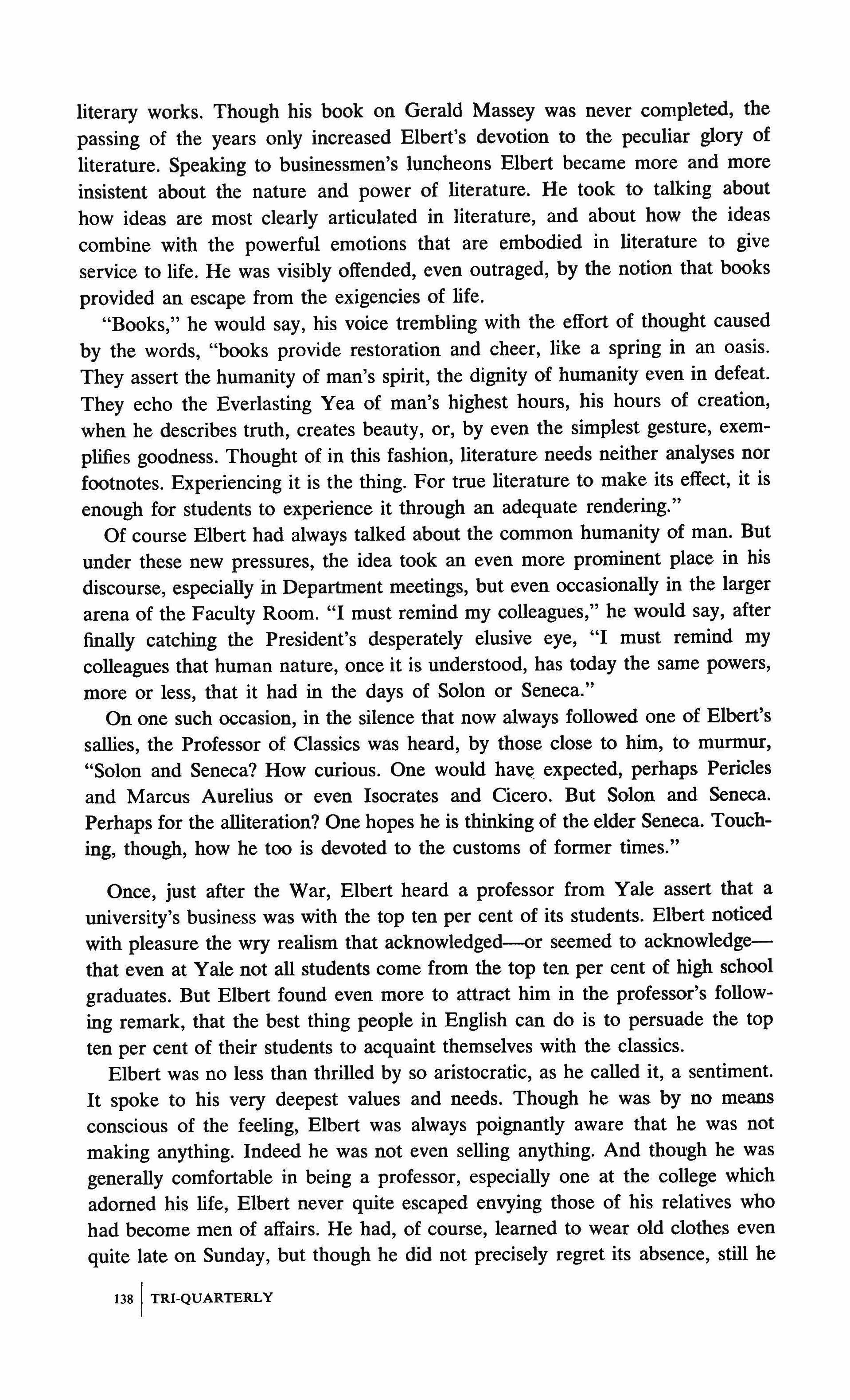
literary works. Though his book on Gerald Massey was never completed, the passing of the years only increased Elbert's devotion to the peculiar glory of literature. Speaking to businessmen's luncheons Elbert became more and more insistent about the nature and power of literature. He took to talking about how ideas are most clearly articulated in literature, and about how the ideas combine with the powerful emotions that are embodied in literature to give service to life. He was visibly offended, even outraged, by the notion that books provided an escape from the exigencies of life.
"Books," he would say, his voice trembling with the effort of thought caused by the words, "books provide restoration and cheer, like a spring in an oasis. They assert the humanity of man's spirit, the dignity of humanity even in defeat. They echo the Everlasting Yea of man's highest hours, his hours of creation, when he describes truth, creates beauty, or, by even the simplest gesture, exemplifies goodness. Thought of in this fashion, literature needs neither analyses nor footnotes. Experiencing it is the thing. For true literature to make its effect, it is enough for students to experience it through an adequate rendering."
Of course Elbert had always talked about the common humanity of man. But under these new pressures, the idea took an even more prominent place in his discourse, especially in Department meetings, but even occasionally in the larger arena of the Faculty Room. "I must remind my colleagues," he would say, after finally catching the President's desperately elusive eye, "I must remind my colleagues that human nature, once it is understood, has today the same powers, more or less, that it had in the days of Solon or Seneca."
On one such occasion, in the silence that now always followed one of Elbert's sallies, the Professor of Classics was heard, by those close to him, to murmur, "Solon and Seneca? How curious. One would have expected, perhaps Pericles and Marcus Aurelius or even Isocrates and Cicero. But Solon and Seneca. Perhaps for the alliteration? One hopes he is thinking of the elder Seneca. Touching, though, how he too is devoted to the customs of former times."
Once, just after the War, Elbert heard a professor from Yale assert that a university's business was with the top ten per cent of its students. Elbert noticed with pleasure the wry realism that acknowledged-or seemed to acknowledgethat even at Yale not all students come from the top ten per cent of high school graduates. But Elbert found even more to attract him in the professor's following remark, that the best thing people in English can do is to persuade the top ten per cent of their students to acquaint themselves with the classics.
Elbert was no less than thrilled by so aristocratic, as he called it, a sentiment. It spoke to his very deepest values and needs. Though he was by no means conscious of the feeling, Elbert was always poignantly aware that he was not making anything. Indeed he was not even selling anything. And though he was generally comfortable in being a professor, especially one at the college which adorned his life, Elbert never quite escaped envying those of his relatives who had become men of affairs. He had, of course, learned to wear old clothes even quite late on Sunday, but though he did not precisely regret its absence, still he

was never wholly comfortable out of the blue serge of respectability. It is not that Elbert ought to have been selling washing machines, but rather that he often wished that his purveying of the exciting drama of the Greek achievement would produce something tangible.
Somehow or other the Yale professor's dictum quieted Elbert's dark evangelical suspicion that his teaching was not really work, that he was not entitled to what it brought him-a house, two cars, and vacations on Martha's Vineyard. (Sarah thought the Cape had become impossible.) He began to feel that he knew, as never before, the full meaning of noblesse oblige. Hence he began to introduce more or less topical references into his sophomore lectures. When discussing Herodotus, for example, he told the boys that in the description of Xerxes' preparation for invasion, they could see the eternal hubris of the aggressor. In the long struggle between Athens and Sparta he asked them to see the cardinal value of humanism: the need for a balance or harmony, creative in its power, between individualism and collectivism. And in an article he wrote during the campaign of 1952 he compared Othello's relation to Iago, in the matter of the lieutenancy, to government by crony. Later, as he became more aware of the differences in the prose styles of the two candidates, he regretted the allusion. But he soon quieted his regret by reflecting that his criticism showed just how humanists could exploit literature and the arts to make a contribution to national security. "After all," he said to himself, "surely literature is a path into men's minds, and surely we literary scholars know best how to understand men, since we have the most control over their language." As he considered the demands that the world situation was putting on the people of the United States, Elbert convinced himself that language study, as a key to understanding other nations and races, would eliminate a weakening provincialism in Americans.
It seems likely that Elbert would have been rather dissatisfied with the English offering that he found when he began teaching. For at graduate school he had heard, though perhaps not very loudly, that people were beginning to talk about the Text in peculiarly hushed tones, by which they managed, rather mysteriously to convey both a sacramental respect for the word and a to Elbert bewildering disregard for history. He couldn't understand how you can get a text without a textual history; but the problem did not bother him for long, being soon submerged in the delights of the ontological doctrine of poetry as knowledge, which Elbert identified, perhaps a bit simplistically, with some of Arnold's larger notions and even with a couple of ideas of his own, set down in undergraduate papers that he had written for a course called Appreciation of Literature.
But it was chiefly as a Humanist of the old time sort that Elbert began his attack on history in the curriculum. Students, he thought, were getting hardly more than a catalog of information. One can imagine the sardonic (but courteous) tone with which he would ask, "What do they know but some titles, a couple of dates of publication, and-if they're 'good'-a few biographical facts about the lives of our authors? After all," he would add, "no one in the Renais-
TRI-QUARTERLy 1139
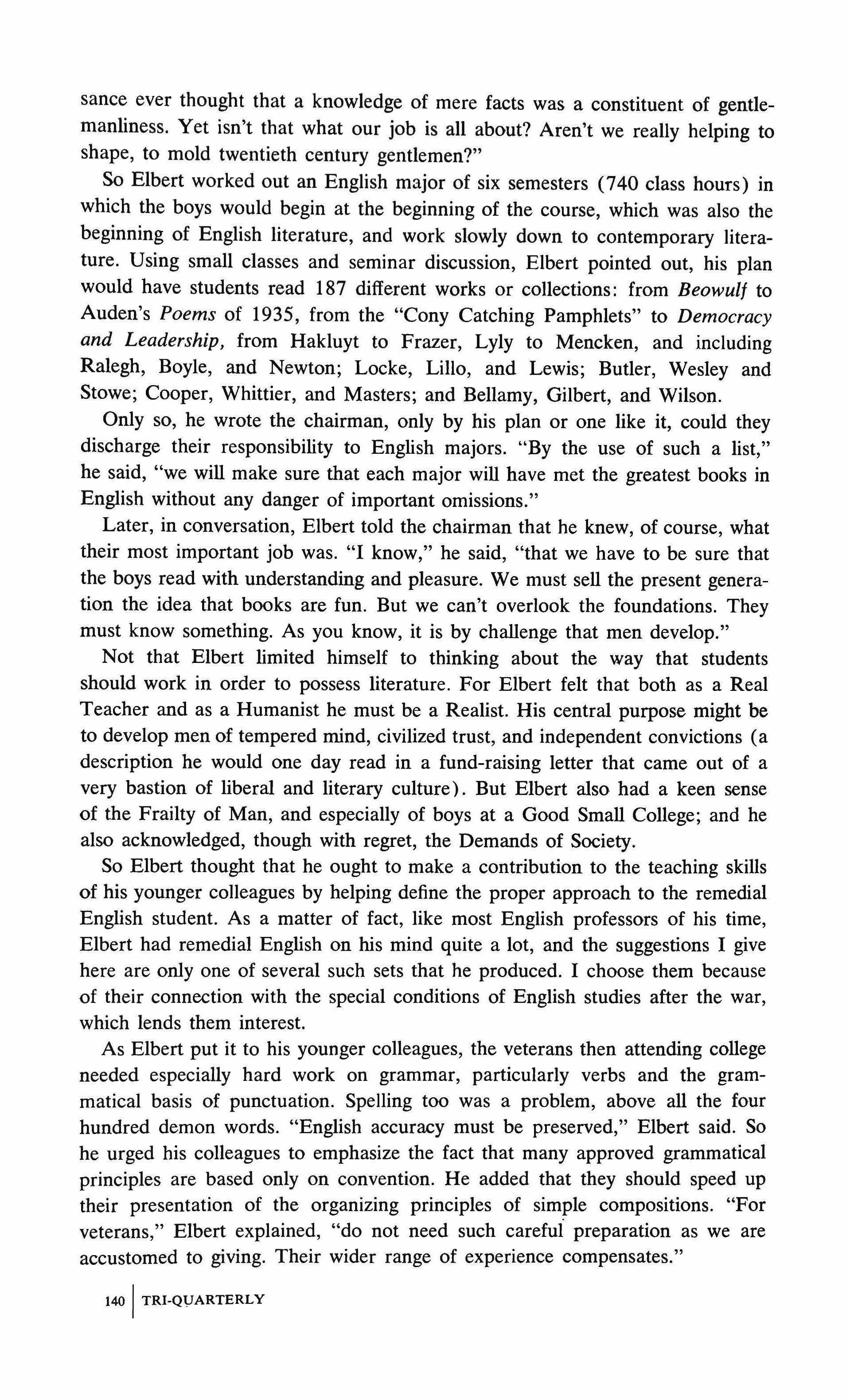
sance ever thought that a knowledge of mere facts was a constituent of gentlemanliness. Yet isn't that what our job is all about? Aren't we really helping to shape, to mold twentieth century gentlemen?"
So Elbert worked out an English major of six semesters (740 class hours) in which the boys would begin at the beginning of the course, which was also the beginning of English literature, and work slowly down to contemporary literature. Using small classes and seminar discussion, Elbert pointed out, his plan would have students read 187 different works or collections: from Beowulf to Auden's Poems of 1935, from the "Cony Catching Pamphlets" to Democracy and Leadership, from Hakluyt to Frazer, Lyly to Mencken, and including Ralegh, Boyle, and Newton; Locke, Lillo, and Lewis; Butler, Wesley and Stowe; Cooper, Whittier, and Masters; and Bellamy, Gilbert, and Wilson.
Only so, he wrote the chairman, only by his plan or one like it, could they discharge their responsibility to English majors. "By the use of such a list," he said, "we will make sure that each major will have met the greatest books in English without any danger of important omissions."
Later, in conversation, Elbert told the chairman that he knew, of course, what their most important job was. "I know," he said, "that we have to be sure that the boys read with understanding and pleasure. We must sell the present generation the idea that books are fun. But we can't overlook the foundations. They must know something. As you know, it is by challenge that men develop."
Not that Elbert limited himself to thinking about the way that students should work in order to possess literature. For Elbert felt that both as a Real Teacher and as a Humanist he must be a Realist. His central purpose might be to develop men of tempered mind, civilized trust, and independent convictions (a description he would one day read in a fund-raising letter that came out of a very bastion of liberal and literary culture). But Elbert also had a keen sense of the Frailty of Man, and especially of boys at a Good Small College; and he also acknowledged, though with regret, the Demands of Society.
So Elbert thought that he ought to make a contribution to the teaching skills of his younger colleagues by helping define the proper approach to the remedial English student. As a matter of fact, like most English professors of his time, Elbert had remedial English on his mind quite a lot, and the suggestions I give here are only one of several such sets that he produced. I choose them because of their connection with the special conditions of English studies after the war, which lends them interest.
As Elbert put it to his younger colleagues, the veterans then attending college needed especially hard work on grammar, particularly verbs and the grammatical basis of punctuation. Spelling too was a problem, above all the four hundred demon words. "English accuracy must be preserved," Elbert said. So he urged his colleagues to emphasize the fact that many approved grammatical principles are based only on convention. He added that they should speed up their presentation of the organizing principles of simple compositions. "For veterans," Elbert explained, "do not need such careful preparation as we are accustomed to giving. Their wider range of experience compensates."
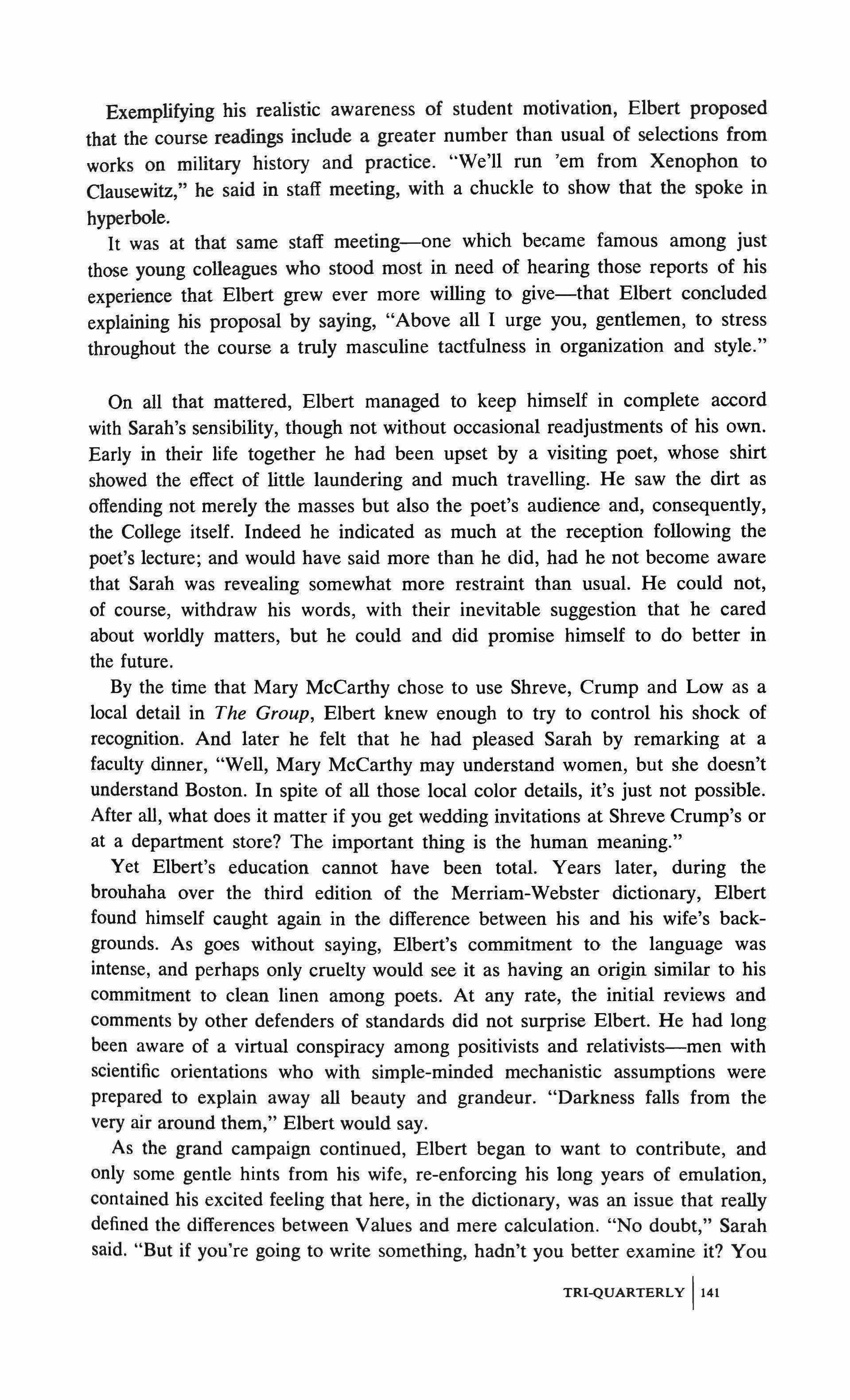
Exemplifying his realistic awareness of student motivation, Elbert proposed that the course readings include a greater number than usual of selections from works on military history and practice. "We'll run 'em from Xenophon to Clausewitz," he said in staff meeting, with a chuckle to show that the spoke in hyperbole.
It was at that same staff meeting-one which became famous among just those young colleagues who stood most in need of hearing those reports of his experience that Elbert grew ever more willing to give-that Elbert concluded explaining his proposal by saying, "Above all I urge you, gentlemen, to stress throughout the course a truly masculine tactfulness in organization and style."
On all that mattered, Elbert managed to keep himself in complete accord with Sarah's sensibility, though not without occasional readjustments of his own. Early in their life together he had been upset by a visiting poet, whose shirt showed the effect of little laundering and much travelling. He saw the dirt as offending not merely the masses but also the poet's audience and, consequently, the College itself. Indeed he indicated as much at the reception following the poet's lecture; and would have said more than he did, had he not become aware that Sarah was revealing somewhat more restraint than usual. He could not, of course, withdraw his words, with their inevitable suggestion that he cared about worldly matters, but he could and did promise himself to do better in the future.
By the time that Mary McCarthy chose to use Shreve, Crump and Low as a local detail in The Group, Elbert knew enough to try to control his shock of recognition. And later he felt that he had pleased Sarah by remarking at a faculty dinner, "Well, Mary McCarthy may understand women, but she doesn't understand Boston. In spite of all those local color details, it's just not possible. After all, what does it matter if you get wedding invitations at Shreve Crump's or at a department store? The important thing is the human meaning."
Yet Elbert's education cannot have been total. Years later, during the brouhaha over the third edition of the Merriam-Webster dictionary, Elbert found himself caught again in the difference between his and his wife's backgrounds. As goes without saying, Elbert's commitment to the language was intense, and perhaps only cruelty would see it as having an origin similar to his commitment to clean linen among poets. At any rate, the initial reviews and comments by other defenders of standards did not surprise Elbert. He had long been aware of a virtual conspiracy among positivists and relativists-men with scientific orientations who with simple-minded mechanistic assumptions were prepared to explain away all beauty and grandeur. "Darkness falls from the very air around them," Elbert would say.
As the grand campaign continued, Elbert began to want to contribute, and only some gentle hints from his wife, re-enforcing his long years of emulation, contained his excited feeling that here, in the dictionary, was an issue that really defined the differences between Values and mere calculation. "No doubt," Sarah said. "But if you're going to write something, hadn't you better examine it? You
TRI-QUARTERLy 1141
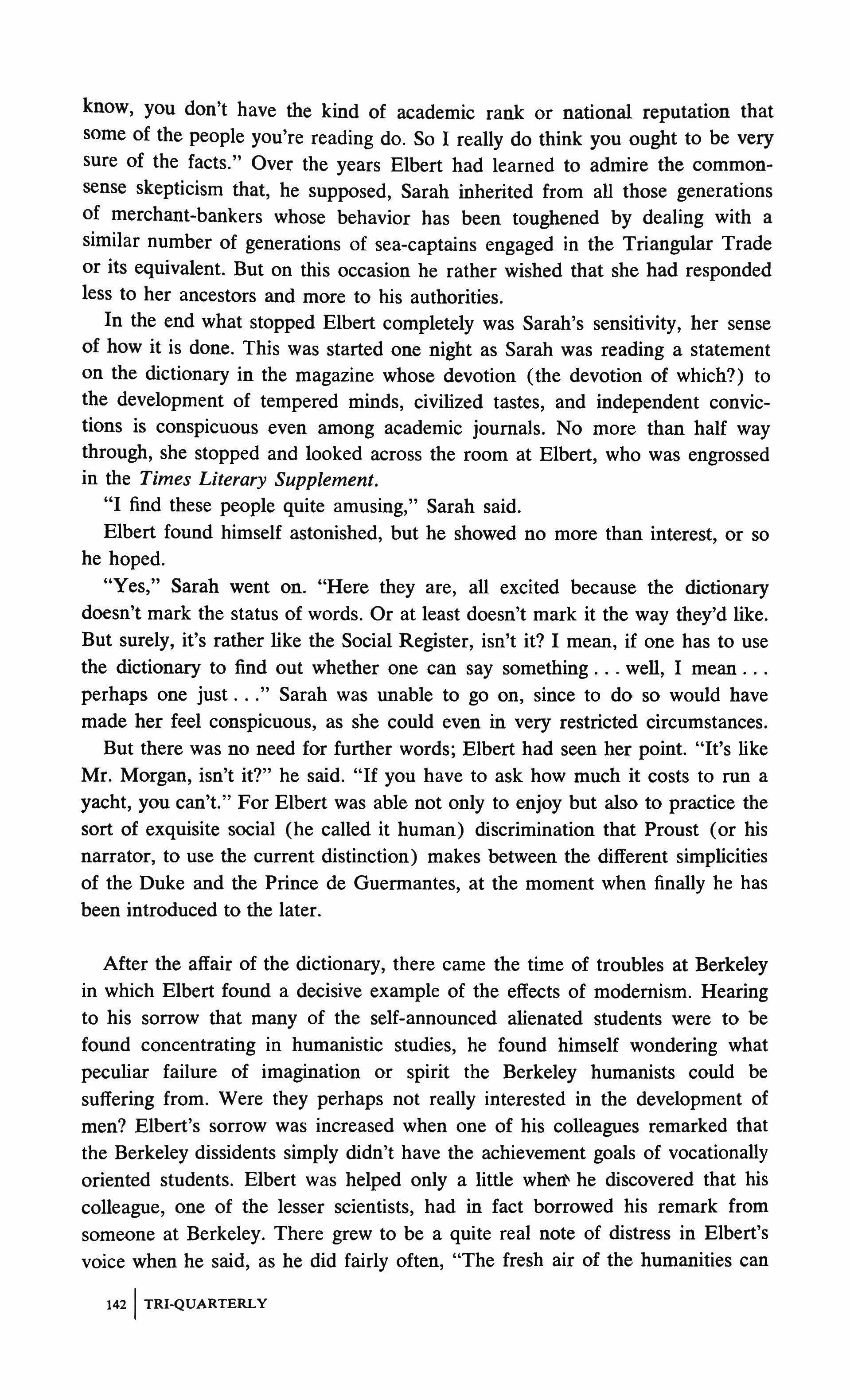
know, you don't have the kind of academic rank or national reputation that some of the people you're reading do. So I really do think you ought to be very sure of the facts." Over the years Elbert had learned to admire the commonsense skepticism that, he supposed, Sarah inherited from all those generations of merchant-bankers whose behavior has been toughened by dealing with a similar number of generations of sea-captains engaged in the Triangular Trade or its equivalent. But on this occasion he rather wished that she had responded less to her ancestors and more to his authorities.
In the end what stopped Elbert completely was Sarah's sensitivity, her sense of how it is done. This was started one night as Sarah was reading a statement on the dictionary in the magazine whose devotion (the devotion of which?) to the development of tempered minds, civilized tastes, and independent convictions is conspicuous even among academic journals. No more than half way through, she stopped and looked across the room at Elbert, who was engrossed in the Times Literary Supplement.
"I find these people quite amusing," Sarah said. Elbert found himself astonished, but he showed no more than interest, or so he hoped.
"Yes," Sarah went on. "Here they are, all excited because the dictionary doesn't mark the status of words. Or at least doesn't mark it the way they'd like. But surely, it's rather like the Social Register, isn't it? I mean, if one has to use the dictionary to find out whether one can say something well, I mean perhaps one just Sarah was unable to go on, since to do so would have made her feel conspicuous, as she could even in very restricted circumstances. But there was no need for further words; Elbert had seen her point. "It's like Mr. Morgan, isn't it?" he said. "If you have to ask how much it costs to run a yacht, you can't." For Elbert was able not only to enjoy but also to practice the sort of exquisite social (he called it human) discrimination that Proust (or his narrator, to use the current distinction) makes between the different simplicities of the Duke and the Prince de Guermantes, at the moment when finally he has been introduced to the later.
After the affair of the dictionary, there came the time of troubles at Berkeley in which Elbert found a decisive example of the effects of modernism. Hearing to his sorrow that many of the self-announced alienated students were to be found concentrating in humanistic studies, he found himself wondering what peculiar failure of imagination or spirit the Berkeley humanists could be suffering from. Were they perhaps not really interested in the development of men? Elbert's sorrow was increased when one of his colleagues remarked that the Berkeley dissidents simply didn't have the achievement goals of vocationally oriented students. Elbert was helped only a little when' he discovered that his colleague, one of the lesser scientists, had in fact borrowed his remark from someone at Berkeley. There grew to be a quite real note of distress in Elbert's voice when he said, as he did fairly often, "The fresh air of the humanities can
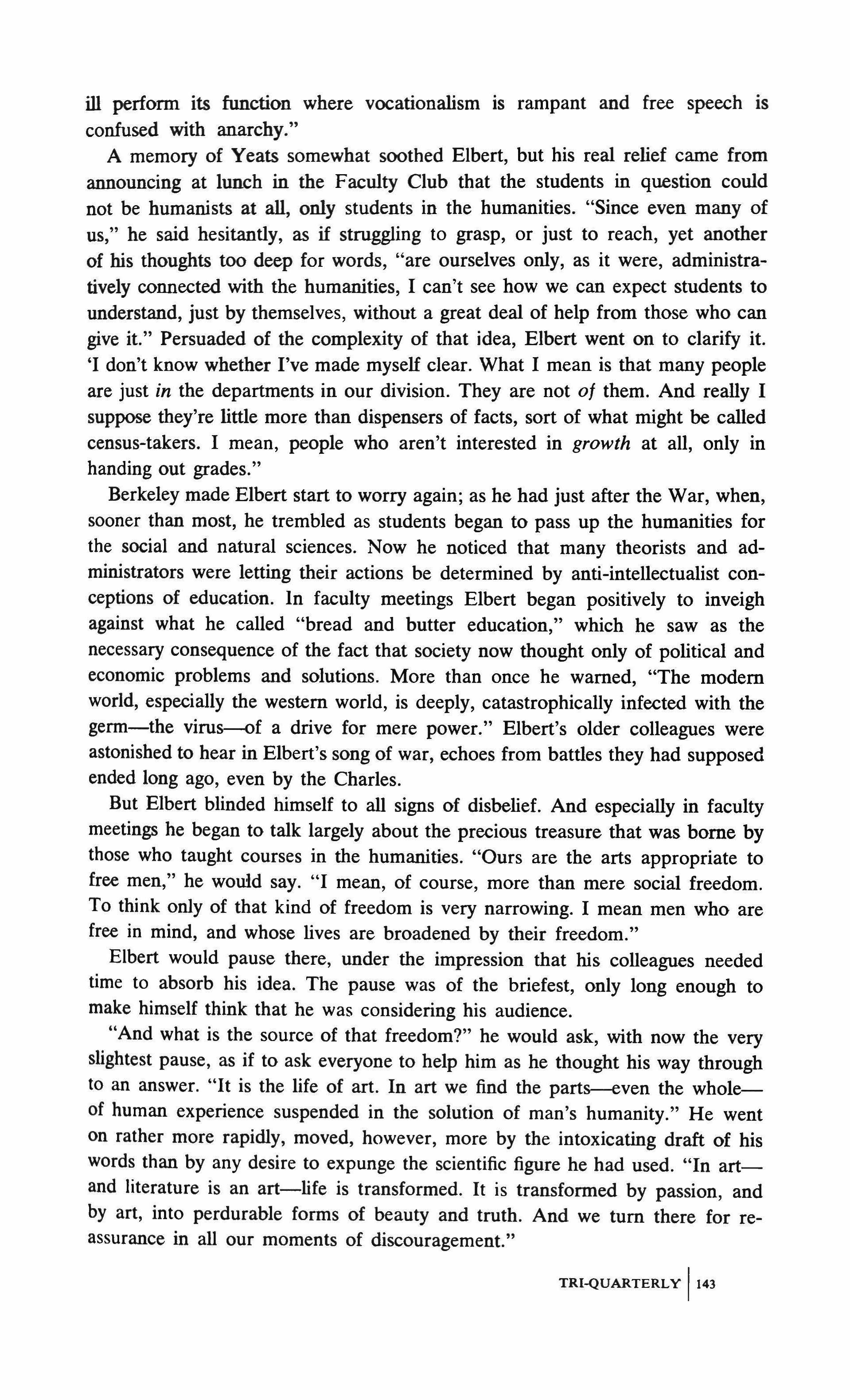
ill perform its function where vocationalism is rampant and free speech is confused with anarchy."
A memory of Yeats somewhat soothed Elbert, but his real relief came from announcing at lunch in the Faculty Club that the students in question could not be humanists at all, only students in the humanities. "Since even many of us," he said hesitantly, as if struggling to grasp, or just to reach, yet another of his thoughts too deep for words, "are ourselves only, as it were, administratively connected with the humanities, I can't see how we can expect students to understand, just by themselves, without a great deal of help from those who can give it." Persuaded of the complexity of that idea, Elbert went on to clarify it. 'I don't know whether I've made myself clear. What I mean is that many people are just in the departments in our division. They are not of them. And really I suppose they're little more than dispensers of facts, sort of what might be called census-takers. I mean, people who aren't interested in growth at all, only in handing out grades."
Berkeley made Elbert start to worry again; as he had just after the War, when, sooner than most, he trembled as students began to pass up the humanities for the social and natural sciences. Now he noticed that many theorists and administrators were letting their actions be determined by anti-intellectualist conceptions of education. In faculty meetings Elbert began positively to inveigh against what he called "bread and butter education," which he saw as the necessary consequence of the fact that society now thought only of political and economic problems and solutions. More than once he warned, "The modem world, especially the western world, is deeply, catastrophically infected with the germ-the virus--of a drive for mere power." Elbert's older colleagues were astonished to hear in Elbert's song of war, echoes from battles they had supposed ended long ago, even by the Charles.
But Elbert blinded himself to all signs of disbelief. And especially in faculty meetings he began to talk largely about the precious treasure that was borne by those who taught courses in the humanities. "Ours are the arts appropriate to free men," he would say. "I mean, of course, more than mere social freedom. To think only of that kind of freedom is very narrowing. I mean men who are free in mind, and whose lives are broadened by their freedom."
Elbert would pause there, under the impression that his colleagues needed time to absorb his idea. The pause was of the briefest, only long enough to make himself think that he was considering his audience.
"And what is the source of that freedom?" he would ask, with now the very slightest pause, as if to ask everyone to help him as he thought his way through to an answer. "It is the life of art. In art we find the parts--even the wholeof human experience suspended in the solution of man's humanity." He went on rather more rapidly, moved, however, more by the intoxicating draft of his words than by any desire to expunge the scientific figure he had used. "In artand literature is an art-life is transformed. It is transformed by passion, and by art, into perdurable forms of beauty and truth. And we tum there for reassurance in all our moments of discouragement."
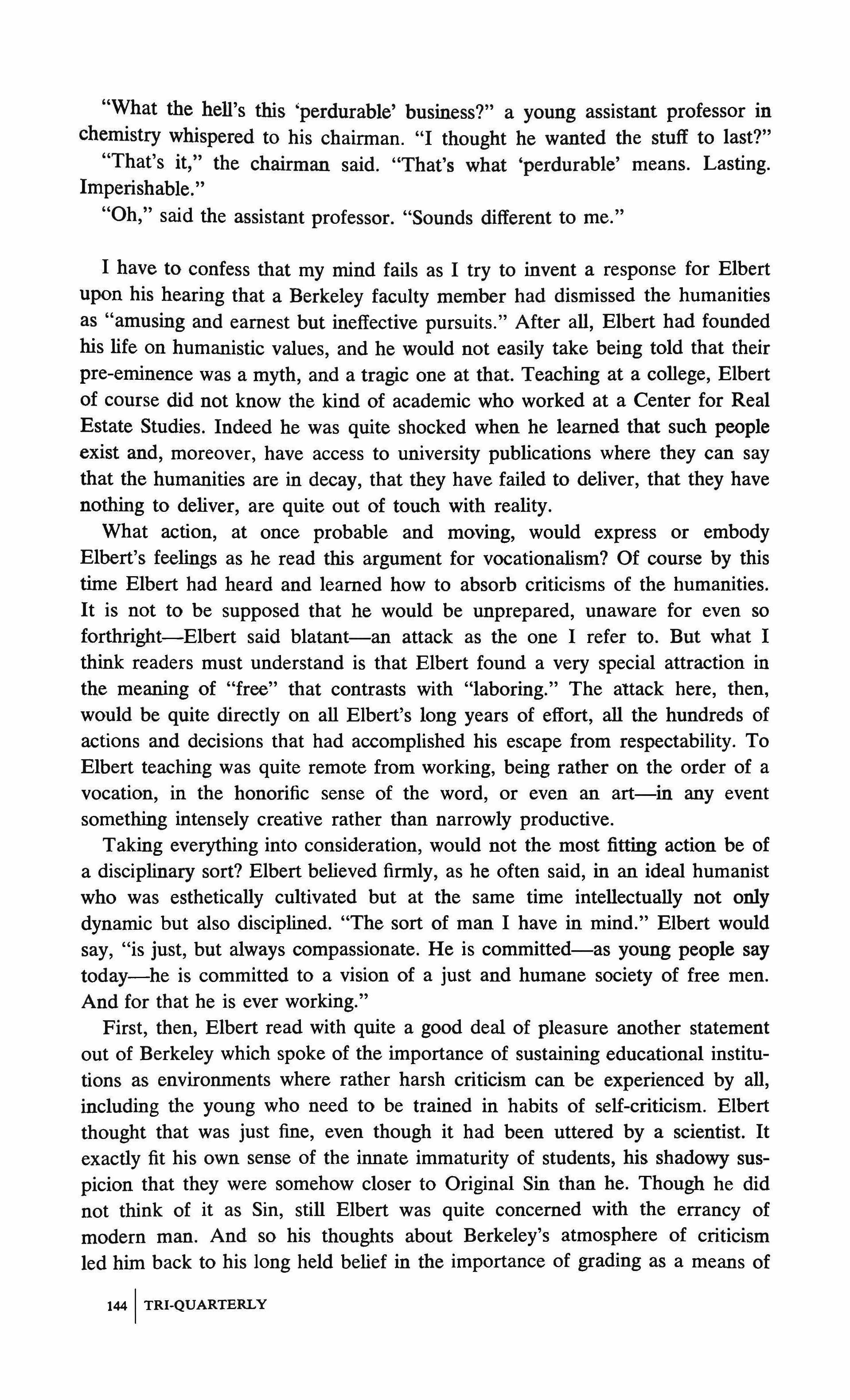
"What the hell's this 'perdurable' business?" a young assistant professor in chemistry whispered to his chairman. "I thought he wanted the stuff to last?"
"That's it," the chairman said. "That's what 'perdurable' means. Lasting. Imperishable.
"Oh," said the assistant professor. "Sounds different to me."
I have to confess that my mind fails as I try to invent a response for Elbert upon his hearing that a Berkeley faculty member had dismissed the humanities as "amusing and earnest but ineffective pursuits." After all, Elbert had founded his life on humanistic values, and he would not easily take being told that their pre-eminence was a myth, and a tragic one at that. Teaching at a college, Elbert of course did not know the kind of academic who worked at a Center for Real Estate Studies. Indeed he was quite shocked when he learned that such people exist and, moreover, have access to university publications where they can say that the humanities are in decay, that they have failed to deliver, that they have nothing to deliver, are quite out of touch with reality.
What action, at once probable and moving, would express or embody Elbert's feelings as he read this argument for vocationalism? Of course by this time Elbert had heard and learned how to absorb criticisms of the humanities. It is not to be supposed that he would be unprepared, unaware for even so forthright-Elbert said blatant-an attack as the one I refer to. But what I think readers must understand is that Elbert found a very special attraction in the meaning of "free" that contrasts with "laboring." The attack here, then, would be quite directly on all Elbert's long years of effort, all the hundreds of actions and decisions that had accomplished his escape from respectability. To Elbert teaching was quite remote from working, being rather on the order of a vocation, in the honorific sense of the word, or even an art-in any event something intensely creative rather than narrowly productive.
Taking everything into consideration, would not the most fitting action be of a disciplinary sort? Elbert believed firmly, as he often said, in an ideal humanist who was esthetically cultivated but at the same time intellectually not only dynamic but also disciplined. "The sort of man I have in mind." Elbert would say, "is just, but always compassionate. He is committed-as young people say today-he is committed to a vision of a just and humane society of free men. And for that he is ever working."
First, then, Elbert read with quite a good deal of pleasure another statement out of Berkeley which spoke of the importance of sustaining educational institutions as environments where rather harsh criticism can be experienced by all, including the young who need to be trained in habits of self-criticism. Elbert thought that was just fine, even though it had been uttered by a scientist. It exactly fit his own sense of the innate immaturity of students, his shadowy suspicion that they were somehow closer to Original Sin than he. Though he did not think of it as Sin, still Elbert was quite concerned with the errancy of modem man. And so his thoughts about Berkeley's atmosphere of criticism led him back to his long held belief in the importance of grading as a means of
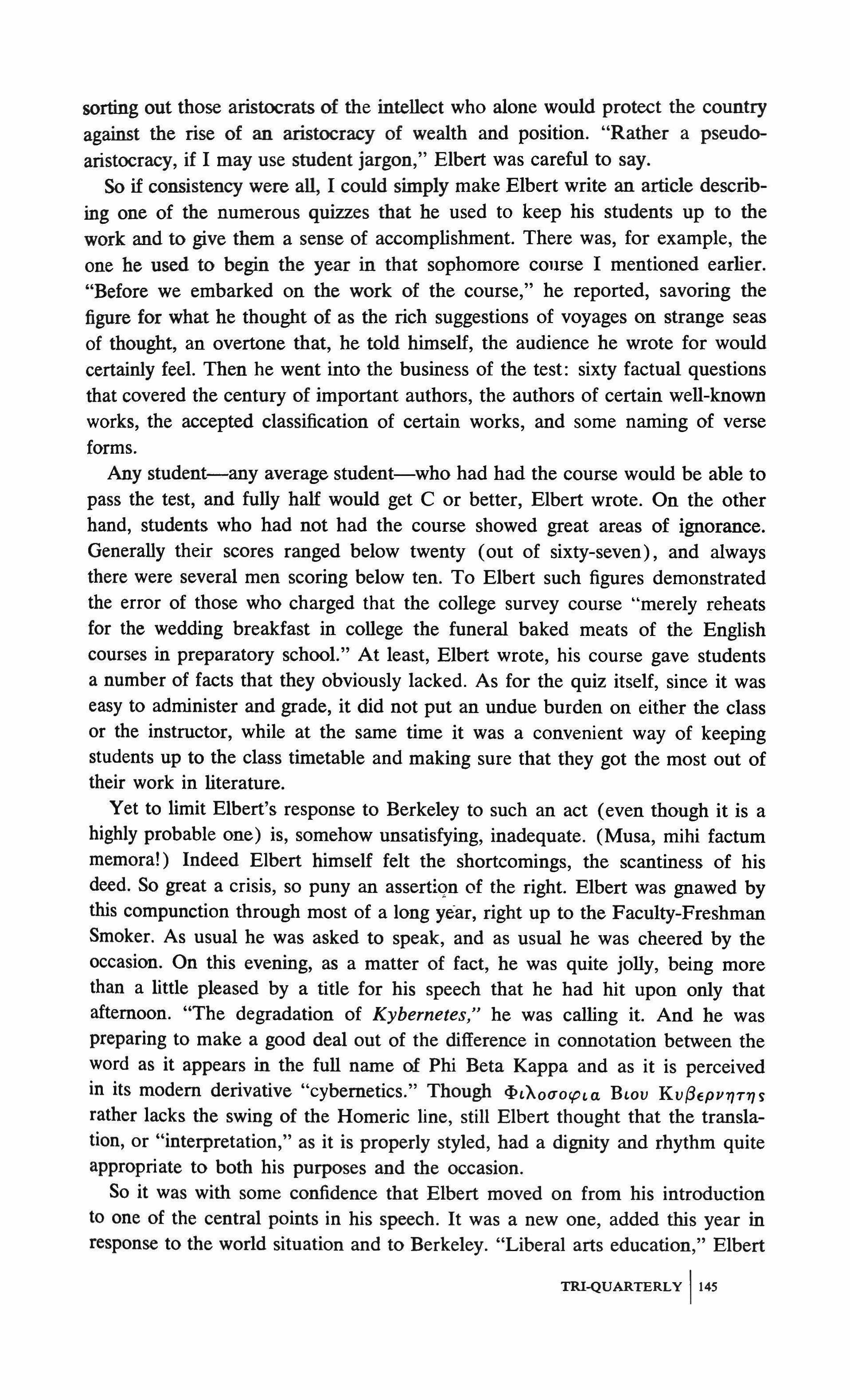
sorting out those aristocrats of the intellect who alone would protect the country against the rise of an aristocracy of wealth and position. "Rather a pseudoaristocracy, if I may use student jargon," Elbert was careful to say.
So if consistency were all, I could simply make Elbert write an article describing one of the numerous quizzes that he used to keep his students up to the work and to give them a sense of accomplishment. There was, for example, the one he used to begin the year in that sophomore course I mentioned earlier. "Before we embarked on the work of the course," he reported, savoring the figure for what he thought of as the rich suggestions of voyages on strange seas of thought, an overtone that, he told himself, the audience he wrote for would certainly feel. Then he went into the business of the test: sixty factual questions that covered the century of important authors, the authors of certain well-known works, the accepted classification of certain works, and some naming of verse forms.
Any student-any average student-who had had the course would be able to pass the test, and fully half would get C or better, Elbert wrote. On the other hand, students who had not had the course showed great areas of ignorance. Generally their scores ranged below twenty (out of sixty-seven), and always there were several men scoring below ten. To Elbert such figures demonstrated the error of those who charged that the college survey course "merely reheats for the wedding breakfast in college the funeral baked meats of the English courses in preparatory school." At least, Elbert wrote, his course gave students a number of facts that they obviously lacked. As for the quiz itself, since it was easy to administer and grade, it did not put an undue burden on either the class or the instructor, while at the same time it was a convenient way of keeping students up to the class timetable and making sure that they got the most out of their work in literature.
Yet to limit Elbert's response to Berkeley to such an act (even though it is a highly probable one) is, somehow unsatisfying, inadequate. (Musa, mihi factum memora! ) Indeed Elbert himself felt the shortcomings, the scantiness of his deed. So great a crisis, so puny an assertion of the right. Elbert was gnawed by this compunction through most of a long year, right up to the Faculty-Freshman Smoker. As usual he was asked to speak, and as usual he was cheered by the occasion. On this evening, as a matter of fact, he was quite jolly, being more than a little pleased by a title for his speech that he had hit upon only that afternoon. "The degradation of Kybernetes," he was calling it. And he was preparing to make a good deal out of the difference in connotation between the word as it appears in the full name of Phi Beta Kappa and as it is perceived in its modem derivative "cybernetics." Though 4>t'Xo<1ocpta Brou KV{3EPIl1'/T1'/5 rather lacks the swing of the Homeric line, still Elbert thought that the translation, or "interpretation," as it is properly styled, had a dignity and rhythm quite appropriate to both his purposes and the occasion.
So it was with some confidence that Elbert moved on from his introduction to one of the central points in his speech. It was a new one, added this year in response to the world situation and to Berkeley. "Liberal arts education," Elbert
TRI-QUARTERLy 1145
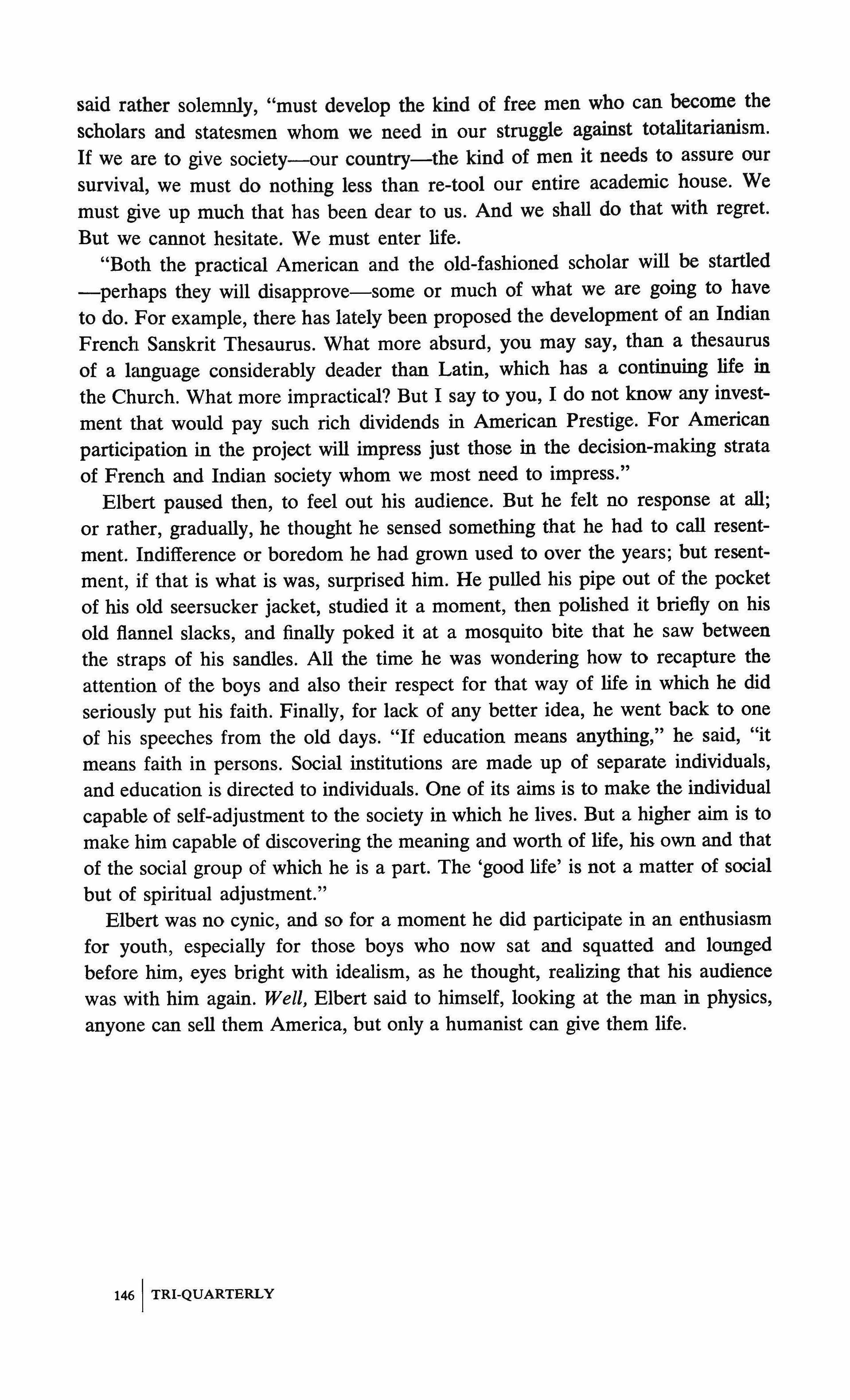
said rather solemnly, "must develop the kind of free men who can become the scholars and statesmen whom we need in our struggle against totalitarianism. If we are to give society-our country-the kind of men it needs to assure our survival, we must do nothing less than re-tool our entire academic house. We must give up much that has been dear to us. And we shall do that with regret. But we cannot hesitate. We must enter life.
"Both the practical American and the old-fashioned scholar will be startled -perhaps they will disapprove-some or much of what we are going to have to do. For example, there has lately been proposed the development of an Indian French Sanskrit Thesaurus. What more absurd, you may say, than a thesaurus of a language considerably deader than Latin, which has a continuing life in the Church. What more impractical? But I say to you, I do not know any investment that would pay such rich dividends in American Prestige. For American participation in the project will impress just those in the decision-making strata of French and Indian society whom we most need to impress."
Elbert paused then, to feel out his audience. But he felt no response at all; or rather, gradually, he thought he sensed something that he had to call resentment. Indifference or boredom he had grown used to over the years; but resentment, if that is what is was, surprised him. He pulled his pipe out of the pocket of his old seersucker jacket, studied it a moment, then polished it briefly on his old flannel slacks, and finally poked it at a mosquito bite that he saw between the straps of his sandles. All the time he was wondering how to recapture the attention of the boys and also their respect for that way of life in which he did seriously put his faith. Finally, for lack of any better idea, he went back to one of his speeches from the old days. "If education means anything," he said, "it means faith in persons. Social institutions are made up of separate individuals, and education is directed to individuals. One of its aims is to make the individual capable of self-adjustment to the society in which he lives. But a higher aim is to make him capable of discovering the meaning and worth of life, his own and that of the social group of which he is a part. The 'good life' is not a matter of social but of spiritual adjustment."
Elbert was no cynic, and so for a moment he did participate in an enthusiasm for youth, especially for those boys who now sat and squatted and lounged before him, eyes bright with idealism, as he thought, realizing that his audience was with him again. Well, Elbert said to himself, looking at the man in physics, anyone can sell them America, but only a humanist can give them life.

"Everything interesting in art happens at the start. Once past the beginning you're already at the end" (Picasso) is not a statement of novelty for novelty. It is a denial of custom and tradition, a statement of the difference between idea and realization. Because the hardware of realization in our time is mechanical, automated, computerized, inhuman, and so fundamentally uninteresting it is disposable without tears, it took little trouble to make, no man put much of his arm, his sweat, in it. Picasso in his way reinforces a slogan of our time=c'I] it works it's obsolete."
AsALWAYS, the artists are the prophets. Boccioni in 1911 forecast the new time, "We are primitives of an unknown culture." The apparent primitivism of modem art is not antiquarianism but a vision of a people struggling out of the mud of tribal, feudal, and nationalistic structures founded in the slowly evolved routines which we have been taught to call civilization. Against them we have the traditionalists whose symbol is the museum. The detritus of the past is contained within the walls, mounted on pedestals, surrounded by gilded frames. Sotheby in London and Park-Bernet in New York pounding their gavels to the rustle of the old ways of exchange.
These traditionalists, maniacs for preserving the collapsing hierarchies: flags and escutcheons, old streets, squares, cities, broken statues, and cracked frescoes. The ancient walls are tied with stainless steel bands and concrete is pumped to save for a little while these rememberances of things past. Masquerades are put on-"Swiss Guards," the "Guard" is changed at "Buckingham Palace," the "Pope" full of glitter "blesses" the multitude, while at such places as St. Cyr, Sandburst, and West Point, brass buttoned boys execute the "manual of arms" and on occasion sport clanking swords. All this is fun and games but there is a grimmer side for these same boys do drop napalm and little nations invent "political" boundaries and spend their energies devising ways of getting the Bomb.
The grim bed rock of traditionalism lies in the stockpilers of overkill who are ready (sometimes it seems even willing) to use the new way to defend tradition even if it means an all embracing "final solution."
Karl Marx wrote with 19th Century optimism that "mankind always takes up
y 1147

such problems as it can solve" for he believed the problem only arose when the material conditions necessary for the solution already existed or were at least in the process of formation. Today we cannot be that confident. When routines, customs, and habits on which societies have been based disappear overnight, we do not have an evolutionary change: we have a metamorophosis. How can we expect a solution to exist when all the history we have learnt may give no clue to future action? When solutions in the process of formation are passed by in the electric speed of our scientific discoveries? When the quantitative change has had undreamt of qualitative results; overnight a jump is made equalling the difference between nomad and farmer, feudalism and capitalism, balloon and space craft. Under such conditions projections of present trends as forecasts for action may serve no useful purpose.
In such a time the physical planner is in a dilemma. He lives in the ongoing situation, populations increase and need places to live, buildings wear out and want replacement, and so with roads and everything else. If he plans for the immediate his plans when realized will be outdated; if he plans for the future his plans will be considered utopian, impractical, will not be built and probably should not be built.
Decision makers in planning, such as banks and government agencies, are institutions where changes are accepted only when all else failed. They mistake the order of their bureaucracy for the order of nature. Bloody revolutions seem the only ways of establishing changes which later seem obvious to the new bureaucracy and then such institutions mistake their order, etc. The thinking, legislation, and money needed for planning is given to searching for solutions which formerly related to use but now may relate to nothing.
The Maginot Line is a classic example. Let us consider the appropriateness of the comparison between it and city planning. The fortification was built on the strategy of World War I warefare, conceived as 600 miles of supertechnological trench, air conditioned with self contained power and water sources, complete commissaries, and so on. It was designed for every contingency except the one that occurred-it was ignored for the solution was based on the past. The failure of the Maginot Line was not in execution but in idea. Like the dreadnought, and the Roman phalanx, it was outmoded. It was not the tanks flanking the Line that showed its worthlessness (there were tanks in the war before), it was the idea of speed, of mobility, the Blitzkrieg, an evolution in the strategy of war.
But the end was not Hitler's metaphorical lightning but the incandescence of a brief sun over Hiroshima and Nagasaki. This was not an evolution in war games but a mutation. Jean Cocteau said hopefully, "The trouble with the atom bomb is not that it makes war frightful, it makes it impossible."
Like the French generals, most books and practice in city planning make prognostications and assumptions which on the simplest evidence of our science and technology are more than dubious. Typically, such books start with "histories" of cities, the reason given being that we read history the better to understand the present. The assumption goes that we can then conveniently project

into the future, for life is progressive, accretive, a brick of the present is put on the bricks of the past and the fabric of civilization gets built. The past, present, and future are assumed as a smooth and optimistically rising curve, things slowly modify as they have done in the past; planning, then, is a simple projection. Such views are common, but to me they are fairy tales further from the truth and much less real than the projections of H. G. Wells, Aldous Huxley, George Orwell, William Morris, or Samuel Butler.
In the context of physical planning let us consider what confronts us as we stumble toward the 21st Century.
The city: There is no technical or economic reason for its existence. The acceleration in the transport of ideas and things eliminates the need of large centers for administration, finance, culture, and entertainment. Automation and computation permit the decentralization of skilled labor pools and, except for service work, the need for unskilled labor is almost non-existent. Various branches of the technology (climate control, nuclear fuel, hydroponics, cryogenics, etc.) make convenience to port, water, power, or even a decent microclimate unimportant. The single reason for the existence of the city is social, yet it is not difficult to show that it is disaster for all except the fortunate few who escape its fetid embrace when it pleases them.
The country: In the developed countries, agriculture as a way of life has practically disappeared. Though 30% of the U.S. population and 20% of England's is statistically nonurban, it cannot be reasonably argued that farming is a way of life. The farm has become a factory, television and radio broadcasts reach the remotest hamlets, as does electrification, central schools, hospitals, national newspapers and magazines, social security, super highways, and the like. There may be some backwardness, for contrary to the latest style, I've seen permanent waves in the farm wife's hair but no hayseed.
Neither city nor country: The city turning into a highway and the highway into a lineal city; the suburbs sprawling; these become the pattern. Here we find nothing of the urbanity of the old city, nothing of the innocence of the old countryside. In the more remote parts are either stateparkswiththeir picnic tables and trailer camps or motels, hot dog stands, the "beer can by the highway," the "picnic by the polluted stream" and marching through the land the towers and poles with their humming wires.
Present Solutions: Our cities increasingly become caricatures of LeCorbusier's Ville Radieuse (1923) dribbling off at the edges into travesties of F. L. Wright's (1936) Broadacres City. The new towns try hard to equate the notions of Ebenezer Howard's (1900) Garden City, try for middle class masquerades of Old World towns (air conditioned), or are frankly suburbia revisited. Paramount
·Being a New Yorker (which means a Manhattanite) I, of course, exaggerate. I write this at a farm in Devon. England. and looking from my window out toward Dartmoor I see green and rolling hills with their hedgerows. and sheep grazing in the meadows. It is such views that make me want to shout with Blake agains; the dark satanic mills and fumble for my bow of burning gold.

is the traffic problem: huge chunks of land, pots of money and much talent given to how to get into a place and how to get out in a hurry. Little wonder when there is no place one wants to be.
What is most striking in theoretical discussions and "practical" planning is the blind acceptance of the existing ways of life as being not only desirable but the only possible pattern for man. All that is needed are a few reforms; a pedestrian mall here, a super highway there, or getting rid of the billboards. The more daring theoreticians among the planners propose schemes for a variety of human termitaries (you build floating islands, you fill in rivers and bays o� their edges, you double deck an existing city, you put it in a bubble or you just put the whole damn thing underground). Monorails, hydrofoils, electronic controlled cars, pneumatic delivery tubes, moving sidewalks of varying speeds, all enter the traffic solutions. What is astonishing is the paucity of ideas, even the gadgetry is vintage Verne or Wells.
Although the technology has given the physical planner almost complete freedom from former restraints, the best most of us corne up with is this kind of rehash. How can this be? To tell the truth I don't understand it. Perhaps it's a loss of nerve resulting from some inner awareness that it's not the trim or the color but the whole thing that's wrong. Obviously for the men that get-thingsdone in planning such an admission would be not bravery but foolhardiness. But the more theoretical types bother me, they seem so enmeshed in the status quo of gadgetry that they've lost the real subject matter: the life style of man in a new age.
Because the late 20th Century technology has destroyed the necessity for most routines previously needed for survival, a whole block of truisms has been knocked out (a penny saved is a penny earned, the devil finds mischief for idle hands to do, if ye do not work ye shall not eat). It is no longer a program of full employment for production that must be sought but programs to prevent the underutilization of man's faculties as men. * "The character of man is formed by the work he does" (Eric Fromm). If this is so, here then is the rub-what is the proper employment for man-not a few men with vocations and talent or genius, but all the others?
Without an answer we can't conceive of a design for our environment whose sole purpose is to provide a suitable container for the carrying out of man's life processes.
In theory, the ideal form of the container is made by what is contained. In the real world the form is modified by the physical properties established by the materials and techniques which go into its fabrication. The more refined the technology the less difference there should be between the ideal form and the practical form.
At the same time there is an interaction between contained and container; 0ln the New York City subways is a poster, "When a computor learns your job, what are you going to do?" Good question.
150 I TRI-QUARTERLY

between man and the physical environment he has made. As long as the life process was firmly entrenched in the customs and habits of a slowly changing primal technology, containers and contained adjusted to each other with reasonable ease. This is no longer so, the containers which served so well no longer serve, old cities and buildings are at best quaint, suitable subject matter for paintings in the style of Guardi or Utrillo. The proponents of Paris Parallel (leave the old city, build a new one around it), or new towns, the objectors to skyscrapers in London, agree, but the issue remains-if the old form is dead what are the new form making elements?
The speed of transport in information and things makes the close proximity of huge agglomerations of people unnecessary, and the ease with which people can move about may mean a world scale nomadic existence for a considerable portion of the population. The breakdown of the family as the basic social and economic unit and the erosion of organized religion are facts; the elimination of nationalism is a survival necessity.
Instant communication, computorized efficiency in production, * urbanization of populations, mass education, food preservation, elimination of class and racial differences, as well as equalization of income, result in the elimination or reduction of differences in life styles. Lewis Mumford's statement, "The city was once the world, now the world has become the city," can imply not order but deadly monotony. AU minds with but a single thought, all hearts that beat as one, is a distressing prospect-the homogenized society. The physical base of this society is synthetic: the food we eat, the clothes we wear, the places in which we live, the very air we breathe, are manufactured components as essential to the technology. Man's environment is totally artificial, made up of conversion of nature's variety into standardized and predictable products is totally artificial materials, nature red in tooth and claw is conquered. What fun!-Plastic grass, permanent flowers and man made in great part by his environment can be physiologically made up of dentures, wigs and plastic plug-in gut replacements as well as their psychological equivalents. Horrendous thought -from artificial insemination to cryogenesis! The dehumanization of the human body.
And what of the mind itself? If the solution of all artistic and scientific problems consists of the correct choice of alternative possibilities within a given parameter, then the machine and not us is the instrument. The stored information within the computer is soon systematized: a colossal storehouse containing all of man's knowledge, with the ability to form instantly every permutation and combination, making man's stumbling efforts seem primitive and childish
A fact of our time is what Arnold Toynbee and Buckminster Fuller call "ephemerealization", the tendency of tec�nolo.IlY is to develop elements of increasing efficiency whose size becomes smaller, its weight less, its oper�tlOn Simpler. (You can easily test it-from horse to steam to jet to rocket, from wired circuit to printed CirCUli, from stone axe to laser beam, from wire to wireless from eyeglass to contact lens.) This dematerialIzation of the material accompanied by the elimination of man in the making. How picturesque sounding Ire names like Miller, Smith, Wheelwright; when the universal name is Pushbutton.
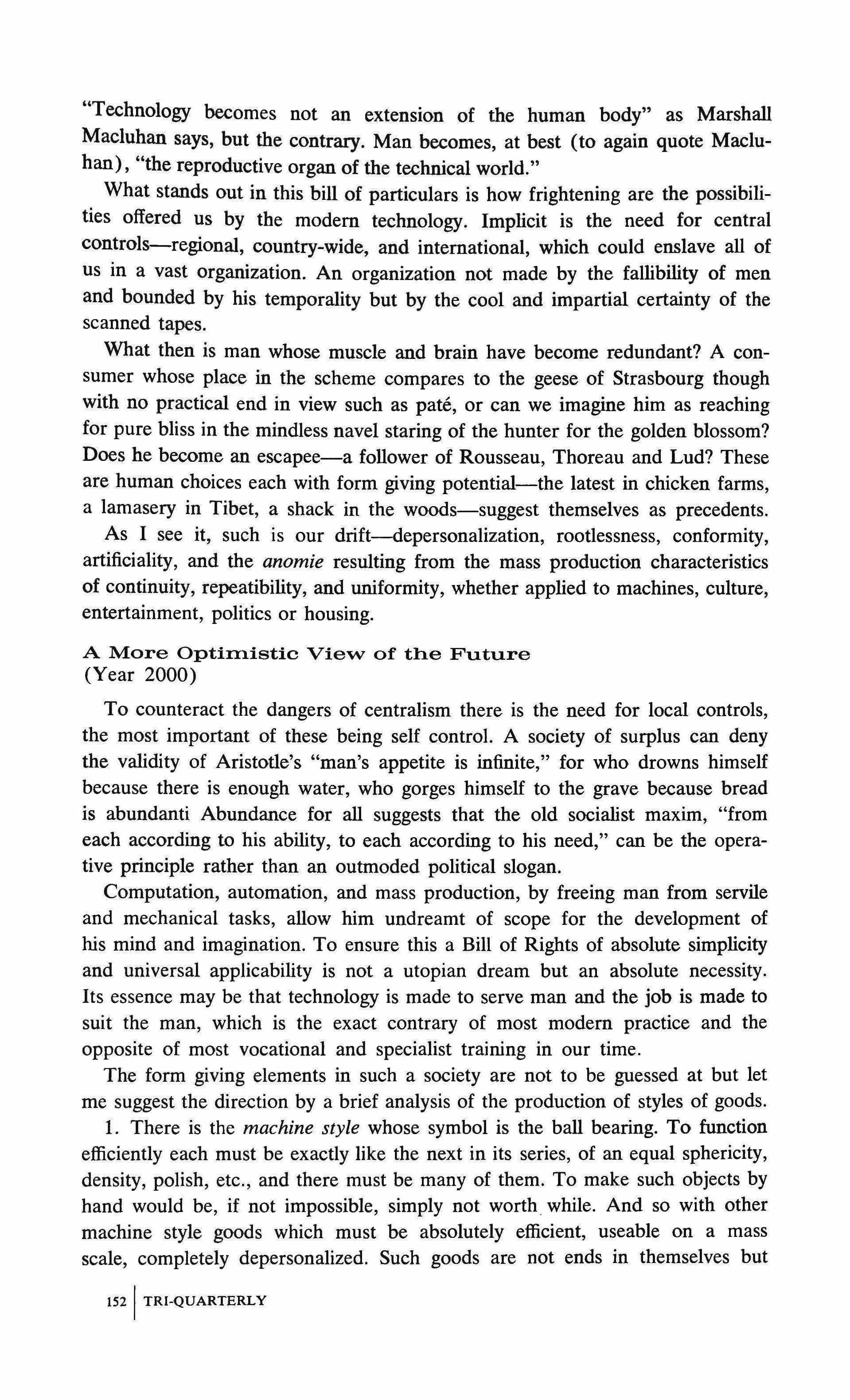
"Technology becomes not an extension of the human body" as Marshall Macluhan says, but the contrary. Man becomes, at best (to again quote Macluhan), "the reproductive organ of the technical world."
What stands out in this bill of particulars is how frightening are the possibilities offered us by the modem technology. Implicit is the need for central controls-regional, country-wide, and international, which could enslave all of us in a vast organization. An organization not made by the fallibility of men and bounded by his temporality but by the cool and impartial certainty of the scanned tapes.
What then is man whose muscle and brain have become redundant? A consumer whose place in the scheme compares to the geese of Strasbourg though with no practical end in view such as pate, or can we imagine him as reaching for pure bliss in the mindless navel staring of the hunter for the golden blossom? Does he become an escapee-a follower of Rousseau, Thoreau and Lud? These are human choices each with form giving potential-the latest in chicken farms, a lamasery in Tibet, a shack in the woods-suggest themselves as precedents.
As I see it, such is our drift-depersonalization, rootlessness, conformity, artificiality, and the anomie resulting from the mass production characteristics of continuity, repeatibility, and uniformity, whether applied to machines, culture, entertainment, politics or housing.
To counteract the dangers of centralism there is the need for local controls, the most important of these being self control. A society of surplus can deny the validity of Aristotle's "man's appetite is infinite," for who drowns himself because there is enough water, who gorges himself to the grave because bread is abundanti Abundance for all suggests that the old socialist maxim, "from each according to his ability, to each according to his need," can be the operative principle rather than an outmoded political slogan.
Computation, automation, and mass production, by freeing man from servile and mechanical tasks, allow him undreamt of scope for the development of his mind and imagination. To ensure this a Bill of Rights of absolute simplicity and universal applicability is not a utopian dream but an absolute necessity. Its essence may be that technology is made to serve man and the job is made to suit the man, which is the exact contrary of most modem practice and the opposite of most vocational and specialist training in our time.
The form giving elements in such a society are not to be guessed at but let me suggest the direction by a brief analysis of the production of styles of goods.
1. There is the machine style whose symbol is the ball bearing. To function efficiently each must be exactly like the next in its series, of an equal sphericity, density, polish, etc., and there must be many of them. To make such objects by hand would be, if not impossible, simply not worth while. And so with other machine style goods which must be absolutely efficient, useable on a mass scale, completely depersonalized. Such goods are not ends in themselves but

means to an end and being designed for absolute functional efficiency they obey the principle of ephemerealization.
2. The symbol for hand style goods could be a sculpture or a painting. The object is personal, the whim of the maker may be a sufficient excuse for its being and it need not appeal to everyone, it may, in fact, only appeal to the maker. It is made by hand or with tools which are simple extensions of the hand and by definition it can be an end in itself. The production is limited by the interest of the maker.
3. There is another class of goods which suggests itself-it is produced by mass production techniques, yet need not be, for it is sufficiently simple and has no need for complete accuracy, uniformity and the like.
We may use the chair as an example. Chairs for an auditorium seating 5000 people should be made by machine, but chairs in one's living room? Surely it strikes a man with leisure and a knack for this kind of thing that making a chair as a singular and expressive act is worthwhile. Surely such a man seeing a chair by Chippendale may be inspired to create a fine carved chair. If many people were similarly inspired there would be a real competition with the machine style product and ultimately much would be handmade. So with other things; clothes, housewares and all personal objects. Here then is the handicraft movement dreamt of by Ruskin and Morris but no longer a dream for it is based on the freed time given by our advanced technology. "Leisure" as Hobbes wrote, "is the mother of philosophy." We might add "and all the arts."
Such styles are not mutually exclusive; to the contrary, it is just in their interpenetration that the form making potential announces itself. What it will be I don't know, but I would hazard a guess that in architecture the spirit will be closer to Chartres than the Crystal Palace, in town planning closer to Renaissance Florence than Brazilia.
To plan means to forecast. A forecast can be made by projecting present trends on a straight line, there are no alternatives, they are ineluctable. This seems nonsense assuming predestination or a gradualism of evolution inapplicable to our time.
Yet, as I've suggested, if the planner discards this simplistic approach he is in a quandary for he is recommending heavy expenditures without information, experience or philosophy as his guide. Yet the problems are immediate for there are crisis conditions and desperate needs which cannot wait. There are intolerable inequalities everywhere which half a century ago were not considered inequalities, millions who yesterday accepted inferior status today do not and many are actually worse off than they were. Half the world is ill housed, ill fed, ill educated, by today's standard. Millions are unemployed and other millions employed in tasks now considered useless or servile. High birth rates formerly controlled by ignorance and epidemic crowd the lands in countries least able to cope. Pollution and despoiliation of material resources are on the vastest scale and the threat of nuclear holocaust unnerves us all.

It is, in short, not an ideal situation for long range planning.
The physical planner's dilemma is here-i-on the one side is the immediate need for solutions to crisis conditions, on the other a lack of ideas, knowledge, and money for the assessment of our potential.
Planning in our time falls into three types:- a) Measures to alleviate conditions of desperate need. b) Meeting needs which though immediate are not desperate. c) The long range commitment.
1. As a large part of the world is in desperate need, there is an emergency; we must improvise; the work must be done quickly. The plans then are interim. The plans attempt to preserve existing values whether made by man or nature and the commitment in permanent plant is minimum. It is a finger in the dyke and if there is no dyke we build it of sand bags. Such planning may be wasteful for its aim is to meet present need, so when built it will already belong to the past.
The style of such work is straight machine in concept, the efficiency of immediate utility is the criterion and where conditions demand, men are used as tools.
Charles Abrams, in his recent book, Man's Need for Shelter in an Urbanizing World, details the need and in the third paradigm in Communitas my brother and I propose a solution.
Though the physical results of such planning is sheer utility, the spirit in which it is realized can be of another sort. William James' essay "A Moral Equivalent for War" is a basis. * (1) The Peace Corps and VISTA are examples in practice and the proposal for a national service corps by Secretary of Defense McNamara is suggestive. * (2)
2. Another kind of planning deals with needs which are not desperate. Shall we, for example, double deck a highway for the convenience of commuter automobiles? Here the planner can say no, let us try expedients (which may tum out to be solutions) before committing ourselves. Restrict car use, improve the rapid transport, etc., become alternatives without physical commitment until larger decisions are made.
But there are cases where there is a need and a physical commitment is required. Here is a question of judgement, perhaps the most solid basis is to ask whether it is a human need and of obvious benefit to the users. For example, does it replace unaesthetic and obsolete use? Does it reclaim or protect a natural resource? Does it provide needed housing, schools, etc., where none exist. When such questions are answered affirmatively, then the commitment may be made although its future value may be questioned. An example in my own work is appropriate: on a 17 acre riverfront site in a slum neighborhood there is an
*(1) "If now there were, instead of military conscription, a conscription of the whole youthful population to form for a certain number of years a part of the army enlisted against Nature, the injustice would tend to be evened out and numerous other goods to the commonwealth would follow." (William James)
(2) "Our present Selective Service system draws on only a minority of eligible young men. That is an inequity. It seems to me that we could move toward remedying that inequity by asking every young person in the United States to give two years of service to his country-whether in the Peace Corps or in some other volunteer developmental work at home or abroad." (Robert S. McNamara)
obsolete market. We propose to replace it with housing set in a park space. This seems desirable, yet who knows whether it will fit the future?
3. The more profound work deals with projections of our potential: social, economic, scientific, and artistic: for in dealing with the physical environment we are involved not simply with technology but with the entire society.
To attempt to detail or even define the organization of such a work is beyond the scope of an article and certainly beyond my competence. The scale seems apparent: on a national level the talent, organizations and financial aids given to research and development programs for the military, space, aeroplane, and automobile industries gives an idea of what is probably necessary. The complexities of redesigning for a new civilization seem staggering but within the realm of possibility. And, it all may tum out to be simpler than we think.
The question as to whether we spend our effort on war or peace is paramount for it is clear that even with our fantastic abilities and power we cannot do both even if such opposite strivings were compatible. I can only assume that the choice will be life for all rather than death for all.
Considering the existing state of things, I know this is optimistic but as Faraday once said, "All this is a dream. Still examine it by a few experiments. Nothing is too wonderful, if it is consistent with the laws of nature, and in such things as these, experiment is the best test of such consistency."
Perhaps this is a dream but our choice is between it and nightmare.
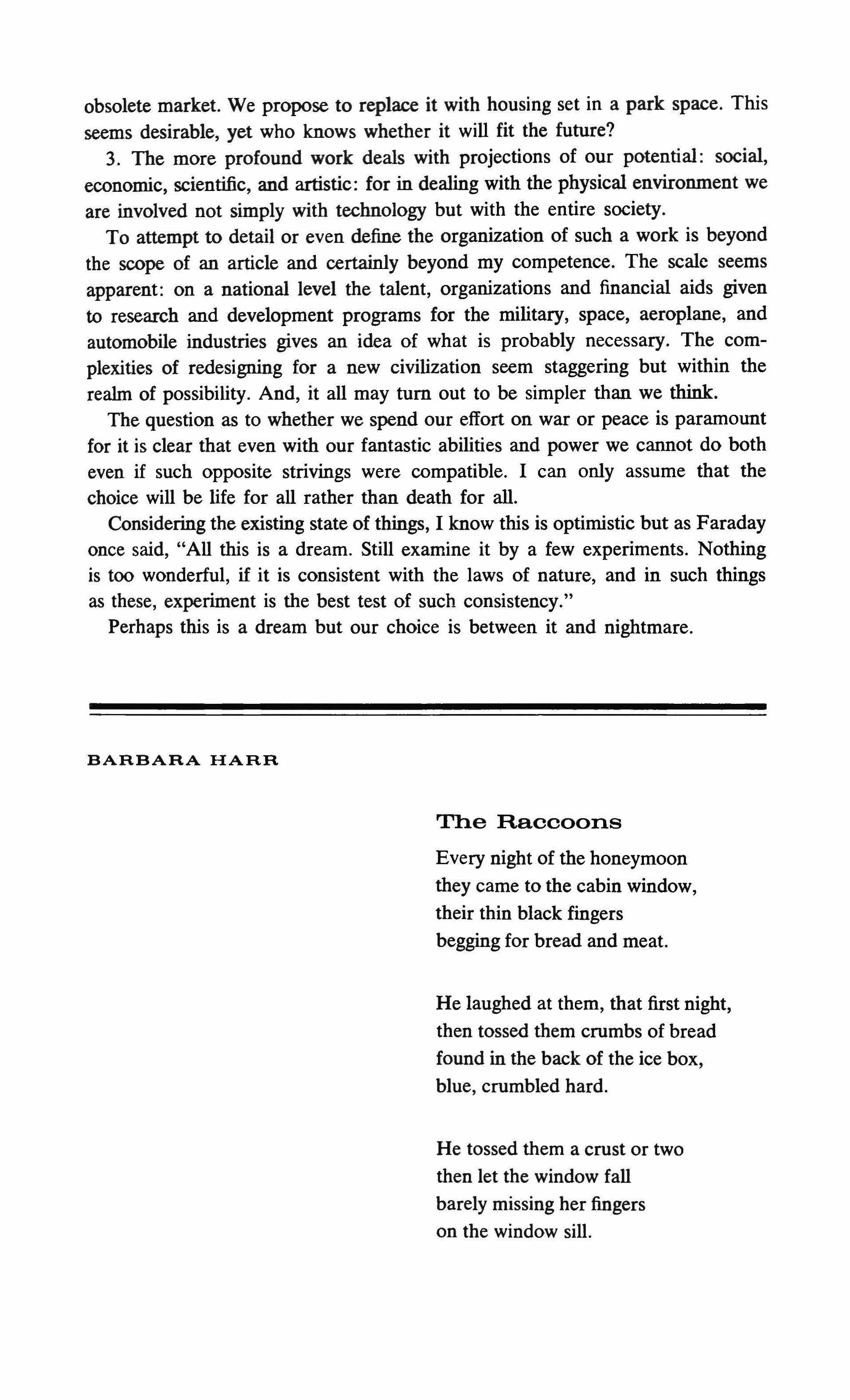
Every night of the honeymoon they came to the cabin window, their thin black fingers begging for bread and meat.
He laughed at them, that first night, then tossed them crumbs of bread found in the back of the ice box, blue, crumbled hard.
He tossed them a crust or two then let the window fall barely missing her fingers on the window sill.
BARBARA HARR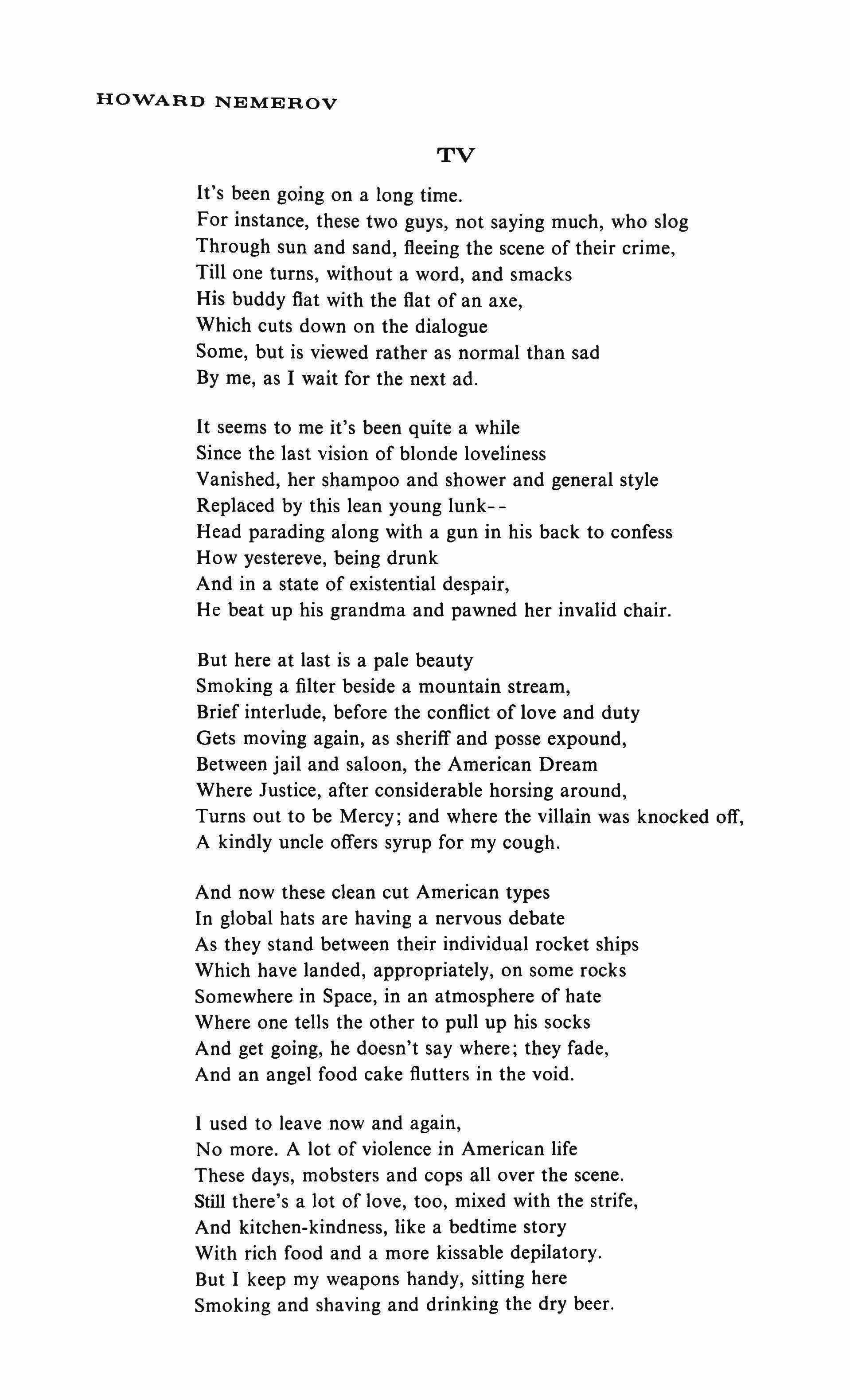
It's been going on a long time. For instance, these two guys, not saying much, who slog Through sun and sand, fleeing the scene of their crime, Till one turns, without a word, and smacks
His buddy flat with the flat of an axe, Which cuts down on the dialogue
Some, but is viewed rather as normal than sad By me, as I wait for the next ad.
It seems to me it's been quite a while Since the last vision of blonde loveliness
Vanished, her shampoo and shower and general style
Replaced by this lean young lunk--
Head parading along with a gun in his back to confess
How yestereve, being drunk
And in a state of existential despair, He beat up his grandma and pawned her invalid chair.
But here at last is a pale beauty
Smoking a filter beside a mountain stream, Brief interlude, before the conflict of love and duty Gets moving again, as sheriff and posse expound, Between jail and saloon, the American Dream Where Justice, after considerable horsing around, Turns out to be Mercy; and where the villain was knocked off, A kindly uncle offers syrup for my cough.
And now these clean cut American types
In global hats are having a nervous debate
As they stand between their individual rocket ships Which have landed, appropriately, on some rocks
Somewhere in Space, in an atmosphere of hate
Where one tells the other to pull up his socks
And get going, he doesn't say where; they fade, And an angel food cake flutters in the void.
I used to leave now and again, No more. A lot of violence in American life
These days, mobsters and cops all over the scene. Still there's a lot of love, too, mixed with the strife, And kitchen-kindness, like a bedtime story With rich food and a more kissable depilatory. But I keep my weapons handy, sitting here
Smoking and shaving and drinking the dry beer.
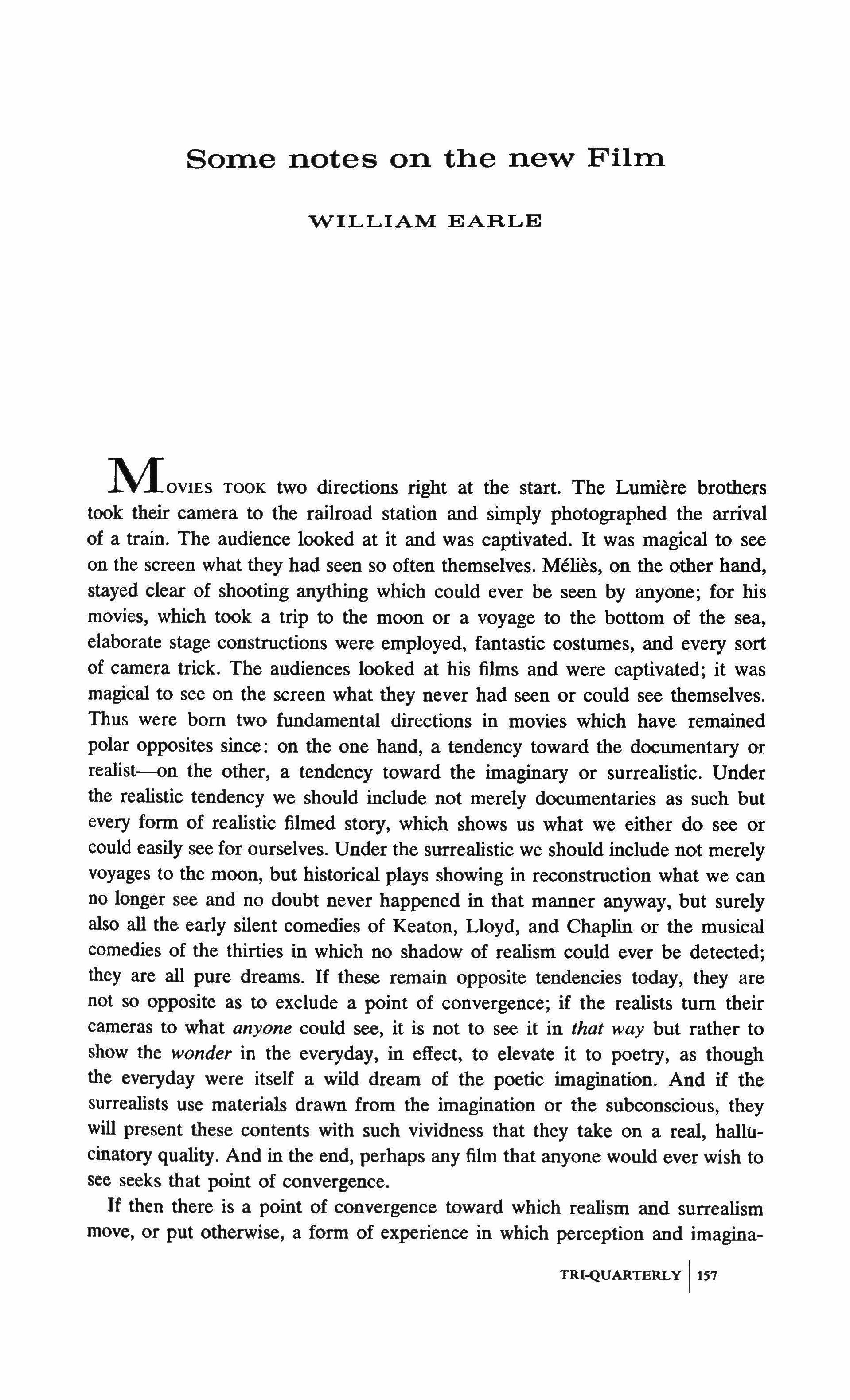
TOOK two directions right at the start. The Lumiere brothers took their camera to the railroad station and simply photographed the arrival of a train. The audience looked at it and was captivated. It was magical to see on the screen what they had seen so often themselves. Memes, on the other hand, stayed clear of shooting anything which could ever be seen by anyone; for his movies, which took a trip to the moon or a voyage to the bottom of the sea, elaborate stage constructions were employed, fantastic costumes, and every sort of camera trick. The audiences looked at his films and were captivated; it was magical to see on the screen what they never had seen or could see themselves. Thus were born two fundamental directions in movies which have remained polar opposites since: on the one hand, a tendency toward the documentary or realist-on the other, a tendency toward the imaginary or surrealistic. Under the realistic tendency we should include not merely documentaries as such but every form of realistic filmed story, which shows us what we either do see or could easily see for ourselves. Under the surrealistic we should include not merely voyages to the moon, but historical plays showing in reconstruction what we can no longer see and no doubt never happened in that manner anyway, but surely also all the early silent comedies of Keaton, Lloyd, and Chaplin or the musical comedies of the thirties in which no shadow of realism could ever be detected; they are all pure dreams. If these remain opposite tendencies today, they are not so opposite as to exclude a point of convergence; if the realists tum their cameras to what anyone could see, it is not to see it in that way but rather to show the wonder in the everyday, in effect, to elevate it to poetry, as though the everyday were itself a wild dream of the poetic imagination. And if the surrealists use materials drawn from the imagination or the subconscious, they will present these contents with such vividness that they take on a real, hallucinatory quality. And in the end, perhaps any film that anyone would ever wish to see seeks that point of convergence. If then there is a point of convergence toward which realism and surrealism move, or put otherwise, a form of experience in which perception and imagina-
TRI-QUARTERLy 11s7

tion coincide, where imagination gives meaning to what can be seen, and perception prevents imagination from escaping into the merely fanciful, irrelevant and ultimately trivial, still the functions of these two factors are not exactly on the same footing. They aim at a point of convergence which is essentially "poetic" rather than "correct depiction"; the ideal film then intends to be experienced immediately as a visual poem rather than judged as true or false to a subjectmatter already known. If it is a poem, it is an invention of the poetic imagination and proceeds out of the freedom of that imagination; there can be no "theory" of that freedom, no preexistent "standards" which it must live up to. What could be the source of such standards? For either they represent nothing but a generalization from films already made, in which case the standards have no authority whatsoever over those not yet made, or they descend down from the conceptual heaven of abstractions such as "work of art" or "poetic film", in which case again, their specification toward this or that particular film represents nothing less than the re-creation of that specific film itself, and has no authority against or for it. In a word, criticism of the film can hardly have the aim of demonstrating from supposed criteria the value of any film whatsoever. No work of art exists for the sake of any such evaluation; a work of art asks only to be seen and not judged. They were never made in the first place to be placed under some generality; no doubt at all, once made, they must necessarily fall under some generality, providing the generalities are general enough, but it is not for that reason they were made in the first place. Such criticism is condemned, like Hegel's owl, to a retrospective glance, and should regard itself as a history of the film rather than its critique.
If criticism then is without authority when it seeks to evaluate films, it is superfluous when it wishes to "explicate" them. A movie is a show; it discloses what had been concealed from us in reality, or what had never been before as in surrealism. To whatever extent the work is successful, it does indeed show and not conceal; what need therefore for explications? Should we not rather measure the success of a work by the extent to which it dispenses us from the task of explaining it? In this sense, criticism is condemned to work upon failure, trying to re-do what was ill done in the first place. None of which should prevent critical writings in certain cases from being more interesting works than their original subjects.
The following remarks then should not be understood as covertly arguing for certain standards of judgment, or attempting to define the film as such, or doing anything more insidious than defining a certain sensibility, that which aims at making movies move, suggesting techniques for the prevention of cinematic boredom. Man Ray once said that in the best film he had ever seen, there were but ten minutes worth seeing, and in the worst films he had seen, there were still ten minutes worth seeing. Thirty years later, he had found no reason to alter his judgment." The sober truth is that while movies hold out so many promises, they usually end in frightful boredom. One is invited to sit in a darkened chamber for an hour and a half looking at a familiar plot unfold itself toward its familiar end, starring familiar faces saying their familiar things, achieving a
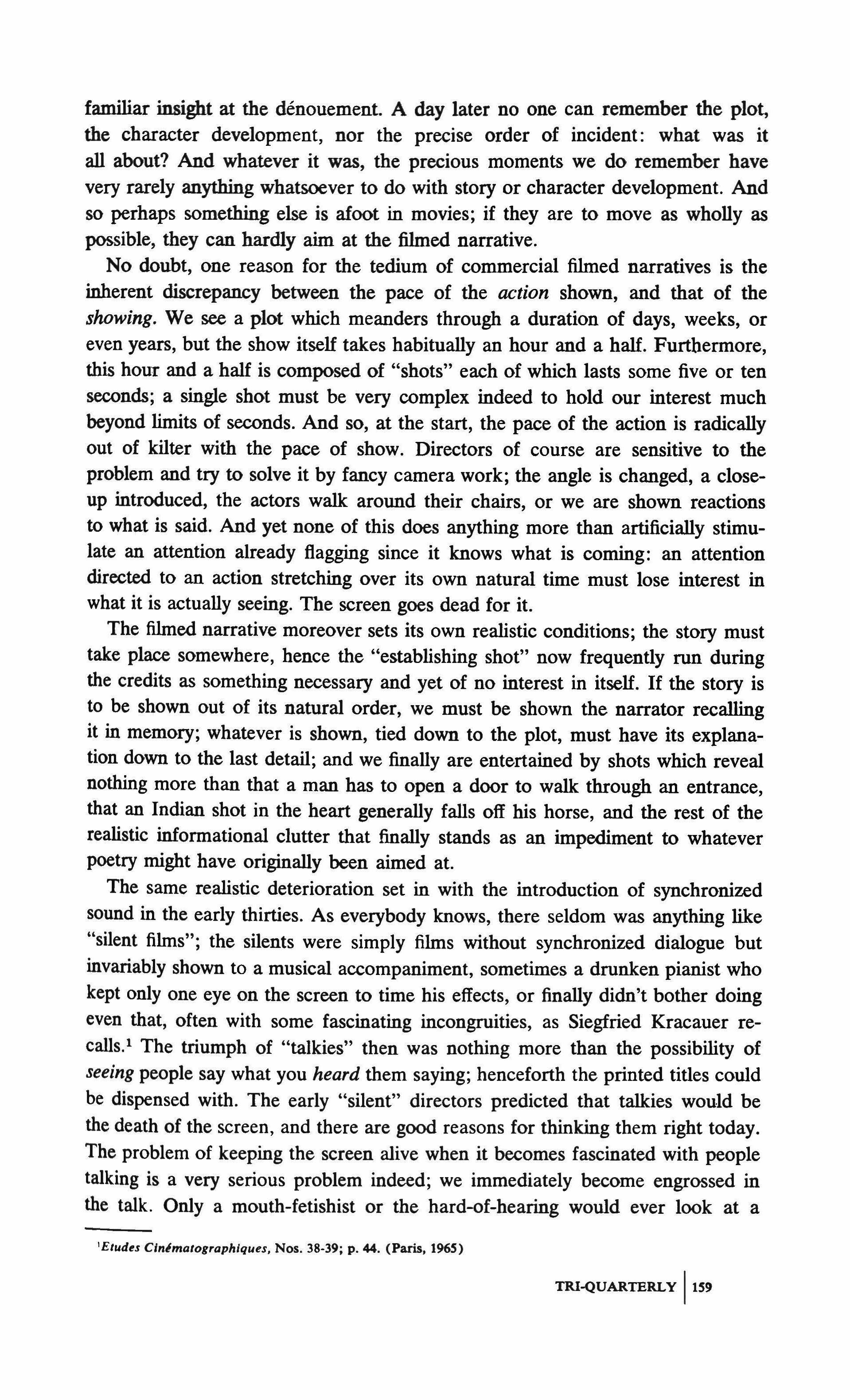
familiar insight at the denouement. A day later no one can remember the plot, the character development, nor the precise order of incident: what was it all about? And whatever it was, the precious moments we do remember have very rarely anything whatsoever to do with story or character development. And so perhaps something else is afoot in movies; if they are to move as wholly as possible, they can hardly aim at the filmed narrative.
No doubt, one reason for the tedium of commercial filmed narratives is the inherent discrepancy between the pace of the action shown, and that of the showing. We see a plot which meanders through a duration of days, weeks, or even years, but the show itself takes habitually an hour and a half. Furthermore, this hOUT and a half is composed of "shots" each of which lasts some five or ten seconds; a single shot must be very complex indeed to hold our interest much beyond limits of seconds. And so, at the start, the pace of the action is radically out of kilter with the pace of show. Directors of course are sensitive to the problem and try to solve it by fancy camera work; the angle is changed, a closeup introduced, the actors walk around their chairs, or we are shown reactions to what is said. And yet none of this does anything more than artificially stimulate an attention already flagging since it knows what is coming: an attention directed to an action stretching over its own natural time must lose interest in what it is actually seeing. The screen goes dead for it.
The filmed narrative moreover sets its own realistic conditions; the story must take place somewhere, hence the "establishing shot" now frequently run during the credits as something necessary and yet of no interest in itself. If the story is to be shown out of its natural order, we must be shown the narrator recalling it in memory; whatever is shown, tied down to the plot, must have its explanation down to the last detail; and we finally are entertained by shots which reveal nothing more than that a man has to open a door to walk through an entrance, that an Indian shot in the heart generally falls off his horse, and the rest of the realistic informational clutter that finally stands as an impediment to whatever poetry might have originally been aimed at.
The same realistic deterioration set in with the introduction of synchronized sound in the early thirties. As everybody knows, there seldom was anything like "silent films"; the silents were simply films without synchronized dialogue but invariably shown to a musical accompaniment, sometimes a drunken pianist who kept only one eye on the screen to time his effects, or finally didn't bother doing even that, often with some fascinating incongruities, as Siegfried Kracauer recalls.' The triumph of "talkies" then was nothing more than the possibility of seeing people say what you heard them saying; henceforth the printed titles could be dispensed with. The early "silent" directors predicted that talkies would be the death of the screen, and there are good reasons for thinking them right today. The problem of keeping the screen alive when it becomes fascinated with people talking is a very serious problem indeed; we immediately become engrossed in the talk. Only a mouth-fetishist or the hard-of-hearing would ever look at a
'Eludes Clnlmalographlques. Nos. 38-39; p. 44. (Paris, 1965)
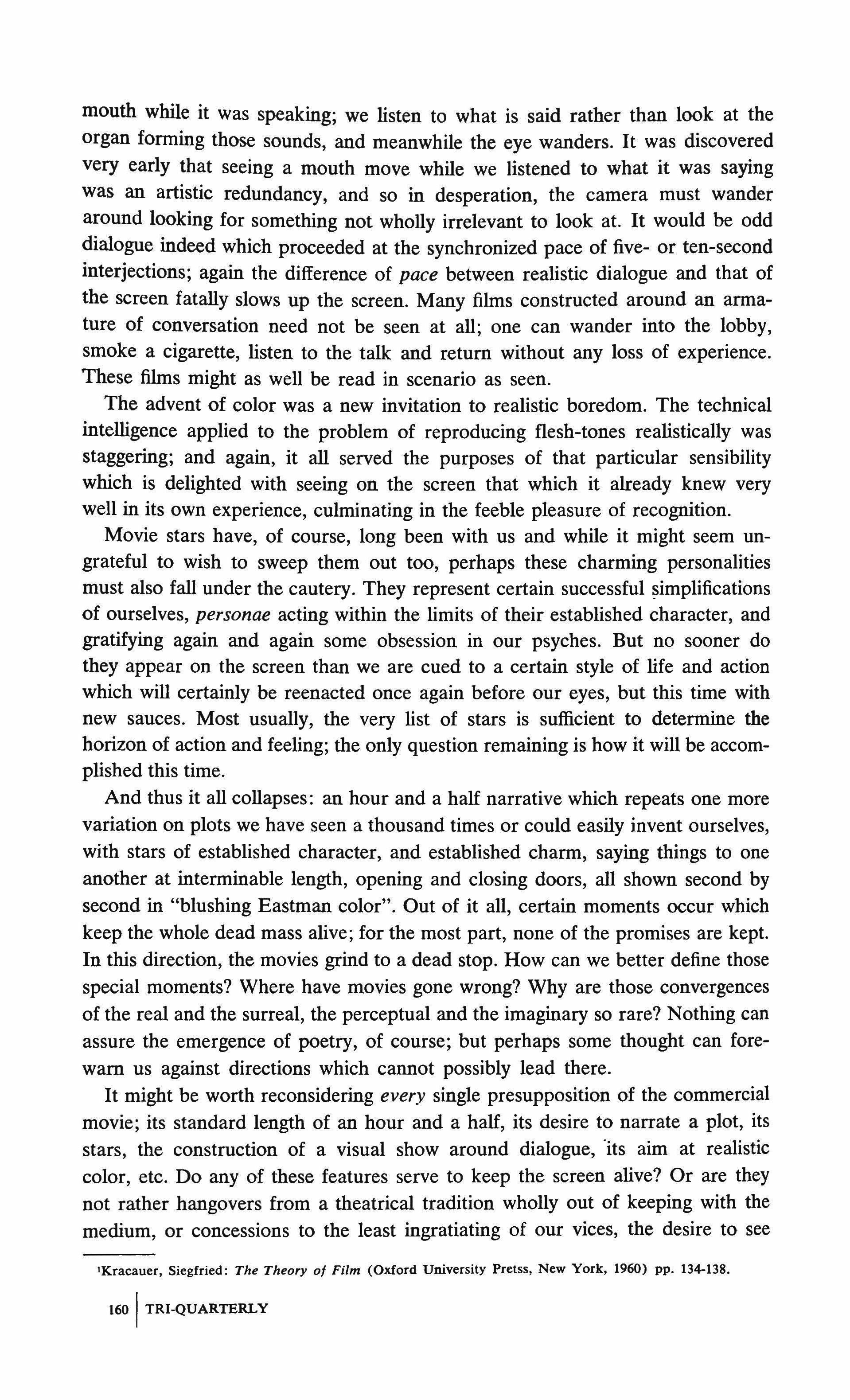
mouth while it was speaking; we listen to what is said rather than look at the organ forming those sounds, and meanwhile the eye wanders. It was discovered very early that seeing a mouth move while we listened to what it was saying was an artistic redundancy, and so in desperation, the camera must wander around looking for something not wholly irrelevant to look at. It would be odd dialogue indeed which proceeded at the synchronized pace of five- or ten-second interjections; again the difference of pace between realistic dialogue and that of the screen fatally slows up the screen. Many films constructed around an armature of conversation need not be seen at all; one can wander into the lobby, smoke a cigarette, listen to the talk and return without any loss of experience. These films might as well be read in scenario as seen.
The advent of color was a new invitation to realistic boredom. The technical intelligence applied to the problem of reproducing flesh-tones realistically was staggering; and again, it all served the purposes of that particular sensibility which is delighted with seeing on the screen that which it already knew very well in its own experience, culminating in the feeble pleasure of recognition.
Movie stars have, of course, long been with us and while it might seem ungrateful to wish to sweep them out too, perhaps these charming personalities must also fall under the cautery. They represent certain successful simplifications of ourselves, personae acting within the limits of their established character, and gratifying again and again some obsession in our psyches. But no sooner do they appear on the screen than we are cued to a certain style of life and action which will certainly be reenacted once again before our eyes, but this time with new sauces. Most usually, the very list of stars is sufficient to determine the horizon of action and feeling; the only question remaining is how it will be accomplished this time.
And thus it all collapses: an hour and a half narrative which repeats one more variation on plots we have seen a thousand times or could easily invent ourselves, with stars of established character, and established charm, saying things to one another at interminable length, opening and closing doors, all shown second by second in "blushing Eastman color". Out of it all, certain moments occur which keep the whole dead mass alive; for the most part, none of the promises are kept. In this direction, the movies grind to a dead stop. How can we better define those special moments? Where have movies gone wrong? Why are those convergences of the real and the surreal, the perceptual and the imaginary so rare? Nothing can assure the emergence of poetry, of course; but perhaps some thought can forewarn us against directions which cannot possibly lead there.
It might be worth reconsidering every single presupposition of the commercial movie; its standard length of an hour and a half, its desire to narrate a plot, its stars, the construction of a visual show around dialogue, 'its aim at realistic color, etc. Do any of these features serve to keep the screen alive? Or are they not rather hangovers from a theatrical tradition wholly out of keeping with the medium, or concessions to the least ingratiating of our vices, the desire to see
lKracauer. Siegfried: The Theory of Film (Oxford University Pretss, New York. 1960) pp. 134-138.
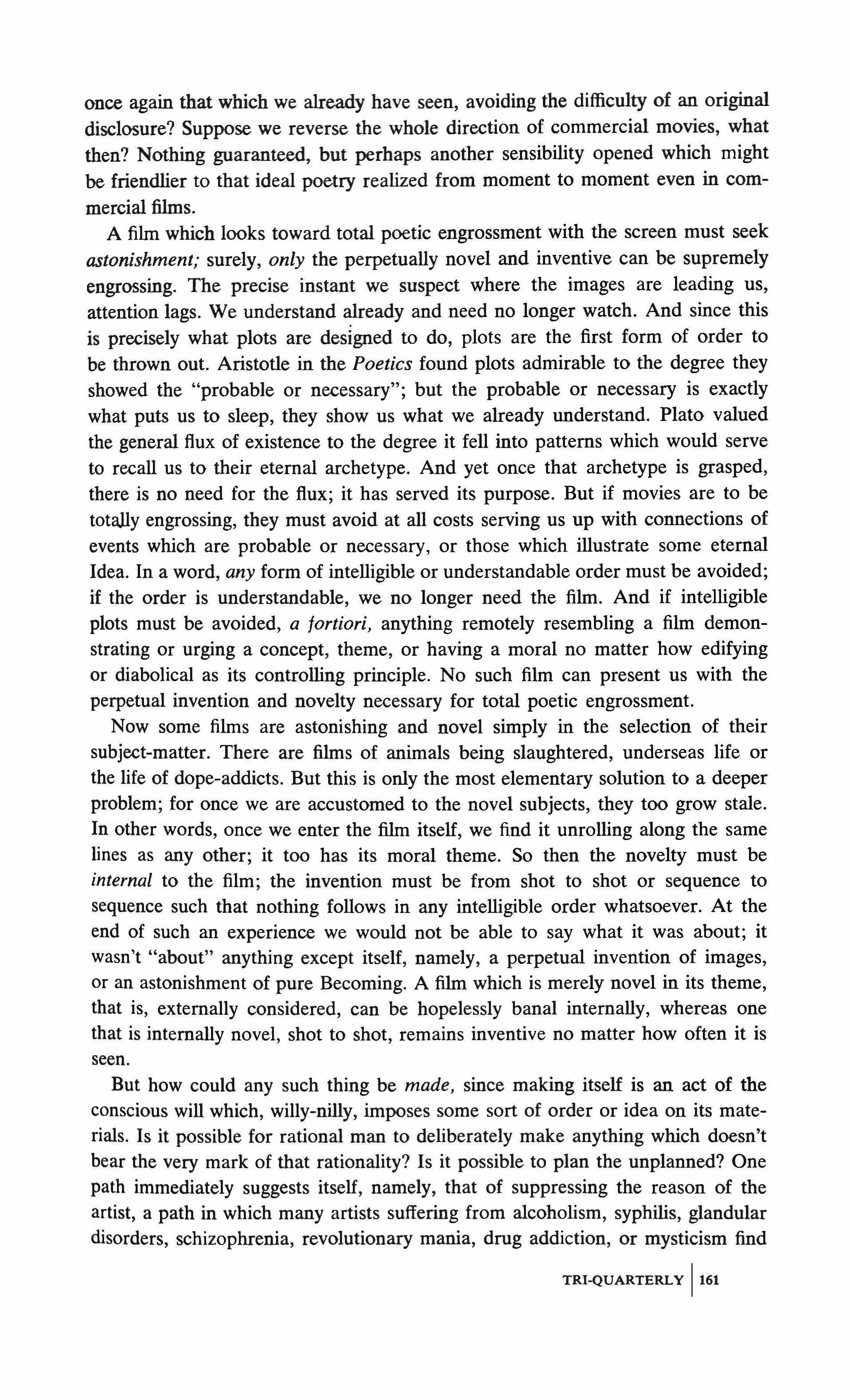
once again that which we already have seen, avoiding the difficulty of an original disclosure? Suppose we reverse the whole direction of commercial movies, what then? Nothing guaranteed, but perhaps another sensibility opened which might be friendlier to that ideal poetry realized from moment to moment even in commercial films.
A film which looks toward total poetic engrossment with the screen must seek astonishment; surely, only the perpetually novel and inventive can be supremely engrossing. The precise instant we suspect where the images are leading us, attention lags. We understand already and need no longer watch. And since this is precisely what plots are designed to do, plots are the first form of order to be thrown out. Aristotle in the Poetics found plots admirable to the degree they showed the "probable or necessary"; but the probable or necessary is exactly what puts us to sleep, they show us what we already understand. Plato valued the general flux of existence to the degree it fell into patterns which would serve to recall us to their eternal archetype. And yet once that archetype is grasped, there is no need for the flux; it has served its purpose. But if movies are to be totally engrossing, they must avoid at all costs serving us up with connections of events which are probable or necessary, or those which illustrate some eternal Idea. In a word, any form of intelligible or understandable order must be avoided; if the order is understandable, we no longer need the film. And if intelligible plots must be avoided, a fortiori, anything remotely resembling a film demonstrating or urging a concept, theme, or having a moral no matter how edifying or diabolical as its controlling principle. No such film can present us with the perpetual invention and novelty necessary for total poetic engrossment.
Now some films are astonishing and novel simply in the selection of their subject-matter. There are films of animals being slaughtered, underseas life or the life of dope-addicts. But this is only the most elementary solution to a deeper problem; for once we are accustomed to the novel subjects, they too grow stale. In other words, once we enter the film itself, we find it unrolling along the same lines as any other; it too has its moral theme. So then the novelty must be internal to the film; the invention must be from shot to shot or sequence to sequence such that nothing follows in any intelligible order whatsoever. At the end of such an experience we would not be able to say what it was about; it wasn't "about" anything except itself, namely, a perpetual invention of images, or an astonishment of pure Becoming. A film which is merely novel in its theme, that is, externally considered, can be hopelessly banal internally, whereas one that is internally novel, shot to shot, remains inventive no matter how often it is seen.
But how could any such thing be made, since making itself is an act of the conscious will which, willy-nilly, imposes some sort of order or idea on its materials. Is it possible for rational man to deliberately make anything which doesn't bear the very mark of that rationality? Is it possible to plan the unplanned? One path immediately suggests itself, namely, that of suppressing the reason of the artist, a path in which many artists suffering from alcoholism, syphilis, glandular disorders, schizophrenia, revolutionary mania, drug addiction, or mysticism find
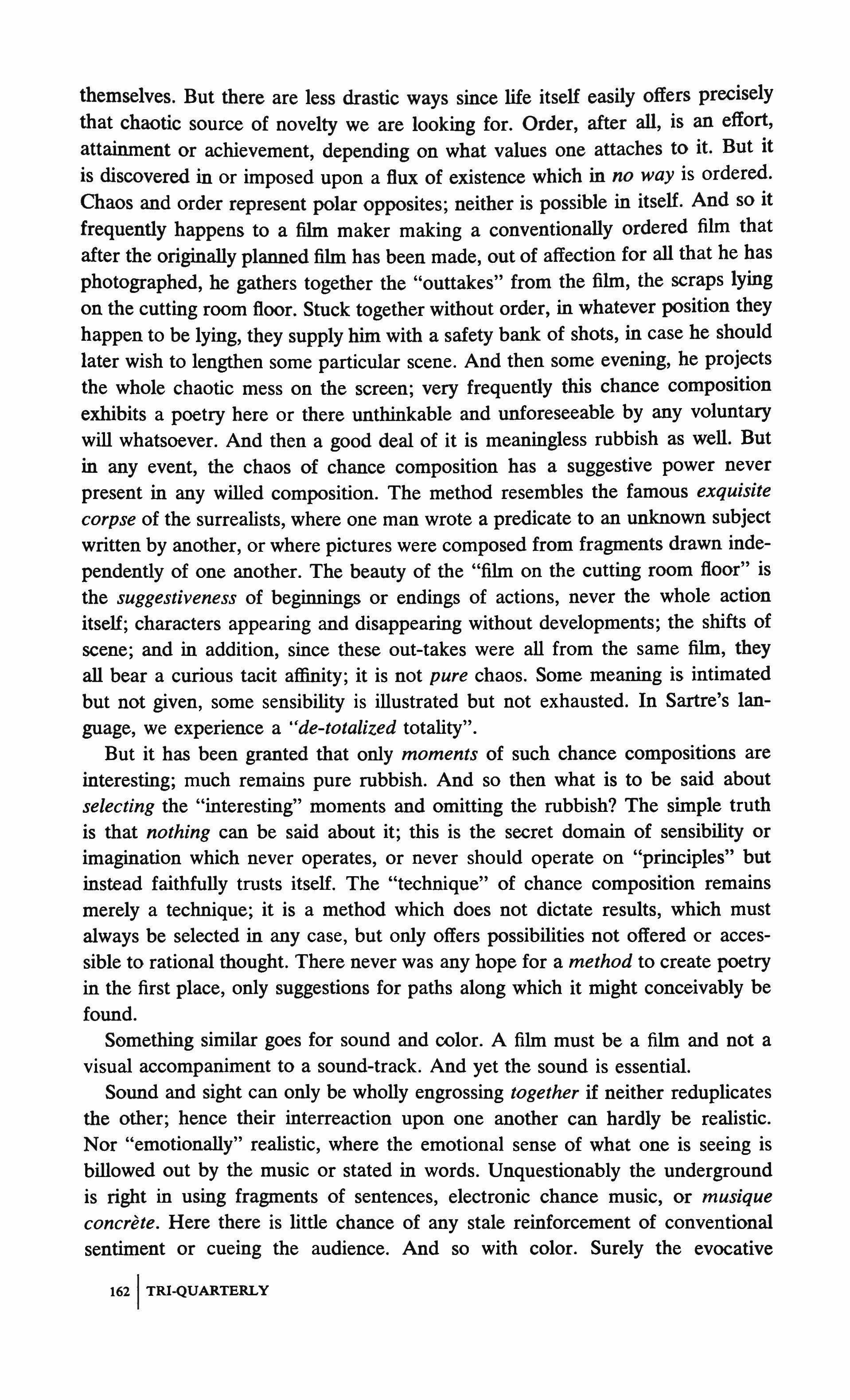
themselves. But there are less drastic ways since life itself easily offers precisely that chaotic source of novelty we are looking for. Order, after all, is an effort, attainment or achievement, depending on what values one attaches to it. But it is discovered in or imposed upon a flux of existence which in no way is ordered. Chaos and order represent polar opposites; neither is possible in itself. And so it frequently happens to a film maker making a conventionally ordered film that after the originally planned film has been made, out of affection for all that he has photographed, he gathers together the "outtakes" from the film, the scraps lying on the cutting room floor. Stuck together without order, in whatever position they happen to be lying, they supply him with a safety bank of shots, in case he should later wish to lengthen some particular scene. And then some evening, he projects the whole chaotic mess on the screen; very frequently this chance composition exhibits a poetry here or there unthinkable and unforeseeable by any voluntary will whatsoever. And then a good deal of it is meaningless rubbish as well. But in any event, the chaos of chance composition has a suggestive power never present in any willed composition. The method resembles the famous exquisite corpse of the surrealists, where one man wrote a predicate to an unknown subject written by another, or where pictures were composed from fragments drawn independently of one another. The beauty of the "film on the cutting room floor" is the suggestiveness of beginnings or endings of actions, never the whole action itself; characters appearing and disappearing without developments; the shifts of scene; and in addition, since these out-takes were all from the same film, they all bear a curious tacit affinity; it is not pure chaos. Some meaning is intimated but not given, some sensibility is illustrated but not exhausted. In Sartre's language, we experience a "de-totalized totality".
But it has been granted that only moments of such chance compositions are interesting; much remains pure rubbish. And so then what is to be said about selecting the "interesting" moments and omitting the rubbish? The simple truth is that nothing can be said about it; this is the secret domain of sensibility or imagination which never operates, or never should operate on "principles" but instead faithfully trusts itself. The "technique" of chance composition remains merely a technique; it is a method which does not dictate results, which must always be selected in any case, but only offers possibilities not offered or accessible to rational thought. There never was any hope for a method to create poetry in the first place, only suggestions for paths along which it might conceivably be found.
Something similar goes for sound and color. A film must be a film and not a visual accompaniment to a sound-track. And yet the sound is essential.
Sound and sight can only be wholly engrossing together if neither reduplicates the other; hence their interreaction upon one another can hardly be realistic. Nor "emotionally" realistic, where the emotional sense of what one is seeing is billowed out by the music or stated in words. Unquestionably the underground is right in using fragments of sentences, electronic chance music, or musique concrete. Here there is little chance of any stale reinforcement of conventional sentiment or cueing the audience. And so with color. Surely the evocative 1621 TRl-QUARTERLY

possibilities of color do not lie in the direction of Antonioni's Red Desert, where color sets the "mood", that is, reinforces it much as "mood music" tries to do. Why not a film where things are lit up with chance colors?
And so stage by stage, virtually every step taken by the commercial film must be reversed, if total poetic engrossment is to have a chance. Finally even the most superficial conditions of the commercial movie must be denied. No poetic film can last for an hour and a half, let alone the three or four hours devoted to those monstrous bores, the spectacle of a Lawrence of Arabia or a Cleopatra. Poetic and lyric intensity can exist as Edgar Allen Poe showed only for a matter of minutes: in a word, the film we are aiming at is a short. For what audience? Again why presuppose those vast, international audiences necessary to repay the costs of huge feature-length films; the poetic film like poetry or intimate music of every sort speaks to its own small, varied, select audience. Why should there ever have been a presupposition that a film's value is measured by the size or unanimity of its audience? The genuinely poetic film finds its own audience in a living-room or small cinema-club and particularly among the young whose tastes have not already been ruined by the intelligible and obvious and who remain open to the imagination.
What could such a movie disclose? Superficially it might seem that it is in pursuit of novelty for "novelty'S sake"; but genuine novelty is no slight value, and superficial novelty is superficial largely because it is not novel enough. An internally novel and inventive film would have the merit of baffling an understanding which lived off the supposition that it already understood or was capable of understanding what was shown. If the understandable is the very home of the boring, the accidental, chaotic, unforeseeable by repelling a priori concepts, might elicit the life of the imagination. By poking into domains which illustrate no theme whatsoever, or showing beginnings of actions which develop into nothing and therefore suggest everything, endings of actions never given in their entirety, characters never shown in the round and completely, briefly by a pure surrealism of the screen, the short poetic film might set the imagination to work rather than put it to sleep with a full dinner of reality. If everything is shown, total actions, then indeed what has the imagination left to do except passively apprehend a completed work? Further, such films would have an intimacy to each imagination impossible to the realistic work; in its very incompleteness, each single imagination could "complete" it in its own way, or in many ways on many occasions; the work itself would serve only as a point of departure for the dreaming imagination of each spectator. And since the spectator now is actively involved in the spectacle, a co-creator of it, it is his in a way no completed film could ever be.
If all works of art are disclosures, what would such films disclose? In its very form, that of a happening, it might disclose that which the natural philosopher in each of us works hard to forget, namely, that the domain of existence Or life is precisely that of the accidental. The necessary or the self-coherent, defines the ideal domain of logic and pure reason. That is the domain where nothing happens and where nothing is accidental. If reason can occasionally TRI-QUARTERLy 1163
discern patterns in life, it is because it looks for them and ignores the chaos which has accidentally illustrated such patterns. If the artist deliberately constructs such patterns, it is only to remove himself from the novelty of existence to the ease of the concept. His work will be summarizeable because it was never anything but a diagram of a concept in the first place. The extent to which it is not summarizable is the extent to which it rests upon the chaotic element of existence, the ambiguous or polyvalent character of its meanings, or, in a word, the extent to which his work must essentially be experienced rather than critically explicated.
 ROBERT BLOOM
ROBERT BLOOM
Rhythm of bears
Bears have a different spring. Than men or other bears. Rhythm invents itself, a kind of bobbing or a nose swung round to sniff the air. And duck behind the bear.
They are separate bears, discovering behind them. Other bears, behind, are there, but of themselves. When two bears come to be, they are two selves.
That is how bears are, dancing to no music; but their dance is theirs.
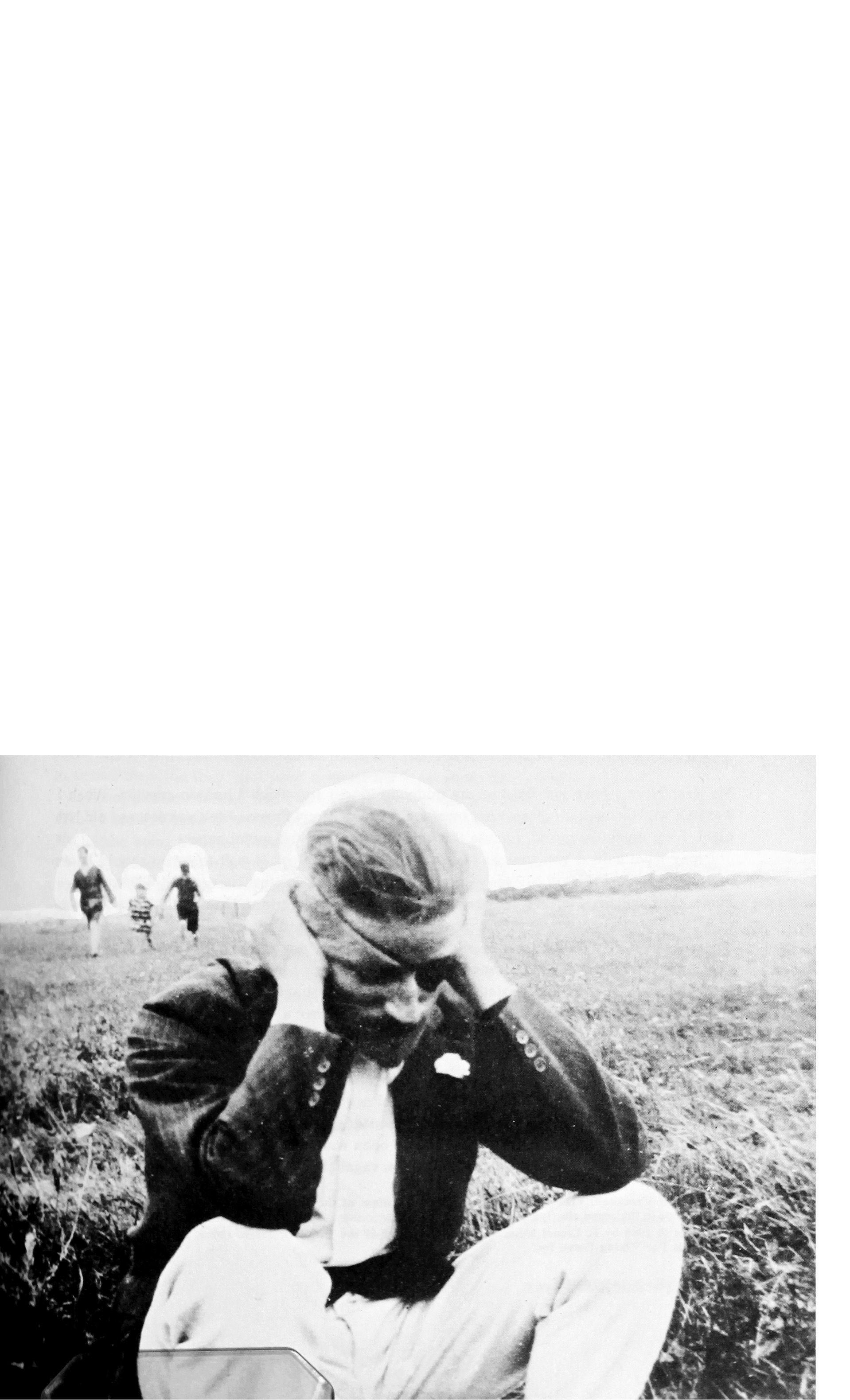 Edited by Richard Ellmann
Edited by Richard Ellmann
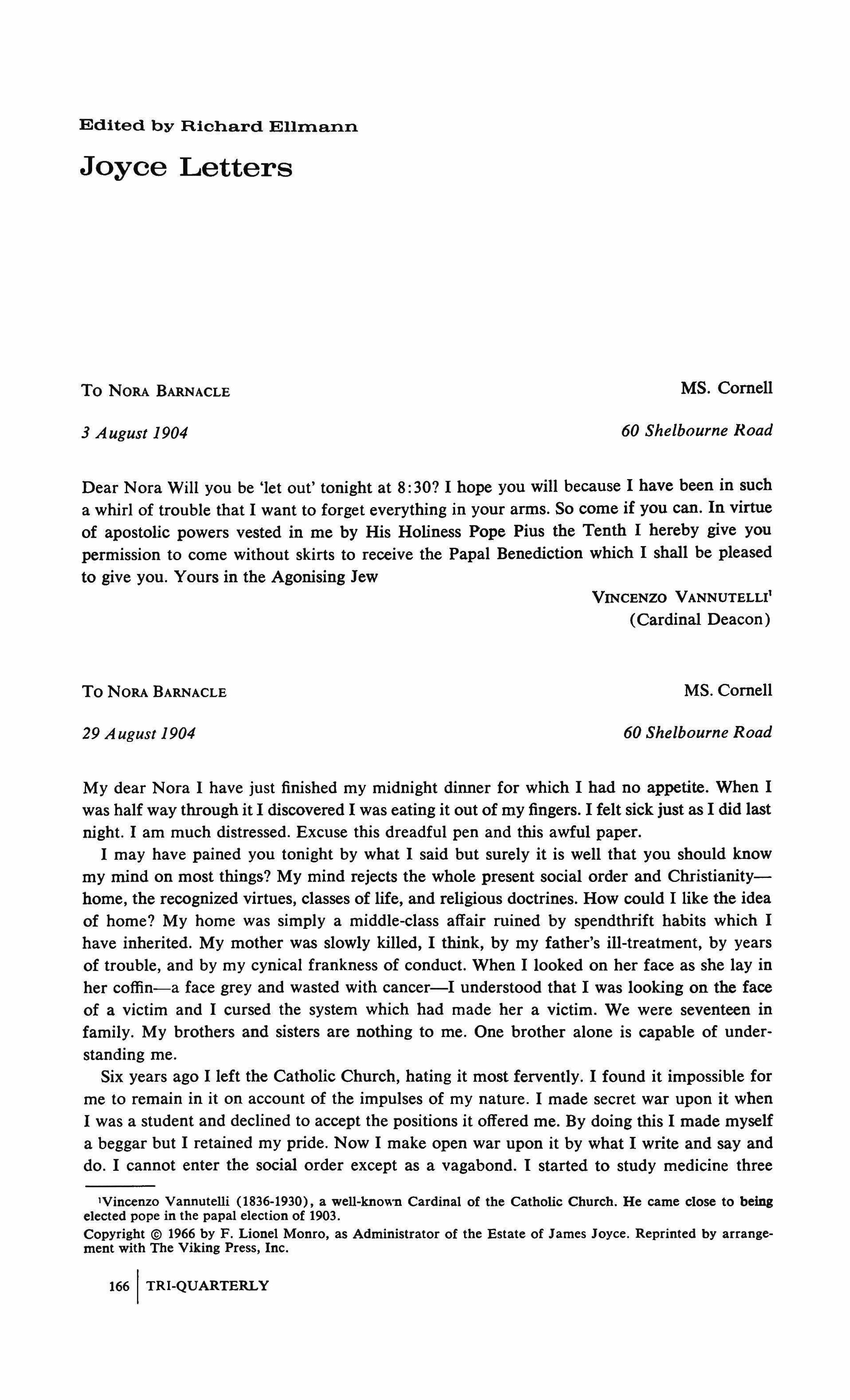
To NORA BARNACLE
3 August 1904
Dear Nora Will you be 'let out' tonight at 8:30? I hope you will because I have been in such a whirl of trouble that I want to forget everything in your arms. So come if you can. In virtue of apostolic powers vested in me by His Holiness Pope Pius the Tenth I hereby give you permission to come without skirts to receive the Papal Benediction which I shall be pleased to give you. Yours in the Agonising Jew
To NORA BARNACLE
29 August 1904
My dear Nora I have just finished my midnight dinner for which I had no appetite. When I was half way through it I discovered I was eating it out of my fingers. I felt sick just as I did last night. I am much distressed. Excuse this dreadful pen and this awful paper.
I may have pained you tonight by what I said but surely it is well that you should know my mind on most things? My mind rejects the whole present social order and Christianityhome, the recognized virtues, classes of life, and religious doctrines. How could I like the idea of home? My home was simply a middle-class affair ruined by spendthrift habits which I have inherited. My mother was slowly killed, I think, by my father's ill-treatment, by years of trouble, and by my cynical frankness of conduct. When I looked on her face as she lay in her coffin-a face grey and wasted with cancer-I understood that I was looking on the face of a victim and I cursed the system which had made her a victim. We were seventeen in family. My brothers and sisters are nothing to me. One brother alone is capable of understanding me.
Six years ago I left the Catholic Church, hating it most fervently. I found it impossible for me to remain in it on account of the impulses of my nature. I made secret war upon it when I was a student and declined to accept the positions it offered me. By doing this I made myself a beggar but I retained my pride. Now I make open war upon it by what I write and say and do. I cannot enter the social order except as a vagabond. I started to study medicine three
'Vincenzo Vannutelli (1836-1930), a well-known Cardinal of the Catholic Church. He came close to being elected pope in the papal election of 1903.
Copyright © 1966 by F. Lionel Monro, as Administrator of the Estate of James Joyce. Reprinted by arrangement with The Viking Press, Inc.
Y
times, law once, music once. A week ago I was arranging to go away as a travelling actor. I could put no energy into the plan because you kept pulling me by the elbow. The actual difficulties of my life are incredible but I despise them.
When you went in tonight I wandered along toward Grafton St. where I stood for a long time leaning against a lamp-post, smoking. The street was full of a life which I have poured a stream of my youth upon. While I stood there I thought of a few sentences I wrote some years ago when I lived in Paris--these sentences which follow- 'They pass in twos and threes amid the life of the boulevard, walking like the people who have leisure in a place lit up for them. They are in the pastry cook's chattering, crushing little fabrics of pastry, or seated silently at tables by the cafe door, or descending from carriages with a busy stir of garments soft as the voice of the adulterer. They pass in an air of perfumes. Under the perfumes their bodies have a warm humid smell'-'
While I was repeating this to myself I knew that that life was still waiting for me if I chose to enter it. It could not give me perhaps the intoxication it had once given but it was still there and now that I am wiser and more controllable it was safe. It would ask no questions, expect nothing from me but a few moments of my life, leaving the rest free, and would promise me pleasure in return. I thought of all this and without regret I rejected it. It was useless for me; it could not give me what I wanted.
You have misunderstood, I think, some passages in a letter I wrote you and I have noticed a certain shyness in your manner as if the recollection of that night troubled you. I however consider it a kind of sacrament and the recollection of it fills me with amazed joy. You will perhaps not understand at once why it is that I honour you so much on account of it as you do not know much of my mind. But at the same time it was a sacrament which left in me a final sense of sorrow and degradation-sorrow because 1 saw in you an extraordinary, melancholy tenderness which had chosen that sacrament as a compromise, and degradation because I understood that in your eyes 1 was inferior to a convention of our present society.
1 spoke to you satirically tonight but 1 was speaking of the world not of you. I am an enemy of the ignobleness and slavishness of people but not of you. Can you not see the simplicity which is at the back of all my disguises? We all wear masks. Certain people who know that we are much together often insult me about you. 1 listen to them calmly, disdaining to answer them but their least word tumbles my heart about like a bird in a storm.
It is not pleasant for me that I have to go to bed now remembering the last look of your eyes-a look of tired indifference-remembering the torture in your voice the other night. No human being has ever stood so close to my soul as you stand, it seems, and yet you can treat my words with painful rudeness ('I know what is talking now' you said). When 1 was younger 1 had a friend' to whom 1 gave myself freely-in a way more than 1 give to you and in a way less. He was Irish, that is to say, he was false to me.
I have not said a quarter of what 1 want to say but it is great labour writing with this cursed pen. I don't know what you will think of this letter. Please write to me, won't you? Believe me, my dear Nora, 1 honour you very much but 1 want more than your caresses. You have left me again in an anguish of doubt. JAJ

'The passage comprises all except the last sentence of an epiphany (MS. Cornell) of Parisian poules. It is adapted In Ulysses (London), pp. 52-53; (New York), p. 39.
'I. F. Byrne.
30 August 19042
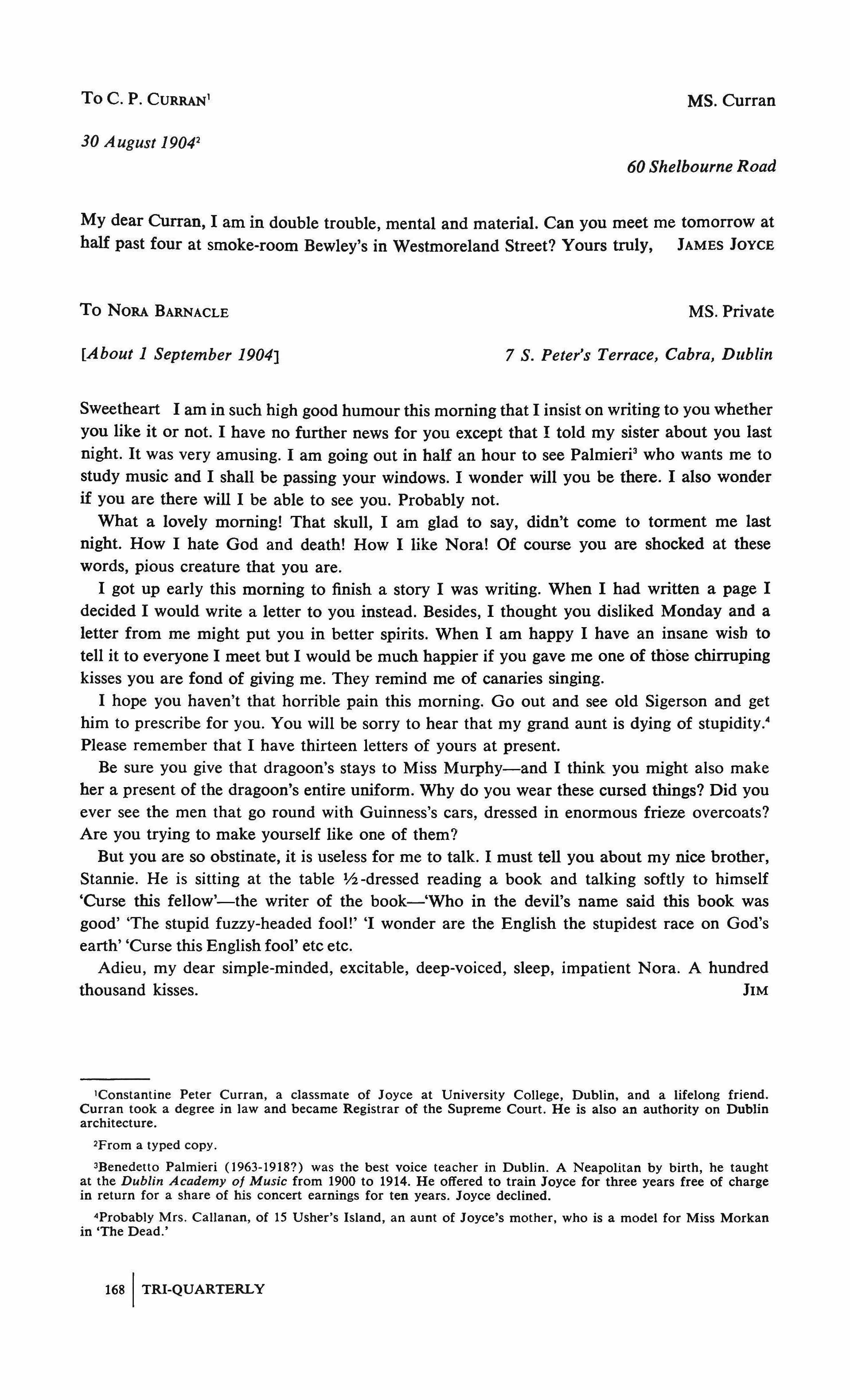
60 Shelbourne Road
My dear Curran, 1 am in double trouble, mental and material. Can you meet me tomorrow at half past four at smoke-room Bewley's in Westmoreland Street? Yours truly, JAMES JOYCE
To NORA BARNACLE MS. Private[About 1 September 1904]
7 S. Peter's Terrace, Cabra, Dublin
Sweetheart 1 am in such high good humour this morning that 1 insist on writing to you whether you like it or not. 1 have no further news for you except that I told my sister about you last night. It was very amusing. I am going out in half an hour to see Palmieri' who wants me to study music and 1 shall be passing your windows. 1 wonder will you be there. 1 also wonder if you are there will I be able to see you. Probably not.
What a lovely morning! That skull, 1 am glad to say, didn't come to torment me last night. How 1 hate God and death! How 1 like Nora! Of course you are shocked at these words, pious creature that you are.
I got up early this morning to finish a story 1 was writing. When 1 had written a page 1 decided 1 would write a letter to you instead. Besides, 1 thought you disliked Monday and a letter from me might put you in better spirits. When 1 am happy I have an insane wish to tell it to everyone 1 meet but 1 would be much happier if you gave me one of those chirruping kisses you are fond of giving me. They remind me of canaries singing.
I hope you haven't that horrible pain this morning. Go out and see old Sigerson and get him to prescribe for you. You will be sorry to hear that my grand aunt is dying of stupidity.' Please remember that 1 have thirteen letters of yours at present.
Be sure you give that dragoon's stays to Miss Murphy-and 1 think you might also make her a present of the dragoon's entire uniform. Why do you wear these cursed things? Did you ever see the men that go round with Guinness's cars, dressed in enormous frieze overcoats? Are you trying to make yourself like one of them?
But you are so obstinate, it is useless for me to talk. 1 must tell you about my nice brother, Stannie. He is sitting at the table 'h -dressed reading a book and talking softly to himself 'Curse this fellow'-the writer of the book-'Who in the devil's name said this book was good' 'The stupid fuzzy-headed fool!' 'I wonder are the English the stupidest race on God's earth' 'Curse this English fool' etc etc.
Adieu, my dear simple-minded, excitable, deep-voiced, sleep, impatient Nora. A hundred thousand kisses. JIM
'Constantine Peter Curran, a classmate of Joyce at University College, Dublin, and a lifelong friend. Curran took a degree in law and became Registrar of the Supreme Court. He is also an authority on Dublin architecture.
2From a typed copy.
'Benedetto Palmieri (1963-1918?) was the best voice teacher in Dublin. A Neapolitan by birth, he taught at the Dublin Academy 0/ Music from 1900 to 1914. He offered to train Joyce for three years free of charge in return for a share of his concert earnings for ten years. Joyce declined.
'Probably Mrs. Callanan, of 15 Usher's Island, an aunt of Joyce's mother, who is a model for Miss Morkan in 'The Dead.'
10 September 1904

The Tower, Sandycove'
My dear, dear Nora I suppose you have been very much upset since last night. I will not speak of myself for I feel as if I had acted very cruelly. In a way I have no right to expect that you should regard me as anything more than the rest of men-in fact in view of my own life I have no right at all to expect it. But yet I seemed to have expected it if only because I myself had never regarded anyone as I regarded you. There is something also a little devilish in me that makes me delight in breaking down people's ideas of me and proving to them that I am really selfish, proud, cunning and regardless of others. I am sorry that my attempt last night to act according to what I believed to be right should have given you so much pain but I do not see how I could have acted otherwise. I wrote you a long letter explaining as well as I could how I felt that night and it seemed to me that you were putting aside what I said and treating me as if I were simply a casual comrade in lust. You will perhaps object to the brutality of my words but, believe me, to treat me as that is, so far as my attitude towards you is concerned, to dishonour me. Surely to God you are a woman and can understand what I say! I know that you have acted very nobly and very generously to me but try and answer my frankness with like frankness. Above all do not go about brooding as it will make you ill and you know that you are in delicate health. Perhaps you will be able to send me even a line tonight to say that you can forgive me for all the pain I have caused you. JIM
To NORA BARNACLE21 September 1904
MS. Private
The Tower, Sandycove
Dear Nora It is such a dreadful morning that I suspect we shall not be able to meet tonight. It is pouring rain here and the sea is flying up along the rocks. I should like to sit down here at the fire by myself, but I have to go into town shortly to meet Mr. Cosgrave. It is just possible that it may become fine by evening, and, if so, I shall expect you, but do not come out unless it is fine. I hope you are getting better every day. Have you found that place on the map? If we don't meet tonight-tomorrow at 8. JIM
2Joyce left 60 Shelbourne Road about 1 September; he stayed a few nights with friends and relatives, then on 9 September was taken into the Martello tower by Oliver St. John Gogarty, who had leased it on 17 August 1904. (See also Oliver Gogarty 'The Tower: Fact and Fiction,' Irish Times, 16 June 1962, p. 11.) The arrangement, as two letters from Gogarty to G. N. A. Bell of July 1904 make clear, was that Joyce should do the tower housekeeping in return for bed and (presumably) board; he would thus be enabled to finish his novel in about a year's time. (Ulick O'Connor, The Times I've Seen: Oliver SI. John Gogarty [New York, 19641, p. 82.) Besides this helpmeet, Gogarty had a guest in the tower, Samuel Chenevix Trench, who called himself Diarmuid Trench. Joyce used the tower as the setting for the first episode of Ulysses, and allowed Gogarty to be his principal model for Mulligan, and Trench his principal model for Haines.
12 September 1904 Leinster St
Dear Jim I received your letter which I return you many thanks I hope you did not get wet if you were in town to day I will be expecting to see you 8-15 to morrow evening hoping it will be fine I feel much better since last night but feels [sic] a bit lonely to night as it is so wet I was reading your letters all day as I had nothing else to do I read that long letter over and over again but could not understand it I think I will take it to you to morrow eve--and perhaps you might make me understand it no more at present from your loving Girl NORA X xxxx
excuse writing in haste
I suppose you will be lighting the fire when you get this
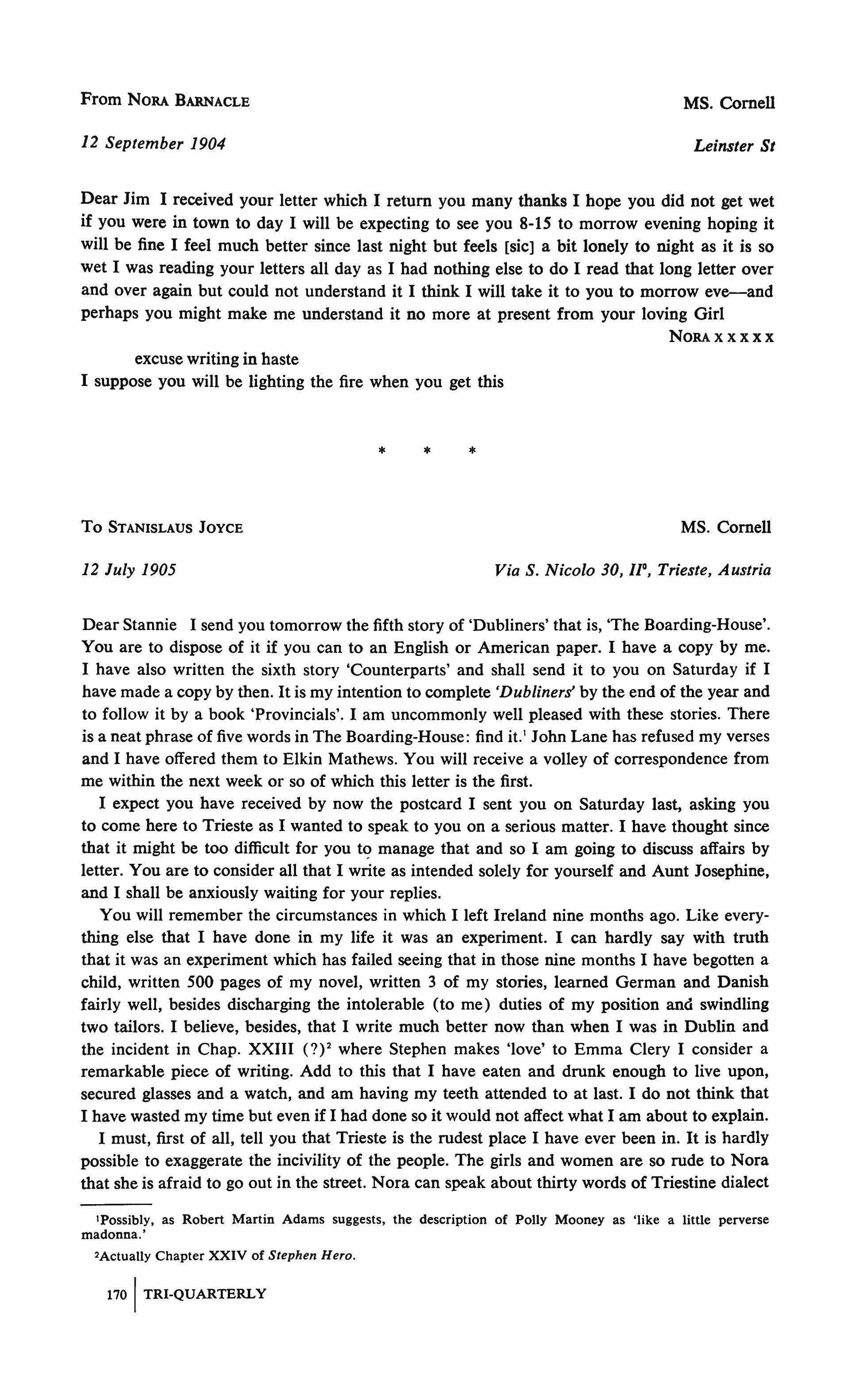 To STANISLAUS JOYCE MS. Cornell
To STANISLAUS JOYCE MS. Cornell
12 July 1905 Via S. Nicolo 30, 11", Trieste, Austria
Dear Stannie I send you tomorrow the fifth story of 'Dubliners' that is, 'The Boarding-House'. You are to dispose of it if you can to an English or American paper. I have a copy by me. I have also written the sixth story 'Counterparts' and shall send it to you on Saturday if I have made a copy by then. It is my intention to complete 'Dubliners' by the end of the year and to follow it by a book 'Provincials'. I am uncommonly well pleased with these stories. There is a neat phrase of five words in The Boarding-House: find it.' John Lane has refused my verses and I have offered them to Elkin Mathews. You will receive a volley of correspondence from me within the next week or so of which this letter is the first.
I expect you have received by now the postcard I sent you on Saturday last, asking you to come here to Trieste as I wanted to speak to you on a serious matter. I have thought since that it might be too difficult for you to manage that and so I am going to discuss affairs by letter. You are to consider all that I write as intended solely for yourself and Aunt Josephine, and I shall be anxiously waiting for your replies.
You will remember the circumstances in which I left Ireland nine months ago. Like everything else that I have done in my life it was an experiment. I can hardly say with truth that it was an experiment which has failed seeing that in those nine months I have begotten a child, written 500 pages of my novel, written 3 of my stories, learned German and Danish fairly well, besides discharging the intolerable (to me) duties of my position and swindling two tailors. I believe, besides, that I write much better now than when I was in Dublin and the incident in Chap. XXIII (?)2 where Stephen makes 'love' to Emma Clery I consider a remarkable piece of writing. Add to this that I have eaten and drunk enough to live upon, secured glasses and a watch, and am having my teeth attended to at last. I do not think that I have wasted my time but even if I had done so it would not affect what I am about to explain.
I must, first of all, tell you that Trieste is the rudest place I have ever been in. It is hardly possible to exaggerate the incivility of the people. The girls and women are so rude to Nora that she is afraid to go out in the street. Nora can speak about thirty words of Triestine dialect
'Possibly, as Robert Martin Adams suggests, the description of Polly Mooney as 'like a little perverse madonna.'
2Actually Chapter XXIV of Stephen Hero.
170 I TRI-QUARTERLY
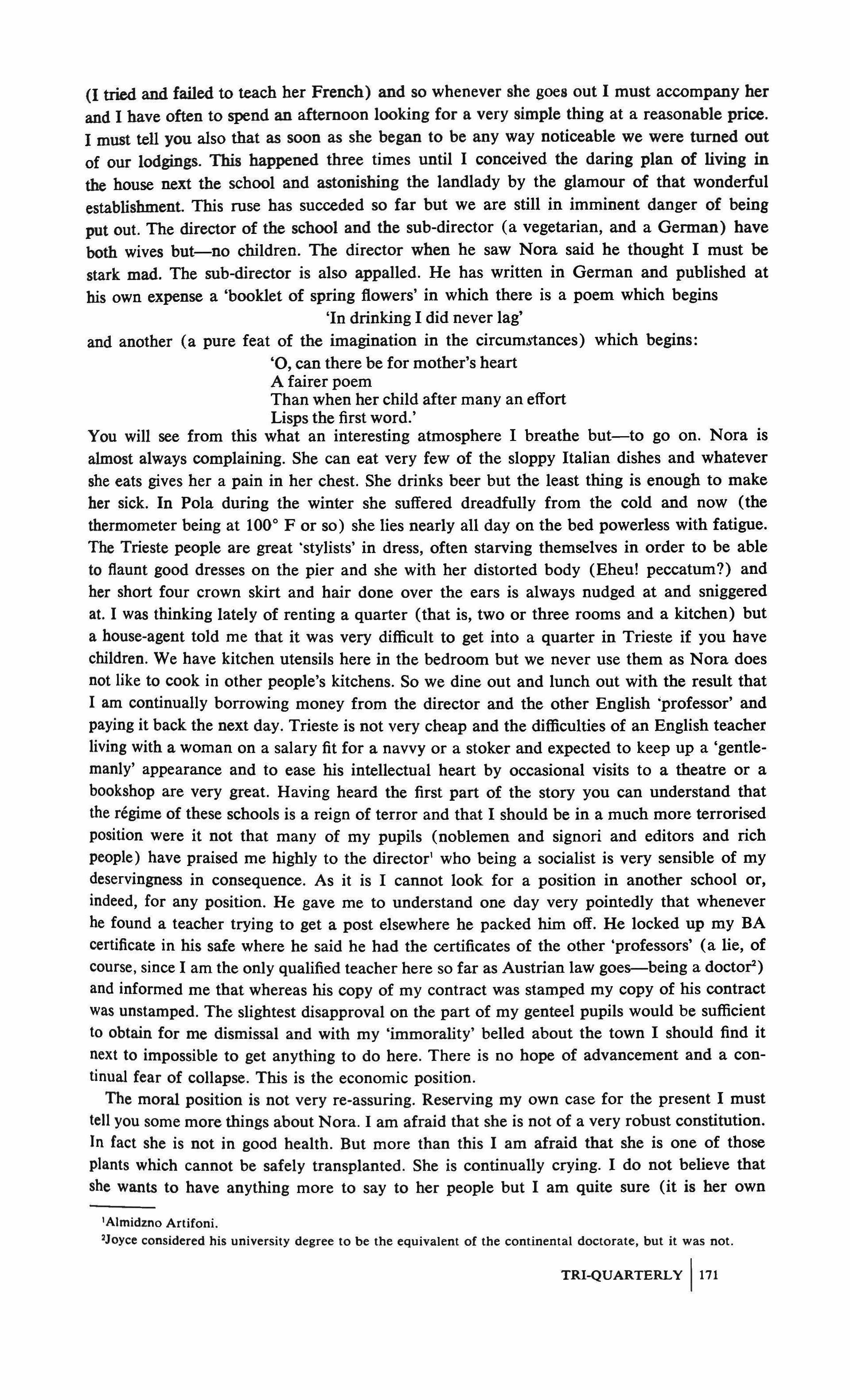
(I tried and failed to teach her French) and so whenever she goes out I must accompany her and I have often to spend an afternoon looking for a very simple thing at a reasonable price. I must tell you also that as soon as she began to be any way noticeable we were turned out of our lodgings. This happened three times until I conceived the daring plan of living in the house next the school and astonishing the landlady by the glamour of that wonderful establishment. This ruse has succeded so far but we are still in imminent danger of being put out. The director of the school and the sub-director (a vegetarian, and a German) have both wives but-no children. The director when he saw Nora said he thought I must be stark mad. The sub-director is also appalled. He has written in German and published at his own expense a 'booklet of spring flowers' in which there is a poem which begins 'In drinking I did never lag' and another (a pure feat of the imagination in the circumstances) which begins: '0, can there be for mother's heart
A fairer poem
Than when her child after many an effort
Lisps the first word.'
You will see from this what an interesting atmosphere I breathe but-to go on. Nora is almost always complaining. She can eat very few of the sloppy Italian dishes and whatever she eats gives her a pain in her chest. She drinks beer but the least thing is enough to make her sick. In Pola during the winter she suffered dreadfully from the cold and now (the thermometer being at 1000 F or so) she lies nearly all day on the bed powerless with fatigue. The Trieste people are great 'stylists' in dress, often starving themselves in order to be able to flaunt good dresses on the pier and she with her distorted body (Eheu! peccatum?) and her short four crown skirt and hair done over the ears is always nudged at and sniggered at. I was thinking lately of renting a quarter (that is, two or three rooms and a kitchen) but a house-agent told me that it was very difficult to get into a quarter in Trieste if you have children. We have kitchen utensils here in the bedroom but we never use them as Nora does not like to cook in other people's kitchens. So we dine out and lunch out with the result that I am continually borrowing money from the director and the other English 'professor' and paying it back the next day. Trieste is not very cheap and the difficulties of an English teacher living with a woman on a salary fit for a navvy or a stoker and expected to keep up a 'gentlemanly' appearance and to ease his intellectual heart by occasional visits to a theatre or a bookshop are very great. Having heard the first part of the story you can understand that the regime of these schools is a reign of terror and that I should be in a much more terrorised position were it not that many of my pupils (noblemen and signori and editors and rich people) have praised me highly to the director' who being a socialist is very sensible of my deservingness in consequence. As it is I cannot look for a position in another school or, indeed, for any position. He gave me to understand one day very pointedly that whenever he found a teacher trying to get a post elsewhere he packed him off. He locked up my BA certificate in his safe where he said he had the certificates of the other 'professors' (a lie, of course. since I am the only qualified teacher here so far as Austrian law goes-being a doctor) and informed me that whereas his copy of my contract was stamped my copy of his contract was unstamped. The slightest disapproval on the part of my genteel pupils would be sufficient to obtain for me dismissal and with my 'immorality' belled about the town I should find it next to impossible to get anything to do here. There is no hope of advancement and a continual fear of collapse. This is the economic position.
The moral position is not very re-assuring. Reserving my own case for the present I must tell you some more things about Nora. I am afraid that she is not of a very robust constitution. In fact she is not in good health. But more than this I am afraid that she is one of those plants which cannot be safely transplanted. She is continually crying. I do not believe that she wants to have anything more to say to her people but I am quite sure (it is her own
'Almidzno Artifoni.
'Joyce considered his university degree to be the equivalent of the continental doctorate, but it was not.
TRI-QUARTERLY 1171
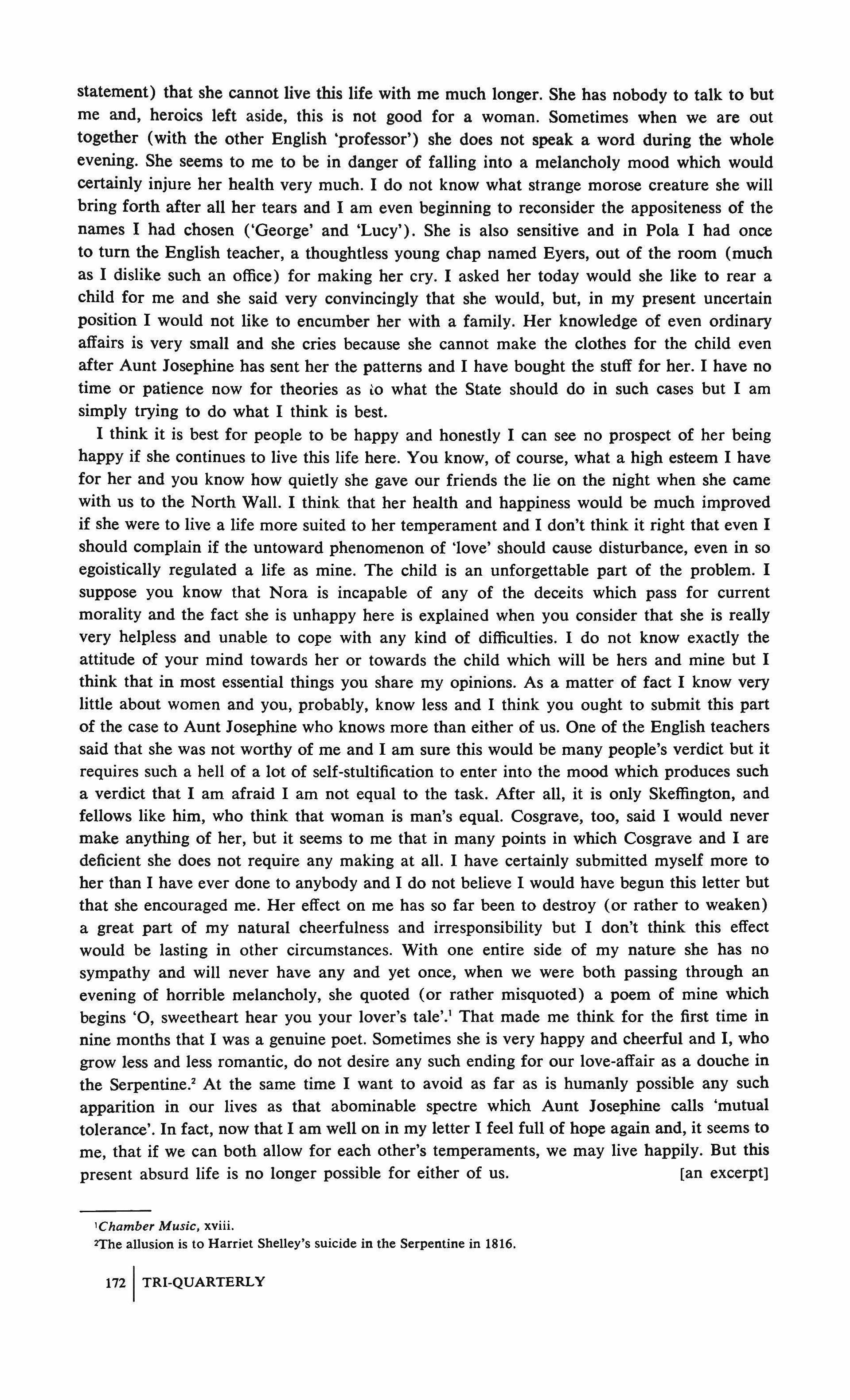
statement) that she cannot live this life with me much longer. She has nobody to talk to but me and, heroics left aside, this is not good for a woman. Sometimes when we are out together (with the other English 'professor') she does not speak a word during the whole evening. She seems to me to be in danger of falling into a melancholy mood which would certainly injure her health very much. I do not know what strange morose creature she will bring forth after all her tears and I am even beginning to reconsider the appositeness of the names I had chosen ('George' and 'Lucy'). She is also sensitive and in Pola I had once to turn the English teacher, a thoughtless young chap named Eyers, out of the room (much as I dislike such an office) for making her cry. I asked her today would she like to rear a child for me and she said very convincingly that she would, but, in my present uncertain position I would not like to encumber her with a family. Her knowledge of even ordinary affairs is very small and she cries because she cannot make the clothes for the child even after Aunt Josephine has sent her the patterns and I have bought the stuff for her. I have no time or patience now for theories as ,0 what the State should do in such cases but I am simply trying to do what I think is best.
I think it is best for people to be happy and honestly I can see no prospect of her being happy if she continues to live this life here. You know, of course, what a high esteem I have for her and you know how quietly she gave our friends the lie on the night when she came with us to the North Wall. I think that her health and happiness would be much improved if she were to live a life more suited to her temperament and I don't think it right that even I should complain if the untoward phenomenon of 'love' should cause disturbance, even in so egoistically regulated a life as mine. The child is an unforgettable part of the problem. I suppose you know that Nora is incapable of any of the deceits which pass for current morality and the fact she is unhappy here is explained when you consider that she is really very helpless and unable to cope with any kind of difficulties. I do not know exactly the attitude of your mind towards her or towards the child which will be hers and mine but I think that in most essential things you share my opinions. As a matter of fact I know very little about women and you, probably, know less and I think you ought to submit this part of the case to Aunt Josephine who knows more than either of us. One of the English teachers said that she was not worthy of me and I am sure this would be many people's verdict but it requires such a hell of a lot of self-stultification to enter into the mood which produces such a verdict that I am afraid I am not equal to the task. After all, it is only Skeffington, and fellows like him, who think that woman is man's equal. Cosgrave, too, said I would never make anything of her, but it seems to me that in many points in which Cosgrave and I are deficient she does not require any making at all. I have certainly submitted myself more to her than I have ever done to anybody and I do not believe I would have begun this letter but that she encouraged me. Her effect on me has so far been to destroy (or rather to weaken) a great part of my natural cheerfulness and irresponsibility but I don't think this effect would be lasting in other circumstances. With one entire side of my nature she has no sympathy and will never have any and yet once, when we were both passing through an evening of horrible melancholy, she quoted (or rather misquoted) a poem of mine which begins '0, sweetheart hear you your lover's tale'.' That made me think for the first time in nine months that I was a genuine poet. Sometimes she is very happy and cheerful and I, who grow less and less romantic, do not desire any such ending for our love-affair as a douche in the Serpentine! At the same time I want to avoid as far as is humanly possible any such apparition in our lives as that abominable spectre which Aunt Josephine calls 'mutual tolerance'. In fact, now that I am well on in my letter I feel full of hope again and, it seems to me, that if we can both allow for each other's temperaments, we may live happily. But this present absurd life is no longer possible for either of us. [an excerpt]
'Chamber Music, xviii.
2The allusion is to Harriet Shelley's suicide in the Serpentine in 1816. 1721 TRI-QUARTERLY
13 November 1906
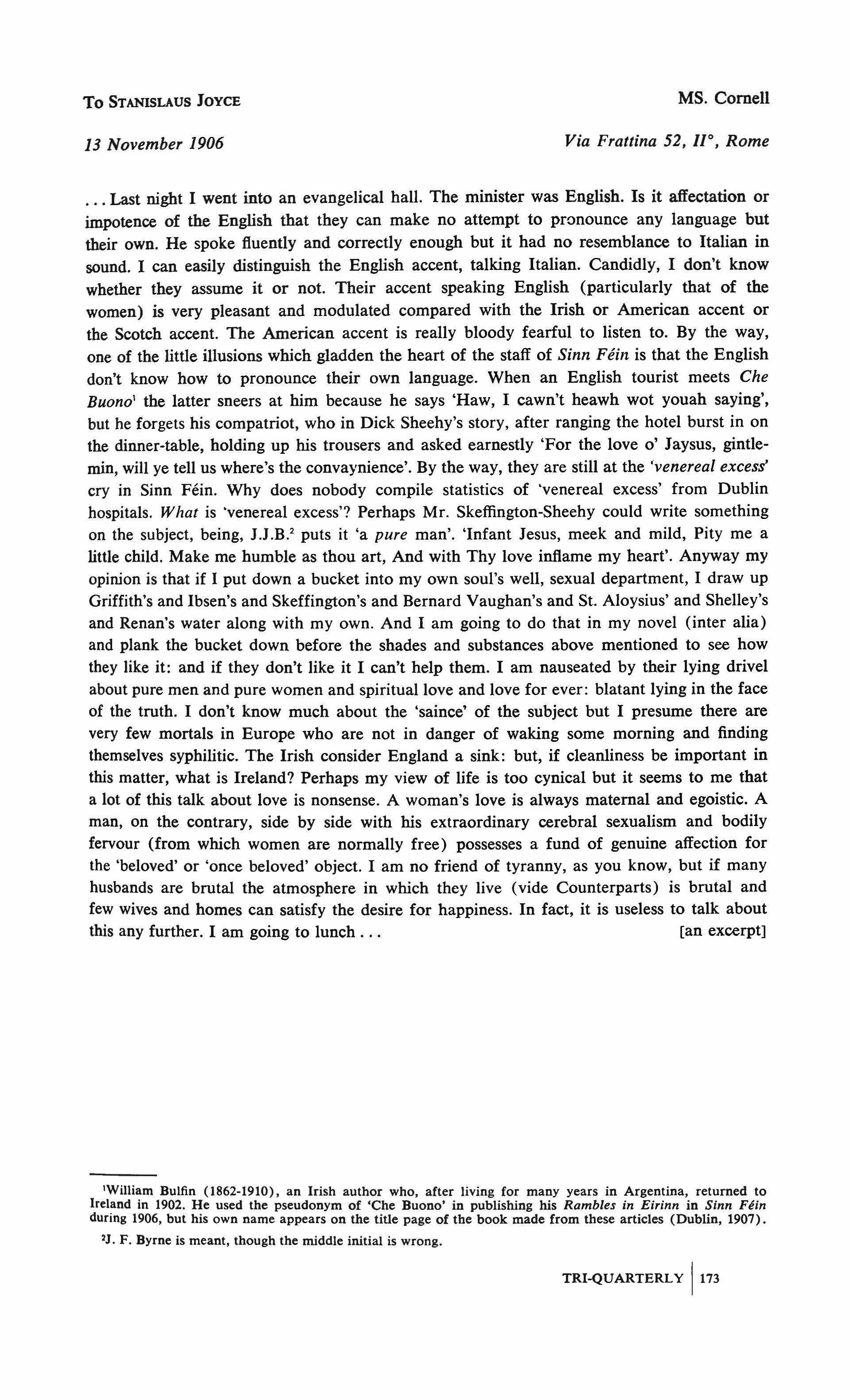
Via Frattina 52, 11°, Rome
Last night I went into an evangelical hall. The minister was English. Is it affectation or impotence of the English that they can make no attempt to pronounce any language but their own. He spoke fluently and correctly enough but it had no resemblance to Italian in sound. I can easily distinguish the English accent, talking Italian. Candidly, I don't know whether they assume it or not. Their accent speaking English (particularly that of the women) is very pleasant and modulated compared with the Irish or American accent or the Scotch accent. The American accent is really bloody fearful to listen to. By the way, one of the little illusions which gladden the heart of the staff of Sinn Fein is that the English don't know how to pronounce their own language. When an English tourist meets Che Buono' the latter sneers at him because he says 'Haw, I cawn't heawh wot youah saying', but he forgets his compatriot, who in Dick Sheehy's story, after ranging the hotel burst in on the dinner-table, holding up his trousers and asked earnestly 'For the love 0' Jaysus, gintlemin, will ye tell us where's the convaynience'. By the way, they are still at the 'venereal excess' cry in Sinn Fein. Why does nobody compile statistics of 'venereal excess' from Dublin hospitals. What is 'venereal excess'? Perhaps Mr. Skeffington-Sheehy could write something on the subject, being, J.J.B.2 puts it 'a pure man'. 'Infant Jesus, meek and mild, Pity me a little child. Make me humble as thou art, And with Thy love inflame my heart'. Anyway my opinion is that if I put down a bucket into my own soul's well, sexual department, I draw up Griffith's and Ibsen's and Skeffington's and Bernard Vaughan's and St. Aloysius' and Shelley'S and Renan's water along with my own. And I am going to do that in my novel (inter alia) and plank the bucket down before the shades and substances above mentioned to see how they like it: and if they don't like it I can't help them. I am nauseated by their lying drivel about pure men and pure women and spiritual love and love for ever: blatant lying in the face of the truth. I don't know much about the 'saince' of the subject but I presume there are very few mortals in Europe who are not in danger of waking some morning and finding themselves syphilitic. The Irish consider England a sink: but, if cleanliness be important in this matter, what is Ireland? Perhaps my view of life is too cynical but it seems to me that a lot of this talk about love is nonsense. A woman's love is always maternal and egoistic. A man, on the contrary, side by side with his extraordinary cerebral sexualism and bodily fervour (from which women are normally free) possesses a fund of genuine affection for the 'beloved' or 'once beloved' object. I am no friend of tyranny, as you know, but if many husbands are brutal the atmosphere in which they live (vide Counterparts) is brutal and few wives and homes can satisfy the desire for happiness. In fact, it is useless to talk about this any further. I am going to lunch. [an excerpt]
'William Bulfin (1862-1910), an Irish author who, after living for many years in Argentina, returned to Ireland in 1902. He used the pseudonym of 'Che Buono' in publishing his Rambles in Eirinn in Sinn Fein during 1906, but his own name appears on the title page of the book made from these articles (Dublin, 1907). 'J. F. Byrne is meant, though the middle initial is wrong.
MS. Cornell[? 1 March 1907]
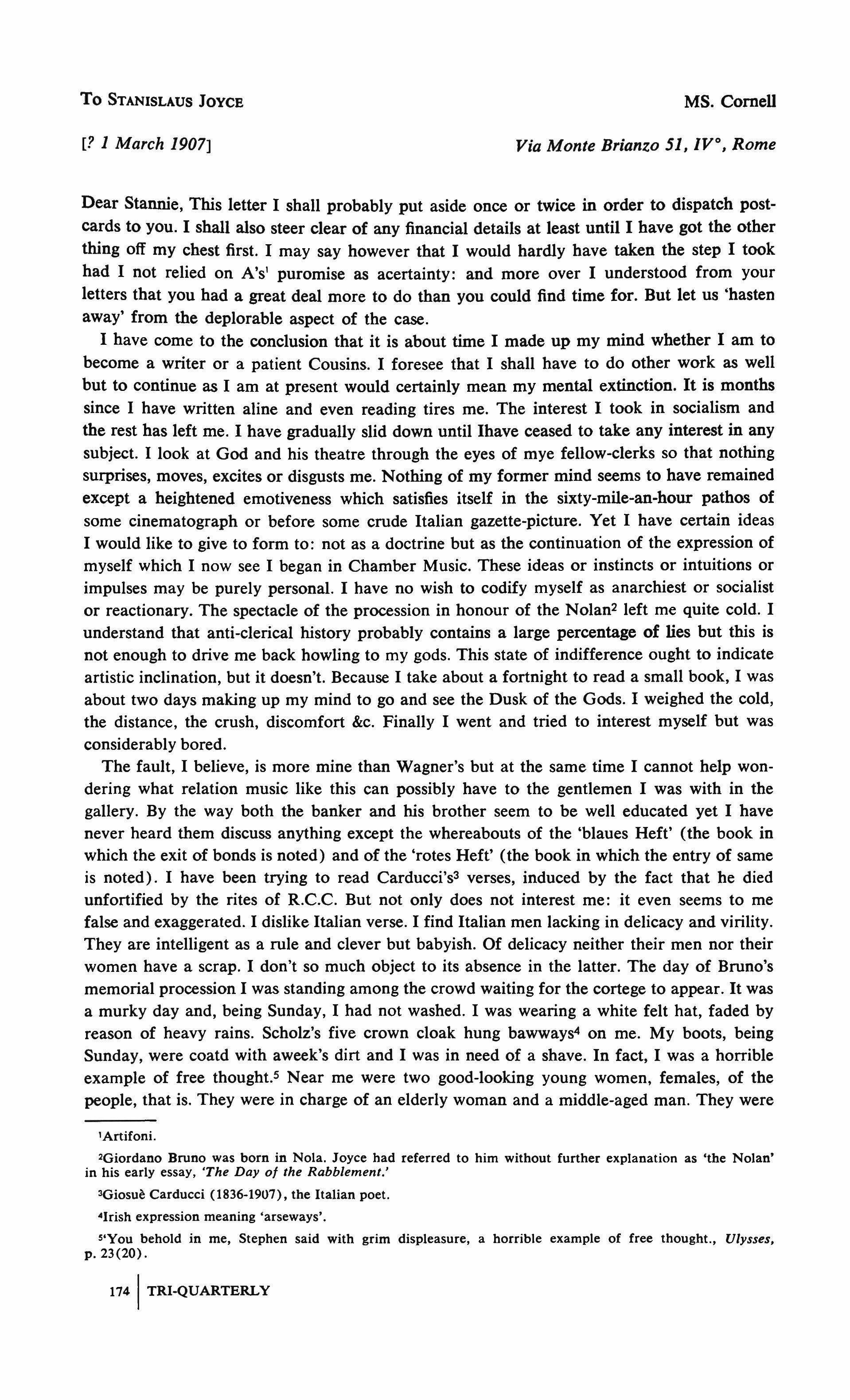 MS. Cornell
MS. Cornell
Via Monte Brianzo 51, IVo, Rome
Dear Stannie, This letter I shall probably put aside once or twice in order to dispatch postcards to you. I shall also steer clear of any financial details at least until I have got the other thing off my chest first. I may say however that I would hardly have taken the step I took had I not relied on A's' puromise as acertainty: and more over I understood from your letters that you had a great deal more to do than you could find time for. But let us 'hasten away' from the deplorable aspect of the case.
I have come to the conclusion that it is about time I made up my mind whether I am to become a writer or a patient Cousins. I foresee that I shall have to do other work as well but to continue as I am at present would certainly mean my mental extinction. It is months since I have written aline and even reading tires me. The interest I took in socialism and the rest has left me. I have gradually slid down until Ihave ceased to take any interest in any subject. I look at God and his theatre through the eyes of mye fellow-clerks so that nothing surprises, moves, excites or disgusts me. Nothing of my former mind seems to have remained except a heightened emotiveness which satisfies itself in the sixty-mile-an-hour pathos of some cinematograph or before some crude Italian gazette-picture. Yet I have certain ideas I would like to give to form to: not as a doctrine but as the continuation of the expression of myself which I now see I began in Chamber Music. These ideas or instincts or intuitions or impulses may be purely personal. I have no wish to codify myself as anarchiest or socialist or reactionary. The spectacle of the procession in honour of the Nolan? left me quite cold. I understand that anti-clerical history probably contains a large percentage of lies but this is not enough to drive me back howling to my gods. This state of indifference ought to indicate artistic inclination, but it doesn't. Because I take about a fortnight to read a small book, I was about two days making up my mind to go and see the Dusk of the Gods. I weighed the cold, the distance, the crush, discomfort &c. Finally I went and tried to interest myself but was considerably bored.
The fault, I believe, is more mine than Wagner's but at the same time I cannot help wondering what relation music like this can possibly have to the gentlemen I was with in the gallery. By the way both the banker and his brother seem to be well educated yet I have never heard them discuss anything except the whereabouts of the 'blaues Heft' (the book in which the exit of bonds is noted) and of the 'rotes Heft' (the book in which the entry of same is noted). I have been trying to read Carducci'st verses, induced by the fact that he died unfortified by the rites of R.C.C. But not only does not interest me: it even seems to me false and exaggerated. I dislike Italian verse. I find Italian men lacking in delicacy and virility. They are intelligent as a rule and clever but babyish. Of delicacy neither their men nor their women have a scrap. I don't so much object to its absence in the latter. The day of Bruno's memorial procession I was standing among the crowd waiting for the cortege to appear. It was a murky day and, being Sunday, I had not washed. I was wearing a white felt hat, faded by reason of heavy rains. Scholz's five crown cloak hung bawways- on me. My boots, being Sunday, were coatd with aweek's dirt and I was in need of a shave. In fact, I was a horrible example of free thought.s Near me were two good-looking young women, females, of the people, that is. They were in charge of an elderly woman and a middle-aged man. They were lArtifoni.
'Giordano Bruno was born in Nola. Joyce had referred to him without further explanation as 'the Nolan' in his early essay, 'The Day of the Rabblement.'
"Giosue Carducci (1836-1907), the Italian poet.
-Irish expression meaning 'arseways'.
s'You behold in me, Stephen said with grim displeasure, a horrible example of free thought., Ulysses. p.23(20).
low-sized and quince-coloured in the face with amiable dog's eyes. One of them had a trinket on a long chain and this she constantly raised slowly to her lips and rested it there, slowly parting them, all the time gazing tranquilly about her. I watched her do this for quite a long time until I perceived that the trinket was a miniature revolver! I tried to explain my sensation to one or two Italians, narrating the fact as best I could. They saw nothing strange in it or typical or significant. One of them told me that many Italian women wear a cazzo as a trinket and after that they talked to their heart's content about cazzo and Co-a topic which, in my opinion, it requires a great deal of talent or else agreat deal of courage to render in any way interesting. When I enter the bank in the morning I wait for someone to announce something about either his cazzo, culo or coglioni.' This usually happens before a quarter to nine.
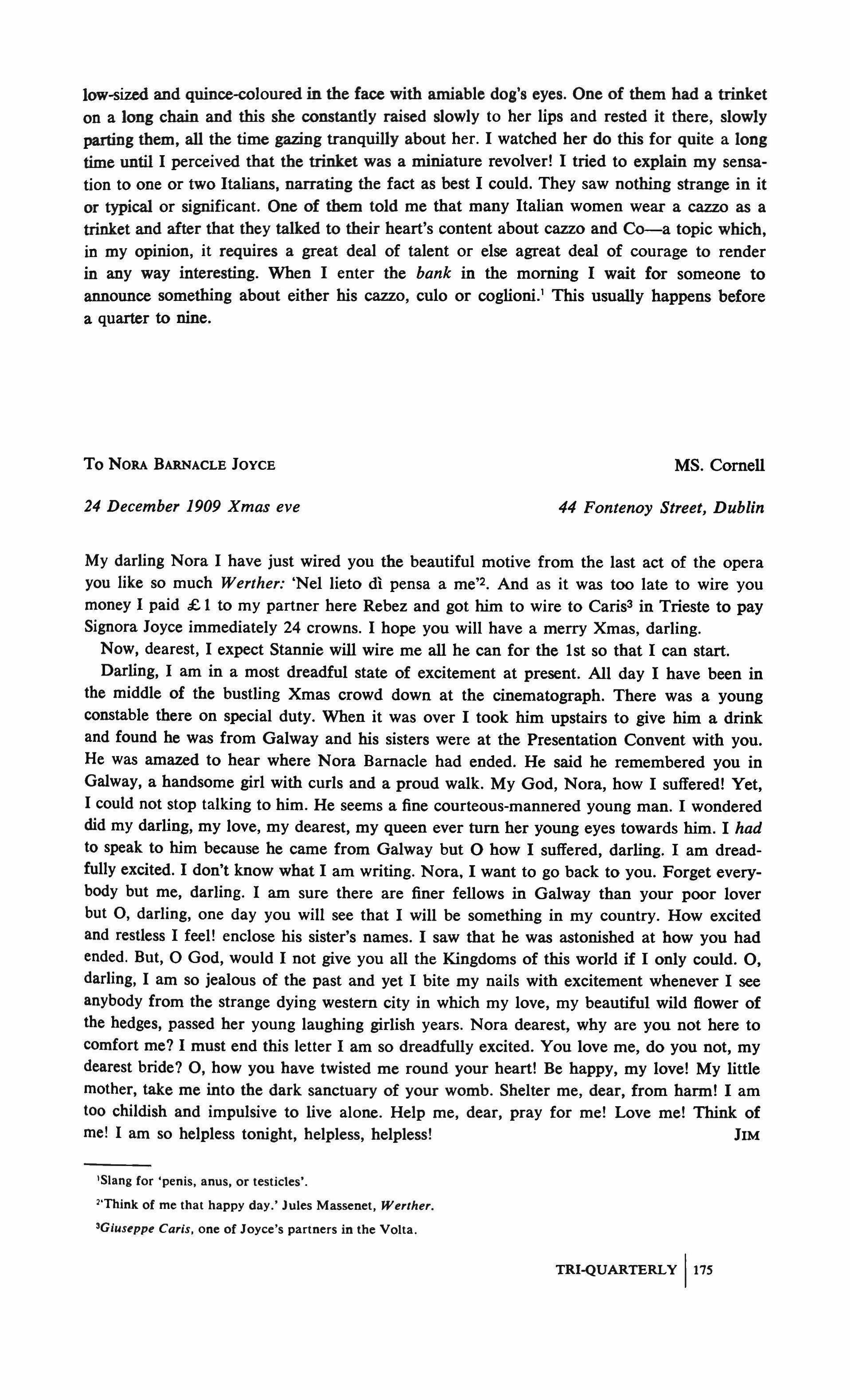 To NORA BARNACLE JOYCE
To NORA BARNACLE JOYCE
24 December 1909 Xmas eve
44 Fontenoy Street, Dublin
My darling Nora I have just wired you the beautiful motive from the last act of the opera you like so much Werther: 'Nel lieto di pensa a me". And as it was too late to wire you money I paid £ 1 to my partner here Rebez and got him to wire to Caris- in Trieste to pay Signora Joyce immediately 24 crowns. I hope you will have a merry Xmas, darling. Now, dearest, I expect Stannie will wire me all he can for the 1st so that I can start. Darling, I am in a most dreadful state of excitement at present. All day I have been in the middle of the bustling Xmas crowd down at the cinematograph. There was a young constable there on special duty. When it was over I took him upstairs to give him a drink and found he was from Galway and his sisters were at the Presentation Convent with you. He was amazed to hear where Nora Barnacle had ended. He said he remembered you in Galway, a handsome girl with curls and a proud walk. My God, Nora, how I suffered! Yet, I could not stop talking to him. He seems a fine courteous-mannered young man. I wondered did my darling, my love, my dearest, my queen ever tum her young eyes towards him. I had to speak to him because he came from Galway but 0 how I suffered, darling. I am dreadfully excited. I don't know what I am writing. Nora, I want to go back to you. Forget everybody but me, darling. I am sure there are finer fellows in Galway than your poor lover but 0, darling, one day you will see that I will be something in my country. How excited and restless I feel! enclose his sister's names. I saw that he was astonished at how you had ended. But, ° God, would I not give you all the Kingdoms of this world if I only could. 0, darling, I am so jealous of the past and yet I bite my nails with excitement whenever I see anybody from the strange dying western city in which my love, my beautiful wild flower of the hedges, passed her young laughing girlish years. Nora dearest, why are you not here to comfort me? I must end this letter I am so dreadfully excited. You love me, do you not, my dearest bride? 0, how you have twisted me round your heart! Be happy, my love! My little mother, take me into the dark sanctuary of your womb. Shelter me, dear, from harm! I am too childish and impulsive to live alone. Help me, dear, pray for me! Love me! Think of me! I am so helpless tonight, helpless, helpless! JIM
'Slang for 'penis, anus, or testicles'.
"Think of me that happy day.' Jules Massenet, Werther.
'Gluuppe Carls, one of Joyce's partners in the Volta.
MS. Cornell22 November 1918
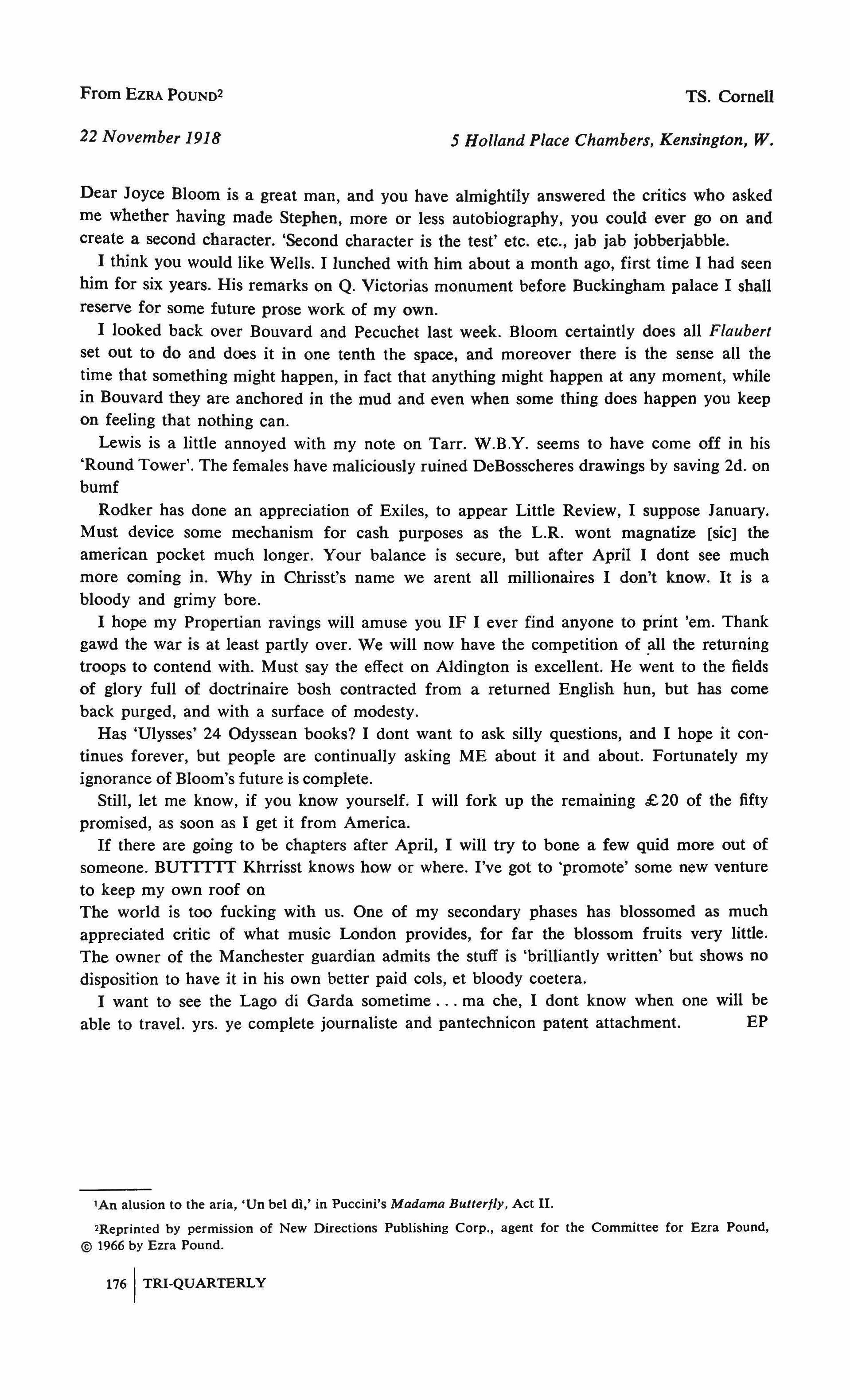
5 Holland Place Chambers, Kensington, W.
Dear Joyce Bloom is a great man, and you have almightily answered the critics who asked me whether having made Stephen, more or less autobiography, you could ever go on and create a second character. 'Second character is the test' etc. etc., jab jab jobberjabble.
I think you would like Wells. I lunched with him about a month ago, first time I had seen him for six years. His remarks on Q. Victorias monument before Buckingham palace I shall reserve for some future prose work of my own.
I looked back over Bouvard and Pecuchet last week. Bloom certaintly does all Flaubert set out to do and does it in one tenth the space, and moreover there is the sense all the time that something might happen, in fact that anything might happen at any moment, while in Bouvard they are anchored in the mud and even when some thing does happen you keep on feeling that nothing can.
Lewis is a little annoyed with my note on Tarr. W.B.Y. seems to have come off in his 'Round Tower'. The females have maliciously ruined DeBosscheres drawings by saving 2d. on bumf
Rodker has done an appreciation of Exiles, to appear Little Review, I suppose January. Must device some mechanism for cash purposes as the L.R. wont magnatize [sic] the american pocket much longer. Your balance is secure, but after April I dont see much more coming in. Why in Chrisst's name we arent all millionaires I don't know. It is a bloody and grimy bore.
I hope my Propertian ravings will amuse you IF I ever find anyone to print 'em. Thank gawd the war is at least partly over. We will now have the competition of all the returning troops to contend with. Must say the effect on Aldington is excellent. He went to the fields of glory full of doctrinaire bosh contracted from a returned English hun, but has come back purged, and with a surface of modesty.
Has 'Ulysses' 24 Odyssean books? I dont want to ask silly questions, and I hope it continues forever, but people are continually asking ME about it and about. Fortunately my ignorance of Bloom's future is complete.
Still, let me know, if you know yourself. I will fork up the remaining £ 20 of the fifty promised, as soon as I get it from America.
If there are going to be chapters after April, I will try to bone a few quid more out of someone. BUTTTTT Khrrisst knows how or where. I've got to 'promote' some new venture to keep my own roof on
The world is too fucking with us. One of my secondary phases has blossomed as much appreciated critic of what music London provides, for far the blossom fruits very little. The owner of the Manchester guardian admits the stuff is 'brilliantly written' but shows no disposition to have it in his own better paid cols, et bloody coetera.
I want to see the Lago di Garda sometime ma che, I dont know when one will be able to travel. yrs, ye complete journaliste and pantechnicon patent attachment. EP
'An alusion to the aria, 'Un bel dl,' in Puccini's Madama Butterfly, Act II.
2Reprinted by permission of New Directions Publishing Corp., agent for the Committee for Ezra Pound, @) 1966 by Ezra Pound.
TRI-QUARTERLY

The following four letters by James Joyce are here published for the first time. Considering their nature I believe it is necessary to give an exact account of how they came into my possession and of what I have been able to discover about the addressee and her relationship with James Joyce.
IIn the early days of December 1941 (about eleven months after Joyce had died in Zurich), a woman asked to see me on a matter concerning the late James Joyce. I invited her to call at my flat and a few days later she did so. She described herself as Fraulein-Martha Fleischmann then living at Sonneggstrasse 31, Zurich 6. From her looks I judged her to be between 50 and 60 years of age. She was of medium height, grey-haired, pale-complexioned, with large eyes of rather careworn expression, and dressed in simple black. Her voice was low, soft and pleasant, and there was a natural dignity in her bearing.
She began by explaining that she was in possession of four letters and a postcard addressed to her by James Joyce, and of a copy of Chamber Music inscribed by the poet. She pointed out that she was financially not in the best circumstances and that she was willing to sell these items, and she asked me if I could advise her how to proceed. She then produced the material and permitted me to glance through it. I realized at once that for a number of reasons this was going to be a rather delicate matter. I did not know whether there were other letters of a similar character available; I saw no way of finding out if a collection of letters by Joyce was being prepared anywhere, Switzerland then being practically cut off from the rest of the world; I further thought of Mrs James Joyce, whom I had the privilege to know personally; and finally I felt vexed at the idea that these letters might become an object of business transactions. I therefore advised Fraulein Fleischmann not to part with the letters until after the end of the war. If she felt she needed the money badly she might try and get an offer from whoever she thought a likely buyer. In any case I asked her not to sell
'H�lnrlch Straumann (b. 1902), Professor of English in the University of Zurich, Rector 1960-62, has kindly contributed this note on the bizarre correspondence of Joyce with a young woman in Zurich in 1918-19. This note is reprinted with his permission.
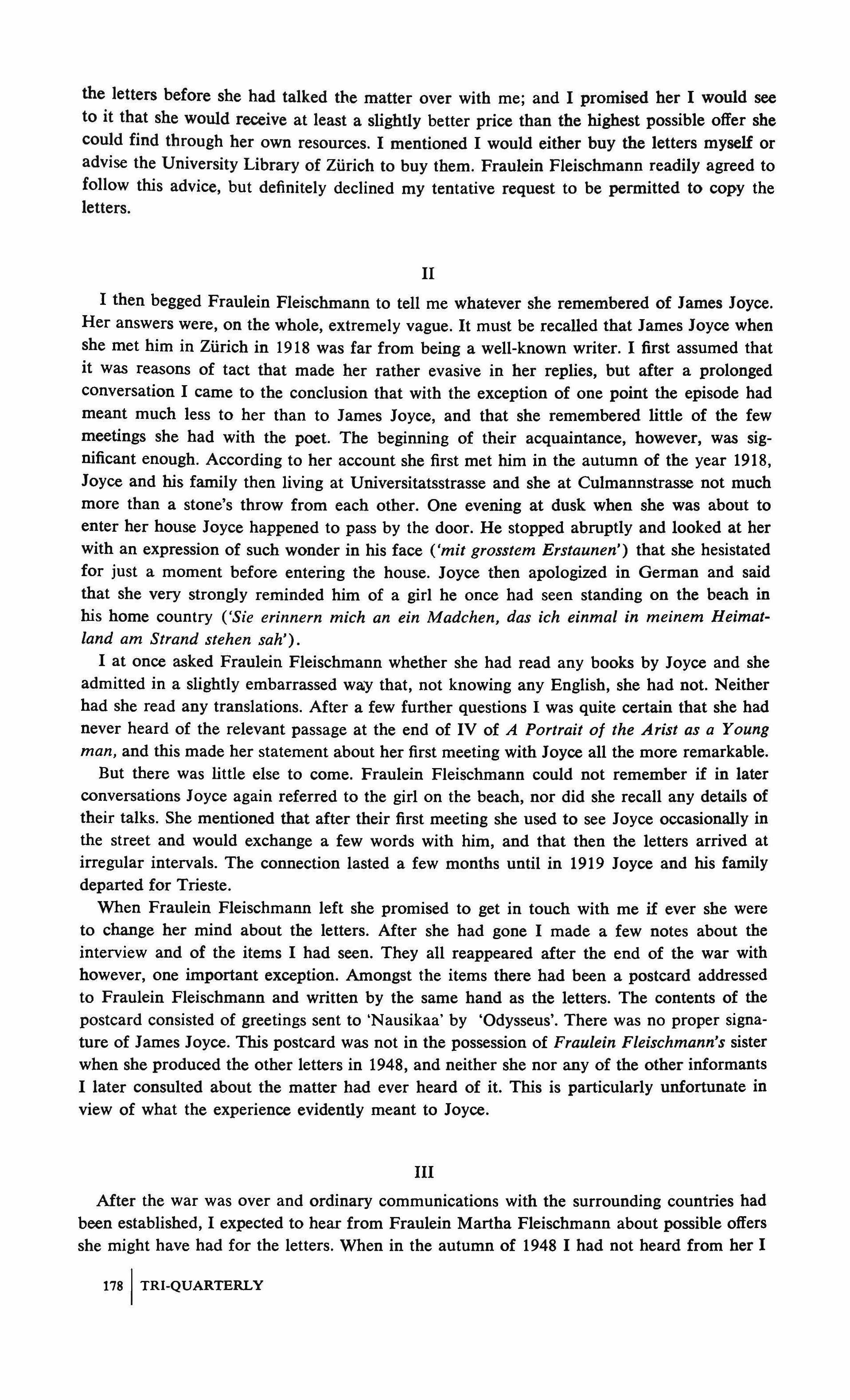
the letters before she had talked the matter over with me; and I promised her I would see to it that she would receive at least a slightly better price than the highest possible offer she could find through her own resources. I mentioned I would either buy the letters myself or advise the University Library of ZUrich to buy them. Fraulein Fleischmann readily agreed to follow this advice, but definitely declined my tentative request to be permitted to copy the letters.
I then begged Fraulein Fleischmann to tell me whatever she remembered of James Joyce. Her answers were, on the whole, extremely vague. It must be recalled that James Joyce when she met him in ZUrich in 1918 was far from being a well-known writer. I first assumed that it was reasons of tact that made her rather evasive in her replies, but after a prolonged conversation I came to the conclusion that with the exception of one point the episode had meant much less to her than to James Joyce, and that she remembered little of the few meetings she had with the poet. The beginning of their acquaintance, however, was significant enough. According to her account she first met him in the autumn of the year 1918, Joyce and his family then living at Universitatsstrasse and she at Culmannstrasse not much more than a stone's throw from each other. One evening at dusk when she was about to enter her house Joyce happened to pass by the door. He stopped abruptly and looked at her with an expression of such wonder in his face ('mit grosstem Erstaunen') that she hesistated for just a moment before entering the house. Joyce then apologized in German and said that she very strongly reminded him of a girl he once had seen standing on the beach in his home country ('Sie erinnern mich an ein Madchen, das ich einmal in meinem Heimatland am Strand stehen sah').
I at once asked Fraulein Fleischmann whether she had read any books by Joyce and she admitted in a slightly embarrassed way that, not knowing any English, she had not. Neither had she read any translations. After a few further questions I was quite certain that she had never heard of the relevant passage at the end of IV of A Portrait of the Arist as a Young man, and this made her statement about her first meeting with Joyce all the more remarkable.
But there was little else to come. Fraulein Fleischmann could not remember if in later conversations Joyce again referred to the girl on the beach, nor did she recall any details of their talks. She mentioned that after their first meeting she used to see Joyce occasionally in the street and would exchange a few words with him, and that then the letters arrived at irregular intervals. The connection lasted a few months until in 1919 Joyce and his family departed for Trieste.
When Fraulein Fleischmann left she promised to get in touch with me if ever she were to change her mind about the letters. After she had gone I made a few notes about the interview and of the items I had seen. They all reappeared after the end of the war with however, one important exception. Amongst the items there had been a postcard addressed to Fraulein Fleischmann and written by the same hand as the letters. The contents of the postcard consisted of greetings sent to 'Nausikaa' by 'Odysseus'. There was no proper signature of James Joyce. This postcard was not in the possession of Fraulein Fleischmann's sister when she produced the other letters in 1948, and neither she nor any of the other informants I later consulted about the matter had ever heard of it. This is particularly unfortunate in view of what the experience evidently meant to Joyce.
After the war was over and ordinary communications with the surrounding countries had been established, I expected to hear from Fraulein Martha Fleischmann about possible offers she might have had for the letters. When in the autumn of 1948 I had not heard from her I
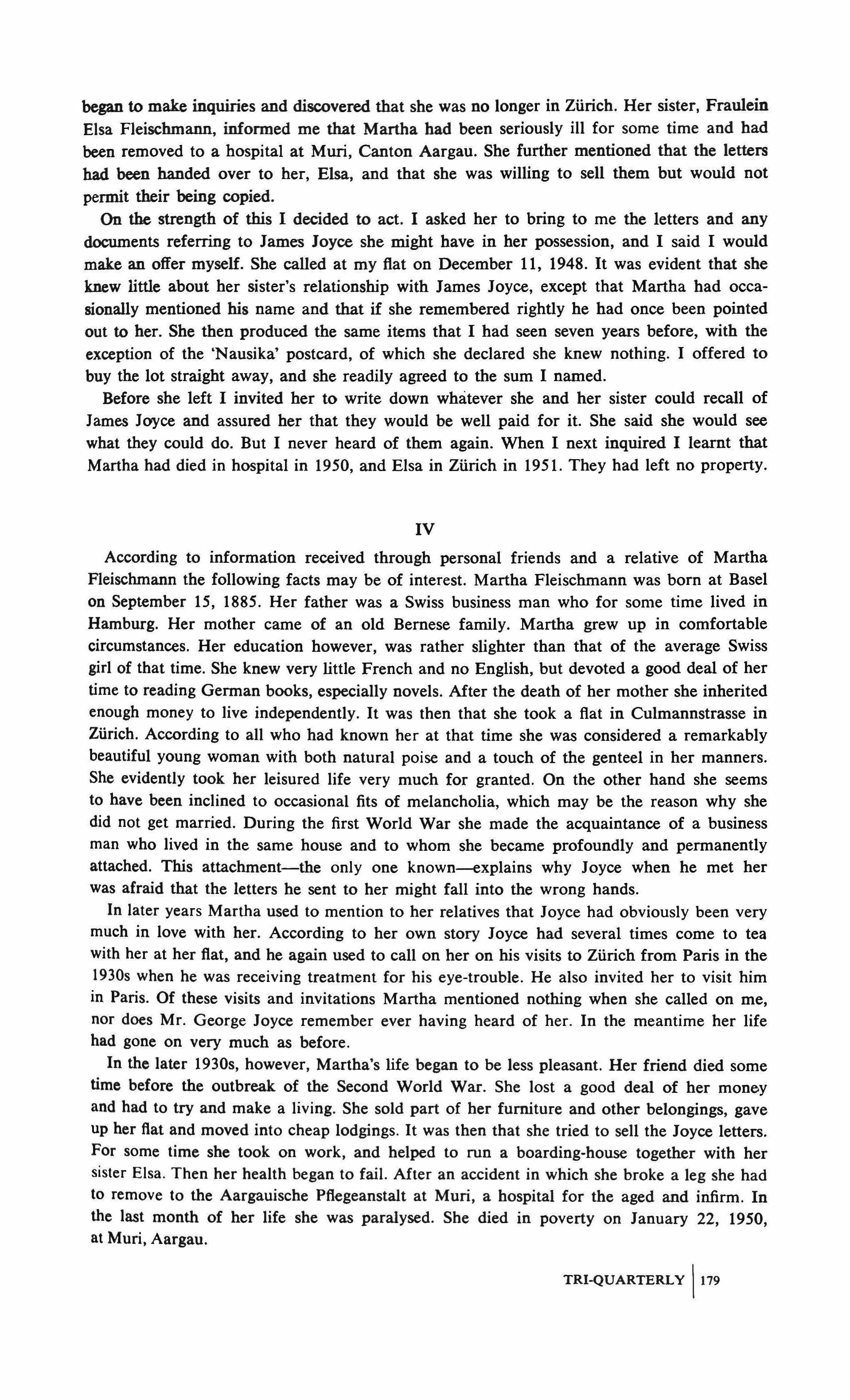
began to make inquiries and discovered that she was no longer in ZUrich. Her sister, Fraulein Elsa Fleischmann, informed me that Martha had been seriously ill for some time and had been removed to a hospital at Muri, Canton Aargau. She further mentioned that the letters had been handed over to her, Elsa, and that she was willing to sell them but would not permit their being copied.
On the strength of this I decided to act. I asked her to bring to me the letters and any documents referring to James Joyce she might have in her possession, and I said I would make an offer myself. She called at my flat on December 11, 1948. It was evident that she knew little about her sister's relationship with James Joyce, except that Martha had occasionally mentioned his name and that if she remembered rightly he had once been pointed out to her. She then produced the same items that I had seen seven years before, with the exception of the 'Nausika' postcard, of which she declared she knew nothing. I offered to buy the lot straight away, and she readily agreed to the sum I named.
Before she left I invited her to write down whatever she and her sister could recall of James Joyce and assured her that they would be well paid for it. She said she would see what they could do. But I never heard of them again. When I next inquired I learnt that Martha had died in hospital in 1950, and Elsa in ZUrich in 1951. They had left no property.
According to information received through personal friends and a relative of Martha Fleischmann the following facts may be of interest. Martha Fleischmann was born at Basel on September 15, 1885. Her father was a Swiss business man who for some time lived in Hamburg. Her mother came of an old Bernese family. Martha grew up in comfortable circumstances. Her education however, was rather slighter than that of the average Swiss girl of that time. She knew very little French and no English, but devoted a good deal of her time to reading German books, especially novels. After the death of her mother she inherited enough money to live independently. It was then that she took a flat in Culmannstrasse in ZUrich. According to all who had known her at that time she was considered a remarkably beautiful young woman with both natural poise and a touch of the genteel in her manners. She evidently took her leisured life very much for granted. On the other hand she seems to have been inclined to occasional fits of melancholia, which may be the reason why she did not get married. During the first World War she made the acquaintance of a business man who lived in the same house and to whom she became profoundly and permanently attached. This attachment-the only one known-explains why Joyce when he met her was afraid that the letters he sent to her might fall into the wrong hands.
In later years Martha used to mention to her relatives that Joyce had obviously been very much in love with her. According to her own story Joyce had several times come to tea with her at her flat, and he again used to call on her on his visits to ZUrich from Paris in the 1930s when he was receiving treatment for his eye-trouble. He also invited her to visit him in Paris. Of these visits and invitations Martha mentioned nothing when she called on me, nor does Mr. George Joyce remember ever having heard of her. In the meantime her life had gone on very much as before.
In the later 19305, however, Martha's life began to be less pleasant. Her friend died some time before the outbreak of the Second World War. She lost a good deal of her money and had to try and make a living. She sold part of her furniture and other belongings, gave up her fiat and moved into cheap lodgings. It was then that she tried to sell the Joyce letters. For some time she took on work, and helped to run a boarding-house together with her sister Elsa. Then her health began to fail. After an accident in which she broke a leg she had to remove to the Aargauische Pflegeanstalt at Muri, a hospital for the aged and infirm. In the last month of her life she was paralysed. She died in poverty on January 22, 1950, at Muri, Aargau.
TRI-QUARTERLY 1179
V
The letters are self-explanatory. According to Martha's statement, she tore off the lower right-hand edge of the second sheet of Letter 1 bcause it contained what she considered an indelicate expression. Candlemas referred to in Letter 4 is Joyce's birthday. It is remarkable that Joyce first took Martha for a Jewess. Actually her grandfather had been adopted as a homeless boy by the Swiss village community of Ueken (Aargau) in the first part of the 19th century. Whether or not he was of Jewish origin cannot be ascertained, but it is at lease unlikely. Her parents and her grandmother were certainly not considered Jewish by the people of that village.
There is a Martha in Ulysses, and it is significant that she is both the recipient and the sender of letters. Connected with her are references to the opera Martha and its famous theme 'Come, thou lost one'. Even more striking is the use of the Greek e both in the letters Joyce wrote and in the one sent by Bloom to Martha.' Beyond that however I do not venture to establish a direct connection. After all, Joyce had also addressed Martha as 'Nausikaa', and yet it would be difficult to find any similarity between her and Gerty MacDowell. Nevertheless the letters testify to the unique link between realities in experience and in imagination. There is no doubt that the sincerity of his motion and his almost incredible command of tones of feeling in two foreign languages have resulted in an extraordinarily impressive and powerful self-portrait of the artist in a critical phase of his life.
 To MARTHA FLEISCHMANN
To MARTHA FLEISCHMANN
[? Early December 1918] [Ziirich]2
Vous n'etes pas fachee alors.
I'avais de la fievre hier soir, en attendant votre signe.
Mais pourquoi ne voulez-vous pas m'ecrire meme une parole--votre nom? Et pourquoi ferrnez-vous toujours les stores de la fenetre? Je veux vous voir.
Je De sais pas ce que vous pensez de moi.
Comme je vous ai deja dit nous nous sommes vus et-e-parles-c-mais vous m'avez oublie. Voulez-vous que je vous dise quelque chose?
Ma premiere impression de vous.
Voila.
Vous etiez vetue de noir avec un gros chapeau aux ailes fiottantes. La couleur vous allait tres bien. Et j'ai pense: un joli animal.
Parce qu'il y avait quelque chose de franc et presque d'impudique dans votre allure. Puis, en vous regardant, j'ai observe la mollesse des traits reguliers et la douceur des yeux, Et j'ai pense: une juive. Si je me suis trompe il ne faut pas vous offenser. Jesus Christ a pris son corps humain: dans Ie ventre d'une femme juive.
J'ai pense souvent a vous et apres, quand je vous ai reconnue a la fenetre je vous regardais dans une espece de fascination dont je ne peux me liberer.
II se peut que tout r;a vous laisse indifferente.
lise peut que je VOllS semble ridicule. I'accepte votre jugement.
'Ulysses p. 360 (279).
"This letter (which like the others is given in the original spelling) was probably the second that Joyce wrote, since in it he mentions another. He did not yet know Martha Fleischmann's name.
MS. StraumannMARTHA FLEISCHMANN AND HER 'GUARDIAN' RUDOLPH HILTPOLD IN ZURICH, ABOUT 1918
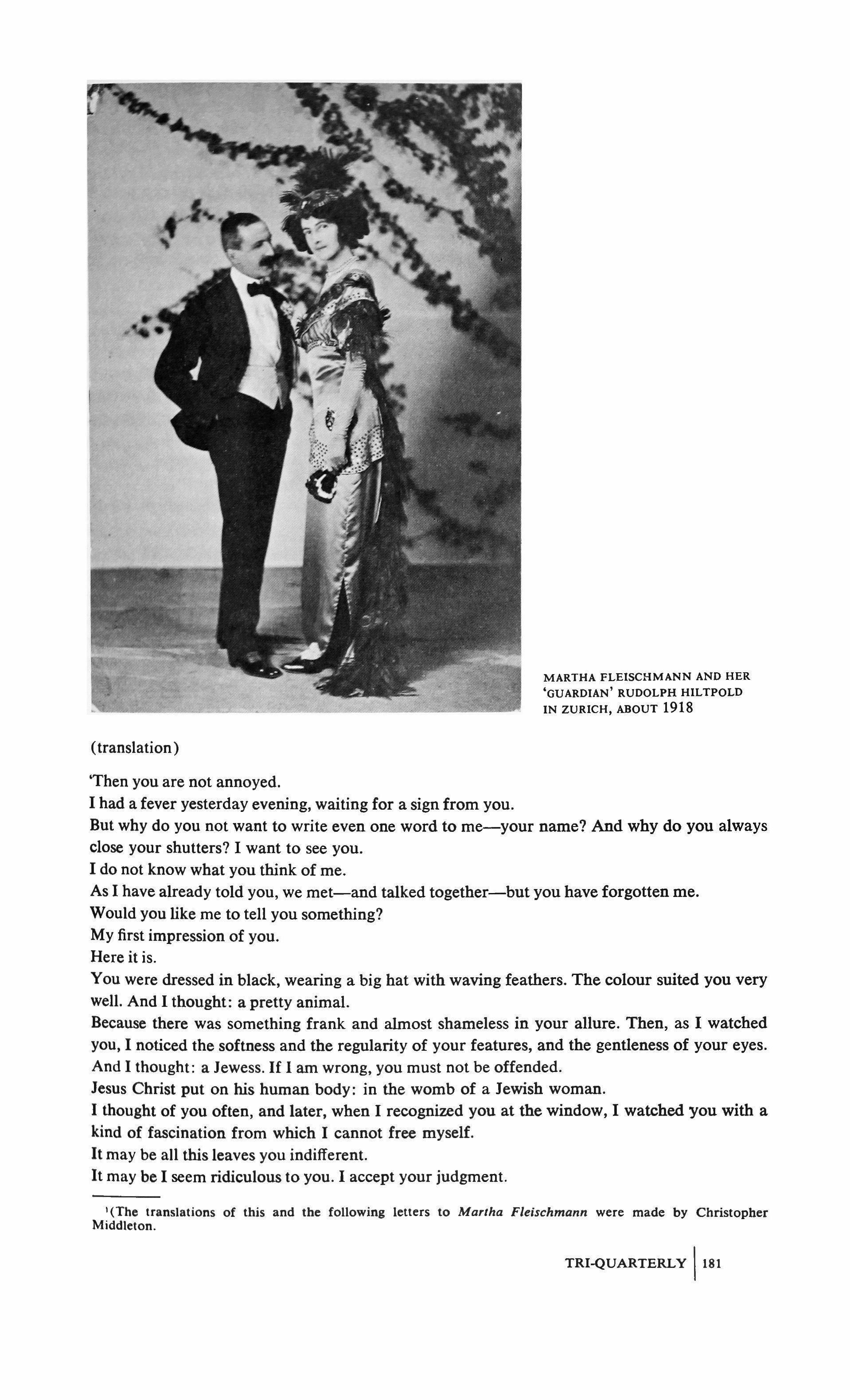
(translation)
'Then you are not annoyed.
I had a fever yesterday evening, waiting for a sign from you.
But why do you not want to write even one word to me-your name? And why do you always close your shutters? I want to see you.
I do not know what you think of me.
As I have already told you, we met-and talked together-but you have forgotten me. Would you like me to tell you something?
My first impression of you.
Here it is.
You were dressed in black, wearing a big hat with waving feathers. The colour suited you very well. And I thought: a pretty animal.
Because there was something frank and almost shameless in your allure. Then, as I watched you, I noticed the softness and the regularity of your features, and the gentleness of your eyes. And I thought: a Jewess.lf I am wrong, you must not be offended.
Jesus Christ put on his human body: in the womb of a Jewish woman.
I thought of you often, and later, when I recognized you at the window, I watched you with a kind of fascination from which I cannot free myself.
It may be all this leaves you indifferent.
It may be I seem ridiculous to you. I accept your judgment.
'(The translations of this and the following letters to Martha Fleischmann were made by Christopher Middleton. TRI-QUARTERLY 1181
Mais bier soir vous m'avez fait un signe et mon ceeur a saute de joie.
Je ne sais pas votre age.
Moi, je suis vieux-et [e me sens plus vieux encore.
Peutetre ai-je trop vecu, J'ai 35 ans.' C'est I'age que Shakespeare a eu quand il a cocu sa douleureuse passion pour la 'dame noire.' C'est l'age que Ie Dante a eu quand il est entre dans la nuit de son etre.
Je ne sais pas ce qui arrive en moi.
Est-il possible qu'une personne eprouve sentiments commes les miens et que l'autre ne les eprouve point?
Je ne sais pas ce que je veux.
Je voudrais vous parler.
Je me figure un soir brumeux. J'attends-et je vous vois vous approcher de moi, vetue de noir, [eune, etrange et douce. Je vous regarde dans les yeux et mes yeux vous disent que je suis un pauvre chercheur dans ce monde, que je ne comprends rien de rna destinee ni de celle des autres, que j'ai vecu et peche et cree, que je m'en irai, un jour, n'ayant rien compris, dans l'obscurite qui nous a enfantes tous.
Comprennez-vous peutetre Ie mystere de votre corps quand vous vous regardez dans Ia glace, d'ou est venue la lumiere fauve de vos yeux; le teint de votre chevelure?
Comme vous etiez gracieuse, bier soir, assise a Ia table, reveuse et puis, soudainement, levant ma Iettre a Ia Iurniere,
Quel est votre nom?
Pensez-vous, quelquefois, a moi?
Ecrivez-moi un mot a l'adresse que je vous donne.
Vous pouvez m'ecrire aussi en allemand. Je Ie comprends tres bien.
Dites-moi quelque chose de vous-meme,
Qui, ecrivez-moi demain.
Je crois que vous etes bonne!

To MARTHA FLEISCHMANN
MS. Straumann [? December 1918] [Zurich]
Qu'y a-t-il?
Vous ne m'avez pas salue!
Je descends avec cette Iettre a la porte.
Ai-je offensee?
Mais comment?
Je vous prie de m'envoyer un mot toute de suite. Voila une enveloppe deja preparee. Jetez-la a la boite et mettez un seul mot dedans.
Etes-vous facbee? Oui ou non.
Je ne comprends rien.
Pour l'amour de Dieu envoyez-moi un mot.
La belle nuit queje vais passer!
IA romantic computation: Joyce was nearly thirty-seven. 'Here the edge of the paper is torn off.
1821 TRI-QUARTERLY
But yesterday evening you gave me a sign, and my heart leapt for joy. I do not know your age.
As for me, I am old-and feel even older than I am.
Perhaps I have lived too long.
I am 35. It is the age at which Shakespeare conceived his dolorous passion for the "dark lady". It is the age at which Dante entered the night of his being.
I do not know what is happening in me.
Is it possible for a person to have feelings like mine, and for the other not to have them at all?
I do not know what I want.
I would like to talk 10 you.
I imagine a misty evening to myself. I am waiting-and I see you coming towards me, dressed in black, young, strange, and gentle. I look into your eyes, and my eyes tell you that I am a poor seeker in this world, that I understand nothing of my destiny, nor of the destinies of others, that I have lived and sinned and created, and that one day I shall leave, having understood nothing in the darkness which gave birth to both of us.
Perhaps you understand the mystery of your body when you look at yourself in the mirror, where the wild light in your eyes comes from; the colour of your hair?
How graceful you were yesterday evening, as you sat at the table, ina dream, then suddenly lifted my letter up to the light.
What is your name?
Do you think of me sometimes?
Write to me at the address I give you.
You can write to me in German too. I understand it very well.
Tell me something about yourself. Yes, write to me tomorrow.
I think that you are good

'What is the matter?
You gave me no sign of greeting!
I am going to take this letter to the door.
Have I offended But how?
I beg you to send me a line immediately. Here is an envelope all ready. Put it in the letter-box and write just one word in it. Are you angry? Yes or no.
I understand nothing.
For the love of God send me a line.
A fine night I'm going to spend!'
To MARTHA FLEISCHMANN MS. Straumann[9 December 1918]2 [Zurich]
Arme liebe Marthe
Was haben Sie gehabt?
Ich bin noch unsicher aber glaube dass ich Sie gesehen habe heute abend.
Ich hatte Angst Ihnen zu schreiben weil ich wusste nicht wer bei Ihnen war und dachte dass meine Briefe in die Hande von fremde Leute kommen konnten.
Jedes Abend habe ich geschaut.
Ich habe mir sogar Vorwiirfe gemacht weil ich dachte dass vieUeicht Ihre Krankenheit in Folge einer Erkaltung am jenem letzten Abend war.
Dann dachte ich, ich wurde Ihnen trotzdem schreiben und mit der Name einer Freundin schreiben!
Je continue en francais parce que l'allemand ne me va pass.
Si vous avez beaucoup souffert en ces jours, moi, j'ai souffert aussi.
II me semblait que l'unique rayon de lumiere qui dans ces dernieres annees ait perce l'obscurite de rna vie, s'etait eteinte.
J'etais meme imbecile!
Chaque matin j'ouvrais, j'ouvrais Ie journal et j'avais peur de lire votre nom parmi les annonces des morts! Je l'ouvrais toujours avec angoisse, tres, tres lentement.
Je pensais: elle s'en ira---elle qui m'a regarde avec pitie-s-peutetre avec tendresse.
La maladie change beaucoup.
Elle nous conduit quelquefois jusqu'au seuil de la mort: et nous voyons les choses autrement.
Vois n'avez pas peur de la mort-moi, si!
Vous avez pense peutetre que votre sentiment pour moi etait une folie; vous avez entrevu les ombres de l'au dela,
Eh bien! Ce sont les ombres menteuses!
Je voudrais vous envoyer des fteurs mais j'ai peur.
J'attendrai encore. Peutetre ce n'etait pas vous que j'ai vue?
J'ai vu mon livre de poesies dans votre main.
Est-ce que vous acez compris?
J'ai ecrit quelque chose pendant votre maladie--quelque chose de tres amer qui a blesse beaucoup mes amis
Oui, j'ai souffert aussi.
J'hesite encore avant de vous envoyer cette lettre
Si eUe tombe dans les mains d'une autre personne ? ? ?
Je vais jeter cette lettre it. la boite,
Je ne peux plus attendre!
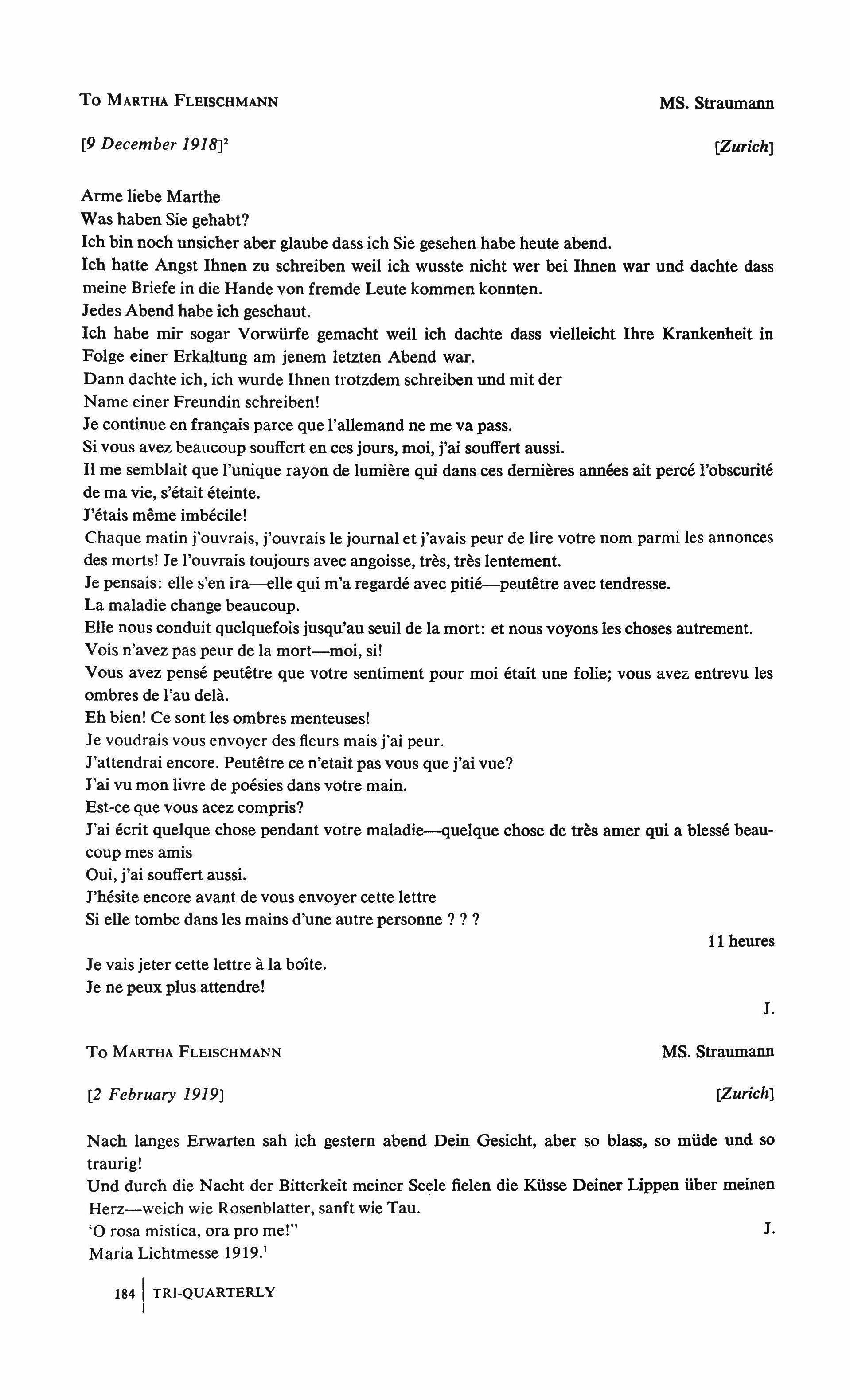
11 heures
To MARTHA FLEISCHMANN MS. Straumann
[2 February 1919] [Zurich]
Nach langes Erwarten sah ich gestem abend Dein Gesicht, aber so blass, so mtide und so traurig!
Und durch die Nacht der Bitterkeit meiner Seele fielen die Kiisse Deiner Lippen tiber meinen Herz-weich wie Rosenblatter, sanft wie Tau.
'0 rosa mistica, ora pro me!"
Maria Lichtmesse 1919.'
184 I TRI-QUARTERLY I J.
'Poor dear Marthe
What has been the matter with you?
I am still not sure, but I think I saw you this evening.
I was afraid to write to you, since I did not know who was with you, and thought my letters might fall into the bands of strangers.
I have watched for you every evening.
I even reproached myself because I thought your illness might perhaps be due to a cold caught that last evening.
Then I thought I would write to you anyhow, and write under the name of a girlfriend!
I'll continue in French because German does not suit me.
If you have suffered much during these days, I too have suffered.
It seemed that the sole ray of light which in all these last years has pierced the darkness of my life had been put out.
I was even out of my mind!
Every morning I opened, opened the paper and was afraid I might read your name in the death announcements! I would open it always in anguish, very, very slowly.
I thought: she will go away-she who has looked at me with pity-perhaps with tenderness. Illness changes things.
It takes us sometimes up to the threshold of death: and we see things differently.
You are not afraid of death-but I am!
Perhaps you thought your feeling for me was madness; you have glimpsed the shades of the beyond.
Ah well! Those shades are deceivers!
I would like to send you flowers, but I am afraid. I shall go on waiting. Perhaps it was not you I saw?
I saw my book of poems in your hand.
You understood it?
I wrote something while you were ill-something very bitter which has wounded my friends deeply.
I am still hesitant about sending you this letter.
Yes, I have suffered too.
If it were to fall into someone else's hands? ? ? 11 o'clock
I am going out to post this letter. I cannot wait any longer!
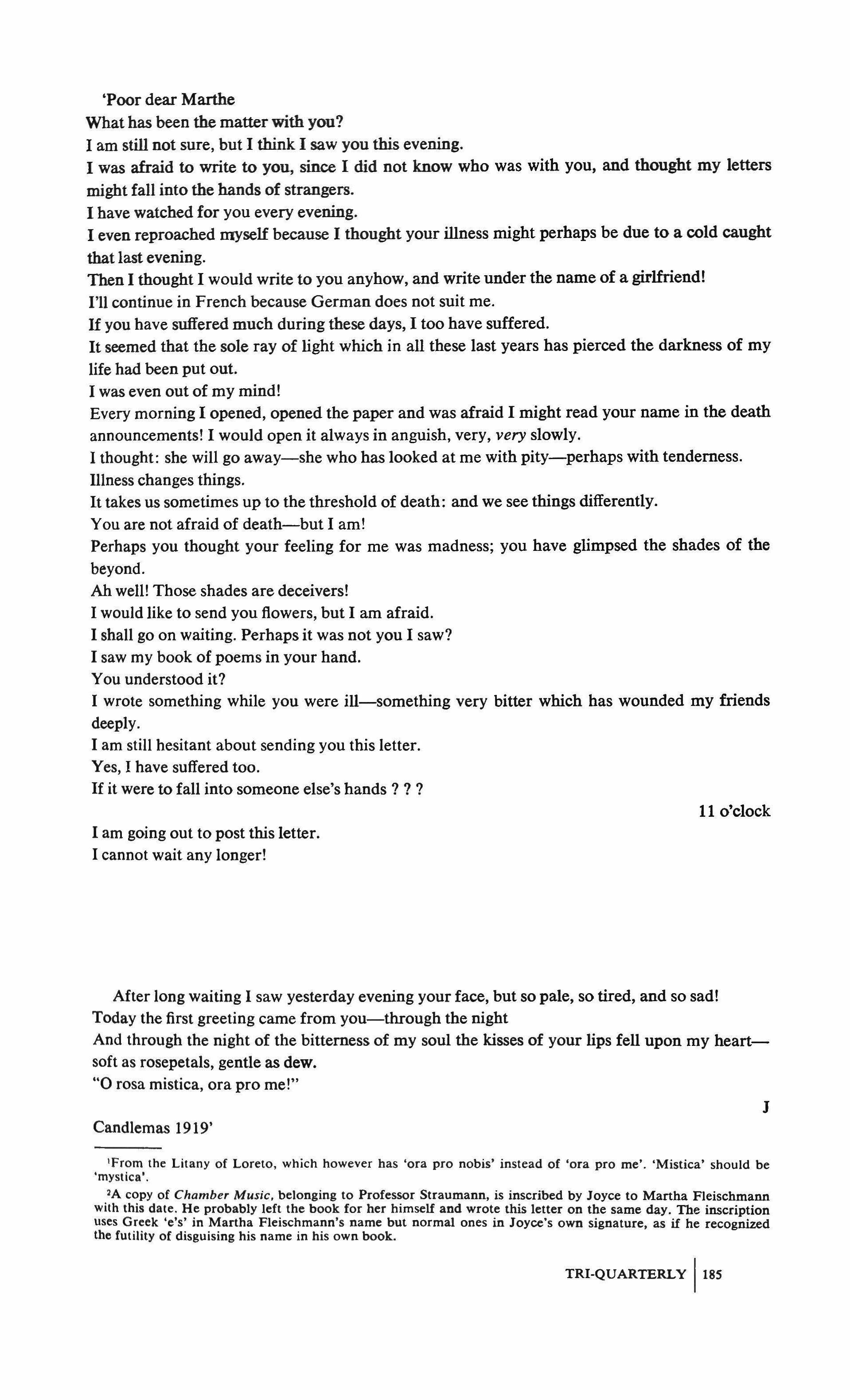
After long waiting I saw yesterday evening your face, but so pale, so tired, and so sad! Today the first greeting came from you-through the night And through the night of the bitterness of my soul the kisses of your lips fell upon my heartsoft as rosepetals, gentle as dew.
"0 rosa mistica, ora pro me!"
Candlemas 1919'
'From the Litany of Loreto, which however has 'ora pro nobis' instead of 'ora pro me'. 'Mistica' should be 'rnystica".
'A copy of Chamber Music, belonging to Professor Straumann, is inscribed by Joyce to Martha Fleischmann with this date. He probably left the book for her himself and wrote this letter on the same day. The inscription uses Greek 'e's' in Martha Fleischmann's name but normal ones in Joyce's own signature, as if he recognized the futility of disguising his name in his own book. TRI-QUARTERLY 1185
Postmark 3 June 1920
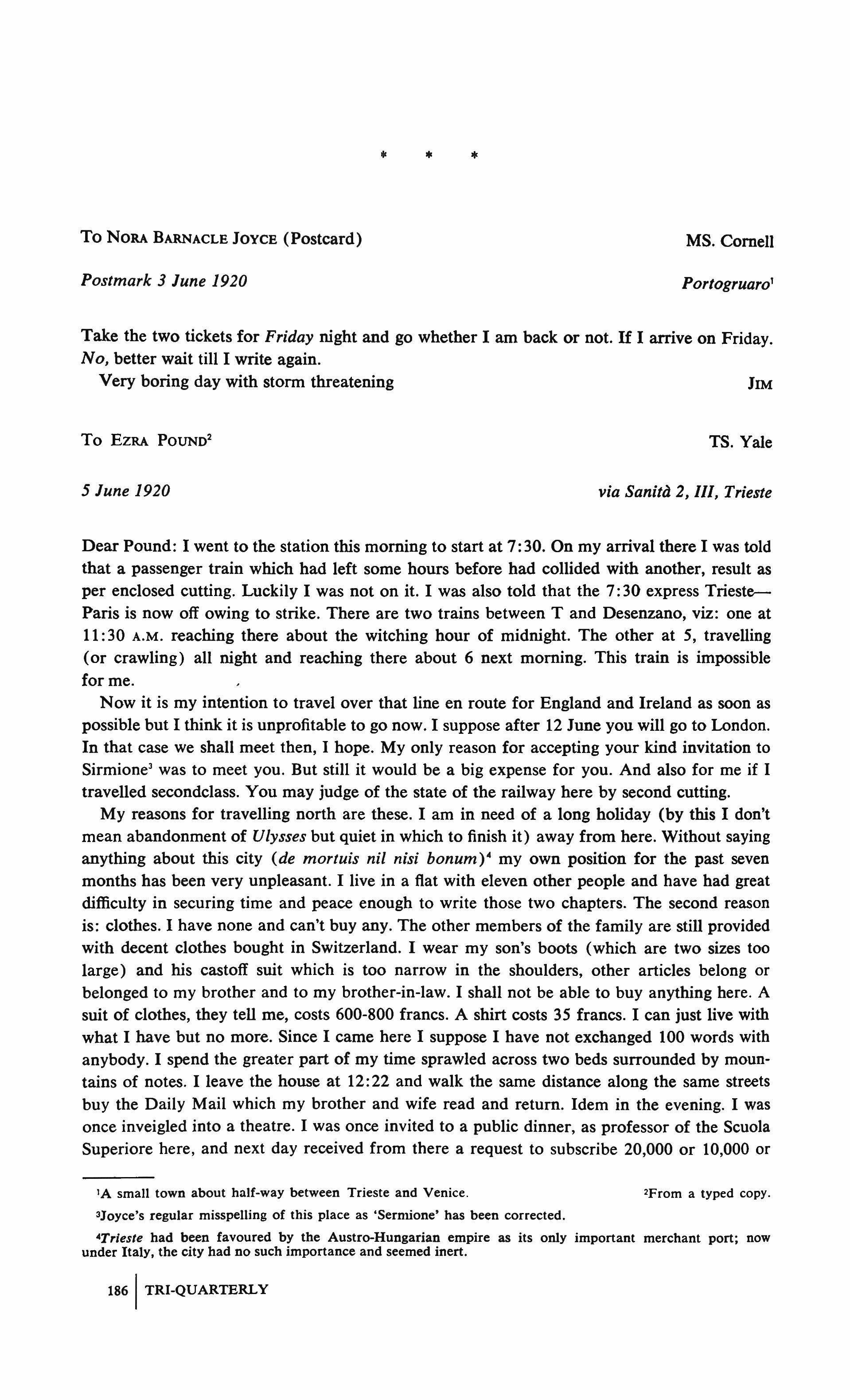
Portogruaro'
Take the two tickets for Friday night and go whether I am back or not. If I arrive on Friday. No, better wait till I write again.
Very boring day with storm threatening
To EZRA POUN02 TS. Yale
5 June 1920 via Sanitil2, 111, Trieste
Dear Pound: I went to the station this morning to start at 7:30. On my arrival there I was told that a passenger train which had left some hours before had collided with another, result as per enclosed cutting. Luckily I was not on it. I was also told that the 7: 30 express TriesteParis is now off owing to strike. There are two trains between T and Desenzano, viz: one at 11: 30 A.M. reaching there about the witching hour of midnight. The other at 5, travelling (or crawling) all night and reaching there about 6 next morning. This train is impossible forme.
Now it is my intention to travel over that line en route for England and Ireland as soon as possible but I think it is unprofitable to go now. I suppose after 12 June you will go to London. In that case we shall meet then, I hope. My only reason for accepting your kind invitation to Sirmione" was to meet you. But still it would be a big expense for you. And also for me if I travelled secondclass. You may judge of the state of the railway here by second cutting. My reasons for travelling north are these. I am in need of a long holiday (by this I don't mean abandonment of Ulysses but quiet in which to finish it) away from here. Without saying anything about this city (de mortuis nil nisi bonum)' my own position for the past seven months has been very unpleasant. I live in a flat with eleven other people and have had great difficulty in securing time and peace enough to write those two chapters. The second reason is: clothes. I have none and can't buy any. The other members of the family are still provided with decent clothes bought in Switzerland. I wear my son's boots (which are two sizes too large) and his castoff suit which is too narrow in the shoulders, other articles belong or belonged to my brother and to my brother-in-law. I shall not be able to buy anything here. A suit of clothes, they tell me, costs 600-800 francs. A shirt costs 35 francs. I can just live with what I have but no more. Since I came here I suppose I have not exchanged 100 words with anybody. I spend the greater part of my time sprawled across two beds surrounded by mountains of notes. I leave the house at 12:22 and walk the same distance along the same streets buy the Daily Mail which my brother and wife read and return. Idem in the evening. I was once inveigled into a theatre. I was once invited to a public dinner, as professor of the Scuola Superiore here, and next day received from there a request to subscribe 20,000 or 10,000 or
'A small town about half-way between Trieste and Venice.
'Joyce's regular misspelling of this place as 'Sermione' has been corrected.
2From a typed copy.
'Trieste had been favoured by the Austro-Hungarian empire as its only important merchant port; now under Italy, the city had no such importance and seemed inert.
even 5000 lire of Italian war loan.. I must buy clothes so I think I ought to go to Dublin to buy them.
Thirdly, my two children have not slept in a bed since we came. They repose on hard sofas and the climate here is very trying in July-September.
Fourthly, the rate of exchange is readjusting itself. While the pound (I mean the other pound, the English not the American one) stood at 100 or 90 I could fight the prices here because my money was in English currency. Today the pound is at 62 and my brother-in-law (who is cashier of a bank here) says it is gravitating towards a lower price owing to certain trade manoeuvres or nobody could buy at such high figures. If it reaches 50 I cannot swim any more but disappear under the surface. If I went to Switzerland I could not keep myself or family there: besides I dislike returning to places. Prices here are from 8 to 10 times what they were in 1914.
I could give lessons here (most people expected it of me) but I will not. I have a position in that school which the government has now raised to the rank of a university. My pay is about 3/-an hour for 6 hours a week. This I shall resign as it wastes my time and my nerves.
I cannot find a fiat here. To find one you must hold in the right hand a check for 20,000 or 30,000 lire as keymoney.
So I propose to pass three months in Ireland in order to write Circe and the close of the book. I should return here with my family in October (if anyone finds a fiat for us in the meantime) or, if not, without them in order to write the end of it.
Financially my position is that I shall receive on 25 June (£62-10-0)' and if my New York Publisher advances (£25). I presume that by the time this 87 is finished I shall [be] within measurable distance of 25 September when I get another £62-10-0. My wife and children could stay in Galway. I too there or in Dublin. The disturbed state of Ireland is of course a reason for not going. There may be other reasons. But I could not go to an English seaside town as it would be too dear. If I manage to do this and if you are in London at the end of June there are, I suppose, several things I could do such as seeing my agent. What do you think of this plan? I must finish my book in quiet even if I sell off the furniture I have here. I hope you received safely The Oxen of the Sun and have sent it off to London and New York. I was bringing down another copy this morning. The worst of it is I fear that Linati may come down on you. I wrote him yesterday express that I should be in Sirmione tonight and mentioned your suggestion of our meeting!
Have you seen Poesia or shall I send it?
I hope Mrs. Pound is still wet. It is a pity that I cannot see my way to go now but perhaps it is better so if I can manage the other and in that case we can meet more comfortably. Let me know as soon as possible about the safe arrival of chapter.
With many regrets and regards sincerely yours
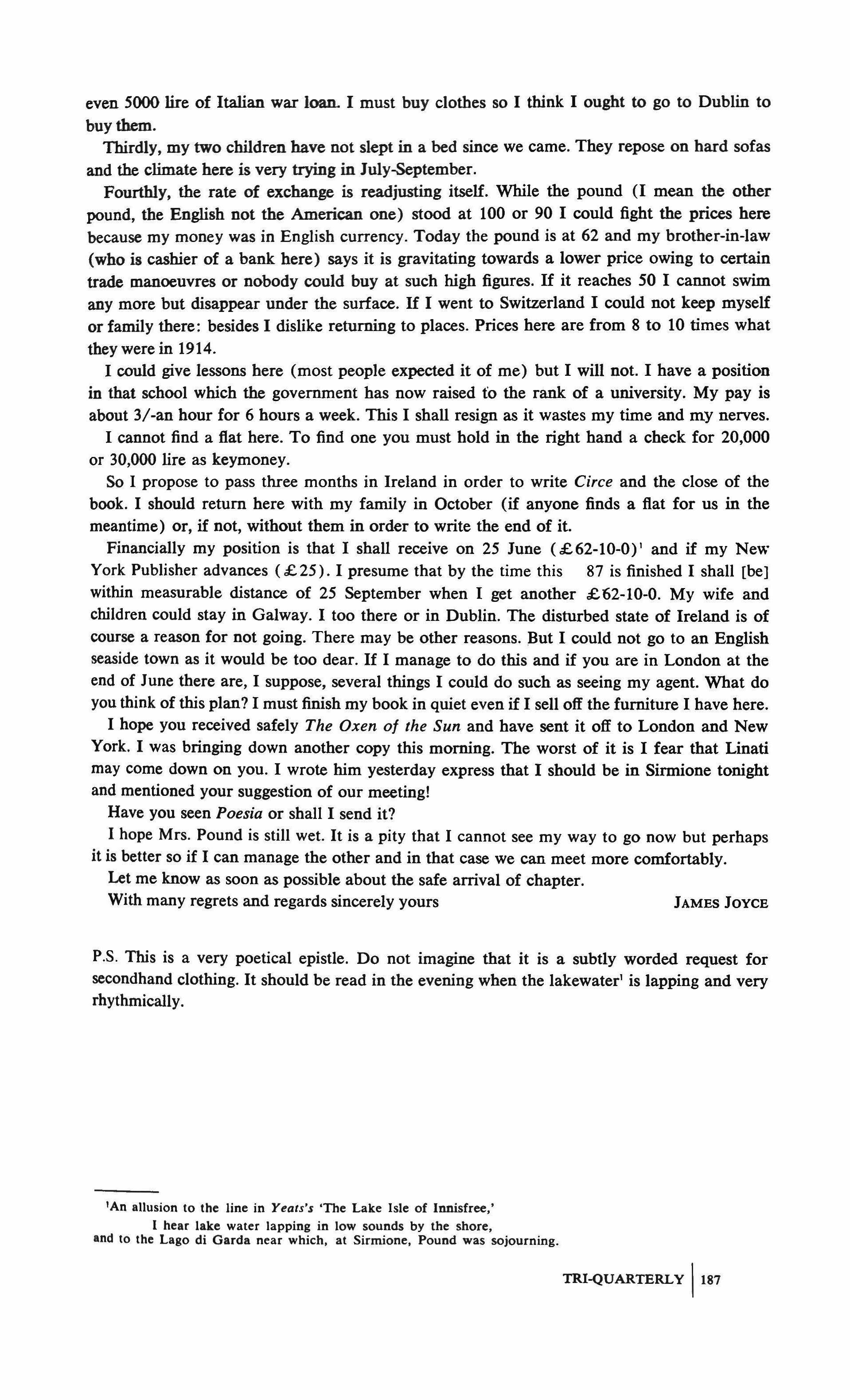 JAMES JOYCE
JAMES JOYCE
P.s. This is a very poetical epistle. Do not imagine that it is a subtly worded request for secondhand clothing. It should be read in the evening when the lakewater' is lapping and very rhythmically.
'An allusion to the line in Yeats's 'The Lake Isle of Innisfree,' I hear lake water lapping in low sounds by the shore, and to the Lago di Garda near which, at Sirrnione, Pound was sojourning.
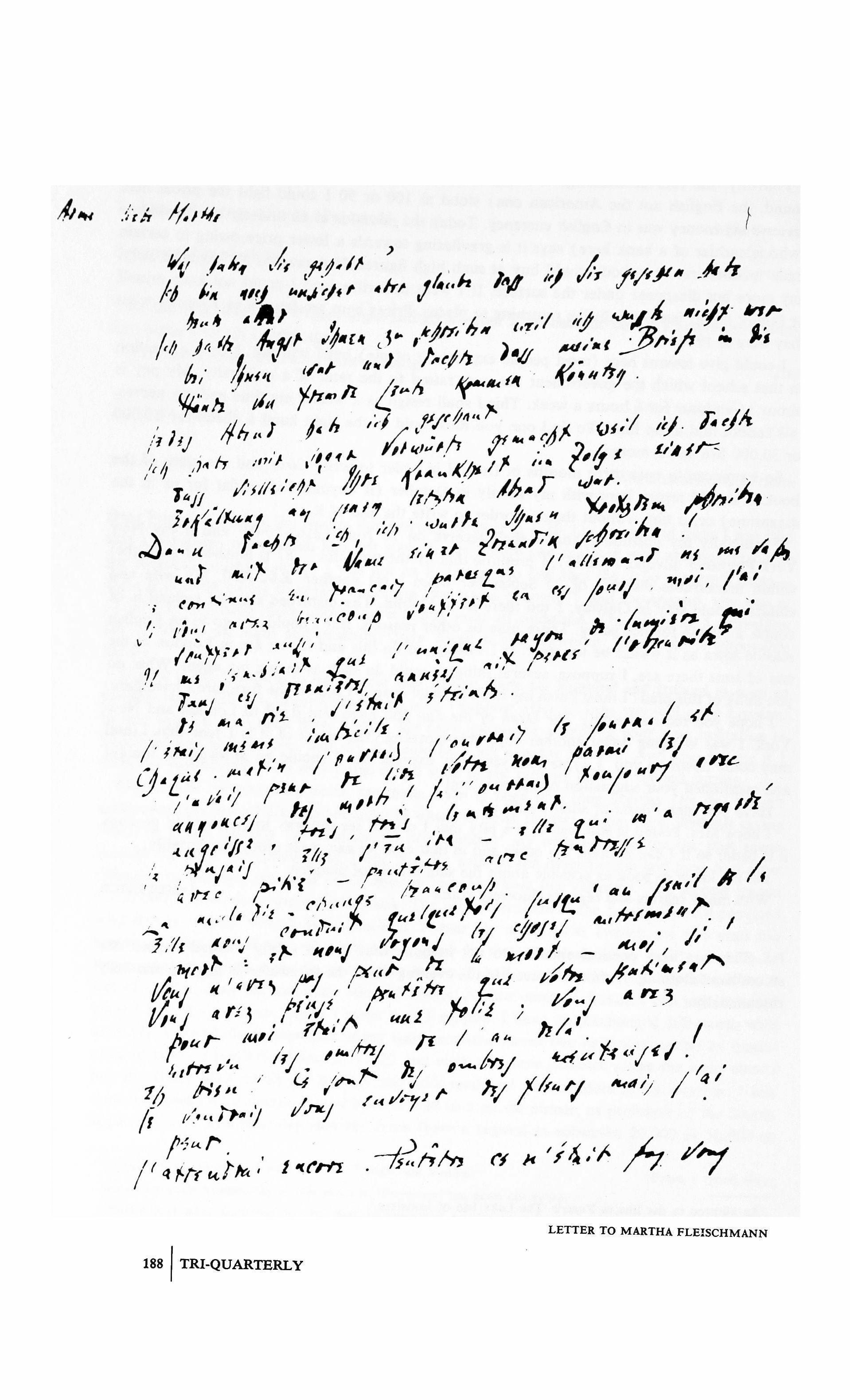
TlU-QUAR'TERLy
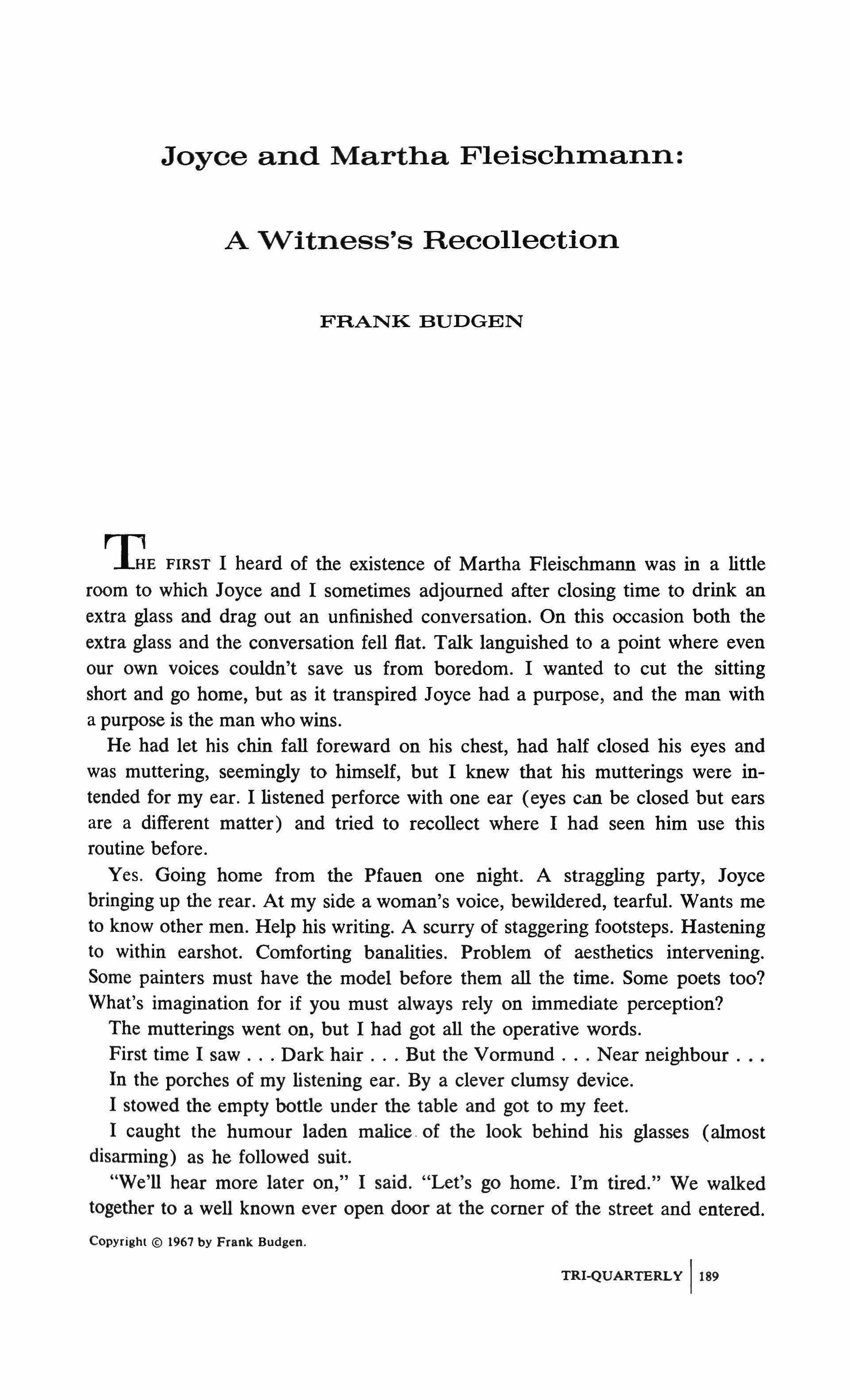
FIRST I heard of the existence of Martha Fleischmann was in a little room to which Joyce and I sometimes adjourned after closing time to drink an extra glass and drag out an unfinished conversation. On this occasion both the extra glass and the conversation fell fiat. Talk languished to a point where even our own voices couldn't save us from boredom. I wanted to cut the sitting short and go home, but as it transpired Joyce had a purpose, and the man with a purpose is the man who wins.
He had let his chin fall foreward on his chest, had half closed his eyes and was muttering, seemingly to himself, but I knew that his mutterings were intended for my ear. I listened perforce with one ear (eyes CdD. be closed but ears are a different matter) and tried to recollect where I had seen him use this routine before.
Yes. Going home from the Pfauen one night. A straggling party, Joyce bringing up the rear. At my side a woman's voice, bewildered, tearful. Wants me to know other men. Help his writing. A scurry of staggering footsteps. Hastening to within earshot. Comforting banalities. Problem of aesthetics intervening. Some painters must have the model before them all the time. Some poets too? What's imagination for if you must always rely on immediate perception?
The mutterings went on, but I had got all the operative words.
First time I saw Dark hair But the Vormund Near neighbour
In the porches of my listening ear. By a clever clumsy device. I stowed the empty bottle under the table and got to my feet.
I caught the humour laden malice. of the look behind his glasses (almost disarming) as he followed suit.
"We'll hear more later on," I said. "Let's go home. I'm tired." We walked together to a well known ever open door at the comer of the street and entered.
Copyright © 1967 by
Frank Budgen,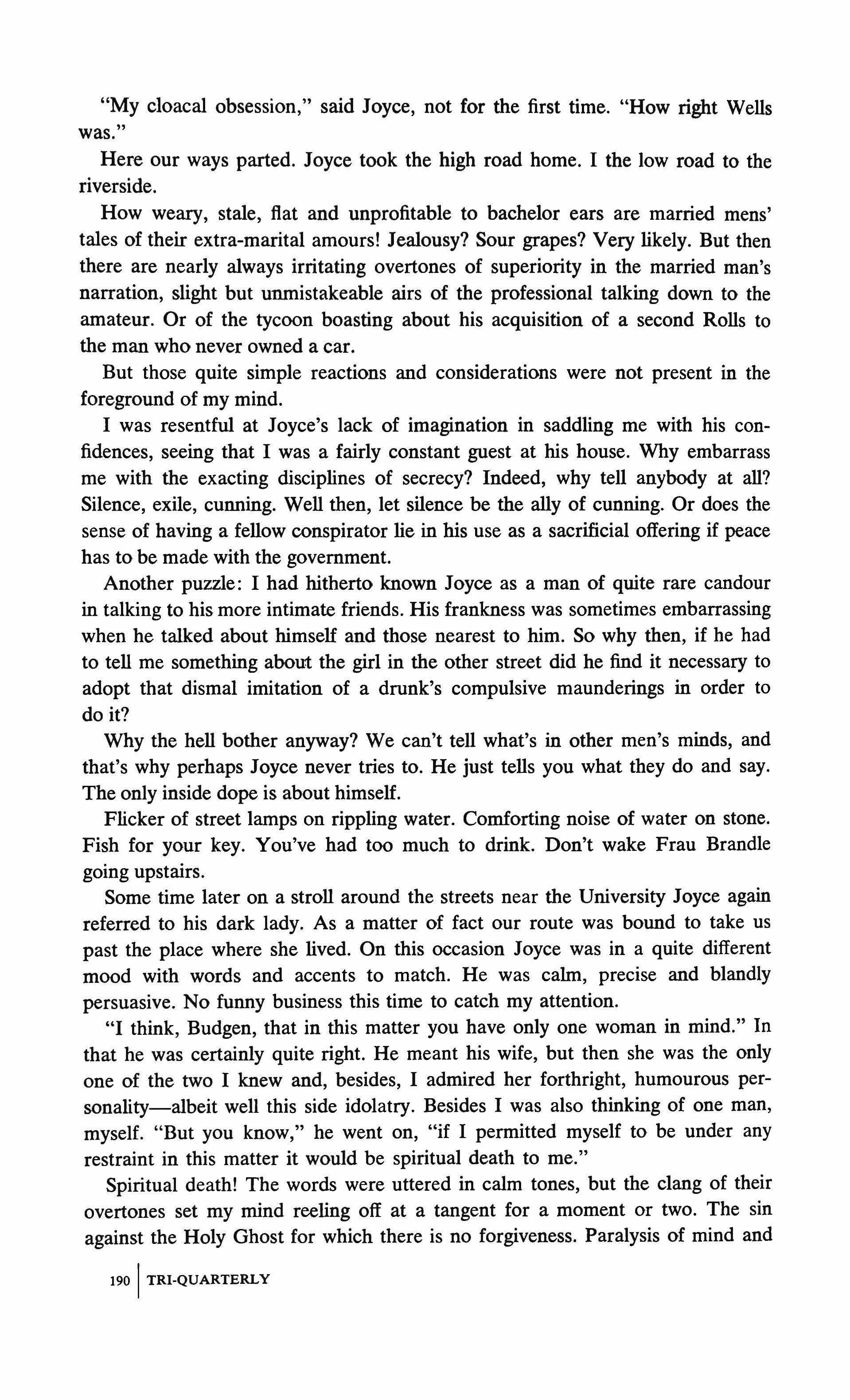
"My cloacal obsession," said Joyce, not for the first time. "How right Wells was."
Here our ways parted. Joyce took the high road home. I the low road to the riverside.
How weary, stale, flat and unprofitable to bachelor ears are married mens' tales of their extra-marital amours! Jealousy? Sour grapes? Very likely. But then there are nearly always irritating overtones of superiority in the married man's narration, slight but unmistakeable airs of the professional talking down to the amateur. Or of the tycoon boasting about his acquisition of a second Rolls to the man who never owned a car.
But those quite simple reactions and considerations were not present in the foreground of my mind.
I was resentful at Joyce's lack of imagination in saddling me with his confidences, seeing that I was a fairly constant guest at his house. Why embarrass me with the exacting disciplines of secrecy? Indeed, why tell anybody at all? Silence, exile, cunning. Well then, let silence be the ally of cunning. Or does the sense of having a fellow conspirator lie in his use as a sacrificial offering if peace has to be made with the government.
Another puzzle: I had hitherto known Joyce as a man of quite rare candour in talking to his more intimate friends. His frankness was sometimes embarrassing when he talked about himself and those nearest to him. So why then, if he had to tell me something about the girl in the other street did he find it necessary to adopt that dismal imitation of a drunk's compulsive maunderings in order to do it?
Why the hell bother anyway? We can't tell what's in other men's minds, and that's why perhaps Joyce never tries to. He just tells you what they do and say. The only inside dope is about himself.
Flicker of street lamps on rippling water. Comforting noise of water on stone. Fish for your key. You've had too much to drink. Don't wake Frau Brandle going upstairs.
Some time later on a stroll around the streets near the University Joyce again referred to his dark lady. As a matter of fact our route was bound to take us past the place where she lived. On this occasion Joyce was in a quite different mood with words and accents to match. He was calm, precise and blandly persuasive. No funny business this time to catch my attention.
"I think, Budgen, that in this matter you have only one woman in mind." In that he was certainly quite right. He meant his wife, but then she was the only one of the two I knew and, besides, I admired her forthright, humourous personality-albeit well this side idolatry. Besides I was also thinking of one man, myself. "But you know," he went on, "if I permitted myself to be under any restraint in this matter it would be spiritual death to me."
Spiritual death! The words were uttered in calm tones, but the clang of their overtones set my mind reeling off at a tangent for a moment or two. The sin against the Holy Ghost for which there is no forgiveness. Paralysis of mind and
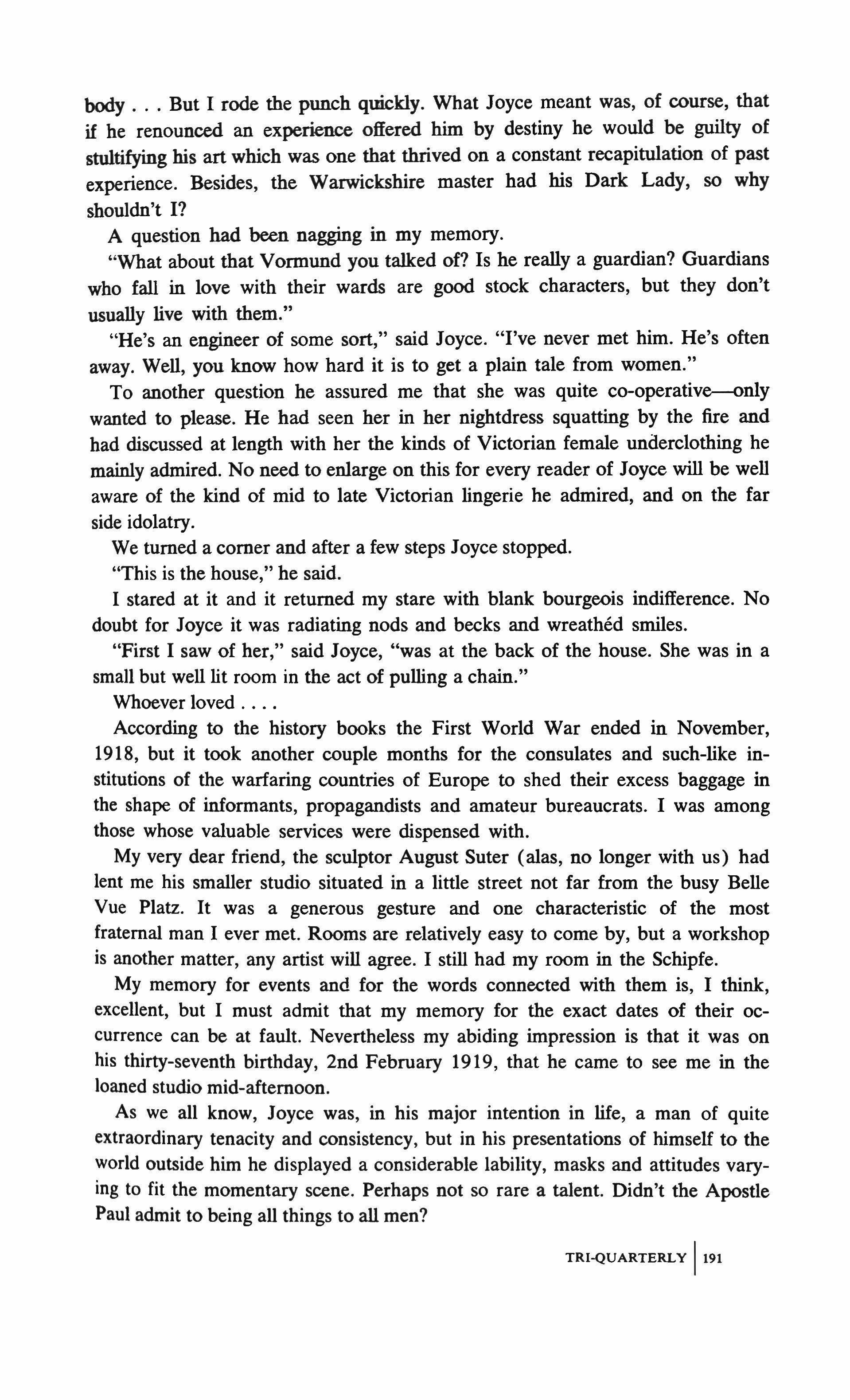
body But I rode the punch quickly. What Joyce meant was, of course, that if he renounced an experience offered him by destiny he would be guilty of stultifying his art which was one that thrived on a constant recapitulation of past experience. Besides, the Warwickshire master had his Dark Lady, so why shouldn't I?
A question had been nagging in my memory.
"What about that Vormund you talked of? Is he really a guardian? Guardians who fall in love with their wards are good stock characters, but they don't usually live with them."
"He's an engineer of some sort," said Joyce. "I've never met him. He's often away. Well, you know how hard it is to get a plain tale from women."
To another question he assured me that she was quite co-operative--only wanted to please. He had seen her in her nightdress squatting by the fire and had discussed at length with her the kinds of Victorian female underclothing he mainly admired. No need to enlarge on this for every reader of Joyce will be well aware of the kind of mid to late Victorian lingerie he admired, and on the far side idolatry.
We turned a comer and after a few steps Joyce stopped.
"This is the house," he said.
I stared at it and it returned my stare with blank bourgeois indifference. No doubt for Joyce it was radiating nods and becks and wreathed smiles.
"First I saw of her," said Joyce, "was at the back of the house. She was in a small but well lit room in the act of pulling a chain."
Whoever loved
According to the history books the First World War ended in November, 1918, but it took another couple months for the consulates and such-like institutions of the warfaring countries of Europe to shed their excess baggage in the shape of informants, propagandists and amateur bureaucrats. I was among those whose valuable services were dispensed with.
My very dear friend, the sculptor August Suter (alas, no longer with us) had lent me his smaller studio situated in a little street not far from the busy Belle Vue Platz. It was a generous gesture and one characteristic of the most fraternal man I ever met. Rooms are relatively easy to come by, but a workshop is another matter, any artist will agree. I still had my room in the Schipfe.
My memory for events and for the words connected with them is, I think, excellent, but I must admit that my memory for the exact dates of their occurrence can be at fault. Nevertheless my abiding impression is that it was on his thirty-seventh birthday, 2nd February 1919, that he came to see me in the loaned studio mid-afternoon.
As we all know, Joyce was, in his major intention in life, a man of quite extraordinary tenacity and consistency, but in his presentations of himself to the world outside him he displayed a considerable lability, masks and attitudes varying to fit the momentary scene. Perhaps not so rare a talent. Didn't the Apostle Paul admit to being all things to all men?
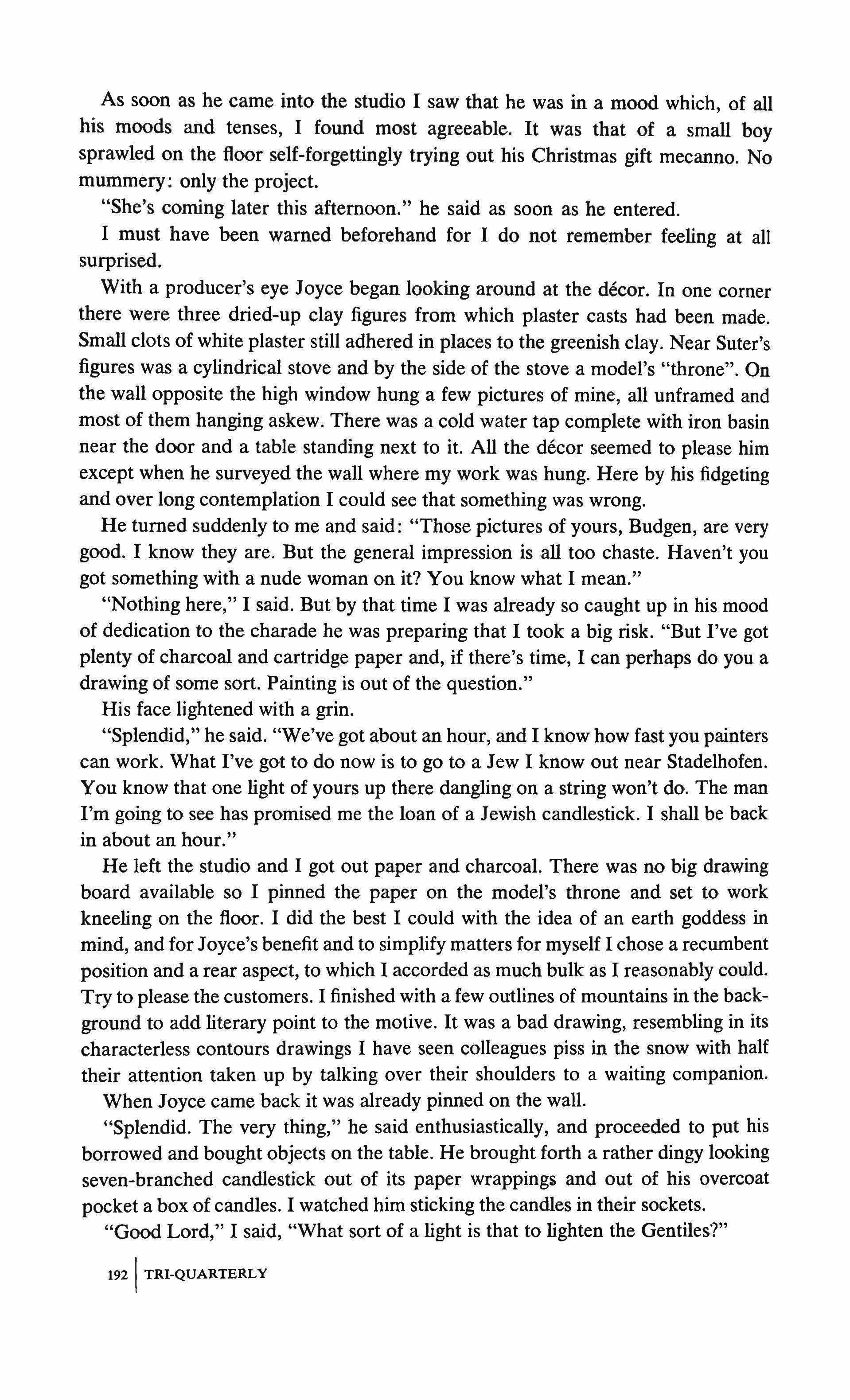
As soon as he came into the studio I saw that he was in a mood which, of all his moods and tenses, I found most agreeable. It was that of a small boy sprawled on the floor self-forgettingly trying out his Christmas gift mecanno. No mummery: only the project.
"She's coming later this afternoon." he said as soon as he entered. I must have been warned beforehand for I do not remember feeling at all surprised.
With a producer's eye Joyce began looking around at the decor. In one corner there were three dried-up clay figures from which plaster casts had been made. Small clots of white plaster still adhered in places to the greenish clay. Near Suter's figures was a cylindrical stove and by the side of the stove a model's "throne". On the wall opposite the high window hung a few pictures of mine, all unframed and most of them hanging askew. There was a cold water tap complete with iron basin near the door and a table standing next to it. All the decor seemed to please him except when he surveyed the wall where my work was hung. Here by his fidgeting and over long contemplation I could see that something was wrong.
He turned suddenly to me and said: "Those pictures of yours, Budgen, are very good. I know they are. But the general impression is all too chaste. Haven't you got something with a nude woman on it? You know what I mean."
"Nothing here," I said. But by that time I was already so caught up in his mood of dedication to the charade he was preparing that I took a big risk. "But I've got plenty of charcoal and cartridge paper and, if there's time, I can perhaps do you a drawing of some sort. Painting is out of the question."
His face lightened with a grin.
"Splendid," he said. "We've got about an hour, and I know how fast you painters can work. What I've got to do now is to go to a Jew I know out near Stadelhofen. You know that one light of yours up there dangling on a string won't do. The man I'm going to see has promised me the loan of a Jewish candlestick. I shall be back in about an hour."
He left the studio and I got out paper and charcoal. There was no big drawing board available so I pinned the paper on the model's throne and set to work kneeling on the floor. I did the best I could with the idea of an earth goddess in mind, and for Joyce's benefit and to simplify matters for myself I chose a recumbent position and a rear aspect, to which I accorded as much bulk as I reasonably could. Try to please the customers. I finished with a few outlines of mountains in the background to add literary point to the motive. It was a bad drawing, resembling in its characterless contours drawings I have seen colleagues piss in the snow with half their attention taken up by talking over their shoulders to a waiting companion. When Joyce came back it was already pinned on the wall.
"Splendid. The very thing," he said enthusiastically, and proceeded to put his borrowed and bought objects on the table. He brought forth a rather dingy looking seven-branched candlestick out of its paper wrappings and out of his overcoat pocket a box of candles. I watched him sticking the candles in their sockets.
"Good Lord," I said, "What sort of a light is that to lighten the Gentiles'?"
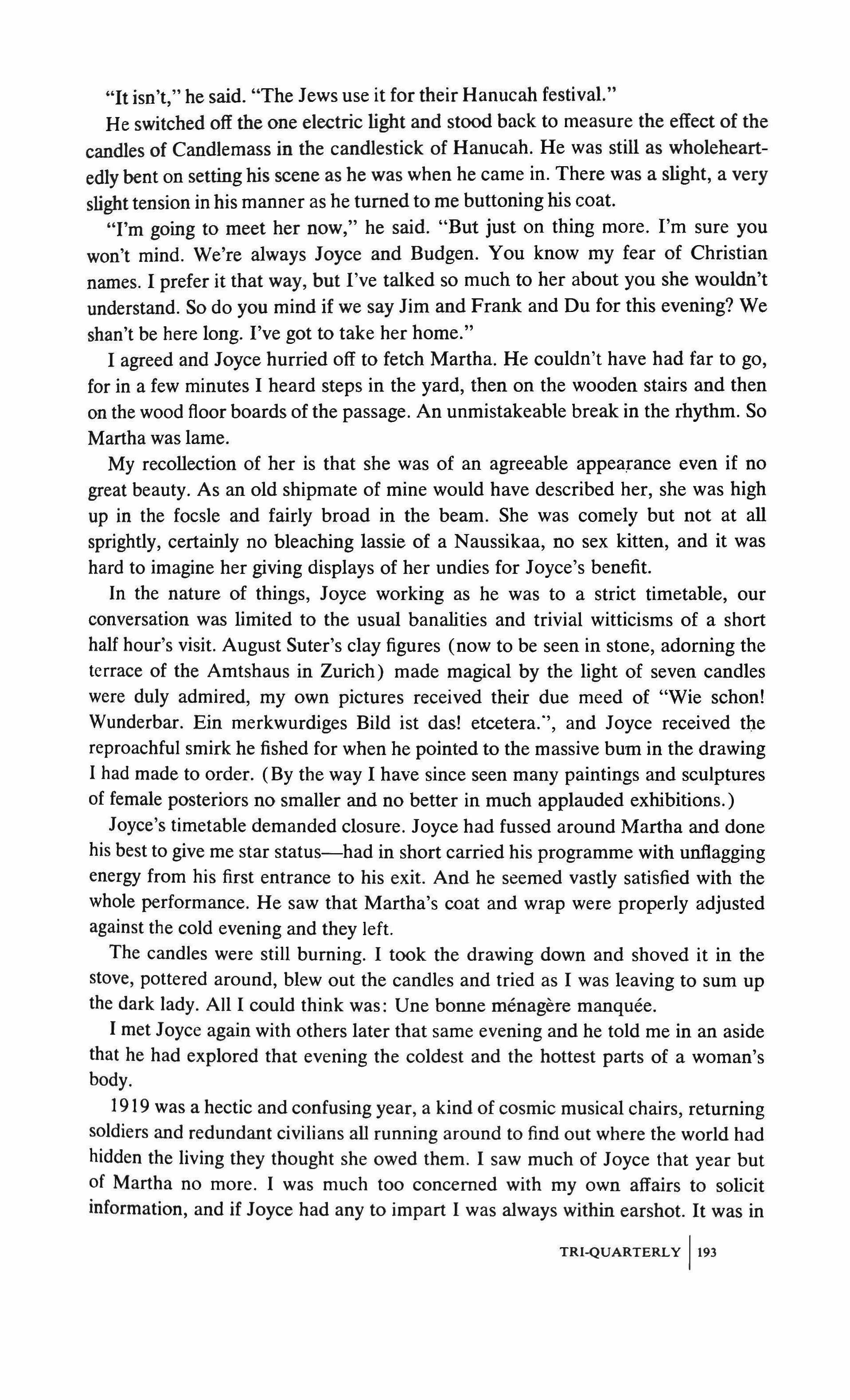
"It isn't," he said. "The Jews use it for their Hanucah festival."
He switched off the one electric light and stood back to measure the effect of the candles of Candlemass in the candlestick of Hanucah. He was still as wholeheartedly bent on setting his scene as he was when he came in. There was a slight, a very slight tension in his manner as he turned to me buttoning his coat.
"I'm going to meet her now," he said. "But just on thing more. I'm sure you won't mind. We're always Joyce and Budgen. You know my fear of Christian names. I prefer it that way, but I've talked so much to her about you she wouldn't understand. So do you mind if we say Jim and Frank and Du for this evening? We shan't be here long. I've got to take her home."
I agreed and Joyce hurried off to fetch Martha. He couldn't have had far to go, for in a few minutes I heard steps in the yard, then on the wooden stairs and then on the wood floor boards of the passage. An unmistakeable break in the rhythm. So Martha was lame.
My recollection of her is that she was of an agreeable appearance even if no great beauty. As an old shipmate of mine would have described her, she was high up in the focsle and fairly broad in the beam. She was comely but not at all sprightly, certainly no bleaching lassie of a Naussikaa, no sex kitten, and it was hard to imagine her giving displays of her undies for Joyce's benefit.
In the nature of things, Joyce working as he was to a strict timetable, our conversation was limited to the usual banalities and trivial witticisms of a short half hour's visit. August Suter's clay figures (now to be seen in stone, adorning the terrace of the Amtshaus in Zurich) made magical by the light of seven candles were duly admired, my own pictures received their due meed of "Wie schon! Wunderbar. Ein merkwurdiges Bild ist das! etcetera:', and Joyce received the reproachful smirk he fished for when he pointed to the massive bum in the drawing I had made to order. (By the way I have since seen many paintings and sculptures of female posteriors no smaller and no better in much applauded exhibitions.)
Joyce's timetable demanded closure. Joyce had fussed around Martha and done his best to give me star status-had in short carried his programme with unflagging energy from his first entrance to his exit. And he seemed vastly satisfied with the whole performance. He saw that Martha's coat and wrap were properly adjusted against the cold evening and they left.
The candles were still burning. I took the drawing down and shoved it in the stove, pottered around, blew out the candles and tried as I was leaving to sum up the dark lady. All I could think was: Une bonne menagere manquee, I met Joyce again with others later that same evening and he told me in an aside that he had explored that evening the coldest and the hottest parts of a woman's body.
1919 was a hectic and confusing year, a kind of cosmic musical chairs, returning soldiers and redundant civilians all running around to find out where the world had hidden the living they thought she owed them. I saw much of Joyce that year but of Martha no more. I was much too concerned with my own affairs to solicit information, and if Joyce had any to impart I was always within earshot. It was in
TRI-QUARTERLy 1193

the June of 1919 while I was staying with Louis Sargent and his wife in Zermatt that a letter arrived from Joyce ending with the following postscript:-
P.S. This morning a threatening violent letter from the Vormund. She had been dying, was in a madhouse or Nervenanstalt but now back again threatening suicide. Gave him all my correspondence. Violent gestures towards me. I did not even know she was back nor have I seen her since the feast of candles. Well, I got up and went to the lion's den. Long interview wherein I displayed all that more human diplomacy, that goodness of heart, that understanding of others, that timidity which yet is courage, those shining qualities of heart and head which have so often Result, stasis, Waffenstillstand.
Joyce was rather proud of his ability to talk himself out of any awkward situation. I had not intended ever to allude to the Martha Fleischmann episode in Joyce's life, but the publication of EHmann's biography and, later the publication of the Professor Straumann collection of Joyce's letters to Martha renders any further discretion on my part otiose. The story I tell here is that of a witness called on to play a small part as figurant. As such it may both amuse and help to fill out the picture of Joyce's personality.

THELETTER* which James Joyce wrote to me from Zurich on September 1, 1937, has had a singular history. That history began in Paris, in the early summer of the same year, when my husband, Laurence Vail, and I went to a cocktail party at Maria and Eugene Jolas's, in the section of Paris known as Neuilly-sur-Seine. It ends in the month of January 1966 in San Francisco, in my house in the Haight-Ashbury district.
My husband and I had driven up from the French alps for one of our periodical visits to Paris, and this trip, like all the other returns to Paris after long months of work in the country, was a festive interval of reunion with those we loved. This time, it was also the moment of the opening of the Paris Exposition, the world fair of 1937, and after the Jolases' cocktail party we would meet Mary Reynolds, and Marcel Duchamp, and Man Ray, and Brancusi, and a number of other old friends, at the fair. I wrote a sad poem about that evening, a poem to be spoken by two voices following quite different texts (one voice being that of the subconscious speaking-perhaps-and the other that of the waking mind). It begins with one voice saying, to the opposed accompaniment of the other:
I believe in the scenic railways that Have not run yet because the scaffolding Is still unsafe
And in the buildings they have not had time To finish I believe this year and this time Of year there is never the time to finish Only the time left to begin again.
That was to be the evening. But the afternoon of that day in early summer was something else again.
Nora and James Joyce, and Helen and Giorgio Joyce, were to be at the Jolas's, and other friends we were eager to see would be there. And we would rush into one another's arms, and kiss and exclaim, and drink, and listen, and talk, and laugh out loud, until twilight came underneath the garden trees. In the

nine years since I had first met Nora and James Joyce, I had never once spoken of my writing to them. I was always uneasy anyway about talking about my writing, but in the case of James Joyce I was particularly so. Above all, I didn't want him to think that it was because he was a great writer that I liked being with him and his wife. I was as much a dancer as a writer in the early days when I knew them (or so it seemed to me), and it was as a dancer that I had come to know Lucia Joyce, when we had studied at Elizabeth Duncan's school in Paris and Salzburg together. When I was with Nora and James Joyce, the conversation would be about the various countries and cities we had lived in, or about the kinds of wine we liked to drink. And Nora loved talking about clothes, and what was in style and what wasn't in style; and I liked talking about Robert McAlmon, who was present night and day in all our lives; and my husband liked singing songs with Joyce over wine at a cafe table. I would have died of shame if anyone had spoken of my writing in Joyce's presence. But on this particular afternoon in the summer of 1937, things took another tum.
Nora and James Joyce did not come to the cocktail party that afternoon, for he was suffering from a cold. But Helen and Giorgio were there, and we kissed and exclaimed over one another's hair and eyes and teeth and clothes, that we had not seen in six months or more, and we drank, and talked, and listened, and drank again. And then Helen unwrapped a book before me, a book in a handsome gold cover, tied with red ribbons to hold its parchment pages in place, a beautiful book, a limited edition, published by Harry and Caresse Crosby on their Black Sun Press in Paris. It was called Short Stories, it had been published in 1929, and I had written it. Helen's father-in-law had bought the copy some years before, she said, but he had been shy about asking me to autograph it for him. I felt weak in the knees, and weak in the head, and in what words I inscribed the book to Joyce I do not recall.
All this explanation has been necessary in order to make clear the meaning of the first paragraph of Joyce's September first letter to me. The rest of the letter requires less of an introduction. It was later on in the summer, perhaps in August of that year, that I wrote to Joyce from our chalet in the French alps and asked him if he believed younger writers (meaning me) should be permitted to make use in their own work of the original phrases, or nouns, or adjectives, or verbs, which older writers (meaning him) had introduced in their writings. Now that the truth was out and it was recognized between us that I was trying to be a writer, I was able to ask him this simple question that had been disturbing me for years. In the letters I had written him until then, and in the letters and greeting cards that he had sent me for almost a decade, my letter asking him this question, and his letter answering it (at least in part), were the only letters we exchanged which touched on the matter of writing. As things turned out, we were never to meet in Paris again. When we had lunch together in the spring of 1938, we had other things to talk about, and we forgot to mention the question I had brought up, which means it probably wasn't of any importance anyway. That lunch in Zurich was the last meeting we were to have.
And now several years must be capsuled into a single paragraph. In 1941, my husband and I left France with our children, returning to America after an absence of twenty years. In our chalet in the alps, we left our books and papers. When we returned to France, after the war, of Joyce's letters to me only this one, and a single postcard remained. Three or four years later, when Stuart Gilbert was collecting Joyce's letters, I gave him the one Joyce had written to me on the first of September, 1937. Again, it was at a cocktail party at the Jolas's, this time in their apartment in Paris, an apartment where Nora Joyce was to spend her last Christmas with all of us. It had not occurred to me to have a photostatic copy made of Joyce's letter, or even to keep a typewritten copy of it. I handed it to Stuart Gilbert and gave it no further thought until Ben Huebsch sent me the volume of collected letters (in 1955?), and I found that my letter from Joyce was not among those published. In reply to my enquiry, Huebsch wrote me in distress that he had never received this letter from Stuart Gilbert. And Stuart Glibert, in response to Maria Jolas's enquiry, wrote that he very vaguely remembered that I had spoken of, and possibly showed him, a letter Joyce had written me, but he had not taken it, and was under the impression that Eugene Jolas had borrowed it to read. By then, my dear and good friend Gene was dead, and Maria could not find it among his papers. We were all saddened and bewildered by its loss, but there was nothing any of us could do.
Then in January 1966, Maria Jolas moved from one Paris apartment to another, and she found the letter, still in its envelope, still living, still breathing, still saying with Irish formality "Dear Mrs. Vail," as Joyce himself had said it in quiet deference through the years. And here it is.
Carlton Elite Hotel Bahnhofstrasse 41 Zurich, Switzerland. 1 September 1937
Dear Mrs. Vail:
I ought to have thanked you before now for so kindly inscribing for me that copy of your book of stories. If you or Vail have any copy of any book of mine I shall gladly inscribe it for you.
Also for your letter. About the point you raise however I should prefer to wait till we meet some time in Paris. I submitted to the recent P. E. N. International Congress at Paris through Benjamin Crerniere (who read it to the meeting, an extremely important report about non-American writers and American Copyright Law. I had the impression that the delegates were profoundly bored and were waiting eagerly for the next political bout between two or more of the rival factions in the congress. The few writers to whom I did mention the suggestion in your letter were also, so far as I could gather, almost personally offended at the idea of any writer or any reader of any writer concerning himself or herself with the mere matter of words. The word sagt by the way, is not exactly of my coining. It is perfectly good Danish and Norwegian for our word 'said' with a final 'e' elided. I used it and the other variant simply to try to give an idea of the curious conversations of sailors in their various dialect of the lingua franca which I have often listened to with great amusement in quayside cafes in Trieste, always astounded to find that the speakers from different quarters of the globe finally understood one another.
May their luck be also mine!
Our friendly greetings to Vail and yourself.
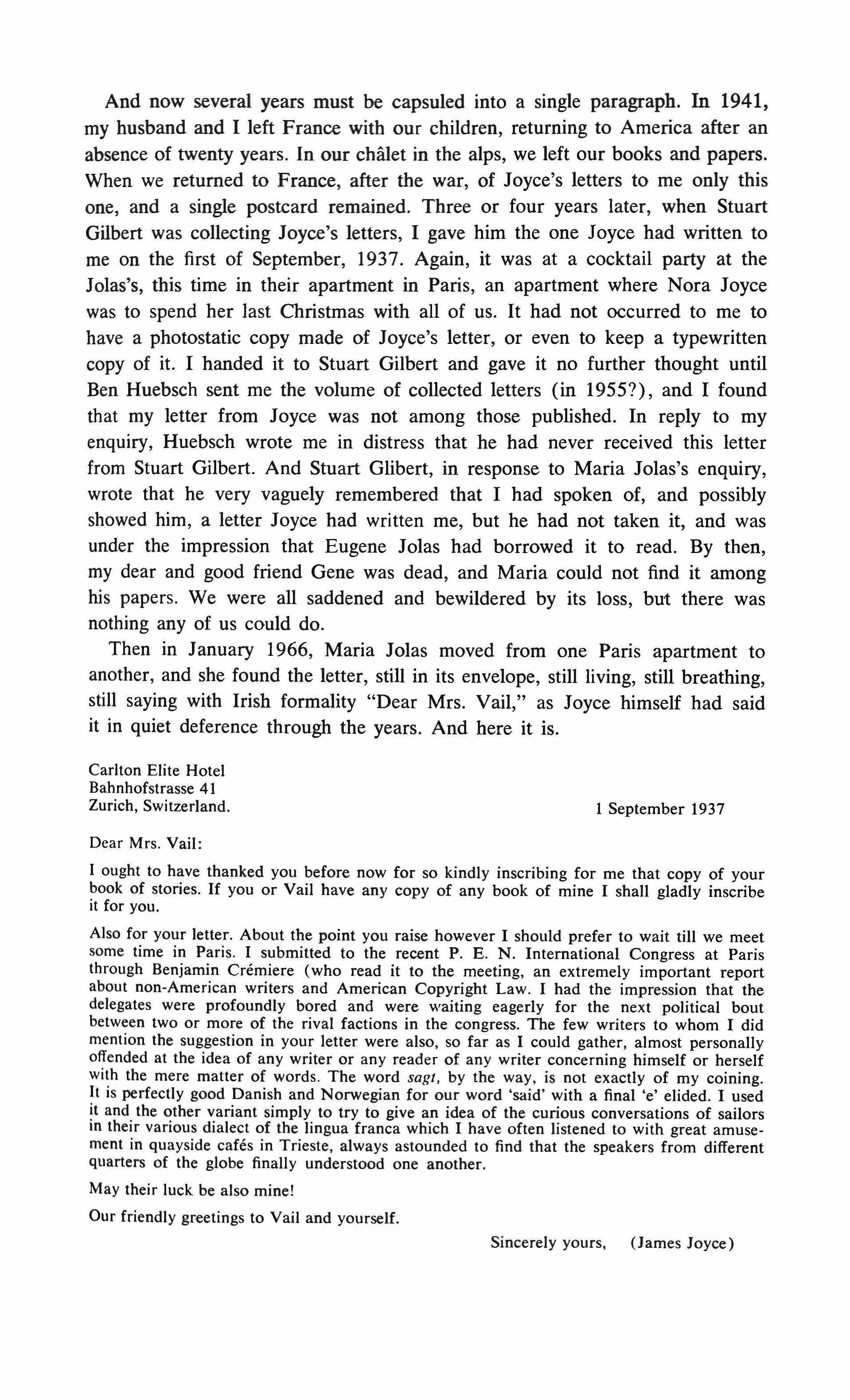
Sincerely yours, (James Joyce)
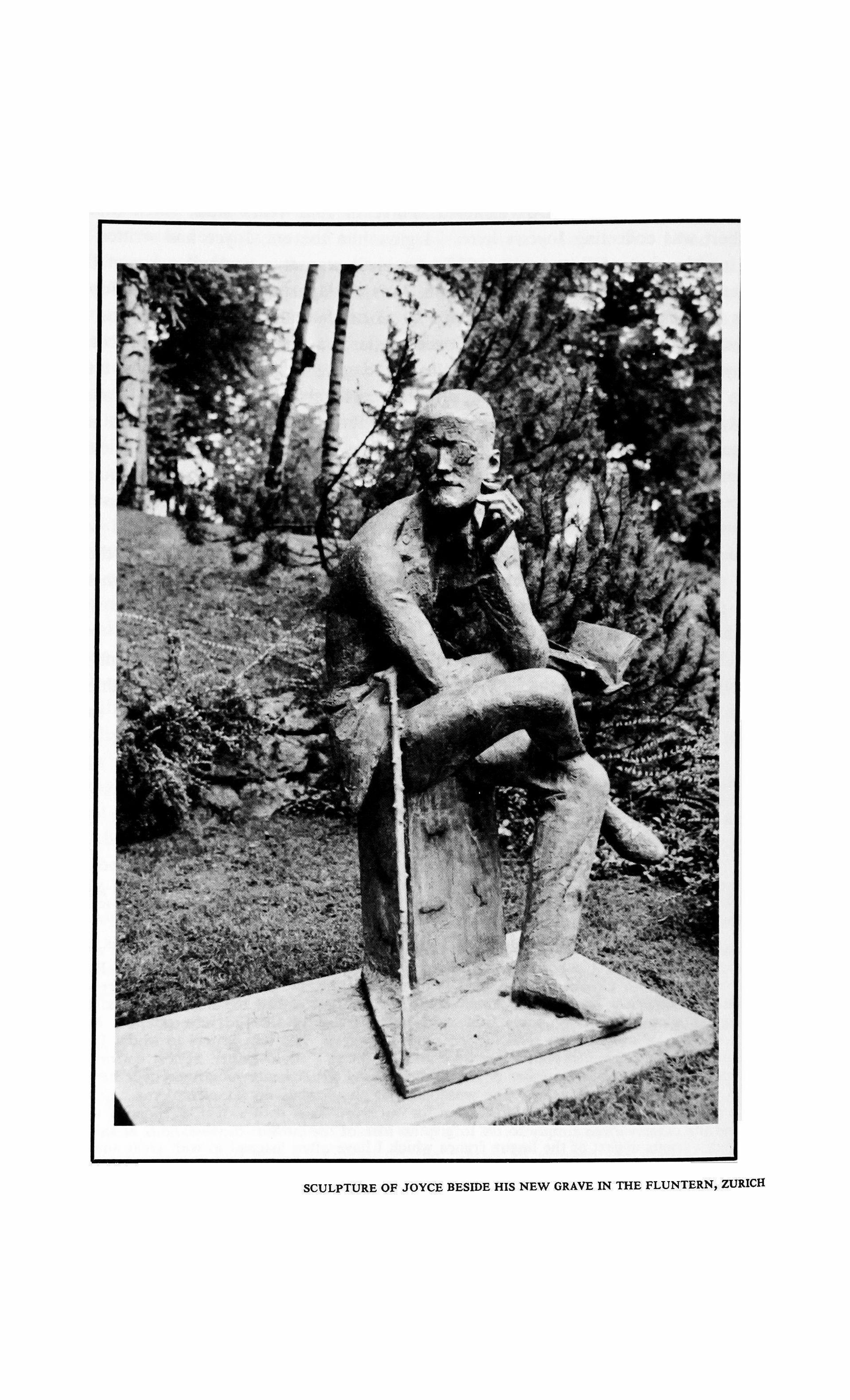 SCULPTURE OF JOYCE BESIDE HIS NEW GRAVE IN THE FLUNTERN, ZURiCH
SCULPTURE OF JOYCE BESIDE HIS NEW GRAVE IN THE FLUNTERN, ZURiCH

JOYCE, who changed his residences so often when alive because of poverty, war, or sheer restlessness, has now found, thanks to the city of Zurich, a final and a more sumptuous address. That he should be buried here rather than in his native city of Dublin may at first appear incongruous, because except for a few poems like 'Bahnhofstrasse' all his work is located selfconsciously in Ireland; more precisely, it is situated within an area about twenty-five kilometers wide, bordered on the east by the Hill of Howth where Bloom and Molly embraced among the rhododendrons, and bordered on the west by the public house at Chapelizod where Earwicker, hero of Finnegans Wake, so unconvincingly denies his sins before the twelve customers at his bar. Certainly the Irish setting of his books was important to Joyce. He did not belong to the company of those writers, many of them excellent, who put their characters into exotic settings. He was not like Shakespeare, for instance, who could set some scenes of The Winter's Tale on a seacoast of landlocked Bohemia; nor would Joyce have made Keats's famous error of having the Pacific discovered by Cortez rather than by Balboa. These mistakes did not matter, yet it does matter that Joyce would not have made them. He attached to the accuracy of his details not a moral but a magical significance. He knew of course that accuracy alone would not get far, and he wrote Lady Gregory when he was twenty, The Kingdom of God cometh not with observation. Yet he wished to keep the roles of memory and imagination distinct; memory could fill with interstitial particulars what the imagination could bring into radiant whatness. Wrong particulars would throw off the work of art, as with Ali Baba's brother-in-law who, for not remembering the precise words of the spell, lost a treasure and his head. Joyce wished also to create in his book the seventh city of Christendom, and this goal seems quixotic today, as any visitor to Dublin knows, because the explosion of Nelson's Pillar and the erection of many new buildings have insured that Joyce's Dublin
This address was given in the Great Hall of the University of Zurich on the evening of June 16, 1966. It was pan of the memorial ceremonies for the retirement of James and Nora Joyce in a new and permanent arave in the Fluntern Cemetery, and for the dedication of a monument to Joyce. Dr. Emil Dandolt, mayor of Zurich, and Professor Heinrich Straumann of the University, participated, as did the actress Maria Becker and a choral group. Joyce's son and grandson, and a number of his friends, attended.
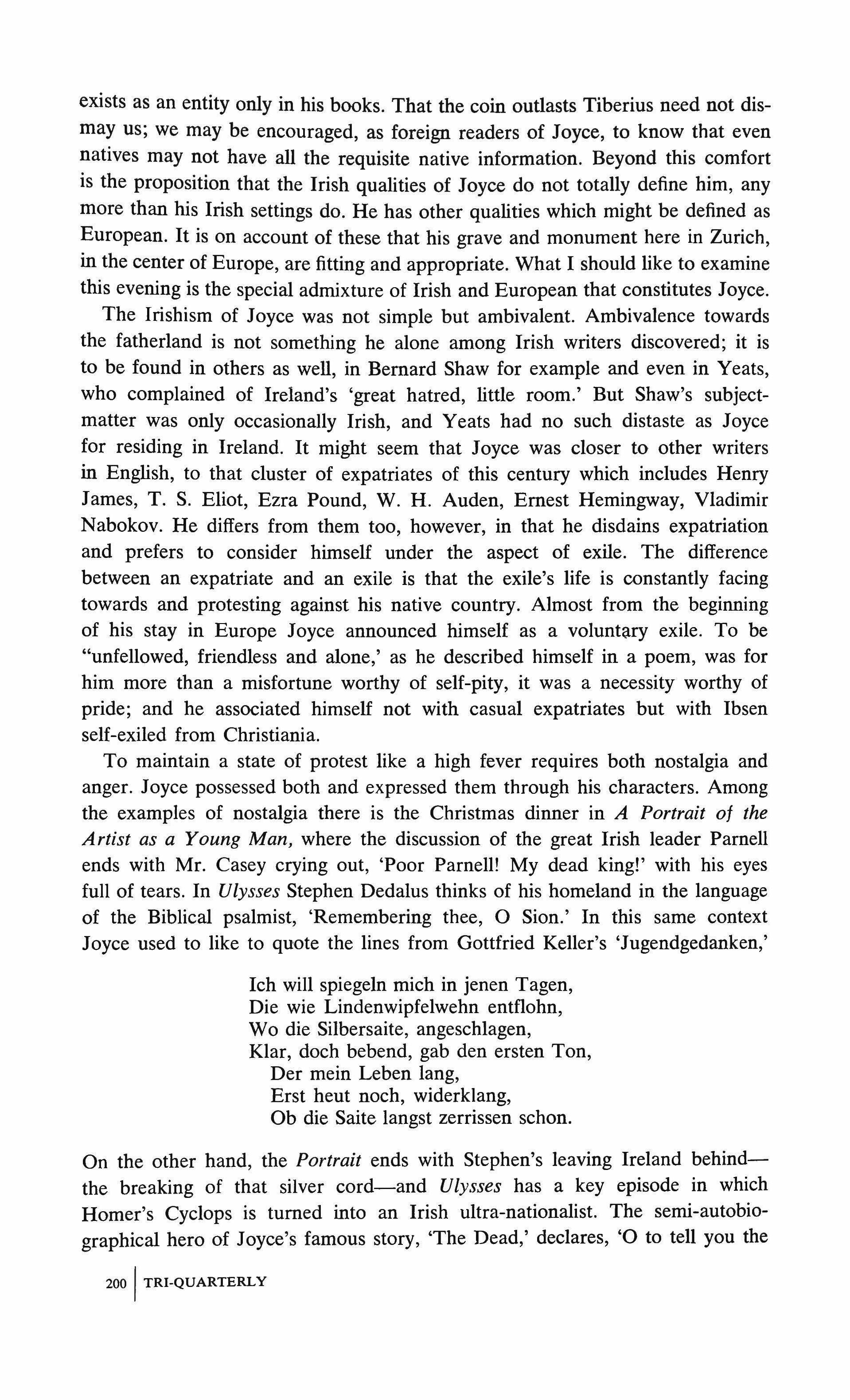
exists as an entity only in his books. That the coin outlasts Tiberius need not dismay us; we may be encouraged, as foreign readers of Joyce, to know that even natives may not have all the requisite native information. Beyond this comfort is the proposition that the Irish qualities of Joyce do not totally define him, any more than his Irish settings do. He has other qualities which might be defined as European. It is on account of these that his grave and monument here in Zurich, in the center of Europe, are fitting and appropriate. What I should like to examine this evening is the special admixture of Irish and European that constitutes Joyce.
The lrishism of Joyce was not simple but ambivalent. Ambivalence towards the fatherland is not something he alone among Irish writers discovered; it is to be found in others as well, in Bernard Shaw for example and even in Yeats, who complained of Ireland's 'great hatred, little room.' But Shaw's subjectmatter was only occasionally Irish, and Yeats had no such distaste as Joyce for residing in Ireland. It might seem that Joyce was closer to other writers in English, to that cluster of expatriates of this century which includes Henry James, T. S. Eliot, Ezra Pound, W. H. Auden, Ernest Hemingway, Vladimir Nabokov. He differs from them too, however, in that he disdains expatriation and prefers to consider himself under the aspect of exile. The difference between an expatriate and an exile is that the exile's life is constantly facing towards and protesting against his native country. Almost from the beginning of his stay in Europe Joyce announced himself as a voluntary exile. To be "unfellowed, friendless and alone,' as he described himself in a poem, was for him more than a misfortune worthy of self-pity, it was a necessity worthy of pride; and he associated himself not with casual expatriates but with Ibsen self-exiled from Christiania.
To maintain a state of protest like a high fever requires both nostalgia and anger. Joyce possessed both and expressed them through his characters. Among the examples of nostalgia there is the Christmas dinner in A Portrait of the Artist as a Young Man, where the discussion of the great Irish leader Parnell ends with Mr. Casey crying out, 'Poor Parnell! My dead king!' with his eyes full of tears. In Ulysses Stephen Dedalus thinks of his homeland in the language of the Biblical psalmist, 'Remembering thee, 0 Sion.' In this same context Joyce used to like to quote the lines from Gottfried Keller's 'Jugendgedanken,'
Ich will spiegeln mich in jenen Tagen, Die wie Lindenwipfelwehn entflohn, Wo die Silbersaite, angeschlagen, Klar, doch bebend, gab den ersten Ton, Der mein Leben lang, Erst heut noch, widerklang, Ob die Saite langst zerrissen schon.
On the other hand, the Portrait ends with Stephen's leaving Ireland behindthe breaking of that silver cord-and Ulysses has a key episode in which Homer's Cyclops is turned into an Irish ultra-nationalist. The semi-autobiographical hero of Joyce's famous story, 'The Dead,' declares, '0 to tell you the
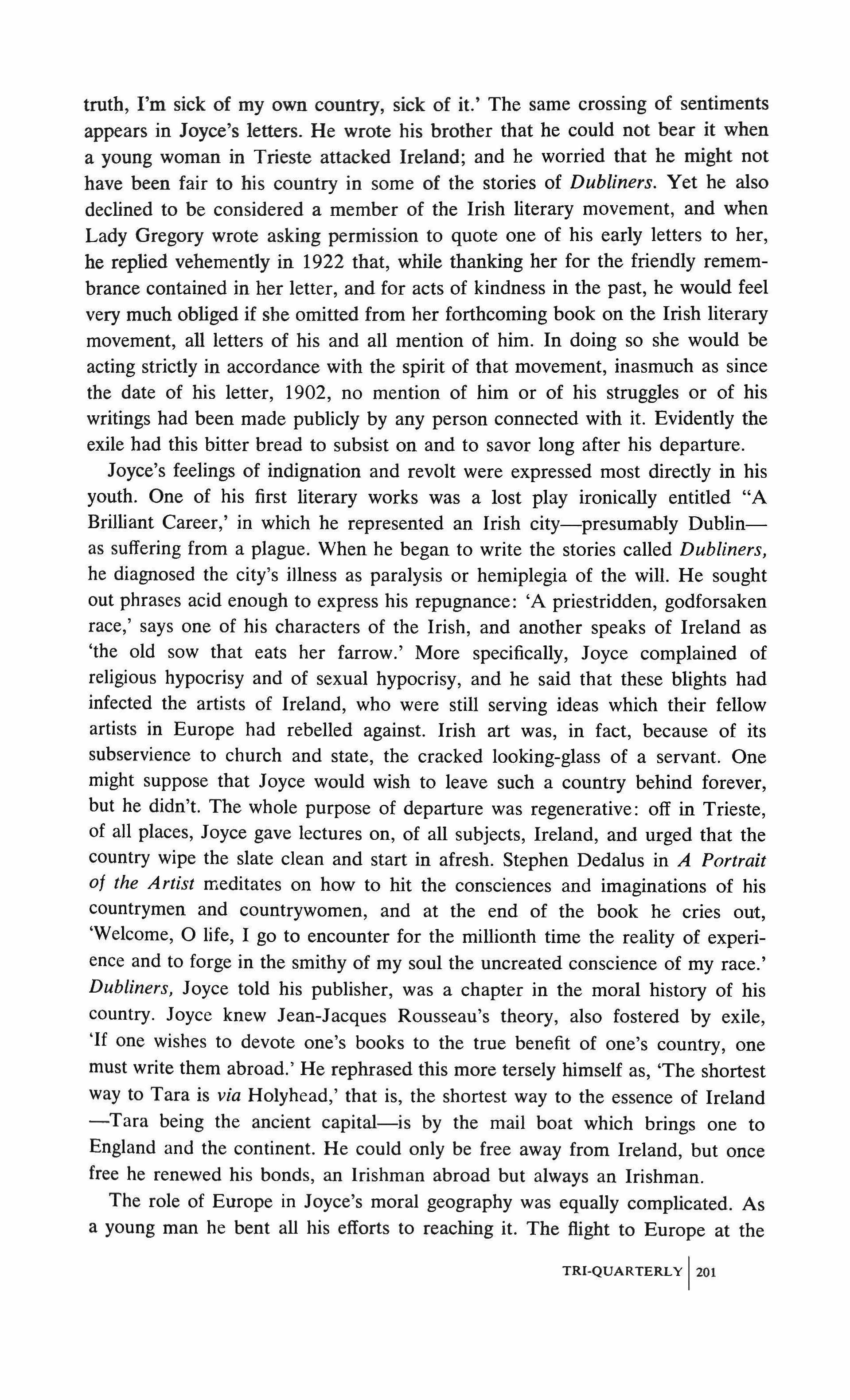
truth, I'm sick of my own country, sick of it.' The same crossing of sentiments appears in Joyce's letters. He wrote his brother that he could not bear it when a young woman in Trieste attacked Ireland; and he worried that he might not have been fair to his country in some of the stories of Dubliners. Yet he also declined to be considered a member of the Irish literary movement, and when Lady Gregory wrote asking permission to quote one of his early letters to her, he replied vehemently in 1922 that, while thanking her for the friendly remembrance contained in her letter, and for acts of kindness in the past, he would feel very much obliged if she omitted from her forthcoming book on the Irish literary movement, all letters of his and all mention of him. In doing so she would be acting strictly in accordance with the spirit of that movement, inasmuch as since the date of his letter, 1902, no mention of him or of his struggles or of his writings had been made publicly by any person connected with it. Evidently the exile had this bitter bread to subsist on and to savor long after his departure. Joyce's feelings of indignation and revolt were expressed most directly in his youth. One of his first literary works was a lost play ironically entitled "A Brilliant Career,' in which he represented an Irish city-presumably Dublinas suffering from a plague. When he began to write the stories called Dubliners, he diagnosed the city's illness as paralysis or hemiplegia of the will. He sought out phrases acid enough to express his repugnance: 'A priestridden, godforsaken race,' says one of his characters of the Irish, and another speaks of Ireland as 'the old sow that eats her farrow.' More specifically, Joyce complained of religious hypocrisy and of sexual hypocrisy, and he said that these blights had infected the artists of Ireland, who were still serving ideas which their fellow artists in Europe had rebelled against. Irish art was, in fact, because of its subservience to church and state, the cracked looking-glass of a servant. One might suppose that Joyce would wish to leave such a country behind forever, but he didn't. The whole purpose of departure was regenerative: off in Trieste, of all places, Joyce gave lectures on, of all subjects, Ireland, and urged that the country wipe the slate clean and start in afresh. Stephen Dedalus in A Portrait of the A rtist meditates on how to hit the consciences and imaginations of his countrymen and countrywomen, and at the end of the book he cries out, 'Welcome, 0 life, I go to encounter for the millionth time the reality of experience and to forge in the smithy of my soul the uncreated conscience of my race.' Dubliners, Joyce told his publisher, was a chapter in the moral history of his country. Joyce knew Jean-Jacques Rousseau's theory, also fostered by exile, 'If one wishes to devote one's books to the true benefit of one's country, one must write them abroad.' He rephrased this more tersely himself as, 'The shortest way to Tara is via Holyhead,' that is, the shortest way to the essence of Ireland -Tara being the ancient capital-is by the mail boat which brings one to England and the continent. He could only be free away from Ireland, but once free he renewed his bonds, an Irishman abroad but always an Irishman. The role of Europe in Joyce's moral geography was equally complicated. As a young man he bent all his efforts to reaching it. The flight to Europe at the
TRI-QUARTERLY 1201

end of A Portrait is a flight to intellectual freedom. Joyce told his biographer Herbert Gorman that Ireland was his spiritual mother and Europe his spiritual father, but filial piety was not Joyce's mode, and in Europe he is never European, always Irish European. If Dublin suffered from paralysis, Joyce speak of the characteristic European disease as europicolas, a pun on eurysipelas. He says of Shem in Finnegans Wake that 'He became a farsoonerite, meaning that he would far sooner muddle through the hash of lentils in Europe than meddle with Irrland's split little pea.' To make Ireland more than an 'afterthought of Europe' was his objective, but the way to accomplish this was not to make Ireland indistinguishable from the rest of Europe. In his story 'The Dead' Joyce mocks a little his own fascination with the continent, by having his hero look faintly ridiculous as he brags of his summer excursions there. And in Exiles the mockery is sharper because it is the villain who says, as he accepts a European cigar from the hero, 'These cigars Europeanize me. If Ireland is to become a new Ireland she must first become European.' While Joyce saw residence in Europe as a necessity for himself, he also thought he might be good for Europe as his fellow-Irishman St Gallen had been good for Switzerland. He was right on both counts. Joyce is Ireland's greatest missionary. A misconception that is only slowly fading is that Joyce's mind closed like an oyster when he left Ireland, and that he spent all his time on the continent reliving his Irish experiences. Handy as it is to summarize the behavior of genius in a phrase, this one will not do. To begin with, it is not even easy to say exactly when Joyce left Ireland. As a boy he made trips to Edinburgh and to London; as a young man he made three attempts to leave for good. The first two failed: he went to Paris at the beginning of December 1902, but got homesick so quickly that in three weeks he was back for the Christmas holidays. Off again a month later, he stayed in Paris this time for nearly three months until his father summoned him home because of his mother's illness. This time Joyce remained in Dublin for a year and a half until he found a girl, Nora Barnacle, courageous enough to elope with him. In some sense she became for him a portable embodiment of his native country, intractably Irish, a symbol more representative than Yeats' beloved Maud Gonne, who was Irish by choice rather than by nature. That Joyce should be joined with her in the grave is appropriate; Ithaca is where Penelope is, and Nora Joyce fulfilled her difficult role to perfection. It is appropriate also that Zurich should have been the city to which they first came on October 11, 1904, and consummated their lifelong marriage at Reitergasse 16 in the Gasthaus Hoffnung, which to Joyce's pleasure had become, when they stayed there again in 1915, the Gasthaus Doblin. This departure with Nora from Dublin proved to be the principal one in Joyce's life, but he returned to Dublin three times more during the next eight years, and so had three further departures. Evidently his mind could not have closed upon itself until long after his principal departure in 1904. But in any case it did not so close. The work he wrote on the continent was different from what he had written in Dublin; as he promised, he let more air into it. A
TRI-QUARTERLY
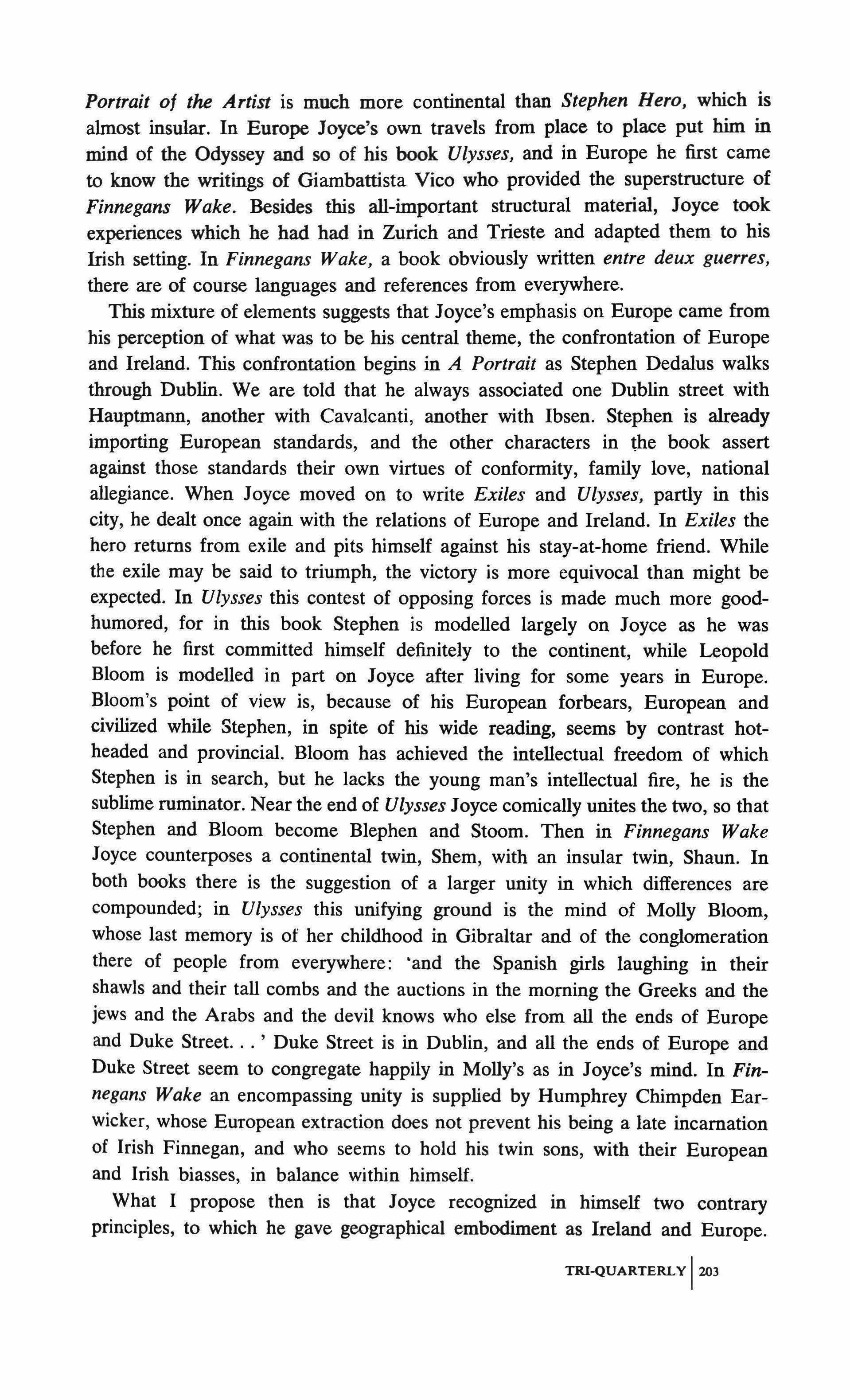
Portrait of the Artist is much more continental than Stephen Hero, which is almost insular. In Europe Joyce's own travels from place to place put him in mind of the Odyssey and so of his book Ulysses, and in Europe he first came to know the writings of Giambattista Vico who provided the superstructure of Finnegans Wake. Besides this all-important structural material, Joyce took experiences which he had had in Zurich and Trieste and adapted them to his Irish setting. In Finnegans Wake, a book obviously written entre deux guerres, there are of course languages and references from everywhere.
This mixture of elements suggests that Joyce's emphasis on Europe came from his perception of what was to be his central theme, the confrontation of Europe and Ireland. This confrontation begins in A Portrait as Stephen Dedalus walks through Dublin. We are told that he always associated one Dublin street with Hauptmann, another with Cavalcanti, another with Ibsen. Stephen is already importing European standards, and the other characters in the book assert against those standards their own virtues of conformity, family love, national allegiance. When Joyce moved on to write Exiles and Ulysses, partly in this city, he dealt once again with the relations of Europe and Ireland. In Exiles the hero returns from exile and pits himself against his stay-at-home friend. While the exile may be said to triumph, the victory is more equivocal than might be expected. In Ulysses this contest of opposing forces is made much more goodhumored, for in this book Stephen is modelled largely on Joyce as he was before he first committed himself definitely to the continent, while Leopold Bloom is modelled in part on Joyce after living for some years in Europe. Bloom's point of view is, because of his European forbears, European and civilized while Stephen, in spite of his wide reading, seems by contrast hotheaded and provincial. Bloom has achieved the intellectual freedom of which Stephen is in search, but he lacks the young man's intellectual fire, he is the sublime ruminator. Near the end of Ulysses Joyce comically unites the two, so that Stephen and Bloom become Blephen and Stoom. Then in Finnegans Wake Joyce counterposes a continental twin, Shem, with an insular twin, Shaun. In both books there is the suggestion of a larger unity in which differences are compounded; in Ulysses this unifying ground is the mind of Molly Bloom, whose last memory is of her childhood in Gibraltar and of the conglomeration there of people from everywhere: 'and the Spanish girls laughing in their shawls and their tall combs and the auctions in the morning the Greeks and the jews and the Arabs and the devil knows who else from all the ends of Europe and Duke Street. Duke Street is in Dublin, and all the ends of Europe and Duke Street seem to congregate happily in Molly's as in Joyce's mind. In Finnegans Wake an encompassing unity is supplied by Humphrey Chimpden Earwicker, whose European extraction does not prevent his being a late incarnation of Irish Finnegan, and who seems to hold his twin sons, with their European and Irish biasses, in balance within himself. What I propose then is that Joyce recognized in himself two contrary principles, to which he gave geographical embodiment as Ireland and Europe.
TRI-QUARTERLY 1203
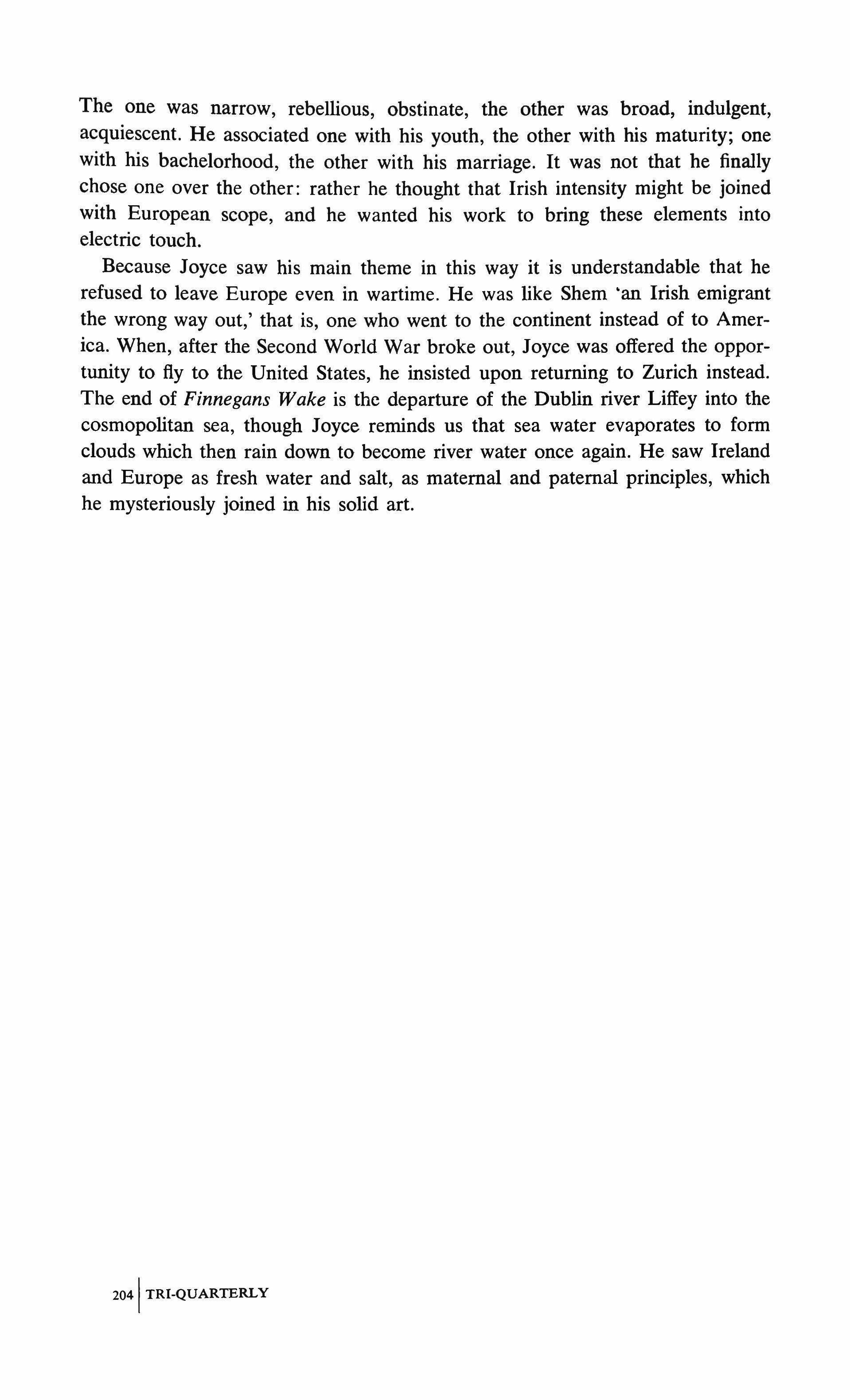
The one was narrow, rebellious, obstinate, the other was broad, indulgent, acquiescent. He associated one with his youth, the other with his maturity; one with his bachelorhood, the other with his marriage. It was not that he finally chose one over the other: rather he thought that Irish intensity might be joined with European scope, and he wanted his work to bring these elements into electric touch.
Because Joyce saw his main theme in this way it is understandable that he refused to leave Europe even in wartime. He was like Shem 'an Irish emigrant the wrong way out,' that is, one who went to the continent instead of to America. When, after the Second World War broke out, Joyce was offered the opportunity to fly to the United States, he insisted upon returning to Zurich instead. The end of Finnegans Wake is the departure of the Dublin river Liffey into the cosmopolitan sea, though Joyce reminds us that sea water evaporates to form clouds which then rain down to become river water once again. He saw Ireland and Europe as fresh water and salt, as maternal and paternal principles, which he mysteriously joined in his solid art.
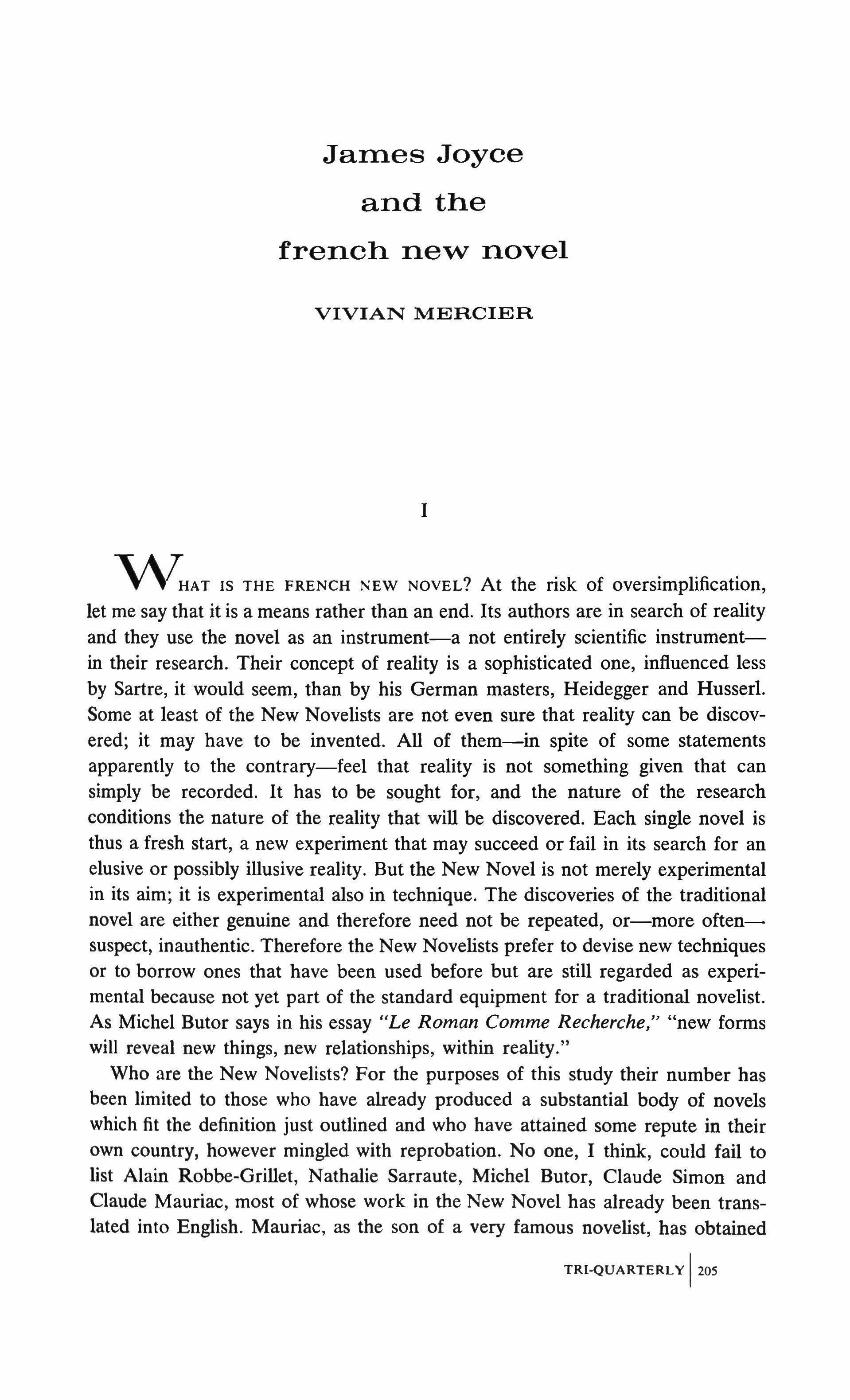
"\;\THAT IS THE FRENCH NEW NOVEL? At the risk of oversimplification, let me say that it is a means rather than an end. Its authors are in search of reality and they use the novel as an instrument-a not entirely scientific instrumentin their research. Their concept of reality is a sophisticated one, influenced less by Sartre, it would seem, than by his German masters, Heidegger and Husserl. Some at least of the New Novelists are not even sure that reality can be discovered; it may have to be invented. All of them-in spite of some statements apparently to the contrary-feel that reality is not something given that can simply be recorded. It has to be sought for, and the nature of the research conditions the nature of the reality that will be discovered. Each single novel is thus a fresh start, a new experiment that may succeed or fail in its search for an elusive or possibly illusive reality. But the New Novel is not merely experimental in its aim; it is experimental also in technique. The discoveries of the traditional novel are either genuine and therefore need not be repeated, or-more oftensuspect, inauthentic. Therefore the New Novelists prefer to devise new techniques or to borrow ones that have been used before but are still regarded as experimental because not yet part of the standard equipment for a traditional novelist. As Michel Butor says in his essay "Le Roman Comme Recherche," "new forms will reveal new things, new relationships, within reality."
Who are the New Novelists? For the purposes of this study their number has been limited to those who have already produced a substantial body of novels which fit the definition just outlined and who have attained some repute in their own country, however mingled with reprobation. No one, I think, could fail to list Alain Robbe-Grillet, Nathalie Sarraute, Michel Butor, Claude Simon and Claude Mauriac, most of whose work in the New Novel has already been translated into English. Mauriac, as the son of a very famous novelist, has obtained
TRI-QUARTERLY 1205
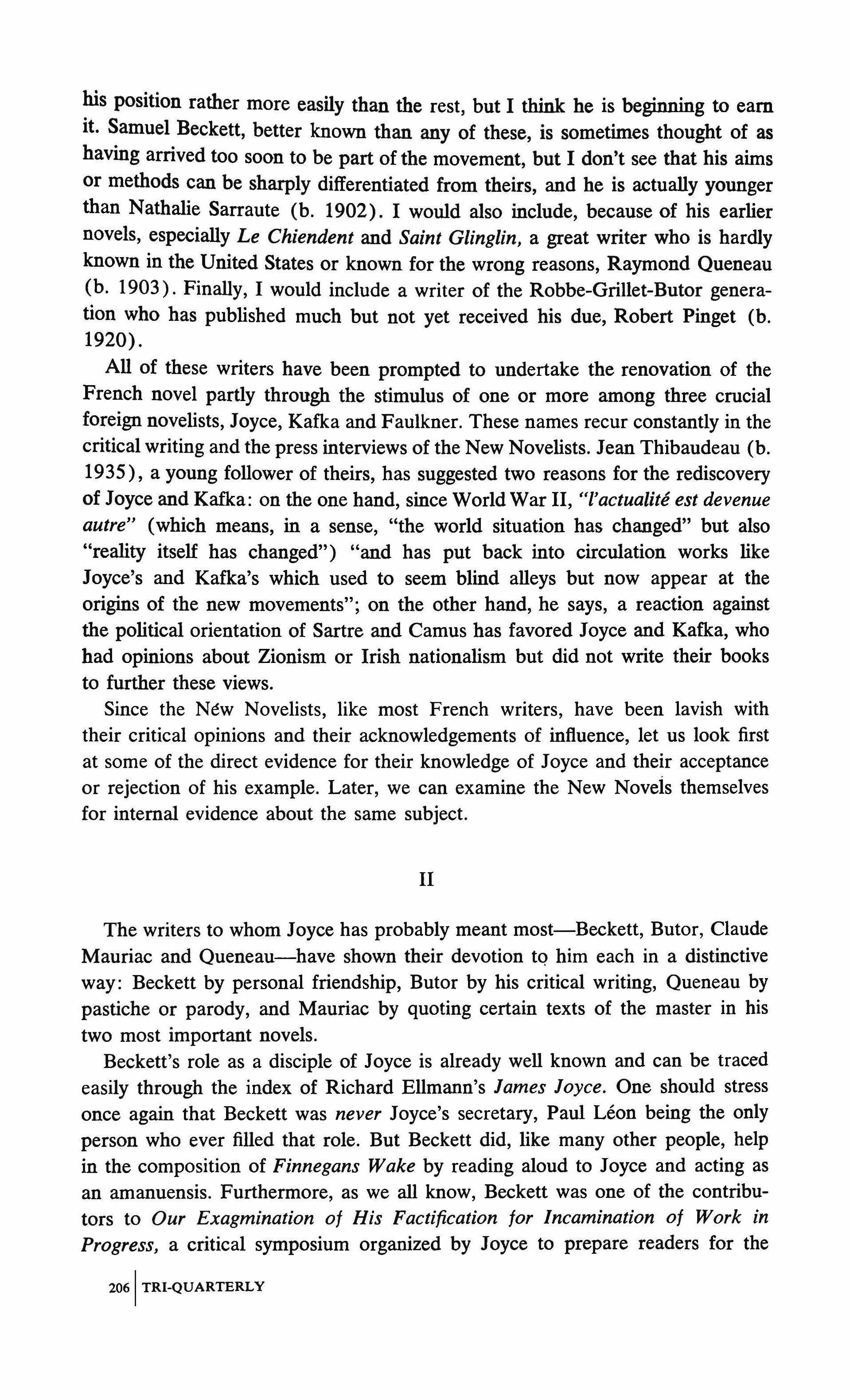
his position rather more easily than the rest, but I think he is beginning to earn it. Samuel Beckett, better known than any of these, is sometimes thought of as having arrived too soon to be part of the movement, but I don't see that his aims or methods can be sharply differentiated from theirs, and he is actually younger than Nathalie Sarraute (b. 1902). I would also include, because of his earlier novels, especially Le Chiendent and Saint Glinglin, a great writer who is hardly known in the United States or known for the wrong reasons, Raymond Queneau (b. 1903). Finally, I would include a writer of the Robbe-Grillet-Butor generation who has published much but not yet received his due, Robert Pinget (b. 1920).
All of these writers have been prompted to undertake the renovation of the French novel partly through the stimulus of one or more among three crucial foreign novelists, Joyce, Kafka and Faulkner. These names recur constantly in the critical writing and the press interviews of the New Novelists. Jean Thibaudeau (b. 1935), a young follower of theirs, has suggested two reasons for the rediscovery of Joyce and Kafka: on the one hand, since World War II, "l'actualite est devenue autre" (which means, in a sense, "the world situation has changed" but also "reality itself has changed") "and has put back into circulation works like Joyce's and Kafka's which used to seem blind alleys but now appear at the origins of the new movements"; on the other hand, he says, a reaction against the political orientation of Sartre and Camus has favored Joyce and Kafka, who had opinions about Zionism or Irish nationalism but did not write their books to further these views.
Since the New Novelists, like most French writers, have been lavish with their critical opinions and their acknowledgements of influence, let us look first at some of the direct evidence for their knowledge of Joyce and their acceptance or rejection of his example. Later, we can examine the New Noveis themselves for internal evidence about the same subject.
The writers to whom Joyce has probably meant most-Beckett, Butor, Claude Mauriac and Queneau-have shown their devotion to him each in a distinctive way: Beckett by personal friendship, Butor by his critical writing, Queneau by pastiche or parody, and Mauriac by quoting certain texts of the master in his two most important novels.
Beckett's role as a disciple of Joyce is already well known and can be traced easily through the index of Richard Ellmann's James Joyce. One should stress once again that Beckett was never Joyce's secretary, Paul Leon being the only person who ever filled that role. But Beckett did, like many other people, help in the composition of Finnegans Wake by reading aloud to Joyce and acting as an amanuensis. Furthermore, as we all know, Beckett was one of the contributors to Our Exagmination of His Factification for lncamination of Work in Progress, a critical symposium organized by Joyce to prepare readers for the
TRI-QUARTERLY
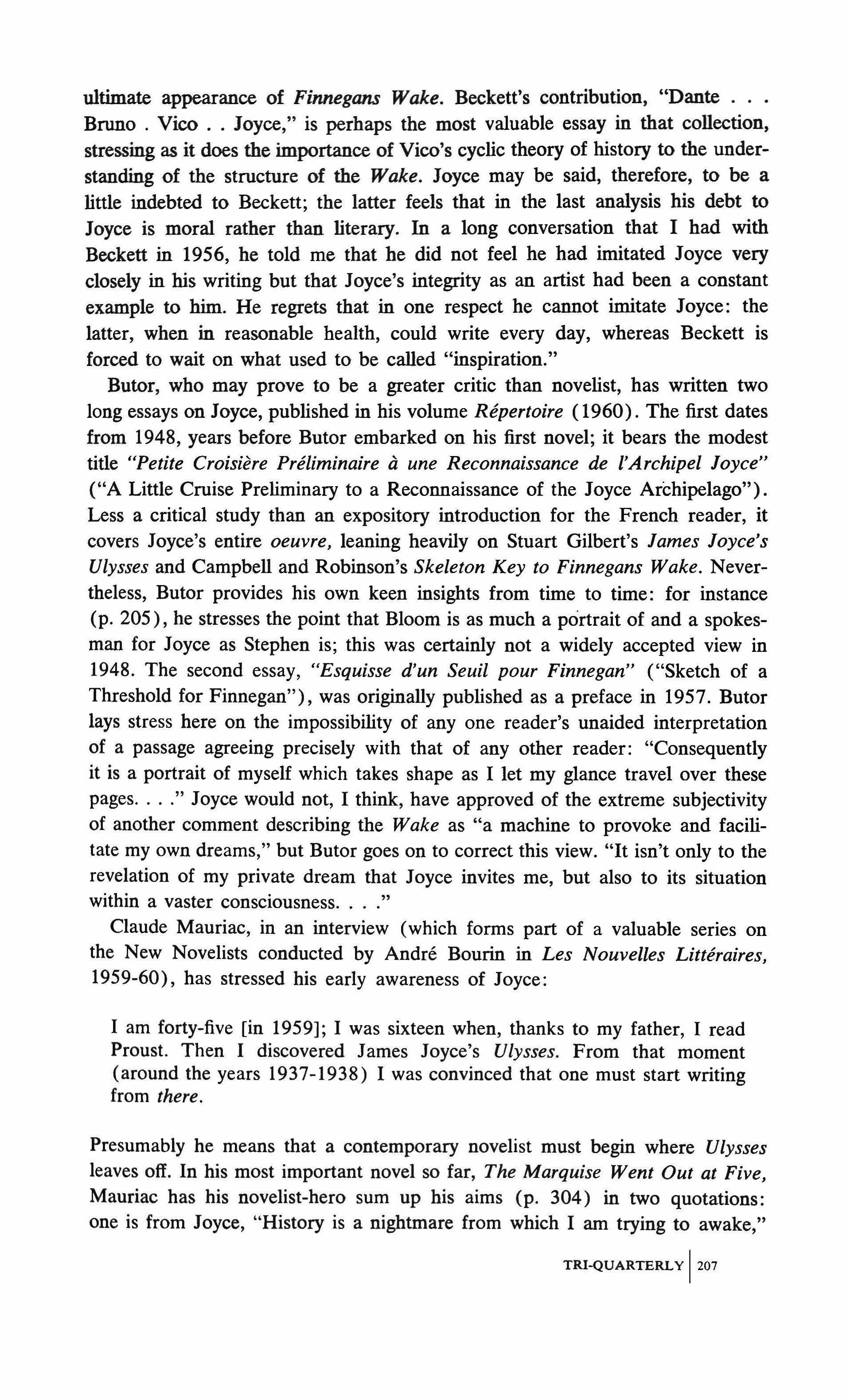
ultimate appearance of Finnegans Wake. Beckett's contribution, "Dante Bruno. Vico Joyce," is perhaps the most valuable essay in that collection, stressing as it does the importance of Vico's cyclic theory of history to the understanding of the structure of the Wake. Joyce may be said, therefore, to be a little indebted to Beckett; the latter feels that in the last analysis his debt to Joyce is moral rather than literary. In a long conversation that I had with Beckett in 1956, he told me that he did not feel he had imitated Joyce very closely in his writing but that Joyce's integrity as an artist had been a constant example to him. He regrets that in one respect he cannot imitate Joyce: the latter, when in reasonable health, could write every day, whereas Beckett is forced to wait on what used to be called "inspiration."
Butor, who may prove to be a greater critic than novelist, has written two long essays on Joyce, published in his volume Repertoire (1960). The first dates from 1948, years before Butor embarked on his first novel; it bears the modest title "Petite Croisiere Preliminaire a une Reconnaissance de l'Archipel Joyce" ("A Little Cruise Preliminary to a Reconnaissance of the Joyce Archipelago"). Less a critical study than an expository introduction for the French reader, it covers Joyce's entire oeuvre, leaning heavily on Stuart Gilbert's James Joyce's Ulysses and Campbell and Robinson's Skeleton Key to Finnegans Wake. Nevertheless, Butor provides his own keen insights from time to time: for instance (p. 205), he stresses the point that Bloom is as much a portrait of and a spokesman for Joyce as Stephen is; this was certainly not a widely accepted view in 1948. The second essay, "Esquisse d'un Seuil pour Finnegan" ("Sketch of a Threshold for Finnegan"), was originally published as a preface in 1957. Butor lays stress here on the impossibility of anyone reader's unaided interpretation of a passage agreeing precisely with that of any other reader: "Consequently it is a portrait of myself which takes shape as I let my glance travel over these pages. ." Joyce would not, I think, have approved of the extreme subjectivity of another comment describing the Wake as "a machine to provoke and facilitate my own dreams," but Butor goes on to correct this view. "It isn't only to the revelation of my private dream that Joyce invites me, but also to its situation within a vaster consciousness
Claude Mauriac, in an interview (which forms part of a valuable series on the New Novelists conducted by Andre Bourin in Les Nouvelles Litteraires, 1959-60), has stressed his early awareness of Joyce:
I am forty-five [in 1959]; I was sixteen when, thanks to my father, I read Proust. Then I discovered James Joyce's Ulysses. From that moment (around the years 1937-1938) I was convinced that one must start writing from there.
Presumably he means that a contemporary novelist must begin where Ulysses leaves off. In his most important novel so far, The Marquise Went Out at Five, Mauriac has his novelist-hero sum up his aims (p. 304) in two quotations: one is from Joyce, "History is a nightmare from which I am trying to awake,"
TRI-QUARTERLy 1207

and the other from Paul Klee, "The temporal element must be eliminated: yesterday and today taken as simultaneity." These quotations are anticipatorily referred to elsewhere in the book, for instance on pages 117 and 248 of the American edition. A somewhat different use of a quotation from Ulysses will be found in L'Agrandissement, Mauriac's latest novel: on page 61 it is given in French translation, and on page 107 in the original English: "Harsh gargoyle face that warred against me over our mess of hash of lights in rue Saint-Andredes-Arts. In words of words for words, palabras." This recall of Joyce's recollection of Synge is doubtless quoted chiefly because of its reference to one of the streets that intersect at the Carreiour de Buci, which forms the locale of both Mauriac novels. (I had better explain that L'Agrandissement, though written after The Marquise, deals with the genesis in Bertrand Carnejoux's mind of a novel very similar to The Marquise, which he plans to name The Barricades of Paris. Mauriac, speaking in his own person at the end of L'Agrandissement, tells us, "This book is the story of a gentleman who is wondering how he will write a novel that I have already written.")
As for Raymond Oueneau, anyone who consults the index to his volume of essays, Batons, ChifJres et Lettres (1950), can quickly find two formal acknowledgments of Joyce's influence. In an essay on the technique of the novel, he speaks of "my debt to the English and American novelists who taught me that a technique of the novel existed, and very specially to Joyce." In a radio interview, he tells how he planned his first novel, Le Chiendent, "under the influence of Joyce and of Faulkner (who had not yet been translated) Most interesting of all, however, is "Une Traduction en Ioycien" ("A Translation into Joycese"). This is prefaced by the following remarks:
To understand properly, nothing is better than practice. In order to [airchteer Finnegans Wake, I tried a few years ago to apply the Joycean method to a text chosen at random.
tFairchteer is a French word coined by Oueneau from the German verstehen, "to understand.") Actually the text used by Oueneau is not chosen at random but forms the opening paragraphs of his second novel, Gueule de Pierre (1934). Queneau retained some of the Joycisms when he revised the passage for inclusion in Saint Glinglin (1948), the definitive version and completion of Gueule de Pierre.
This is not in fact the most ingenious or the most humorous of Oueneau's tributes to Joyce. In 1947, under the pseudonym of "Sally Mara," Oueneau published a blackly humorous, semi-pornographic novel entitled On Est Toujours Trop Bon avec les Femmes ("One Is Always Too Kind to Women"). It deals with a supposed episode of the 1916 Easter Rising in Dublin; several of the Irish revolutionaries-Mat Dillon, Cissy Caffrey, Larry O'Rourke, and Corny Kelleher-bear names borrowed from Ulysses, and the password of all the rebels is "Finnegans wake!" At one point the eagerly violated heroine, Gertie Girdle, modeled on James Hadley Chase's Miss Blandish, proclaims
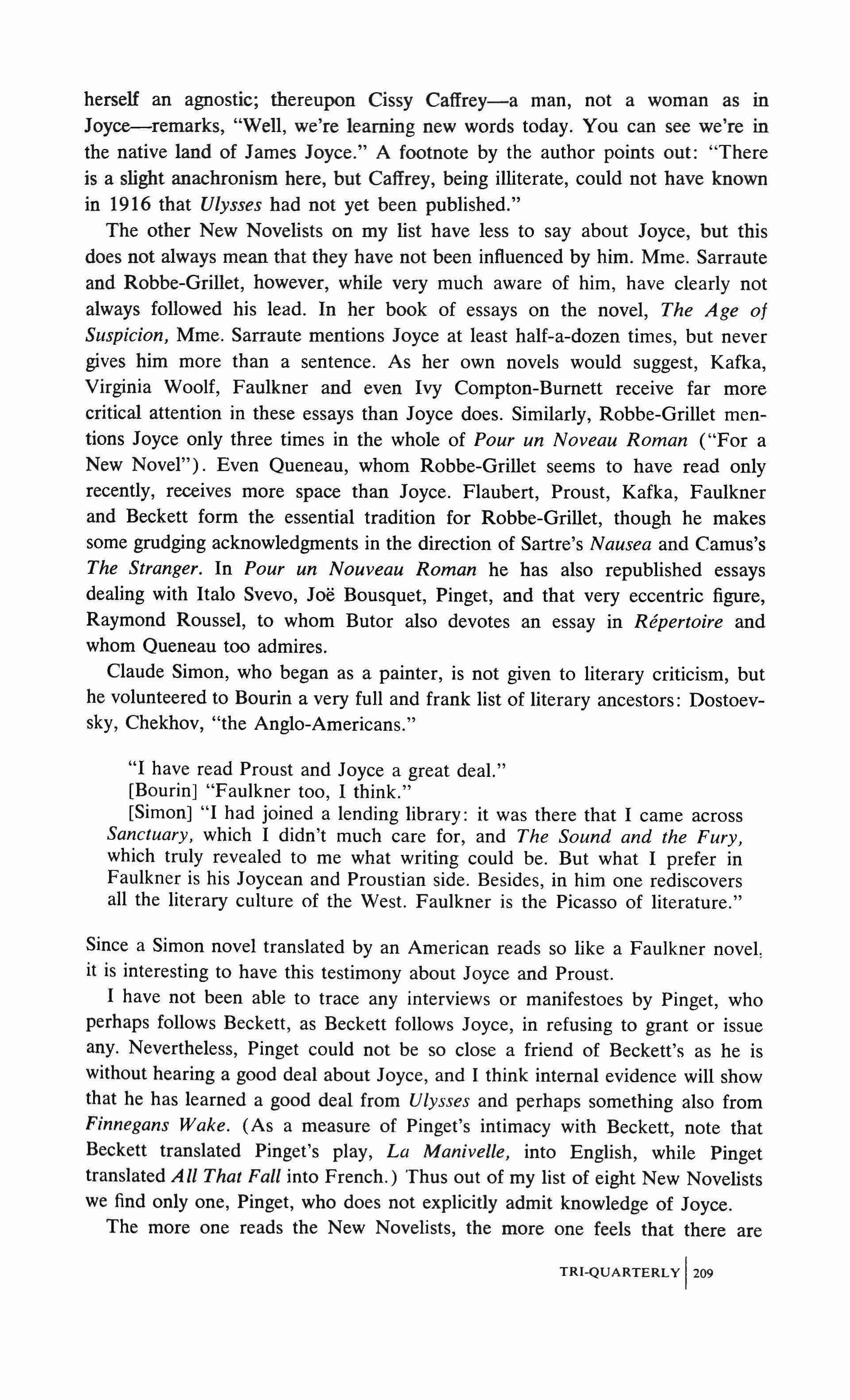
herself an agnostic; thereupon Cissy Caffrey-a man, not a woman as in Joyce-remarks, "Well, we're learning new words today. You can see we're in the native land of James Joyce." A footnote by the author points out: "There is a slight anachronism here, but Caffrey, being illiterate, could not have known in 1916 that Ulysses had not yet been published."
The other New Novelists on my list have less to say about Joyce, but this does not always mean that they have not been influenced by him. Mme. Sarraute and Robbe-Grillet, however, while very much aware of him, have clearly not always followed his lead. In her book of essays on the novel, The Age of Suspicion, Mme. Sarraute mentions Joyce at least half-a-dozen times, but never gives him more than a sentence. As her own novels would suggest, Kafka, Virginia Woolf, Faulkner and even Ivy Compton-Burnett receive far more critical attention in these essays than Joyce does. Similarly, Robbe-Grillet mentions Joyce only three times in the whole of Pour un Noveau Roman ("For a New Novel"). Even Queneau, whom Robbe-Grillet seems to have read only recently, receives more space than Joyce. Flaubert, Proust, Kafka, Faulkner and Beckett form the essential tradition for Robbe-Grillet, though he makes some grudging acknowledgments in the direction of Sartre's Nausea and Camus's The Stranger. In Pour un Nouveau Roman he has also republished essays dealing with Italo Svevo, Joe Bousquet, Pinget, and that very eccentric figure, Raymond Roussel, to whom Butor also devotes an essay in Repertoire and whom Queneau too admires.
Claude Simon, who began as a painter, is not given to literary criticism, but he volunteered to Bourin a very full and frank list of literary ancestors: Dostoevsky, Chekhov, "the Anglo-Americans."
"I have read Proust and Joyce a great deal."
[Bourin] "Faulkner too, I think." [Simon] "I had joined a lending library: it was there that I came across Sanctuary, which I didn't much care for, and The Sound and the Fury, which truly revealed to me what writing could be. But what I prefer in Faulkner is his Joycean and Proustian side. Besides, in him one rediscovers all the literary culture of the West. Faulkner is the Picasso of literature."
Since a Simon novel translated by an American reads so like a Faulkner novel, it is interesting to have this testimony about Joyce and Proust.
I have not been able to trace any interviews or manifestoes by Pinget, who perhaps follows Beckett, as Beckett follows Joyce, in refusing to grant or issue any. Nevertheless, Pinget could not be so close a friend of Beckett's as he is without hearing a good deal about Joyce, and I think internal evidence will show that he has learned a good deal from Ulysses and perhaps something also from Finnegans Wake. (As a measure of Pingel's intimacy with Beckett, note that Beckett translated Pinget's play, La Manivelle, into English, while Pinget translated A 11 That Fall into French.) Thus out of my list of eight New Novelists we find only one, Pinget, who does not explicitly admit knowledge of Joyce. The more one reads the New Novelists, the more one feels that there are TRI-QUARTERLY 1209
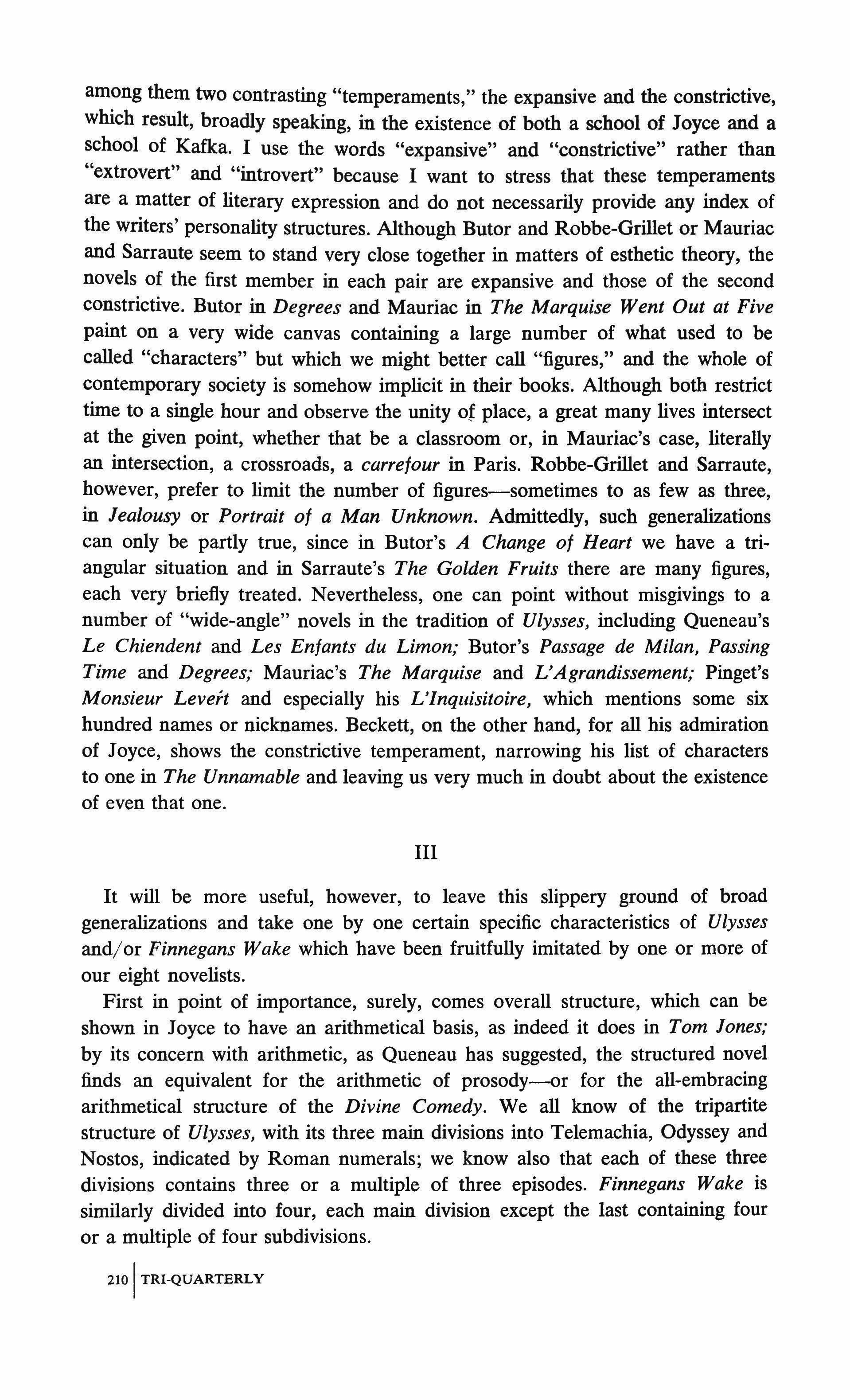
among them two contrasting "temperaments," the expansive and the constrictive, which result, broadly speaking, in the existence of both a school of Joyce and a school of Kafka. I use the words "expansive" and "constrictive" rather than "extrovert" and "introvert" because I want to stress that these temperaments are a matter of literary expression and do not necessarily provide any index of the writers' personality structures. Although Butor and Robbe-Grillet or Mauriac and Sarraute seem to stand very close together in matters of esthetic theory, the novels of the first member in each pair are expansive and those of the second constrictive. Butor in Degrees and Mauriac in The Marquise Went Out at Five paint on a very wide canvas containing a large number of what used to be called "characters" but which we might better call "figures," and the whole of contemporary society is somehow implicit in their books. Although both restrict time to a single hour and observe the unity of place, a great many lives intersect at the given point, whether that be a classroom or, in Mauriac's case, literally an intersection, a crossroads, a carreiour in Paris. Robbe-Grillet and Sarraute, however, prefer to limit the number of figures-sometimes to as few as three, in Jealousy or Portrait 0/ a Man Unknown. Admittedly, such generalizations can only be partly true, since in Butor's A Change 0/ Heart we have a triangular situation and in Sarraute's The Golden Fruits there are many figures, each very briefly treated. Nevertheless, one can point without misgivings to a number of "wide-angle" novels in the tradition of Ulysses, including Queneau's Le Chiendent and Les En/ants du Limon; Butor's Passage de Milan, Passing Time and Degrees; Mauriac's The Marquise and L'Agrandissement; Pinget's Monsieur Levert and especially his L'Inquisitoire, which mentions some six hundred names or nicknames. Beckett, on the other hand, for all his admiration of Joyce, shows the constrictive temperament, narrowing his list of characters to one in The Unnamable and leaving us very much in doubt about the existence of even that one.
It will be more useful, however, to leave this slippery ground of broad generalizations and take one by one certain specific characteristics of Ulysses and/or Finnegans Wake which have been fruitfully imitated by one or more of our eight novelists.
First in point of importance, surely, comes overall structure, which can be shown in Joyce to have an arithmetical basis, as indeed it does in Tom Jones; by its concern with arithmetic, as Queneau has suggested, the structured novel finds an equivalent for the arithmetic of prosody--or for the all-embracing arithmetical structure of the Divine Comedy. We all know of the tripartite structure of Ulysses, with its three main divisions into Telemachia, Odyssey and Nostos, indicated by Roman numerals; we know also that each of these three divisions contains three or a multiple of three episodes. Finnegans Wake is similarly divided into four, each main division except the last containing four or a multiple of four subdivisions. 210 I TRI-QUARTERLY
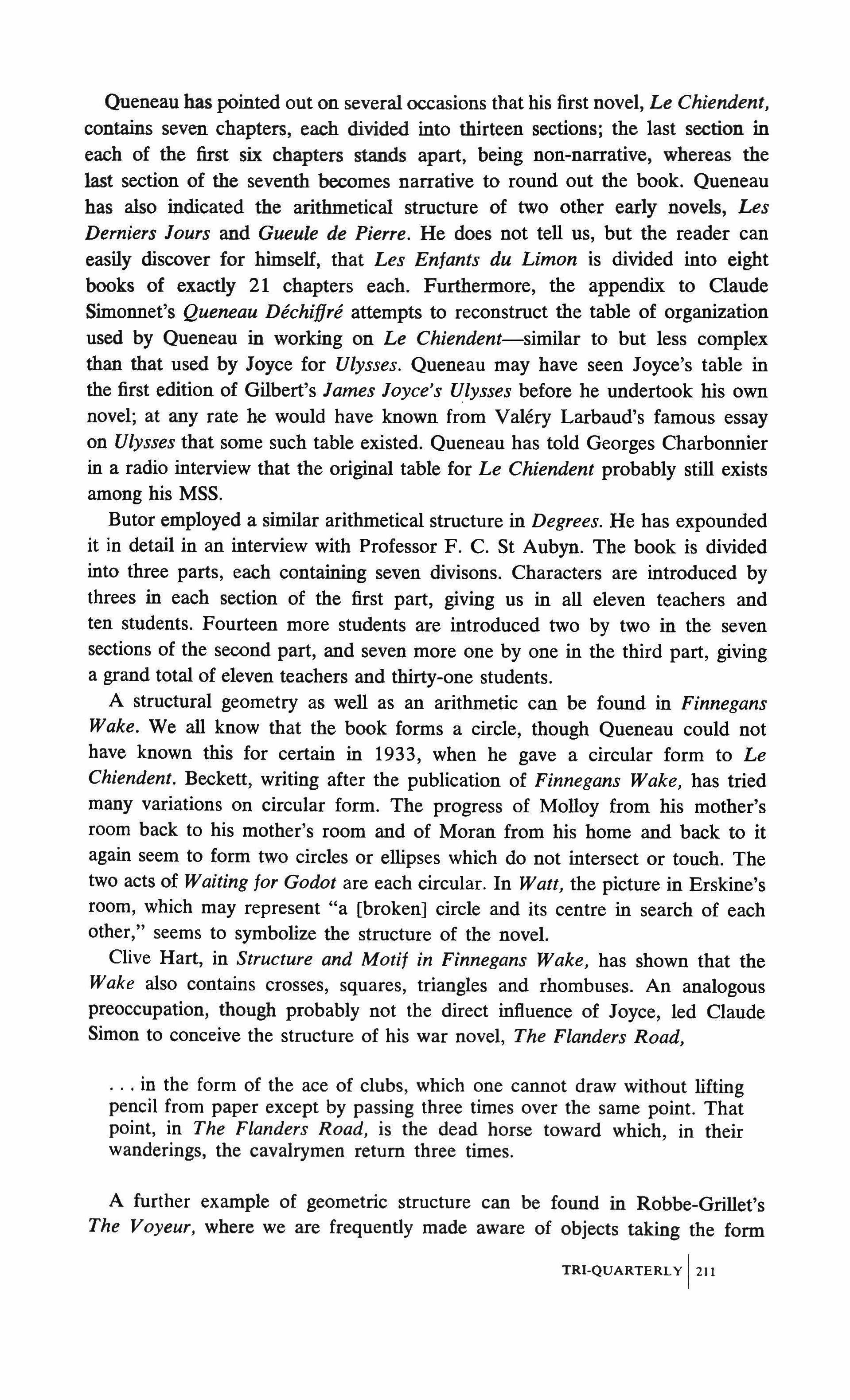
Queneau has pointed out on several occasions that his first novel, Le Chiendent, contains seven chapters, each divided into thirteen sections; the last section in each of the first six chapters stands apart, being non-narrative, whereas the last section of the seventh becomes narrative to round out the book. Queneau has also indicated the arithmetical structure of two other early novels, Les Demiers lours and Gueule de Pierre. He does not tell us, but the reader can easily discover for himself, that Les Eniants du Limon is divided into eight books of exactly 21 chapters each. Furthermore, the appendix to Claude Simonnet's Queneau DechitJre attempts to reconstruct the table of organization used by Queneau in working on Le Chiendent-similar to but less complex than that used by Joyce for Ulysses. Queneau may have seen Joyce's table in the first edition of Gilbert's lames loyce's Ulysses before he undertook his own novel; at any rate he would have known from Valery Larbaud's famous essay on Ulysses that some such table existed. Queneau has told Georges Charbonnier in a radio interview that the original table for Le Chiendent probably still exists among his MSS.
Butor employed a similar arithmetical structure in Degrees. He has expounded it in detail in an interview with Professor F. C. St Aubyn. The book is divided into three parts, each containing seven divisons. Characters are introduced by threes in each section of the first part, giving us in all eleven teachers and ten students. Fourteen more students are introduced two by two in the seven sections of the second part, and seven more one by one in the third part, giving a grand total of eleven teachers and thirty-one students.
A structural geometry as well as an arithmetic can be found in Finnegans Wake. We all know that the book forms a circle, though Queneau could not have known this for certain in 1933, when he gave a circular form to Le Chiendent. Beckett, writing after the publication of Finnegans Wake, has tried many variations on circular form. The progress of Molloy from his mother's room back to his mother's room and of Moran from his home and back to it again seem to form two circles or ellipses which do not intersect or touch. The two acts of Waiting for Godot are each circular. In Watt, the picture in Erskine's room, which may represent "a [broken] circle and its centre in search of each other," seems to symbolize the structure of the novel.
Clive Hart, in Structure and Motif in Finnegans Wake, has shown that the Wake also contains crosses, squares, triangles and rhombuses. An analogous preoccupation, though probably not the direct influence of Joyce, led Claude Simon to conceive the structure of his war novel, The Flanders Road,
in the form of the ace of clubs, which one cannot draw without lifting pencil from paper except by passing three times over the same point. That point, in The Flanders Road, is the dead horse toward which, in their wanderings, the cavalrymen return three times.
A further example of geometric structure can be found in Robbe-Grillet's The Voyeur, where we are frequently made aware of objects taking the form TRI-QUARTERLY 1211
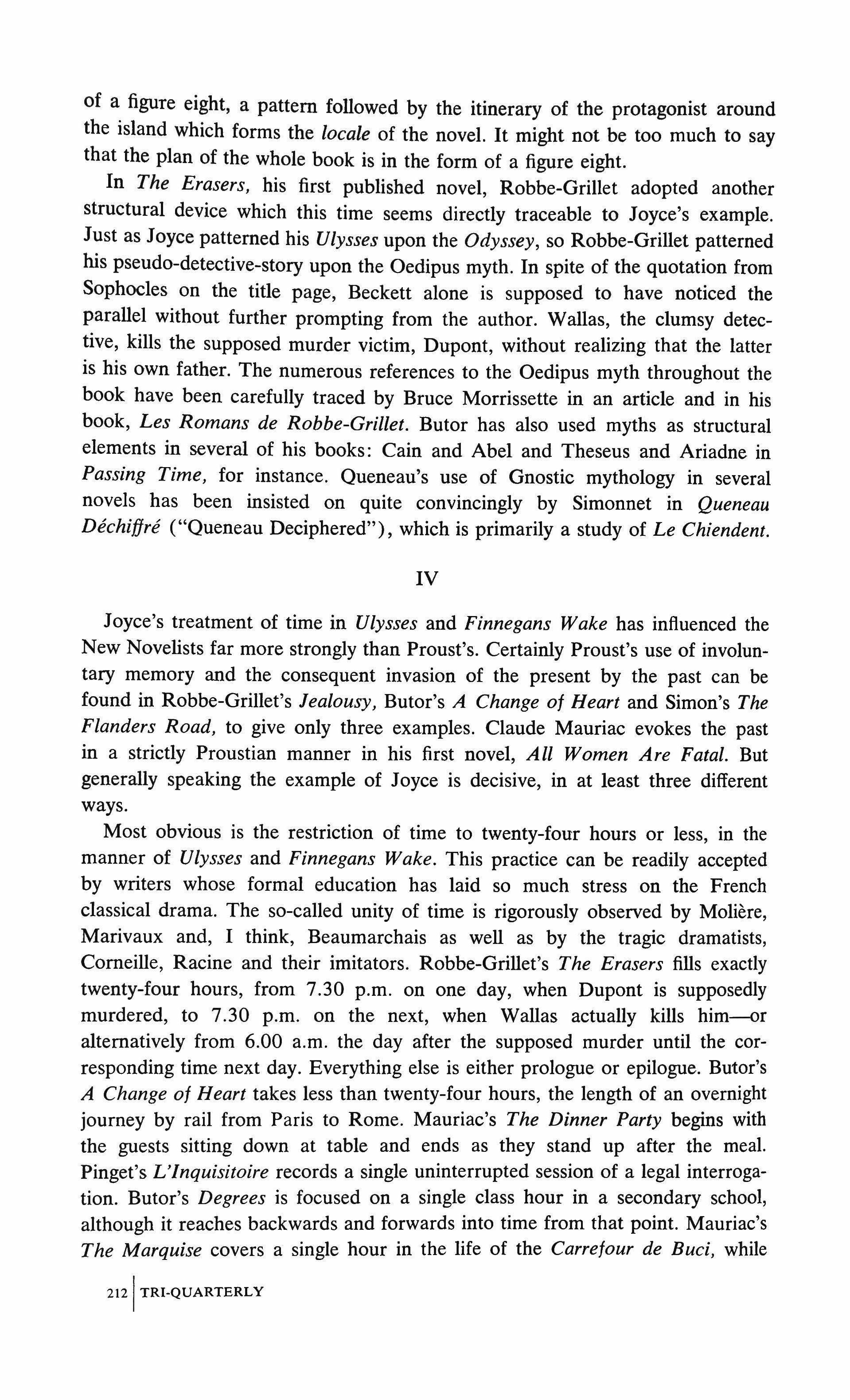
of a figure eight, a pattern followed by the itinerary of the protagonist around the island which forms the locale of the novel. It might not be too much to say that the plan of the whole book is in the form of a figure eight.
In The Erasers, his first published novel, Robbe-Grillet adopted another structural device which this time seems directly traceable to Joyce's example. Just as Joyce patterned his Ulysses upon the Odyssey, so Robbe-Grillet patterned his pseudo-detective-story upon the Oedipus myth. In spite of the quotation from Sophocles on the title page, Beckett alone is supposed to have noticed the parallel without further prompting from the author. Wallas, the clumsy detective, kills the supposed murder victim, Dupont, without realizing that the latter is his own father. The numerous references to the Oedipus myth throughout the book have been carefully traced by Bruce Morrissette in an article and in his book, Les Romans de Robbe-Grillet. Butor has also used myths as structural elements in several of his books: Cain and Abel and Theseus and Ariadne in Passing Time, for instance. Queneau's use of Gnostic mythology in several novels has been insisted on quite convincingly by Simonnet in Queneau Dechiffre ("Queneau Deciphered"), which is primarily a study of Le Chiendent.
Joyce's treatment of time in Ulysses and Finnegans Wake has influenced the New Novelists far more strongly than Proust's. Certainly Proust's use of involuntary memory and the consequent invasion of the present by the past can be found in Robbe-Grillet's Jealousy, Butor's A Change 0/ Heart and Simon's The Flanders Road, to give only three examples. Claude Mauriac evokes the past in a strictly Proustian manner in his first novel, All Women Are Fatal. But generally speaking the example of Joyce is decisive, in at least three different ways.
Most obvious is the restriction of time to twenty-four hours or less, in the manner of Ulysses and Finnegans Wake. This practice can be readily accepted by writers whose formal education has laid so much stress on the French classical drama. The so-called unity of time is rigorously observed by Moliere, Marivaux and, I think, Beaumarchais as well as by the tragic dramatists, Corneille, Racine and their imitators. Robbe-Grillet's The Erasers fills exactly twenty-four hours, from 7.30 p.m. on one day, when Dupont is supposedly murdered, to 7.30 p.m. on the next, when Wallas actually kills him--or alternatively from 6.00 a.m. the day after the supposed murder until the corresponding time next day. Everything else is either prologue or epilogue. Butor's A Change 0/ Heart takes less than twenty-four hours, the length of an overnight journey by rail from Paris to Rome. Mauriac's The Dinner Party begins with the guests sitting down at table and ends as they stand up after the meal. Pinget's L'Inquisitoire records a single uninterrupted session of a legal interrogation. Butor's Degrees is focused on a single class hour in a secondary school, although it reaches backwards and forwards into time from that point. Mauriac's The Marquise covers a single hour in the life of the Carrejour de Buci, while

L'Agrandissement ("The Enlargement") deals with just two minutes of that same hour.
Simultaneity is another aspect of time by which Joyce was greatly fascinated. One remembers the cloud that casts a chill over both Stephen and Bloom, who are separated by many miles of Dublin and many pages of Ulysses, or Stephen's being caught sight of from the mourners' coach as he is leaving Sandymount Strand, many pages after his seaside soliloquy is over. Above all, one remembers the "Wandering Rocks" episode, in which the doings of people all over Dublin are coordinated in relation to time. This was a side of Joyce that Virginia Woolf imitated meticulously in Mrs. Dalloway. Pinget does the same sort of thing in Monsieur Levert and Clope au Dossier; incidentally, the latter novel seems to be restricted to twenty-four hours also. Claude Mauriac almost inevitably stresses simultaneity in The Marquise and its sequel.
But there is another kind of simultaneity, as Finnegans Wake reminds us. At every moment of that book, past, present and future are simultaneously "present" or at any rate implicit. Proust's Marcel, in his moments of involuntary memory, sees the present as invaded and occupied by the past, but he can still distinguish which is which; it is not so with the dreamer or the reader of Finnegans Wake. Nor is it so with the reader of Robbe-Grillet's Jealousy or the viewer of Last Year at Marienbad. In the most original and disturbing of all his essays, "Temps et Description dans Ie Recit d'Aujourd'hui" ("Time and Description in the Narrative of Today"), Robbe-Grillet makes the following comments about the works just mentioned:
The universe in which the whole film [Marienbad] unreels, is, in characteristic fashion, that of a perpetual present which renders all recourse to memory impossible. It is a world without a past This man, this woman begin to exist only when they appear on the screen for the first time Their existence lasts only as long as the film does during the entire projection of the film we were last year and we were at Marienbad Similarly, it was absurd to believe that in the novel Jealousy there existed an order of events, clear and unequivocal, which was not the order of the sentences in the book, as though I had amused myself by jumbling a pre-established calendar, as one shuffles a deck of cards. On the contrary, the narrative was constructed in such a fashion that any attempt to reconstitute an exterior chronology would sooner or later come up against a series of contradictions, a dead end therefore.
It is difficult to give the essence of this closely argued essay in a few quotations, but two more brief ones may help to sum it up:" in the modem narrative, one might say that time is cut off from its temporality. It no longer flows"; and again, if temporality fulfills anticipation, instantaneity disappoints it I would agree that what Robbe-Grillet does, or at any rate intends to do, in these works is not identical with Joyce's achievement or intention in Finnegans Wake, but it seems to me that in their treatment of time both writers have more in common with each other than they have with Proust. The title of the latter's
TRI-QUARTERLY 1213
great novel, A la Recherche du Temps Perdu ("In Search of Lost Time," literally), implies that there was a past, which simply has to be rediscovered (as in the volume entitled Le Temps Retrouvey, not invented or reinvented. Claude Mauriac, too, in L'Agrandissement, makes Bertrand Carnejoux express, in capital letters, his ultimate ideal for the novel as "THE IMMOBILIZATION OF TIME, MY DEAR FELLOW, NEITHER MORE NOR LESS: THE IMMOBILIZATION OF TIME."
In discussing the circle among the spatial forms employed as structural elements, I purposely omitted any consideration of the cyclical treatment of time. Everybody knows that Finnegans Wake ends in mid-sentence and that the reader must turn back to the beginning of the book to find the end of that sentence; in other words, he cannot finish the book without beginning it again. Similarly, the last two sentences of Oueneau's Le Chiendent are identical with the first two. But to return to the beginning in this way is also to have gotten nowhere, so that time in a sense has been annihilated. Saturnin, one of Queneau's characters, tells Mme. Cloche, another character, that if she doesn't like what she has done in the book so far, she need only start over again. When she has grasped this idea, she comments incredulously, 'Then time is nothing at all? No more history?" The only answer she gets is, "What the hell does that matter?" Rather similarly, in Robbe-Grillet's The Erasers, the twenty-four hours between the firing of the two shots, which form a sort of cycle, are symbolized as being outside of time by the fact that Wallas's watch, having stopped at 7.30 p.m., the time of the first shot, starts working again when the second shot is fired. Cyclical form is a method of calling in question and annihilating both time and content. Queneau quotes as the epigraph of his humorous novel, Zazie dans le Metro, which itself has an almost circular form, a fragment attributed to Aristotle: ho plasas ephanisen ("He who created it destroyed it.") This sentence could serve as the epigraph to many a New Novel. One remembers that the rather slipshod volume of criticism which Claude Mauriac devoted to The New Literature (New York, 1959) is entitled in the original French L'Alitterature Contemporaine ("Contemporary Aliterature" or "Contemporary Non-Literature")

Having begun with overall structure and temporal orientation, I should logically continue by dealing with narrative techniques before focusing on the smaller structural units and ultimately on the smallest-individual words. Everything implicit in the technical use of the term "point of view" would seem to require discussion in a review of the relationship between Joyce and the New Novelists. Unfortunately, a full treatment of this subject would require a whole article. The New Novelists are by definition self-conscious in matters of technique. They know about Henry James as well as James Joyce. RobbeGrillet's Jealousy is an extraordinary tour de force in the use of point of view. Everything is seen through the eyes of the jealous husband, though he cannot
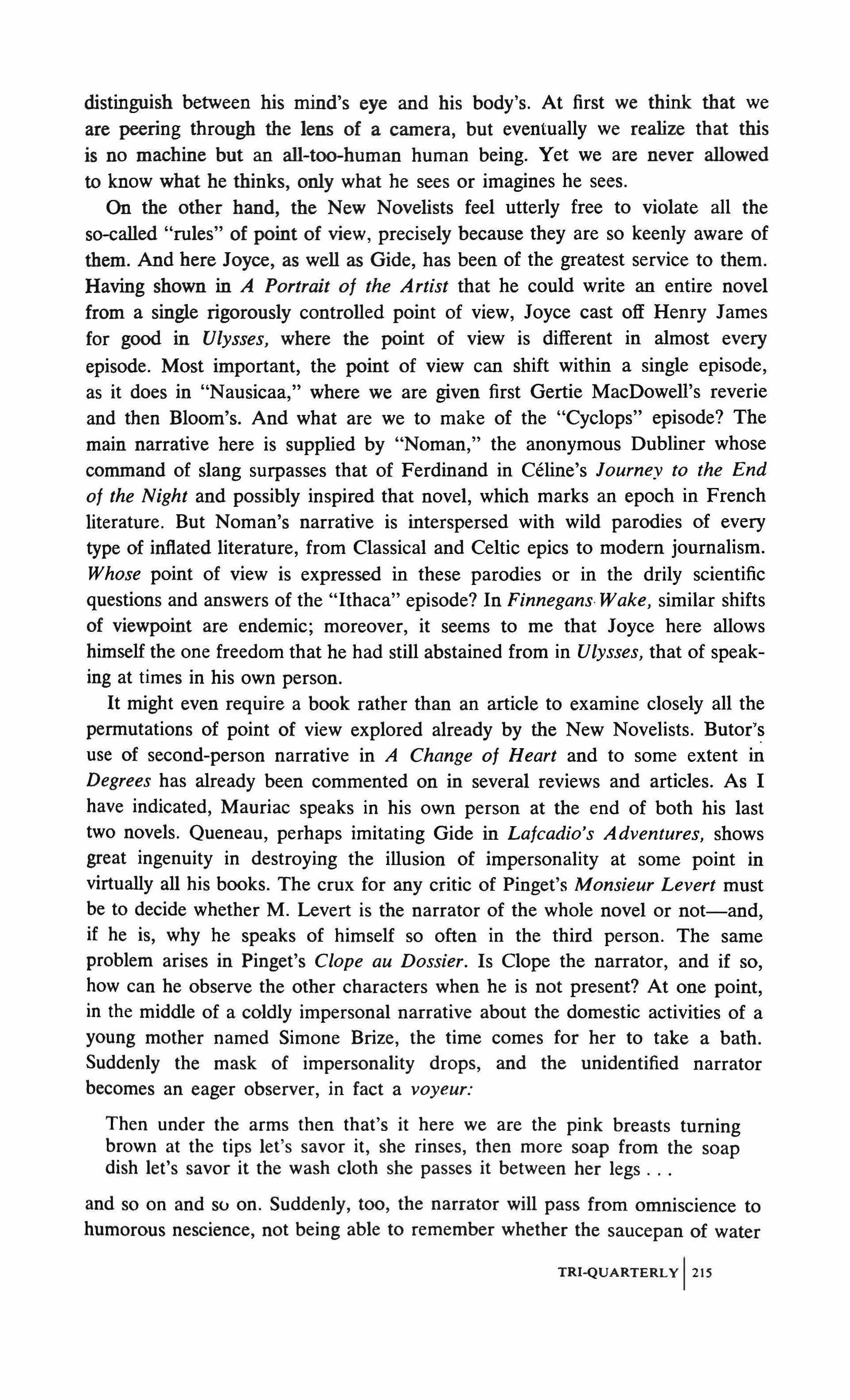
distinguish between his mind's eye and his body's. At first we think that we are peering through the lens of a camera, but eventually we realize that this is no machine but an all-too-human human being. Yet we are never allowed to know what he thinks, only what he sees or imagines he sees.
On the other hand, the New Novelists feel utterly free to violate all the so-called "rules" of point of view, precisely because they are so keenly aware of them. And here Joyce, as well as Gide, has been of the greatest service to them. Having shown in A Portrait 0/ the Artist that he could write an entire novel from a single rigorously controlled point of view, Joyce cast off Henry James for good in Ulysses, where the point of view is different in almost every episode. Most important, the point of view can shift within a single episode, as it does in "Nausicaa," where we are given first Gertie MacDowell's reverie and then Bloom's. And what are we to make of the "Cyclops" episode? The main narrative here is supplied by "Noman," the anonymous Dubliner whose command of slang surpasses that of Ferdinand in Celine's Journey to the End of the Night and possibly inspired that novel, which marks an epoch in French literature. But Noman's narrative is interspersed with wild parodies of every type of inflated literature, from Classical and Celtic epics to modem journalism. Whose point of view is expressed in these parodies or in the drily scientific questions and answers of the "Ithaca" episode? In Finnegans Wake, similar shifts of viewpoint are endemic; moreover, it seems to me that Joyce here allows himself the one freedom that he had still abstained from in Ulysses, that of speaking at times in his own person.
It might even require a book rather than an article to examine closely all the permutations of point of view explored already by the New Novelists. Butor's use of second-person narrative in A Change 0/ Heart and to some extent in Degrees has already been commented on in several reviews and articles. As I have indicated, Mauriac speaks in his own person at the end of both his last two novels. Queneau, perhaps imitating Gide in Lajcadio's Adventures, shows great ingenuity in destroying the illusion of impersonality at some point in virtually all his books. The crux for any critic of Pinget's Monsieur Levert must be to decide whether M. Levert is the narrator of the whole novel or not-and, if he is, why he speaks of himself so often in the third person. The same problem arises in Pinget's Clope au Dossier. Is Clope the narrator, and if so, how can he observe the other characters when he is not present? At one point, in the middle of a coldly impersonal narrative about the domestic activities of a young mother named Simone Brize, the time comes for her to take a bath. Suddenly the mask of impersonality drops, and the unidentified narrator becomes an eager observer, in fact a voyeur:
Then under the arms then that's it here we are the pink breasts turning brown at the tips let's savor it, she rinses, then more soap from the soap dish let's savor it the wash cloth she passes it between her legs and so on and so on. Suddenly, too, the narrator will pass from omniscience to humorous nescience, not being able to remember whether the saucepan of water
TRI-QUARTERLY 1215
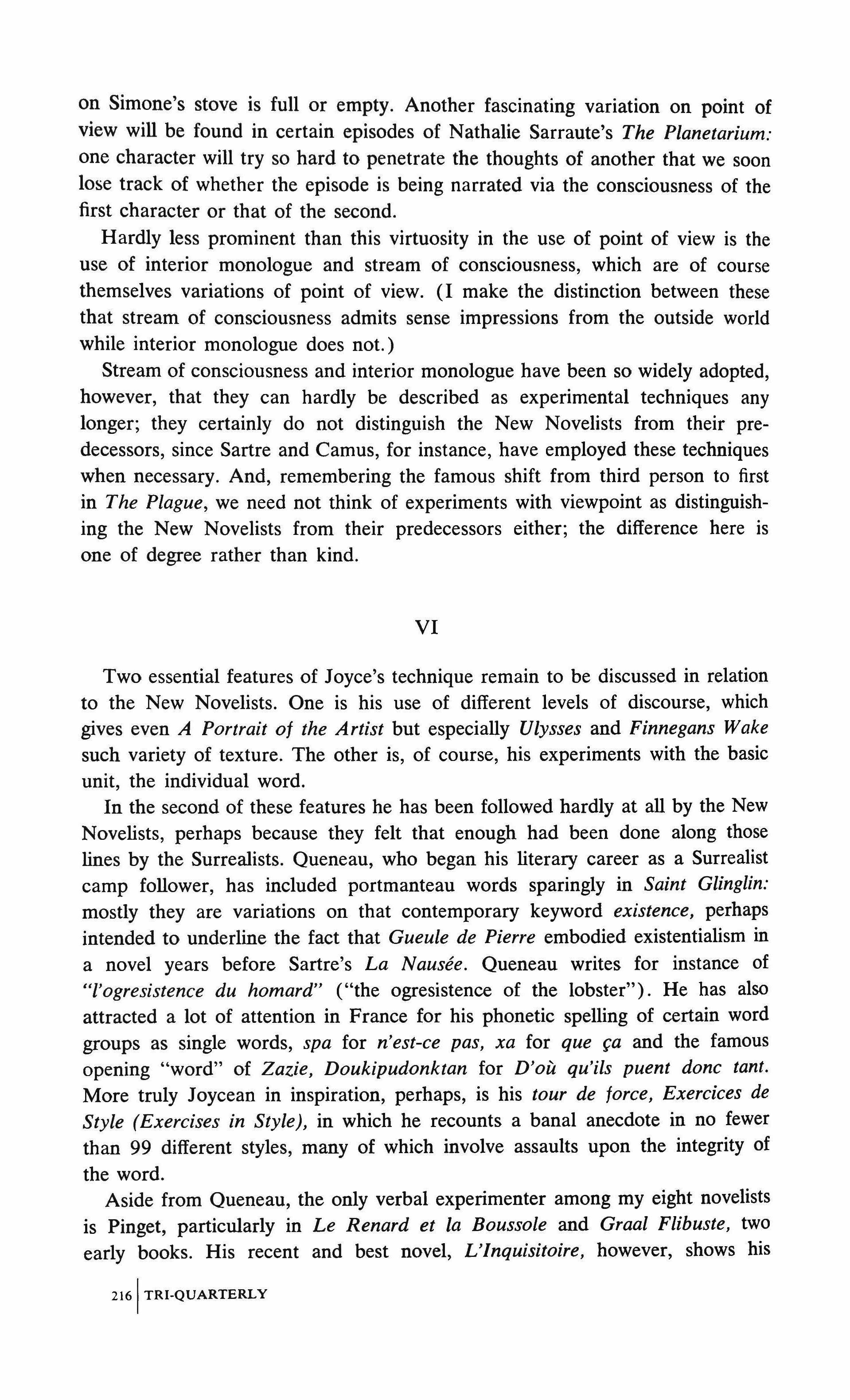
on Simone's stove is full or empty. Another fascinating variation on point of view will be found in certain episodes of Nathalie Sarraute's The Planetarium: one character will try so hard to penetrate the thoughts of another that we soon lose track of whether the episode is being narrated via the consciousness of the first character or that of the second.
Hardly less prominent than this virtuosity in the use of point of view is the use of interior monologue and stream of consciousness, which are of course themselves variations of point of view. (I make the distinction between these that stream of consciousness admits sense impressions from the outside world while interior monologue does not.)
Stream of consciousness and interior monologue have been so widely adopted, however, that they can hardly be described as experimental techniques any longer; they certainly do not distinguish the New Novelists from their predecessors, since Sartre and Camus, for instance, have employed these techniques when necessary. And, remembering the famous shift from third person to first in The Plague, we need not think of experiments with viewpoint as distinguishing the New Novelists from their predecessors either; the difference here is one of degree rather than kind.
Two essential features of Joyce's technique remain to be discussed in relation to the New Novelists. One is his use of different levels of discourse, which gives even A Portrait of the Artist but especially Ulysses and Finnegans Wake such variety of texture. The other is, of course, his experiments with the basic unit, the individual word.
In the second of these features he has been followed hardly at all by the New Novelists, perhaps because they felt that enough had been done along those lines by the Surrealists. Queneau, who began his literary career as a Surrealist camp follower, has included portmanteau words sparingly in Saint Glinglin: mostly they are variations on that contemporary keyword existence, perhaps intended to underline the fact that Gueule de Pierre embodied existentialism in a novel years before Sartre's La Nausee. Queneau writes for instance of "l'ogresistence du homard" ("the ogresistence of the lobster"). He has also attracted a lot of attention in France for his phonetic spelling of certain word groups as single words, spa for n'est-ce pas, xa for que �a and the famous opening "word" of Zazie, Doukipudonktan for D'ou qu'ils puent done tanto More truly Joycean in inspiration, perhaps, is his tour de force, Exercices de Style (Exercises in Style), in which he recounts a banal anecdote in no fewer than 99 different styles, many of which involve assaults upon the integrity of the word.
Aside from Queneau, the only verbal experimenter among my eight novelists is Pinget, particularly in Le Renard et la Boussole and Graal Flibuste, two early books. His recent and best novel, L'Inquisitoire, however, shows his
TRI-QUARTERLY
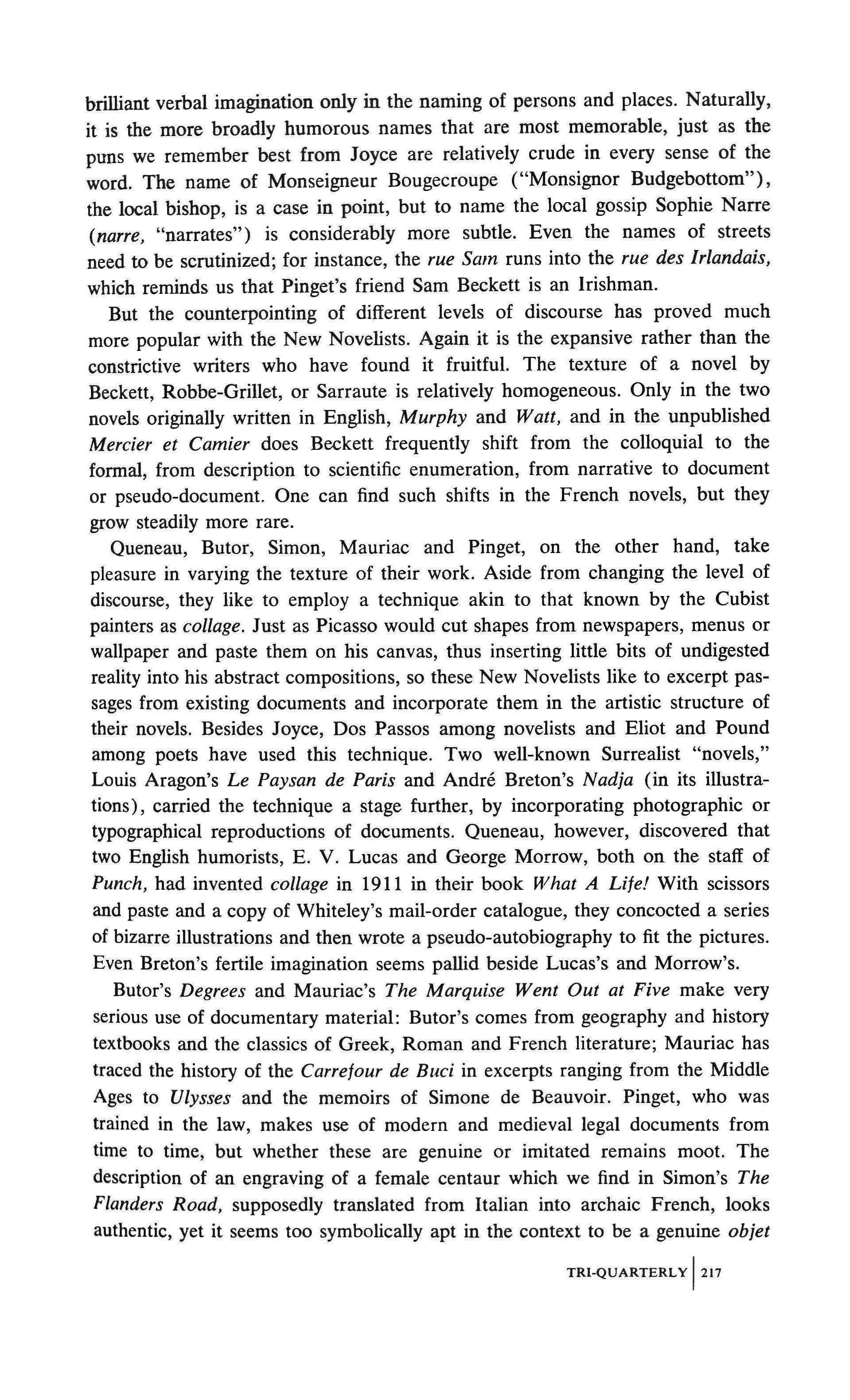
brilliant verbal imagination only in the naming of persons and places. Naturally, it is the more broadly humorous names that are most memorable, just as the puns we remember best from Joyce are relatively crude in every sense of the word. The name of Monseigneur Bougecroupe ("Monsignor Budgebottom"), the local bishop, is a case in point, but to name the local gossip Sophie Narre inarre, "narrates") is considerably more subtle. Even the names of streets need to be scrutinized; for instance, the rue Sam runs into the rue des Irlandais, which reminds us that Pinget's friend Sam Beckett is an Irishman.
But the counterpointing of different levels of discourse has proved much more popular with the New Novelists. Again it is the expansive rather than the constrictive writers who have found it fruitful. The texture of a novel by Beckett, Robbe-Grillet, or Sarraute is relatively homogeneous. Only in the two novels originally written in English, Murphy and Watt, and in the unpublished Mercier et Camier does Beckett frequently shift from the colloquial to the formal, from description to scientific enumeration, from narrative to document or pseudo-document. One can find such shifts in the French novels, but they grow steadily more rare.
Queneau, Butor, Simon, Mauriac and Pinget, on the other hand, take pleasure in varying the texture of their work. Aside from changing the level of discourse, they like to employ a technique akin to that known by the Cubist painters as collage. Just as Picasso would cut shapes from newspapers, menus or wallpaper and paste them on his canvas, thus inserting little bits of undigested reality into his abstract compositions, so these New Novelists like to excerpt passages from existing documents and incorporate them in the artistic structure of their novels. Besides Joyce, Dos Passos among novelists and Eliot and Pound among poets have used this technique. Two well-known Surrealist "novels," Louis Aragon's Le Paysan de Paris and Andre Breton's Nadja (in its illustrations), carried the technique a stage further, by incorporating photographic or typographical reproductions of documents. Queneau, however, discovered that two English humorists, E. V. Lucas and George Morrow, both on the staff of Punch, had invented collage in 1911 in their book What A Liie! With scissors and paste and a copy of Whiteley's mail-order catalogue, they concocted a series of bizarre illustrations and then wrote a pseudo-autobiography to fit the pictures. Even Breton's fertile imagination seems pallid beside Lucas's and Morrow's.
Butor's Degrees and Mauriac's The Marquise Went Out at Five make very serious use of documentary material: Butor's comes from geography and history textbooks and the classics of Greek, Roman and French literature; Mauriac has traced the history of the Carrejour de Buci in excerpts ranging from the Middle Ages to Ulysses and the memoirs of Simone de Beauvoir. Pinget, who was trained in the law, makes use of modern and medieval legal documents from time to time, but whether these are genuine or imitated remains moot. The description of an engraving of a female centaur which we find in Simon's The Flanders Road, supposedly translated from Italian into archaic French, looks authentic, yet it seems too symbolically apt in the context to be a genuine objet
TRI-QUARTERLy 1217
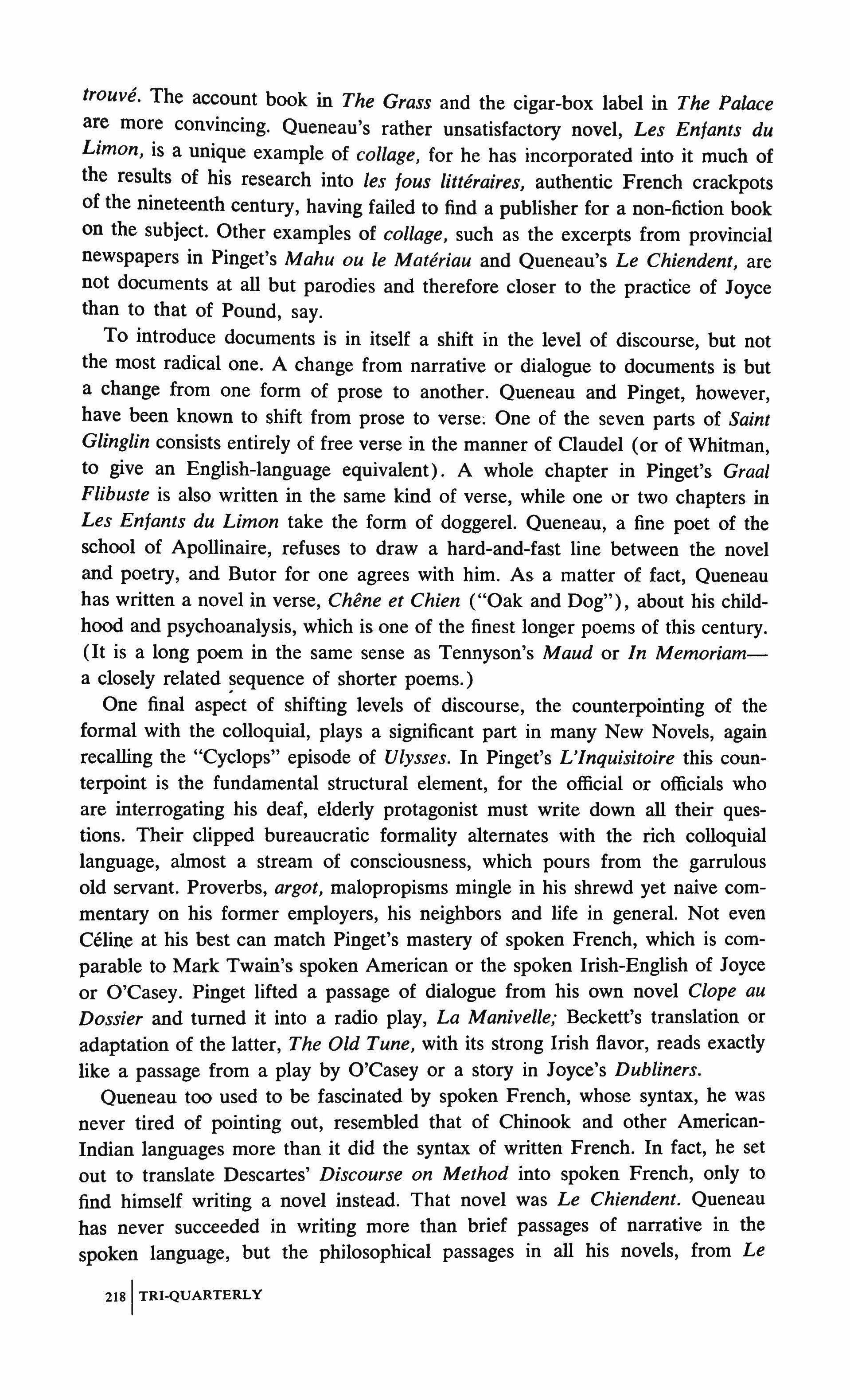
trouve. The account book in The Grass and the cigar-box label in The Palace are more convincing. Queneau's rather unsatisfactory novel, Les En/ants du Limon, is a unique example of collage, for he has incorporated into it much of the results of his research into les [ous litteraires, authentic French crackpots of the nineteenth century, having failed to find a publisher for a non-fiction book on the subject. Other examples of collage, such as the excerpts from provincial newspapers in Pinget's Mahu ou Ie Materiau and Queneau's Le Chiendent, are not documents at all but parodies and therefore closer to the practice of Joyce than to that of Pound, say.
To introduce documents is in itself a shift in the level of discourse, but not the most radical one. A change from narrative or dialogue to documents is but a change from one form of prose to another. Queneau and Pinget, however, have been known to shift from prose to verse: One of the seven parts of Saint Glinglin consists entirely of free verse in the manner of Claudel (or of Whitman, to give an English-language equivalent). A whole chapter in Pinget's Graal Flibuste is also written in the same kind of verse, while one or two chapters in Les En/ants du Limon take the form of doggerel. Queneau, a fine poet of the school of Apollinaire, refuses to draw a hard-and-fast line between the novel and poetry, and Butor for one agrees with him. As a matter of fact, Queneau has written a novel in verse, Chene et Chien ("Oak and Dog"), about his childhood and psychoanalysis, which is one of the finest longer poems of this century. (It is a long poem in the same sense as Tennyson's Maud or In Memoriama closely related �equence of shorter poems.)
One final aspect of shifting levels of discourse, the counterpointing of the formal with the colloquial, plays a significant part in many New Novels, again recalling the "Cyclops" episode of Ulysses. In Pinget's L'Inquisitoire this counterpoint is the fundamental structural element, for the official or officials who are interrogating his deaf, elderly protagonist must write down all their questions. Their clipped bureaucratic formality alternates with the rich colloquial language, almost a stream of consciousness, which pours from the garrulous old servant. Proverbs, argot, malopropisms mingle in his shrewd yet naive commentary on his former employers, his neighbors and life in general. Not even Celine at his best can match Pinget's mastery of spoken French, which is comparable to Mark Twain's spoken American or the spoken Irish-English of Joyce or O'Casey. Pinget lifted a passage of dialogue from his own novel Clope au Dossier and turned it into a radio play, La Manivelle; Beckett's translation or adaptation of the latter, The Old Tune, with its strong Irish flavor, reads exactly like a passage from a play by O'Casey or a story in Joyce's Dubliners.
Queneau too used to be fascinated by spoken French, whose syntax, he was never tired of pointing out, resembled that of Chinook and other AmericanIndian languages more than it did the syntax of written French. In fact, he set out to translate Descartes' Discourse on Method into spoken French, only to find himself writing a novel instead. That novel was Le Chiendent. Queneau has never succeeded in writing more than brief passages of narrative in the spoken language, but the philosophical passages in all his novels, from Le
TRI-QUARTERLY
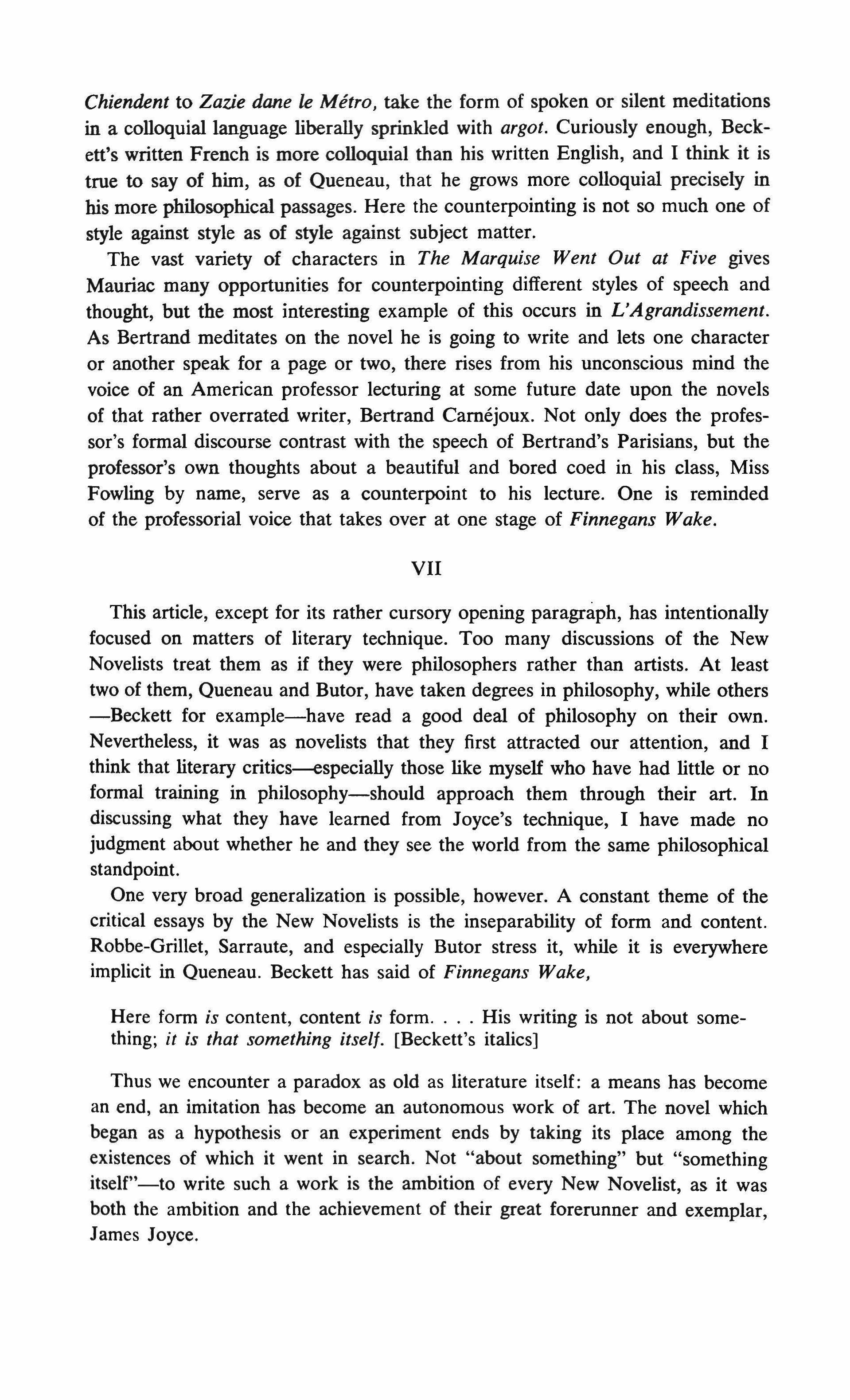
Chiendent to Zazie dane le Metro, take the form of spoken or silent meditations in a colloquial language liberally sprinkled with argot. Curiously enough, Beckett's written French is more colloquial than his written English, and I think it is true to say of him, as of Queneau, that he grows more colloquial precisely in his more philosophical passages. Here the counterpointing is not so much one of style against style as of style against subject matter.
The vast variety of characters in The Marquise Went Out at Five gives Mauriac many opportunities for counterpointing different styles of speech and thought, but the most interesting example of this occurs in L'Agrandissement, As Bertrand meditates on the novel he is going to write and lets one character or another speak for a page or two, there rises from his unconscious mind the voice of an American professor lecturing at some future date upon the novels of that rather overrated writer, Bertrand Carnejoux. Not only does the professor's formal discourse contrast with the speech of Bertrand's Parisians, but the professor's own thoughts about a beautiful and bored coed in his class, Miss Fowling by name, serve as a counterpoint to his lecture. One is reminded of the professorial voice that takes over at one stage of Finnegans Wake.
This article, except for its rather cursory opening paragraph, has intentionally focused on matters of literary technique. Too many discussions of the New Novelists treat them as if they were philosophers rather than artists. At least two of them, Queneau and Butor, have taken degrees in philosophy, while others -Beckett for example-have read a good deal of philosophy on their own. Nevertheless, it was as novelists that they first attracted our attention, and I think that literary critics--especially those like myself who have had little or no formal training in philosophy-should approach them through their art. In discussing what they have learned from Joyce's technique, I have made no judgment about whether he and they see the world from the same philosophical standpoint.
One very broad generalization is possible, however. A constant theme of the critical essays by the New Novelists is the inseparability of form and content. Robbe-Grillet, Sarraute, and especially Butor stress it, while it is everywhere implicit in Queneau. Beckett has said of Finnegans Wake,
Here form is content, content is form. His writing is not about something; it is that something itself. [Beckett's italics]
Thus we encounter a paradox as old as literature itself: a means has become an end, an imitation has become an autonomous work of art. The novel which began as a hypothesis or an experiment ends by taking its place among the existences of which it went in search. Not "about something" but "something itself"-to write such a work is the ambition of every New Novelist, as it was both the ambition and the achievement of their great forerunner and exemplar, James Joyce.
 translated by Walter Arndt
translated by Walter Arndt
The Lord, The Heavenly Host, later Mephistopheles. The three Archangels step forward.
RAPHAEL
The Sun in immemorial manner
With brother spheres does anthems sound, And measures out the thunderous tenor Of its precalculated round. His aspect lends the angels power, Though none may gauge his secret way; Superb, past understanding, tower Those works as on the primal day.
GABRIEL
The Earth's resplendence spins and ranges Past comprehension swift in flight, And paradisiac lucence changes With frightful abysses of night; The ocean's foaming seas run shoreward, On deep-hung cliffs rebound and rear, And cliff and ocean hurtle forward, Sped by the ever-hurrying sphere.
MICHAEL
And tempest roars, with tempest vying, From sea to land, from land to sea, In their alternate furies tying A chain of deepest potency. A flash of shattering disaster Prepares thy thunderbolt the way; Thy envoys, though, revere, oh Master, The gentle progress of Thy day.
THE THREE IN UNISON
This aspect lends the angels power, As none may gauge Thy secret way, And all Thy soverain works still tower Superb as on the primal day.
MEPHISTOPHELES
Since once again, oh Lord, I find you deigning To walk amongst us, asking how we do,
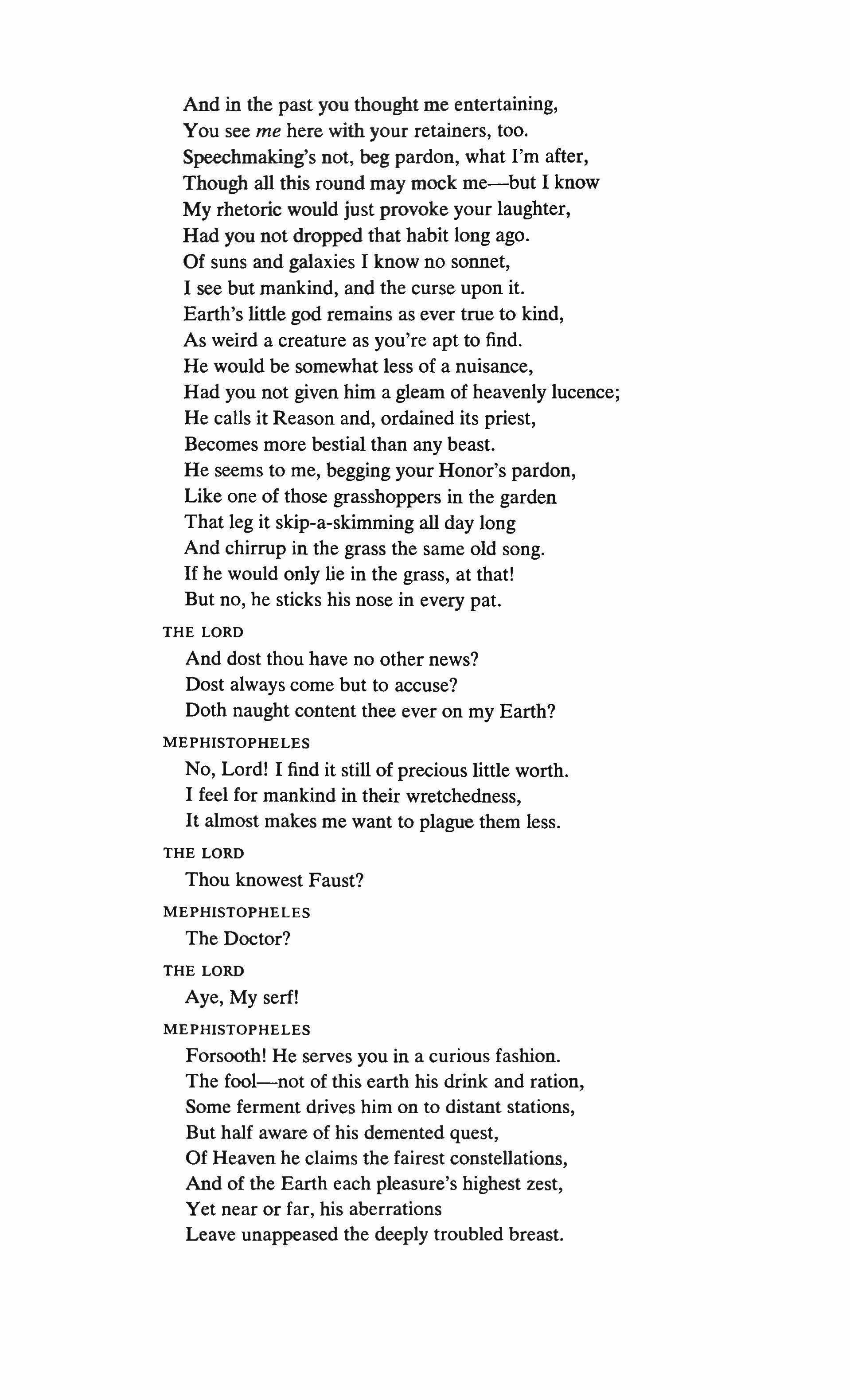
And in the past you thought me entertaining, You see me here with your retainers, too.
Speechmaking's not, beg pardon, what I'm after, Though all this round may mock me-but I know My rhetoric would just provoke your laughter, Had you not dropped that habit long ago. Of suns and galaxies I know no sonnet, I see but mankind, and the curse upon it.
Earth's little god remains as ever true to kind,
As weird a creature as you're apt to find. He would be somewhat less of a nuisance, Had you not given him a gleam of heavenly lucence; He calls it Reason and, ordained its priest, Becomes more bestial than any beast.
He seems to me, begging your Honor's pardon, Like one of those grasshoppers in the garden That leg it skip-a-skimming all day long And chirrup in the grass the same old song. If he would only lie in the grass, at that!
But no, he sticks his nose in every pat.
THE LORD
And dost thou have no other news?
Dost always come but to accuse?
Doth naught content thee ever on my Earth?
MEPHISTOPHELES
No, Lord! I find it still of precious little worth. I feel for mankind in their wretchedness, It almost makes me want to plague them less.
THE LORD
Thou knowest Faust?
MEPHISTOPHELES
The Doctor?
THE LORD
Aye, My serf!
MEPHISTOPHELES
Forsooth! He serves you in a curious fashion. The fool-not of this earth his drink and ration, Some ferment drives him on to distant stations, But half aware of his demented quest, Of Heaven he claims the fairest constellations, And of the Earth each pleasure's highest zest, Yet near or far, his aberrations
Leave unappeased the deeply troubled breast.
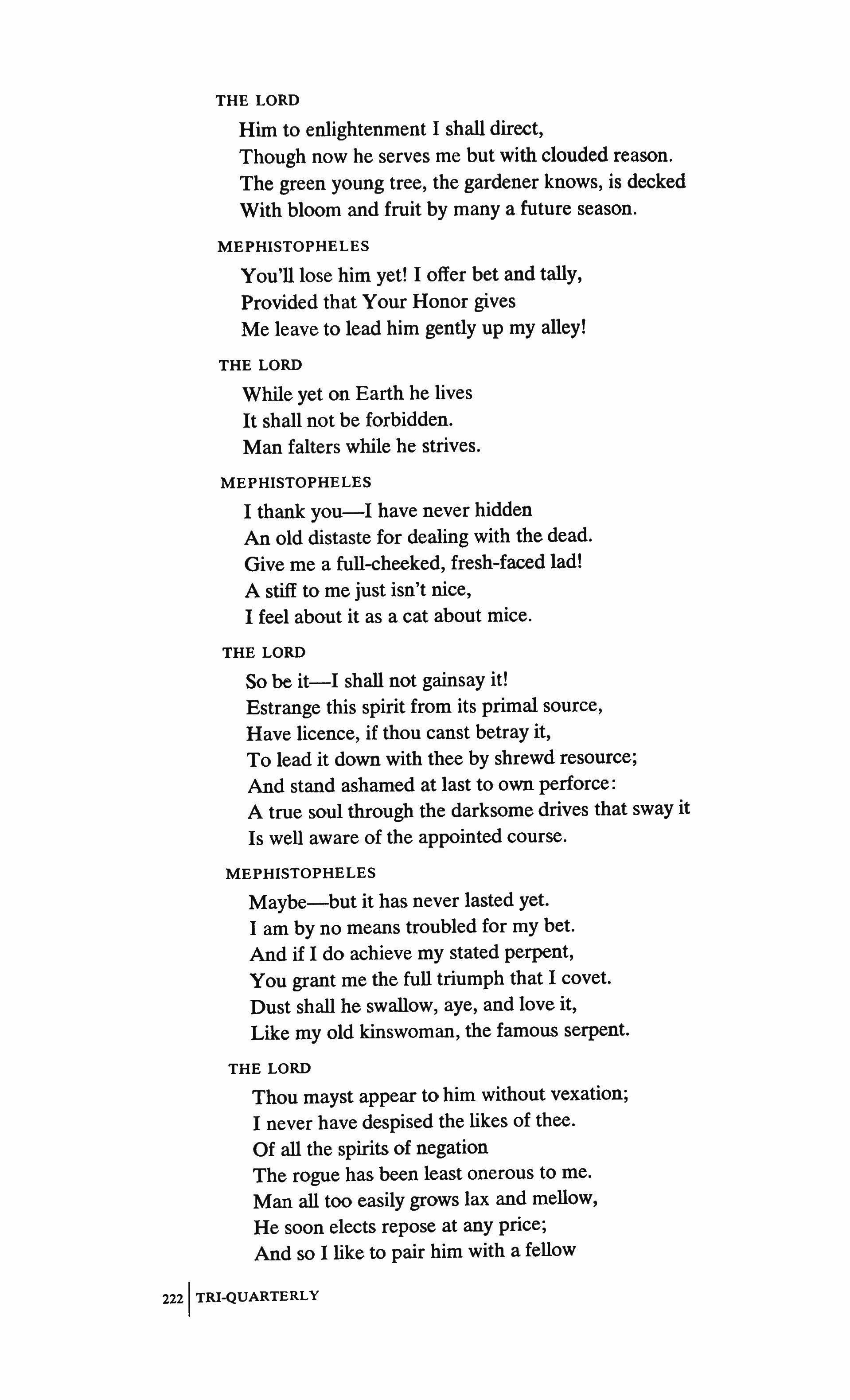
THE LORD
Him to enlightenment I shall direct, Though now he serves me but with clouded reason. The green young tree, the gardener knows, is decked With bloom and fruit by many a future season.
MEPHISTOPHELES
You'll lose him yet! I offer bet and tally, Provided that Your Honor gives Me leave to lead him gently up my alley!
THE LORD
While yet on Earth he lives It shall not be forbidden. Man falters while he strives.
MEPHISTOPHELES
I thank you-I have never hidden An old distaste for dealing with the dead. Give me a full-cheeked, fresh-faced lad!
A stiff to me just isn't nice, I feel about it as a cat about mice.
THE LORD
SO be it-I shall not gainsay it!
Estrange this spirit from its primal source, Have licence, if thou canst betray it, To lead it down with thee by shrewd resource; And stand ashamed at last to own perforce: A true soul through the darksome drives that sway it Is well aware of the appointed course.
MEPHISTOPHELES
Maybe-but it has never lasted yet. I am by no means troubled for my bet. And if I do achieve my stated perpent, You grant me the full triumph that I covet. Dust shall he swallow, aye, and love it, Like my old kinswoman, the famous serpent.
THE LORD
Thou mayst appear to him without vexation; I never have despised the likes of thee. Of all the spirits of negation
The rogue has been least onerous to me. Man all too easily grows lax and mellow, He soon elects repose at any price; And so I like to pair him with a fellow
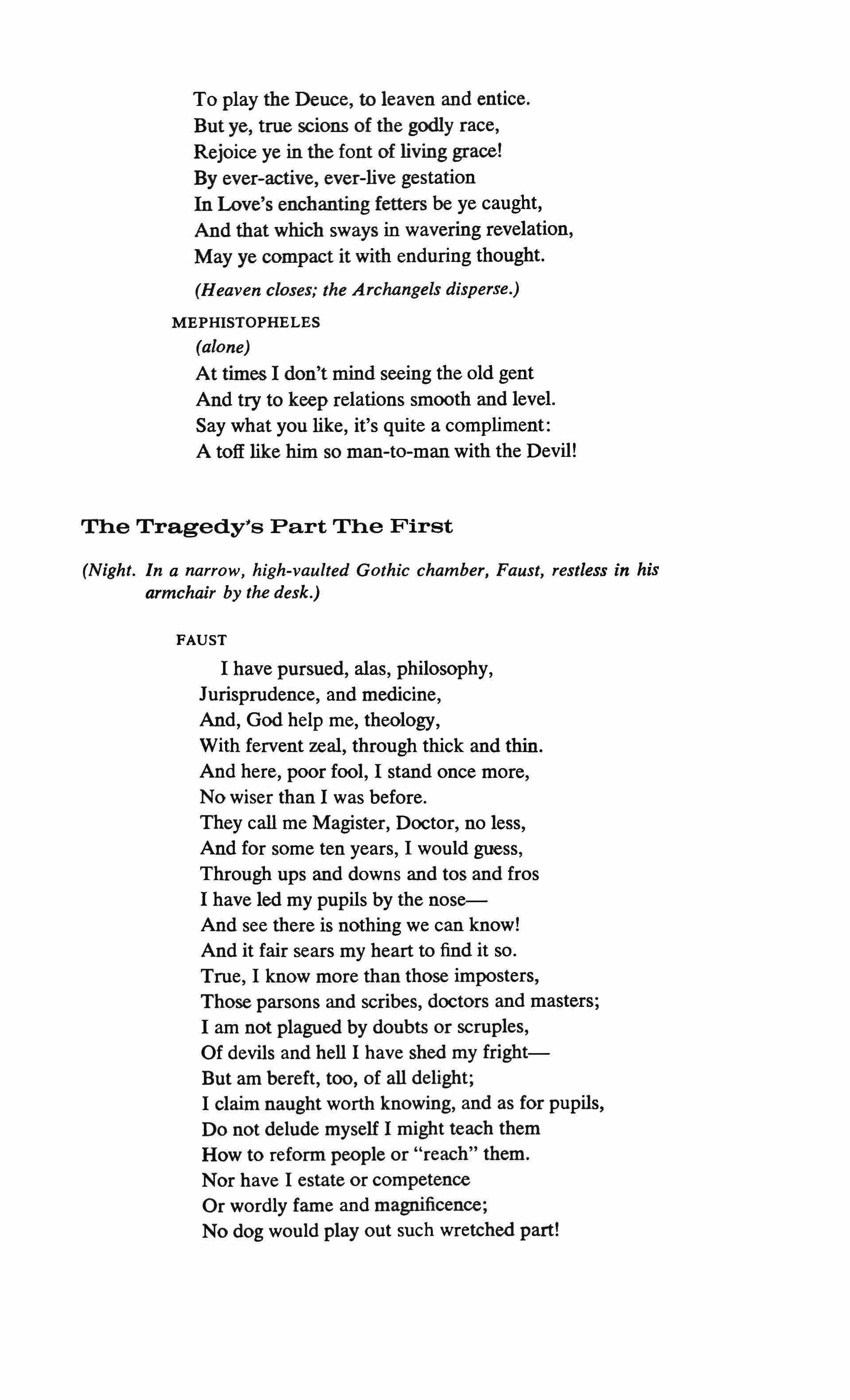
To play the Deuce, to leaven and entice. But ye, true scions of the godly race, Rejoice ye in the font of living grace! By ever-active, ever-live gestation
In Love's enchanting fetters be ye caught, And that which sways in wavering revelation, May ye compact it with enduring thought. (Heaven closes; the Archangels disperse.}
MEPHISTOPHELES (alone)
At times I don't mind seeing the old gent And try to keep relations smooth and level. Say what you like, it's quite a compliment: A totI like him so man-to-man with the Devil!
(Night. In a narrow, high-vaulted Gothic chamber, Faust, restless in his armchair by the desk.)
I have pursued, alas, philosophy, Jurisprudence, and medicine, And, God help me, theology, With fervent zeal, through thick and thin. And here, poor fool, I stand once more, No wiser than I was before. They call me Magister, Doctor, no less, And for some ten years, I would guess, Through ups and downs and tos and fros I have led my pupils by the noseAnd see there is nothing we can know! And it fair sears my heart to find it so. True, I know more than those imposters, Those parsons and scribes, doctors and masters; I am not plagued by doubts or scruples, Of devils and hell I have shed my frightBut am bereft, too, of all delight; I claim naught worth knowing, and as for pupils, Do not delude myself I might teach them How to reform people or "reach" them. Nor have I estate or competence Or wordly fame and magnificence; No dog would play out such wretched part!
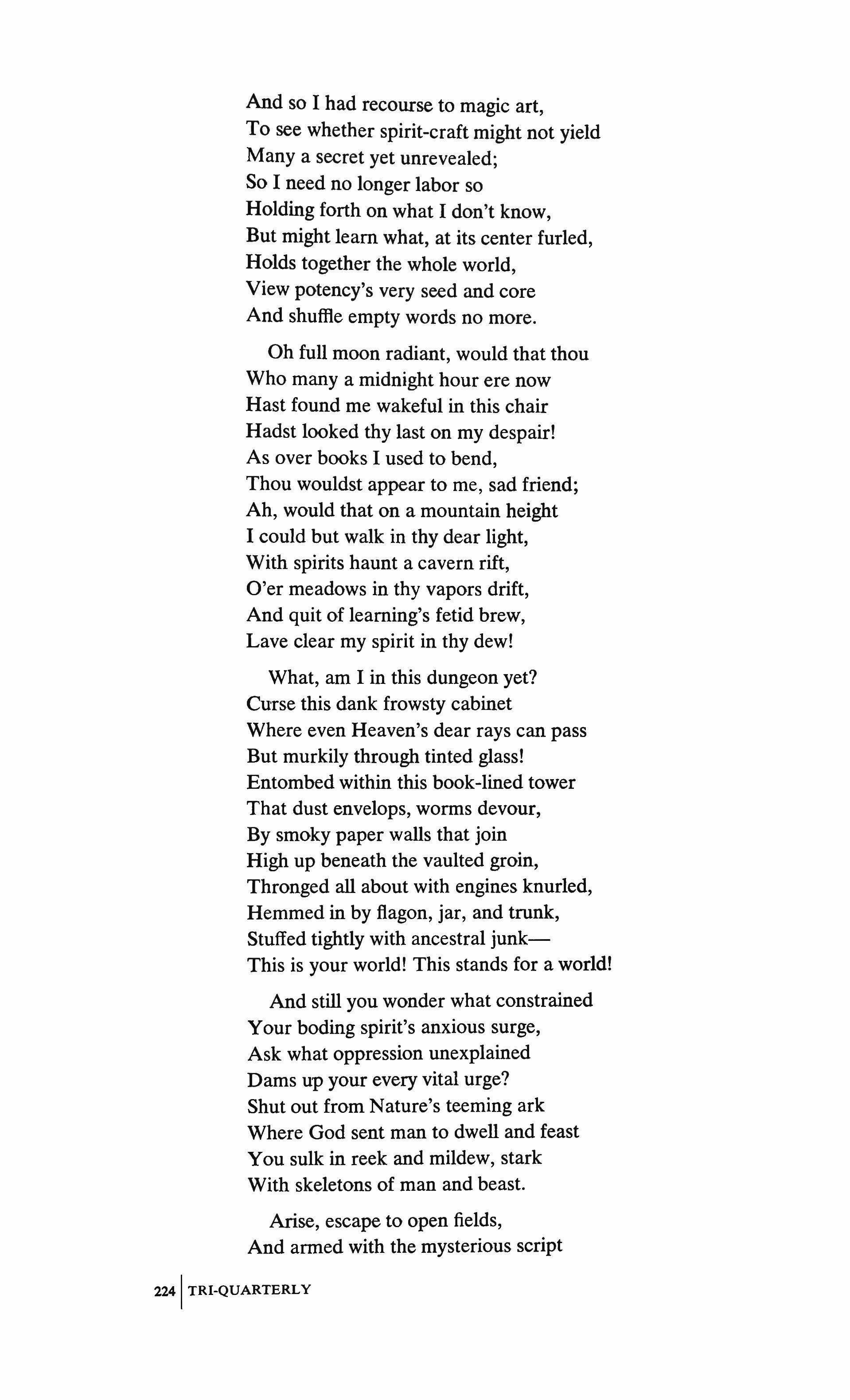
And so I had recourse to magic art, To see whether spirit-craft might not yield Many a secret yet unrevealed; So I need no longer labor so Holding forth on what I don't know, But might learn what, at its center furled, Holds together the whole world, View potency's very seed and core And shuffle empty words no more.
Oh full moon radiant, would that thou Who many a midnight hour ere now Hast found me wakeful in this chair Hadst looked thy last on my despair! As over books I used to bend, Thou wouldst appear to me, sad friend; Ah, would that on a mountain height I could but walk in thy dear light, With spirits haunt a cavern rift, O'er meadows in thy vapors drift, And quit of learning's fetid brew, Lave clear my spirit in thy dew!
What, am I in this dungeon yet? Curse this dank frowsty cabinet Where even Heaven's dear rays can pass But murkily through tinted glass! Entombed within this book-lined tower That dust envelops, worms devour, By smoky paper walls that join High up beneath the vaulted groin, Thronged all about with engines knurled, Hemmed in by flagon, jar, and trunk, Stuffed tightly with ancestral junkThis is your world! This stands for a world!
And still you wonder what constrained Your boding spirit's anxious surge, Ask what oppression unexplained Dams up your every vital urge? Shut out from Nature's teeming ark Where God sent man to dwell and feast You sulk in reek and mildew, stark With skeletons of man and beast.
Arise, escape to open fields, And armed with the mysterious script

That Nostradamus' wisdom yieldsWhat need of more companionship?
In Nature's proper school enrolled, Wise in the gaits of stars and moon, Your soul will feel fresh powers unfold As spirits with their likes commune. In vain to hope reflection dry Could make the sacred emblems clearYou spirits all, afloat nearby, Let you make answer, if you hear!
(He opens the book and perceives the sign of the Macrocosm)
Ah-what enchantment at the sight of this, What ecstasy suffuses nerve and brain! I feel new-burgeoning life, with sacred bliss
Reincandescent, course through nerve and vein. Was it a god that fashioned this design Which calms the tumult in my breast, Floods the poor heart with happiness, And with a secret thrust divine All Nature's powers about me renders manifest? Am I a god? All seems so bright! Within these tracings pure and whole There lies creative Nature open to my soul. At last I fathom that the sage was right: "The realm of spirits is not barred, Thy senses are, thy heart is dead! Go lave, disciple, undeterred Thy mortal breast in sunrise red!"
(He scrutinizes the sign)
How all one common weft contrives, Each in the other works and thrives! How heavenly forces rising and descending Pass golden ewers in a chain unending! On wings with bliss abounding, All earth from heaven rounding, Their harmonies through all the world resounding!
Ah, what a pageant! But alas, no more! Where, boundless Nature, do I grasp thy core, You breasts to which, life-sources twain, Both heaven and earth are pressed, And whither strains my shriveled breast, You brim with nourishment, yet I must yearn in vain?
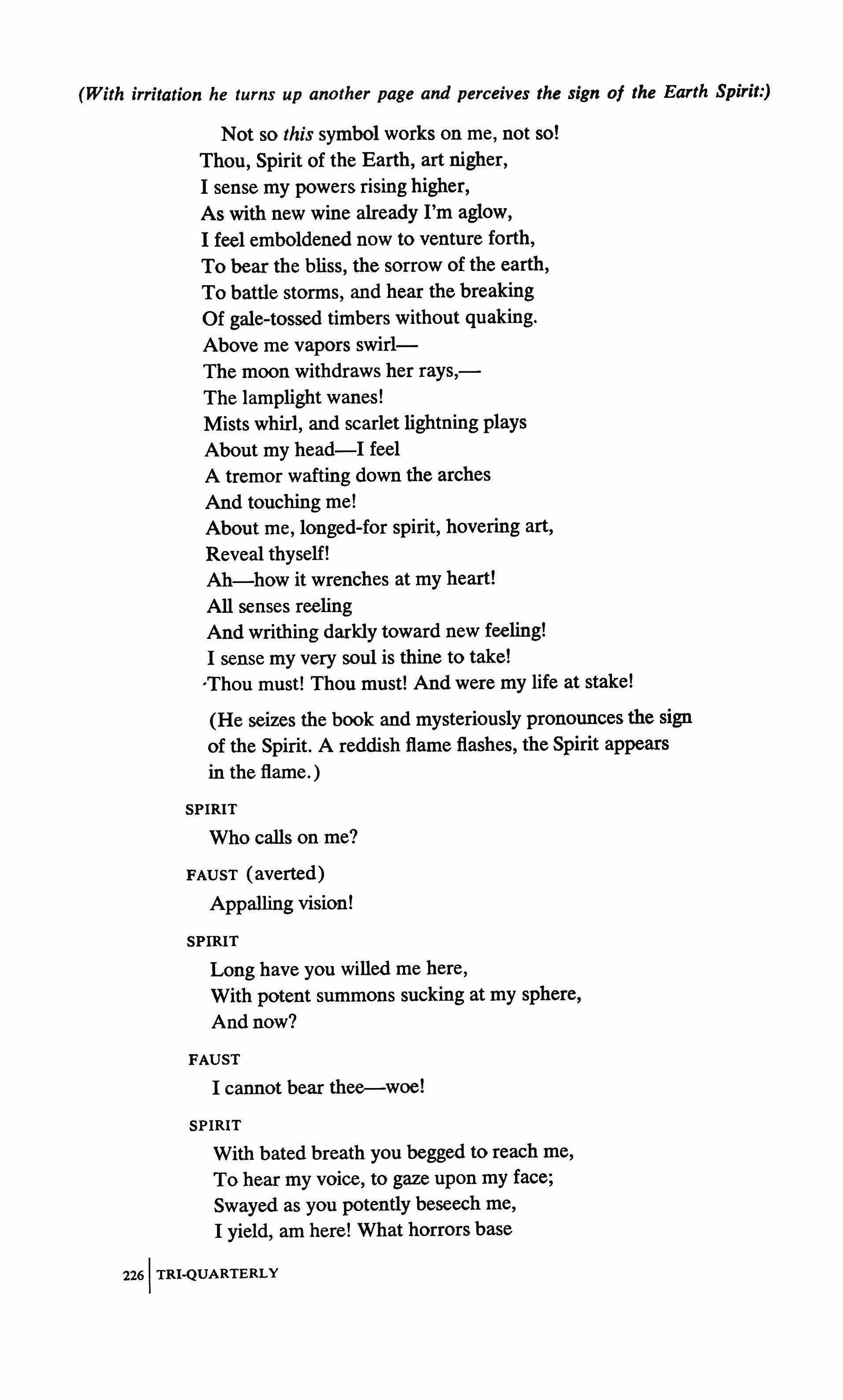
(With irritation he turns up another page and perceives the sign 01 the Earth Spirit:)
Not so this symbol works on me, not so! Thou, Spirit of the Earth, art nigher, I sense my powers rising higher, As with new wine already I'm aglow, I feel emboldened now to venture forth, To bear the bliss, the sorrow of the earth, To battle storms, and hear the breaking Of gale-tossed timbers without quaking. Above me vapors swirlThe moon withdraws her rays,The lamplight wanes!
Mists whirl, and scarlet lightning plays About my head-I feel A tremor wafting down the arches
And touching me!
About me, longed-for spirit, hovering art, Reveal thyself!
Ah-how it wrenches at my heart!
All senses reeling And writhing darkly toward new feeling! I sense my very soul is thine to take! -Thou must! Thou must! And were my life at stake!
(He seizes the book and mysteriously pronounces the sign of the Spirit. A reddish flame flashes, the Spirit appears in the flame.)
SPIRIT
Who calls on me?
FAUST (averted) Appalling vision!
SPIRIT
Long have you willed me here, With potent summons sucking at my sphere, And now?
FAUST
I cannot bear thee--woe!
SPIRIT
With bated breath you begged to reach me, To hear my voice, to gaze upon my face; Swayed as you potently beseech me, I yield, am here! What horrors base
TRI-QUARTERLY
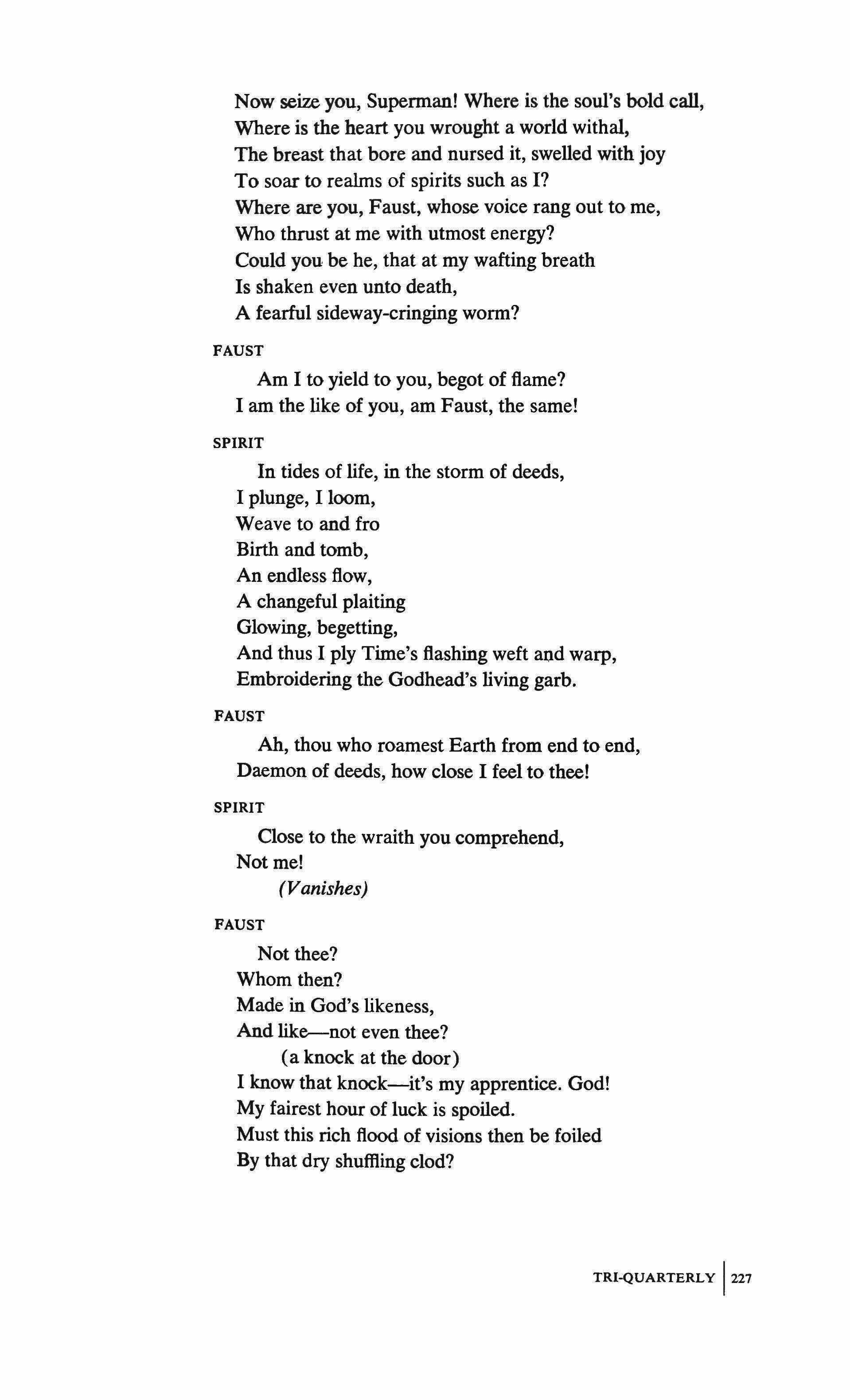
Now seize you, Superman! Where is the soul's bold call, Where is the heart you wrought a world withal, The breast that bore and nursed it, swelled with joy
To soar to realms of spirits such as I?
Where are you, Faust, whose voice rang out to me, Who thrust at me with utmost energy?
Could you be he, that at my wafting breath Is shaken even unto death, A fearful sideway-cringing worm?
FAUST
Am I to yield to you, begot of flame?
I am the like of you, am Faust, the same!
SPIRIT
In tides of life, in the storm of deeds, I plunge, I 100m, Weave to and fro Birth and tomb, An endless flow, A changeful plaiting Glowing, begetting, And thus I ply Time's flashing weft and warp, Embroidering the Godhead's living garb.
FAUST
Ah, thou who roamest Earth from end to end, Daemon of deeds, how close I feel to thee!
SPIRIT
Close to the wraith you comprehend, Not me! (Vanishes)
FAUST
Not thee?
Whom then?
Made in God's likeness, And like-not even thee? (a knock at the door)
I know that knock-it's my apprentice. God! My fairest hour of luck is spoiled. Must this rich flood of visions then be foiled By that dry shuffling clod?
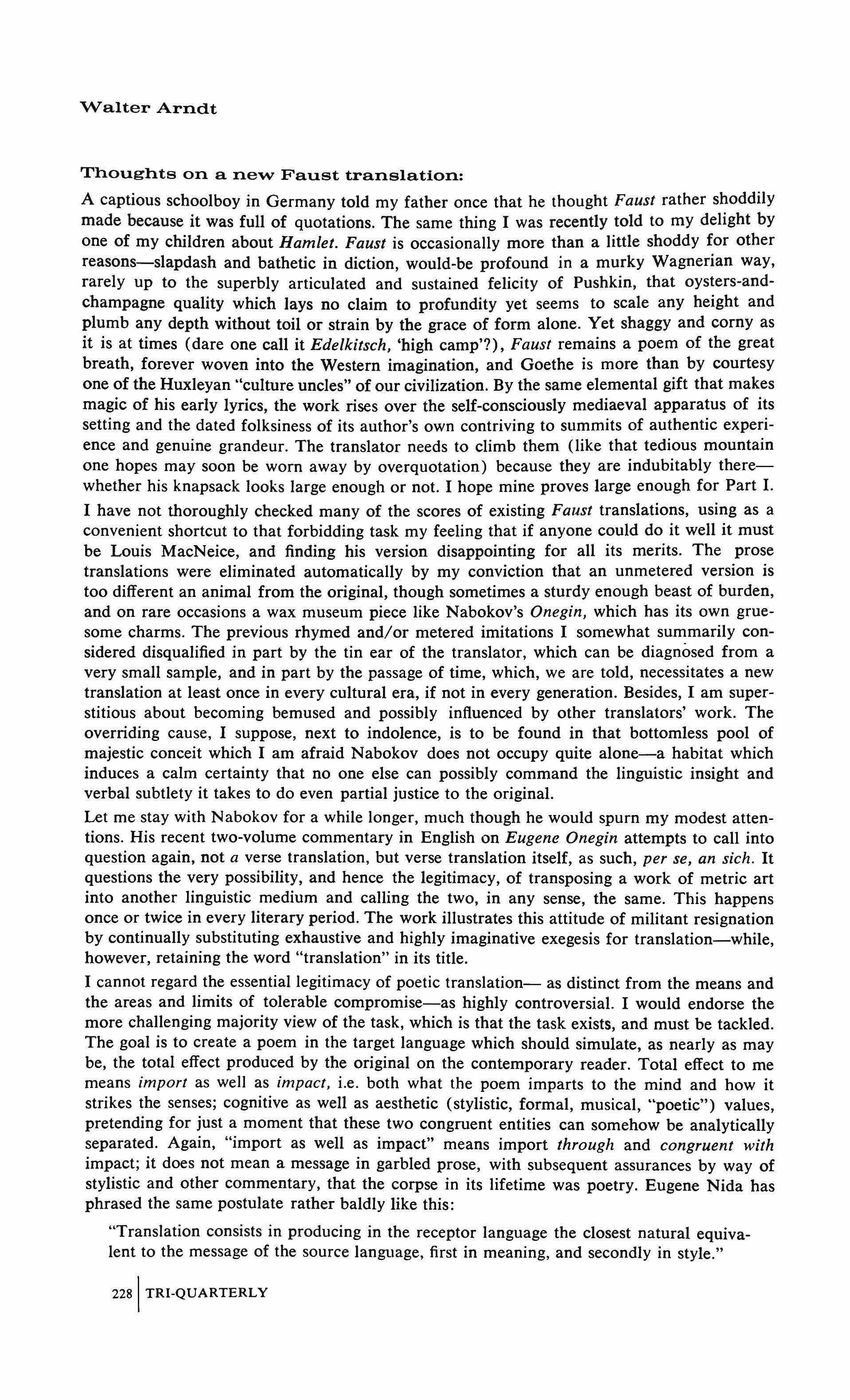
Thoughts on a ne'W Faust translation:
A captious schoolboy in Germany told my father once that he thought Faust rather shoddily made because it was full of quotations. The same thing I was recently told to my delight by one of my children about Hamlet. Faust is occasionally more than a little shoddy for other reasons-slapdash and bathetic in diction, would-be profound in a murky Wagnerian way, rarely up to the superbly articulated and sustained felicity of Pushkin, that oysters-andchampagne quality which lays no claim to profundity yet seems to scale any height and plumb any depth without toil or strain by the grace of form alone. Yet shaggy and corny as it is at times (dare one call it Edelkitsch, 'high camp'?), Faust remains a poem of the great breath, forever woven into the Western imagination, and Goethe is more than by courtesy one of the Huxleyan "culture uncles" of our civilization. By the same elemental gift that makes magic of his early lyrics, the work rises over the self-consciously mediaeval apparatus of its setting and the dated folksiness of its author's own contriving to summits of authentic experience and genuine grandeur. The translator needs to climb them (like that tedious mountain one hopes may soon be worn away by overquotation) because they are indubitably therewhether his knapsack looks large enough or not. I hope mine proves large enough for Part I. I have not thoroughly checked many of the scores of existing Faust translations, using as a convenient shortcut to that forbidding task my feeling that if anyone could do it well it must be Louis MacNeice, and finding his version disappointing for all its merits. The prose translations were eliminated automatically by my conviction that an unmetered version is too different an animal from the original, though sometimes a sturdy enough beast of burden, and on rare occasions a wax museum piece like Nabokov's Onegin, which has its own gruesome charms. The previous rhymed and/or metered imitations I somewhat summarily considered disqualified in part by the tin ear of the translator, which can be diagnosed from a very small sample, and in part by the passage of time, which, we are told, necessitates a new translation at least once in every cultural era, if not in every generation. Besides, I am superstitious about becoming bemused and possibly influenced by other translators' work. The overriding cause, I suppose, next to indolence, is to be found in that bottomless pool of majestic conceit which I am afraid Nabokov does not occupy quite alone-a habitat which induces a calm certainty that no one else can possibly command the linguistic insight and verbal subtlety it takes to do even partial justice to the original.
Let me stay with Nabokov for a while longer, much though he would spurn my modest attentions. His recent two-volume commentary in English on Eugene Onegin attempts to call into question again, not a verse translation, but verse translation itself, as such, per se, an sich. It questions the very possibility, and hence the legitimacy, of transposing a work of metric art into another linguistic medium and calling the two, in any sense, the same. This happens once or twice in every literary period. The work illustrates this attitude of militant resignation by continually substituting exhaustive and highly imaginative exegesis for translation-while, however, retaining the word "translation" in its title.
I cannot regard the essential legitimacy of poetic translation- as distinct from the means and the areas and limits of tolerable compromise-as highly controversial. I would endorse the more challenging majority view of the task, which is that the task exists, and must be tackled. The goal is to create a poem in the target language which should simulate, as nearly as may be, the total effect produced by the original on the contemporary reader. Total effect to me means import as well as impact, i.e. both what the poem imparts to the mind and how it strikes the senses; cognitive as well as aesthetic (stylistic, formal, musical, "poetic") values, pretending for just a moment that these two congruent entities can somehow be analytically separated. Again, "import as well as impact" means import through and congruent with impact; it does not mean a message in garbled prose, with subsequent assurances by way of stylistic and other commentary, that the corpse in its lifetime was poetry. Eugene Nida has phrased the same postulate rather baldly like this:
"Translation consists in producing in the receptor language the closest natural equivalent to the message of the source language, first in meaning, and secondly in style."
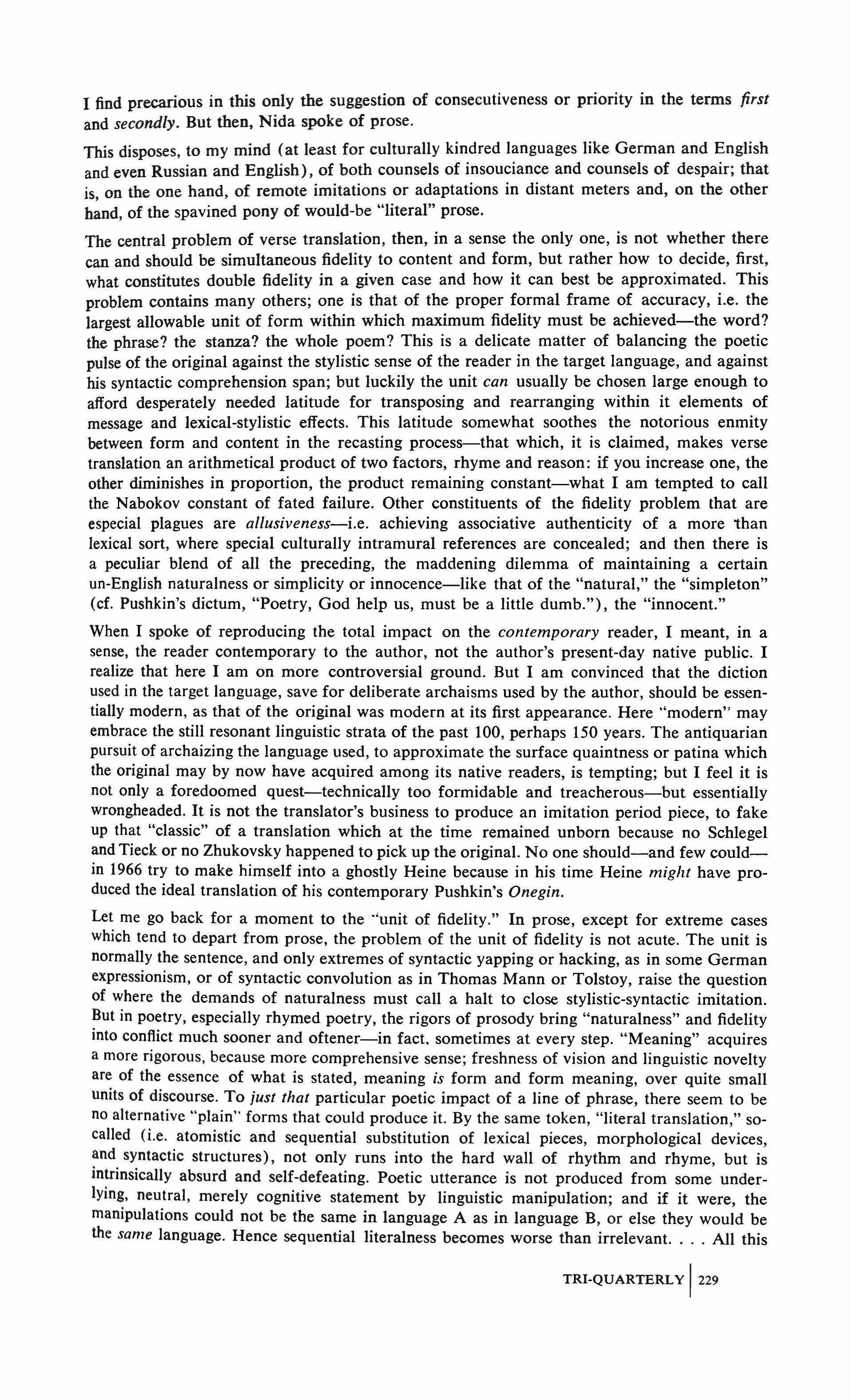
I find precarious in this only the suggestion of consecutiveness or priority in the terms first and secondly. But then, Nida spoke of prose.
This disposes, to my mind (at least for culturally kindred languages like German and English and even Russian and English), of both counsels of insouciance and counsels of despair; that is, on the one hand, of remote imitations or adaptations in distant meters and, on the other hand, of the spavined pony of would-be "literal" prose.
The central problem of verse translation, then, in a sense the only one, is not whether there can and should be simultaneous fidelity to content and form, but rather how to decide, first, what constitutes double fidelity in a given case and how it can best be approximated. This problem contains many others; one is that of the proper formal frame of accuracy, i.e. the largest allowable unit of form within which maximum fidelity must be achieved-the word? the phrase? the stanza? the whole poem? This is a delicate matter of balancing the poetic pulse of the original against the stylistic sense of the reader in the target language, and against his syntactic comprehension span; but luckily the unit can usually be chosen large enough to afford desperately needed latitude for transposing and rearranging within it elements of message and lexical-stylistic effects. This latitude somewhat soothes the notorious enmity between form and content in the recasting process-that which, it is claimed, makes verse translation an arithmetical product of two factors, rhyme and reason: if you increase one, the other diminishes in proportion, the product remaining constant-what I am tempted to call the Nabokov constant of fated failure. Other constituents of the fidelity problem that are especial plagues are allusiveness-i.e. achieving associative authenticity of a more than lexical sort, where special culturally intramural references are concealed; and then there is a peculiar blend of all the preceding, the maddening dilemma of maintaining a certain uri-English naturalness or simplicity or innocence-like that of the "natural," the "simpleton" (cf. Pushkin's dictum, "Poetry, God help us, must be a little dumb."), the "innocent."
When I spoke of reproducing the total impact on the contemporary reader, I meant, in a sense, the reader contemporary to the author, not the author's present-day native public. I realize that here I am on more controversial ground. But I am convinced that the diction used in the target language, save for deliberate archaisms used by the author, should be essentially modern, as that of the original was modern at its first appearance. Here "modem" may embrace the still resonant linguistic strata of the past 100, perhaps 150 years. The antiquarian pursuit of archaizing the language used, to approximate the surface quaintness or patina which the original may by now have acquired among its native readers, is tempting; but I feel it is not only a foredoomed quest-technically too formidable and treacherous-but essentially wrongheaded. It is not the translator's business to produce an imitation period piece, to fake up that "classic" of a translation which at the time remained unborn because no Schlegel and Tieck or no Zhukovsky happened to pick up the original. No one should-and few couldin 1966 try to make himself into a ghostly Heine because in his time Heine might have produced the ideal translation of his contemporary Pushkin's Onegin.
Let me go back for a moment to the "unit of fidelity." In prose, except for extreme cases which tend to depart from prose, the problem of the unit of fidelity is not acute. The unit is normally the sentence, and only extremes of syntactic yapping or hacking, as in some German expressionism, or of syntactic convolution as in Thomas Mann or Tolstoy, raise the question of where the demands of naturalness must call a halt to close stylistic-syntactic imitation. But in poetry, especially rhymed poetry, the rigors of prosody bring "naturalness" and fidelity into conflict much sooner and oftener-in fact. sometimes at every step. "Meaning" acquires a more rigorous, because more comprehensive sense; freshness of vision and linguistic novelty are of the essence of what is stated, meaning is form and form meaning, over quite small units of discourse. To just that particular poetic impact of a line of phrase, there seem to be no alternative "plain" forms that could produce it. By the same token, "literal translation," socalled (i.e, atomistic and sequential substitution of lexical pieces, morphological devices, and syntactic structures), not only runs into the hard wall of rhythm and rhyme, but is intrinsically absurd and self-defeating. Poetic utterance is not produced from some underlying, neutral, merely cognitive statement by linguistic manipulation; and if it were, the manipulations could not be the same in language A as in language B, or else they would be the same language. Hence sequential literalness becomes worse than irrelevant. All this
TRI-QUARTERLY 1229
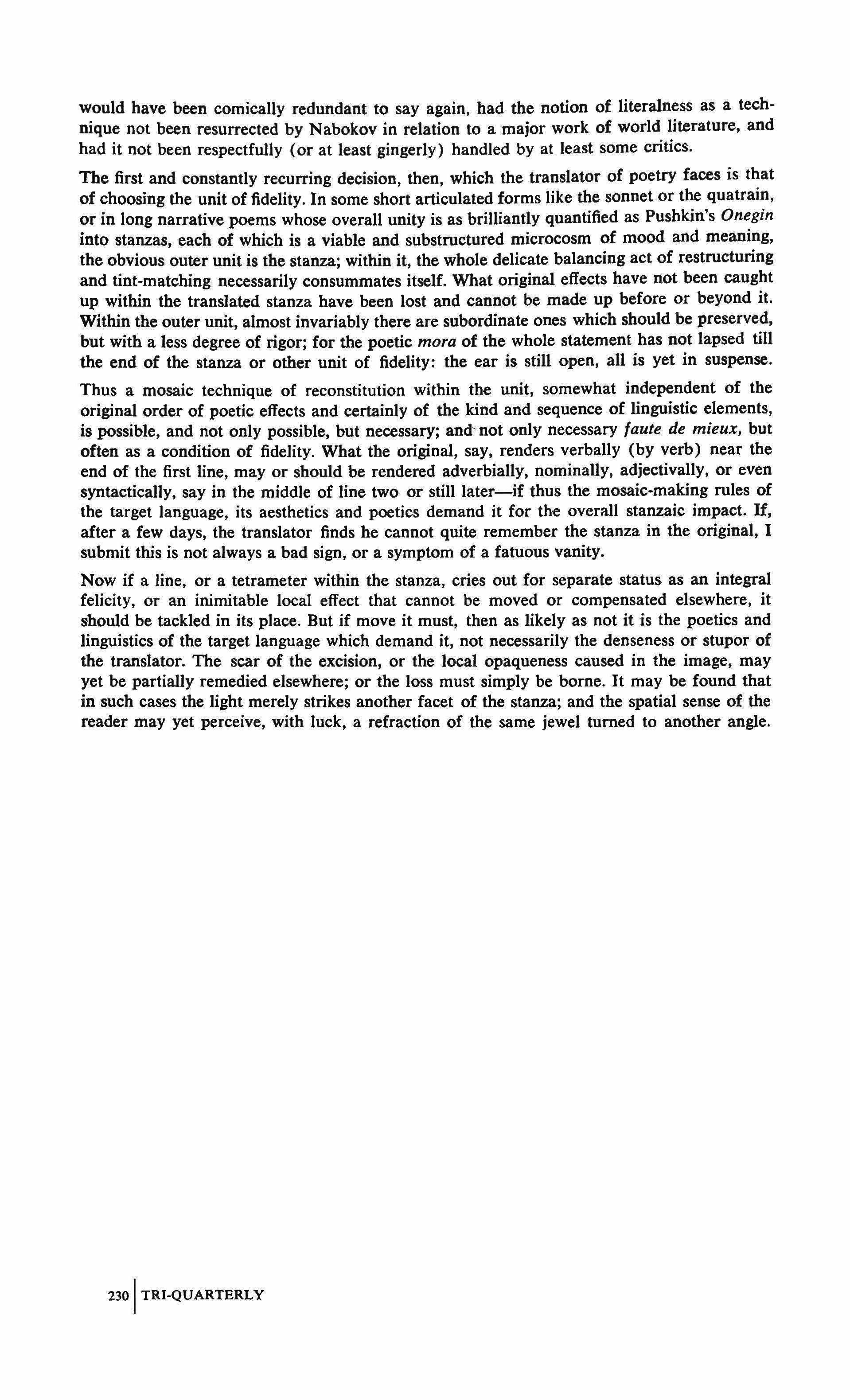
would have been comically redundant to say again, had the notion of literalness as a technique not been resurrected by Nabokov in relation to a major work of world literature, and had it not been respectfully (or at least gingerly) handled by at least some critics.
The first and constantly recurring decision, then, which the translator of poetry faces is that of choosing the unit of fidelity. In some short articulated forms like the sonnet or the quatrain, or in long narrative poems whose overall unity is as brilliantly quantified as Pushkin's Onegin into stanzas, each of which is a viable and substructured microcosm of mood and meaning, the obvious outer unit is the stanza; within it, the whole delicate balancing act of restructuring and tint-matching necessarily consummates itself. What original effects have not been caught up within the translated stanza have been lost and cannot be made up before or beyond it. Within the outer unit, almost invariably there are subordinate ones which should be preserved, but with a less degree of rigor; for the poetic mora of the whole statement has not lapsed till the end of the stanza or other unit of fidelity: the ear is still open, all is yet in suspense.
Thus a mosaic technique of reconstitution within the unit, somewhat independent of the original order of poetic effects and certainly of the kind and sequence of linguistic elements, is possible, and not only possible, but necessary; and' not only necessary faute de mieux, but often as a condition of fidelity. What the original, say, renders verbally (by verb) near the end of the first line, mayor should be rendered adverbially, nominally, adjectivally, or even syntactically, say in the middle of line two or still later-if thus the mosaic-making rules of the target language, its aesthetics and poetics demand it for the overall stanzaic impact. If, after a few days, the translator finds he cannot quite remember the stanza in the original, I submit this is not always a bad sign, or a symptom of a fatuous vanity.
Now if a line, or a tetrameter within the stanza, cries out for separate status as an integral felicity, or an inimitable local effect that cannot be moved or compensated elsewhere, it should be tackled in its place. But if move it must, then as likely as not it is the poetics and linguistics of the target language which demand it, not necessarily the denseness or stupor of the translator. The scar of the excision, or the local opaqueness caused in the image, may yet be partially remedied elsewhere; or the loss must simply be borne. It may be found that in such cases the light merely strikes another facet of the stanza; and the spatial sense of the reader may yet perceive, with luck, a refraction of the same jewel turned to another angle.
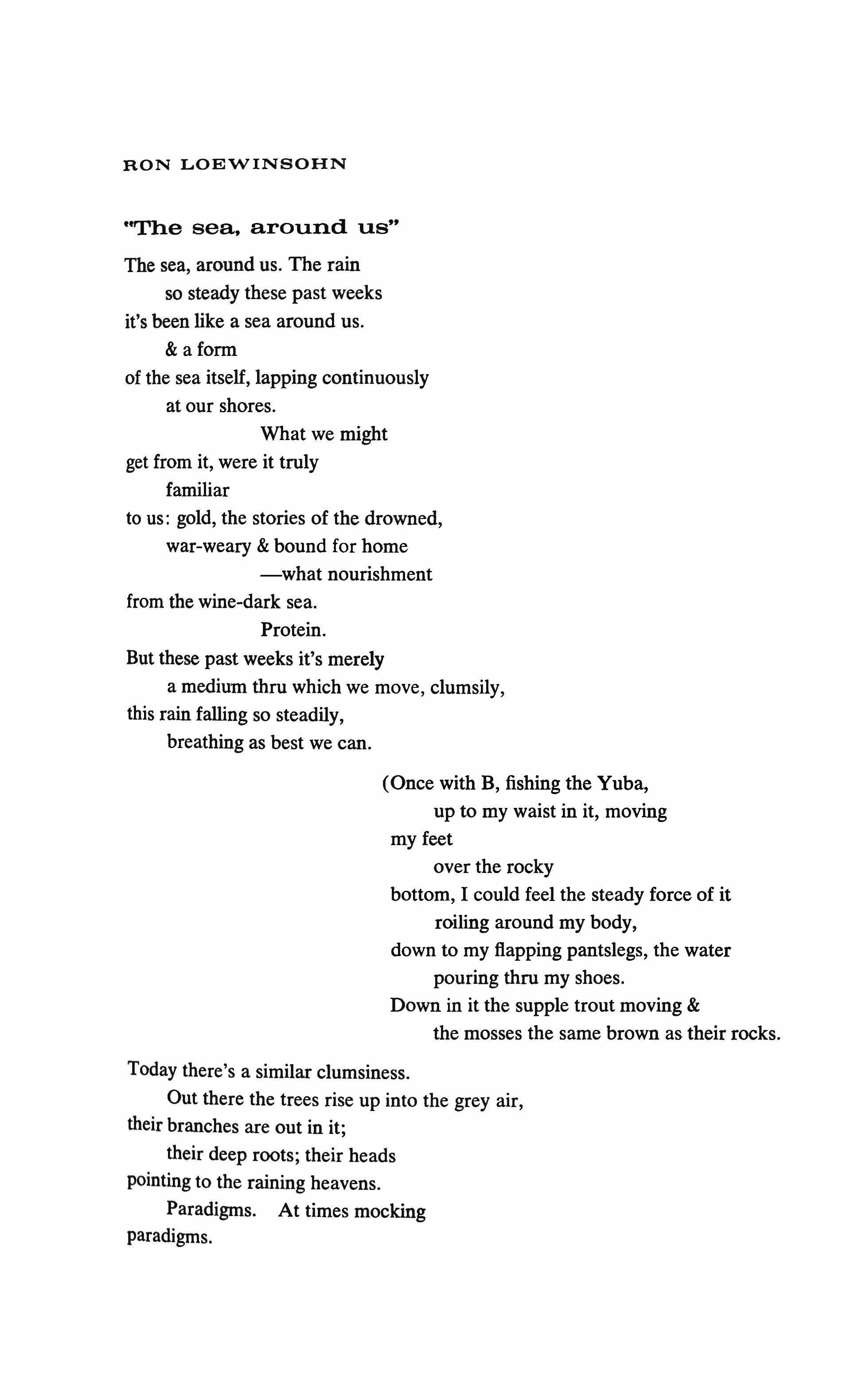 RON LOEWINSOHN
RON LOEWINSOHN
"The sea, around us"
The sea, around us. The rain so steady these past weeks it's been like a sea around us. & a form of the sea itself, lapping continuously at our shores.
What we might get from it, were it truly familiar to us: gold, the stories of the drowned, war-weary & bound for home -what nourishment from the wine-dark sea. Protein.
But these past weeks it's merely a medium thru which we move, clumsily, this rain falling so steadily, breathing as best we can.
(Once with B, fishing the Yuba, up to my waist in it, moving my feet over the rocky bottom, I could feel the steady force of it roiling around my body, down to my flapping pantslegs, the water pouring thru my shoes. Down in it the supple trout moving & the mosses the same brown as their rocks.
Today there's a similar clumsiness. Out there the trees rise up into the grey air, their branches are out in it; their deep roots; their heads pointing to the raining heavens. Paradigms. At times mocking paradigms.
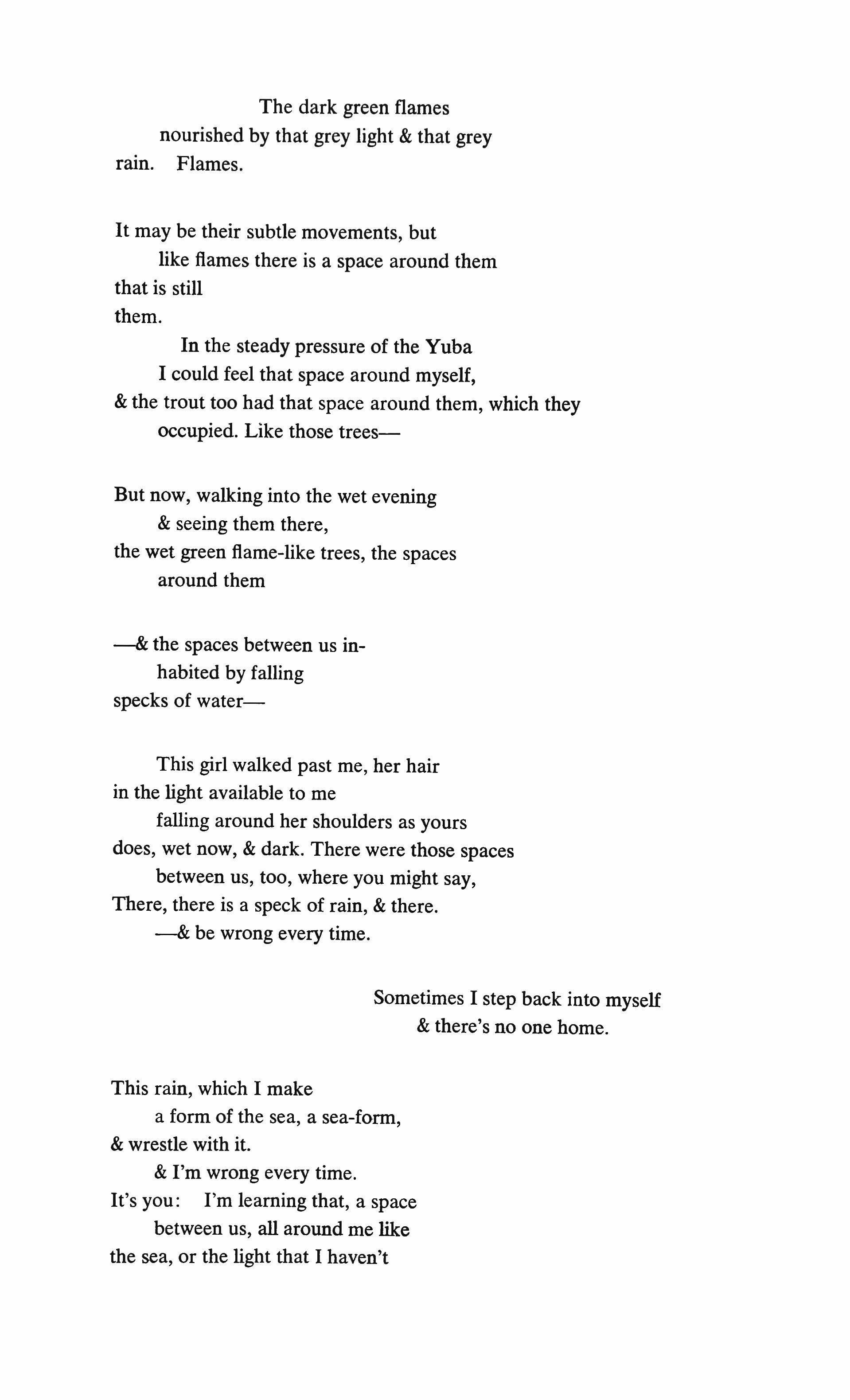
The dark green flames nourished by that grey light & that grey rain. Flames.
It may be their subtle movements, but like flames there is a space around them that is still them.
In the steady pressure of the Yuba I could feel that space around myself, & the trout too had that space around them, which they occupied. Like those trees-
But now, walking into the wet evening & seeing them there, the wet green flame-like trees, the spaces around them
--& the spaces between us inhabited by falling specks of water-
This girl walked past me, her hair in the light available to me falling around her shoulders as yours does, wet now, & dark. There were those spaces between us, too, where you might say, There, there is a speck of rain, & there. --& be wrong every time.
Sometimes I step back into myself & there's no one home.
This rain, which I make a form of the sea, a sea-form, & wrestle with it. & I'm wrong every time. It's you: I'm learning that, a space between us, all around me like the sea, or the light that I haven't
wrestled with enough, & so haven't learned yet.
This rain, those trees have been around a long time, familiar to each other in all their forms, in all their changes. The trees live off the light, & the rain falls day & night.
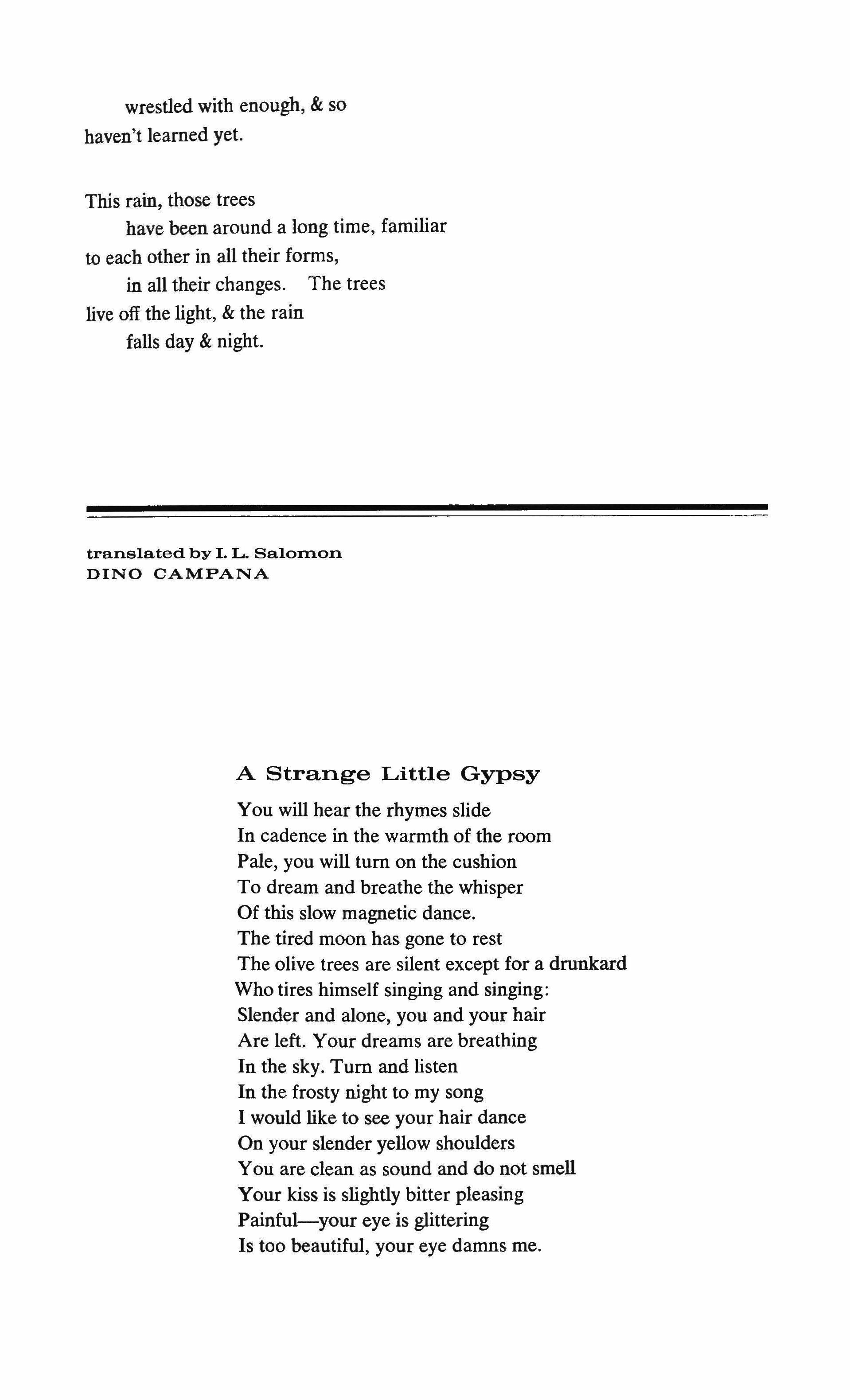 translated by I. L. Salomon DINO CAMPANA
translated by I. L. Salomon DINO CAMPANA
You will hear the rhymes slide In cadence in the warmth of the room Pale, you will turn on the cushion
To dream and breathe the whisper Of this slow magnetic dance. The tired moon has gone to rest
The olive trees are silent except for a drunkard Who tires himself singing and singing: Slender and alone, you and your hair
Are left. Your dreams are breathing In the sky. Turn and listen
In the frosty night to my song
I would like to see your hair dance
On your slender yellow shoulders
You are clean as sound and do not smell
Your kiss is slightly bitter pleasing
Painful-your eye is glittering Is too beautiful, your eye damns me.
Surely you do not know how to sing
But your small voice must be sharp
And piercing as the violin
And pleasing it must pluck
The heart. Your hair on your small shoulders?
Do you love perfume? And why are you dressed
In blood? Do you love churches?
No you are afraid of perfume, Your small body
Is too slender and your eyes too black
Oh if you could see yourself shaking
Your small caustic spirit trembling
And your shining eyes rounded
While the lymphatic and melodious saint
Whom you had to entice
Spills clouds of incense on his knees
Thanking the Lord
And you cannot love him
Christus vicisti
The ivory of the crucifix
Overcomes the ivory of your belly
And its crown not so sweet and proud
Black curled moving
In the gray dizzy shadow
And you weep knees to the ground hands over your eyes
Your long and ugly feet
Spread on the ground like the paws
Of a rebellious and monstrous beast.
What taste will your worthless tears have?
A little fire? I would like to make
A fantastic diadem and wear it
On my head at the hour of my death
To hear the little demons with forked feet
Speak to me in confidence.
Poor child how I slander you
Because you have tragic hair
And you dress in red and do not smell.
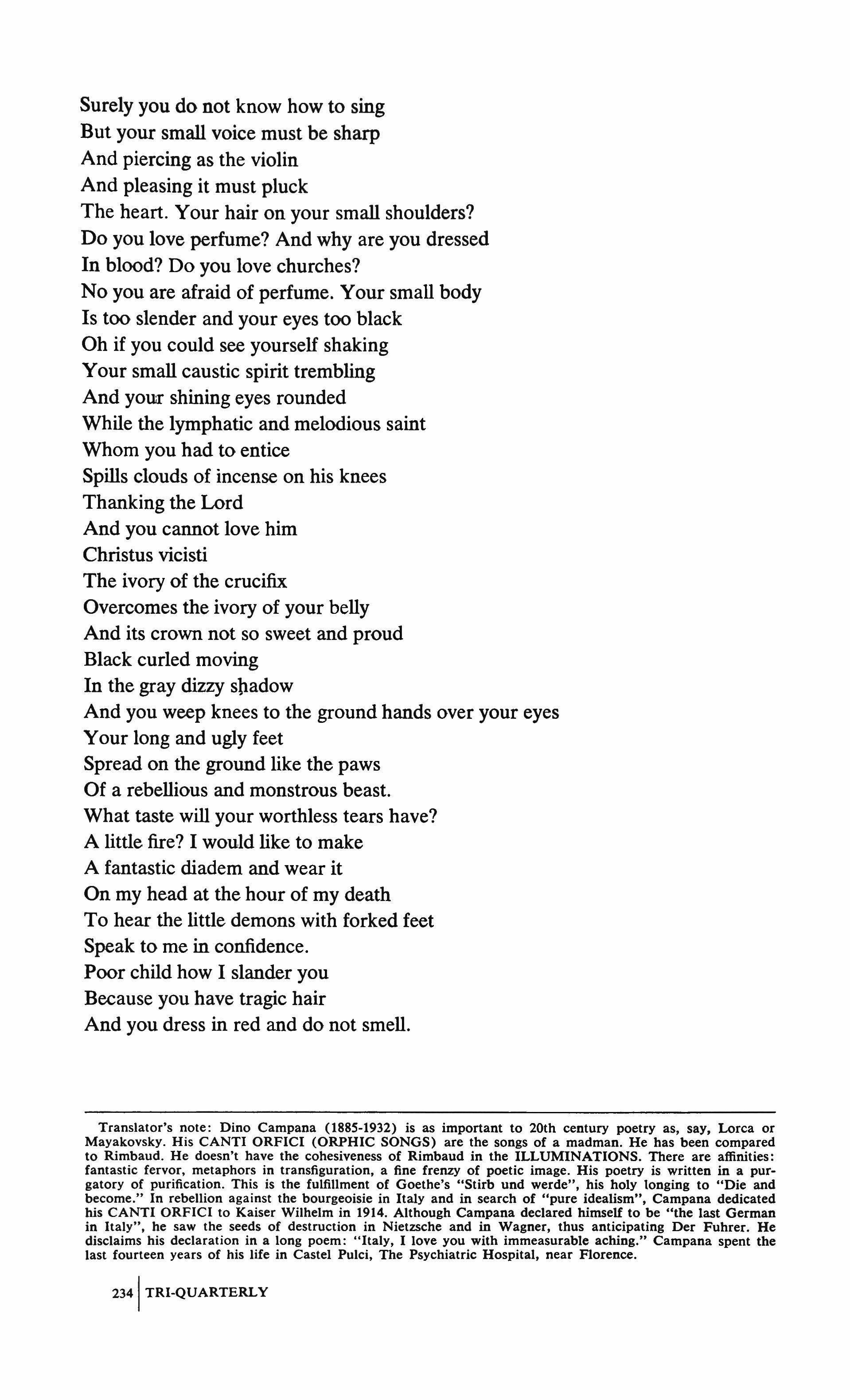
Translator's note: Dino Campana (1885-1932) is as important to 20th century poetry as, say, Lorca or Mayakovsky, His CANTI ORFICI (ORPHIC SONGS) are the songs of a madman. He has been compared to Rimbaud. He doesn't have the cohesiveness of Rimbaud in the ILLUMINATIONS. There are affinities: fantastic fervor, metaphors in transfiguration, a fine frenzy of poetic image. His poetry is written in a purgatory of purification. This is the fulfillment of Goethe's "Stirb und werde", his holy longing to "Die and become." In rebellion against the bourgeoisie in Italy and in search of "pure idealism", Campana dedicated his CANTI ORFICI to Kaiser Wilhelm in 1914. Although Campana declared himself to be "the last German in Italy", he saw the seeds of destruction in Nietzsche and in Wagner, thus anticipating Der Fuhrer. He disclaims his declaration in a long poem: "Italy, I love you with immeasurable aching." Campana spent the last fourteen years of his life in Castel Pulci, The Psychiatric Hospital, near Florence.
TRI-QUARTERLY
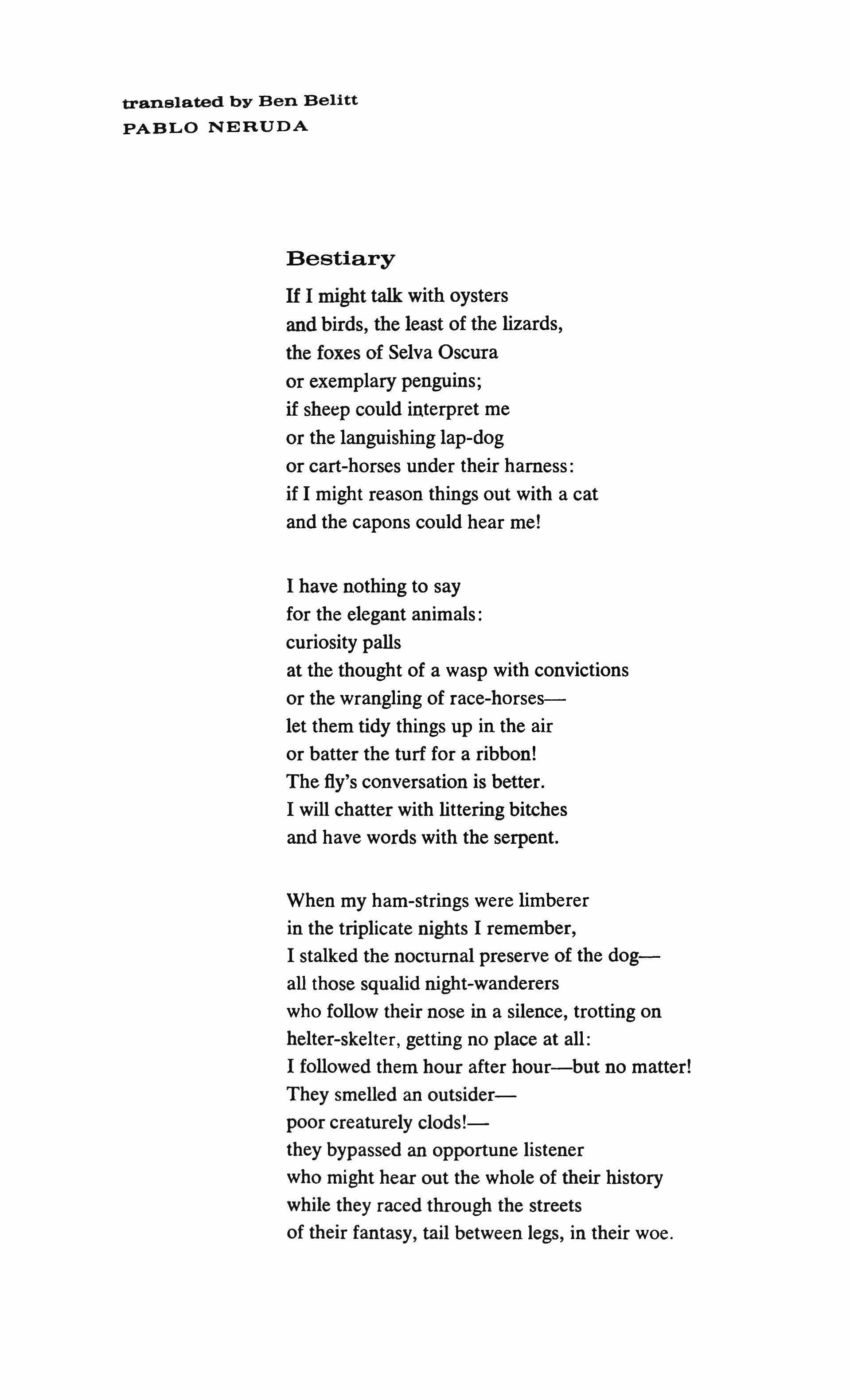
If I might talk: with oysters and birds, the least of the lizards, the foxes of Selva Oscura or exemplary penguins; if sheep could interpret me or the languishing lap-dog or cart-horses under their harness: if I might reason things out with a cat and the capons could hear me!
I have nothing to say for the elegant animals: curiosity palls at the thought of a wasp with convictions or the wrangling of race-horseslet them tidy things up in the air or batter the turf for a ribbon! The fly's conversation is better. I will chatter with littering bitches and have words with the serpent.
When my ham-strings were limberer in the triplicate nights I remember, I stalked the nocturnal preserve of the dogall those squalid night-wanderers who follow their nose in a silence, trotting on helter-skelter, getting no place at all: I followed them hour after hour-but no matter! They smelled an outsiderpoor creaturely clods!they bypassed an opportune listener who might hear out the whole of their history while they raced through the streets of their fantasy, tail between legs, in their woe.
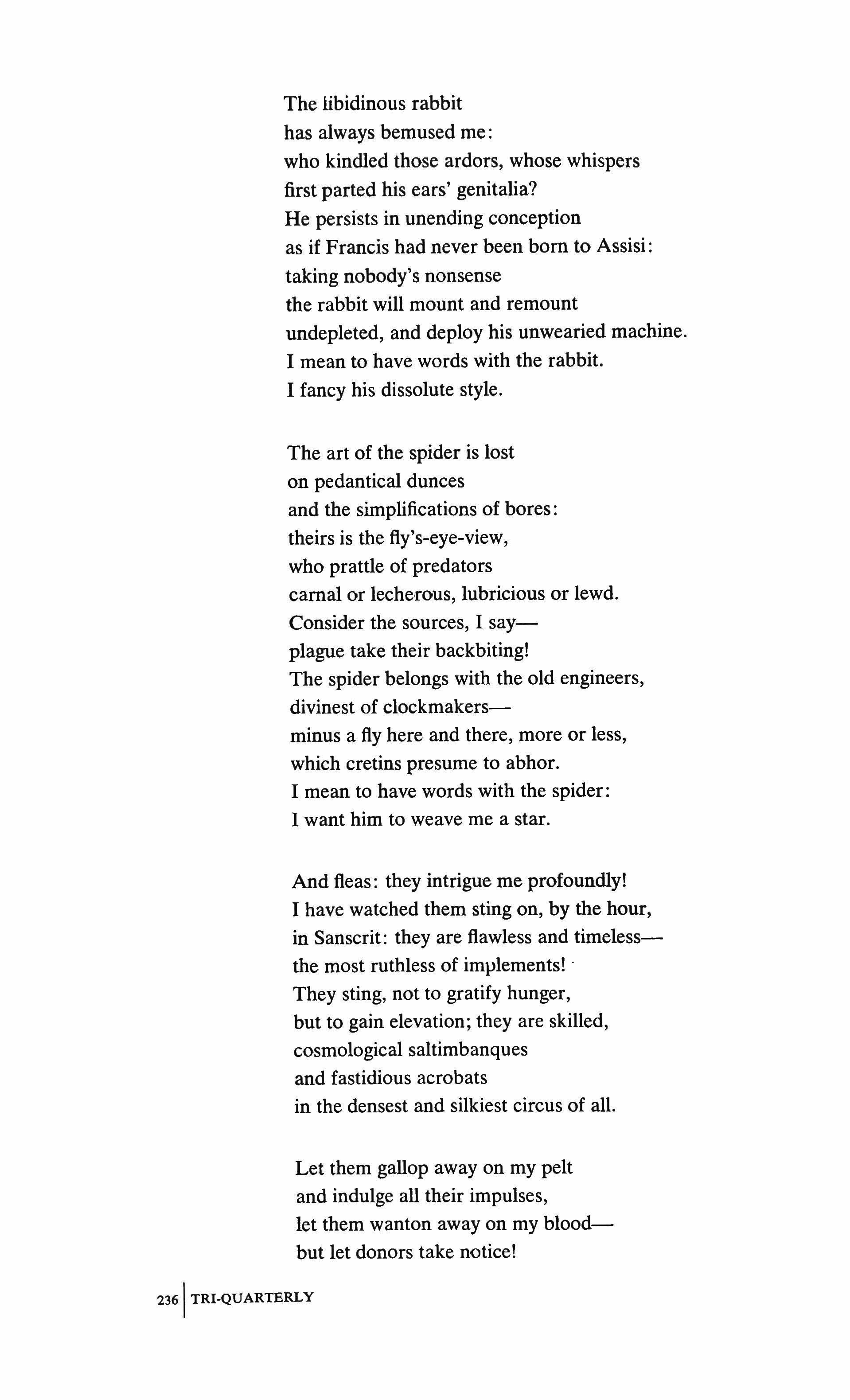
The libidinous rabbit has always bemused me: who kindled those ardors, whose whispers first parted his ears' genitalia? He persists in unending conception as if Francis had never been born to Assisi: taking nobody's nonsense the rabbit will mount and remount undepleted, and deploy his unwearied machine. I mean to have words with the rabbit. I fancy his dissolute style.
The art of the spider is lost on pedantical dunces and the simplifications of bores: theirs is the fly's-eye-view, who prattle of predators carnal or lecherous, lubricious or lewd. Consider the sources, I sayplague take their backbiting! The spider belongs with the old engineers, divinest of clockmakersminus a fly here and there, more or less, which cretins presume to abhor. I mean to have words with the spider: I want him to weave me a star.
And fleas: they intrigue me profoundly! I have watched them sting on, by the hour, in Sanscrit: they are flawless and timelessthe most ruthless of implements! They sting, not to gratify hunger, but to gain elevation; they are skilled, cosmological saltimbanques and fastidious acrobats in the densest and silkiest circus of all.
Let them gallop away on my pelt and indulge all their impulses, let them wanton away on my bloodbut let donors take notice!

I mean to get under their skins and confront my allegiances.
As to ruminants: my approaches have never been subtle or intimate: I count myself one of them, yet can hardly conceive how they muddle my meanings. This is a theme I must put out to pasture biting grass with the oxen and cows and munching on blueprints, with bulls. Somehow, I will gather their wisdomall the visceral things of this world, the clandestine passions that work in the dark, from within.
What is dawn to a hog?
With no talent for singing ,they hold up the dawn with their great, rosy bellies and sustain it on tough little hooves.
The hog holds up the dawn.
Night is devoured by the birds.
And the world of the morning is vacant: the spider sleeps sound, and the man and the dog and the wind: till a grunting of hogs rumbles forth; and it dawns.
I mean to have words with the hogs.
The dulcet, sonorous, gravel-voiced frogs! To be frog for a day!I who thrive on loquacityto be one with that wiry refinement of leaves in an emerald watercress world where frogs keep their house in the sky!
The frog's serenade rises up in my dream and bewitches my dreaming:
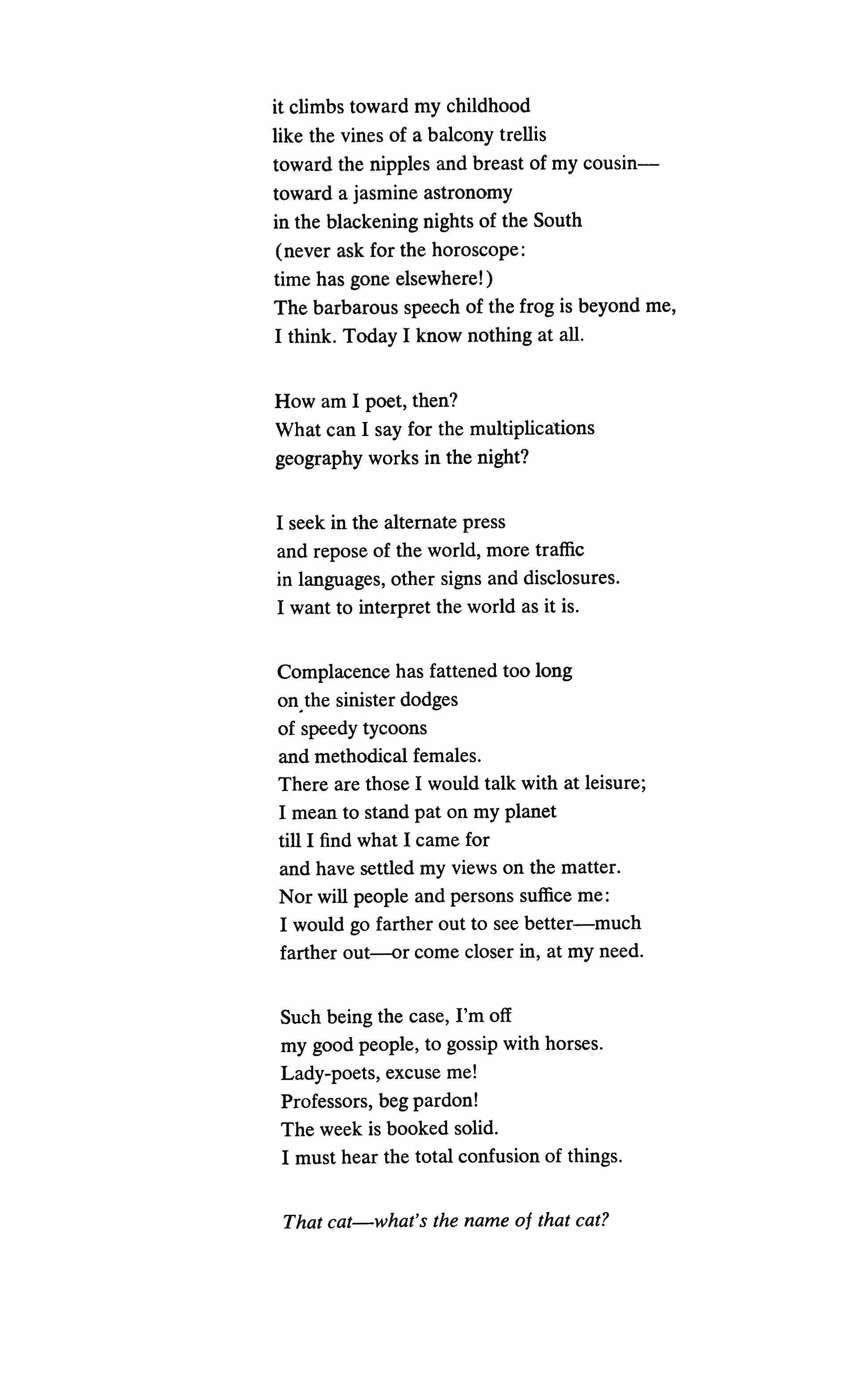
it climbs toward my childhood like the vines of a balcony trellis toward the nipples and breast of my cousintoward a jasmine astronomy in the blackening nights of the South (never ask for the horoscope: time has gone elsewhere!) The barbarous speech of the frog is beyond me, I think. Today I know nothing at all.
How am I poet, then? What can I say for the multiplications geography works in the night?
I seek in the alternate press and repose of the world, more traffic in languages, other signs and disclosures. I want to interpret the world as it is.
Complacence has fattened too long onthe sinister dodges of speedy tycoons and methodical females. There are those I would talk with at leisure; I mean to stand pat on my planet till I find what I came for and have settled my views on the matter. Nor will people and persons suffice me: I would go farther out to see better-much farther out-or come closer in, at my need.
Such being the case, I'm off my good people, to gossip with horses. Lady-poets, excuse me! Professors, beg pardon! The week is booked solid. I must hear the total confusion of things.
That cat-what's the name of that cat?
translated by Robert Bly PABLO NERUDA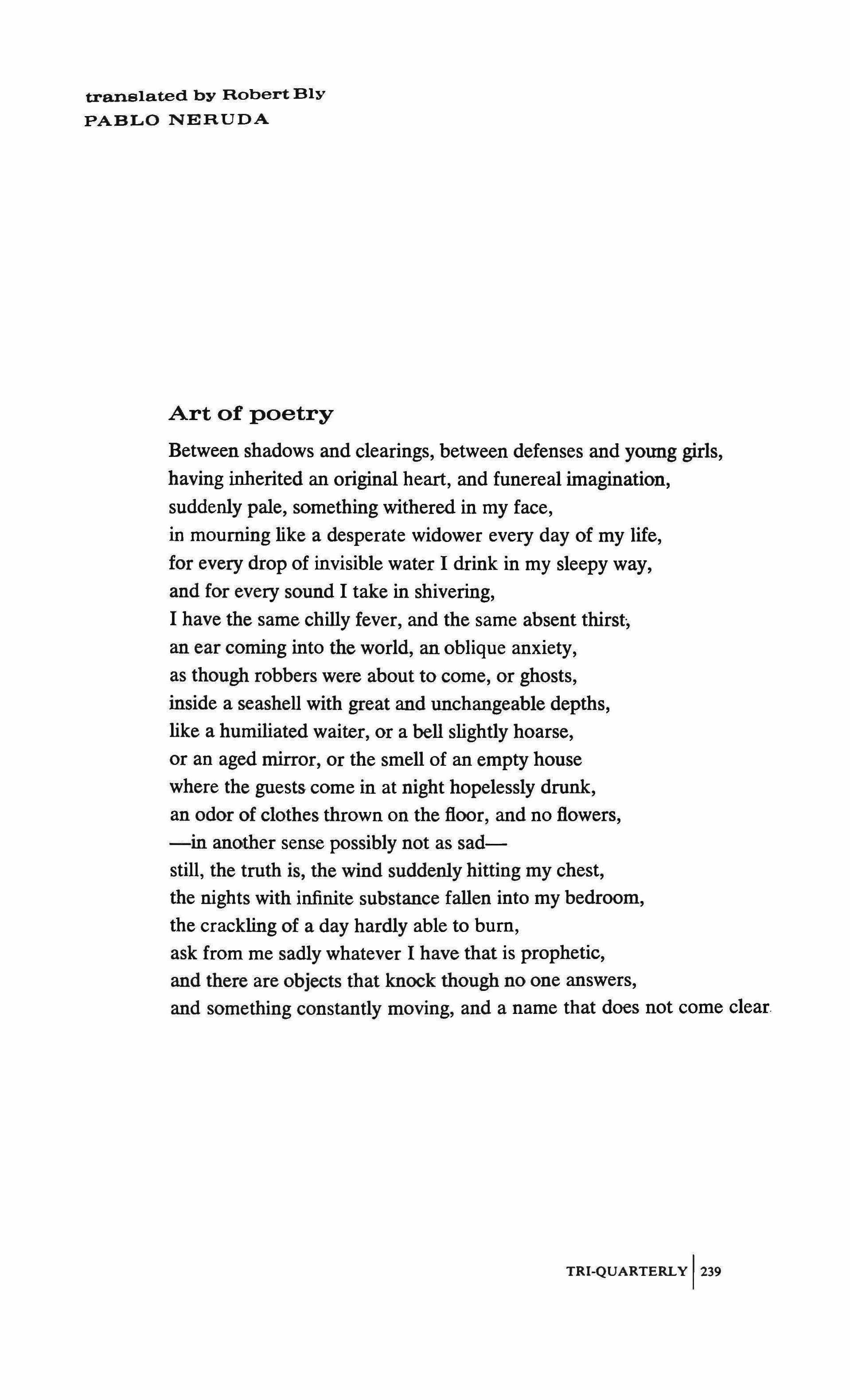
Between shadows and clearings, between defenses and young girls, having inherited an original heart, and funereal imagination, suddenly pale, something withered in my face, in mourning like a desperate widower every day of my life, for every drop of invisible water I drink in my sleepy way, and for every sound I take in shivering, I have the same chilly fever, and the same absent thirst, an ear coming into the world, an oblique anxiety, as though robbers were about to come, or ghosts, inside a seashell with great and unchangeable depths, like a humiliated waiter, or a bell slightly hoarse, or an aged mirror, or the smell of an empty house where the guests come in at night hopelessly drunk, an odor of clothes thrown on the floor, and no flowers, -in another sense possibly not as sadstill, the truth is, the wind suddenly hitting my chest, the nights with infinite substance fallen into my bedroom, the crackling of a day hardly able to bum, ask from me sadly whatever I have that is prophetic, and there are objects that knock though no one answers, and something constantly moving, and a name that does not come clear
They hate me, mama, those red draftees, just because 1 aim their way.
But that's where the targets are on those ranges we all must believe point east.
And they hate me too, my deadeyed sergeants, because 1 shiver and won't aim straight.
Why should I? The mansized targets are full of holes already. They fall
and you win no pink feathery dolls. Love here is dark, and harder.
My girls, their rooms full of dolls, know how to count in English the price of losing.
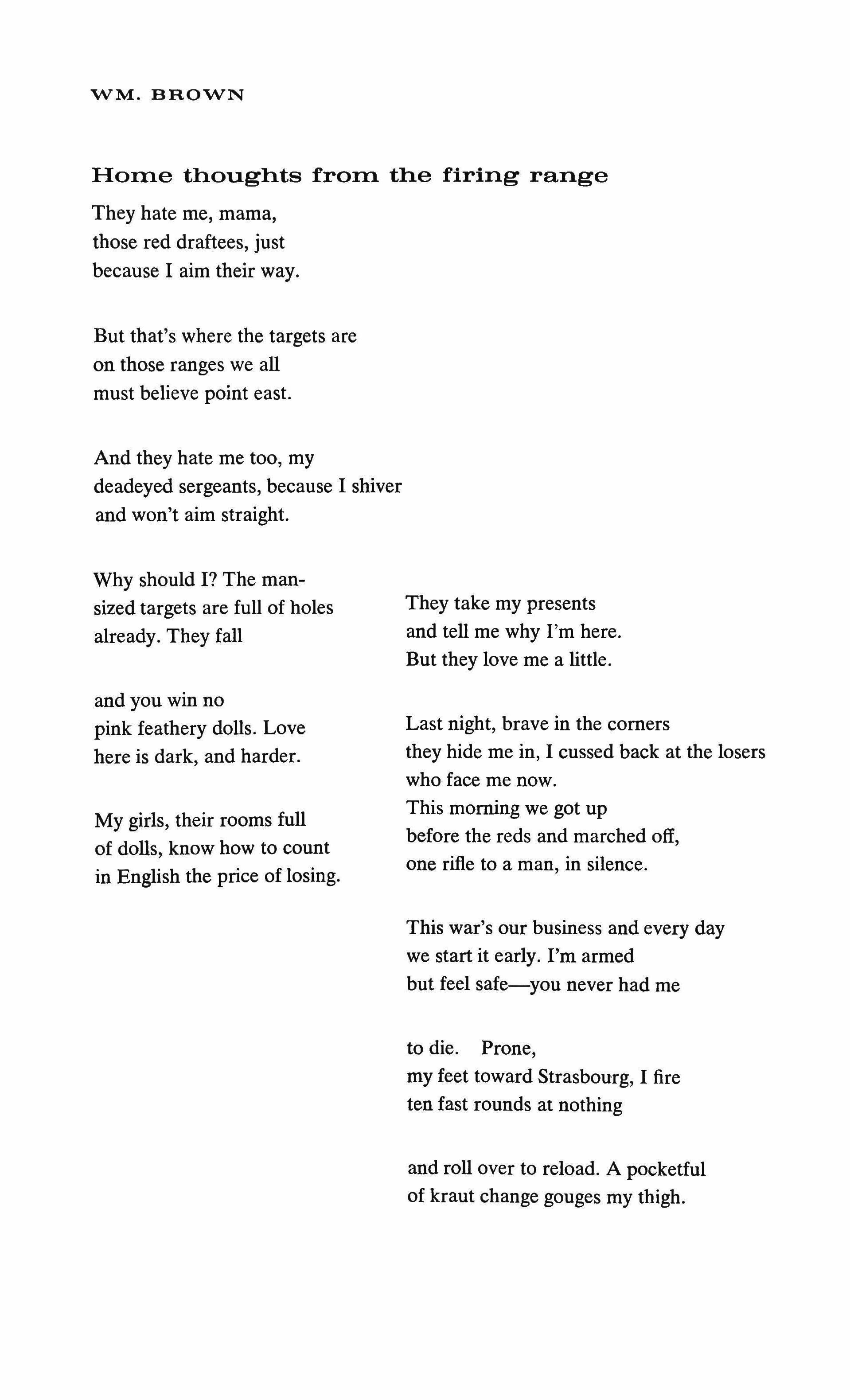
They take my presents and tell me why I'm here. But they love me a little.
Last night, brave in the comers they hide me in, 1 cussed back at the losers who face me now.
This morning we got up before the reds and marched off, one rifle to a man, in silence.
This war's our business and every day we start it early. I'm armed but feel safe-you never had me
to die. Prone, my feet toward Strasbourg, 1 fire ten fast rounds at nothing and roll over to reload. A pocketful of kraut change gouges my thigh.
I. Entropy Song: The Race Is Almost Meaningful
1
The day is opening like a fan. The gold is dimming anyhow. At first the gold looks infinite. The cold erodes it anyhow.
Above our cliff, below our cliff Two mirrors bounce back blue for blue. The dialogue looks infinite. Till water drinks the other blue.
The waves that get, the shores that give Don't really seesaw endlessly.
Yet evenings loiter wistfully:World, world, what wreath from soil so thin?
The roots replenish till the time They don't replenish. Many times
The warmth is gaining. All the time
The loss is gaining anyhow.
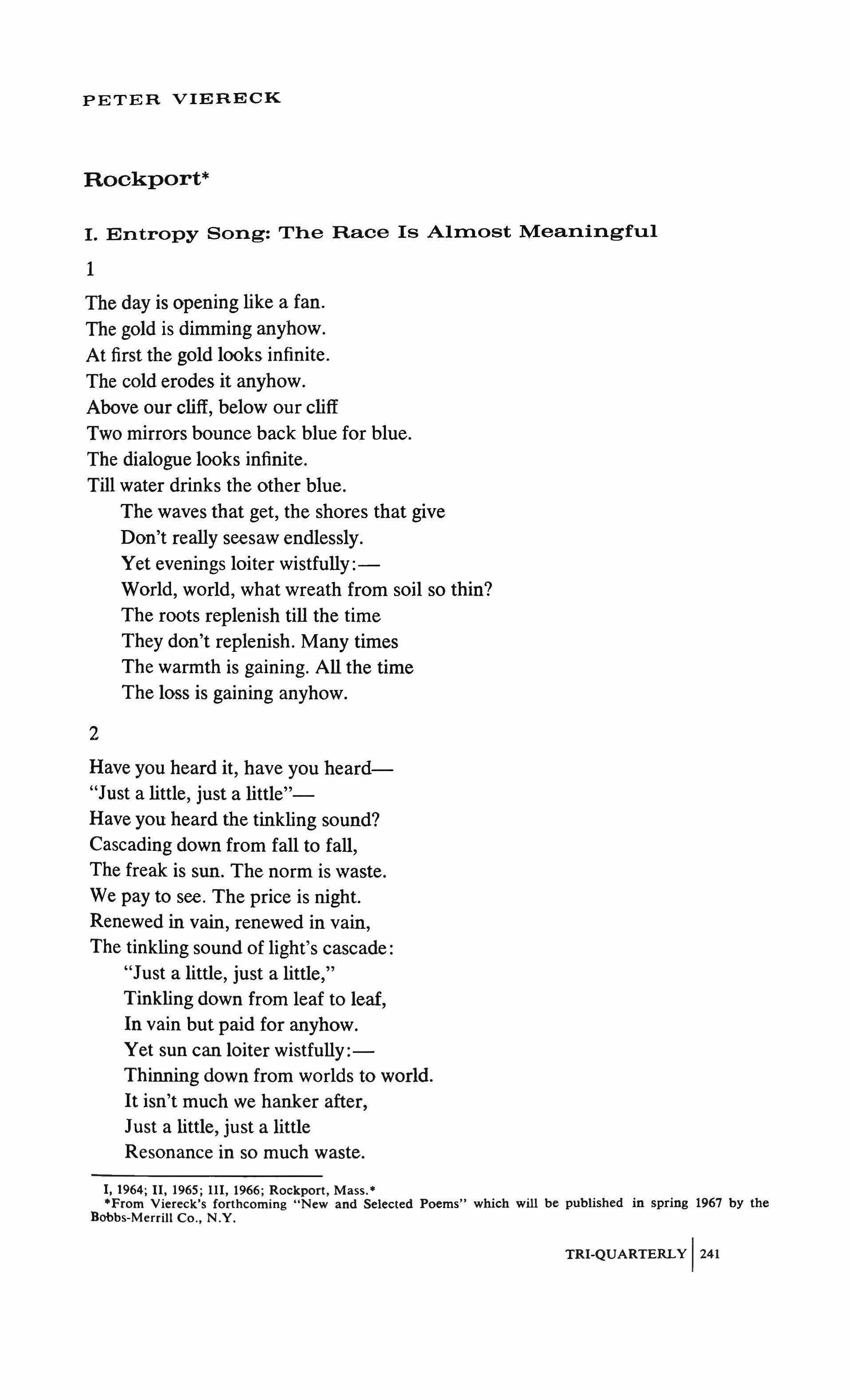
2
Have you heard it, have you heard"Just a little, just a little"-
Have you heard the tinkling sound? Cascading down from fall to fall, The freak is sun. The norm is waste. We pay to see. The price is night. Renewed in vain, renewed in vain, The tinkling sound of light's cascade: "Just a little, just a little," Tinkling down from leaf to leaf, In vain but paid for anyhow. Yet sun can loiter wistfully:
Thinning down from worlds to world. It isn't much we hanker after, Just a little, just a little Resonance in so much waste.
I, 1964; II, 1965; III, 1966; Rockport, Mass.>
"From Viereck's forthcoming "New and Selected Poems" which will be published in spring 1967 by the Bobbs-Merrill Co., N.Y.
The day skims many little days
Like porpoises from wave to wave. Again the peacock spreads its tail Across the night. Till night spreads too. One Light resounding-have you heard?Relieves all weight, renews all clocks. Till running down outweighs them all. Yet evenings loiter wistfully:World, world what tune for so much loss? What makes your thin-soiled marshland skim
A hopeless rose from June to June? What keeps feet running to your edge? The race is almost meaningful. The edge is ebbing anyhow. Again, again the peacock tail. The stars are cooling anyhow.
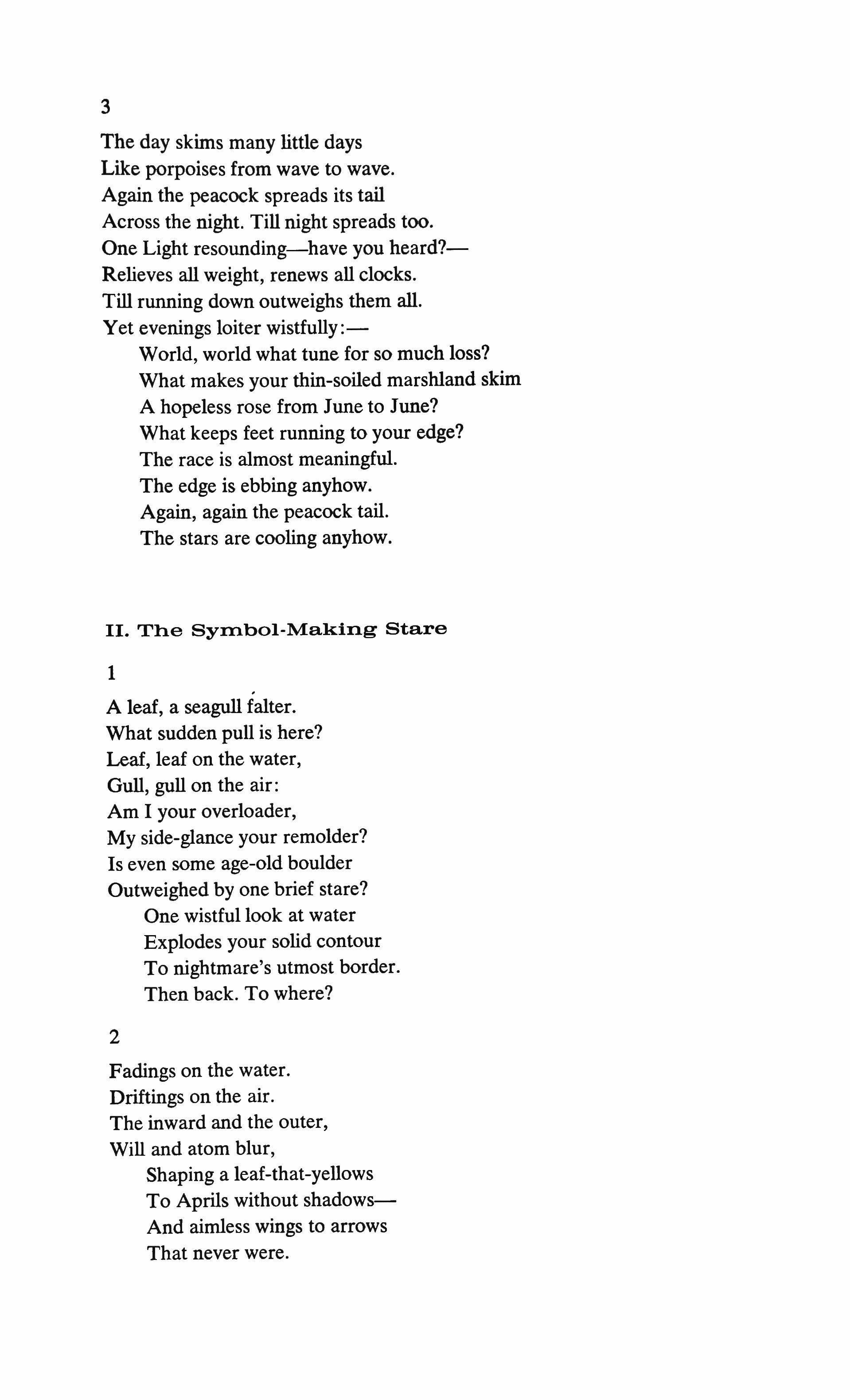
1
A leaf, a seagull falter. What sudden pull is here?
Leaf, leaf on the water, Gull, gull on the air: Am I your overloader, My side-glance your remolder? Is even some age-old boulder Outweighed by one brief stare? One wistful look at water
Explodes your solid contour To nightmare's utmost border. Then back. To where?
2
Fadings on the water. Driftings on the air. The inward and the outer, Will and atom blur, Shaping a leaf-that-yellows To Aprils without shadowsAnd aimless wings to arrows That never were.
Waif bob-bobbing on water.
Wisp fluffing on air.
Fantasy's flickering halter
Of gossamer
Tugs--and a whole world's shimmer
Obeys an eyelid's tremor.
And sun, blind sun, seems dimmer
Than inward flare.
4
That symbol-making stare!
More weight than wings can bear.
More wing than wings can bear.
No shell can hold the meaning
That seeming gives to being;
Eon of overreaching,
Of trance that thirsts while feeding, The story of man is there. Is there to fill and alter The leaf, leaf on the water, The seagull on the air.
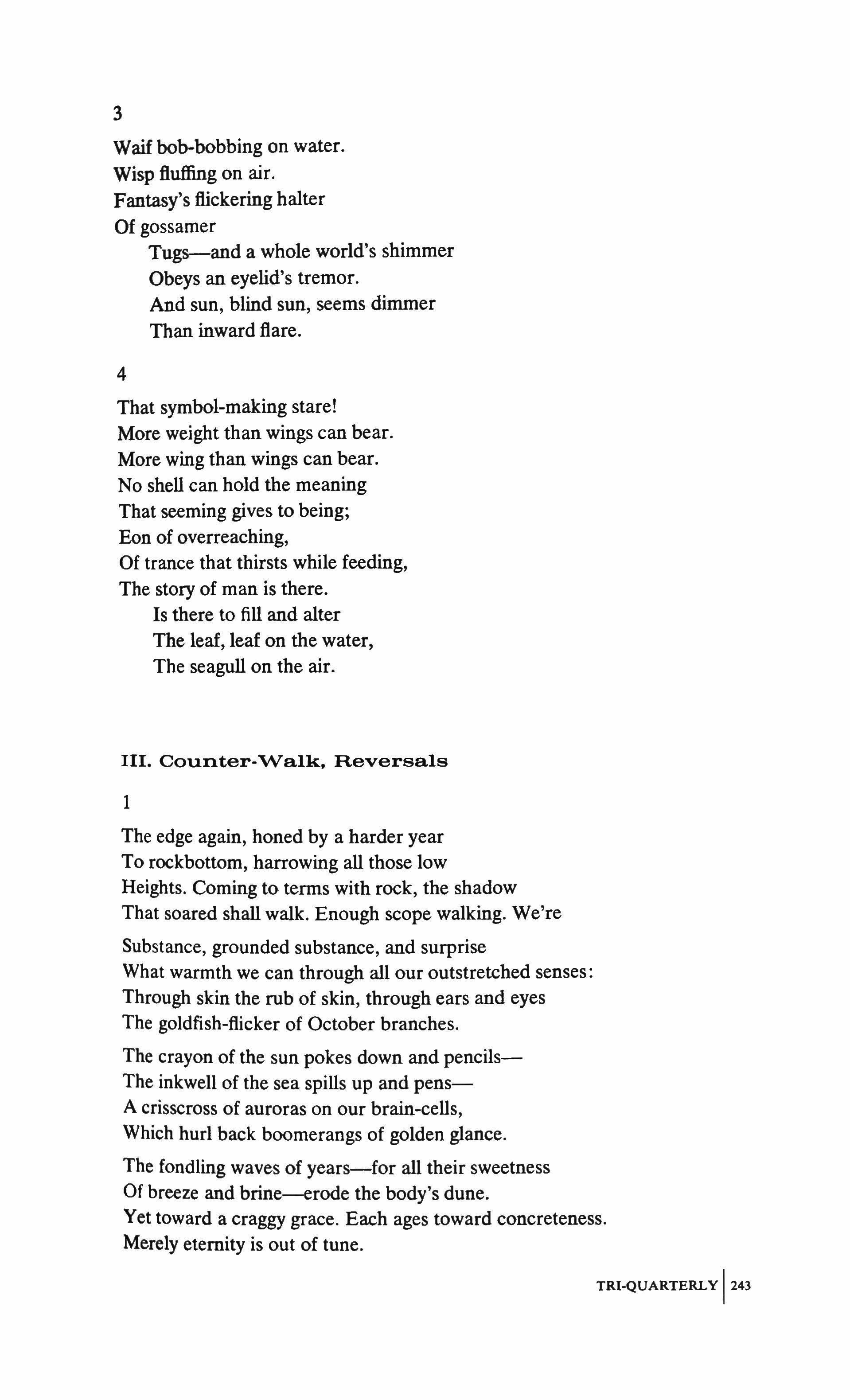
III. Counter-Walk, Reversals
The edge again, honed by a harder year
To rockbottom, harrowing all those low Heights. Coming to terms with rock, the shadow That soared shall walk. Enough scope walking. We're Substance, grounded substance, and surprise
What warmth we can through all our outstretched senses: Through skin the rub of skin, through ears and eyes
The goldfish-flicker of October branches.
The crayon of the sun pokes down and pencils
The inkwell of the sea spills up and pensA crisscross of auroras on our brain-cells, Which hurl back boomerangs of golden glance.
The fondling waves of years--for all their sweetness
Of breeze and brine--erode the body's dune.
Yet toward a craggy grace. Each ages toward concreteness. Merely eternity is out of tune.
TRI-QUARTERLY 1243
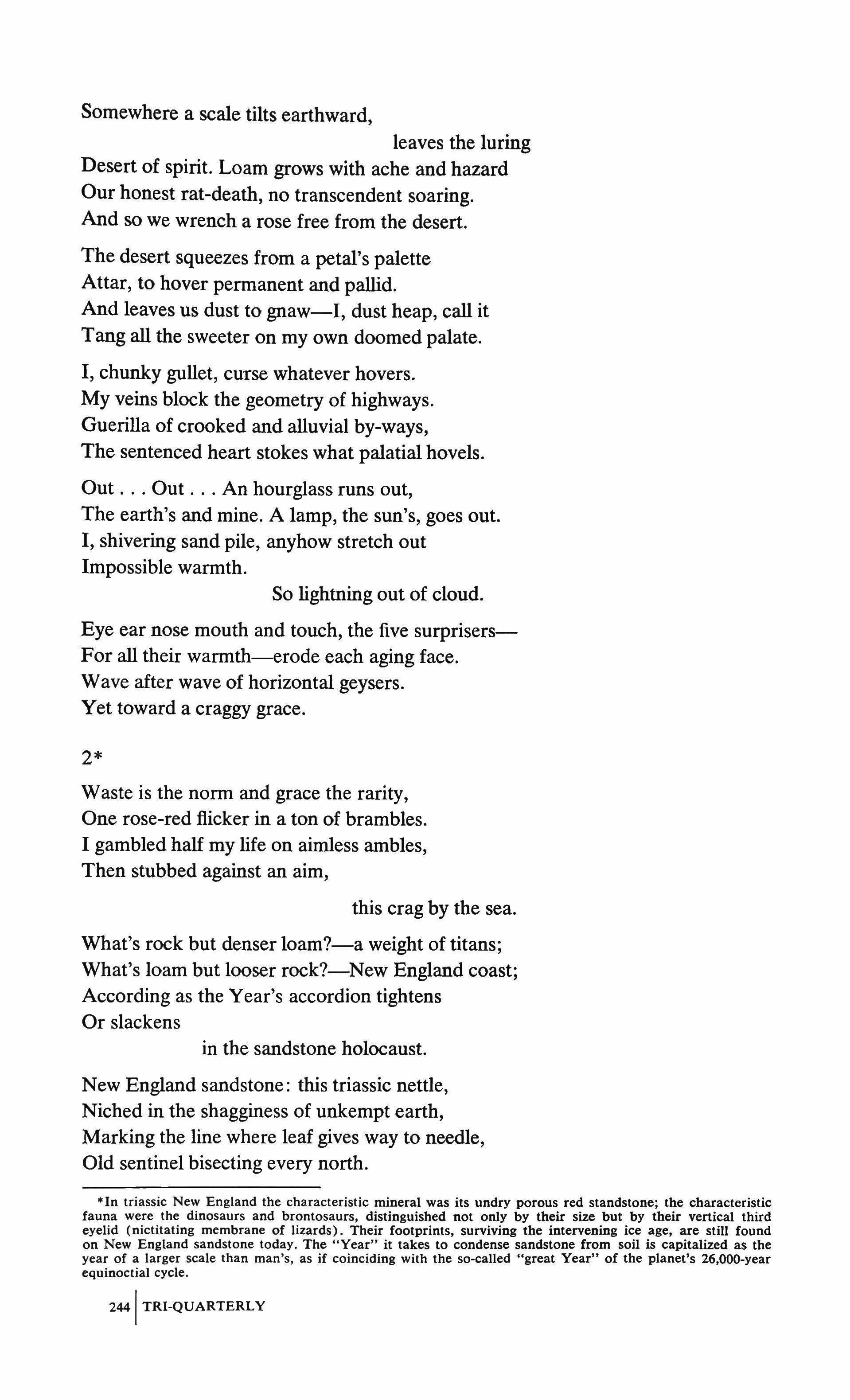
Somewhere a scale tilts earthward, leaves the luring
Desert of spirit. Loam grows with ache and hazard
Our honest rat-death, no transcendent soaring. And so we wrench a rose free from the desert.
The desert squeezes from a petal's palette Attar, to hover permanent and pallid.
And leaves us dust to gnaw-I, dust heap, call it Tang all the sweeter on my own doomed palate.
I, chunky gullet, curse whatever hovers. My veins block the geometry of highways. Guerilla of crooked and alluvial by-ways, The sentenced heart stokes what palatial hovels.
Out Out An hourglass runs out, The earth's and mine. A lamp, the sun's, goes out. I, shivering sand pile, anyhow stretch out Impossible warmth.
So lightning out of cloud.
Eye ear nose mouth and touch, the five surprisersFor all their warmth-erode each aging face.
Wave after wave of horizontal geysers.
Yet toward a craggy grace.
2*
Waste is the norm and grace the rarity, One rose-red flicker in a ton of brambles.
I gambled half my life on aimless ambles, Then stubbed against an aim,
this crag by the sea.
What's rock but denser loam?-a weight of titans; What's loam but looser rock?-New England coast; According as the Year's accordion tightens Or slackens in the sandstone holocaust.
New England sandstone: this triassic nettle, Niched in the shagginess of unkempt earth, Marking the line where leaf gives way to needle, Old sentinel bisecting every north.
In triassic New England the characteristic mineral was its undry porous red standstone; the characteristic fauna were the dinosaurs and brontosaurs, distinguished not only by their size but by their vertical third eyelid (nictitating membrane of lizards). Their footprints, surviving the intervening ice age, are still found on New England sandstone today. The "Year" it takes to condense sandstone from soil is capitalized as the year of a larger scale than man's, as if coinciding with the so-called "great Year" of the planet's 26,OOO-year equinoctial cycle.

Such bulk cleaves more than merely firs from birches. Sheer unabstractable substance rolls in vengeance
The past as avalanches; the future lurches; The ice-age rolls upon the age of engines
A stony message: that there is no message. To will what isn't or what is?-no passage Between two halves of seeing, as if scissored
By nictitations of a thunder lizard.
Still vibrant from the trample of the saurians
Though drowsed of late beneath our pygmy tread, Stone's layered eons warn the soul's historians How truthful and how venerable is mud-
And just how brash is soul, not grace of rocks
But flutter-flutter Grace of Golden Treasury "pinions", Newfangled bootstrap of the simians, An interloper meddling forth sermoned brooks:
Upholstering the emptiness of heaven, Injecting emptiness in tomb and hearse, The taxidermist of the universe
A scale reverses. Nothingness is heavy.
3
Crossroads. My road tilts-where? Evade it? I, Being both mud and air does choose mean die? But sullen winds are swelling from the sea.
And if I tilt no scales, the scales tilt me.
Then armed with vocatives shall I call rock "you"?
Invokings force a soul on you, 0 boulder. Consciousness, just by being your beholder, Demotes you to a symbol's retinue.
How many solstices and equinoxes
You've slept through, huddled seed in stolid erasTill annexationist man, unlocking boxes, Walks by. Potentials quicken. Sleepers hear us:-
A droning, a terrible underground droning, the buried Cicada hunger, dry wings flexing: burrowed Abstraction, the late-born desert. Here to tame This lithic balled fist of time.
Solidity hangs by a thread. When all's in deadlock, Even a mote-by choosing-tips the balance.
Can I still sense, not shape, just sense your bedrock? Or shall I choose to will with sculptor talons
Timeless mirage and with a sculptor's hatred (Autumn and ebb and entropy undone)
Force meaning on you and hack unsatiated Till stoniness is gutted out of stone?
Earth seems to offer us so gold an orchard
But locked in seeds, till hammered forth in torment. And so with fruits of air, in dream-pods dormant. Shall it not tempt that all be upward tortured-
By hammer, hammer, hammer-to almost sky?
When all's hallucinated what's one more lie? It tempts, it tempts (that symbol-making stare). RESIST. STAY STONE.
Well, we have got this far.
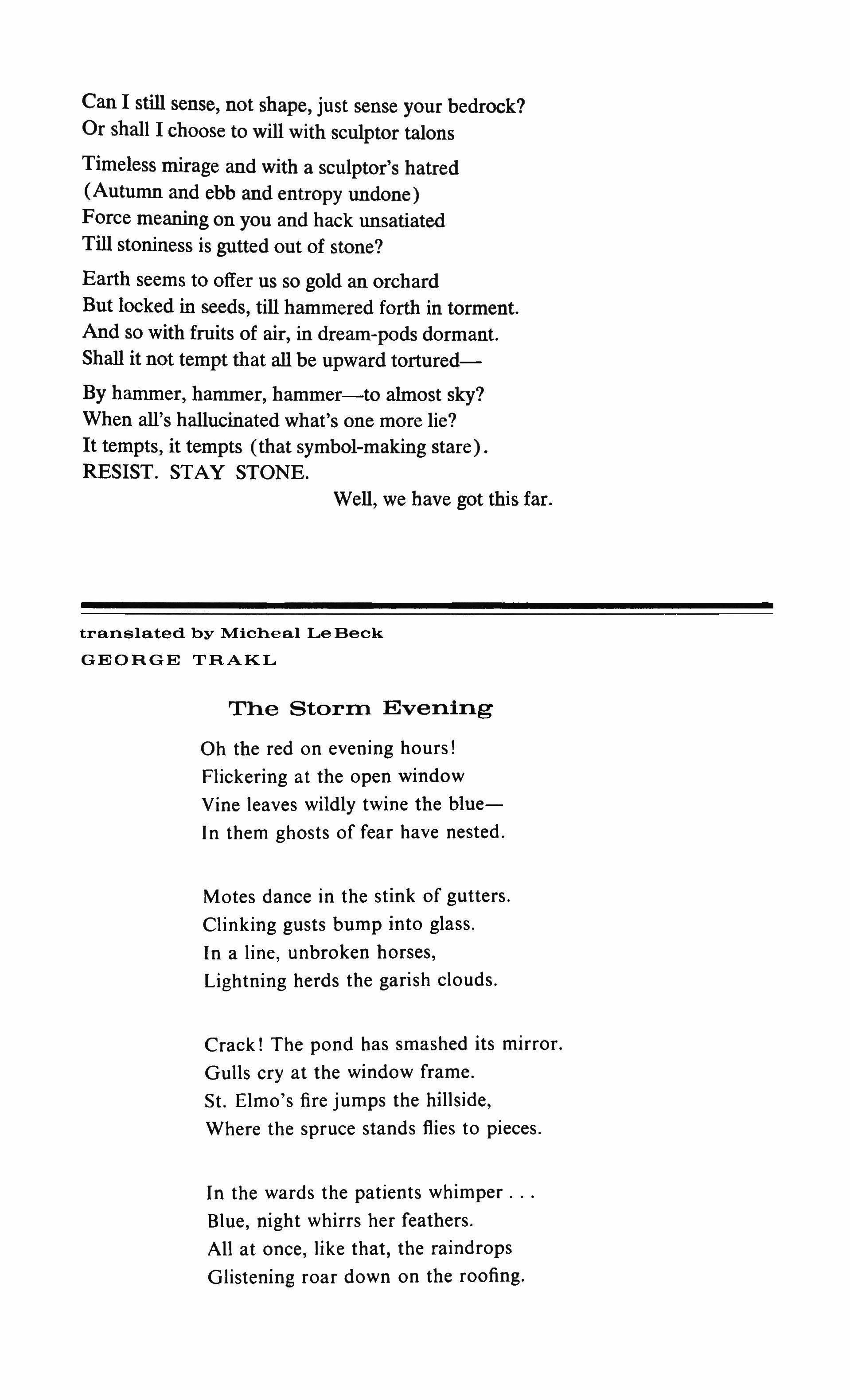 translated by Micheal Le Beck GEORGE TRAKL
translated by Micheal Le Beck GEORGE TRAKL
Oh the red on evening hours!
Flickering at the open window
Vine leaves wildly twine the blueIn them ghosts of fear have nested.
Motes dance in the stink of gutters. Clinking gusts bump into glass. In a line, unbroken horses, Lightning herds the garish clouds.
Crack! The pond has smashed its mirror. Gulls cry at the window frame.
St. Elmo's fire jumps the hillside, Where the spruce stands flies to pieces.
In the wards the patients whimper Blue, night whirrs her feathers. All at once, like that, the raindrops Glistening roar down on the roofing.
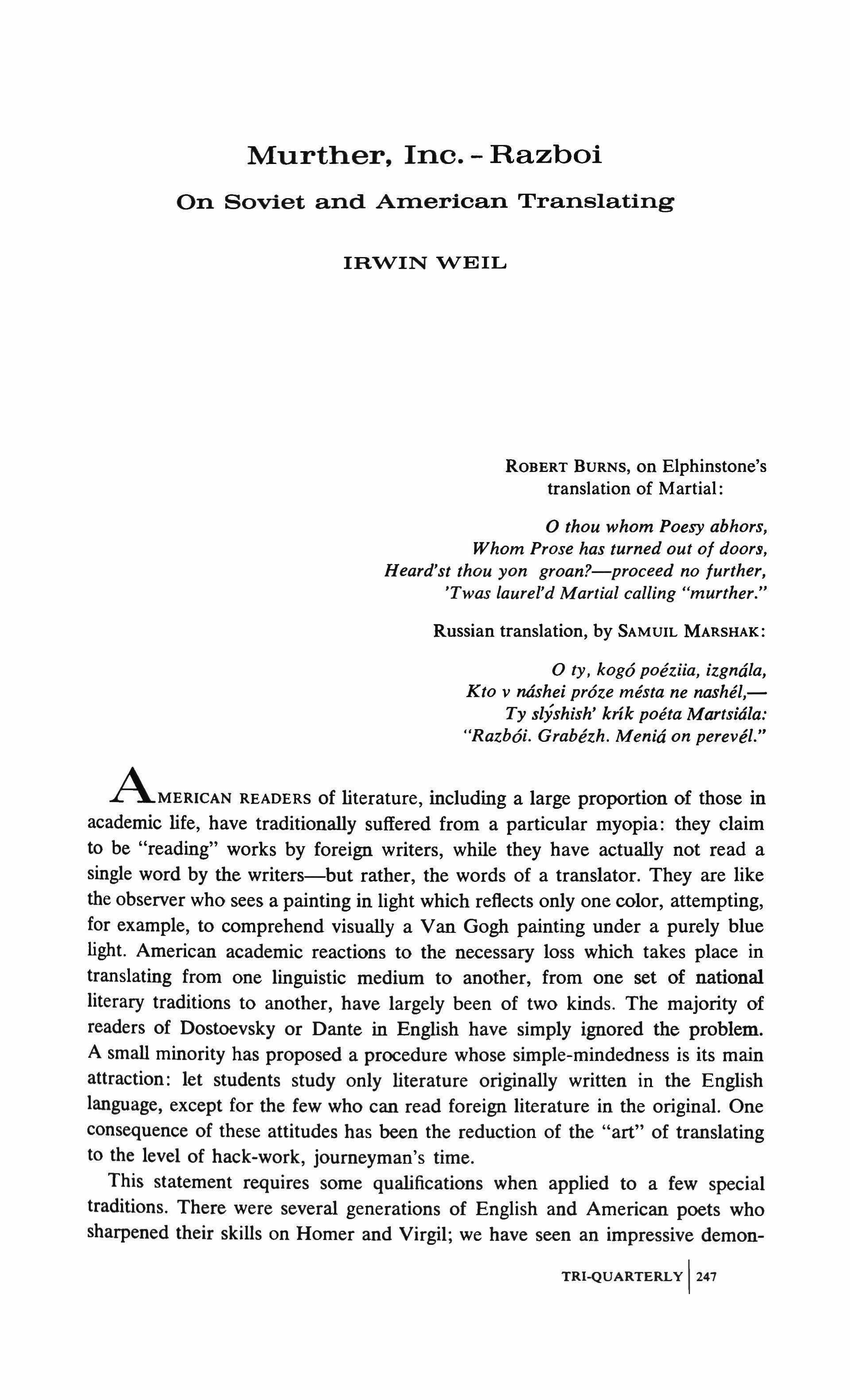
ROBERT BURNS, on Elphinstone's translation of Martial:
o thou whom Poesy abhors, Whom Prose has turned out of doors, Heard'st thou yon groan?-proceed no further, 'Twas laurel'd Martial calling "murther:"
Russian translation, by SAMUIL MARSHAK:
o ty, kog6 poeziia, izgndla, Kto v ndshei proze mesta ne nashel=« Ty slyshish' krik poeta Martsidla: "Razboi. Grabezh. Menid on perevel:"
READERS of literature, including a large proportion of those in academic life, have traditionally suffered from a particular myopia: they claim to be "reading" works by foreign writers, while they have actually not read a single word by the writers-but rather, the words of a translator. They are like the observer who sees a painting in light which reflects only one color, attempting, for example, to comprehend visually a Van Gogh painting under a purely blue light. American academic reactions to the necessary loss which takes place in translating from one linguistic medium to another, from one set of national literary traditions to another, have largely been of two kinds. The majority of readers of Dostoevsky or Dante in English have simply ignored the problem. A small minority has proposed a procedure whose simple-rnindedness is its main attraction: let students study only literature originally written in the English language, except for the few who can read foreign literature in the original. One consequence of these attitudes has been the reduction of the "art" of translating to the level of hack-work, journeyman's time.
This statement requires some qualifications when applied to a few special traditions. There were several generations of English and American poets who sharpened their skills on Homer and Virgil; we have seen an impressive demon-
TRI-QUARTERLy 1247

stration in the last few years of the organic, controversial, lively tradition of Biblical translation: many changes of words in the New Revised Translation provoked strong controversey, because large numbers of people held these words dear.
In the general field of foreign literature, however, these are exceptions, and they applied hardly at all, for over a hundred years, to English versions of Russian literature. Up to 1958, the number of American and English students interested in the Russian language was pitifully small. Then, in 1957, came an event that may still loom large on the literary horizon of the twentieth century: not poetry, but the aftermath of a celestial basketball, "sputnik"." Our students were not interested in studying Russian by Pushkin or Tolstoy-but they did respond, by the thousands, to sputnik. Perhaps this fact alone is sufficient commentary on the quality of our literary academic life (and the life of the translator) in the twentieth century!
Nevertheless, for whatever the reason, American interest in Russian and in the problems of translating literature from Russian, have increased swiftly and dramatically. Today Vladimir Nabokov, the talented son of a famous Russian family of Anglophiles, an eminent writer in three modem literary cultures, can swing his literary club about him in all directions, on a subject almost entirely unfamiliar to most of the English speaking literary world five years ago-Pushkin's Evgenii Onegin. To the delight of the previously ignored Slavists, he provokes popular mayhem, arousing the polemical ire of Edmund Wilson, battered weather cock of the American literary world. Counter charge follows charge, and the bemused, perhaps confused;" reader might almost believe the arguments concerned the connotations of the Hebrew word for "young girl." Still, despite the wounded feelings in the controversy, the final winner will be Pushkin, the great genius of the early nineteenth century; a better background in his works can only profit American readers. Moreover, more modem, perhaps less known Russian poets are also beginning to receive their due from American poets. Robert Lowell has published some finely reworked English versions of Pasternak and of Mandelshtam, the latter an extraordinarily powerful poet killed by Stalin's men and almost unknown in America until the last two years. W. H. Auden and William Jay Smith, among others, have contributed fine translations and reworkings of poems by Andrei Voznesensky, who has apeared on many American university stages. Patricia Blake and Max Hayward are undoubtedly again applying their sensitive and creative editorial work to other Soviet poets and prose writers. There are, of course, differences in style and approach, as well as temperament, among such vastly different poets. They range from the sonorous to the tight-lipped staccato. Together, however, they represent the beginning of a new, and generally serious interest in Russian poetry for Americans. That this
'Russian literature was ahead of its time. The first sputnik was launched by F. M. Dostoevsky, in The Brothers Karamazov. in the scene where Ivan talks with the Devil. A thrown axe became a sputnik, according to the laws of physics quoted by the Devil. The Devil's sputnik, however, had little immediate technological impact.
'For both professionally adequate and personally charitable analyses of the Onegin contretemps, see two articles: E. 1. Brown "Nabokov and Pushkin,' Slavic Review. Vol. XXIV, No.4, December 1965. Alexander Gerschenkron, "A Manufactured Monument?", Modern Philology, Vol. LXIII, No.4, May 1966.
TRI-QUARTERLY
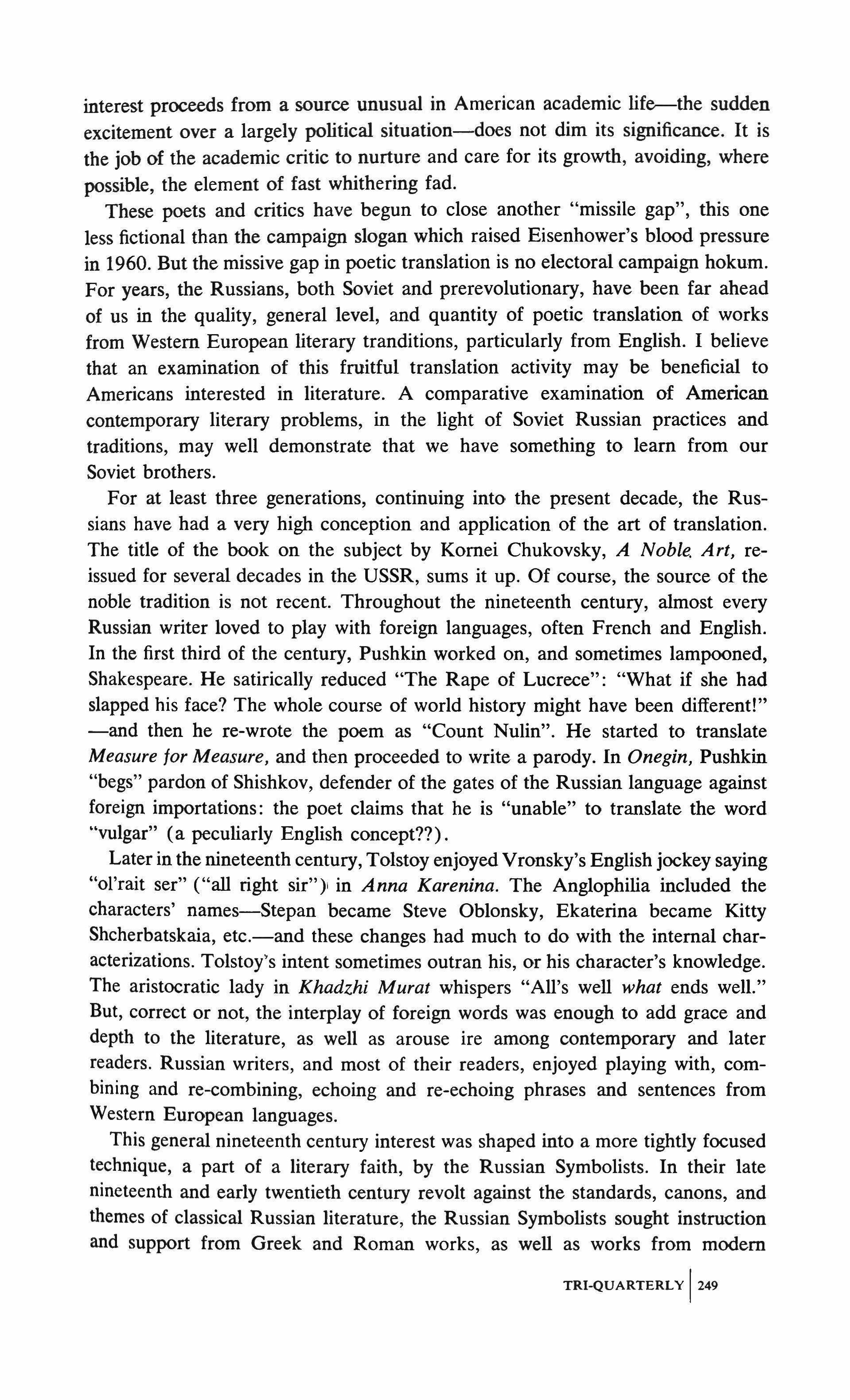
interest proceeds from a source unusual in American academic life--the sudden excitement over a largely political situation-does not dim its significance. It is the job of the academic critic to nurture and care for its growth, avoiding, where possible, the element of fast whithering fad.
These poets and critics have begun to close another "missile gap", this one less fictional than the campaign slogan which raised Eisenhower's blood pressure in 1960. But the missive gap in poetic translation is no electoral campaign hokum. For years, the Russians, both Soviet and prerevolutionary, have been far ahead of us in the quality, general level, and quantity of poetic translation of works from Western European literary tranditions, particularly from English. I believe that an examination of this fruitful translation activity may be beneficial to Americans interested in literature. A comparative examination of American contemporary literary problems, in the light of Soviet Russian practices and traditions, may well demonstrate that we have something to learn from our Soviet brothers.
For at least three generations, continuing into the present decade, the Russians have had a very high conception and application of the art of translation. The title of the book on the subject by Kornei Chukovsky, A Noble. Art, reissued for several decades in the USSR, sums it up. Of course, the source of the noble tradition is not recent. Throughout the nineteenth century, almost every Russian writer loved to play with foreign languages, often French and English. In the first third of the century, Pushkin worked on, and sometimes lampooned, Shakespeare. He satirically reduced "The Rape of Lucrece": "What if she had slapped his face? The whole course of world history might have been different!" -and then he re-wrote the poem as "Count Nulin". He started to translate Measure for Measure, and then proceeded to write a parody. In Onegin, Pushkin "begs" pardon of Shishkov, defender of the gates of the Russian language against foreign importations: the poet claims that he is "unable" to translate the word "vulgar" (a peculiarly English concept??).
Later in the nineteenth century, TolstoyenjoyedVronsky'sEnglish jockey saying "ol'rait ser" ("all right sir") in Anna Karenina. The Anglophilia included the characters' names-Stepan became Steve Oblonsky, Ekaterina became Kitty Shcherbatskaia, etc.-and these changes had much to do with the internal characterizations. Tolstoy's intent sometimes outran his, or his character's knowledge. The aristocratic lady in Khadzhi Murat whispers "All's well what ends well." But, correct or not, the interplay of foreign words was enough to add grace and depth to the literature, as well as arouse ire among contemporary and later readers. Russian writers, and most of their readers, enjoyed playing with, combining and re-combining, echoing and re-echoing phrases and sentences from Western European languages.
This general nineteenth century interest was shaped into a more tightly focused technique, a part of a literary faith, by the Russian Symbolists. In their late nineteenth and early twentieth century revolt against the standards, canons, and themes of classical Russian literature, the Russian Symbolists sought instruction and support from Greek and Roman works, as well as works from modem
y 1249
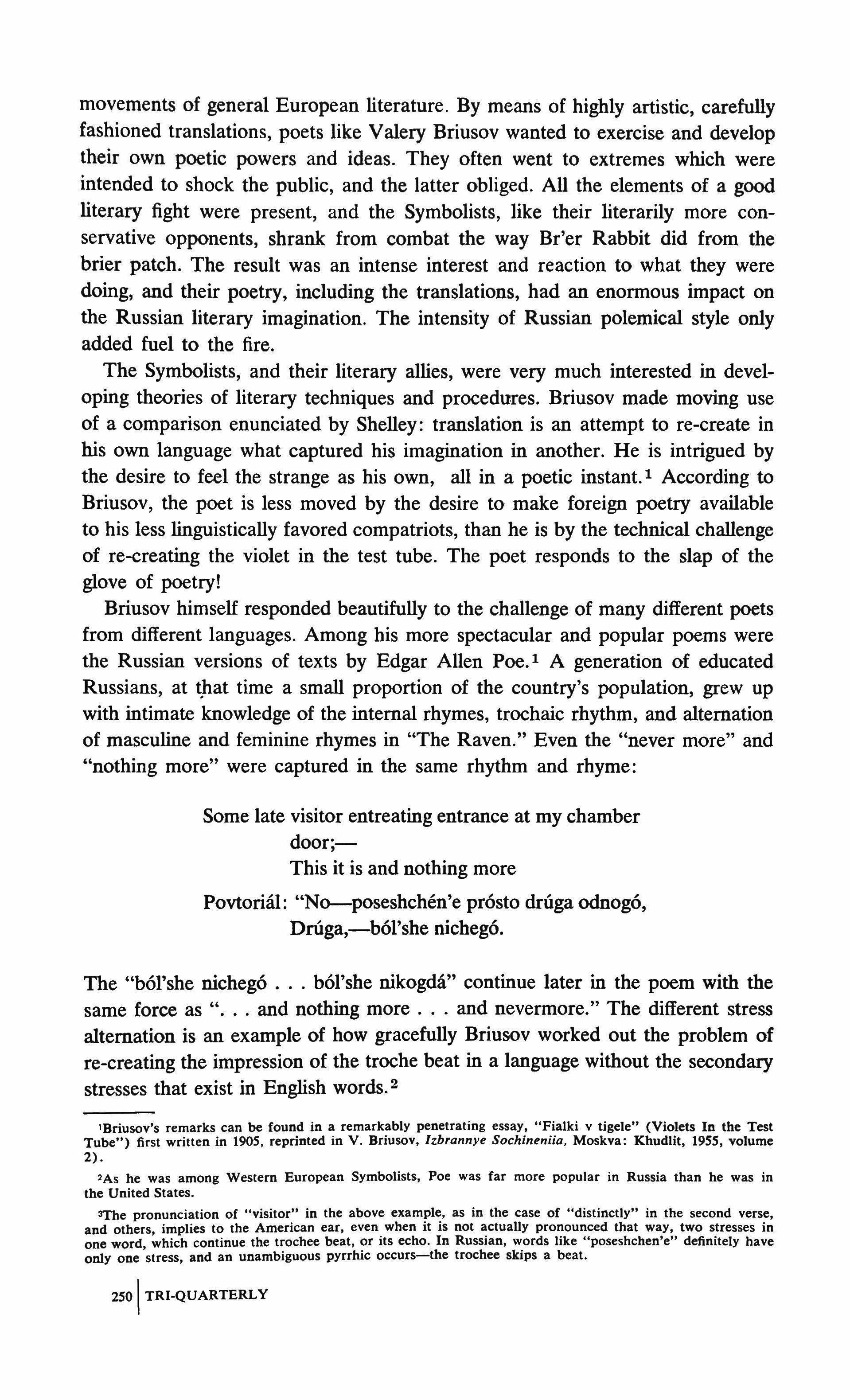
movements of general European literature. By means of highly artistic, carefully fashioned translations, poets like Valery Briusov wanted to exercise and develop their own poetic powers and ideas. They often went to extremes which were intended to shock the public, and the latter obliged. All the elements of a good literary fight were present, and the Symbolists, like their literarily more conservative opponents, shrank from combat the way Br'er Rabbit did from the brier patch. The result was an intense interest and reaction to what they were doing, and their poetry, including the translations, had an enormous impact on the Russian literary imagination. The intensity of Russian polemical style only added fuel to the fire.
The Symbolists, and their literary allies, were very much interested in developing theories of literary techniques and procedures. Briusov made moving use of a comparison enunciated by Shelley: translation is an attempt to re-create in his own language what captured his imagination in another. He is intrigued by the desire to feel the strange as his own, all in a poetic instant.! According to Briusov, the poet is less moved by the desire to make foreign poetry available to his less linguistically favored compatriots, than he is by the technical challenge of re-creating the violet in the test tube. The poet responds to the slap of the glove of poetry!
Briusov himself responded beautifully to the challenge of many different poets from different languages. Among his more spectacular and popular poems were the Russian versions of texts by Edgar Allen Poe.! A generation of educated Russians, at that time a small proportion of the country's population, grew up with intimate knowledge of the internal rhymes, trochaic rhythm, and alternation of masculine and feminine rhymes in "The Raven." Even the "never more" and "nothing more" were captured in the same rhythm and rhyme:
Some late visitor entreating entrance at my chamber door;-
This it is and nothing more
Povtorial: "No-s-poseshchen'e presto dniga odnog6, Druga.c-bol'she nicheg6.
The "b61'she nicheg6
b61'she nikogda" continue later in the poem with the same force as ". and nothing more and nevermore." The different stress alternation is an example of how gracefully Briusov worked out the problem of re-creating the impression of the troche beat in a language without the secondary stresses that exist in English words. 2
'Briusov's remarks can be found in a remarkably penetrating essay, "Fialki v tigele" (Violets In the Test Tube") first written in 1905, reprinted in V. Briusov, Lzbrannye Sochineniia, Moskva: Khudlit, 1955, volume 2).
'As he was among Western European Symbolists, Poe was far more popular in Russia than he was in the United States.
3"fhe pronunciation of "visitor" in the above example, as in the case of "distinctly" in the second verse, and others, implies to the American ear, even when it is not actually pronounced that way, two stresses in one word, which continue the trochee beat, or its echo. In Russian, words like "poseshchen'e" definitely have only one stress, and an unambiguous pyrrhic occurs-the trochee skips a beat. 250 I TRI-QUARTERLY
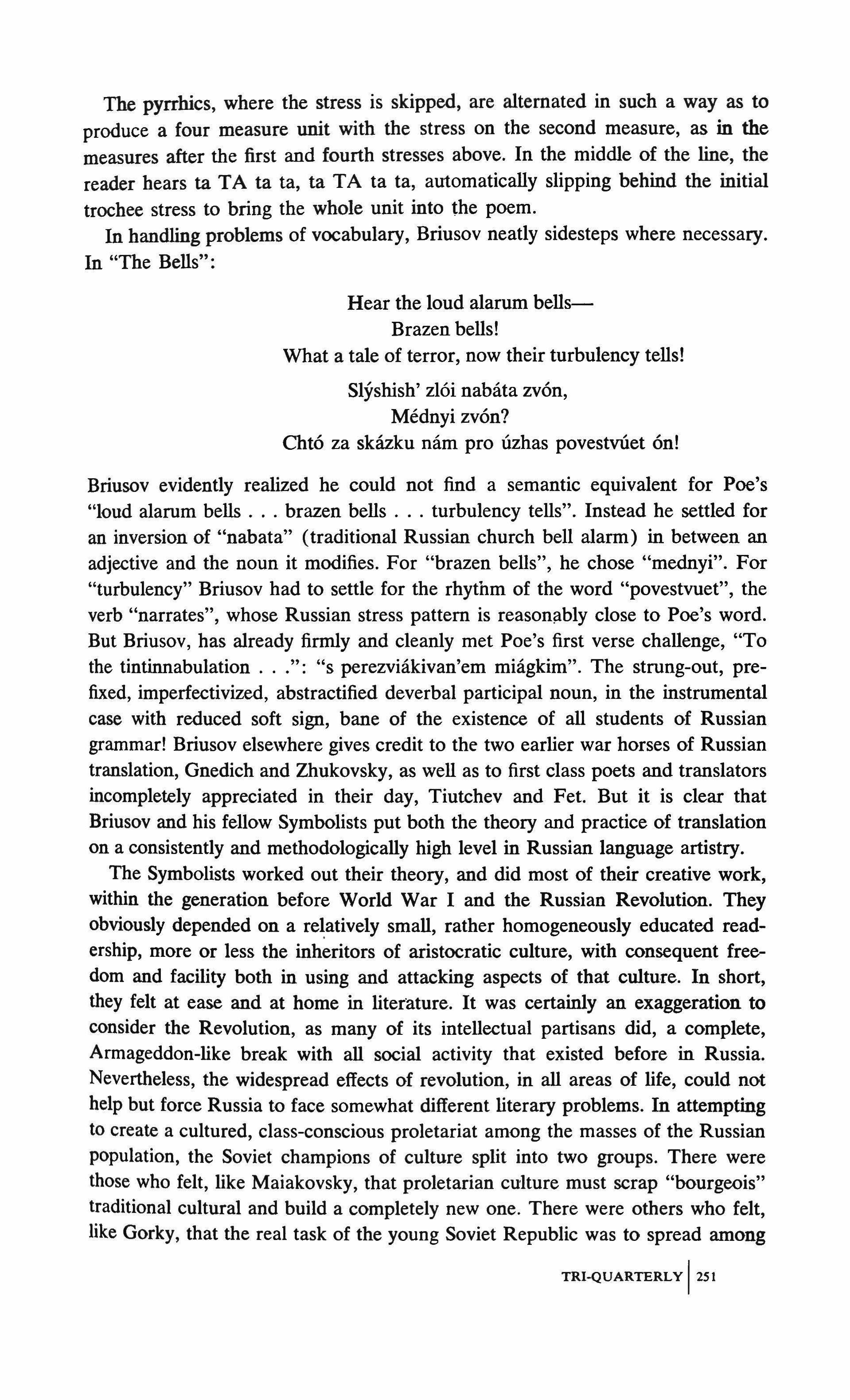
The pyrrhics, where the stress is skipped, are alternated in such a way as to produce a four measure unit with the stress on the second measure, as in the measures after the first and fourth stresses above. In the middle of the line, the reader hears ta TA ta ta, ta TA ta ta, automatically slipping behind the initial trochee stress to bring the whole unit into the poem. In handling problems of vocabulary, Briusov neatly sidesteps where necessary. In "The Bells":
Hear the loud alarum bellsBrazen bells!
What a tale of terror, now their turbulency tells!
Slyshish' zloi nabata zvon, Mednyizvon?
Chto za skazku nam pro uzhas povestviiet on!
Briusov evidently realized he could not find a semantic equivalent for Poe's "loud alarum bells brazen bells turbulency tells". Instead he settled for an inversion of "nabata" (traditional Russian church bell alarm) in between an adjective and the noun it modifies. For "brazen bells", he chose "mednyi". For "turbulency" Briusov had to settle for the rhythm of the word "povestvuet", the verb "narrates", whose Russian stress pattern is reasonably close to Poe's word. But Briusov, has already firmly and cleanly met Poe's first verse challenge, "To the tintinnabulation ": "s perezviakivan'em miagkirn". The strung-out, prefixed, imperfectivized, abstractified deverbal participal noun, in the instrumental case with reduced soft sign, bane of the existence of all students of Russian grammar! Briusov elsewhere gives credit to the two earlier war horses of Russian translation, Gnedich and Zhukovsky, as well as to first class poets and translators incompletely appreciated in their day, Tiutchev and Fet. But it is clear that Briusov and his fellow Symbolists put both the theory and practice of translation on a consistently and methodologically high level in Russian language artistry.
The Symbolists worked out their theory, and did most of their creative work, within the generation before World War I and the Russian Revolution. They obviously depended on a relatively small, rather homogeneously educated readership, more or less the inheritors of aristocratic culture, with consequent freedom and facility both in using and attacking aspects of that culture. In short, they felt at ease and at home in literature. It was certainly an exaggeration to consider the Revolution, as many of its intellectual partisans did, a complete, Armageddon-like break with all social activity that existed before in Russia. Nevertheless, the widespread effects of revolution, in all areas of life, could not help but force Russia to face somewhat different literary problems. In attempting to create a cultured, class-conscious proletariat among the masses of the Russian population, the Soviet champions of culture split into two groups. There were those who felt, like Maiakovsky, that proletarian culture must scrap "bourgeois" traditional cultural and build a completely new one. There were others who felt, like Gorky, that the real task of the young Soviet Republic was to spread among TRI-QUARTERLY 1251

the masses the elevated culture of the past, make it generally available to all.! Both sides of the debate contributed to the lively nature of Soviet literary life in the 1920's. Gorky's side, however, (even when he himself was abroad) was especially attractive and supportive to those who were interested in the problems of translation. It is interesting that Briusov's masterly translations of Poe were done precisely at that time, at least partly under the protection of Gorky's organization. Although Briusov's own art proceeded essentially from an aristocratic type of education and sensibility, this particular product was highly relevant to the early Soviet epoch, or was at least considered so by people like Gorky, Chukovsky, Shklovsky, and the partisans of the project to bring world literature in good translations to the swiftly expanding Soviet Russian reading public. And they, in tum, managed to receive aid from Lenin and the early Soviet regime. It is a remarkable tribute to the vitality of Russian intellectuals and to Russian intellectual life that this tradition of highly artistic translation has continued to the present time, unbroken by the tragic circumstances of Soviet history. In our own generation there has been an extraordinary group of Russian translators. Perhaps the one among them best known in the West is Boris Pasternak, with his brilliant translations of Shakespearian tragedies, including Hamlet and King Lear. Before reading his translations, I would have found it difficult to believe that Russian could so adequately and faithfully represent the cadences of Elizabethan English poetry, not to mention the scope and power of Shakespeare's lines. It is not necessary to present a detailed description here of Pasternak's translations, because so much has already been written in the' West about his art. At the time of the publication of Doctor Zhivago, much of his literary work was introduced to the English reading public, including accounts of his translations. Soviet Russians, of course, had been enjoying his poetic work for at least one full generation before then. Even Erenburg, who was obviously jealous of the attention given Pasternak, said at the time that there would always be a mass of people to enjoy any reading by Pasternak, no matter how impromptu the nature of its organization. There are few other modem poets whose works and example have been so influential on a succeeding generation, in so many different countries.
There are, among others, two brilliant contemporary Russian translators of English and American literature: Samuil Marshak, who died in 1964, and Kornei Chukovsky, alive at a vigorous eighty-four. Marshak translated the Shakespearean sonnets so beautifully that even Pasternak, whose virtues by no means included personal modesty, admitted that Marshak deserved the palm. And Marshak has translated many other English poets, including Blake, Wordsworth, Shelley, Keats, Kipling, Yeats, Housman, T. S. Eliot, and Edward Lear. He has also translated countless children's verses and Mother Goose rhymes. His rhythms and rhymes are so ingenious, and so faithful to the original, that one is tempted to revoke the usual caveat against translation in sensing a work of poetry. He is the rare example of the translator whose own independent inspiration comes lA more detailed description of this period can be found in my book, Gorky: His Literary Development and Influence On Soviet Intellectual Life, Random House, 1966.
TRI-QUARTERLY
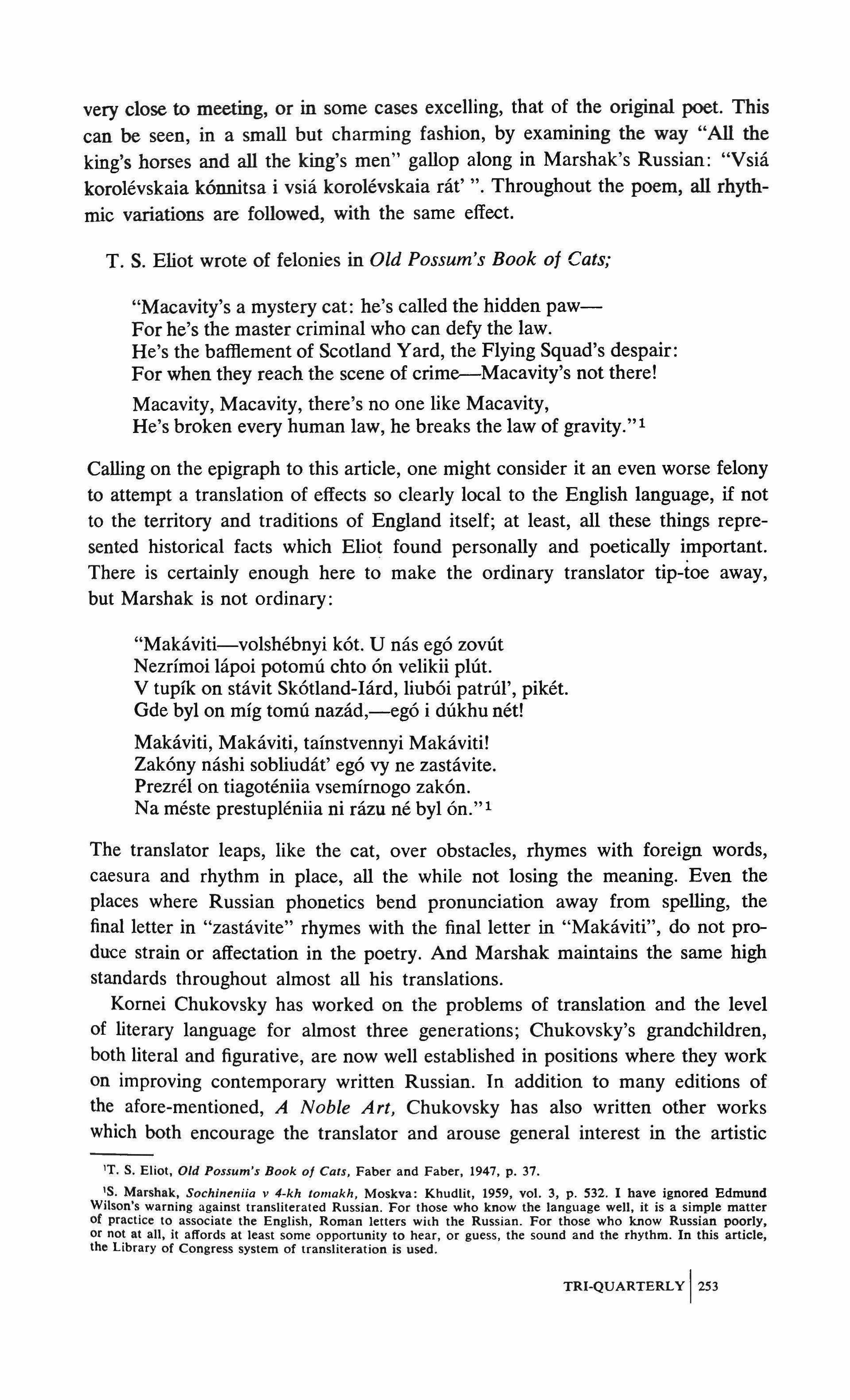
very close to meeting, or in some cases excelling, that of the original poet. This can be seen, in a small but charming fashion, by examining the way "All the king's horses and all the king's men" gallop along in Marshak's Russian: "Vsia korolevskaia konnitsa i vsia korolevskaia rat' ". Throughout the poem, all rhythmic variations are followed, with the same effect.
T. S. Eliot wrote of felonies in Old Possum's Book of Cats;
"Macavity's a mystery cat: he's called the hidden pawFor he's the master criminal who can defy the law. He's the bafflement of Scotland Yard, the Flying Squad's despair: For when they reach the scene of crime--Macavity's not there!
Macavity, Macavity, there's no one like Macavity, He's broken every human law, he breaks the law of gravity." 1
Calling on the epigraph to this article, one might consider it an even worse felony to attempt a translation of effects so clearly local to the English language, if not to the territory and traditions of England itself; at least, all these things represented historical facts which Eliot found personally and poetically important. There is certainly enough here to make the ordinary translator tip-toe away, but Marshak is not ordinary:
"Makaviti=-volshebnyi kot, U nas ego zoviit
Nezrimoi lapoi potormi chto on velikii pluto V tupik on stavit Skotland-Iard, liuboi patnil', piket, Gde byl on mig tormi nazcid,-ego i dukhu net!
Makaviti, Makaviti, tainstvennyi Makaviti! Zakony nashi sobliudat' ego vy ne zastavite. Prezrel on tiagoteniia vsernirnogo zakon, Na meste prestupleniia ni razu ne byl on."!
The translator leaps, like the cat, over obstacles, rhymes with foreign words, caesura and rhythm in place, all the while not losing the meaning. Even the places where Russian phonetics bend pronunciation away from spelling, the final letter in "zastavite" rhymes with the final letter in "Makaviti", do not produce strain or affectation in the poetry. And Marshak maintains the same high standards throughout almost all his translations.
Kornei Chukovsky has worked on the problems of translation and the level of literary language for almost three generations; Chukovsky's grandchildren, both literal and figurative, are now well established in positions where they work on improving contemporary written Russian. In addition to many editions of the afore-mentioned, A Noble Art, Chukovsky has also written other works which both encourage the translator and arouse general interest in the artistic
'T. S. Eliot, Old Possum's Book of Cats, Faber and Faber, 1947, p. 37. 's. Marshak, Sochineniia v 4-kh tomakh, Moskva: Khudlit, 1959, vol. 3, p. 532. I have ignored Edmund Wilson's warning against transliterated Russian. For those who know the language well, it is a simple matter of practice to associate the English, Roman letters with the Russian. For those who know Russian poorly, or not at all, it affords at least some opportunity to hear, or guess, the sound and the rhythm. In this article, the Library of Congress system of transliteration is used.
TRI-QUARTERLy 1253
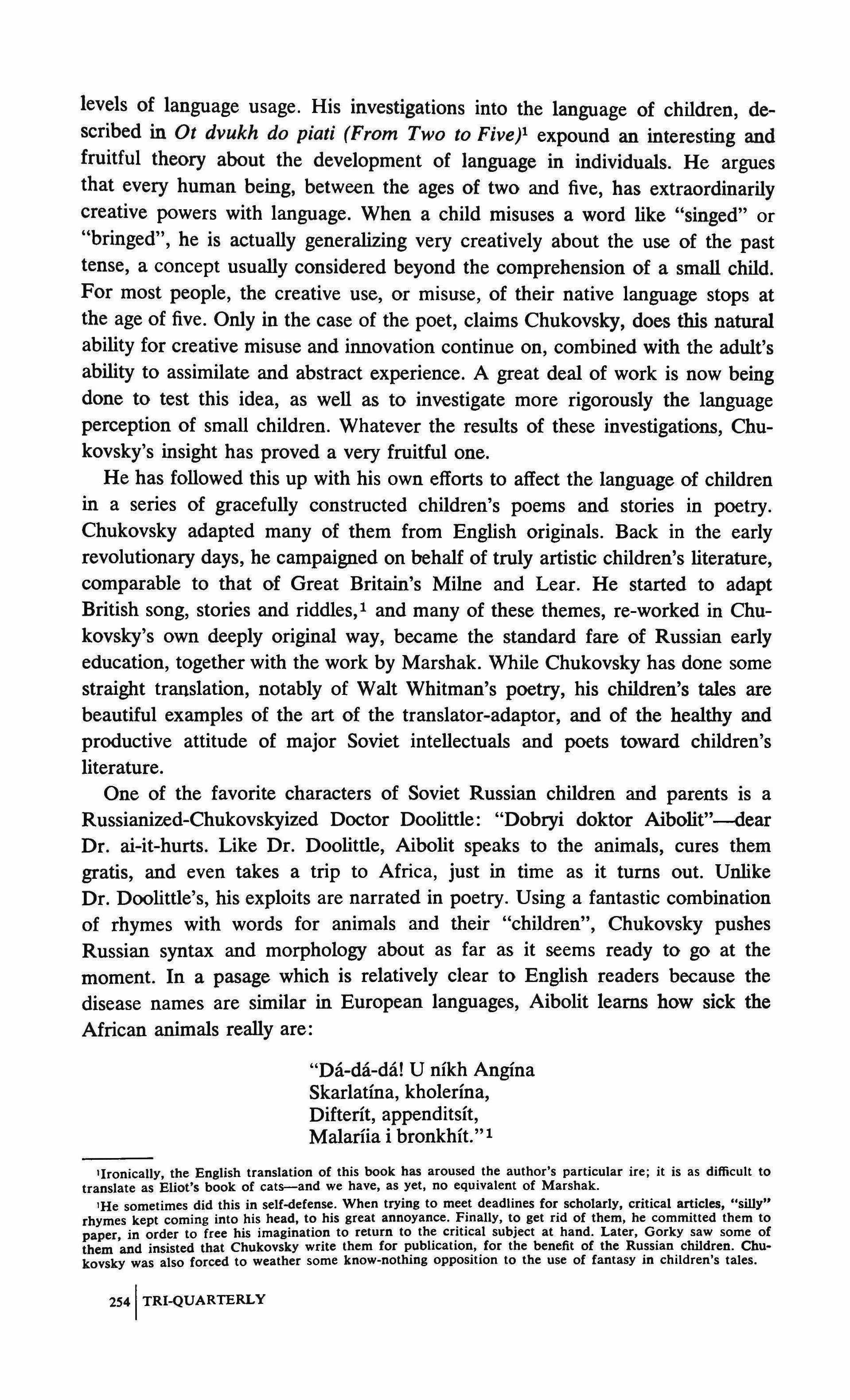
levels of language usage. His investigations into the language of children, described in Ot dvukh do piati (From Two to Five)1 expound an interesting and fruitful theory about the development of language in individuals. He argues that every human being, between the ages of two and five, has extraordinarily creative powers with language. When a child misuses a word like "singed" or "bringed", he is actually generalizing very creatively about the use of the past tense, a concept usually considered beyond the comprehension of a small child. For most people, the creative use, or misuse, of their native language stops at the age of five. Only in the case of the poet, claims Chukovsky, does this natural ability for creative misuse and innovation continue on, combined with the adult's ability to assimilate and abstract experience. A great deal of work is now being done to test this idea, as well as to investigate more rigorously the language perception of small children. Whatever the results of these investigations, Chukovsky's insight has proved a very fruitful one.
He has followed this up with his own efforts to affect the language of children in a series of gracefully constructed children's poems and stories in poetry. Chukovsky adapted many of them from English originals. Back in the early revolutionary days, he campaigned on behalf of truly artistic children's literature, comparable to that of Great Britain's Milne and Lear. He started to adapt British song, stories and riddles." and many of these themes, re-worked in Chukovsky's own deeply original way, became the standard fare of Russian early education, together with the work by Marshak. While Chukovsky has done some straight translation, notably of Walt Whitman's poetry, his children's tales are beautiful examples of the art of the translator-adaptor, and of the healthy and productive attitude of major Soviet intellectuals and poets toward children's literature.
One of the favorite characters of Soviet Russian children and parents is a Russianized-Chukovskyized Doctor Doolittle: "Dobryi doktor Aibolit"-dear Dr. ai-it-hurts. Like Dr. Doolittle, Aibolit speaks to the animals, cures them gratis, and even takes a trip to Africa, just in time as it turns out. Unlike Dr. Doolittle's, his exploits are narrated in poetry. Using a fantastic combination of rhymes with words for animals and their "children", Chukovsky pushes Russian syntax and morphology about as far as it seems ready to go at the moment. In a pasage which is relatively clear to English readers because the disease names are similar in European languages, Aibolit learns how sick the African animals really are:
"Dei-dei-dei! U nikh Angina Skarlatina, kholerina, Difterit, appenditsit, Malariia i bronkhit." 1
'Ironically, the English translation of this book has aroused. the author's particular ire; it is as difficult to translate as Eliot's book of cats--and we have, as yet, no equivalent of Marshak.
'He sometimes did this in self-defense. When trying to meet deadlines for scholarly, critical articles, "silly" rhymes kept coming into his head, to his great annoyance. Finally, to get rid of them, he committed them to paper in order to free his imagination to return to the critical subject at hand. Later, Gorky saw some of them 'and insisted that Chukovsky write them for publication, for the benefit of the Russian children. Chukovsky was also forced to weather some know-nothing opposition to the use of fantasy in children's tales.
TRI-QUARTERLY
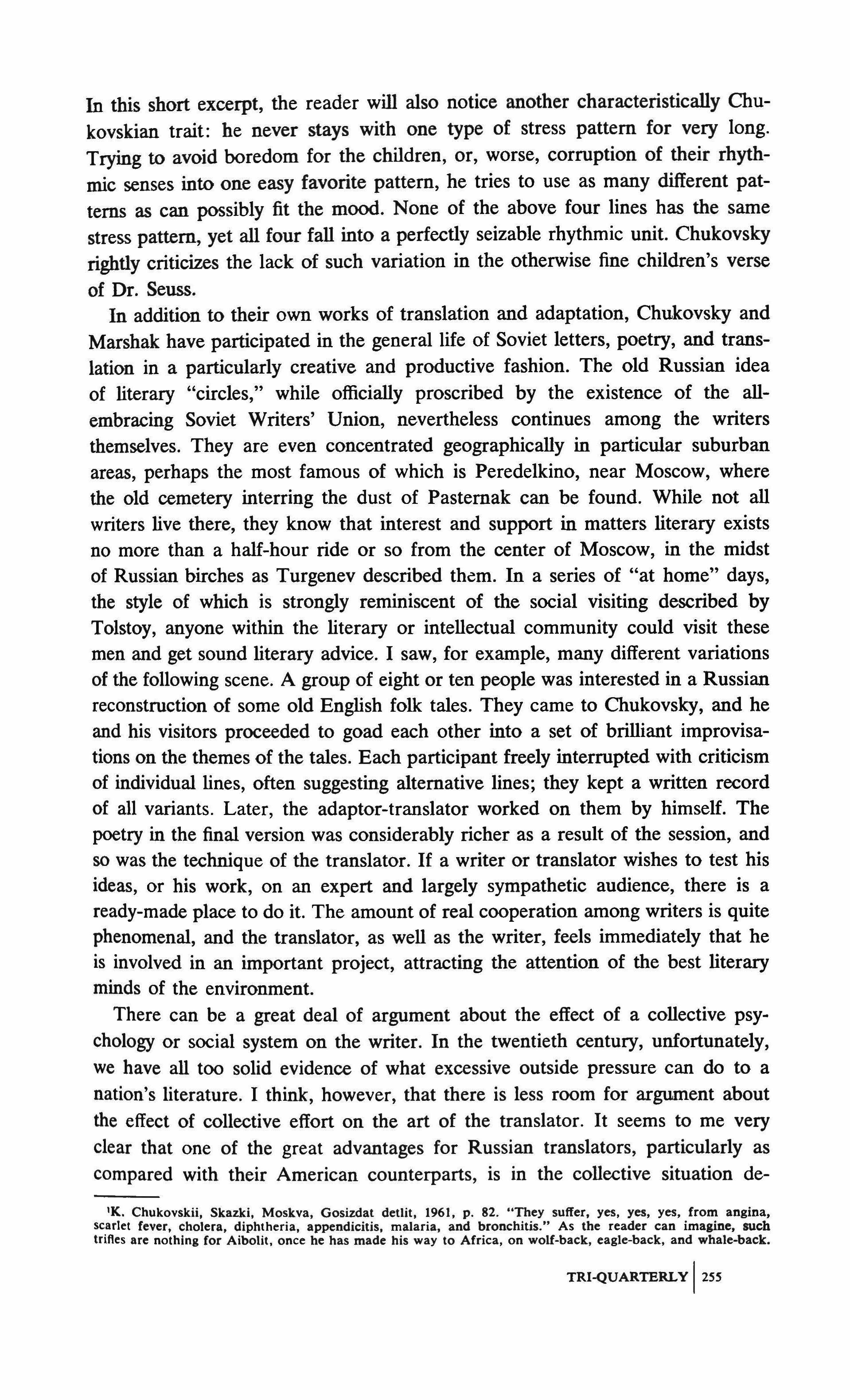
In this short excerpt, the reader will also notice another characteristically Cbukovskian trait: he never stays with one type of stress pattern for very long. Trying to avoid boredom for the children, or, worse, corruption of their rhythmic senses into one easy favorite pattern, he tries to use as many different patterns as can possibly fit the mood. None of the above four lines has the same stress pattern, yet all four fall into a perfectly seizable rhythmic unit. Chukovsky rightly criticizes the lack of such variation in the otherwise fine children's verse of Dr. Seuss.
In addition to their own works of translation and adaptation, Chukovsky and Marshak have participated in the general life of Soviet letters, poetry, and translation in a particularly creative and productive fashion. The old Russian idea of literary "circles," while officially proscribed by the existence of the allembracing Soviet Writers' Union, nevertheless continues among the writers themselves. They are even concentrated geographically in particular suburban areas, perhaps the most famous of which is Peredelkino, near Moscow, where the old cemetery interring the dust of Pasternak can be found. While not all writers live there, they know that interest and support in matters literary exists no more than a half-hour ride or so from the center of Moscow, in the midst of Russian birches as Turgenev described them. In a series of "at home" days, the style of which is strongly reminiscent of the social visiting described by Tolstoy, anyone within the literary or intellectual community could visit these men and get sound literary advice. I saw, for example, many different variations of the following scene. A group of eight or ten people was interested in a Russian reconstruction of some old English folk tales. They came to Cbukovsky, and he and his visitors proceeded to goad each other into a set of brilliant improvisations on the themes of the tales. Each participant freely interrupted with criticism of individual lines, often suggesting alternative lines; they kept a written record of all variants. Later, the adaptor-translator worked on them by himself. The poetry in the final version was considerably richer as a result of the session, and so was the technique of the translator. If a writer or translator wishes to test his ideas, or his work, on an expert and largely sympathetic audience, there is a ready-made place to do it. The amount of real cooperation among writers is quite phenomenal, and the translator, as well as the writer, feels immediately that he is involved in an important project, attracting the attention of the best literary minds of the environment.
There can be a great deal of argument about the effect of a collective psychology or social system on the writer. In the twentieth century, unfortunately, we have all too solid evidence of what excessive outside pressure can do to a nation's literature. I think, however, that there is less room for argument about the effect of collective effort on the art of the translator. It seems to me very clear that one of the great advantages for Russian translators, particularly as compared with their American counterparts, is in the collective situation de-
'K. Chukovskii, Skazki, Moskva, Gosizdat detlit, 1961, p. 82. "They suffer, yes, yes, yes, from angina, scarlet fever, cholera, diphtheria, appendicitis, malaria, and bronchitis." As the reader can imagine, such tritles are nothing for Aibolit, once he has made his way to Africa, on wolf-back, eagle-back, and whale-back. TRI-QUARTERLY 1255

scribed above. The Russian translator works for exactly the kind of audience the American translator has desired for a long time, but seldom received. Other, extra-literary factors have also had an effect: at certain periods, Soviet political factors have virtually forced good writers into the art of translation. Knowing the distance and value of the space between head and shoulders, they have preferred in many cases to work on translating materials far removed from the burning, dangerous, and eternally changing questions of the day. Some of Soviet Russia's finest poetic and critical talents were occupied this way for over twenty years. This is less so today, and sometimes it is now the translator who stands in the line of fire: the first widely publicized punishment in recent years fell on the translator-adaptor Brodsky. His conviction and arrest came before those of Siniavsky and Daniel. The intent of the government, in both cases, was clearly to discourage such activities among others and frighten those interested in the prisoners' work. The penalty of imprisonment, while barbarous enough, is still better than the swift disappearance and executions of former years. The fact that such actions clearly embarrass the Soviet Union internationally, as is clear in their fiercely defensive reactions to Western protests, shows that they are not willing to be completely ruthless in the field of literature and criticism. There are obviously some Soviet politicians who consider repressions basically inimical to the best interests of the USSR. Consequently, there is still considerable hope that Soviet writers and translators will continue to develop more freely than in the past; and they will work on artistic problems in ways that are directly relevant to the real issues of the twentieth century.
Probably one of the most fundamental factors to be considered in seeking understanding of the differences between American and Soviet literature and translating, lies in basic educational history. Those who like to emphasize similarities can point out that the two countries share a relatively recent application of the notion about mass education, to the populations of huge and varied internal territories. These populations, moreover, are linguistically and demographically related to Europe but separate from it; "provincialism" is common to both their developments. Nevertheless, what modern Russia and the United States started from, in the field of education as in other fields, was very different; and the difference was not only the result of Russia's sharing important aspects of the aristocratic class with Europe. It also had, for over two centuries, a relatively thin layer of highly educated people, many, if not most of whom were not aristocrats, who were continually coping with problems of movement between the cultures of Western Europe and Russia. Moreover, the Western observer should not make the by now banal mistake of putting all emphasis on European influence, thereby ignoring the considerable literary and linguistic achievements of Russia itself." When the Soviets began working toward mass education, a process which is still going on, they had a very high tradition to fall back on, or revolt against. In long-run historical terms, the latter is not so different from the former, however painful it is for the people involved. The Soviet problem was, and still remains, how to bring the old culture into modern times, which
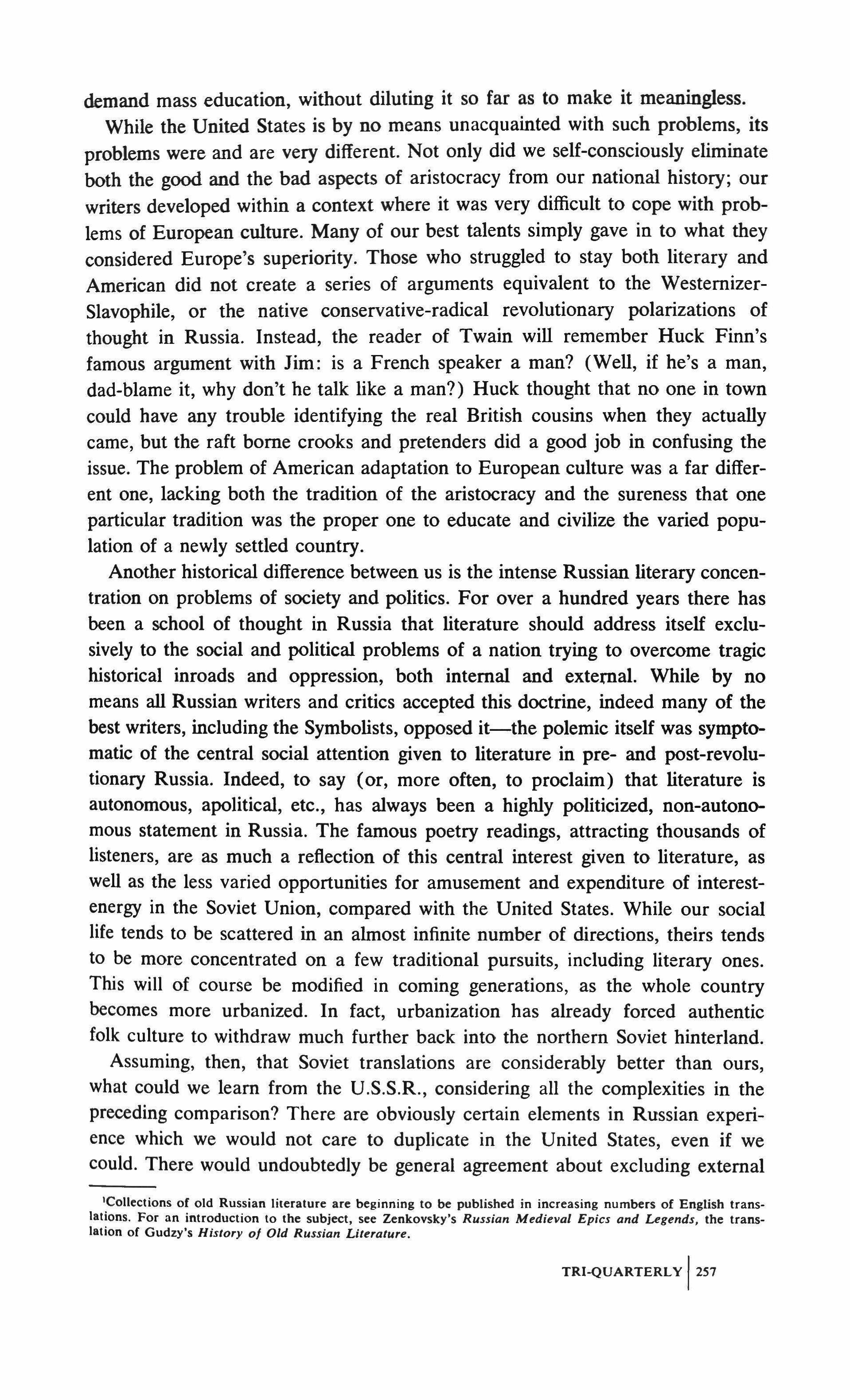
demand mass education, without diluting it so far as to make it meaningless. While the United States is by no means unacquainted with such problems, its problems were and are very different. Not only did we self-consciously eliminate both the good and the bad aspects of aristocracy from our national history; our writers developed within a context where it was very difficult to cope with problems of European culture. Many of our best talents simply gave in to what they considered Europe's superiority. Those who struggled to stay both literary and American did not create a series of arguments equivalent to the WesternizerSlavophile, or the native conservative-radical revolutionary polarizations of thought in Russia. Instead, the reader of Twain will remember Huck Finn's famous argument with Jim: is a French speaker a man? (Well, if he's a man, dad-blame it, why don't he talk like a man") Huck thought that no one in town could have any trouble identifying the real British cousins when they actually came, but the raft borne crooks and pretenders did a good job in confusing the issue. The problem of American adaptation to European culture was a far different one, lacking both the tradition of the aristocracy and the sureness that one particular tradition was the proper one to educate and civilize the varied population of a newly settled country.
Another historical difference between us is the intense Russian literary concentration on problems of society and politics. For over a hundred years there has been a school of thought in Russia that literature should address itself exclusively to the social and political problems of a nation trying to overcome tragic historical inroads and oppression, both internal and external. While by no means all Russian writers and critics accepted this doctrine, indeed many of the best writers, including the Symbolists, opposed it-the polemic itself was symptomatic of the central social attention given to literature in pre- and post-revolutionary Russia. Indeed, to say (or, more often, to proclaim) that literature is autonomous, apolitical, etc., has always been a highly politicized, non-autonomous statement in Russia. The famous poetry readings, attracting thousands of listeners, are as much a reflection of this central interest given to literature, as well as the less varied opportunities for amusement and expenditure of interestenergy in the Soviet Union, compared with the United States. While our social life tends to be scattered in an almost infinite number of directions, theirs tends to be more concentrated on a few traditional pursuits, including literary ones. This will of course be modified in coming generations, as the whole country becomes more urbanized. In fact, urbanization has already forced authentic folk culture to withdraw much further back into the northern Soviet hinterland.
Assuming, then, that Soviet translations are considerably better than ours, what could we learn from the U.S.S.R., considering all the complexities in the preceding comparison? There are obviously certain elements in Russian experience which we would not care to duplicate in the United States, even if we could. There would undoubtedly be general agreement about excluding external
'Collections of old Russian literature are beginning to be published in increasing numbers of English translations. For an introduction to the subject, see Zenkovsky's Russian Medieval Epics and Legends, the translation of Gudzy's History 0/ Old Russian Literature.
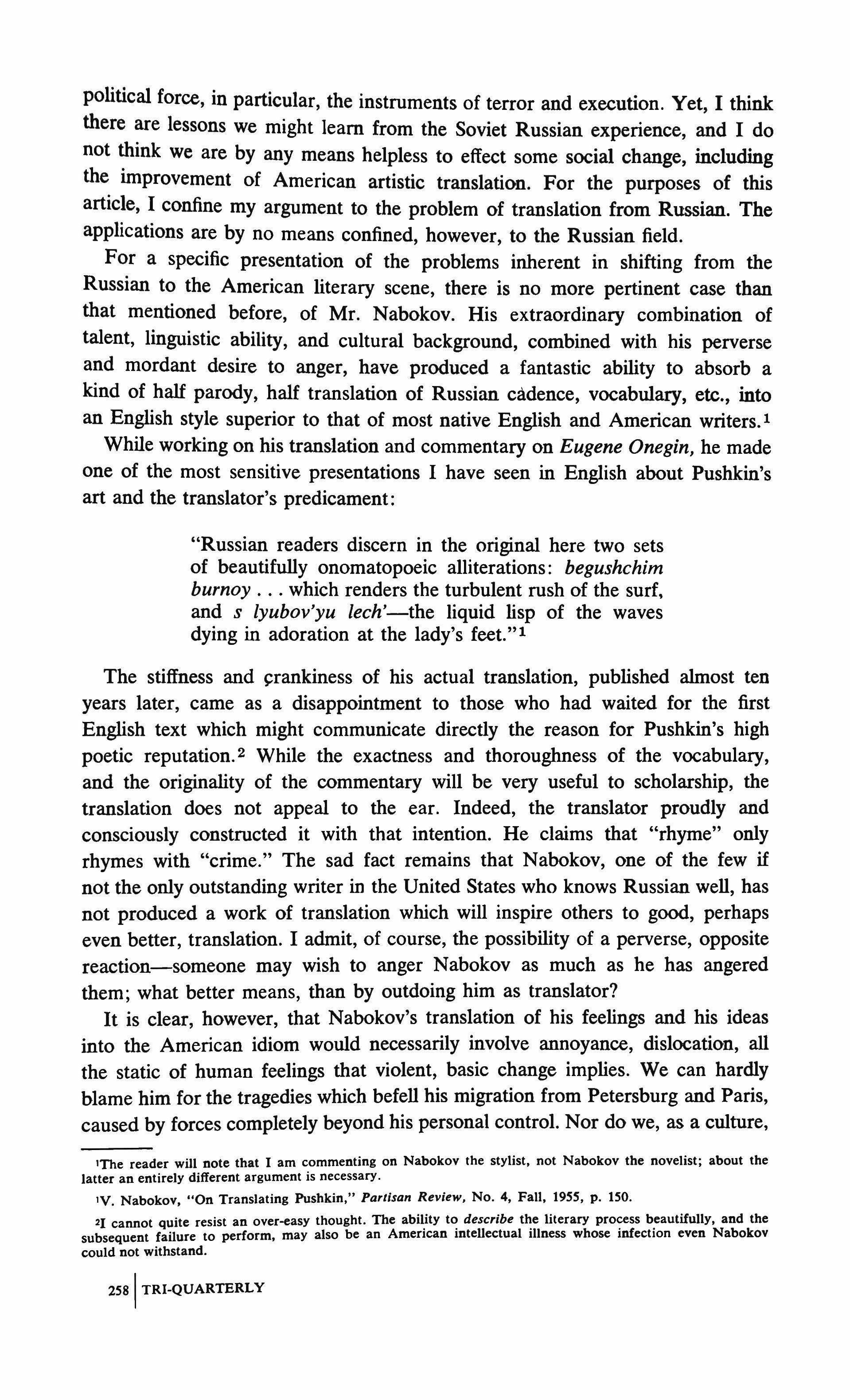
political force, in particular, the instruments of terror and execution. Yet, I think there are lessons we might learn from the Soviet Russian experience, and I do not think we are by any means helpless to effect some social change, including the improvement of American artistic translation. For the purposes of this article, I confine my argument to the problem of translation from Russian. The applications are by no means confined, however, to the Russian field.
For a specific presentation of the problems inherent in shifting from the Russian to the American literary scene, there is no more pertinent case than that mentioned before, of Mr. Nabokov. His extraordinary combination of talent, linguistic ability, and cultural background, combined with his perverse and mordant desire to anger, have produced a fantastic ability to absorb a kind of half parody, half translation of Russian cadence, vocabulary, etc., into an English style superior to that of most native English and American writers.!
While working on his translation and commentary on Eugene Onegin, he made one of the most sensitive presentations I have seen in English about Pushkin's art and the translator's predicament:
"Russian readers discern in the original here two sets of beautifully onomatopoeic alliterations: begushchim burnoy which renders the turbulent rush of the surf, and s lyubov'yu lech'-the liquid lisp of the waves dying in adoration at the lady's feet."!
The stiffness and crankiness of his actual translation, published almost ten years later, came as a disappointment to those who had waited for the first English text which might communicate directly the reason for Pushkin's high poetic reputation.s While the exactness and thoroughness of the vocabulary, and the originality of the commentary will be very useful to scholarship, the translation does not appeal to the ear. Indeed, the translator proudly and consciously constructed it with that intention. He claims that "rhyme" only rhymes with "crime." The sad fact remains that Nabokov, one of the few if not the only outstanding writer in the United States who knows Russian well, has not produced a work of translation which will inspire others to good, perhaps even better, translation. I admit, of course, the possibility of a perverse, opposite reaction-someone may wish to anger Nabokov as much as he has angered them; what better means, than by outdoing him as translator?
It is clear, however, that Nabokov's translation of his feelings and his ideas into the American idiom would necessarily involve annoyance, dislocation, all the static of human feelings that violent, basic change implies. We can hardly blame him for the tragedies which befell his migration from Petersburg and Paris, caused by forces completely beyond his personal control. Nor do we, as a culture,
IThe reader will note that I am commenting on Nabokov the stylist. not Nabokov the novelist; about the latter an entirely different argument is necessary.
IY. Nabokov. "On Translating Pushkin," Partisan Review, No.4, Fall, 1955, p. 150.
21 cannot quite resist an over-easy thought. The ability to describe the literary process beautifully. and the subsequent failure to perform, may also be an American intellectual illness whose infection even Nabokov could not withstand.
TRI-QUARTERLY

participate completely in his achievements. Although we offered a new home, much of the necessary preparation had to be done elsewhere. His problem of cultural dislocation simply exaggerates, artistically, the general American linguistic situation.
For tens of millions of Americans, English is a language which has been spoken and read no longer than two or three generations in their own, direct families. Our feelings about language, especially about foreign language, are still colored and charged by our relatively recent historical experience of large scale immigration and cultural assimilation. While the direct, second generation syndrome is mostly past, I do not think the third and fourth generations (and even beyond) entirely lose the charged feelings, positive or negative, about the subject. While few, if any, of them could formulate these feelings with the power of a Nabokov, they have them as part of their own family histories and psychological makeup.!
Since we decided to forge the country's population in a linguistic melting pot, throwing aside the possibility of millions who could speak Swedish, German, Italian, Greek, Polish, Russian, Yiddish, Hebrew, and other languages, we are now faced with certain linguistic consequences which the Russians have not faced, on as large a scale, for the last half millenium: since the great Tatar migrations.
I think another comparison-that between British and American Englishshows the differences between a population which has possessed the English language for about a thousand years and one where a large segment has possessed it for less than one hundred years. The differences in usage and smoothness reflect these differences-as, perhaps, do the differences in turbulence and vitality. The ability to take on sophisticated foreign culture must also differ considerable, although I must admit that here my own experience is grossly inadequate to compare and contrast the feelings of immigrant culture against the reputed insularity of the British. Suffice it to say here that insularity and considering foreign tongues as strange or exotic, automatically seeing humor in non-Anglo Saxon names, etc., must be overcome, if we wish to have world literature made accessible by good translation. Both the growing ease of travel and the increasing influence of international politics are undoubtedly weakening such feelings in the United States. But our charged feelings about foreign language will be with us for generations to come.
Another difference, in comparison with the Russian tradition, is the absence of a truly wide-spread American interest in literature. Granted, the Russian interest, like any mass phenomenon, is often superficial and naive, from the point of view of a trained literary critic. It nevertheless produces the effect of encouraging greater and more talented efforts at translation. How to arouse such interest in an American context is by no means an easy task. American universities have come a long way in one generation; the number and quality
'This phenomenon is easily observable in American foreign language classes. I am deeply convinced that an Important part of the successful art of language teaching in the United States, although often a subconscious part, is the ability to properly weigh and utilize this factor.
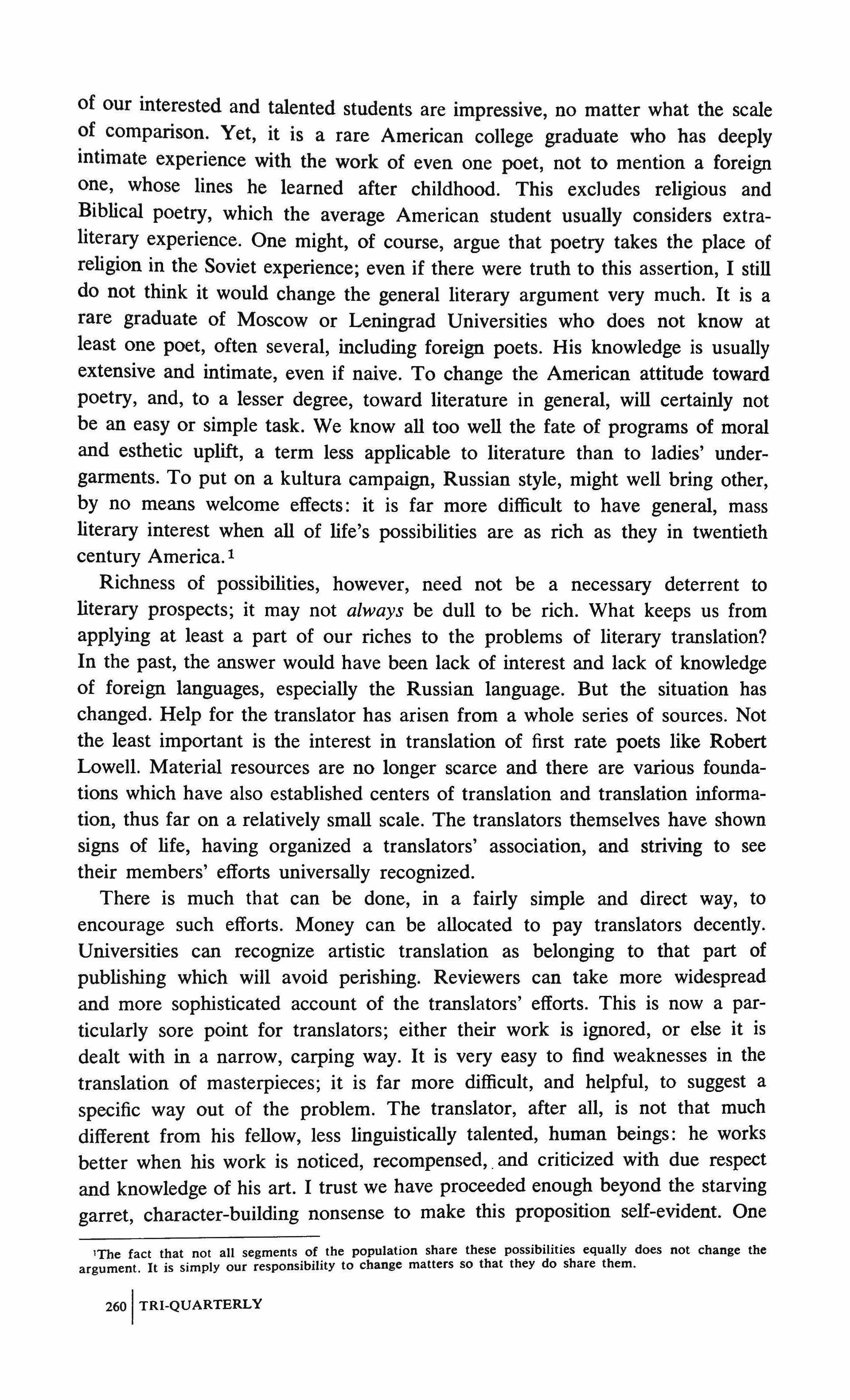
of our interested and talented students are impressive, no matter what the scale of comparison. Yet, it is a rare American college graduate who has deeply intimate experience with the work of even one poet, not to mention a foreign one, whose lines he learned after childhood. This excludes religious and Biblical poetry, which the average American student usually considers extraliterary experience. One might, of course, argue that poetry takes the place of religion in the Soviet experience; even if there were truth to this assertion, I still do not think it would change the general literary argument very much. It is a rare graduate of Moscow or Leningrad Universities who does not know at least one poet, often several, including foreign poets. His knowledge is usually extensive and intimate, even if naive. To change the American attitude toward poetry, and, to a lesser degree, toward literature in general, will certainly not be an easy or simple task. We know all too well the fate of programs of moral and esthetic uplift, a term less applicable to literature than to ladies' undergarments. To put on a kultura campaign, Russian style, might well bring other, by no means welcome effects: it is far more difficult to have general, mass literary interest when all of life's possibilities are as rich as they in twentieth century America. 1
Richness of possibilities, however, need not be a necessary deterrent to literary prospects; it may not always be dull to be rich. What keeps us from applying at least a part of our riches to the problems of literary translation? In the past, the answer would have been lack of interest and lack of knowledge of foreign languages, especially the Russian language. But the situation has changed. Help for the translator has arisen from a whole series of sources. Not the least important is the interest in translation of first rate poets like Robert Lowell. Material resources are no longer scarce and there are various foundations which have also established centers of translation and translation information, thus far on a relatively small scale. The translators themselves have shown signs of life, having organized a translators' association, and striving to see their members' efforts universally recognized.
There is much that can be done, in a fairly simple and direct way, to encourage such efforts. Money can be allocated to pay translators decently. Universities can recognize artistic translation as belonging to that part of publishing which will avoid perishing. Reviewers can take more widespread and more sophisticated account of the translators' efforts. This is now a particularly sore point for translators; either their work is ignored, or else it is dealt with in a narrow, carping way. It is very easy to find weaknesses in the translation of masterpieces; it is far more difficult, and helpful, to suggest a specific way out of the problem. The translator, after all, is not that much different from his fellow, less linguistically talented, human beings: he works better when his work is noticed, recompensed,. and criticized with due respect and knowledge of his art. I trust we have proceeded enough beyond the starving garret, character-building nonsense to make this proposition self-evident. One
'The fact that not all segments of the population share these possibilities equally does not change the argument. It is simply our responsibility to change matters so that they do share them.
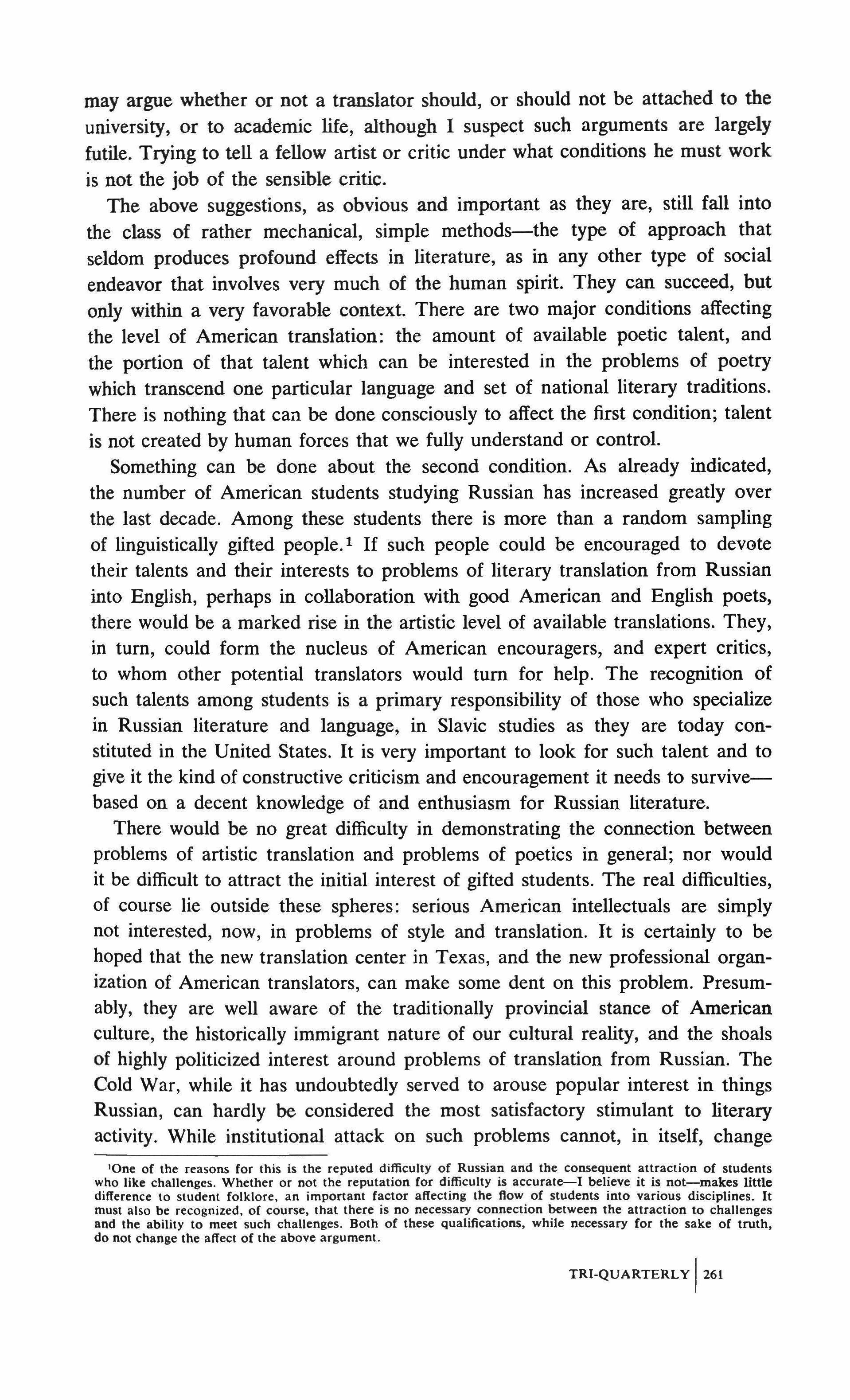
may argue whether or not a translator should, or should not be attached to the university, or to academic life, although I suspect such arguments are largely futile. Trying to tell a fellow artist or critic under what conditions he must work is not the job of the sensible critic.
The above suggestions, as obvious and important as they are, still fall into the class of rather mechanical, simple methods-the type of approach that seldom produces profound effects in literature, as in any other type of social endeavor that involves very much of the human spirit. They can succeed, but only within a very favorable context. There are two major conditions affecting the level of American translation: the amount of available poetic talent, and the portion of that talent which can be interested in the problems of poetry which transcend one particular language and set of national literary traditions. There is nothing that can be done consciously to affect the first condition; talent is not created by human forces that we fully understand or control.
Something can be done about the second condition. As already indicated, the number of American students studying Russian has increased greatly over the last decade. Among these students there is more than a random sampling of linguistically gifted people." If such people could be encouraged to devote their talents and their interests to problems of literary translation from Russian into English, perhaps in collaboration with good American and English poets, there would be a marked rise in the artistic level of available translations. They, in tum, could form the nucleus of American encouragers, and expert critics, to whom other potential translators would tum for help. The recognition of such talents among students is a primary responsibility of those who specialize in Russian literature and language, in Slavic studies as they are today constituted in the United States. It is very important to look for such talent and to give it the kind of constructive criticism and encouragement it needs to survivebased on a decent knowledge of and enthusiasm for Russian literature.
There would be no great difficulty in demonstrating the connection between problems of artistic translation and problems of poetics in general; nor would it be difficult to attract the initial interest of gifted students. The real difficulties, of course lie outside these spheres: serious American intellectuals are simply not interested, now, in problems of style and translation. It is certainly to be hoped that the new translation center in Texas, and the new professional organization of American translators, can make some dent on this problem. Presumably, they are well aware of the traditionally provincial stance of American culture, the historically immigrant nature of our cultural reality, and the shoals of highly politicized interest around problems of translation from Russian. The Cold War, while it has undoubtedly served to arouse popular interest in things Russian, can hardly be considered the most satisfactory stimulant to literary activity. While institutional attack on such problems cannot, in itself, change
'One of the reasons for this is the reputed difficulty of Russian and the consequent attraction of students who like challenges. Whether or not the reputation for difficulty is accurate-I believe it is not-makes little difference to student folklore, an important factor affecting the flow of students into various disciplines, It must also be recognized, of course, that there is no necessary connection between the attraction to challenges and the ability to meet such challenges. Both of these qualifications, while necessary for the sake of truth, do not change the affect of the above argument.
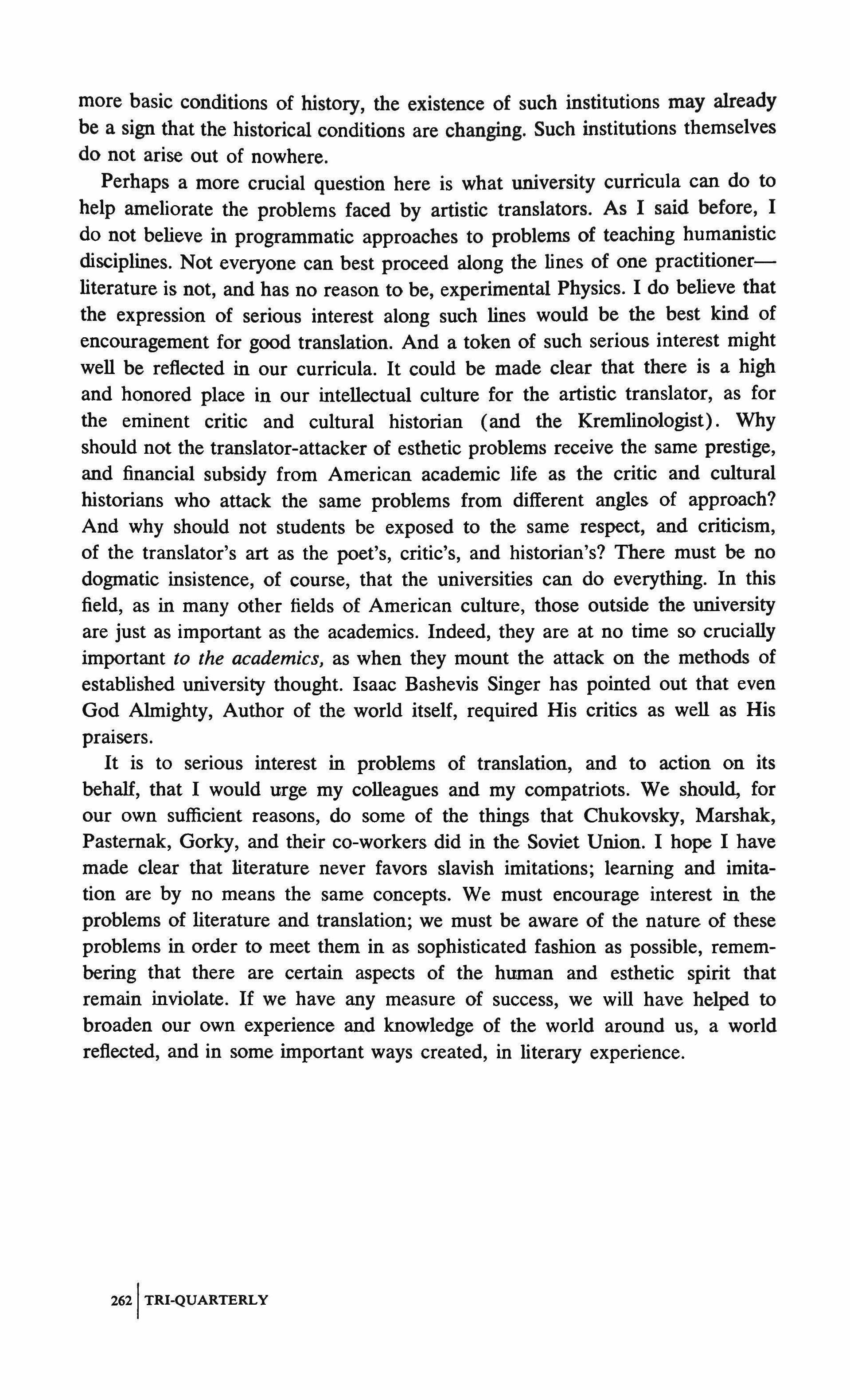
more basic conditions of history, the existence of such institutions may already be a sign that the historical conditions are changing. Such institutions themselves do not arise out of nowhere.
Perhaps a more crucial question here is what university curricula can do to help ameliorate the problems faced by artistic translators. As I said before, I do not believe in programmatic approaches to problems of teaching humanistic disciplines. Not everyone can best proceed along the lines of one practitionerliterature is not, and has no reason to be, experimental Physics. I do believe that the expression of serious interest along such lines would be the best kind of encouragement for good translation. And a token of such serious interest might well be reflected in our curricula. It could be made clear that there is a high and honored place in our intellectual culture for the artistic translator, as for the eminent critic and cultural historian (and the Kremlinologist) Why should not the translator-attacker of esthetic problems receive the same prestige, and financial subsidy from American academic life as the critic and cultural historians who attack the same problems from different angles of approach? And why should not students be exposed to the same respect, and criticism, of the translator's art as the poet's, critic's, and historian's? There must be no dogmatic insistence, of course, that the universities can do everything. In this field, as in many other fields of American culture, those outside the university are just as important as the academics. Indeed, they are at no time so crucially important to the academics, as when they mount the attack on the methods of established university thought. Isaac Bashevis Singer has pointed out that even God Almighty, Author of the world itself, required His critics as well as His praisers.
It is to serious interest in problems of translation, and to action on its behalf, that I would urge my colleagues and my compatriots. We should, for our own sufficient reasons, do some of the things that Chukovsky, Marshak, Pasternak, Gorky, and their co-workers did in the Soviet Union. I hope I have made clear that literature never favors slavish imitations; learning and imitation are by no means the same concepts. We must encourage interest in the problems of literature and translation; we must be aware of the nature of these problems in order to meet them in as sophisticated fashion as possible, remembering that there are certain aspects of the human and esthetic spirit that remain inviolate. If we have any measure of success, we will have helped to broaden our own experience and knowledge of the world around us, a world reflected, and in some important ways created, in literary experience.
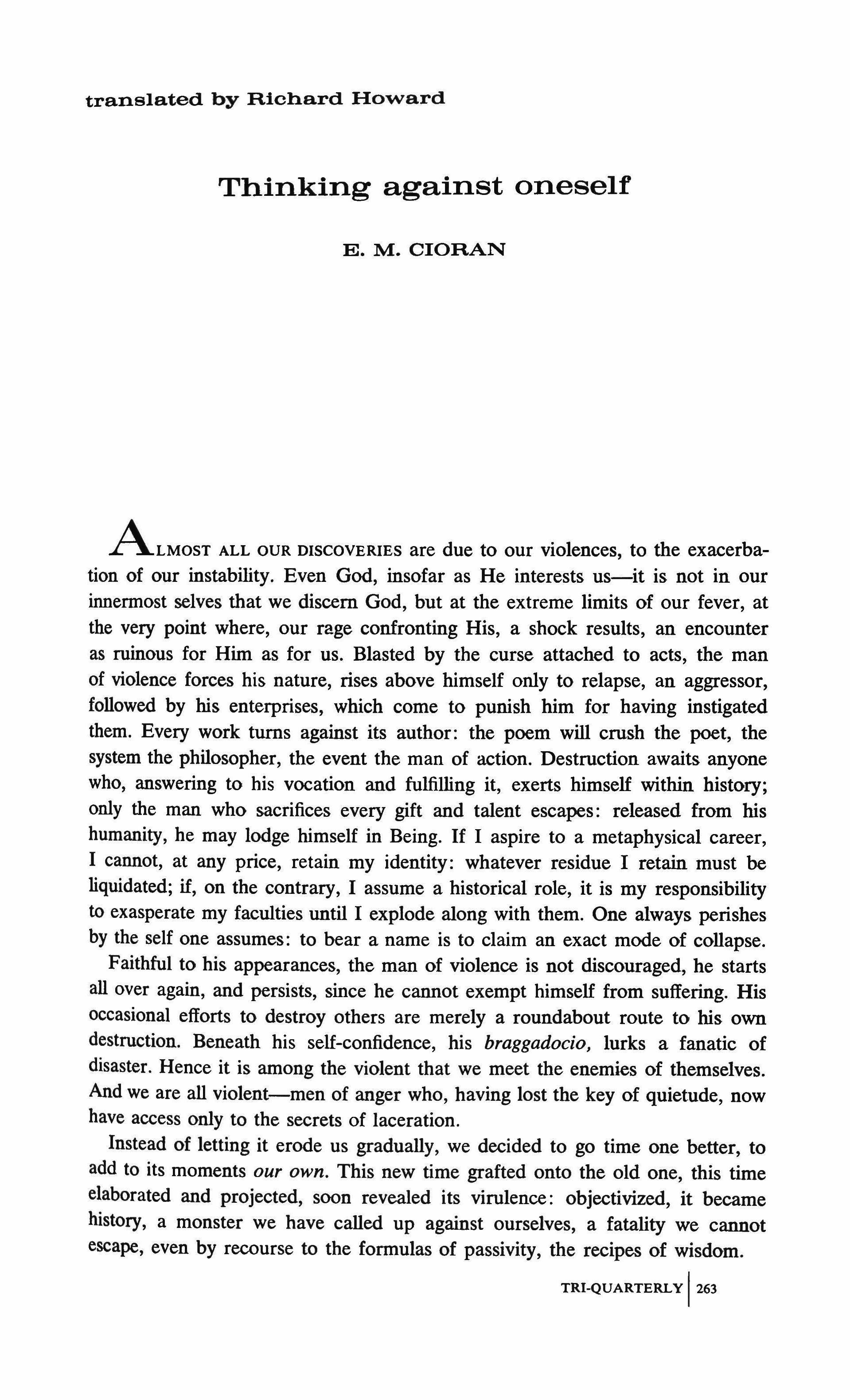
ALL OUR DISCOVERIES are due to our violences, to the exacerbation of our instability. Even God, insofar as He interests us-it is not in our innermost selves that we discern God, but at the extreme limits of our fever, at the very point where, our rage confronting His, a shock results, an encounter as ruinous for Him as for us. Blasted by the curse attached to acts, the man of violence forces his nature, rises above himself only to relapse, an aggressor, followed by his enterprises, which come to punish him for having instigated them. Every work turns against its author: the poem will crush the poet, the system the philosopher, the event the man of action. Destruction awaits anyone who, answering to his vocation and fulfilling it, exerts himself within history; only the man who sacrifices every gift and talent escapes: released from his humanity, he may lodge himself in Being. If I aspire to a metaphysical career, I cannot, at any price, retain my identity: whatever residue I retain must be liquidated; if, on the contrary, I assume a historical role, it is my responsibility to exasperate my faculties until I explode along with them. One always perishes by the self one assumes: to bear a name is to claim an exact mode of collapse. Faithful to his appearances, the man of violence is not discouraged, he starts all over again, and persists, since he cannot exempt himself from suffering. His occasional efforts to destroy others are merely a roundabout route to his own destruction. Beneath his self-confidence, his braggadocio, lurks a fanatic of disaster. Hence it is among the violent that we meet the enemies of themselves. And we are all violent-men of anger who, having lost the key of quietude, now have access only to the secrets of laceration. Instead of letting it erode us gradually, we decided to go time one better, to add to its moments our own. This new time grafted onto the old one, this time elaborated and projected, soon revealed its virulence: objectivized, it became history, a monster we have called up against ourselves, a fatality we cannot escape, even by recourse to the formulas of passivity, the recipes of wisdom.
TRI-QUARTERLy 1263
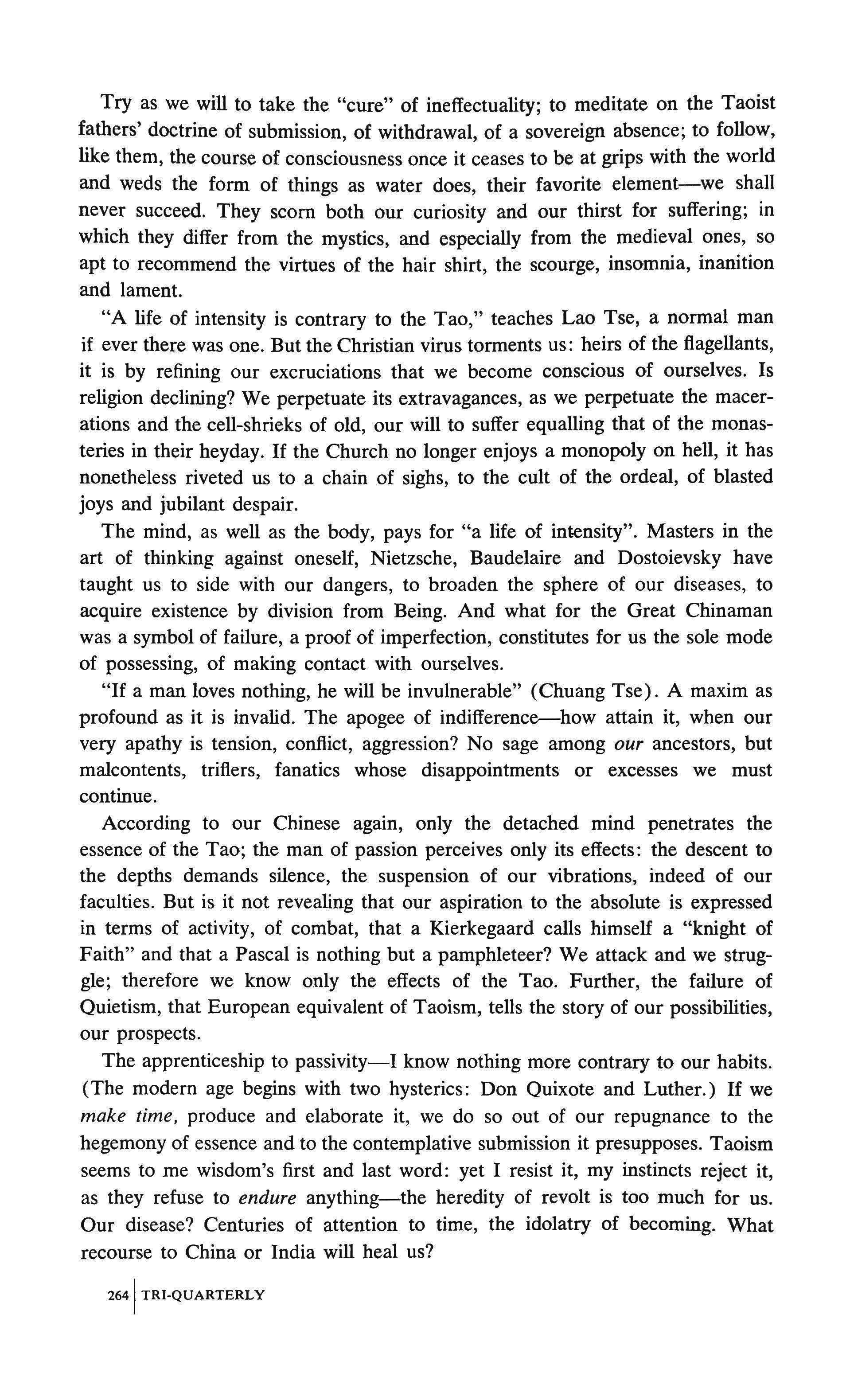
Try as we will to take the "cure" of ineffectuality; to meditate on the Taoist fathers' doctrine of submission, of withdrawal, of a sovereign absence; to follow, like them, the course of consciousness once it ceases to be at grips with the world and weds the form of things as water does, their favorite element-we shall never succeed. They scorn both our curiosity and our thirst for suffering; in which they differ from the mystics, and especially from the medieval ones, so apt to recommend the virtues of the hair shirt, the scourge, insomnia, inanition and lament.
"A life of intensity is contrary to the Tao," teaches Lao Tse, a normal man if ever there was one. But the Christian virus torments us: heirs of the flagellants, it is by refining our excruciations that we become conscious of ourselves. Is religion declining? We perpetuate its extravagances, as we perpetuate the macerations and the cell-shrieks of old, our will to suffer equalling that of the monasteries in their heyday. If the Church no longer enjoys a monopoly on hell, it has nonetheless riveted us to a chain of sighs, to the cult of the ordeal, of blasted joys and jubilant despair.
The mind, as well as the body, pays for "a life of intensity". Masters in the art of thinking against oneself, Nietzsche, Baudelaire and Dostoievsky have taught us to side with our dangers, to broaden the sphere of our diseases, to acquire existence by division from Being. And what for the Great Chinaman was a symbol of failure, a proof of imperfection, constitutes for us the sole mode of possessing, of making contact with ourselves.
"If a man loves nothing, he will be invulnerable" (Chuang Tse). A maxim as profound as it is invalid. The apogee of indifference--how attain it, when our very apathy is tension, conflict, aggression? No sage among our ancestors, but malcontents, triflers, fanatics whose disappointments or excesses we must continue.
According to our Chinese again, only the detached mind penetrates the essence of the Tao; the man of passion perceives only its effects: the descent to the depths demands silence, the suspension of our vibrations, indeed of our faculties. But is it not revealing that our aspiration to the absolute is expressed in terms of activity, of combat, that a Kierkegaard calls himself a "knight of Faith" and that a Pascal is nothing but a pamphleteer? We attack and we struggle; therefore we know only the effects of the Tao. Further, the failure of Quietism, that European equivalent of Taoism, tells the story of our possibilities, our prospects.
The apprenticeship to passivity-I know nothing more contrary to our habits. (The modem age begins with two hysterics: Don Quixote and Luther.) If we make time, produce and elaborate it, we do so out of our repugnance to the hegemony of essence and to the contemplative submission it presupposes. Taoism seems to me wisdom's first and last word: yet I resist it, my instincts reject it, as they refuse to endure anything-the heredity of revolt is too much for us. Our disease? Centuries of attention to time, the idolatry of becoming. What recourse to China or India will heal us?
TRI-QUARTERLY

There are certain forms of wisdom and deliverance which we can neither grasp from within nor transform into our daily substance, nor even frame in a theory. Deliverance, if we insist upon it, must proceed from ourselves: no use seeking it elsewhere, in a ready-made system or in some Oriental doctrine. Yet this is often what happens in many a mind avid, as we say, for an absolute. But such wisdom is fraudulent, such deliverance merely dupery. I am indicting not only theosophy and its adepts, but all those who adopt truths incompatible with their nature. More than one such man has an Instant India and supposes he has plumbed its secrets, when nothing-neither his character nor his training nor his anxieties--prepares him for any such thing. What a swarm of the pseudo"delivered" stares down at us from the pinnacle of their salvation! Their conscience is clear--do they not claim to locate themselves above their actions? An intolerable swindle. They aim, further, so high that any conventional religion seems to them a family prejudice by which their "metaphysical mind" cannot be satisfied. To convert to India, doubtless that is more satisfying. But they forget that India postulates the agreement of idea and act, the identity of salvation and renunciation. When one possesses a "metaphysical mind," such trifles are scarcely worth one's concern.
After so much imposture, so much fraud, it is comforting to contemplate a beggar. He, at least, neither lies nor lies to himself: his doctrine, if he has one, he embodies; work he dislikes, and he proves it; wanting to possess nothing, he cultivates his impoverishment, the condition of his freedom. His thought is resolved into his being and his being into his thought. He has nothing, he is himself, he endures: to live on a footing with eternity is to live from day to day, from hand to mouth. Thus for him, other men are imprisoned in illusion. If he depends on them, he takes his revenge by studying them, a specialist in the underbelly of "noble" sentiments. His sloth, of a very rare quality, truly "delivers" him from a world of fools and dupes. About renunciation he knows more than many of your esoteric works. To be convinced of this, you need only walk out into the street. But you prefer the texts that teach mendicancy. Since no practical consequence accompanies your meditations, it will not be surprising that the merest bum is worth more than you. Can we conceive a Buddha faithful to his truths and to his palace? One is not "delivered-alive" and still a landowner. I reject the generalization of the lie, I repudiate those who exhibit their so-called "salvation" and prop it with a doctrine which does not emanate from themselves. To unmask them, to knock them off the pedestal they have hoisted themselves on, to hold them up to scorn is a campaign no one should remain indifferent to. For at any price we must keep those who have too clear a conscience from living and dying in peace. *
When at every tum you confront us with "the absolute," you affect a profound, inaccessible little ogle, as if you were at grips with a remote world, in a light, a darkness all your own, masters of a realm to which nothing outside of yourselves can gain access. You grant us other mortals a few scraps of the
y 1265
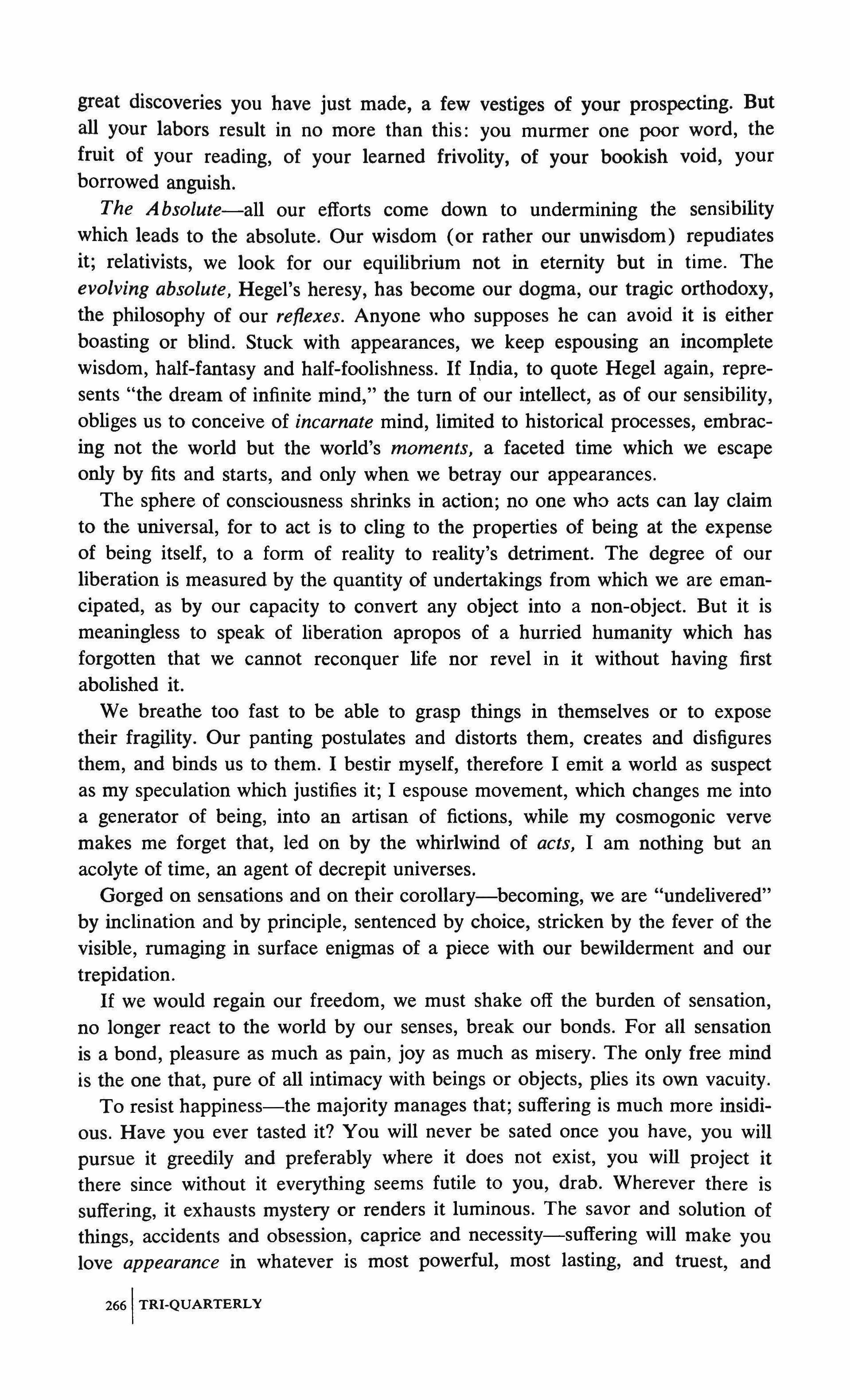
great discoveries you have just made, a few vestiges of your prospecting. But all your labors result in no more than this: you murmer one poor word, the fruit of your reading, of your learned frivolity, of your bookish void, your borrowed anguish.
The Absolute-all our efforts come down to undermining the sensibility which leads to the absolute. Our wisdom (or rather our unwisdom) repudiates it; relativists, we look for our equilibrium not in eternity but in time. The evolving absolute, Hegel's heresy, has become our dogma, our tragic orthodoxy, the philosophy of our reflexes. Anyone who supposes he can avoid it is either boasting or blind. Stuck with appearances, we keep espousing an incomplete wisdom, half-fantasy and half-foolishness. If India, to quote Hegel again, represents "the dream of infinite mind," the turn of our intellect, as of our sensibility, obliges us to conceive of incarnate mind, limited to historical processes, embracing not the world but the world's moments, a faceted time which we escape only by fits and starts, and only when we betray our appearances.
The sphere of consciousness shrinks in action; no one who acts can lay claim to the universal, for to act is to cling to the properties of being at the expense of being itself, to a form of reality to reality's detriment. The degree of our liberation is measured by the quantity of undertakings from which we are emancipated, as by our capacity to convert any object into a non-object. But it is meaningless to speak of liberation apropos of a hurried humanity which has forgotten that we cannot reconquer life nor revel in it without having first abolished it.
We breathe too fast to be able to grasp things in themselves or to expose their fragility. Our panting postulates and distorts them, creates and disfigures them, and binds us to them. I bestir myself, therefore I emit a world as suspect as my speculation which justifies it; I espouse movement, which changes me into a generator of being, into an artisan of fictions, while my cosmogonic verve makes me forget that, led on by the whirlwind of acts, I am nothing but an acolyte of time, an agent of decrepit universes.
Gorged on sensations and on their corollary-becoming, we are "undelivered" by inclination and by principle, sentenced by choice, stricken by the fever of the visible, rumaging in surface enigmas of a piece with our bewilderment and our trepidation.
If we would regain our freedom, we must shake off the burden of sensation, no longer react to the world by our senses, break our bonds. For all sensation is a bond, pleasure as much as pain, joy as much as misery. The only free mind is the one that, pure of all intimacy with beings or objects, plies its own vacuity. To resist happiness-the majority manages that; suffering is much more insidious. Have you ever tasted it? You will never be sated once you have, you will pursue it greedily and preferably where it does not exist, you will project it there since without it everything seems futile to you, drab. Wherever there is suffering, it exhausts mystery or renders it luminous. The savor and solution of things, accidents and obsession, caprice and necessity-suffering will make you love appearance in whatever is most powerful, most lasting, and truest, and

will tie you to itself forever, for "intense" by nature, it is, like any "intensity," a servitude, a subjection. The soul unfettered, the soul indifferent and voidhow in the world can we achieve that? How conquer absence, the freedom of absence? Such freedom will never figure among our mores, any more than "the dream of infinite mind."
To identify oneself with an alien doctrine, one must adopt it without restrictions: what is the use of acknowledging the truths of Buddhism and of rejecting transmigration, the very basis of the idea of renunciation? Of assenting to the Vedanta, of accepting the Unreality of matter and then behaving as if matter existed? An inconsistency inevitable for any mind raised in the cult of phenomena. For it must be admitted: we have the phenomenon in our blood. We may scorn it, abhor it, it is nonetheless our patrimony, our capital of agonies, the symbol of our sentence here on earth. A race of convulsionaries, at the center of a cosmic farce, we have imprinted on the universe the stigmata of our history and shall never be capable of that illumination which lets us die in peace. It is by our works, not by our silences, that we have chosen to disappear: our future may be read in our features, in the grimaces of agonized and busy prophets. The smile of the Buddha, that smile which overhangs the world, does not elucidate our faces. At best, we conceive happiness; never felicity, prerogative of civilizations based on the idea of salvation, on the refusal to savor one's sufferings, to revel in them; but, sybarites of suffering, scions of a masochistic tradition, which of us would hesitate between the Benares sermon and Baudelaire's Heautontimoroumenos? "I am both wound and knife"-that is our absolute, our eternity.
As for our redeemers, come among us for our greater harm, we love the noxiousness of their hopes and their remedies, their eagerness to favor and exalt our ills, the venom that infuses their "lifegiving" words. To them we owe our expertise in a suffering that has no exit. To what temptations, to what extremities does lucidity lead! Shall we desert it now to take refuge in unconsciousness? Anyone can escape into sleep, we are all geniuses when we dream, the butcher the poet's equal there. But our perspicacity cannot bear that such a marvel should endure, nor that inspiration should be brought within everyone's grasp; daylight strips us of the night's gifts. Only the madman enjoys the privilege of passing smoothly from a nocturnal to a daylight existence: no distinction between his dreams and his waking. He has renounced our reason, as the beggar has renounced our belongings. Both have found a way that leads beyond suffering and solved all our problems; hence they remain examples we cannot follow, saviors without adepts.
Even as we ransack our own diseases, those of other people regard us no less. In an age of biographies, no one bandages his wounds without our attempting to lay them bare, to expose them to broad daylight; if we fail, we tum away, disappointed. And even he who ended on the cross-it is not because he suffered for us that he still counts for something in our eyes, but because he suffered and uttered several lamentations as profound as they were gratuitous. For what we venerate in our gods are our own defeats en beau.
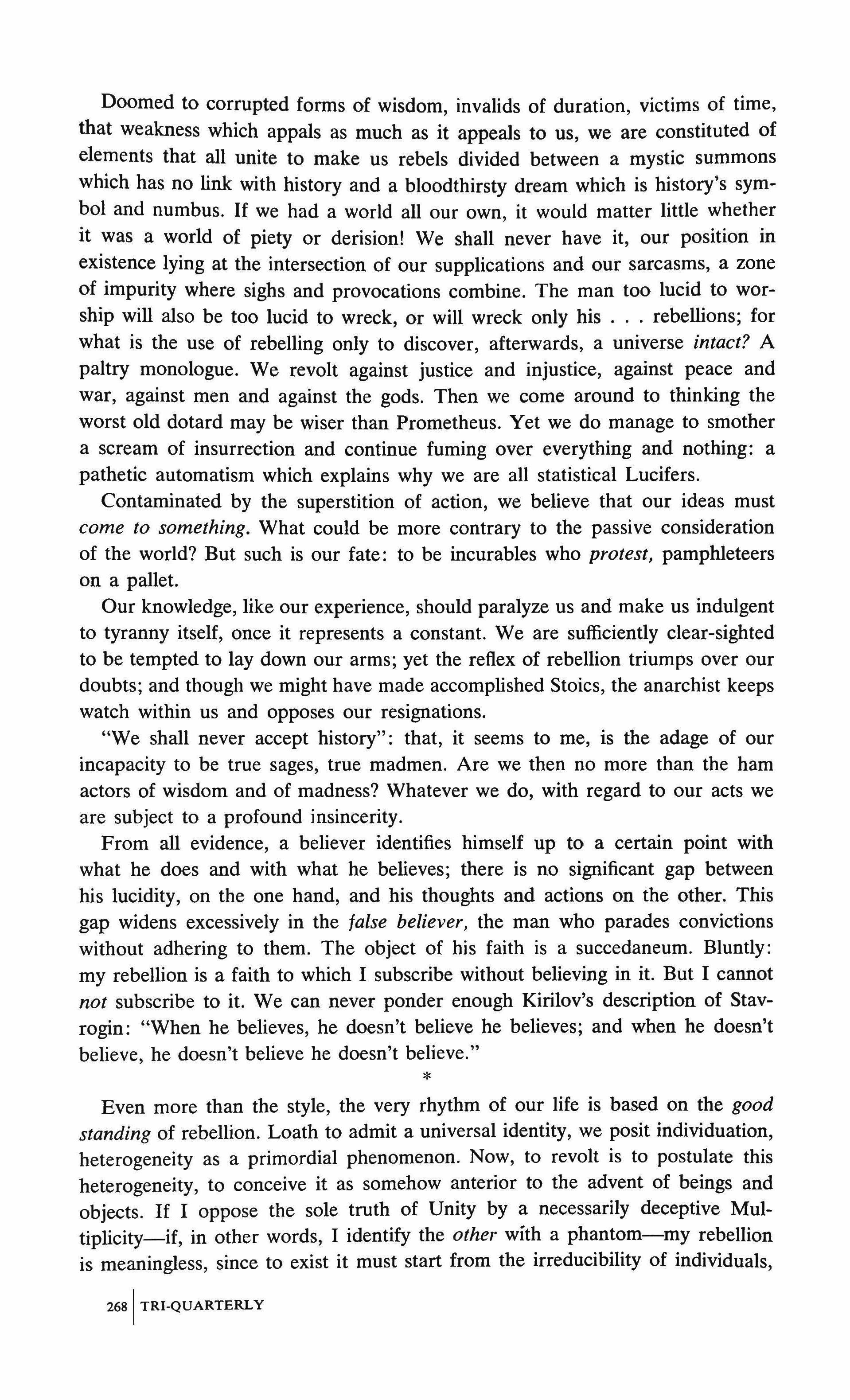
Doomed to corrupted forms of wisdom, invalids of duration, victims of time, that weakness which appals as much as it appeals to us, we are constituted of elements that all unite to make us rebels divided between a mystic summons which has no link with history and a bloodthirsty dream which is history's symbol and numbus. If we had a world all our own, it would matter little whether it was a world of piety or derision! We shall never have it, our position in existence lying at the intersection of our supplications and our sarcasms, a zone of impurity where sighs and provocations combine. The man too lucid to worship will also be too lucid to wreck, or will wreck only his rebellions; for what is the use of rebelling only to discover, afterwards, a universe intact? A paltry monologue. We revolt against justice and injustice, against peace and war, against men and against the gods. Then we come around to thinking the worst old dotard may be wiser than Prometheus. Yet we do manage to smother a scream of insurrection and continue fuming over everything and nothing: a pathetic automatism which explains why we are all statistical Lucifers.
Contaminated by the superstition of action, we believe that our ideas must come to something. What could be more contrary to the passive consideration of the world? But such is our fate: to be incurables who protest, pamphleteers on a pallet.
Our knowledge, like our experience, should paralyze us and make us indulgent to tyranny itself, once it represents a constant. We are sufficiently clear-sighted to be tempted to lay down our arms; yet the reflex of rebellion triumps over our doubts; and though we might have made accomplished Stoics, the anarchist keeps watch within us and opposes our resignations.
"We shall never accept history": that, it seems to me, is the adage of our incapacity to be true sages, true madmen. Are we then no more than the ham actors of wisdom and of madness? Whatever we do, with regard to our acts we are subject to a profound insincerity.
From all evidence, a believer identifies himself up to a certain point with what he does and with what he believes; there is no significant gap between his lucidity, on the one hand, and his thoughts and actions on the other. This gap widens excessively in the false believer, the man who parades convictions without adhering to them. The object of his faith is a succedaneum. Bluntly: my rebellion is a faith to which I subscribe without believing in it. But I cannot not subscribe to it. We can never ponder enough Kirilov's description of Stavrogin: "When he believes, he doesn't believe he believes; and when he doesn't believe, he doesn't believe he doesn't believe."
Even more than the style, the very rhythm of our life is based on the good standing of rebellion. Loath to admit a universal identity, we posit individuation, heterogeneity as a primordial phenomenon. Now, to revolt is to postulate this heterogeneity, to conceive it as somehow anterior to the advent of beings and objects. If I oppose the sole truth of Unity by a necessarily deceptive Multiplicity-if, in other words, I identify the other with a phantom-my rebellion is meaningless, since to exist it must start from the irreducibility of individuals,
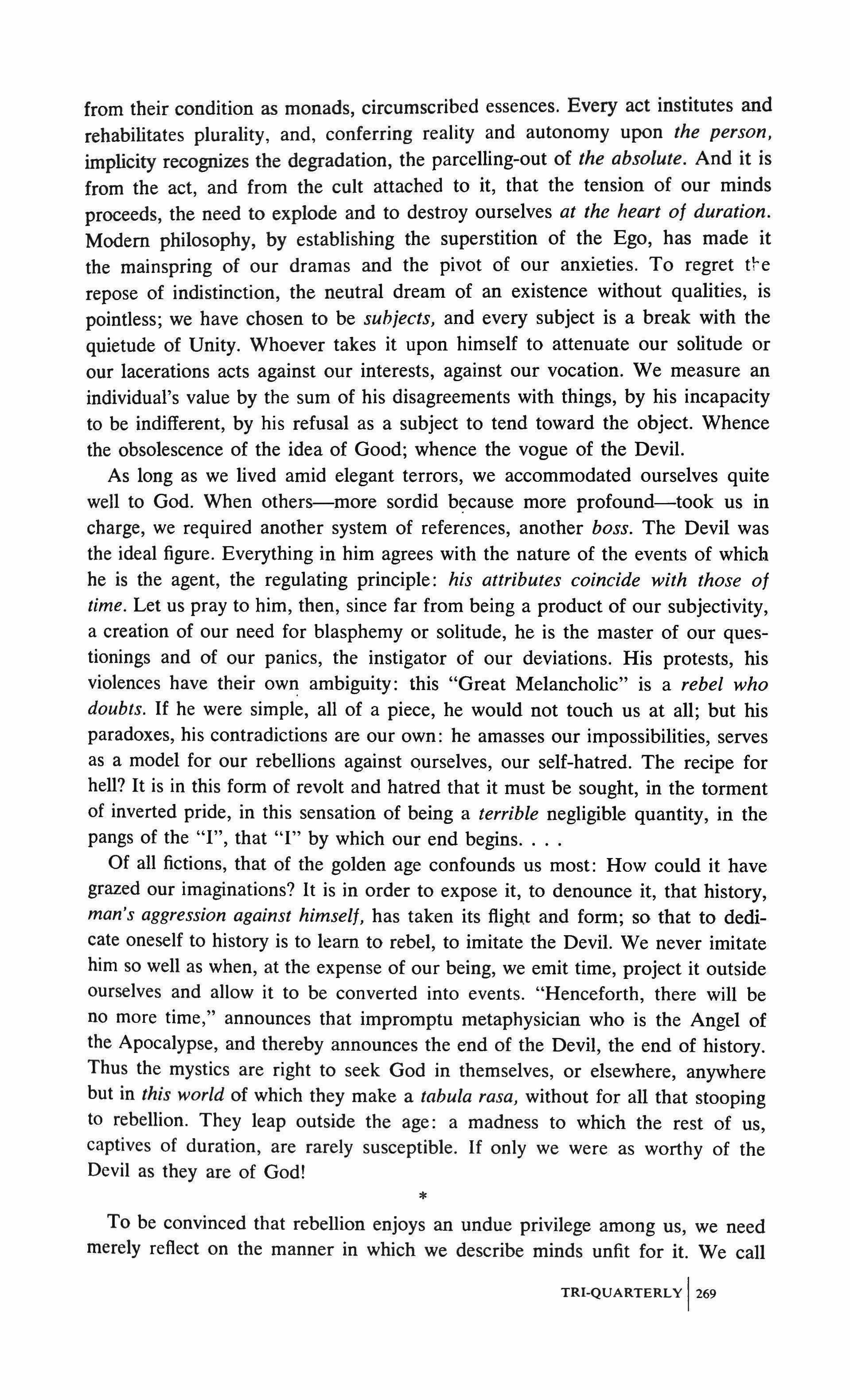
from their condition as monads, circumscribed essences. Every act institutes and rehabilitates plurality, and, conferring reality and autonomy upon the person, implicity recognizes the degradation, the parcelling-out of the absolute. And it is from the act, and from the cult attached to it, that the tension of our minds proceeds, the need to explode and to destroy ourselves at the heart of duration. Modem philosophy, by establishing the superstition of the Ego, has made it the mainspring of our dramas and the pivot of our anxieties. To regret t+e repose of indistinction, the neutral dream of an existence without qualities, is pointless; we have chosen to be subjects, and every subject is a break with the quietude of Unity. Whoever takes it upon himself to attenuate our solitude or our lacerations acts against our interests, against our vocation. We measure an individual's value by the sum of his disagreements with things, by his incapacity to be indifferent, by his refusal as a subject to tend toward the object. Whence the obsolescence of the idea of Good; whence the vogue of the Devil.
As long as we lived amid elegant terrors, we accommodated ourselves quite well to God. When others-more sordid because more profound-took us in charge, we required another system of references, another boss. The Devil was the ideal figure. Everything in him agrees with the nature of the events of which he is the agent, the regulating principle: his attributes coincide with those of time. Let us pray to him, then, since far from being a product of our subjectivity, a creation of our need for blasphemy or solitude, he is the master of our questionings and of our panics, the instigator of our deviations. His protests, his violences have their own ambiguity: this "Great Melancholic" is a rebel who doubts. If he were simple, all of a piece, he would not touch us at all; but his paradoxes, his contradictions are our own: he amasses our impossibilities, serves as a model for our rebellions against ourselves, our self-hatred. The recipe for hell? It is in this form of revolt and hatred that it must be sought, in the torment of inverted pride, in this sensation of being a terrible negligible quantity, in the pangs of the "I", that "1" by which our end begins
Of all fictions, that of the golden age confounds us most: How could it have grazed our imaginations? It is in order to expose it, to denounce it, that history, man's aggression against himself, has taken its flight and form; so that to dedicate oneself to history is to learn to rebel, to imitate the Devil. We never imitate him so well as when, at the expense of our being, we emit time, project it outside ourselves and allow it to be converted into events. "Henceforth, there will be no more time," announces that impromptu metaphysician who is the Angel of the Apocalypse, and thereby announces the end of the Devil, the end of history. Thus the mystics are right to seek God in themselves, or elsewhere, anywhere but in this world of which they make a tabula rasa, without for all that stooping to rebellion. They leap outside the age: a madness to which the rest of us, captives of duration, are rarely susceptible. If only we were as worthy of the Devil as they are of God!
*
To be convinced that rebellion enjoys an undue privilege among us, we need merely reflect on the manner in which we describe minds unfit for it. We call TRI-QUARTERLY 1269
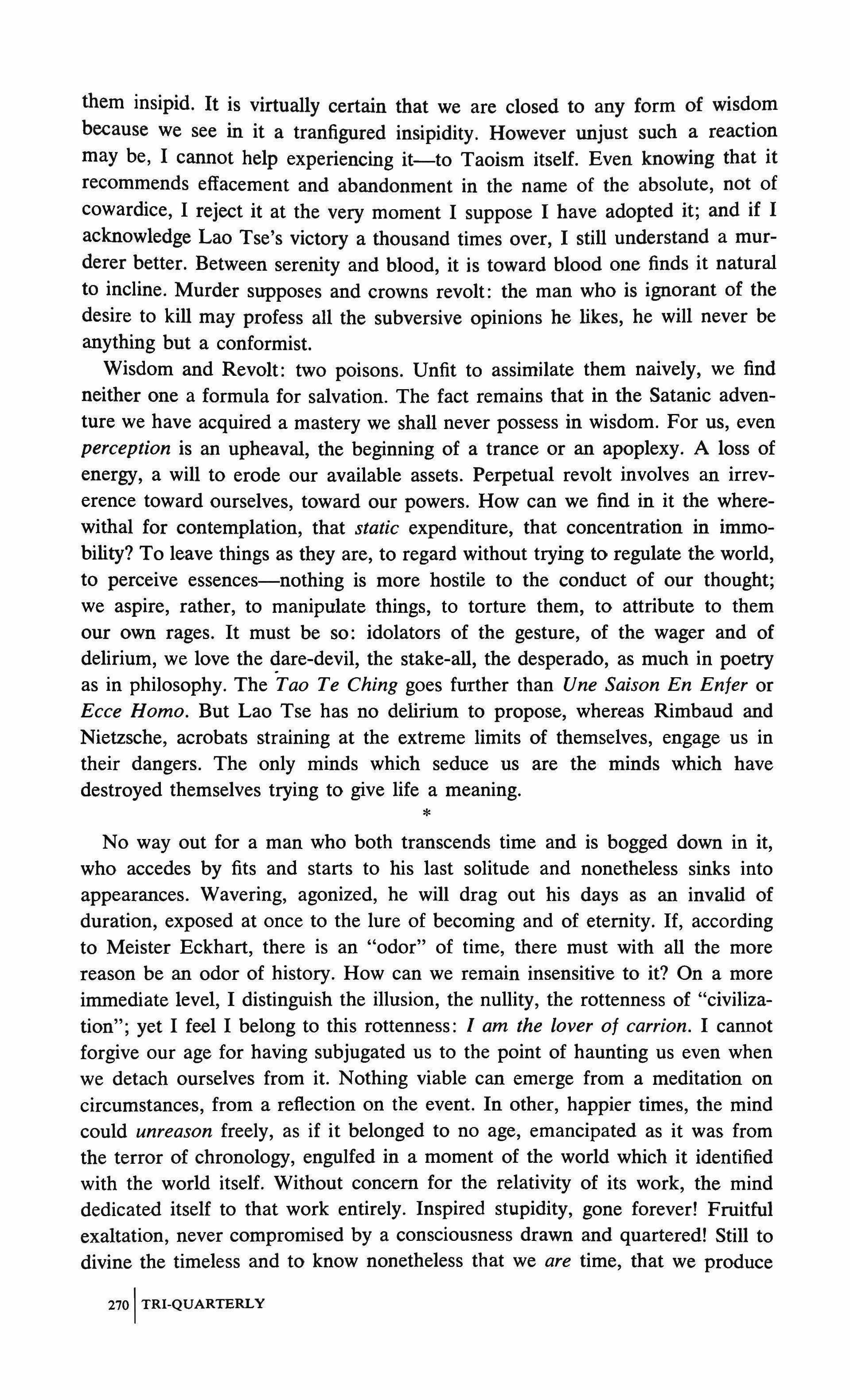
them insipid. It is virtually certain that we are closed to any form of wisdom because we see in it a tranfigured insipidity. However unjust such a reaction may be, I cannot help experiencing it-to Taoism itself. Even knowing that it recommends effacement and abandonment in the name of the absolute, not of cowardice, I reject it at the very moment I suppose I have adopted it; and if I acknowledge Lao Tse's victory a thousand times over, I still understand a murderer better. Between serenity and blood, it is toward blood one finds it natural to incline. Murder supposes and crowns revolt: the man who is ignorant of the desire to kill may profess all the subversive opinions he likes, he will never be anything but a conformist.
Wisdom and Revolt: two poisons. Unfit to assimilate them naively, we find neither one a formula for salvation. The fact remains that in the Satanic adventure we have acquired a mastery we shall never possess in wisdom. For us, even perception is an upheaval, the beginning of a trance or an apoplexy. A loss of energy, a will to erode our available assets. Perpetual revolt involves an irreverence toward ourselves, toward our powers. How can we find in it the wherewithal for contemplation, that static expenditure, that concentration in immobility? To leave things as they are, to regard without trying to regulate the world, to perceive essences-nothing is more hostile to the conduct of our thought; we aspire, rather, to manipulate things, to torture them, to attribute to them our own rages. It must be so: idolators of the gesture, of the wager and of delirium, we love the �are-devil, the stake-all, the desperado, as much in poetry as in philosophy. The Tao Te Ching goes further than Une Saison En Enier or Ecce Homo. But Lao Tse has no delirium to propose, whereas Rimbaud and Nietzsche, acrobats straining at the extreme limits of themselves, engage us in their dangers. The only minds which seduce us are the minds which have destroyed themselves trying to give life a meaning.
*
No way out for a man who both transcends time and is bogged down in it, who accedes by fits and starts to his last solitude and nonetheless sinks into appearances. Wavering, agonized, he will drag out his days as an invalid of duration, exposed at once to the lure of becoming and of eternity. If, according to Meister Eckhart, there is an "odor" of time, there must with all the more reason be an odor of history. How can we remain insensitive to it? On a more immediate level, I distinguish the illusion, the nullity, the rottenness of "civilization"; yet I feel I belong to this rottenness: I am the lover of carrion. I cannot forgive our age for having subjugated us to the point of haunting us even when we detach ourselves from it. Nothing viable can emerge from a meditation on circumstances, from a reflection on the event. In other, happier times, the mind could unreason freely, as if it belonged to no age, emancipated as it was from the terror of chronology, engulfed in a moment of the world which it identified with the world itself. Without concern for the relativity of its work, the mind dedicated itself to that work entirely. Inspired stupidity, gone forever! Fruitful exaltation, never compromised by a consciousness drawn and quartered! Still to divine the timeless and to know nonetheless that we are time, that we produce
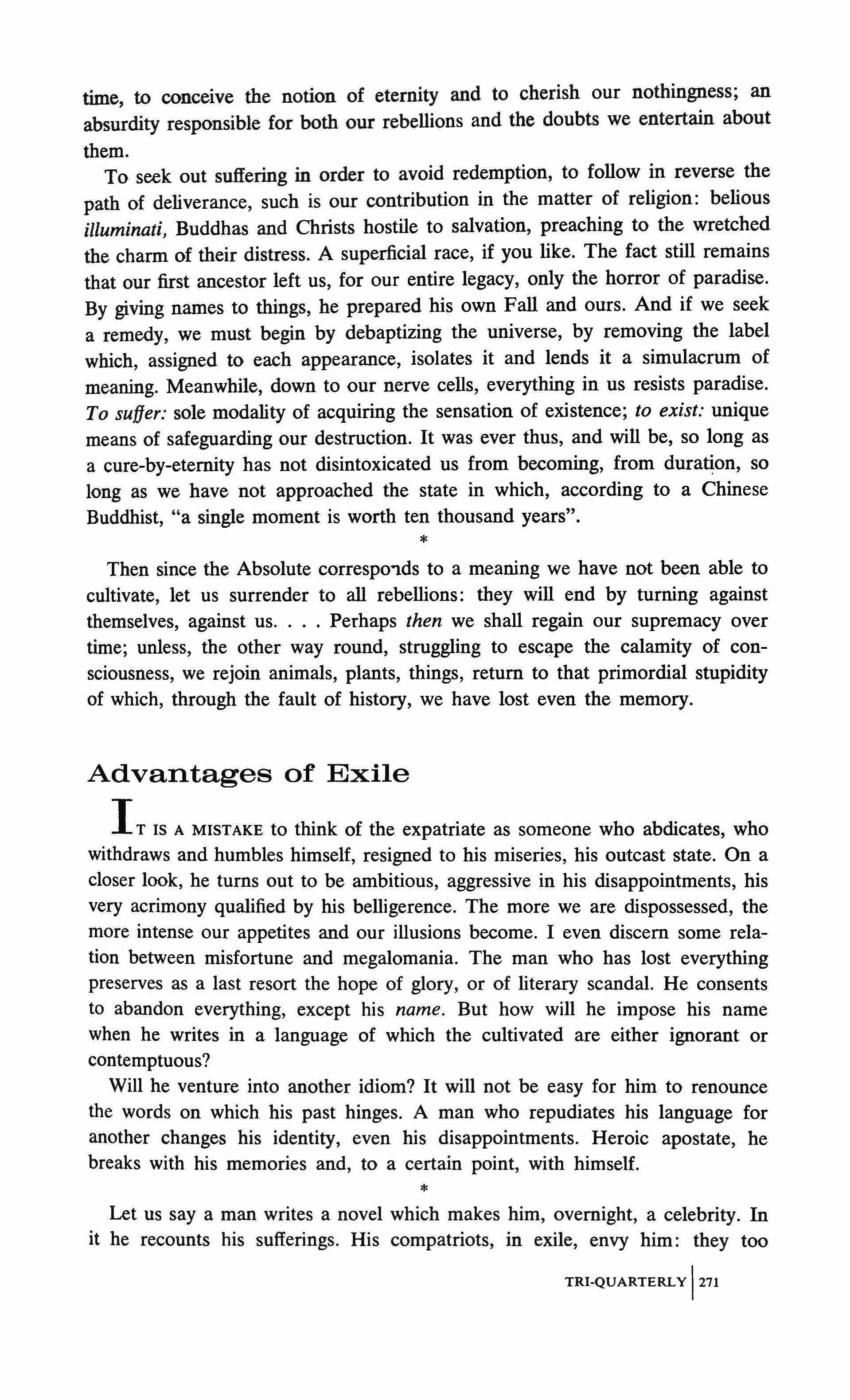
time, to conceive the notion of eternity and to cherish our nothingness; an absurdity responsible for both our rebellions and the doubts we entertain about them.
To seek out suffering in order to avoid redemption, to follow in reverse the path of deliverance, such is our contribution in the matter of religion: belious illuminati, Buddhas and Christs hostile to salvation, preaching to the wretched the charm of their distress. A superficial race, if you like. The fact still remains that our first ancestor left us, for our entire legacy, only the horror of paradise. By giving names to things, he prepared his own Fall and ours. And if we seek a remedy, we must begin by debaptizing the universe, by removing the label which, assigned to each appearance, isolates it and lends it a simulacrum of meaning. Meanwhile, down to our nerve cells, everything in us resists paradise. To suffer: sole modality of acquiring the sensation of existence; to exist: unique means of safeguarding our destruction. It was ever thus, and will be, so long as a cure-by-eternity has not disintoxicated us from becoming, from duration, so long as we have not approached the state in which, according to a Chinese Buddhist, "a single moment is worth ten thousand years".
Then since the Absolute corresponds to a meaning we have not been able to cultivate, let us surrender to all rebellions: they will end by turning against themselves, against us. Perhaps then we shall regain our supremacy over time; unless, the other way round, struggling to escape the calamity of consciousness, we rejoin animals, plants, things, return to that primordial stupidity of which, through the fault of history, we have lost even the memory.
IT IS A MISTAKE to think of the expatriate as someone who abdicates, who withdraws and humbles himself, resigned to his miseries, his outcast state. On a closer look, he turns out to be ambitious, aggressive in his disappointments, his very acrimony qualified by his belligerence. The more we are dispossessed, the more intense our appetites and our illusions become. I even discern some relation between misfortune and megalomania. The man who has lost everything preserves as a last resort the hope of glory, or of literary scandal. He consents to abandon everything, except his name. But how will he impose his name when he writes in a language of which the cultivated are either ignorant or contemptuous?
Will he venture into another idiom? It will not be easy for him to renounce the words on which his past hinges. A man who repudiates his language for another changes his identity, even his disappointments. Heroic apostate, he breaks with his memories and, to a certain point, with himself.
Let us say a man writes a novel which makes him, overnight, a celebrity. In it he recounts his sufferings. His compatriots, in exile, envy him: they too

have suffered, perhaps more. And the man without a country becomes--or aspires to become-a novelist. The consequence: an accumulation of confusions, an inflation of horrors, of [rissons that date. One cannot keen renewing Hell, whose very characteristic is monotony, or the face of Exile either. Nothing in literature exasperates a reader so much as The Terrible; in life, it is too tainted with the obvious to give us pause. But our author persists; for the time being he buries his novel in a drawer and awaits his hour. The illusion of a surprise, of a renown which eludes his grasp but which he discounts, sustains him; he lives on unreality. Such, however, is the power of this illusion that if, for instance, he works in some factory, it is with the notion of being freed from it one day or another by a fame as sudden as it is inconceivable.
Equally tragic is the case of the poet. Walled up in his own language, he writes for his friends-for ten, for twenty persons at the most. His longing to be read is no less imperious than that of the improvised novelist. At least he has the advantage over the latter of being able to get his verses published in the little emigre reviews which appear at the cost of almost indecent sacrifices and renunciations. Let us say such a man becomes-transforms himself into-an editor of such a review; to keep his publication alive he risks hunger, abstains from women, buries himself in a windowless room, imposes privations which confound and appal. Tuberculosis and masturbation, that is his fate.
No matter how scanty the number of emigres, they form groups, not to protect their interests but to get up subscriptions, to bleed each other white in order to publish their regrets, their cries, their echoless appeals. One cannot conceive of a more heart-rending form of the gratuitous.
That they are as good poets as they are bad prose-writers can be accounted for readily enough. Consider the literary production of any "minor" nation which has not been so childish as to make up a past for itself: the abundance of poetry is its most striking characteristic. Prose requires, for its development, a certain rigor, a differentiated social status, and a tradition: it is deliberate, constructed; poetry wells up: it is direct or else totally fabricated; the prerogative of cave-men or aesthetes, it flourishes only on the near or far side of civilization, never at the center. Whereas prose demands a premeditated genius and a crystallized language, poetry is perfectly compatible with a barbarous genius and a formless language. To create a literature is to create a prose.
What could be more natural than that so many possess no other mode of expression than poetry? Even those who are not particularly gifted draw, in their uprooted state, upon the automatism of their exclusion, that bonus talent they would never have found in a normal existence. Whatever the form it happens to take, and whatever its cause, exile-at its start-is an academy of intoxication. And it is not given to everyone to be a drunkard. It is a limit-situation, and resembles the extremity of the poetic state. Is it not a favor to be transported to that state straight off, without the detours of a discipline, by no more than the benevolence of fatality? Think of Rilke,
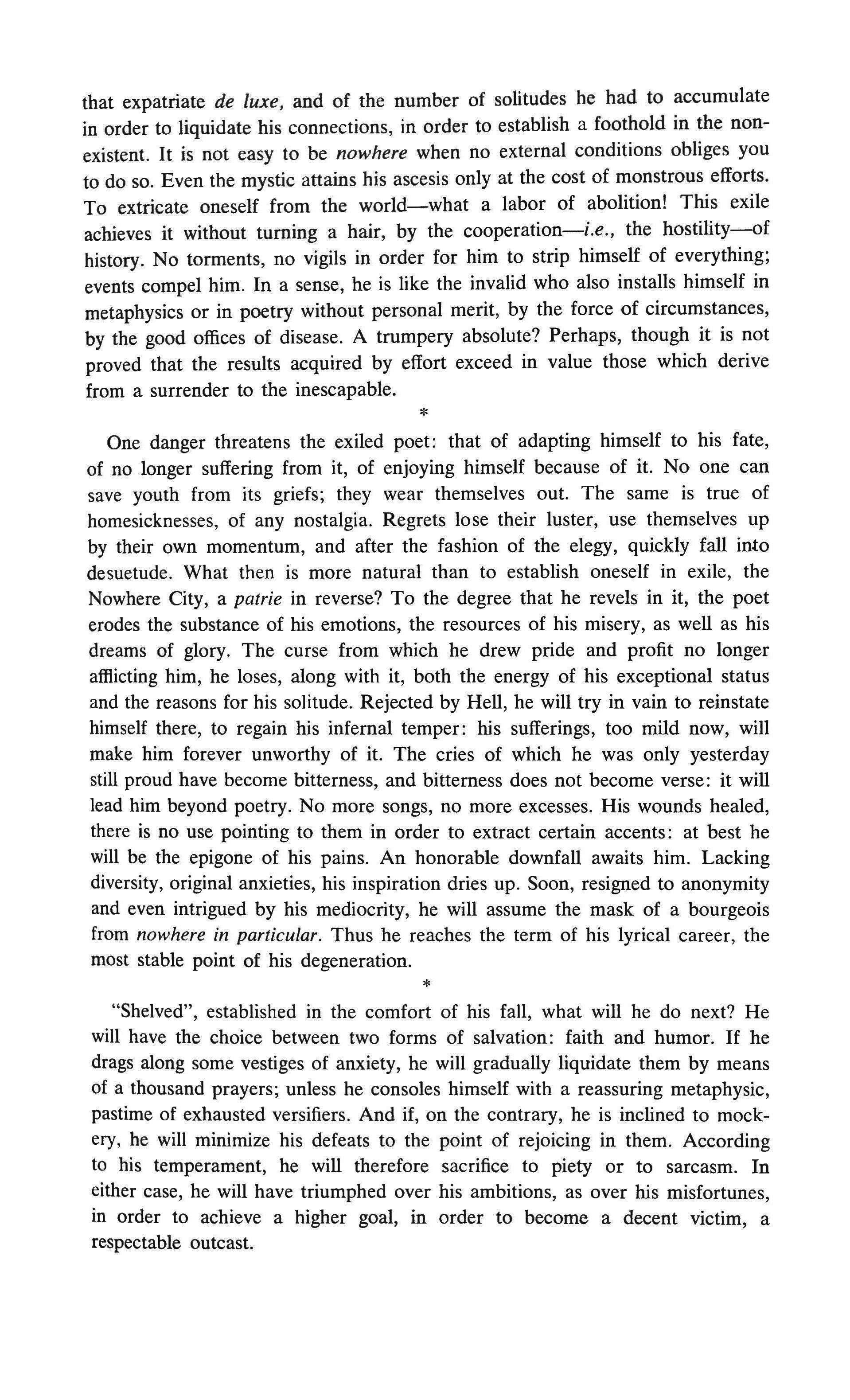
that expatriate de luxe, and of the number of solitudes he had to accumulate in order to liquidate his connections, in order to establish a foothold in the nonexistent. It is not easy to be nowhere when no external conditions obliges you to do so. Even the mystic attains his ascesis only at the cost of monstrous efforts. To extricate oneself from the world-what a labor of abolition! This exile achieves it without turning a hair, by the cooperation-i.e., the hostility-of history. No torments, no vigils in order for him to strip himself of everything; events compel him. In a sense, he is like the invalid who also installs himself in metaphysics or in poetry without personal merit, by the force of circumstances, by the good offices of disease. A trumpery absolute? Perhaps, though it is not proved that the results acquired by effort exceed in value those which derive from a surrender to the inescapable. *
One danger threatens the exiled poet: that of adapting himself to his fate, of no longer suffering from it, of enjoying himself because of it. No one can save youth from its griefs; they wear themselves out. The same is true of homesicknesses, of any nostalgia. Regrets lose their luster, use themselves up by their own momentum, and after the fashion of the elegy, quickly fall into desuetude. What then is more natural than to establish oneself in exile, the Nowhere City, a patrie in reverse? To the degree that he revels in it, the poet erodes the substance of his emotions, the resources of his misery, as well as his dreams of glory. The curse from which he drew pride and profit no longer afflicting him, he loses, along with it, both the energy of his exceptional status and the reasons for his solitude. Rejected by Hell, he will try in vain to reinstate himself there, to regain his infernal temper: his sufferings, too mild now, will make him forever unworthy of it. The cries of which he was only yesterday still proud have become bitterness, and bitterness does not become verse: it will lead him beyond poetry. No more songs, no more excesses. His wounds healed, there is no use pointing to them in order to extract certain accents: at best he will be the epigone of his pains. An honorable downfall awaits him. Lacking diversity, original anxieties, his inspiration dries up. Soon, resigned to anonymity and even intrigued by his mediocrity, he will assume the mask of a bourgeois from nowhere in particular. Thus he reaches the term of his lyrical career, the most stable point of his degeneration.
"Shelved", established in the comfort of his fall, what will he do next? He will have the choice between two forms of salvation: faith and humor. If he drags along some vestiges of anxiety, he will gradually liquidate them by means of a thousand prayers; unless he consoles himself with a reassuring metaphysic, pastime of exhausted versifiers. And if, on the contrary, he is inclined to mockery, he will minimize his defeats to the point of rejoicing in them. According to his temperament, he will therefore sacrifice to piety or to sarcasm. In either case, he will have triumphed over his ambitions, as over his misfortunes, in order to achieve a higher goal, in order to become a decent victim, a respectable outcast.

In his recent biography of David Sarnoff, Eugene Lyons writes about Sarnoff's efforts on behalf of high-quality music on the air, which he says attained their climax in Toscanini's broadcasts with the NBC Symphony. "In Toscanini, an Intimate Portrait, a charming and colorful little book published in 1956, the late Samuel Chotzinoff told how it all started," says Lyons. But Chotzinoff's account-of his trip to Milan in 1937 for NBC; of Mme. Toscanini's "No, no impossibile' concerning the NBC proposal, her warning about Toscanini's "current state of unreceptiveness," her advice to "wait for some more propitious moment;" of the days and weeks passing, with Chotzinoff not daring to speak and Toscanini getting impatient at his silence; of the visit of the Gatti-Casazzas during which Toscanini recalled to Gatti the man with the evil eye who had ruined the premiere of Euryanthe at the Metropolitan; of Chotzinoff's staying on after the Gattis left and his taking advantage of Toscanini's good humor to bring up the NBC proposal; of his persuading Toscanini to accept it by telling him a story about some canaries that had begun to sing in the choral finale of Beethoven's Ninth during the broadcast of a Toscanini performance with the New York Philharmonic-all this, while certainly colorful, is, I am sure, mostly untrue. The January 1938 issue of Fortune had an article about the newly initiated NBC Symphony broadcasts written by friends of Chotzinoff, Russell and Marcia Davenport, which included an account of the Milan negotiations that he must have given when he returned: that he had cabled Toscanini in advance that he was coming with an "important proposition;" that at his first meeting with the Toscaninis he wasn't able to nerve himself to answer their questions about the "proposition;" that the next day he first consulted Mme. Toscanini, who thought Toscanini would be not annoyed but interested; that Chotzinoff thereupon did
TRI-QVARTERLY
give Toscanini NBC's invitation and the memorandum outlining several alternative offers; and that after reading the memorandum carefully Toscanini accepted the offer of a series of ten weekly broadcasts. In addition to the other good reasons for believing the account in Fortune rather than the one in Chotzinoff's book eighteen years later, there is the fact that Lyons supplies the date of Toscanini's acceptance, 2 February 1937, and the Fortune article begins: "It was the last day of January, 1937, and rain and sleet shrouded the boat train as it pulled into the big, drafty station at Milan."
If one asks why Chotzinoff should have invented those details eighteen years later, part of the answer is that he did it for the same reason as he invented the details in his account of the terrible incident near the end of the Tannhauser Bacchanale, in the last broadcast in 1954, when Toscanini's memory failed him and he stopped conducting, putting his hand to his eyes in an attempt to remember. What actually happened at that point was that the orchestra's first cellist, Frank Miller, kept the performance going, Toscanini began to beat time again, the piece was completed, and the audience applauded. But Chotzinoff writes in his book that when Toscanini stopped conducting "the men stopped playing and the house was engulfed in terrible silence;" and his reason for writing what isn't true is that it makes a more dramatic story. This, I repeat, is also one of his reasons for the inventions about the negotiations in Milan; but in these he has an additional purpose. The purpose is evident in the picture of Toscanini that is presented: the Toscanini who in the Fortune account behaves wholly reasonably and rationally is transformed in the book into someone whose moods terrorize everyone around him, who tells a story about a man with the evil eye, and who is persuaded to accept NBC's offer by a story about canaries having joined in his broadcast of the Ninth. The purpose is fully achieved in the many additional stories in the book with which Chotzinoff-professing to write as a longsuffering but still devoted friend revealing the human weaknesses of a fascinating genius-horrified a public which had heard of Toscanini's explosions at rehearsals, but only now learned of the extremes to which, according
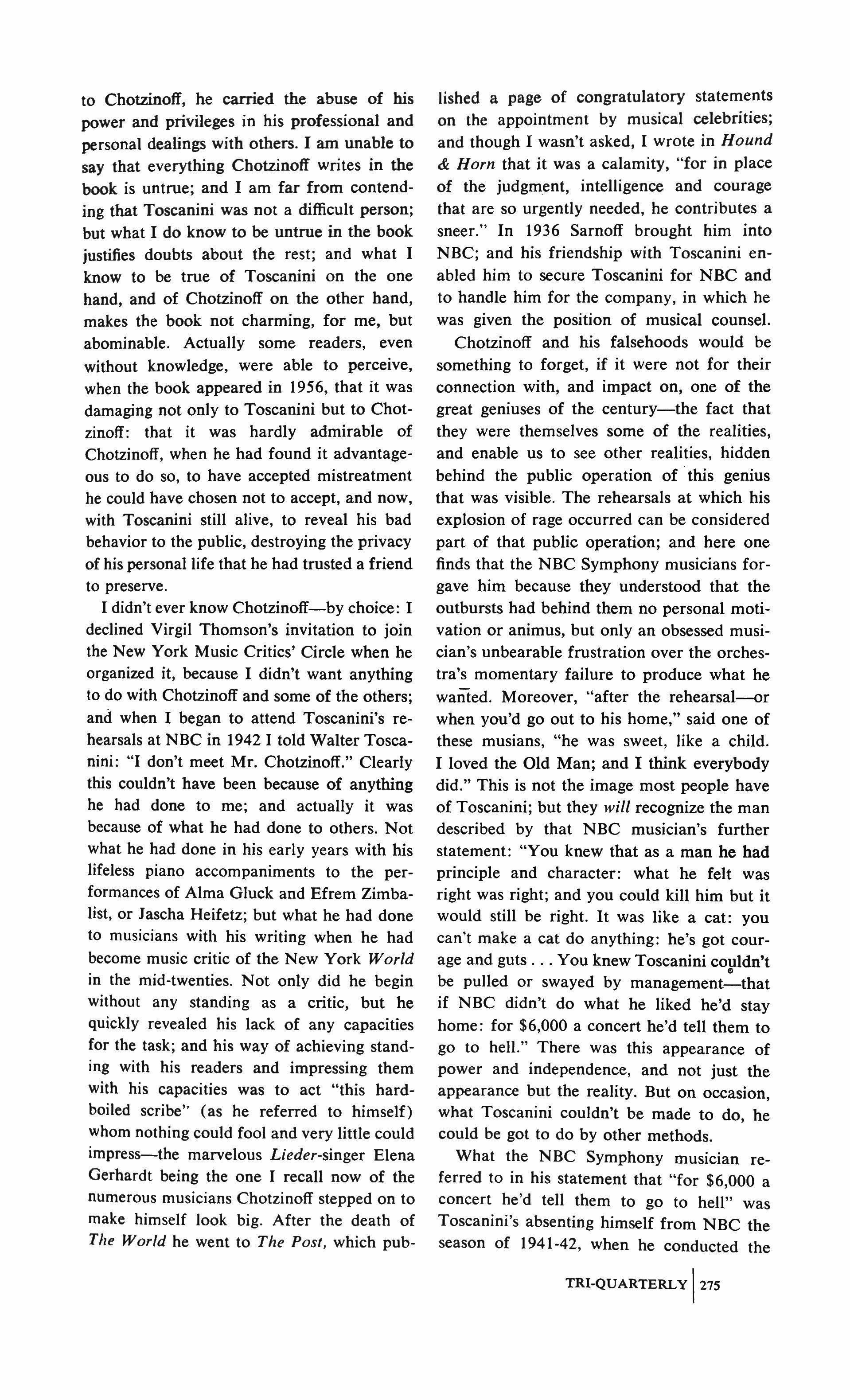
to Chotzinoff, he carried the abuse of his power and privileges in his professional and personal dealings with others. I am unable to say that everything Chotzinoff writes in the book is untrue; and I am far from contending that Toscanini was not a difficult person; but what I do know to be untrue in the book justifies doubts about the rest; and what I know to be true of Toscanini on the one hand, and of Chotzinoff on the other hand, makes the book not charming, for me, but abominable. Actually some readers, even without knowledge, were able to perceive, when the book appeared in 1956, that it was damaging not only to Toscanini but to Chotzinoff: that it was hardly admirable of Chotzinoff, when he had found it advantageous to do so, to have accepted mistreatment he could have chosen not to accept, and now, with Toscanini still alive, to reveal his bad behavior to the public, destroying the privacy of his personal life that he had trusted a friend to preserve.
I didn't ever know Chotzinoff-by choice: I declined Virgil Thomson's invitation to join the New York Music Critics' Circle when he organized it, because I didn't want anything to do with Chotzinoff and some of the others; and when I began to attend Toscanini's rehearsals at NBC in 1942 I told Walter Toscanini: "I don't meet Mr. Chotzinoff." Clearly this couldn't have been because of anything he had done to me; and actually it was because of what he had done to others. Not what he had done in his early years with his lifeless piano accompaniments to the performances of Alma Gluck and Efrem Zimbalist. or lascha Heifetz; but what he had done to musicians with his writing when he had become music critic of the New York World in the mid-twenties. Not only did he begin without any standing as a critic, but he quickly revealed his lack of any capacities for the task; and his way of achieving standing with his readers and impressing them with his capacities was to act "this hardboiled scribe" (as he referred to himself) whom nothing could fool and very little could impress-the marvelous Lieder-singer Elena Gerhardt being the one I recall now of the numerous musicians Chotzinoff stepped on to make himself look big. After the death of The World he went to The Post. which pub-
Iished a page of congratulatory statements on the appointment by musical celebrities; and though I wasn't asked, I wrote in Hound & Horn that it was a calamity. "for in place of the judgment, intelligence and courage that are so urgently needed. he contributes a sneer." In 1936 Sarnoff brought him into NBC; and his friendship with Toscanini enabled him to secure Toscanini for NBC and to handle him for the company. in which he was given the position of musical counsel.
Chotzinoff and his falsehoods would be something to forget. if it were not for their connection with. and impact on, one of the great geniuses of the century-the fact that they were themselves some of the realities, and enable us to see other realities, hidden behind the public operation of' this genius that was visible. The rehearsals at which his explosion of rage occurred can be considered part of that public operation; and here one finds that the NBC Symphony musicians forgave him because they understood that the outbursts had behind them no personal motivation or animus, but only an obsessed musician's unbearable frustration over the orchestra's momentary failure to produce what he wanted. Moreover, "after the rehearsal-or when you'd go out to his home," said one of these musians, "he was sweet, like a child. I loved the Old Man; and I think everybody did." This is not the image most people have of Toscanini; but they will recognize the man described by that NBC musician's further statement: "You knew that as a man he had principle and character: what he felt was right was right; and you could kill him but it would still be right. It was like a cat: you can't make a cat do anything: he's got courage and guts You knew Toscanini couldn't be pulled or swayed by management':'_that if NBC didn't do what he liked he'd stay home: for $6,000 a concert he'd tell them to go to hell." There was this appearance of power and independence, and not just the appearance but the reality. But on occasion, what Toscanini couldn't be made to do, he could be got to do by other methods.
What the NBC Symphony musician referred to in his statement that "for $6,000 a concert he'd tell them to go to hell" was Toscanini's absenting himself from NBC the season of 1941-42, when he conducted the TRI-QUARTERLy 1275
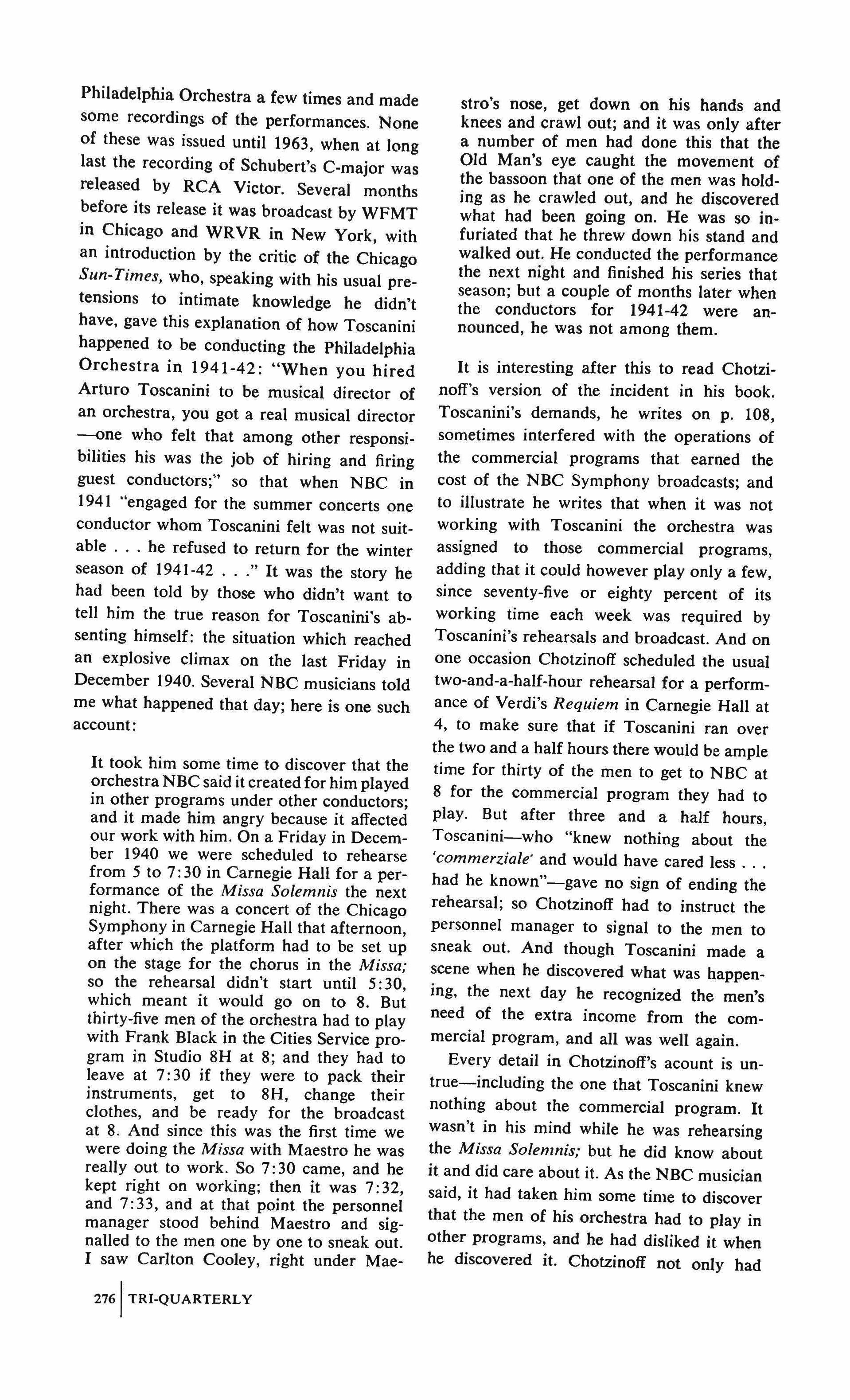
Philadelphia Orchestra a few times and made some recordings of the performances. None of these was issued until 1963, when at long last the recording of Schubert's C-major was released by RCA Victor. Several months before its release it was broadcast by WFMT in Chicago and WRVR in New York, with an introduction by the critic of the Chicago Sun-Times, who, speaking with his usual pretensions to intimate knowledge he didn't have, gave this explanation of how Toscanini happened to be conducting the Philadelphia Orchestra in 1941-42: "When you hired Arturo Toscanini to be musical director of an orchestra, you got a real musical director -one who felt that among other responsibilities his was the job of hiring and firing guest conductors;" so that when NBC in 1941 "engaged for the summer concerts one conductor whom Toscanini felt was not suitable he refused to return for the winter season of 1941-42 ." It was the story he had been told by those who didn't want to tell him the true reason for Toscanini's absenting himself: the situation which reached an explosive climax on the last Friday in December 1940. Several NBC musicians told me what happened that day; here is one such account:
It took him some time to discover that the orchestra NBC said it created for him played in other programs under other conductors; and it made him angry because it affected our work with him. On a Friday in December 1940 we were scheduled to rehearse from 5 to 7: 30 in Carnegie Hall for a performance of the Missa Solemnis the next night. There was a concert of the Chicago Symphony in Carnegie Hall that afternoon, after which the platform had to be set up on the stage for the chorus in the Missa; so the rehearsal didn't start until 5: 30, which meant it would go on to 8. But thirty-five men of the orchestra had to play with Frank Black in the Cities Service program in Studio 8H at 8; and they had to leave at 7: 30 if they were to pack their instruments, get to 8H, change their clothes, and be ready for the broadcast at 8. And since this was the first time we were doing the Missa with Maestro he was really out to work. So 7:30 came, and he kept right on working; then it was 7: 32, and 7: 33, and at that point the personnel manager stood behind Maestro and signalled to the men one by one to sneak out.
I saw Carlton Cooley, right under Mae-
TRI-QUARTERLY
stro's nose, get down on his hands and knees and crawl out; and it was only after a number of men had done this that the Old Man's eye caught the movement of the bassoon that one of the men was holding as he crawled out, and he discovered what had been going on. He was so infuriated that he threw down his stand and walked out. He conducted the performance the next night and finished his series that season; but a couple of months later when the conductors for 1941-42 were announced, he was not among them.
It is interesting after this to read Chotzinoff's version of the incident in his book. Toscanini's demands, he writes on p. 108, sometimes interfered with the operations of the commercial programs that earned the cost of the NBC Symphony broadcasts; and to illustrate he writes that when it was not working with Toscanini the orchestra was assigned to those commercial programs, adding that it could however play only a few, since seventy-five or eighty percent of its working time each week was required by Toscanini's rehearsals and broadcast. And on one occasion Chotzinoff scheduled the usual two-and-a-half-hour rehearsal for a performance of Verdi's Requiem in Carnegie Hall at 4, to make sure that if Toscanini ran over the two and a half hours there would be ample time for thirty of the men to get to NBC at 8 for the commercial program they had to play. But after three and a half hours, Toscanini-who "knew nothing about the 'commerzlale' and would have cared less had he known"-gave no sign of ending the rehearsal; so Chotzinoff had to instruct the personnel manager to signal to the men to sneak out. And though Toscanini made a scene when he discovered what was happening, the next day he recognized the men's need of the extra income from the commercial program, and all was well again. Every detail in Chotzinoff's acount is untrue-including the one that Toscanini knew nothing about the commercial program. It wasn't in his mind while he was rehearsing the Missa Solemnis; but he did know about it and did care about it. As the NBC musician said, it had taken him some time to discover that the men of his orchestra had to play in other programs, and he had disliked it when he discovered it. Chotzinoff not only had
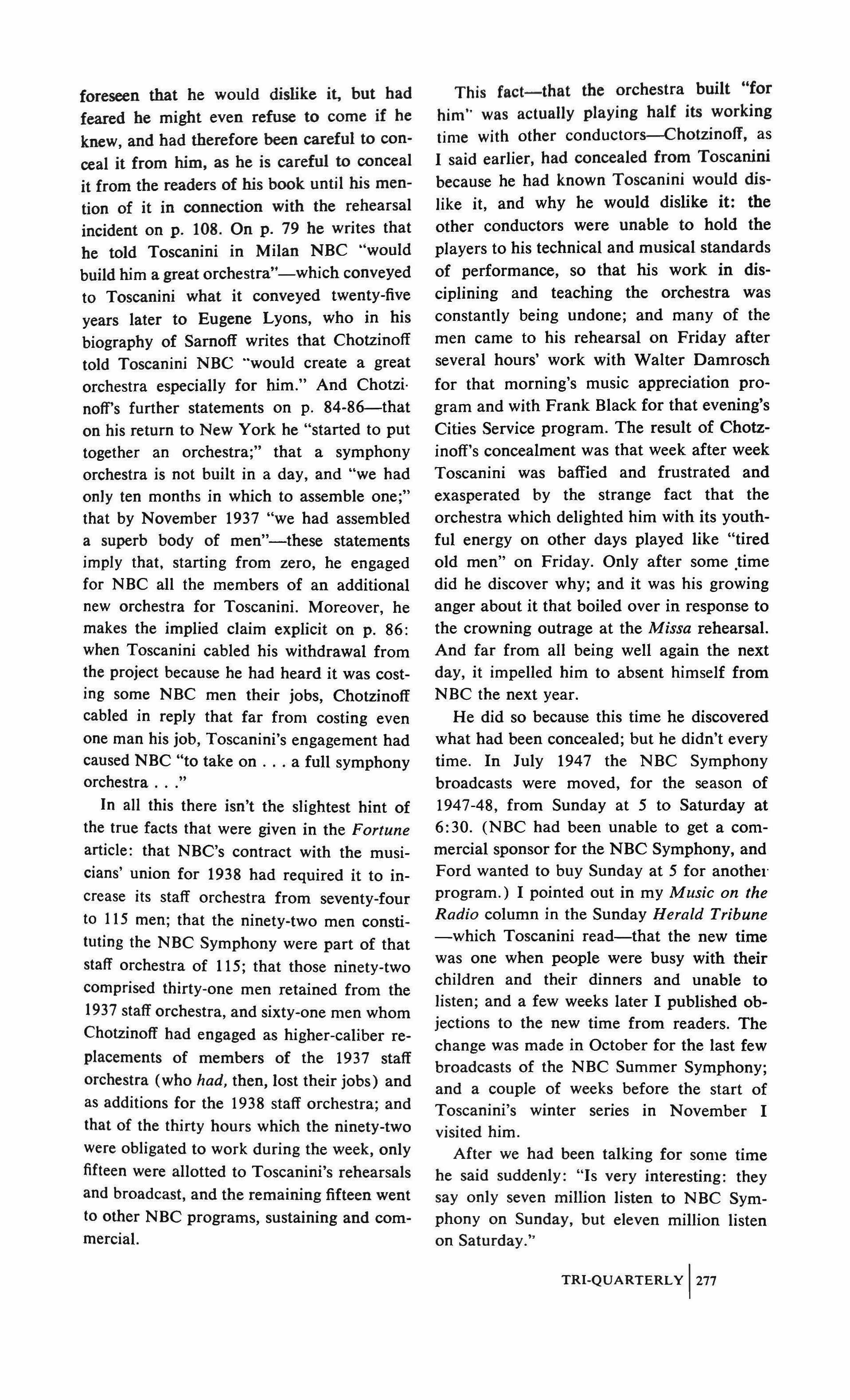
foreseen that he would dislike it. but bad feared he might even refuse to come if he knew, and had therefore been careful to conceal it from him, as he is careful to conceal it from the readers of his book until his mention of it in connection with the rehearsal incident on p. 108. On p. 79 he writes that he told Toscanini in Milan NBC "would build him a great orchestra"-which conveyed to Toscanini what it conveyed twenty-five years later to Eugene Lyons, who in his biography of Sarnoff writes that Chotzinoff told Toscanini NBC "would create a great orchestra especially for him." And Chotzineff's further statements on p. 84-86-that on his return to New York he "started to put together an orchestra;" that a symphony orchestra is not built in a day, and "we had only ten months in which to assemble one;" that by November 1937 "we had assembled a superb body of men"-these statements imply that, starting from zero, he engaged for NBC all the members of an additional new orchestra for Toscanini. Moreover, he makes the implied claim explicit on p. 86: when Toscanini cabled his withdrawal from the project because he had heard it was costing some NBC men their jobs, Chotzinoff cabled in reply that far from costing even one man his job, Toscanini's engagement had caused NBC "to take on a full symphony orchestra
In all this there isn't the slightest hint of the true facts that were given in the Fortune article: that NBC's contract with the musicians' union for 1938 had required it to increase its staff orchestra from seventy-four to 115 men; that the ninety-two men constituting the NBC Symphony were part of that staff orchestra of 115; that those ninety-two comprised thirty-one men retained from the 1937 staff orchestra, and sixty-one men whom Chotzinoff had engaged as higher-caliber replacements of members of the 1937 staff orchestra (who had, then, lost their jobs) and as additions for the 1938 staff orchestra; and that of the thirty hours which the ninety-two were obligated to work during the week, only fifteen were allotted to Toscanini's rehearsals and broadcast, and the remaining fifteen went to other NBC programs, sustaining and commercial.
This fact-that the orchestra built "for him" was actually playing half its working time with other conductors--Chotzinoff, as I said earlier, had concealed from Toscanini because he had known Toscanini would dislike it, and why he would dislike it: the other conductors were unable to hold the players to his technical and musical standards of performance, so that his work in disciplining and teaching the orchestra was constantly being undone; and many of the men came to his rehearsal on Friday after several hours' work with Walter Damrosch for that morning's music appreciation program and with Frank Black for that evening's Cities Service program. The result of Chotzinoff's concealment was that week after week Toscanini was baffled and frustrated and exasperated by the strange fact that the orchestra which delighted him with its youthful energy on other days played like "tired old men" on Friday. Only after some jirne did he discover why; and it was his growing anger about it that boiled over in response to the crowning outrage at the Missa rehearsal. And far from all being well again the next day, it impelled him to absent himself from NBC the next year.
He did so because this time he discovered what had been concealed; but he didn't every time. In July 1947 the NBC Symphony broadcasts were moved, for the season of 1947-48, from Sunday at 5 to Saturday at 6:30. (NBC had been unable to get a commercial sponsor for the NBC Symphony, and Ford wanted to buy Sunday at 5 for another program.) I pointed out in my Music on the Radio column in the Sunday Herald Tribune -which Toscanini read-that the new time was one when people were busy with their children and their dinners and unable to listen; and a few weeks later I published objections to the new time from readers. The change was made in October for the last few broadcasts of the NBC Summer Symphony; and a couple of weeks before the start of Toscanini's winter series in November I visited him.
After we had been talking for some time he said suddenly: "Is very interesting: they say only seven million listen to NBC Symphony on Sunday, but eleven million listen on Saturday."
TRI-QUARTERLy 1277
Since nobody could be listening to his broadcasts that hadn't even begun, I asked: "How do they know that?"
"NBC make investigation," he said. Again, NBC couldn't have "investigated" how many people were listening to the broadcasts that hadn't begun; so I asked: "Who told you that?"
"Chotzinoff.
In its July announcement NBC had said a greater number of stations would carry the program on Saturday at 6:30 (I pointed out that this was because the time was not commercially valuable, since many people couldn't listen); and it probably had estimated from the number of stations a potential eleven million as the number of people who would be listening. If one had pressed Chotzinoff he undoubtedly would have said he was referring to this advance estimate; but he apparently had given Toscanini the impression that NBC had conducted a survey of a kind which had enabled it to established eleven million as the number of actual listeners; and this caused Toscanini to accept a change of time which cost him part of his audience, and which he would have objected to, and might even have refused to accept, if he had understood the real nature of the "investigation." The incident was in effect a betrayal of his interest by someone he had trusted not to betray him.
And the final betrayal was the malicious and largely false book that Chotzinoff published after the end of the NBC Symphony
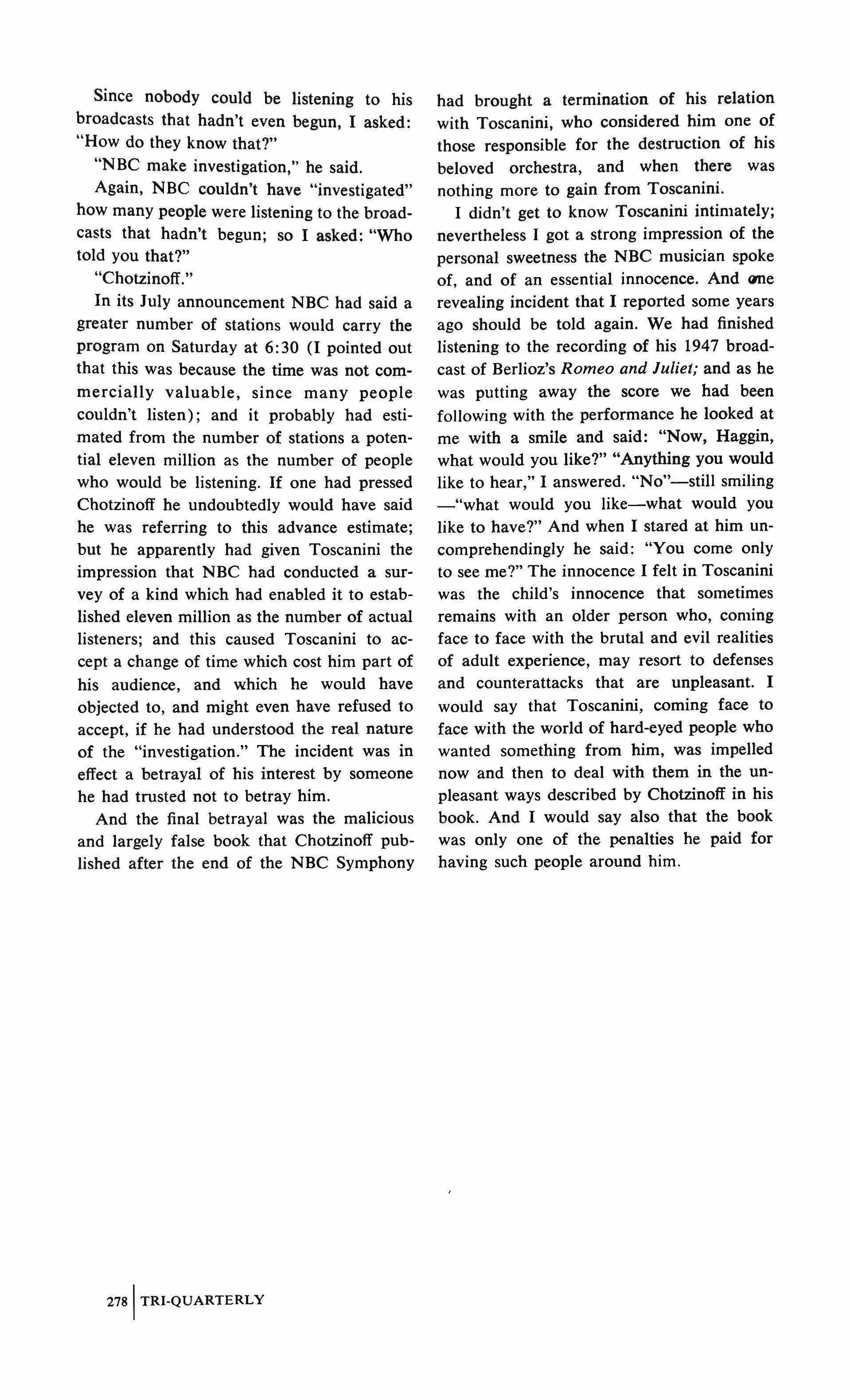
had brought a termination of his relation with Toscanini, who considered him one of those responsible for the destruction of his beloved orchestra, and when there was nothing more to gain from Toscanini.
I didn't get to know Toscanini intimately; nevertheless I got a strong impression of the personal sweetness the NBC musician spoke of, and of an essential innocence. And cme revealing incident that I reported some years ago should be told again. We had finished listening to the recording of his 1947 broadcast of Berlioz's Romeo and Juliet; and as he was putting away the score we had been following with the performance he looked at me with a smile and said: "Now, Haggin, what would you like?" "Anything you would like to hear," I answered. "No"-still smiling -"what would you like-what would you like to have?" And when I stared at him uncomprehendingly he said: "You come only to see me?" The innocence I felt in Toscanini was the child's innocence that sometimes remains with an older person who, coming face to face with the brutal and evil realities of adult experience, may resort to defenses and counterattacks that are unpleasant. I would say that Toscanini, coming face to face with the world of hard-eyed people who wanted something from him, was impelled now and then to deal with them in the unpleasant ways described by Chotzinoff in his book. And I would say also that the book was only one of the penalties he paid for having such people around him.
 RICHARD KOSTELANETZ
RICHARD KOSTELANETZ
"The news in the Odyssey is still news."
-EZRA POUND, The ABC of Reading.
Some three years ago, somewhat annoyed at how little of the post-Bellow-MalamudBaldwin fiction was receiving serious critical scrutiny, I began a long essay on "New American Fiction," which became a chapter of a book I edited on The New American Arts (Horizon Press, 1965); and although the book was scarcely reviewed and I have neither sat on one symposium about the novel or contributed my vote to one reputation-sweepstakes, I continued to follow those novelists I touted, as well as several older figures, and to read the works of newer writers. In that essay, I attempted to identify. first, the dominant new styles in the best American fiction and, second, both the major works and the emerging talents. At the time, I particularly admired four novels-lohn Barth's The Sot-Weed Factor (1960) Vladimir Nabokov's Pale Fire (1962), Joseph Heller's Catch-22 (1961) and William Burroughs's Naked Lunch (1958). Whereas I had doubts about the future work of both Burroughs and Heller, I placed a heavy bet upon Barth's next work and lighter wagers upon, to list all the writers I favored then, Thomas Pynchon, Irvin Faust, Bruce Jay Friedman, Walker Percy, Curtis Zahn, Hubert Selby, Jr., Kenneth Koch and James Purdy.
Looking back over both the essay and the novels I discussed there, I find little reason to revise its broad outlines. I have not since reversed my decision on any of the several score novels I disliked then (although I have regretted the catalogue quality of my negative judgments), nor have I come across any truly first-rate work by native writers previously unknown to me. (Both E. L. DocJorow's Welcome to Hard Times (1960) and Paule Marshall's Soul Clap Hands and Sing ( 1962) approached real excellence.) Today I would still identify the two major overarching
themes of the best American fiction as the absurdity of society and the madness of the self; and the best novels I have read since then have only confirmed this perception. In contrast to before, however, I now value more highly the stories of Irvin Faust, collected as Roar Lion Roar (1965), which I read with increasing pleasure; and John Barth's The Sot-Weed Factor now strikes me as an even more extraordinary imaginative work. Also, now I find myself more bothered by the incoherence in Pynchon's V. (1963) and the inability of both Friedman and Percy to sustain, respectively in Stern (1962) and The Moviegoer (1961), the excellence that marks the first-halves of those novels.
Likewise, in the past few years, not one of the older generation of established novelists has risked a jump into frontier territory. Indeed, some of them manage to sustain a current reputation upon works produced long ago-Ralph Ellison, William Styron, J. D. Salinger and William Gaddis. Saul Beilow's Herzog (1964) strikes me as excessively pretentious in tone, clumsily written, needlessly compromised in crucial dimensioas: Norman Mailer's An American Dream (1965) suffers from a faked prose and artless excesses, which did nothing to overcome my impression that his better essays of recent years have more style and substance. James Baldwin's short stories, Going to Meet the Man (1965), have more art and less ambition than Another Country (1962); still, they mine old veins, as do the stories Jerome Charyn collected in The Man Who Grew Younger (1967). Alan Harrington's long-awaited second novel, The Secret Swinger (1966), was little more than a malevolent roman a clef; Francis Pollini's Glover (1965) lacked the immediacy and hard integrity of Night (1960); Truman Capote's In Cold Blood ( 1966) displayed less journalistic art than Tom Wolfe and little fictional interest. Nabokov has published numerous translations, of both Pushkin's poetry and his own earlier Russian works, introducing them all as equally sacred texts. Leslie Fiedler's three novellas, The Last Jew in America (1966), was indubitably his worst fiction to date; Howard Nemerov's Journal of the Fictive Life (1965), while more self-honest and artistically ambitious, still suffered from that
TRI-QUARTERLy 1279
slickness that plagued his previous fiction. Bernard Malamud's The Fixer (1966), so hailed by older critics, I found enormously disappointing-much too close to the style of Isaac Bashevis Singer, as well as too distant from that less parochial milieu of The Natural (1952), which I still consider his richest novel. Now, what seems to have happened to this generation is that they do too easily what their publics admired before, rather than achieving a relationship of tension and surprise.
However, most of my favored novelists, I must admit, have similarly betrayed my hopes. Walker Percy's The Last Gentlemen ( 1966) comes as a dreadful mistake, suffering from a protagonist who is both stereotyped and needlessly vague; and for a novel that makes so much of his interaction with society, The Last Gentleman has such a deficient sense of milieu that its best aspect, the truth of its portrait of dislocation, is not successfully integrated into the fictional line. William Burroughs has not yet, to quote myself, either transcended or verified "the theory that certain composing methods viable in painting [i.e., abstract expressionism and collage] and music [i.e., aleatoric procedures] can be applied to literature." The revised version of The Soft Machine (1966) was hardly an improvement over the original Olympia Press edition (1961). Bruce Jay Friedman's second book of stories, Black Angels (1966), suffers from that hokey cuteness that mars the last half of Stern (1962); and not since that first novel has he attained that hard perception of reality that, for many readers, had the ring of truth. Neither Hubert Selby, Jr. nor Curtis Zahn appears to have published anything new; and Joseph Heller's "Something Happened," (Esquire, 1966), while excellent as short fiction, leaves doubts, as an excerpt, about its novelistic potential. Of the first novels by new writers, Jeremy Larner's Drive, He Said (1964), LeRoi Jones's The System oj Dante's Hell (1965), and Richard Farina's I've Been Down So Long It Looks Like Up to Me (1966) all suffer from excessive bad writing and conspicuous signs of classroom lessons learned too well, while just the latter attribute mars first novels as various as Robert Coover's The Origin oj the Brunists (1966), Cynthia Ozick's Trust (1966),
280 I
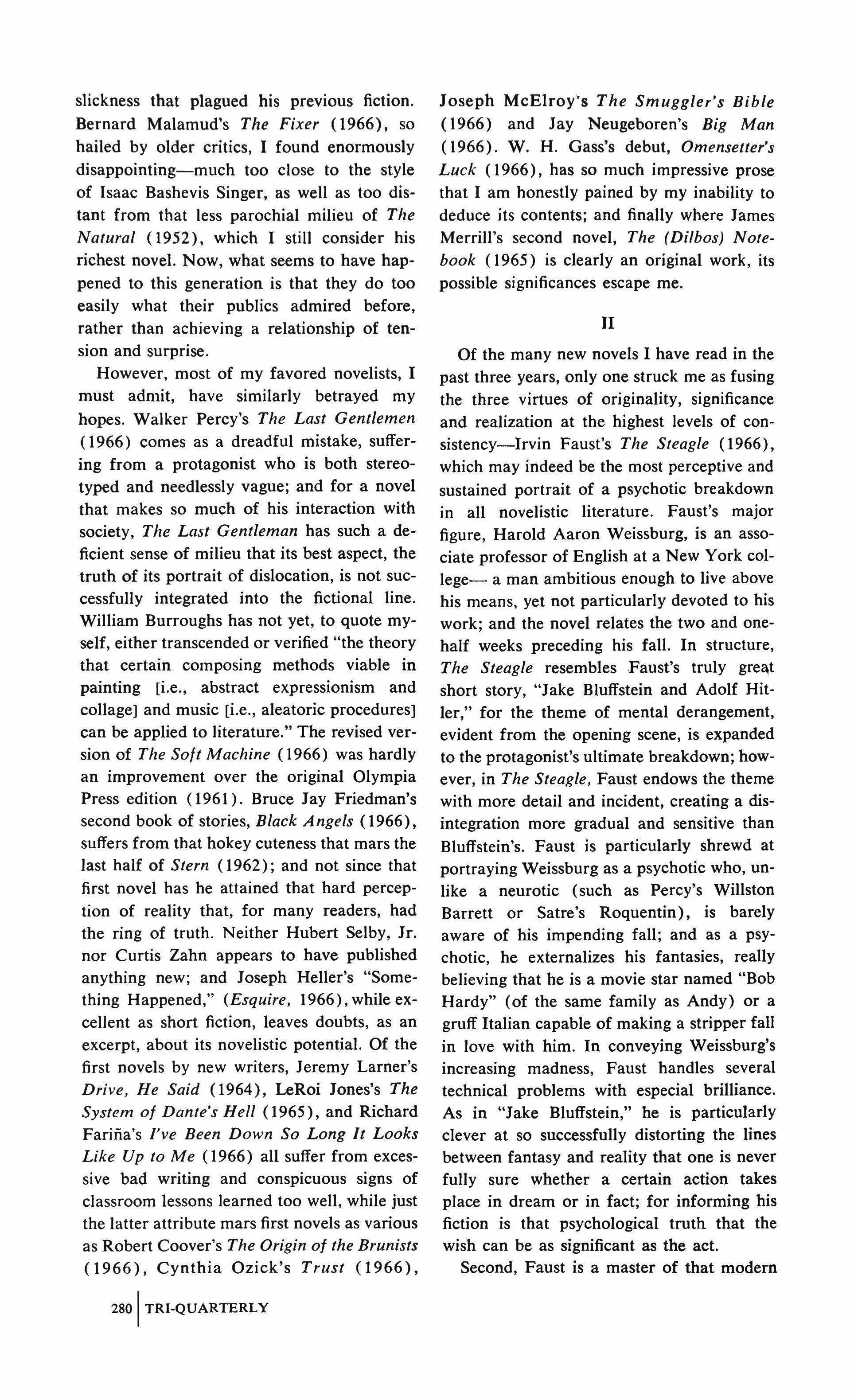
Joseph McElroy's The Smuggler's Bible (1966) and Jay Neugeboren's Big Man (1966). W. H. Gass's debut, Omensetter's Luck (1966), has so much impressive prose that I am honestly pained by my inability to deduce its contents; and finally where James Merrill's second novel, The (Dilbos) Notebook (1965) is clearly an original work, its possible significances escape me.
Of the many new novels I have read in the past three years, only one struck me as fusing the three virtues of originality, significance and realization at the highest levels of consistency-Irvin Faust's The Steagle (1966), which may indeed be the most perceptive and sustained portrait of a psychotic breakdown in all novelistic literature. Faust's major figure, Harold Aaron Weissburg, is an associate professor of English at a New York college- a man ambitious enough to live above his means, yet not particularly devoted to his work; and the novel relates the two and onehalf weeks preceding his fall. In structure, The Steagle resembles Faust's truly great short story, "Jake Bluffstein and Adolf Hitler," for the theme of mental derangement, evident from the opening scene, is expanded to the protagonist's ultimate breakdown; however, in The Steagle, Faust endows the theme with more detail and incident, creating a disintegration more gradual and sensitive than Bluffstein's, Faust is particularly shrewd at portraying Weissburg as a psychotic who, unlike a neurotic (such as Percy's Willston Barrett or Satre's Roquentin), is barely aware of his impending fall; and as a psychotic, he externalizes his fantasies, really believing that he is a movie star named "Bob Hardy" (of the same family as Andy) or a gruff Italian capable of making a stripper fall in love with him. In conveying Weissburg's increasing madness, Faust handles several technical problems with especial brilliance. As in "Jake Bluffstein," he is particularly clever at so successfully distorting the lines between fantasy and reality that one is never fully sure whether a certain action takes place in dream or in fact; for informing his fiction is that psychological truth that the wish can be as significant as the act.
Second, Faust is a master of that modern

technique of rendering an hysterical consciousness with unerring similitude. As he returns home on the train, Weissburg reads the New York Times:
Back to Arthur Krock. Friendly thickness. The sober seriousness of the situation. The responsible analysis of the implication of the sober seriousness of the-Balls, Hesh. No, listen. Herr Hitler is indicating a willingness to - Balls. No, experts. Balls, Krock is a crock. No, negotiate. Cy Sulzberger, look, he interviews Nasser. Cy and Nasser? Schmuck? No, normalcy, Rita, blond bullycock, guilt. The squish unsquished, and the voice-low, controlled, bored-said, "Isn't that the city?"
As in this passage, Faust's prose is neither cliched nor fancy; but as an elliptical shorthand, it attains an elegance quite singular. Faust's fiction is loaded with simple descriptive lines that evoke so much about a person's mental state. As Jake Bluffstein prepares to convey his messianic message to those around him, Faust writes, "He felt like Columbus."
Of Weissburg, he says, "He was feeling calm and yet terrifically excited." The result is that even in this age of jargon, neither psychological terminology or conspicuous symbols mar Faust's descriptive perceptions. Fourth, he successfully evokes Weissburg's successively more perilous steps, from his impulsive affair with a fellow professor through addressing his class in the "obb" language of New York children, through his dream of himself as a rising movie star, to the final moments when he tells a nurse he picks up that he is "Cave Carson," the son of Floyd Collins:
"Uh Tired, oh so tired. "Sobbay Bobbang Bobbang Swobbeetobby."
He sagged against the rail. As the pain started up behind the left sinus and the heartburn pushed into his throat he looked at her and said, 'All right, Louie, drop da gun.'
With a stark conciseness and a clear and hard finality that resembles the final words in Faulkner's The Sound and the Fury, this is among the great endings in contemporary literature.
The book's major failures stem from the falseness and parochialism of certain crucial details. It is difficult to believe that Wiessburg is a college teacher, despite all the references
to Elizabethan authors; and the conversation in the dining hall scene, early in the book, has a tone closer to high school (a milieu Faust knows well) than college; and Weissburg's own pedantic love of obscure facts suggests more the autodidact than the scholar with a Ph.D. In addition, the effectiveness of certain details depends upon a familiarity with New York's Jewish culture-not just Yiddishisms (for example, that "Hesh" is a nickname for Harold) but the sort of things that Jewish city kids think and do. Similarly, many other details will date too quickly for Faust to earn posterity's beneficence. Not only does the import of both the book's title and its epigraph escape me completely, but also in using as' a background the Cuba Missile Crisis of October, 1962, Faust fails to integrate public disturbance with private troubles. Finally, on first reading, I found that following the narrative line and identifying the speakers of certain quotations both became progressively more difficult as Weissburg's derangement becomes more acute; but on second reading some of these problems were alleviated.
Nonetheless, what is remarkable is Faust's consistency-his unwillingness to compromise his fictional method-and his perseverance with an enormously difficult subject. He chooses a theme-the progressive derangement of one man-that is basically the stuff of short fiction and achieves the extraordinary feat of sustaining it through a novel where nothing, to my mind, is conspicuously superfluous. Where one might say that Faust has rutted himself as a specialist in mental distress, I believe he has hardly exhausted the fictional possibilities of this preoccupation. Moreover, with The Steagle Faust establishes that he is clearly among the most accomplished craftsmen of fiction today.
By now everyone who has read John Barth's Giles Goat-Boy (1966) appears to agree that it is hardly as great as The SOIWeed Factor; indeed, those early outrageously laudatory reviews were probably intended to repair the reviewers' neglect of earlier works. It is, nonetheless, a first-rate book, surely among the dozen or so best novels of the passing sixties. On its most basic level, that of style, the new work is not as
TRI-QUARTERLy 1281
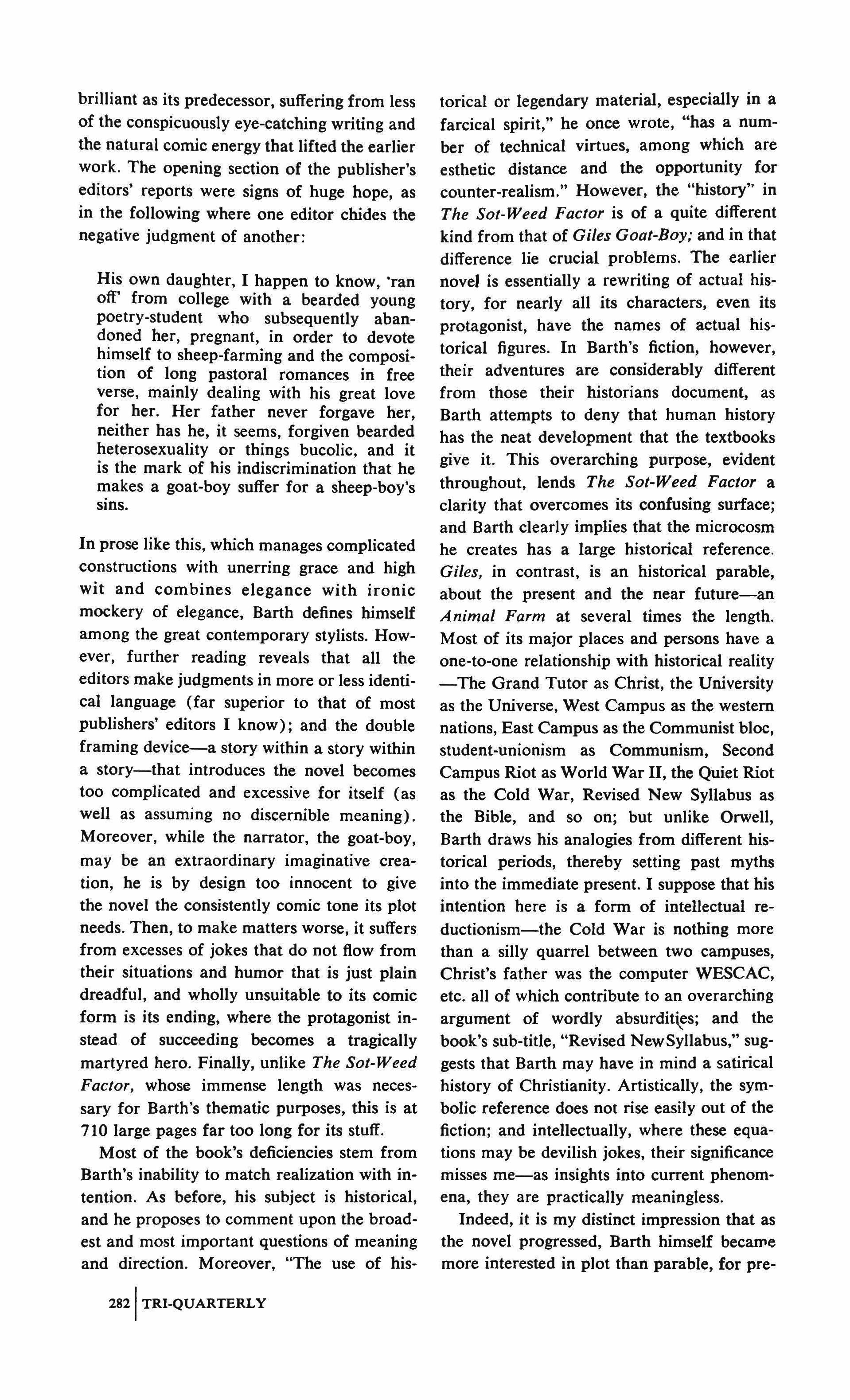
brilliant as its predecessor, suffering from less of the conspicuously eye-catching writing and the natural comic energy that lifted the earlier work. The opening section of the publisher's editors' reports were signs of huge hope, as in the following where one editor chides the negative judgment of another:
His own daughter, I happen to know, 'ran off' from college with a bearded young poetry-student who subsequently abandoned her, pregnant, in order to devote himself to sheep-farming and the composition of long pastoral romances in free verse, mainly dealing with his great love for her. Her father never forgave her, neither has he, it seems, forgiven bearded heterosexuality or things bucolic, and it is the mark of his indiscrimination that he makes a goat-boy suffer for a sheep-boy's sins.
In prose like this, which manages complicated constructions with unerring grace and high wit and combines elegance with ironic mockery of elegance, Barth defines himself among the great contemporary stylists. However, further reading reveals that all the editors make judgments in more or less identical language (far superior to that of most publishers' editors I know); and the double framing device-a story within a story within a story-that introduces the novel becomes too complicated and excessive for itself (as well as assuming no discernible meaning). Moreover, while the narrator, the goat-boy, may be an extraordinary imaginative creation, he is by design too innocent to give the novel the consistently comic tone its plot needs. Then, to make matters worse, it suffers from excesses of jokes that do not flow from their situations and humor that is just plain dreadful, and wholly unsuitable to its comic form is its ending, where the protagonist instead of succeeding becomes a tragically martyred hero. Finally, unlike The Sot-Weed Factor, whose immense length was necessary for Barth's thematic purposes, this is at 710 large pages far too long for its stuff.
Most of the book's deficiencies stem from Barth's inability to match realization with intention. As before, his subject is historical, and he proposes to comment upon the broadest and most important questions of meaning and direction. Moreover, ''The use of his-
TRI-QUARTERLY
torical or legendary material, especially in a farcical spirit," he once wrote, "has a number of technical virtues, among which are esthetic distance and the opportunity for counter-realism." However, the "history" in The Sot-Weed Factor is of a quite different kind from that of Giles Goat-Boy; and in that difference lie crucial problems. The earlier novel is essentially a rewriting of actual history, for nearly all its characters, even its protagonist, have the names of actual historical figures. In Barth's fiction, however, their adventures are considerably different from those their historians document, as Barth attempts to deny that human history has the neat development that the textbooks give it. This overarching purpose, evident throughout, lends The Sot-Weed Factor a clarity that overcomes its confusing surface; and Barth clearly implies that the microcosm he creates has a large historical reference. Giles, in contrast, is an historical parable, about the present and the near future-an Animal Farm at several times the length. Most of its major places and persons have a one-to-one relationship with historical reality -The Grand Tutor as Christ, the University as the Universe, West Campus as the western nations, East Campus as the Communist bloc, student-unionism as Communism, Second Campus Riot as World War II, the Quiet Riot as the Cold War, Revised New Syllabus as the Bible, and so on; but unlike Orwell, Barth draws his analogies from different historical periods, thereby setting past myths into the immediate present. I suppose that his intention here is a form of intellectual reductionism-the Cold War is nothing more than a silly quarrel between two campuses, Christ's father was the computer WESCAC, etc. all of which contribute to an overarching argument of wordly absurdities; and the book's sub-title, "Revised NewSyllabus," suggests that Barth may have in mind a satirical history of Christianity. Artistically, the symbolic reference does not rise easily out of the fiction; and intellectually, where these equations may be devilish jokes, their significance misses me-as insights into current phenomena, they are practically meaningless.
Indeed, it is my distinct impression that as the novel progressed, Barth himself became more interested in plot than parable, for pre-
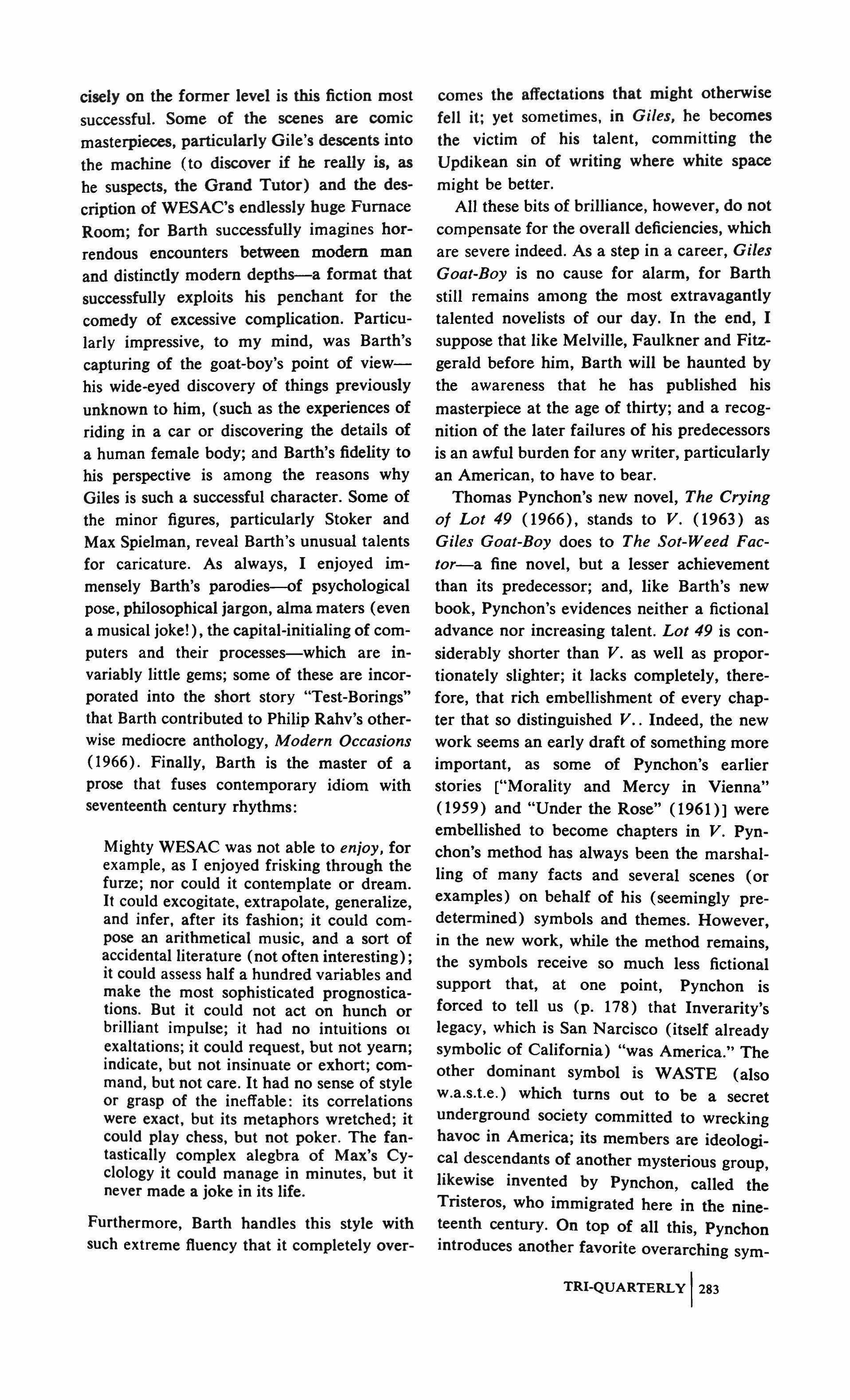
cisely on the former level is this fiction most successful. Some of the scenes are comic masterpieces, particularly Gile's descents into the machine (to discover if he really is, as he suspects, the Grand Tutor) and the description of WESAC's endlessly huge Furnace Room; for Barth successfully imagines horrendous encounters between modem man and distinctly modem depths-a format that successfully exploits his penchant for the comedy of excessive complication. Particularly impressive, to my mind, was Barth's capturing of the goat-boy's point of viewhis wide-eyed discovery of things previously unknown to him, (such as the experiences of riding in a car or discovering the details of a human female body; and Barth's fidelity to his perspective is among the reasons why Giles is such a successful character. Some of the minor figures, particularly Stoker and Max Spielman, reveal Barth's unusual talents for caricature. As always, I enjoyed immensely Barth's parodies-of psychological pose, philosophical jargon, alma maters (even a musical joke!), the capital-initialing of computers and their processes-which are invariably little gems; some of these are incorporated into the short story "Test-Borings" that Barth contributed to Philip Rahv's otherwise mediocre anthology, Modern Occasions (1966). Finally, Barth is the master of a prose that fuses contemporary idiom with seventeenth century rhythms:
Mighty WESAC was not able to enjoy, for example, as I enjoyed frisking through the furze; nor could it contemplate or dream. It could excogitate, extrapolate, generalize, and infer, after its fashion; it could compose an arithmetical music, and a sort of accidental literature (not often interesting); it could assess half a hundred variables and make the most sophisticated prognostications. But it could not act on hunch or brilliant impulse; it had no intuitions 01 exaltations; it could request, but not yearn; indicate, but not insinuate or exhort; command, but not care. It had no sense of style or grasp of the ineffable: its correlations were exact, but its metaphors wretched; it could play chess, but not poker. The fantastically complex alegbra of Max's Cyclology it could manage in minutes, but it never made a joke in its life.
Furthermore, Barth handles this style with such extreme fluency that it completely over-
comes the affectations that might otherwise fell it: yet sometimes, in Giles, he becomes the victim of his talent, committing the Updikean sin of writing where white space might be better.
All these bits of brilliance, however, do not compensate for the overall deficiencies, which are severe indeed. As a step in a career, Giles Goat-Boy is no cause for alarm, for Barth still remains among the most extravagantly talented novelists of our day. In the end, I suppose that like Melville, Faulkner and Fitzgerald before him, Barth will be haunted by the awareness that he has published his masterpiece at the age of thirty; and a recognition of the later failures of his predecessors is an awful burden for any writer, particularly an American, to have to bear.
Thomas Pynchon's new novel, The Crying of Lot 49 (1966), stands to V. (1963) as Giles Goat-Boy does to The Sot-Weed Factor-a fine novel, but a lesser achievement than its predecessor; and, like Barth's new book, Pynchon's evidences neither a fictional advance nor increasing talent. Lot 49 is considerably shorter than V. as well as proportionately slighter; it lacks completely, therefore, that rich embellishment of every chapter that so distinguished V.. Indeed, the new work seems an early draft of something more important, as some of Pynchon's earlier stories ["Morality and Mercy in Vienna" (1959) and "Under the Rose" (1961)] were embellished to become chapters in V. Pynchon's method has always been the marshalling of many facts and several scenes (or examples) on behalf of his (seemingly predetermined) symbols and themes. However, in the new work, while the method remains, the symbols receive so much less fictional support that, at one point, Pynchon is forced to tell us (p. 178) that Inverarity's legacy, which is San Narcisco (itself already symbolic of California) "was America." The other dominant symbol is WASTE (also w.a.s.t.e.) which turns out to be a secret underground society committed to wrecking havoc in America; its members are ideological descendants of another mysterious group, likewise invented by Pynchon, called the Tristeros, who immigrated here in the nineteenth century. On top of all this, Pynchon introduces another favorite overarching syrnTRI-QUARTERLy 1283
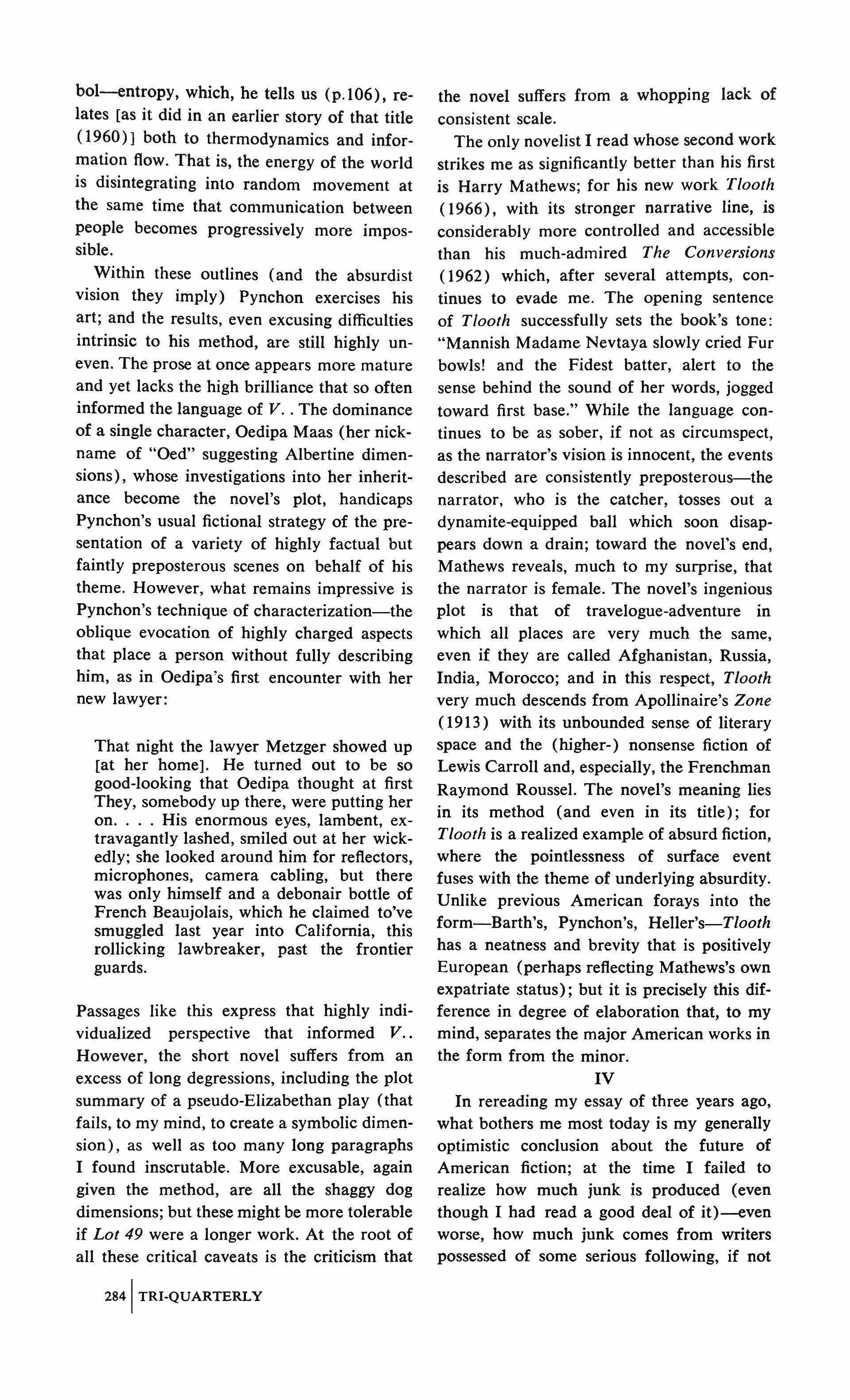
bol-entropy, which, he tells us (p.106), relates [as it did in an earlier story of that title ( 1960) 1 both to thermodynamics and information flow. That is, the energy of the world is disintegrating into random movement at the same time that communication between people becomes progressively more impossible.
Within these outlines (and the absurdist vision they imply) Pynchon exercises his art; and the results, even excusing difficulties intrinsic to his method, are still highly uneven. The prose at once appears more mature and yet lacks the high brilliance that so often informed the language of V The dominance of a single character, Oedipa Maas (her nickname of "Oed" suggesting Albertine dimensions), whose investigations into her inheritance become the novel's plot, handicaps Pynchon's usual fictional strategy of the presentation of a variety of highly factual but faintly preposterous scenes on behalf of his theme. However, what remains impressive is Pynchon's technique of characterization-the oblique evocation of highly charged aspects that place a person without fully describing him, as in Oedipa's first encounter with her new lawyer:
That night the lawyer Metzger showed up [at her home]. He turned out to be so good-looking that Oedipa thought at first They, somebody up there, were putting her on His enormous eyes, lambent, extravagantly lashed, smiled out at her wickedly; she looked around him for reflectors, microphones, camera cabling, but there was only himself and a debonair bottle of French Beaujolais, which he claimed to've smuggled last year into California, this rollicking lawbreaker, past the frontier guards.
Passages like this express that highly individualized perspective that informed V However, the short novel suffers from an excess of long degressions, including the plot summary of a pseudo-Elizabethan play (that fails, to my mind, to create a symbolic dimension), as well as too many long paragraphs I found inscrutable. More excusable, again given the method, are all the shaggy dog dimensions; but these might be more tolerable if Lot 49 were a longer work. At the root of all these critical caveats is the criticism that
TRI-QUARTERLY
the novel suffers from a whopping lack of consistent scale.
The only novelist I read whose second work strikes me as significantly better than his first is Harry Mathews; for his new work Tlooth (1966), with its stronger narrative line, is considerably more controlled and accessible than his much-admired The Conversions ( 1962) which, after several attempts, continues to evade me. The opening sentence of Tlooth successfully sets the book's tone: "Mannish Madame Nevtaya slowly cried Fur bowls! and the Fidest batter, alert to the sense behind the sound of her words, jogged toward first base." While the language continues to be as sober, if not as circumspect, as the narrator's vision is innocent, the events described are consistently preposterous-the narrator, who is the catcher, tosses out a dynamite-equipped ball which soon disappears down a drain; toward the novel's end, Mathews reveals, much to my surprise, that the narrator is female. The novel's ingenious plot is that of travelogue-adventure in which all places are very much the same, even if they are called Afghanistan, Russia, India, Morocco; and in this respect, Tlooth very much descends from Apollinaire's Zone (1913) with its unbounded sense of literary space and the (higher-) nonsense fiction of Lewis Carroll and, especially, the Frenchman Raymond Roussel. The novel's meaning lies in its method (and even in its title); for Tlooth is a realized example of absurd fiction, where the pointlessness of surface event fuses with the theme of underlying absurdity. Unlike previous American forays into the form-Barth's, Pynchon's, Heller's-Tlootlz has a neatness and brevity that is positively European (perhaps reflecting Mathews's own expatriate status); but it is precisely this difference in degree of elaboration that, to my mind, separates the major American works in the form from the minor.
In rereading my essay of three years ago, what bothers me most today is my generally optimistic conclusion about the future of American fiction; at the time I failed to realize how much junk is produced (even though I had read a good deal of it)-even worse, how much junk comes from writers possessed of some serious following, if not
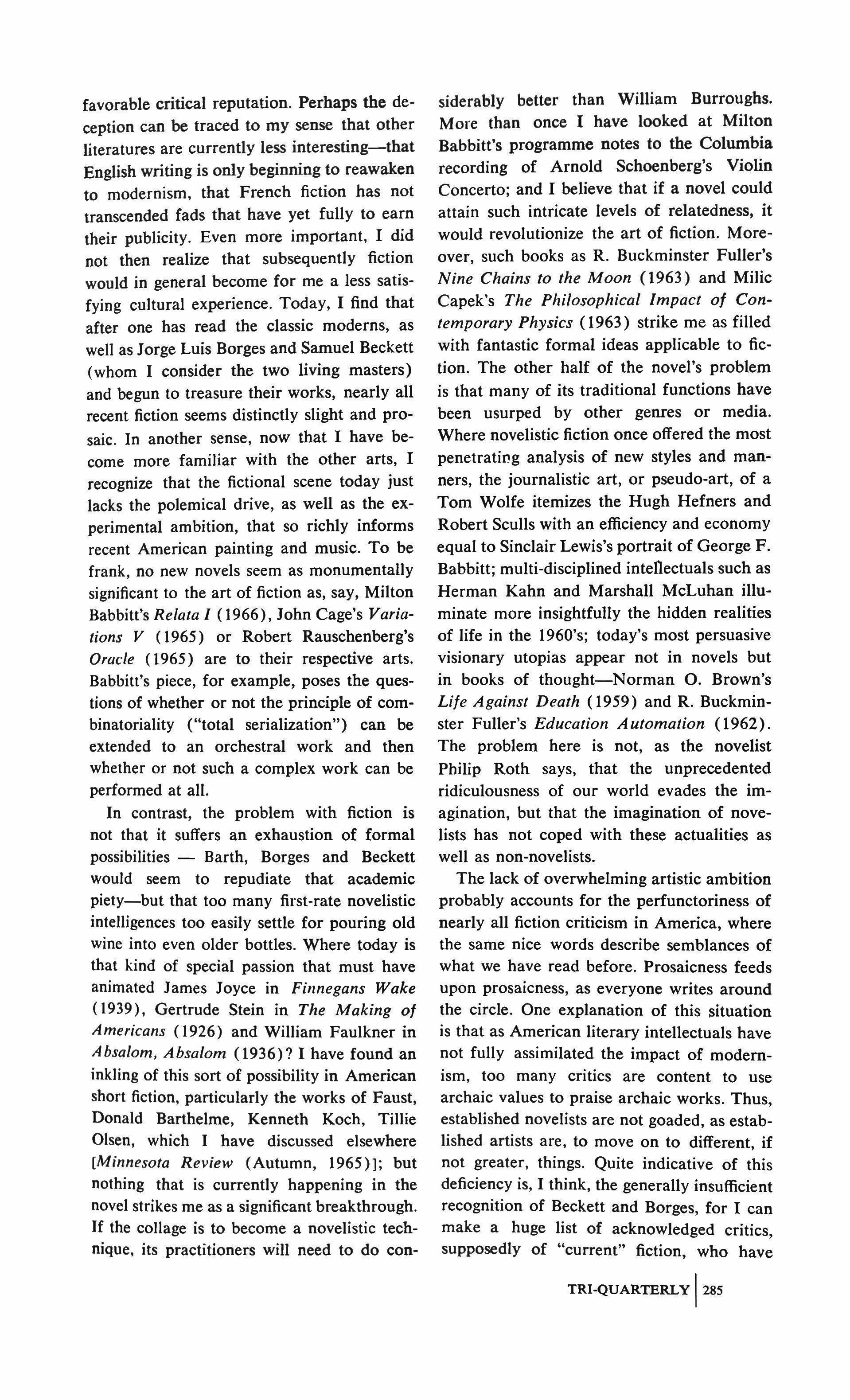
favorable critical reputation. Perhaps the deception can be traced to my sense that other literatures are currently less interesting-that English writing is only beginning to reawaken to modernism, that French fiction has not transcended fads that have yet fully to earn their publicity. Even more important, I did not then realize that subsequently fiction would in general become for me a less satisfying cultural experience. Today, I find that after one has read the classic moderns, as well as Jorge Luis Borges and Samuel Beckett (whom I consider the two living masters) and begun to treasure their works, nearly all recent fiction seems distinctly slight and prosaic. In another sense, now that I have become more familiar with the other arts, I recognize that the fictional scene today just lacks the polemical drive, as well as the experimental ambition, that so richly informs recent American painting and music. To be frank, no new novels seem as monumentally significant to the art of fiction as, say, Milton Babbitt's Relata I (1966), John Cage's Variations V (1965) or Robert Rauschenberg's Oracle (1965) are to their respective arts. Babbitt's piece, for example, poses the questions of whether or not the principle of combinatoriality ("total serialization") can be extended to an orchestral work and then whether or not such a complex work can be performed at all.
In contrast, the problem with fiction is not that it suffers an exhaustion of formal possibilities - Barth, Borges and Beckett would seem to repudiate that academic piety-but that too many first-rate novelistic intelligences too easily settle for pouring old wine into even older bottles. Where today is that kind of special passion that must have animated James Joyce in Finnegans Wake (1939), Gertrude Stein in The Making of Americans (1926) and William Faulkner in Absalom, Absalom (1936)? I have found an inkling of this sort of possibility in American short fiction, particularly the works of Faust, Donald Barthelme, Kenneth Koch, Tillie Olsen, which I have discussed elsewhere [Minnesota Review (Autumn, 1965)]; but nothing that is currently happening in the novel strikes me as a significant breakthrough. If the collage is to become a novelistic technique, its practitioners will need to do con-
siderably better than William Burroughs. More than once I have looked at Milton Babbitt's programme notes to the Columbia recording of Arnold Schoenberg's Violin Concerto; and I believe that if a novel could attain such intricate levels of relatedness, it would revolutionize the art of fiction. Moreover, such books as R. Buckminster Fuller's Nine Chains to the Moon (1963) and Milic Capek's The Philosophical Impact of Contemporary Physics (1963) strike me as filled with fantastic formal ideas applicable to fiction. The other half of the novel's problem is that many of its traditional functions have been usurped by other genres or media. Where novelistic fiction once offered the most penetrating analysis of new styles and manners, the journalistic art, or pseudo-art, of a Tom Wolfe itemizes the Hugh Hefners and Robert Sculls with an efficiency and economy equal to Sinclair Lewis's portrait of George F. Babbitt; multi-disciplined intellectuals such as Herman Kahn and Marshall McLuhan illuminate more insightfully the hidden realities of life in the 1960's; today's most persuasive visionary utopias appear not in novels but in books of thought-Norman O. Brown's Life Against Death (1959) and R. Buckminster Fuller's Education Automation (1962). The problem here is not, as the novelist Philip Roth says, that the unprecedented ridiculousness of our world evades the imagination, but that the imagination of novelists has not coped with these actualities as well as non-novelists.
The lack of overwhelming artistic ambition probably accounts for the perfunctoriness of nearly all fiction criticism in America, where the same nice words describe semblances of what we have read before. Prosaicness feeds upon prosaicness, as everyone writes around the circle. One explanation of this situation is that as American literary intellectuals have not fully assimilated the impact of modernism, too many critics are content to use archaic values to praise archaic works. Thus, established novelists are not goaded, as established artists are, to move on to different, if not greater, things. Quite indicative of this deficiency is, I think, the generally insufficient recognition of Beckett and Borges, for I can make a huge list of acknowledged critics, supposedly of "current" fiction, who have
y 1285
not to my knowledge confronted these master figures with any thoroughness; and if they have not dealt with these touchstones, how can any of them respond to a fiction that might move beyond these points.
In each of the arts today, two avant-gardes exist-those who would preserve and develop the essence of the art and those artists who would combine with (or draw their creative ideas from) other arts. In music, this is the difference between, respectively, Milton Babbitt and John Cage; in painting, between Frank Stella and Robert Rauschenberg; in dance, between Merce Cunningham and Steve Paxton; in poetry, between John Berryman and "concrete" poets. The combinational impulse has barely entered fictional arts, although certain writers (Barthelme and Doctorow) would seem to emulate conceptions developed first in the other artstreating, for instance, a single event from several points of view has analogies with
cubism in painting, while distorting a pulpfiction formula resembles "pop art." Future formal invention in fiction, I suspect, will stem more from this cross-fertilization impulse than from a novelistic purism. I could well imagine a novel where typography of various sizes would be crucially important or where the pages would contain just a set of related drawings. Why, after all, shouldn't novelists follow Alfred Jarry's example in The Exploits and Opinions of Doctor Faustroll, 'Pataphysician (1911) and introduce a succession of algebraic equations; for there really exist no limits upon the kinds of fictions that can be put between two covers. All this only echoes what I said earlier-that novelists have not contemplated deeply enough the formal possibilities of the novelistic format. The point is that fiction today necessarily assumes a competitive position, where it must be as interesting as the latest endeavors in the other arts if it is to earn its audience.
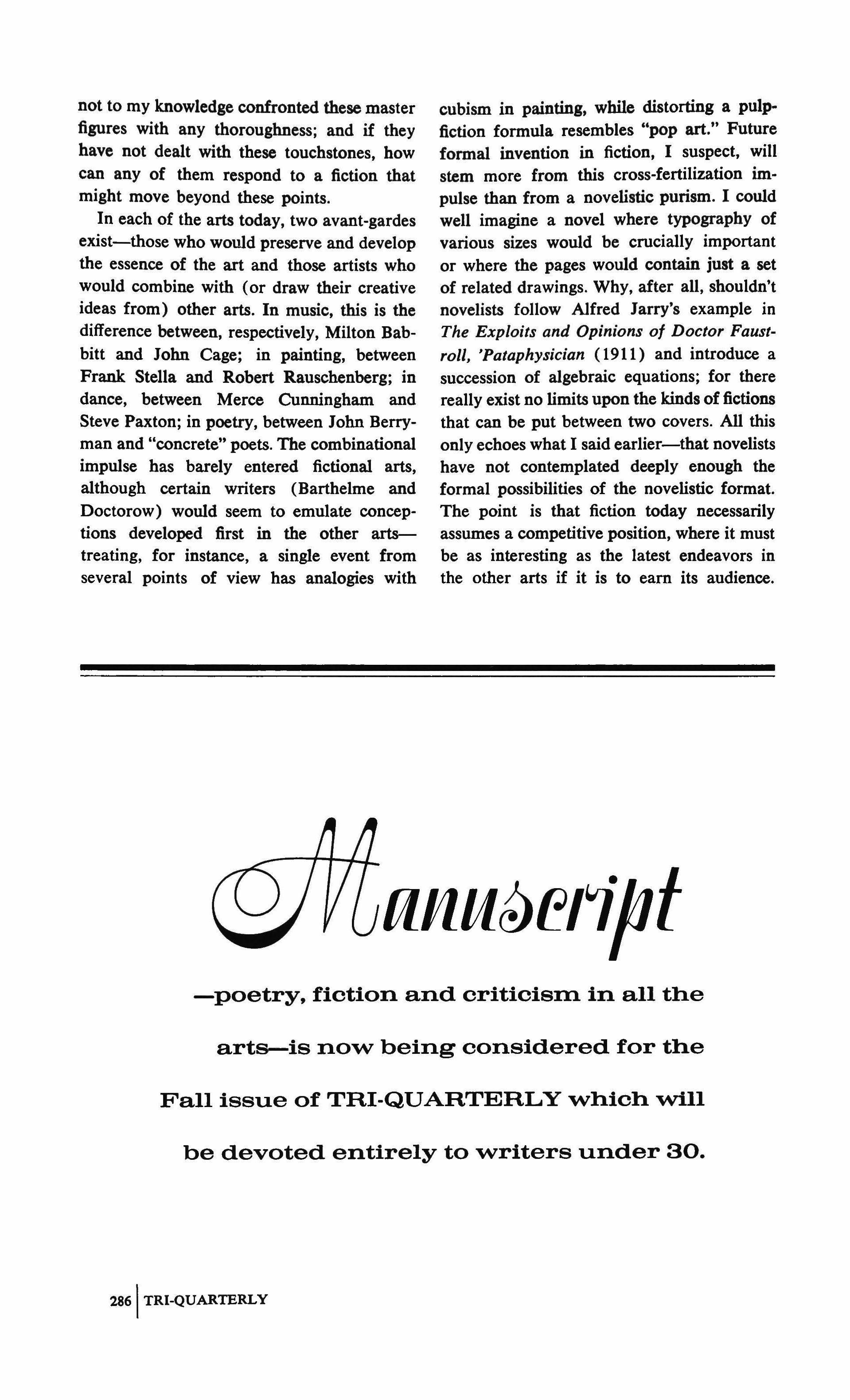
-poetry, fiction and criticism in all the arts-is now being considered for the Fall issue of TRI-QUARTERLY which will be devoted entirely to writers under 30.
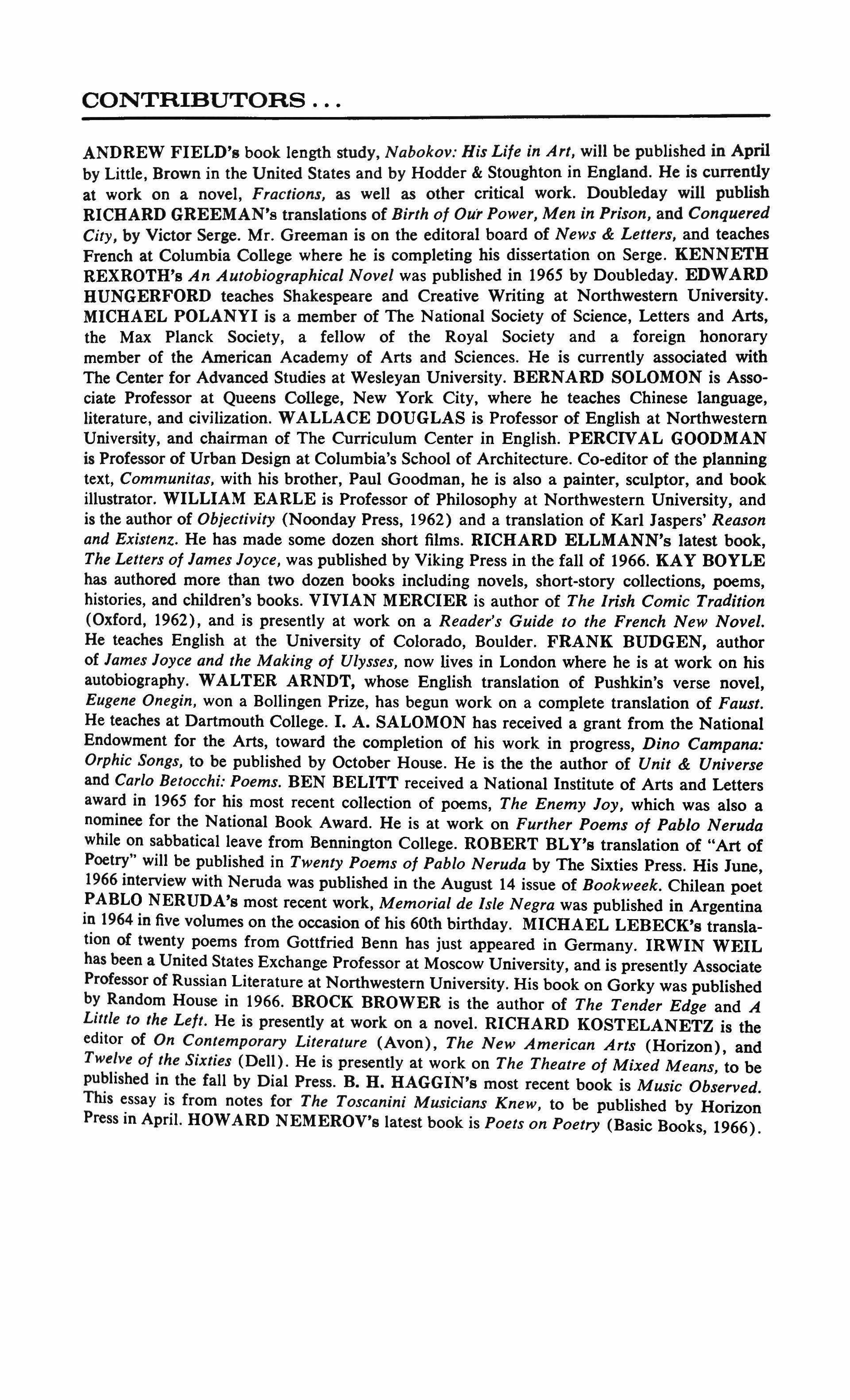
ANDREW FIELD's book length study, Nabokov: His Life in Art, will be published in April by Little, Brown in the United States and by Hodder & Stoughton in England. He is currently at work on a novel, Fractions, as well as other critical work. Doubleday will publish RICHARD GREEMAN's translations of Birth of Our Power, Men in Prison, and Conquered City, by Victor Serge. Mr. Greeman is on the editoral board of News & Letters, and teaches French at Columbia College where he is completing his dissertation on Serge. KENNETH REXROTH's An Autobiographical Novel was published in 1965 by Doubleday. EDWARD HUNGERFORD teaches Shakespeare and Creative Writing at Northwestern University. MICHAEL POLANYI is a member of The National Society of Science, Letters and Arts, the Max Planck Society, a fellow of the Royal Society and a foreign honorary member of the American Academy of Arts and Sciences. He is currently associated with The Center for Advanced Studies at Wesleyan University. BERNARD SOLOMON is Associate Professor at Queens College, New York City, where he teaches Chinese language, literature, and civilization. WALLACE DOUGLAS is Professor of English at Northwestern University, and chairman of The Curriculum Center in English. PERCIVAL GOODMAN is Professor of Urban Design at Columbia's School of Architecture. Co-editor of the planning text, Communitas, with his brother, Paul Goodman, he is also a painter, sculptor, and book illustrator. WILLIAM EARLE is Professor of Philosophy at Northwestern University, and is the author of Objectivity (Noonday Press, 1962) and a translation of Karl Jaspers' Reason and Exlstenz. He has made some dozen short films. RICHARD ELLMANN's latest book, The Letters of James Joyce, was published by Viking Press in the fall of 1966. KAY BOYLE has authored more than two dozen books including novels, short-story collections, poems, histories, and children's books. VIVIAN MERCIER is author of The Irish Comic Tradition (Oxford, 1962), and is presently at work on a Reader's Guide to the French New Novel. He teaches English at the University of Colorado, Boulder. FRANK BUDGEN, author of James Joyce and the Making of Ulysses, now lives in London where he is at work on his autobiography. WALTER ARNDT, whose English translation of Pushkin's verse novel, Eugene Onegin, won a Bollingen Prize, has begun work on a complete translation of Faust. He teaches at Dartmouth College. I. A. SALOMON has received a grant from the National Endowment for the Arts, toward the completion of his work in progress, Dino Campana: Orphic Songs, to be published by October House. He is the the author of Unit & Universe and Carlo Betocchi: Poems. BEN BELITT received a National Institute of Arts and Letters award in 1965 for his most recent collection of poems, The Enemy Joy, which was also a nominee for the National Book Award. He is at work on Further Poems of Pablo Neruda while on sabbatical leave from Bennington College. ROBERT BLY's translation of "Art of Poetry" will be published in Twenty Poems of Pablo Neruda by The Sixties Press. His June, 1966 interview with Neruda was published in the August 14 issue of Bookweek. Chilean poet PABLO NERUDA's most recent work, Memorial de Isle Negra was published in Argentina in 1964 in five volumes on the occasion of his 60th birthday. MICHAEL LEBECK's translation of twenty poems from Gottfried Benn has just appeared in Germany. IRWIN WElL has been a United States Exchange Professor at Moscow University, and is presently Associate Professor of Russian Literature at Northwestern University. His book on Gorky was published by Random House in 1966. BROCK BROWER is the author of The Tender Edge and A Little to the Left. He is presently at work on a novel. RICHARD KOSTELANETZ is the editor of On Contemporary Literature (Avon), The New American Arts (Horizon), and Twelve of the Sixties (Deli). He is presently at work on The Theatre of Mixed Means to be published in the fall by Dial Press. B. H. HAGGIN's most recent book is Music Ob�erved. This essay is from notes for The Toscanini Musicians Knew, to be published by Horizon Press in April. HOWARD NEMEROV's latest book is Poets on Poetry (Basic Books, 1966).

CARL BODE is Professor of English at the University of Maryland. His latest book of poems is The Man Behind You. PETER VIERECK's New & Selected Poems will appear from Bobbs-Merrill in the spring. Just returned from his fourth trip to Russia, he is at work on a book on the Soviet rebel poets. X. J. KENNEDY is author of Nude Descending a Staircase (Doubleday, 1961). He is currently visiting lecturer in poetry at the University of California, Irvine. RICHARD HUGO has published two books of poems, A Run of lacks and Death of the Kapowsin Tavern. He teaches poetry at the University of Montana. WILLIAM BROWN is undertaking an anthology of contemporary Vietnamese poetry. He is looking for manuscript and a publisher. RON LOEWINSOHN is author of Watermelons (Totem Press, 1959), The World of the Lie (Change Press, 1963), and Against the Silences to Come (Four Seasons, 1965). He is represented in several contemporary anthologies. LEWIS TURCO teaches at State University College, Oswego, New York. His poems have appeared in numerous journals and anthologies. BARBARA HARR teaches at The University of Montana. ROBERT BLOOM lives in New York, and has published poetry in many periodicals. AARON SISKIND (covers) has made several documentary film studies, as well as specialty studies in architecture. He teaches photography at The Illinois Institute of Technology. Mr. Siskind, who is founder and co-editor of Press, and co-editor of Choice, has exhibited internationally in one-man showings, including five in New York City. His book, A aran Siskind/Photographs, was published by Horizon Press in 1959. His most recent one-man appearance was a retrospective show at The University of Rochester, in 1966. Of his work the art critic Tom B. Hess has said, "He has brought his medium, for the first time in its history, to that mysterious field where illusion and reality meet in perpetual conflict: the picture plane Siskind has transferred the antagonism between what is (paper, emulsion, a simulacrum of nature) and what seems (an abstract shape, a texture, a gesture) to his own medium." E. M. CIORAN, a Rumanian-born philosopher and essayist now living in Paris, contributed his very controversial essay "On the Jews" to Tri-Quarterly #4. These essays will be published in The Temptation to Exist forthcoming from Quadrangle Books, Chicago, his first book to appear in English.